
uar
i\war"'· C ···--
poe r'('
y
Pres Prize tor
-,�-,.-
Publication of TriQuarterly is made possible in part by the donors of gifts and grants to the magazine. For their recent and continuing support, we are very pleased to thank the Illinois Arts Council, the John D. and Catherine T. MacArthur Foundation, the National Endowment for the Arts and the Witter Bvnner Foundation for Poetry, Inc.

NOI'E: TTiQuaTteTly welcomes financial support in the fonn of donations, bequests and planned gifts. Please write to Reginald Gibbons, editor. Please see the inside back cover for names of individual donors to TTiQuaTteTly.
Editor Reginald Gibbons
Managing Editor Kirstie Felland
Executive Editor Bob Perlongo
Special Projects Editor Fred Shafer
Reader Timothy Dekin
TriQuarterly Fellow
Edward Ernst
Advisory Editors
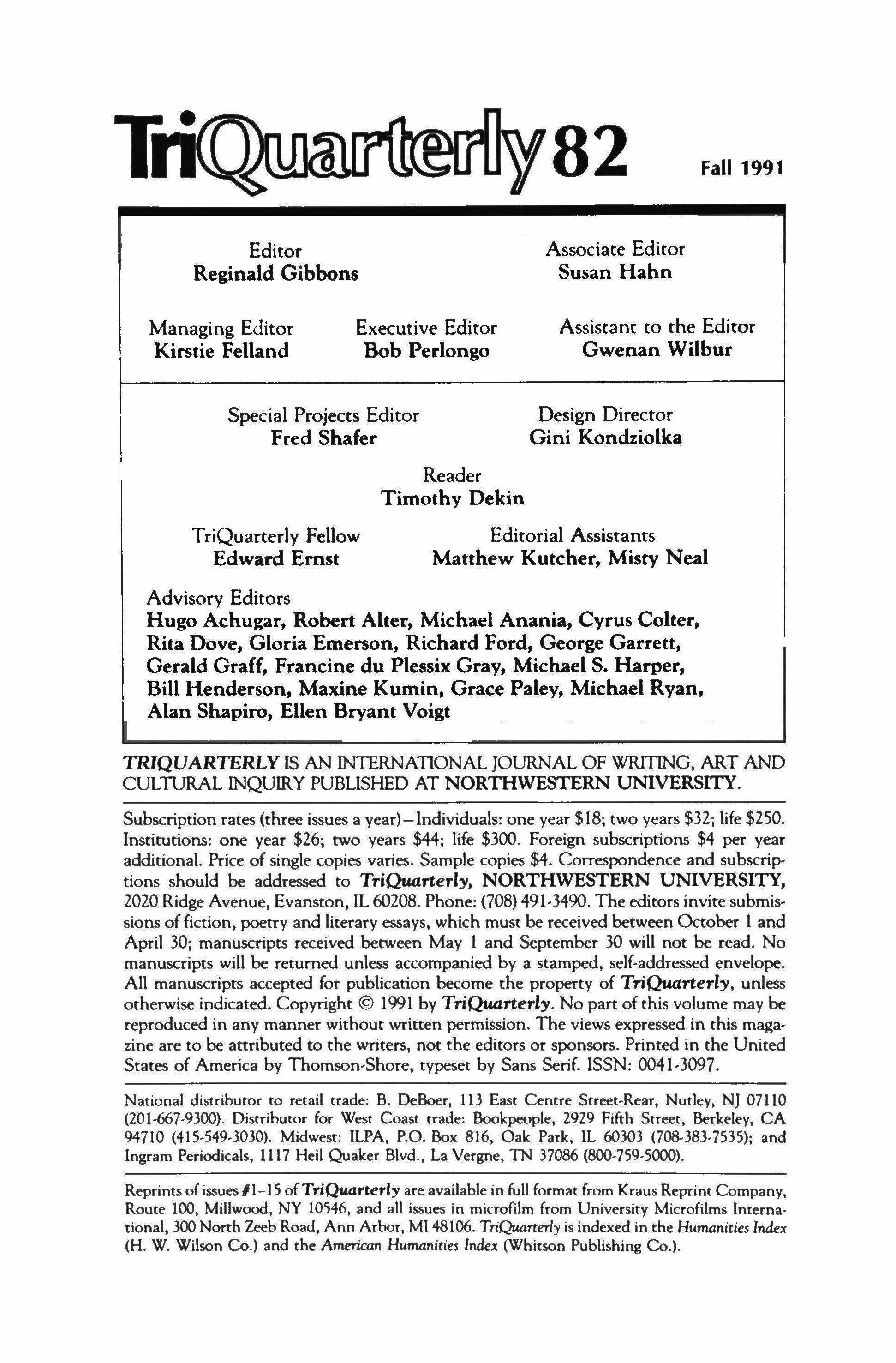
Fall 1991
Associate Editor Susan Hahn
Assistant to the Editor Gwenan Wilbur
Design Director Gini Kondziolka
Editorial Assistants Matthew Kutcher, Misty Neal
Hugo Achugar, Robert Alter, Michael Anania, Cyrus Colter, Rita Dove, Gloria Emerson, Richard Ford, George Garrett, Gerald Graff, Francine du Plessix Gray, Michael S. Harper, Bill Henderson, Maxine Kumin, Grace Paley, Michael Ryan, Alan Shapiro, Ellen Bryant Voigt
TRIQUARTERLY IS AN INTERNATIONAL JOURNAL OF WRITING, ART AND CULTURAL INQUIRY PUBLISHED AT NORTHWESTERN UNIVERSITY.
Subscription rates (three issues a year)-Individuals: one year $18; two years $32; life $250. Institutions: one year $26; two years $44; life $300. Foreign subscriptions $4 per year additional. Price of single copies varies. Sample copies $4. Correspondence and subscriptions should be addressed to TriQuarterly, NORTHWESTERN UNIVERSITY, 2020 Ridge Avenue, Evanston, IL 60208. Phone: (708) 491-3490. The editors invite submissions offiction, poetry and literary essays, which must be received between October 1 and April 30; manuscripts received between May 1 and September 30 will not be read. No manuscripts will be returned unless accompanied by a stamped, self-addressed envelope. All manuscripts accepted for publication become the property of TriQuarterly, unless otherwise indicated. Copyright © 1991 by TriQuarterly. No part of this volume may be reproduced in any manner without written permission. The views expressed in this magazine are to be attributed to the writers, not the editors or sponsors. Printed in the United States of America by Thomson-Shore, typeset by Sans Serif. ISSN: 0041-3097.
National distributor to retail trade: B. DeBoer, 113 East Centre Street-Rear, Nutley, NJ 07110 (201-667-9300). Distributor for West Coast trade: Bookpeople, 2929 Fifth Street, Berkeley, CA 94710 (415-549-3030). Midwest: ILPA, P.O. Box 816, Oak Park, lL 60303 (708-383-7535); and Ingram Periodicals, 1117 Heil Quaker Blvd., La Vergne, TN 37086 (800-759-5000).
Reprints of issues # I-IS of TTiQuaTteTly are available in full format from Kraus Reprint Company, Route 100, Millwood, NY 10546, and all issues in microfilm from University Microfilms International, 300 North Zeeb Road, Ann Arbor, MI48106. TTiQuarter!y is indexed in the Humanities Index (H. W. Wilson Co.) and the American Humanities Index (Whitson Publishing Co.).
82

Gini Kondziolka, TriQuarterly's Design Director - and cover designer-since 1981, was the recent recipient of a DESI Award, given by Graphic Design: USA magazine "for excellence in the creation of a graphic design and for its execution." The award was for her cover design for TQ #80. Kondziolka is co-partner with husband Bill Takatsuki in the Chicago-based firm of KondziolkaTakatsuki Design, or KTD.
Li-Young Lee has received an Illinois Arts Council Literary Award for his poem, "The Waiting," which appeared in TQ /7i.
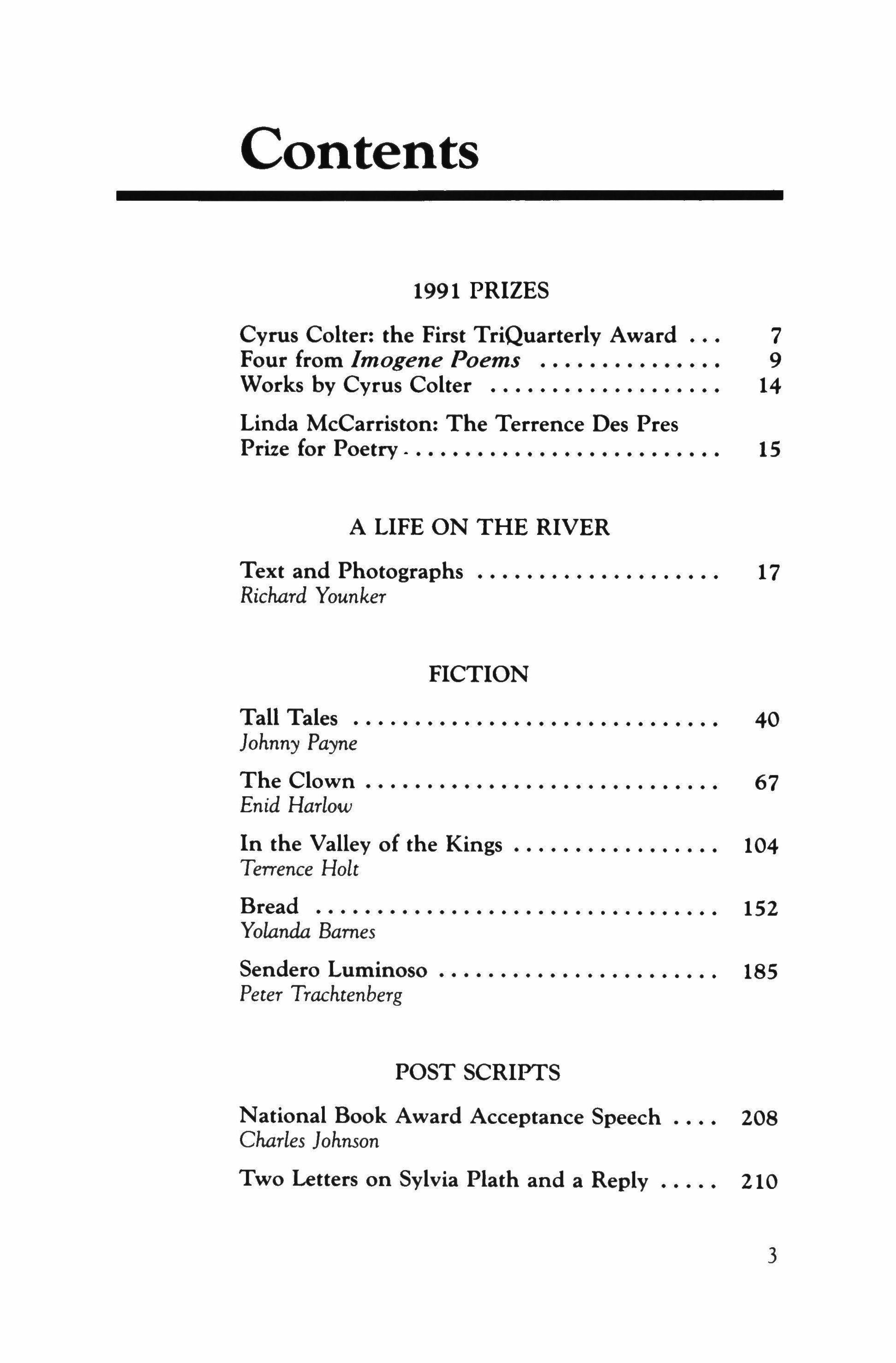
Contents 1991 PRIZES Cyrus Colter: the First TriQuarterly Award 7 Four from Imogene Poems ..........••... 9 Works by Cyrus Colter 14 Linda McCarriston: The Terrence Des Pres Prize for Poetry. 15 A LIFE ON THE RIVER Text and Photographs Richard Younker 17 FICTION Tall Tales ....•..•....•••••.••.•....•... 40 Johnny Payne The Clown 67 Enid Harlow In the Valley of the Kings ••.............•. 104 Terrence Holt Bread ....•••••.•.....•....•.....•..... 152 Yolanda Barnes Sendero Luminoso 185 Peter Trachtenberg POST SCRIPTS National Book Award Acceptance Speech. 208 Charles Johnson Two Letters on Sylvia Plath and a Reply 210 3
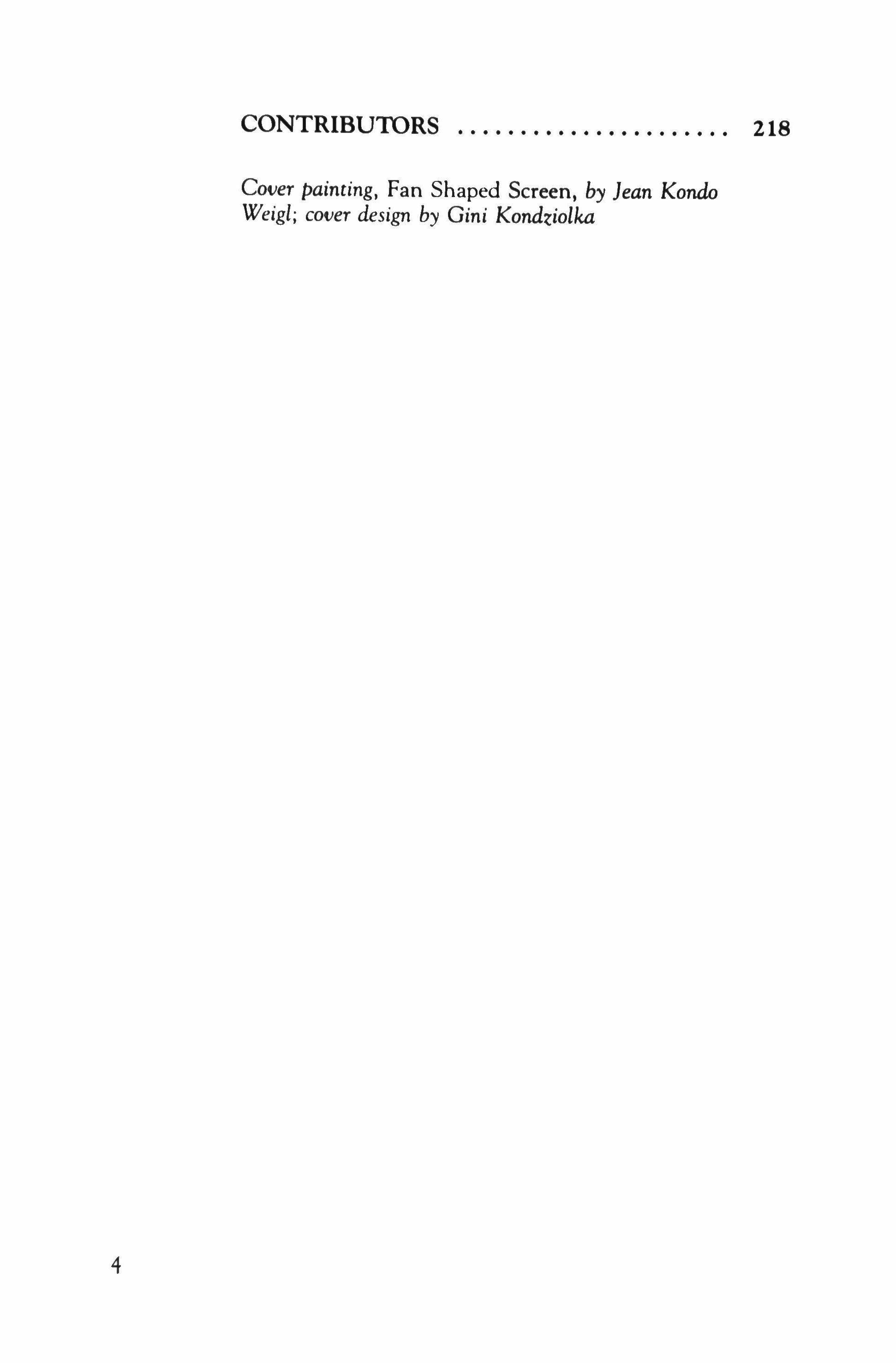
CONTRIBUTORS 218
Cotler painting, Fan Shaped Screen, by Jean Kondo Weigl; cover design by Gini Kondziolka
4


Cyrus Colter: the First TriQuarterly Award

TriQuarterly is pleased to announce that Cyrus Colter is the first winner of the TriQuarterly Award, a new literary prize that signals extraordinary accomplishment over a career of writing and in an entire body of work.
Cyrus Colter's fiction represents not only a distinguished accomplishment in its own right but also a remarkable portion of a long and active life. Writing is the second of his three careers, and the one in which he has fashioned his legacy. A distinguished lawyer and public servant, he took up writing in midlife and, after retiring from the law, devoted himself not only to his art but also to teaching. At Northwestern University he held the Chester D. Tripp Professorship in the Humanities, and chaired the program in African-American Studies.
His fiction is distinguished by its great range across subject and psyche, its moral courage and its stylistic virtues. The trajectory of his work as a writer- his relatively late and courageous decision to write and his subsequent dedication to fiction, his artistic successes with each work and his perseverance and devotion to his art-stands as an encouragement to other writers and a beacon to readers.
Mr. Colter's experience in the army during World War II, in the law, and in government, give an almost nineteenth-century breadth and authority to his understanding of working life and institutions, as well as of the moral and emotional lives of men and women. Out of the wealth of this experience he has written works of incontrovertible originality and strength, with special insight into an important but neglected subject in American literature: the middle-class black life that is caught up in dreams of work and business, struggles ofbelief, and the persistence of racism. Mr. Colter has also offered encouragement, guidance and counsel to many younger persons in the community of writers.
7

The TriQuarterly Award is inaugurated with the name of Cyrus Colter, and will be given subsequently to other writers whose art is as admirable and whose careers are as encouraging as Mr. Colter's.
8
Four from Imogene Poems
Cyrus Colter
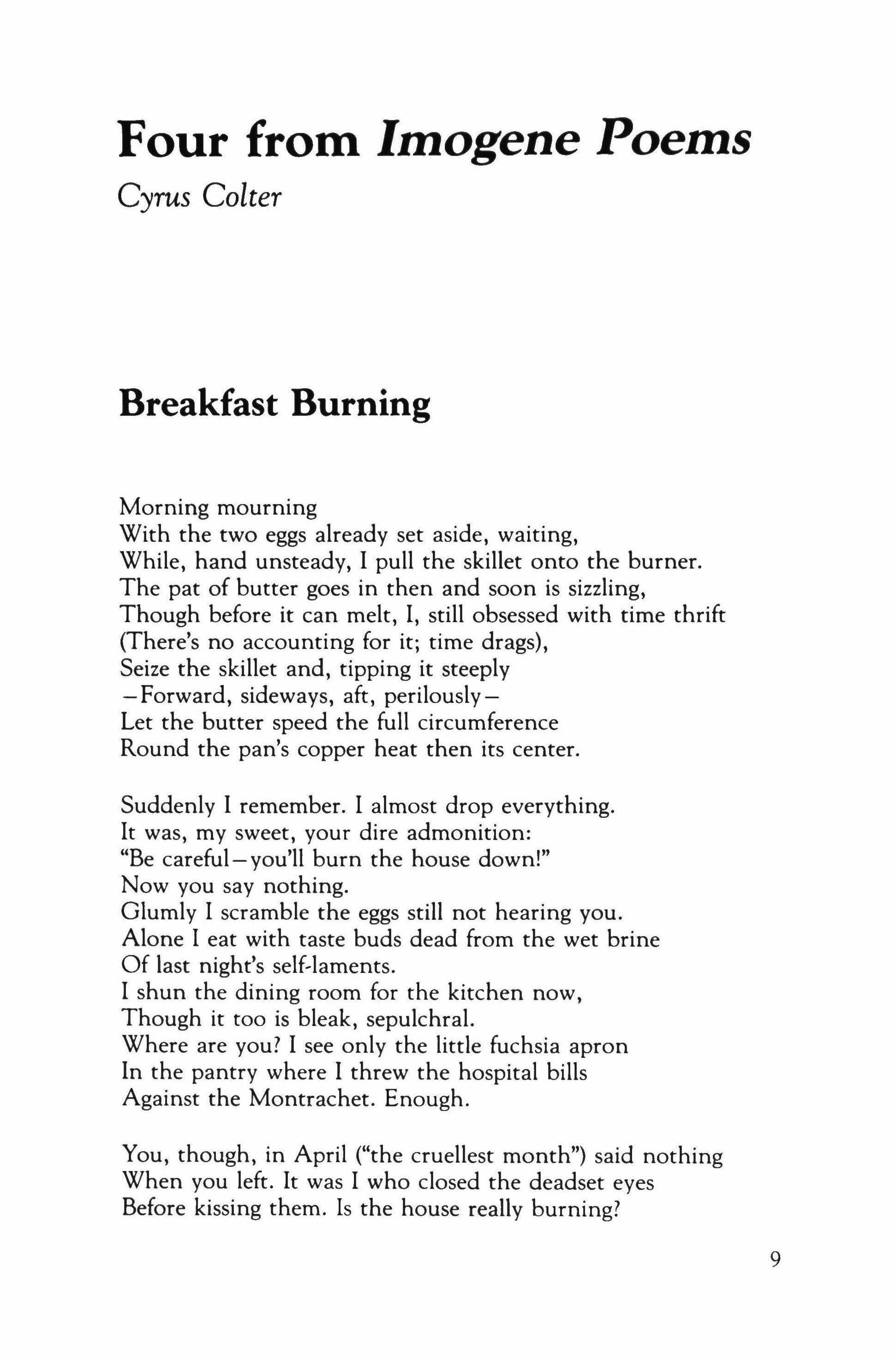
Breakfast Burning
Morning mourning
With the two eggs already set aside, waiting, While, hand unsteady, I pull the skillet onto the burner. The pat of butter goes in then and soon is sizzling, Though before it can melt, I, still obsessed with time thrift (There's no accounting for it; time drags), Seize the skillet and, tipping it steeply - Forward, sideways, aft, perilouslyLet the butter speed the full circumference Round the pan's copper heat then its center.
Suddenly I remember. I almost drop everything. It was, my sweet, your dire admonition: "Be careful-you'll burn the house down!"
Now you say nothing.
Glumly I scramble the eggs still not hearing you. Alone I eat with taste buds dead from the wet brine Of last night's self-laments. I shun the dining room for the kitchen now, Though it too is bleak, sepulchral. Where are you? I see only the little fuchsia apron In the pantry where I threw the hospital bills Against the Montrachet. Enough.
You, though, in April ("the cruellest month") said nothing When you left. It was I who closed the deadset eyes Before kissing them. Is the house really burning?
9

I rejoice. There are no more relics of that time. Only spasm, heart colic, before advancing to the parapet, The fiery ragged edge, minus the trophies of your victory.
10
Gay Head

It is in his great book subtitled The Whale, Where he uses the convolute syntax I so venerate him for, a holy hybrid derived from Selected masters-Spenser, the Bard, Browne, Alighieri. It is in this whale of a book of Ishmael's he, Inter alia, celebrated Gay Head.
In those early days, of my honeyed high-wrought quest Of literary creed (before canker in the leaf}, Anything Melville spoke well of I itched to explore. With, then, your bemused indulgence, cherished one, We set out for a July fortnight on "The Head."
From Boston to Martha's Vineyard the Atlantic caroused In a joie,de,vivre sunlight off the plane's right wing, While I, under your swift, hard eye, tippled Boodle's gin. We arrived then at Mrs. Trumpet's Inn on the headland, Only to find the room spotless but the furniture so decrepit We hardly dare sit. At sunset, though, we went out, Where, high off Gay Head's promontory out to sea, The sky's blood-red refulgence unsettled the senses.
We stood there gazing out-you, the pro, silently studying The vast technical coloration, I, in a sudden plight Of libido, maniacally loosening my tie. It was, I guess, The Boodle's. Or else the far reaches of scarlet seascape. Or you, my love. I yearned. And led you back to Mrs. Trumpet'sAnd disaster! - where the bed broke down.
11
Northern Light
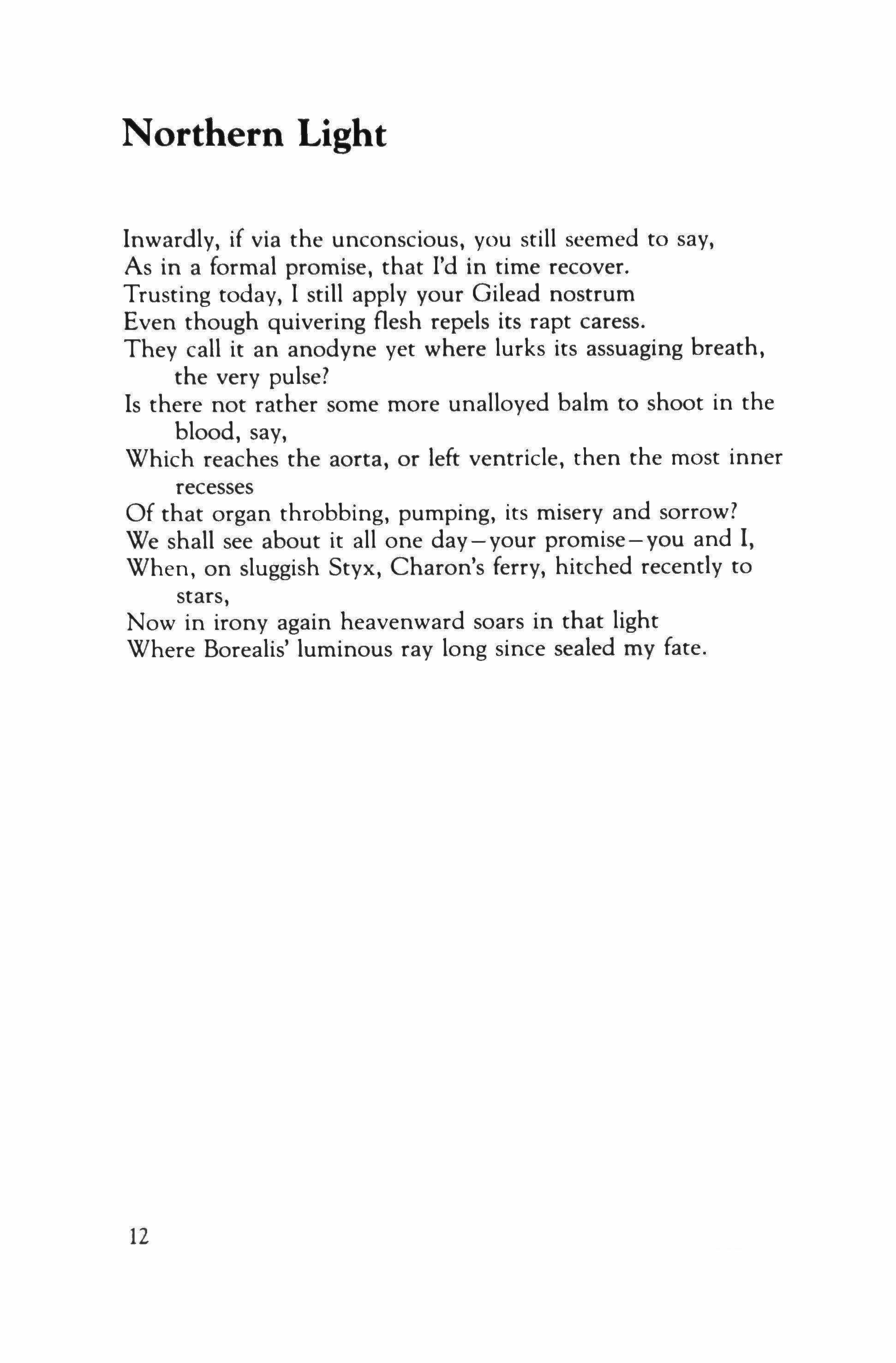
Inwardly, if via the unconscious, you still seemed to say, As in a formal promise, that I'd in time recover.
Trusting today, I still apply your Gilead nostrum Even though quivering flesh repels its rapt caress. They call it an anodyne yet where lurks its assuaging breath, the very pulse?
Is there not rather some more unalloyed balm to shoot in the blood, say, Which reaches the aorta, or left ventricle, then the most inner recesses
Of that organ throbbing, pumping, its misery and sorrow?
We shall see about it all one day-your promise-you and I, When, on sluggish Styx, Charon's ferry, hitched recently to stars, Now in irony again heavenward soars in that light Where Borealis' luminous ray long since sealed my fate.
12
Dream Boulevard

It was your role, voluntarily assumed - headswoman
On the scaffold, most earnest of the tense functionaries. You were gentle, though, made little obeisances even, And asked my pardon as, wrists manacled, I knelt in the straw.
Nor did you black-mask your comely face, Rather left it to confront the angst of my downcome
As momentarily you rested the axe-blade behind you
As if I could not see its gleaming flange-end,
But the abbe had confessed me and I was ready, Or thought I was, until you caught the reflexive hesitancy
And kindly bade me comply now. Near weakening, though, You looked away. It strengthened me, my sweet. I blessed you.
Whereupon, crawling forward, shackles removed, I dropped To grasp the block. Then nestled my neck in its new-moon aperture
As the constable stepped back as if the better to let The gawking rabble behold Barabbas in extremis.
Then the fear ceased and I saw in far-off memory mists
Our little bistro off St. Germain where we oft sat in Pink-hued twilights and where, sipping their absinthes, Seedy Basque habitues in berets stared at your pristine beauty And made me proud.
Then you smiled at me before gazing out on the boulevard at the pair
Of plodding gendarmes leading their bikes like docile calves. I only watched you, too ineffably moved to speak.
But now, like the very wrath of God, you raise the teetering blade
On high as the gasping crowd, mouths agape, waits to shout"La belle dame sans merci!"
13
Works by Cyrus Colter

The Beach Umbrella. Iowa City: University of Iowa Press, 1970. Chicago: Swallow Press, 1970, paperback edition.
The Rivers of Eros. Chicago: Swallow Press, 1972. New York: Curtis Books, 1973; New York: Popular Library, c. 1982; Urbana: University of Illinois Press, 1991, paperback editions.
The Hippodrome. Chicago: Swallow Press, 1973. New York: Popular Library, 1976, paperback edition.
Night Studies. Chicago: Swallow Press, 1979.
A Chocolate Soldier. New York: Thunder's Mouth Press, 1988.
The Amoralists & Other Tales. New York: Thunder's Mouth Press, 1988. London: Penguin, 1990, paperback edition.
Note: Several of Colter's books have been translated into Japanese, Italian, Hungarian and French.
14
Linda McCarriston: The Terrence Des Pres Prize for Poetry

TriQuarterly Books is pleased to announce that Linda McCarriston's volume of new poems, Eva-Mary is the second winner of the Terrence Des Pres Prize for Poetry. Her collection of poems, Eva-Mary, is published by TriQuarterly Books/Another Chicago Press this fall.
Terrence Des Pres (1939-87), the brilliant and engaged author of The Survivor: An Anatomy of Life in the Death Camps and two posthumous works: Praises and Dispraises: Poetry and Politics, the 20th Century and Writing into the World, brought to his writings a unique sensitivity to literary texts, especially poetry. Seeking human decency where others saw degradation and pain, Des Pres found a triumphant use for both anger and the spirit of play in poetry that is political in a profound sense. His passionate attention to both human suffering and the large-spirited vitality of those who endure inspired the Terrence Des Pres Prize for Poetry, which was established in his memory.
Linda McCarriston's winning collection is a remarkable accomplishment; the subjects of her poems and the depth of her concerns are very much in the spirit of Terrence Des Pres. With great intensity of expression McCarriston has created an extended poetic meditation on suffering and change, on cruelty and innocence, on love and endurance. Exploring stories of what she calls "acculturation in ignorance," she writes of domestic violence and emotional inheritance in powerful and memorable ways.
Linda McCarriston grew up in a working-class tenement in Lynn, Massachusetts. As an undergraduate at Emmanuel College in Boston, she won recognition for her writing from the Atlantic and Mademoiselle and gave a reading with Robert Lowell sponsored by the New England Poetry Association. After she received her B.A. in 1965, she married
15

and raised two sons before resuming her poetic work twelve years later. Since 1979 she has also made a home for three stepchildren and two nieces. Her first book of poems, Talking Soft Dutch, was published by Texas Tech University Press in 1984. Ms. McCarriston's work has appeared in TriQuarterly, Poetry, Ploughshares, Georgia Review, Poetry Northwest, NER/BLQ and other journals. She has taught in Vermont College since 1979.
Eva-Mary may be ordered by bookstores through Independent Literary Publishers Association, P.O. Box 816, Oak Park, IL 60303, 1-800· 242-4572. Individuals may also place orders through ILPA. (see page 00.)
The judges for the 1991 Des Pres Prize were Reginald Gibbons, Susan Hahn and Campbell McGrath. The Witter Bynner Foundation for Poetry, Inc. is supporting this year's award.
16
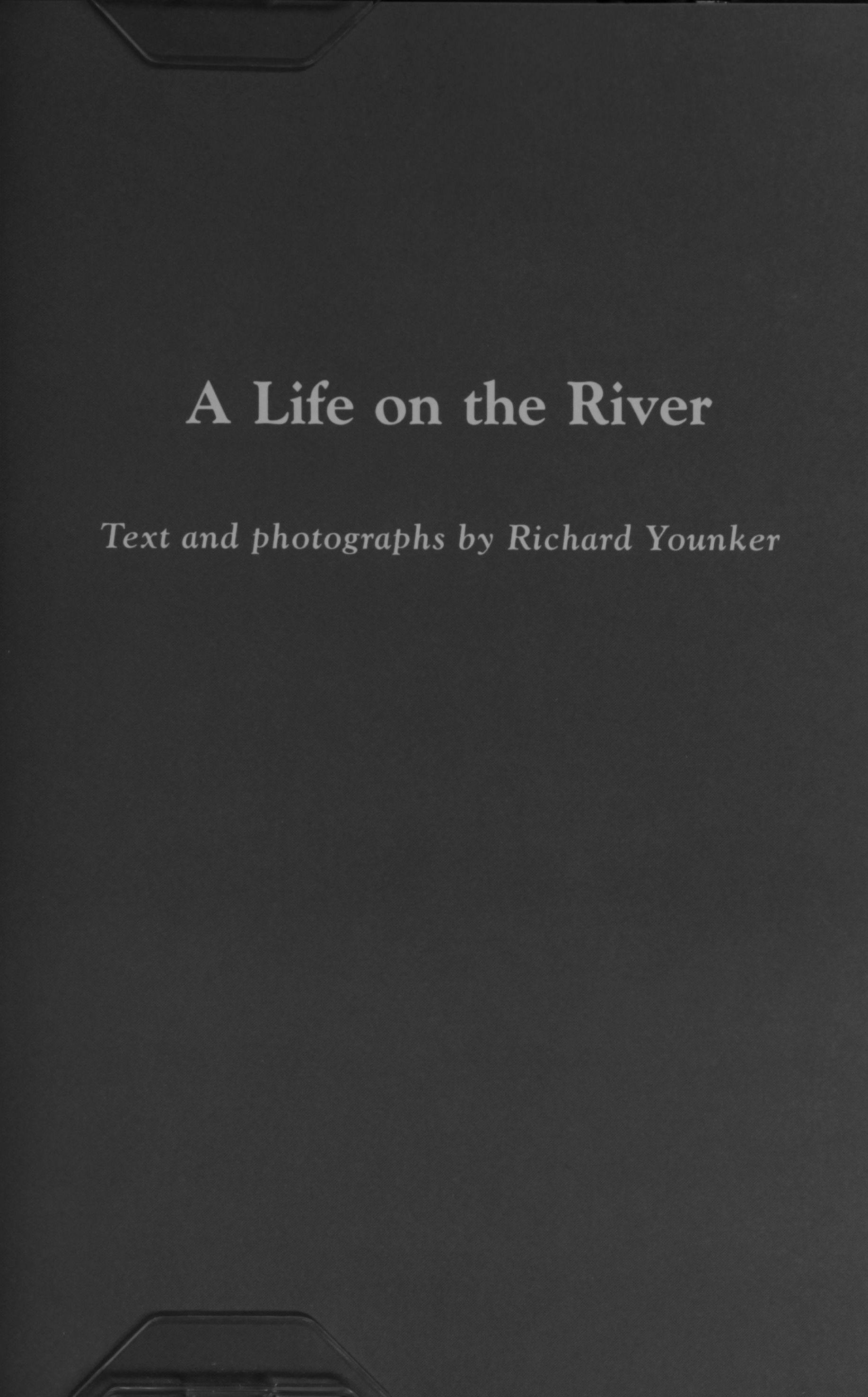

A Life on the River
Richard Younker

I had been photographing a farm veterinarian, Chuck Josephson, in northwestern Illinois. We stop at barns and pastures where Doc treats animals and I take pictures. I enjoy the time, as Chuck's personality is as cheery as his hometown's name: Roseville. My last evening I dine with him and his wife, Mary. Their home pleases the eye. Stained-oak beams frame both light, blue walls and laced curtains. Conversation is pleasant as one course follows another. After dinner Chuck shows movies of a fishing trip to northern Canada, and then it is time to go.
The couple sees me to their door. I am welcome back anytime. But when they ask of my destination I never will forget the look of dismay which twins their faces at my response. Something which says they would fear less for my safety if instead of going to Clinton, I would journey to hell and interview Beelzebub. With that, I walk into the October night to begin my search for those net lifters, the Mississippi River commercial fishermen.
At Butch Ballenger's shell camp outside Clinton where he will pur, chase washboard and three-ridge clams from the boatloads driven in, Butch and I are joined by a sixtyish, black-haired man. "Say, if you're looking for commercial fishermen, Bruce Williams is your man," he offers. "Boy, the stories I could tell like goin' to California. See, Bruce was always sayin' he'd quit fishin' and go west, though we never thought he would. But one day he come off the river and goes straight to the bank, draws out all his money and flags a cab to the airport. "'Bout three o'clock that afternoon he calls me, all upset and every' thing. 'They won't let me go to California!' 'Why?' I says. "Cause they
19

won't let me on the plane.' 'How come?' 'I don't know, you gotta come out and help me.'
"Well, I seen why they wouldn't let him board. Still had on his fishing gear, slime and scales all over 'em. 'You can't go with your boots on,' I told him. 'What have I got to do?' 'Buy some clothes,' I says. Then I realized that, other than for waders and coveralls, he'd never been in a clothing store, his sister bought him everything else, even underwear. So we go back to the mall, went from one department to another. 'I'll take this shirt, these pants, those shoes,' he says; none of 'em matched, of course. All the time peelin' off his slicks. Just left 'em right there on the floor. Then I took him out to the airport. Didn't see him again for five years
Another time he was comin' out of a bar, all tanked up like usual, though he don't drink no more, and sees these six young fellas workin' over this old boy pretty good. Well, Bruce reaches into his truck and comes out with a chain saw. He'd been cuttin' holes in the ice for seinin'. Cranks her up and says, 'Hey, maybe this'll even things up a little bit.' Walks right at 'em as he's firin' it. Said them fell as flew out of there like shavings from a sawed log."
At his Oquawka, Illinois, fish market, six-foot-six-inch and twohundred-and-eighty-pound Dorrance Vice fills his office door to greet me. Squinting down the barrel of his forearm, he clasps my outstretched hand as if it is a piece of bait or undersized fish. "Sure, I'll find you some commercial fishermen, I got just the right ones," he says, then calls to two men, "Will you drive this fellow down to the dock? Willie and Dean should be taking off real soon."
I squeeze between two husky men in the pickup. We then travel down a dusty and deserted road in silence. Eventually one asks about my travels. A little later he volunteers, "Yeah, I picked up a hitchhiker out of Missouri, last week. After about thirty miles the fellow pulled a pistol on me. I guess he just got tired of riding. Well, shoot, I hit the brakes and he went into the windshield. Then I pulled my .45 from under the seat and let him have it right between the eyes. Dumped him off in the next cornfield."
Both my guides at the dock are built thickly. Willie, about five foot seven, has a full beard and Dean, six inches taller, has let a three-day growth stubble his jaw. Their longish hair blows wildly in the wind, which in turn chops the water beyond us. Willie thrusts an oily pair of slicks at me. "Better put these on, otherwise you'll get soaked."
Five minutes later we head upriver. Although densely wooded banks
20
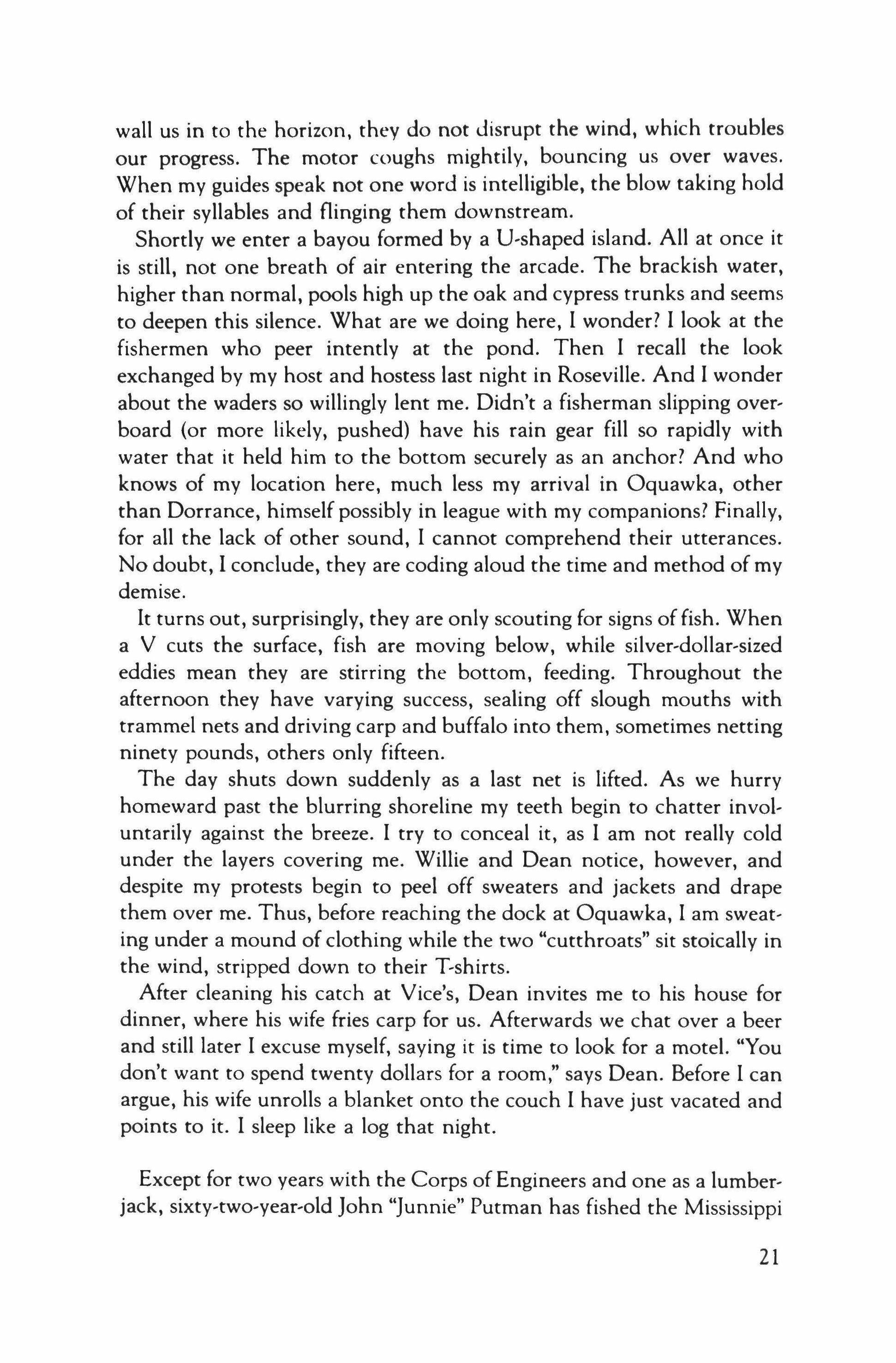
wall us in to the horizon, they do not disrupt the wind, which troubles our progress. The motor coughs mightily, bouncing us over waves. When my guides speak not one word is intelligible, the blow taking hold of their syllables and flinging them downstream.
Shortly we enter a bayou formed by a U-shaped island. All at once it is still, not one breath of air entering the arcade. The brackish water, higher than normal, pools high up the oak and cypress trunks and seems to deepen this silence. What are we doing here, I wonder? I look at the fishermen who peer intently at the pond. Then I recall the look exchanged by my host and hostess last night in Roseville. And I wonder about the waders so willingly lent me. Didn't a fisherman slipping overboard (or more likely, pushed) have his rain gear fill so rapidly with water that it held him to the bottom securely as an anchor? And who knows of my location here, much less my arrival in Oquawka, other than Dorrance, himself possibly in league with my companions? Finally, for all the lack of other sound, I cannot comprehend their utterances. No doubt, I conclude, they are coding aloud the time and method of my demise.
It turns out, surprisingly, they are only scouting for signs of fish. When a V cuts the surface, fish are moving below, while silver-dollar-sized eddies mean they are stirring the bottom, feeding. Throughout the afternoon they have varying success, sealing off slough mouths with trammel nets and driving carp and buffalo into them, sometimes netting ninety pounds, others only fifteen.
The day shuts down suddenly as a last net is lifted. As we hurry homeward past the blurring shoreline my teeth begin to chatter involuntarily against the breeze. I try to conceal it, as I am not really cold under the layers covering me. Willie and Dean notice, however, and despite my protests begin to peel off sweaters and jackets and drape them over me. Thus, before reaching the dock at Oquawka, I am sweating under a mound of clothing while the two "cutthroats" sit stoically in the wind, stripped down to their T-shirts.
After cleaning his catch at Vice's, Dean invites me to his house for dinner, where his wife fries carp for us. Afterwards we chat over a beer and still later I excuse myself, saying it is time to look for a motel. "You don't want to spend twenty dollars for a room," says Dean. Before I can argue, his wife unrolls a blanket onto the couch I have just vacated and points to it. I sleep like a log that night.
Except for two years with the Corps of Engineers and one as a lumberjack, sixty-two-year-old John "[unnie" Putman has fished the Mississippi
21
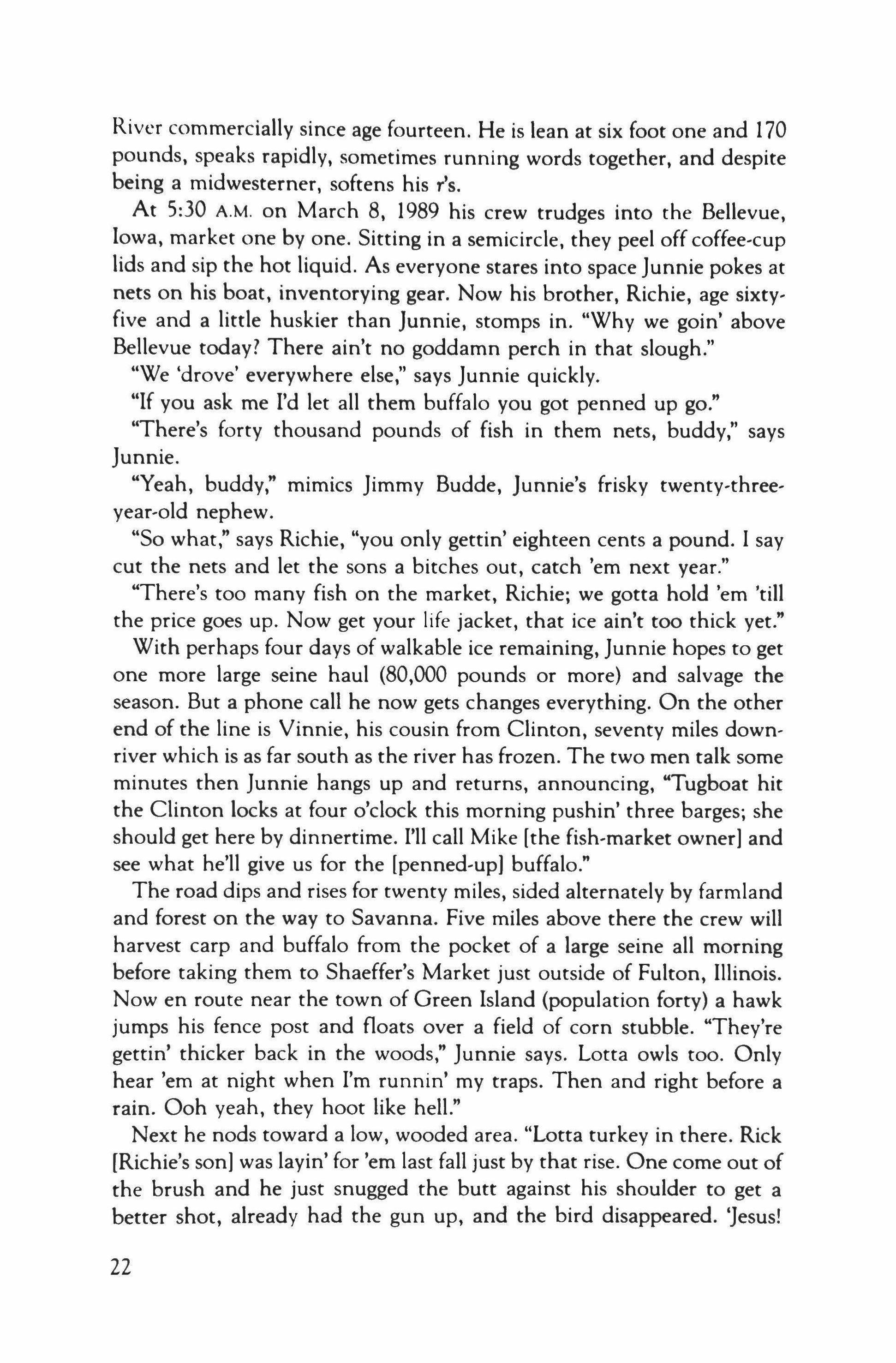
River commercially since age fourteen. He is lean at six foot one and 170 pounds, speaks rapidly, sometimes running words together, and despite being a midwesterner, softens his r's.
At 5:30 A.M. on March 8, 1989 his crew trudges into the Bellevue, Iowa, market one by one. Sitting in a semicircle, they peel off coffee-cup lids and sip the hot liquid. As everyone stares into space [unnie pokes at nets on his boat, inventorying gear. Now his brother, Richie, age sixtyfive and a little huskier than junnie, stomps in. "Why we goin' above Bellevue today? There ain't no goddamn perch in that slough."
"We 'drove' everywhere else," says junnie quickly.
"If you ask me I'd let all them buffalo you got penned up go."
"There's forty thousand pounds of fish in them nets, buddy," says [unnie.
"Yeah, buddy," mimics Jimmy Budde, junnie's frisky twenty-threeyear-old nephew.
"So what," says Richie, "you only gettin' eighteen cents a pound. I say cut the nets and let the sons a bitches out, catch 'em next year."
"There's too many fish on the market, Richie; we gotta hold 'em 'till the price goes up. Now get your life jacket, that ice ain't too thick yet."
With perhaps four days of walkable ice remaining, Junnie hopes to get one more large seine haul (80,000 pounds or more) and salvage the season. But a phone call he now gets changes everything. On the other end of the line is Vinnie, his cousin from Clinton, seventy miles downriver which is as far south as the river has frozen. The two men talk some minutes then [unnie hangs up and returns, announcing, "Tugboat hit the Clinton locks at four o'clock this morning pushin' three barges; she should get here by dinnertime. I'll call Mike [the fish-market owner) and see what he'll give us for the [penned-up] buffalo."
The road dips and rises for twenty miles, sided alternately by farmland and forest on the way to Savanna. Five miles above there the crew will harvest carp and buffalo from the pocket of a large seine all morning before taking them to Shaeffer's Market just outside of Fulton, Illinois. Now en route near the town of Green Island (population forty) a hawk jumps his fence post and floats over a field of corn stubble. "They're gettin' thicker back in the woods," [unnie says. Lotta owls too. Only hear 'em at night when I'm runnin' my traps. Then and right before a rain. Ooh yeah, they hoot like hell."
Next he nods toward a low, wooded area. "Lotta turkey in there. Rick [Richie's son] was layin' for 'em last fall just by that rise. One come out of the brush and he just snugged the butt against his shoulder to get a better shot, already had the gun up, and the bird disappeared. 'Jesus!
22

where'd he go!' Next day he got a twenty-pounder, though. Blew his head clean off. You can't aim for the body, they got too much protectin' 'em. But they're fast, Rich. Outrun a deer. Ooh yeah. Over two hundred yards they eat up more ground than a buck."
Four hours later on the way to Shaeffer's Market our four-truck caravan stops beneath a towering pallisade. Everyone jumps from their trucks to peer across the ice. "There she is, the son of a bitch," says Rick. Far out in the channel the tug announces its presence. "Sounds like a cannon," Rick continues. "Worse than that," says his father, "boom like a steady roll of thunder when she hits it right." "Son of a bitch!" says Rick.
About ten people occupy the market that evening. Some lean against [unnie's boat, which half fills the room; two more stand against the stove and others form a semicircle seated on steel chairs. For some time talk centers on the tugboat. Soon I am accorded a seat between junnie and his nephew, Billy Riestorfer, who is a lean six foot, five inches. He walks and speaks rapidly, eyeing listeners keenly. His prowess as a woodsman and later, hunter, go back to high school when he was given the nickname, "Timber Wolf."
"Rich, I grew up around here, know all these guys: good, honest, hardworking folk," he says. "But you wanna know something? Before Vietnam I never killed anything; never even shot a rabbit. No sir. Ask any of these fellas. But that Southeast Asia deal had to be a son of a bitch. Oh, they trained you all right. Take you up in that chopper, settle her over the target and whammo! Then on the ground there's your hand-to-hand combat, pistols, bayonet, grenades. That shir'll change you, boy. Used to trust everybody, but today, someone comes at me, I'll squeeze one off. Don't think I won't.
"But don't worry about these boys, here, Rich. You're safe with them; me too. But like I say, Rich, any outside force advances on us and the situation don't look right: out of the holster she comes, and right between the eyes. COMBAT READY, RICH!" (Although he would apologize the next day, saying it was just "whiskey talk," it didn't make me feel any more comfortable at the time.)
Another voice addresses me: "Rich, if you can't kill this, you're not a man." I look up at Doug, standing and waving [unnie's bottle, still holding three inches of liquid. At my refusal Doug tilts back his head, drains the contents and grinning, deposits the vessel in junnie's lap.
A second later the room explodes in sound as junnie slams the offending empty into the floor. "I told you to save me a hooker!" he bellows. "I ain't gonna fuhgit this, Doug, I ain't gon' fuhgit it." As Doug moves off
23
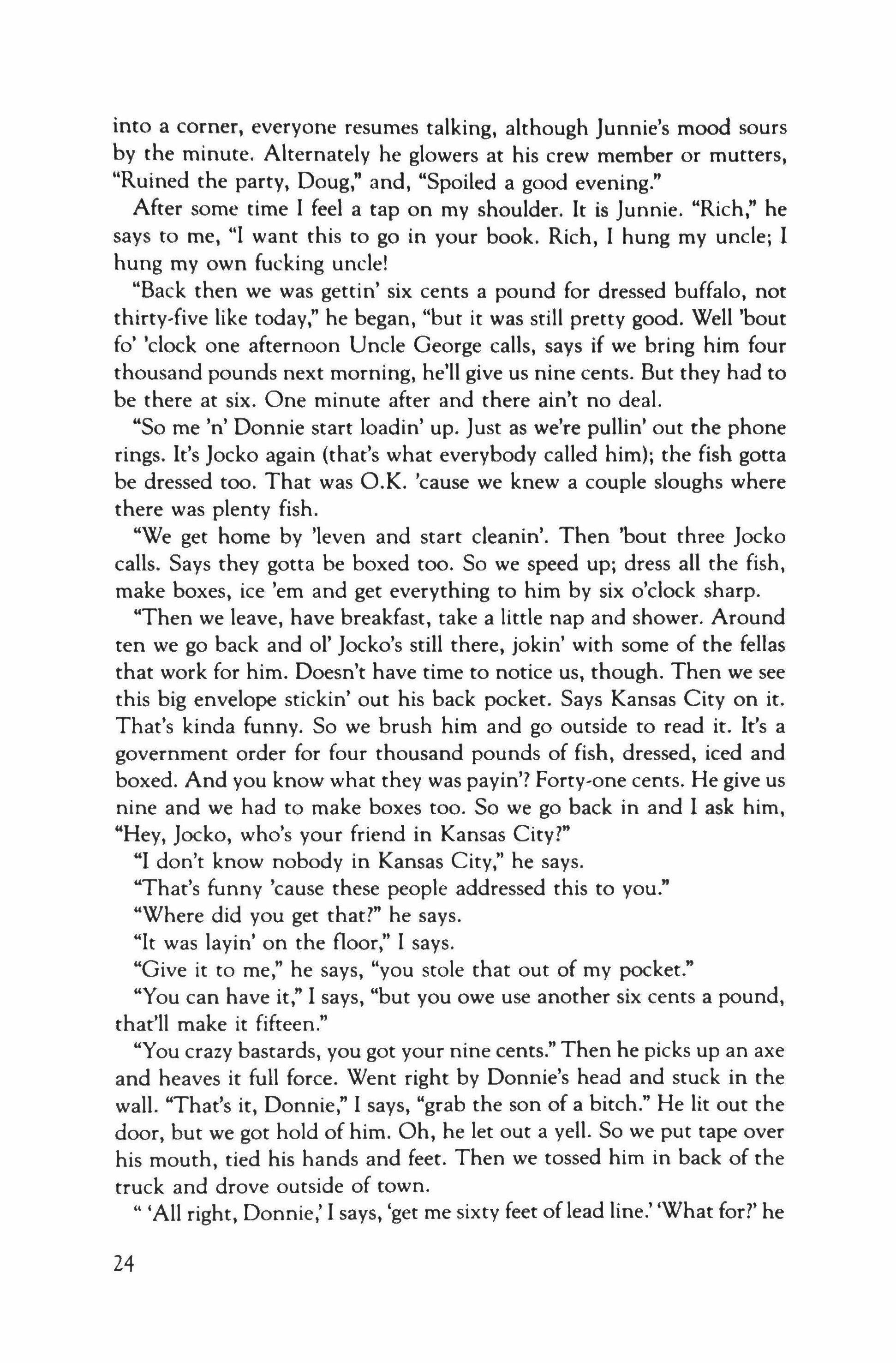
into a corner, everyone resumes talking, although [unnie's mood sours by the minute. Alternately he glowers at his crew member or mutters, "Ruined the party, Doug," and, "Spoiled a good evening."
After some time I feel a tap on my shoulder. It is [unnie. "Rich," he says to me, "I want this to go in your book. Rich, I hung my uncle; I hung my own fucking uncle!
"Back then we was gettin' six cents a pound for dressed buffalo, not thirty-five like today," he began, "but it was still pretty good. Well 'bout fo' 'clock one afternoon Uncle George calls, says if we bring him four thousand pounds next morning, he'll give us nine cents. But they had to be there at six. One minute after and there ain't no deal.
"So me 'n' Donnie start loadin' up. Just as we're pullin' out the phone rings. It's [ocko again (that's what everybody called him); the fish gotta be dressed too. That was O.K. 'cause we knew a couple sloughs where there was plenty fish.
"We get home by 'leven and start cleanin'. Then 'bout three jocko calls. Says they gotta be boxed too. So we speed UPi dress all the fish, make boxes, ice 'em and get everything to him by six o'clock sharp.
"Then we leave, have breakfast, take a little nap and shower. Around ten we go back and 01' jocko's still there, jokin' with some of the fellas that work for him. Doesn't have time to notice us, though. Then we see this big envelope stickin' out his back pocket. Says Kansas City on it. That's kinda funny. So we brush him and go outside to read it. It's a government order for four thousand pounds of fish, dressed, iced and boxed. And you know what they was payin'? Forty-one cents. He give us nine and we had to make boxes too. So we go back in and I ask him, "Hey, jocko, who's your friend in Kansas City?"
"I don't know nobody in Kansas City," he says.
"That's funny 'cause these people addressed this to you."
"Where did you get that?" he says.
"It was layin' on the floor," I says.
"Give it to me," he says, "you stole that out of my pocket."
"You can have it," I says, "but you owe use another six cents a pound, that'll make it fifteen."
"You crazy bastards, you got your nine cents." Then he picks up an axe and heaves it full force. Went right by Donnie's head and stuck in the wall. "That's it, Donnie," I says, "grab the son of a bitch." He lit out the door, but we got hold of him. Oh, he let out a yell. So we put tape over his mouth, tied his hands and feet. Then we tossed him in back of the truck and drove outside of town
'All right, Donnie,' I says, 'get me sixty feet of lead line.' 'What for?' he
24
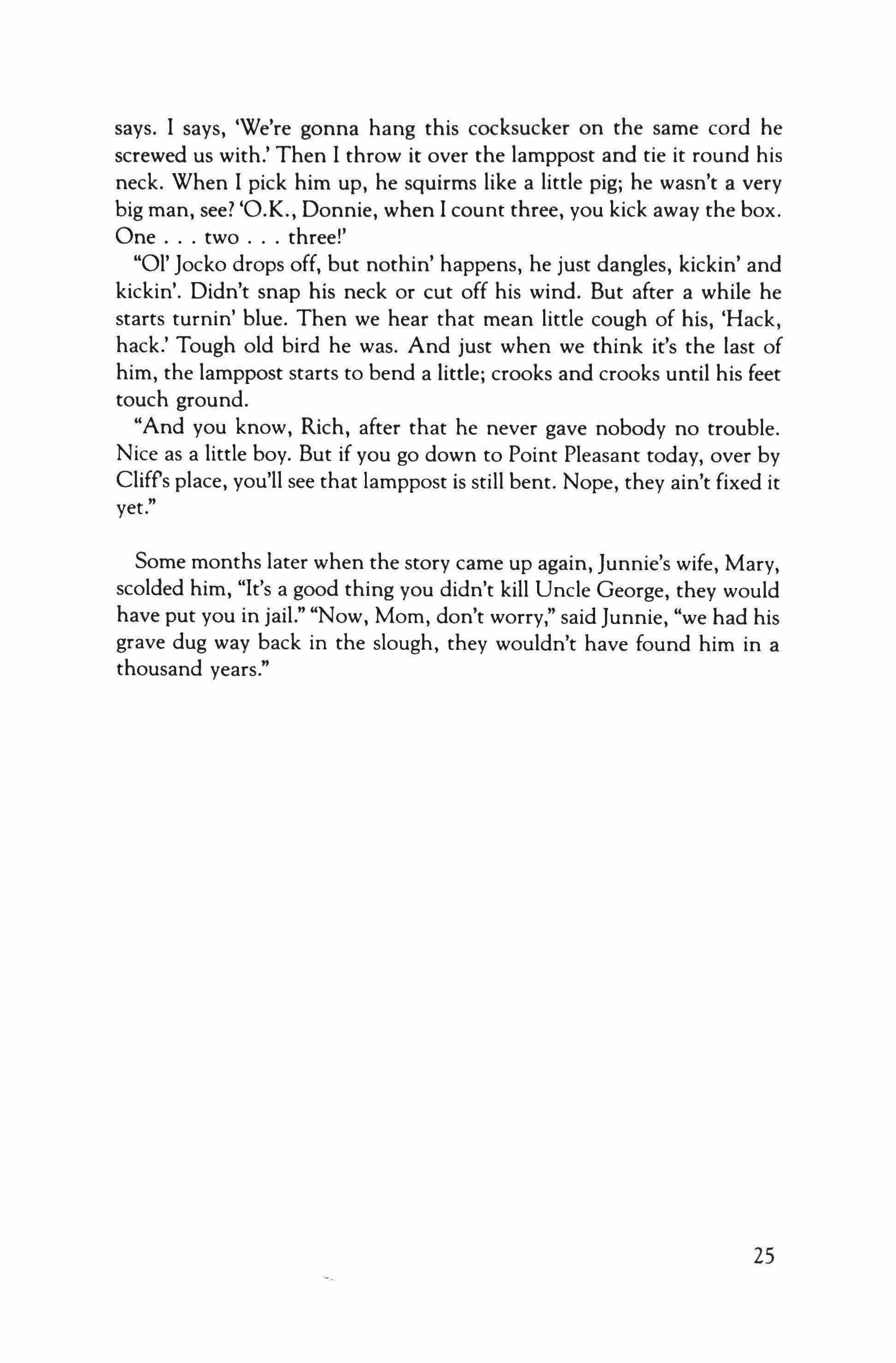
says. I says, 'We're gonna hang this cocksucker on the same cord he screwed us with.' Then I throw it over the lamppost and tie it round his neck. When I pick him up, he squirms like a little pig; he wasn't a very big man, see? 'O.K., Donnie, when I count three, you kick away the box. One two three!'
"01' jocko drops off, but nothin' happens, he just dangles, kickin' and kickin'. Didn't snap his neck or cut off his wind. But after a while he starts turnin' blue. Then we hear that mean little cough of his, 'Hack, hack.' Tough old bird he was. And just when we think it's the last of him, the lamppost starts to bend a little; crooks and crooks until his feet touch ground.
"And you know, Rich, after that he never gave nobody no trouble. Nice as a little boy. But if you go down to Point Pleasant today, over by Cliffs place, you')) see that lamppost is still bent. Nope, they ain't fixed it yet."
Some months later when the story came up again, junnie's wife, Mary, scolded him, "It's a good thing you didn't kill Uncle George, they would have put you in jail." "Now, Mom, don't worry," said [unnie, "we had his grave dug way back in the slough, they wouldn't have found him in a thousand years."
2S

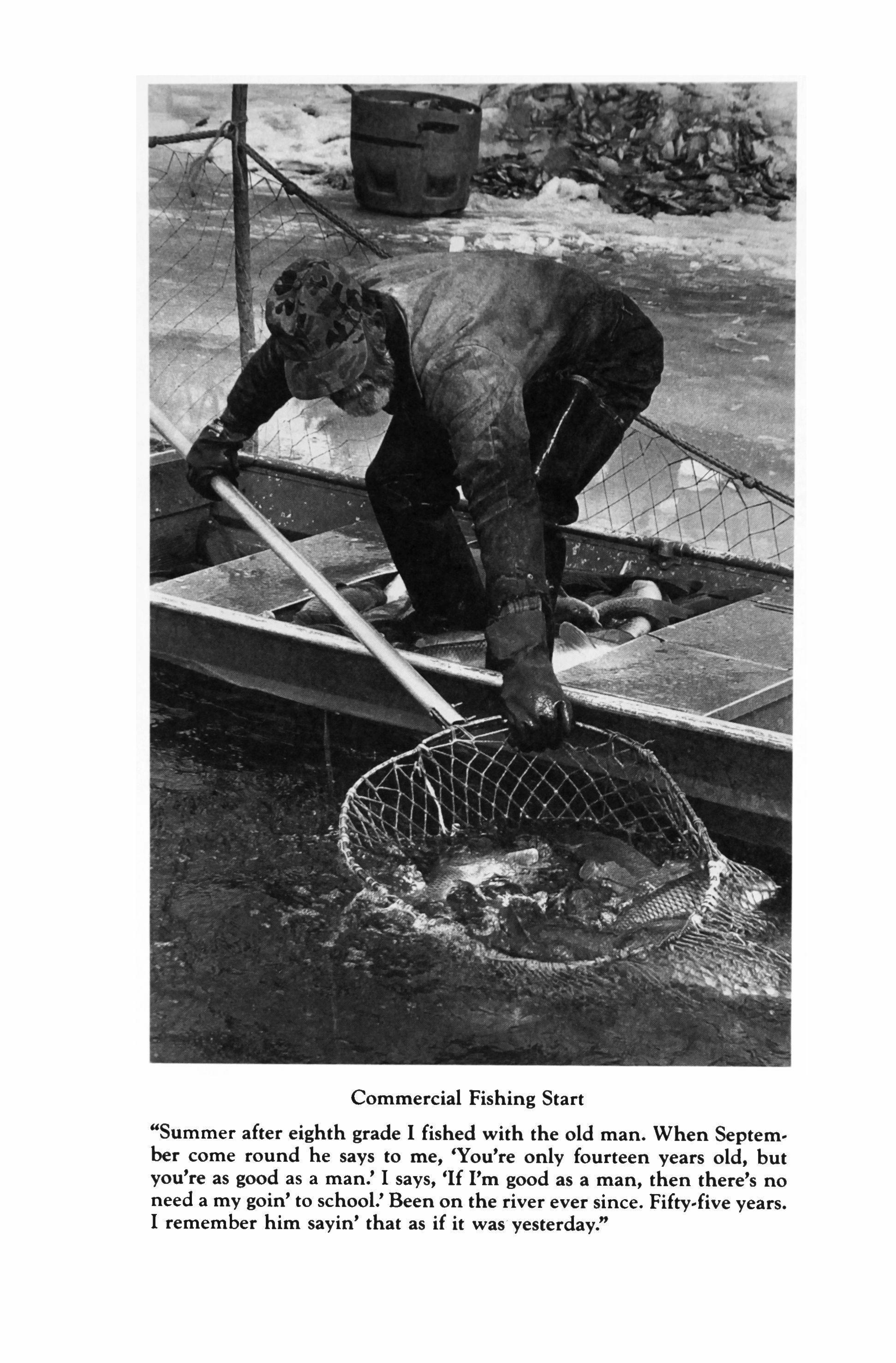
Commercial Fishing Start
"Summer after eighth grade I fished with the old man. When September come round he says to me, 'You're only fourteen years old, but you're as good as a man.' I says, 'If I'm good as a man, then there's no need a my goin' to school.' Been on the river ever since. Fifty-five years. I remember him savin' that as if it was yesterday."

A Respite from Fishing
"Last fall I was doein' in the bottom and I hear this drip, drip, drip. Opened my eyes, Rich, and couldn't see nothin'. Drip, drip .•• I turned my head real slow and there was a doe takin' a drink 0' water. I didn't say nothin' or move, just watched for 'bout two minutes. Then I put my lips together and give her a big kiss, 'smack!'
"Ooh, she jerked her head up and looked at me, no more than four feet away, with them big, baby eyes. Couldn't figure out what made the noise, Rich. Twitched her nose. Looked at each other for forty seconds, then I said, 'Hoo!' and she took off down the slough."
Winter Crew
of 'em think you just tuck a lunch bucket under your arm and run to work. Don't go that way. There's patchin' nets, tarrin' 'em, curtin' twine and retvin' it; 'posed to be seven inches between knots. Always somethin' to do off the river. No, this ain't no Monday-Friday, nine-to-five job."
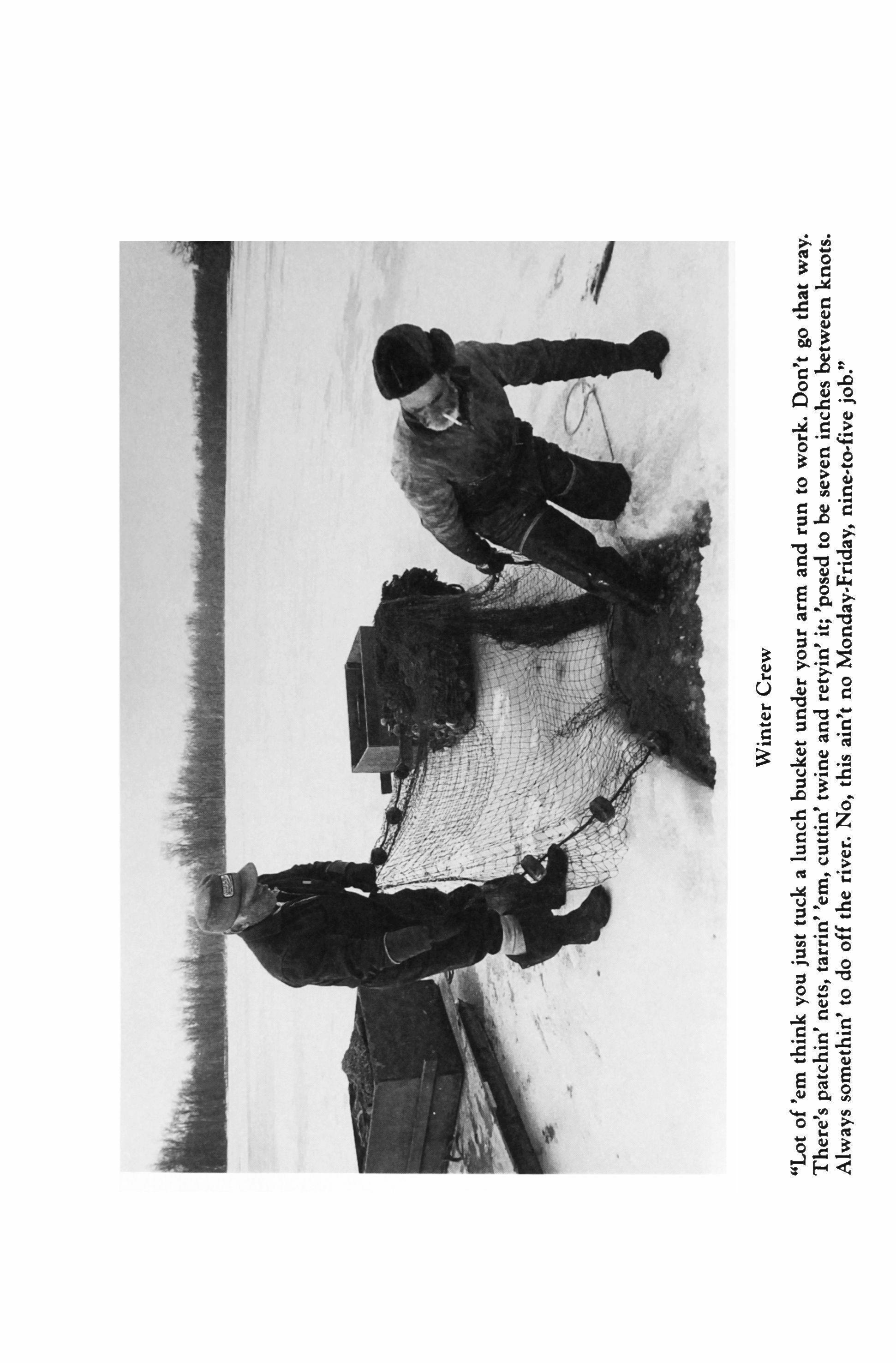

Junnie and Roger Keil, a Pig Farmer, Discuss a Local Government Project
JUNNIE: Government spent all this money diggin' out the slough to make a refuge. But then they find out the ground's so sandy it won't hold no water.
ROGER: I dropped by their office last month. "Tell you how to fill it up," I says. "Get all them state workers to stand on the bank and piss in it." Oh, they didn't like that.
JUNNIE: They always got a study goin'. Then they start another one to see if the first was any good.
ROGER: All those Ph.D.'s they got workin' in there. I told 'em what they oughta do is buy a six-pack and sit down with some of these boys that's worked the river all their lives, like Junnie. You'd get a pretty clear picture from 'em. Oh, they didn't wanna hear that. Now they see me comin', everyone runs to the computer hookup or they're all of a sudden talkin' long-distance. Hell, they ain't had a phone call down there in two years.
Pesticides
killed all them birds. While back when we seined for crawdads, you could fill a five-gallon washtub Now we cast all mornin', maybe net a couple pints. But in '88 with the drought they come back strong many as you want. See, wasn't any rain to wash chemicals in the crick. There's your proof."
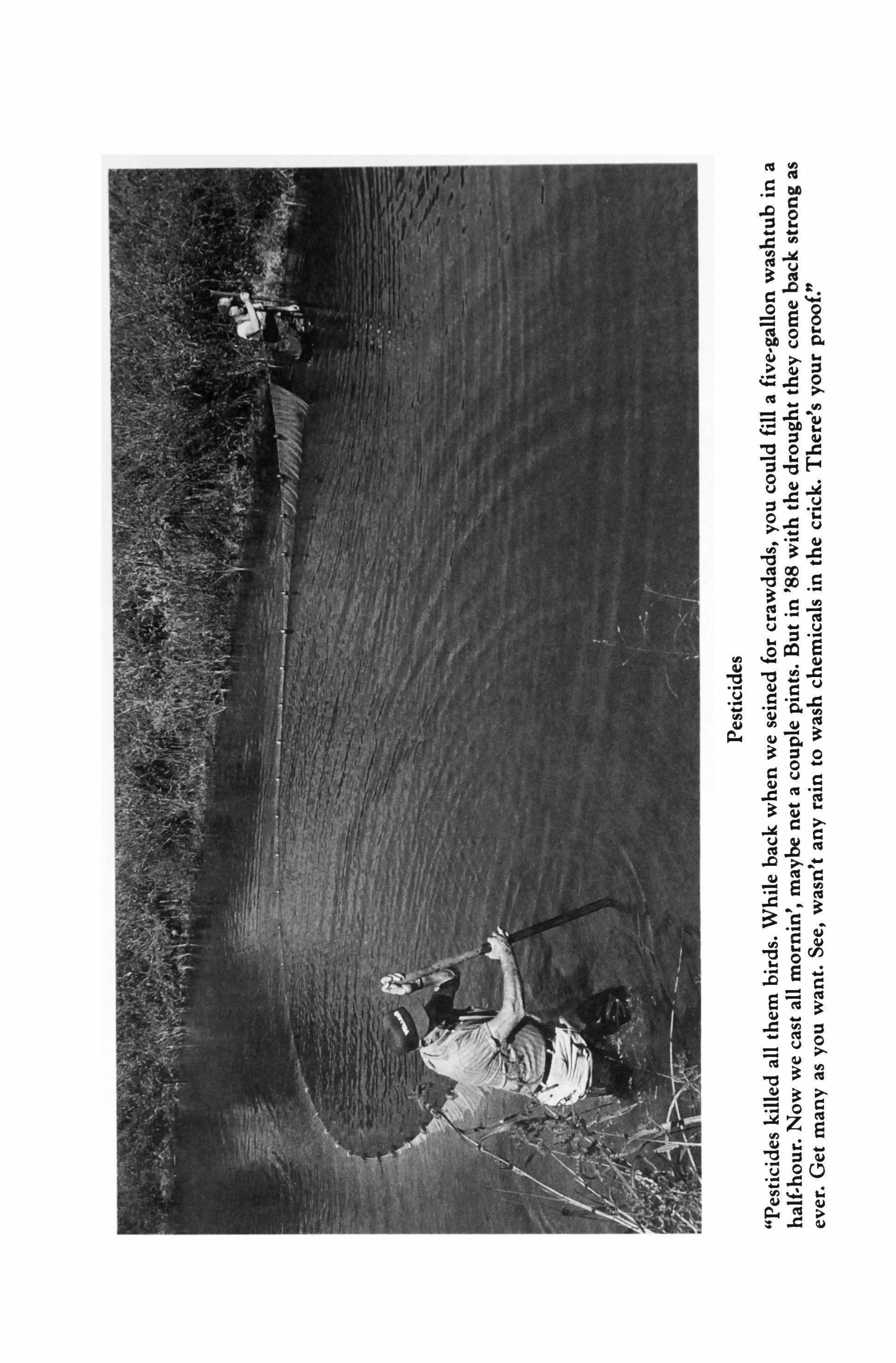

River Rats
"All the river rats is gone. Ain't seen one for twenty years. Like Old Toot Waite; he lived on one of the islands. Grew his own vegetables, caught all the fish he wanted, cooked 'em up. When his frvin' pan larded up he'd just hold it over a fire and let the fat run off. Coffee cups was stained so thick he could only pour three teaspoons in 'em. Offered me some once. I said, 'Thanks, I got my own thermos!"
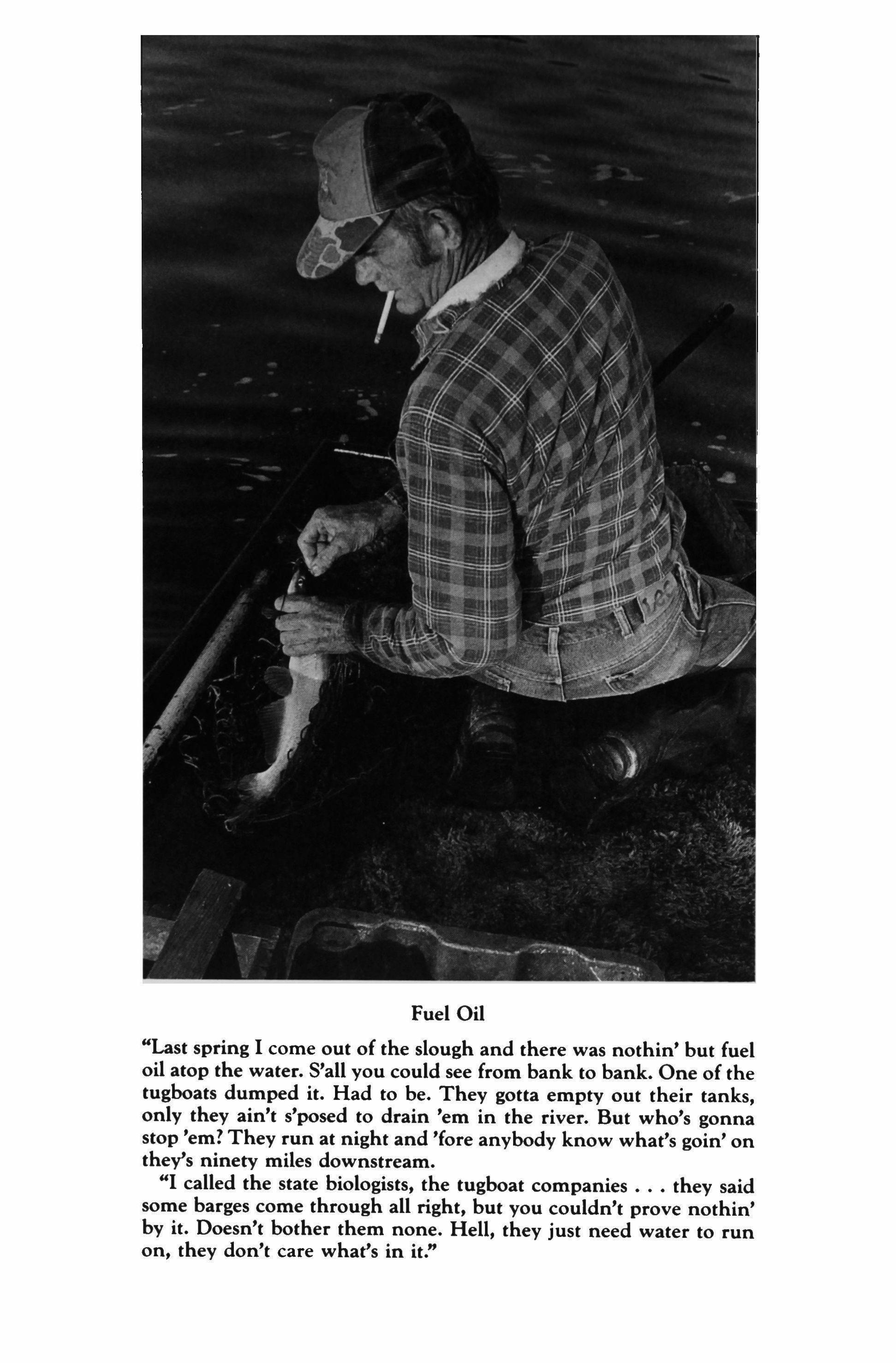
Fuel Oil
"Last spring 1 come out of the slough and there was nothin' but fuel oil atop the water. S'all you could see from bank to bank. One of the tugboats dumped it. Had to be. They gotta empty out their tanks, only they ain't s'posed to drain 'em in the river. But who's gonna stop 'em? They run at night and 'fore anybody know what's goin' on thev's ninety miles downstream.
"I called the state biologists, the tugboat companies •.• they said some barges come through all right, but you couldn't prove nothin' by it. Doesn't bother them none. Hell, they just need water to run on, they don't care what's in it."

Ponch I
"She's part hound, which makes her bullheaded, and the setter makes her sassy. Won't do nothin' I tell her 'less she wants to. But she loves that river. Won't let me go without her. And she sees everything out there. You light a cigar or blow your nose, she notices. And you should see her jump on the fish box when we raise nets and she don't want to leave the river. If I stop at the market on the way home she'll follow me. But once I get back to the shed she'll stay in the truck. For hours. Overnight sometimes. Afraid I won't take her along next time. Tried to take her out a couple times and she bit me!"
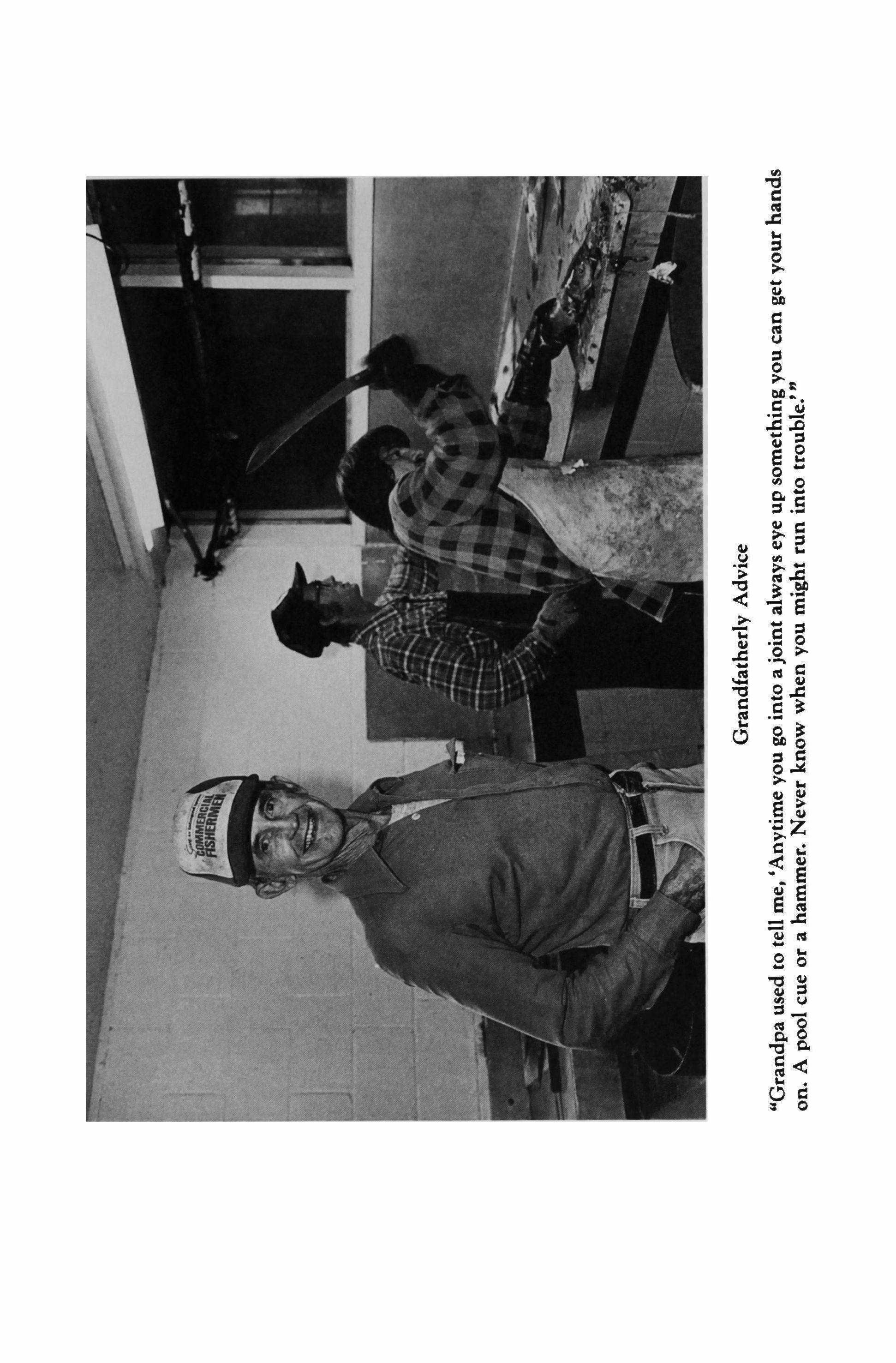
Grandfatherly Advice
"Grandpa used to tell me, 'Anytime you go into a joint always eye up something you can get your on. A pool cue or a hammer. Never know when you might run into trouble.'''

Smink Brothers
"One time Uncle George's little finger got infected. It got pretty bad, but he didn't want to see the doctor. So one of his workers said to lay it on the table, said he'd cut it off. Old George had a different handshake after that.
"It was a lot rougher back in the old days, boy. One day the game warden stopped Jack Smink to look in his boat. Grabbed the bow, but he didn't get a good grip on it and she kind of slipped away from him. Old Jack picked up his axe, said, 'You put your hand on there again I'll cut it off.' Game warden reached out again, didn't think he'd do it, see. Well Smink swung on 'im; sunk the blade two inches into the side of the boat, halfway up to the handle. Game warden left his hand on there, he'd a' cut it clean off.
"All them Smink brothers was like that. Wouldn't let someone's chicken cross their yard. Come out with a club, they would. They lived right next door to us. None of 'em married either, stayed bachelors all their lives."
 Yankin' and Liftin' "Yankin' and liftin' their whole lives; that's all they done."
Yankin' and Liftin' "Yankin' and liftin' their whole lives; that's all they done."
Turtle Trapper
"The old man took me proddin' when I was nine. He was a farmer, only went a few times a year. I got hooked pretty quick, though. Every day I put on his waders and stumbled down to the nearest crick. Boots blistered my feet, could barely see over the apron top, but I was bound and determined to get turtle."
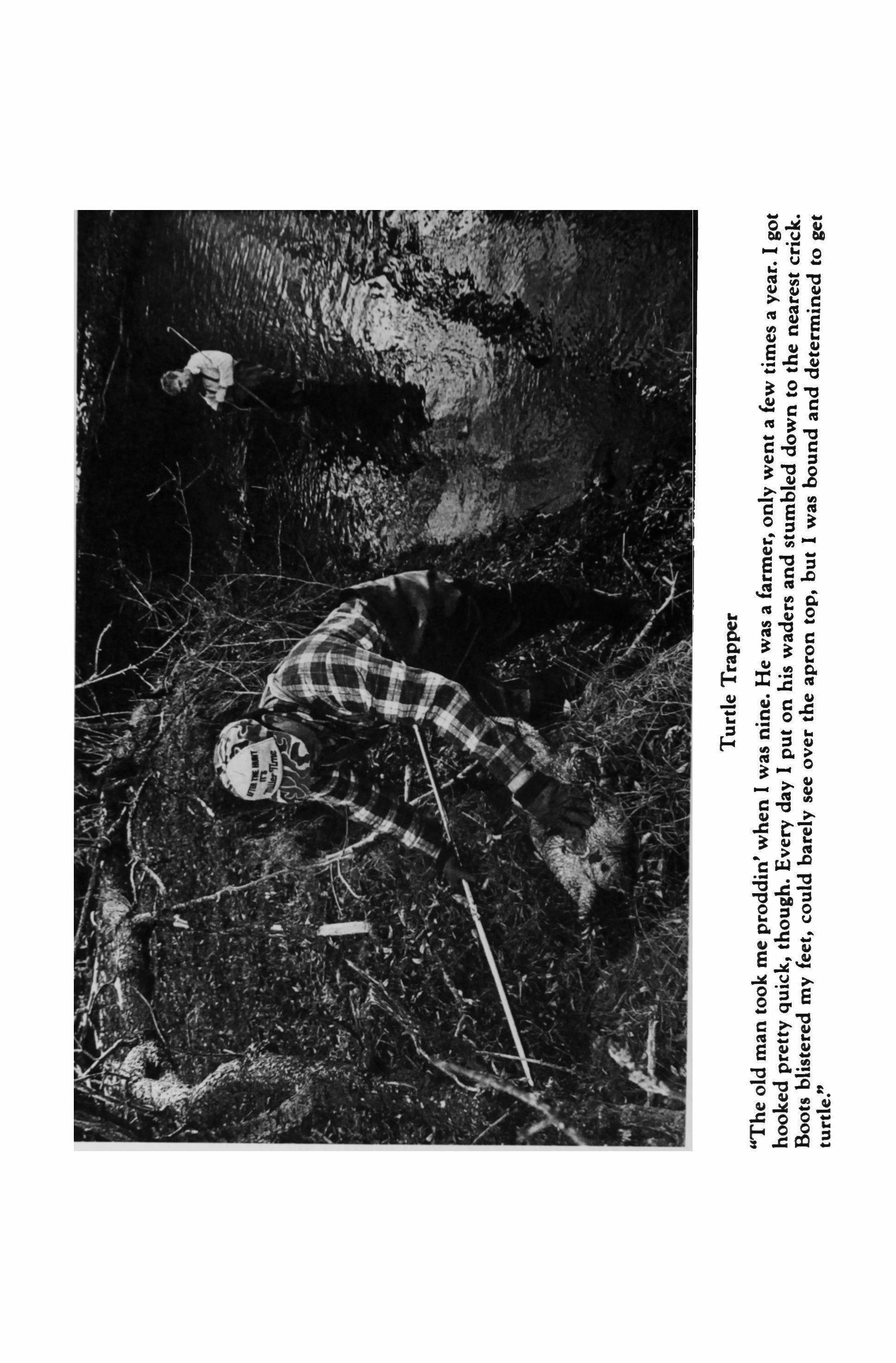
"1 been trappin' so long everyone around here's startin' to call me 'Turtle
 Turtle Trapper
Turtle Trapper
Tall Tales
Johnny Payne

Right after Bart passed on, I got to cussing him late one winter afternoon for never having gone in with me to buy that little farm out on Clear Creek that went dirt cheap, when I was just out of the service and could have used a VA loan for the down payment. I'd been cootering with the Mustang transmission all afternoon, because I needed to go make some sales demonstrations in Nicholasville, seeing as how I was working on commission and I'd had to take time off to run errands connected with the funeral, two or three times a day between Berea where my mother and the funeral home were, and Lexington where I was, and Richmond where this new memorial garden was. And there I was laying on my back in the parking lot underneath the car, missing another half day's worth of commissions because the transmission had screwed up. It was raining sleet over my shins and shoes, and I'd busted my knuckles on the cold metal chassis, so I felt like somebody had the fingers of my right hand in a vise grip.
If me and him had bought that farm we all would've lived half a mile from the Chasteen community cemetery, where anybody who's ever lived in Disputanta can be buried for free, and me and a couple of buddies from around there could have built the coffin ourselves, custom-made with plenty of elbow room, and hauled it up the hill to the cemetery. A coffin is a simple design, a few hours' work at most, leaving us plenty of time to wash the body, shave it, dress it, put fresh clothes on it. That's the way they used to do it. No funeral homes and no embalm, ing. I couldn've taken off all the time I needed without asking anvbodv's permission, because I would've been my own boss. That's the reason I never became an auto mechanic. I don't mind the aggravation of tinkering with my own cars - in fact I usually enjoy it - but I don't want to be
40
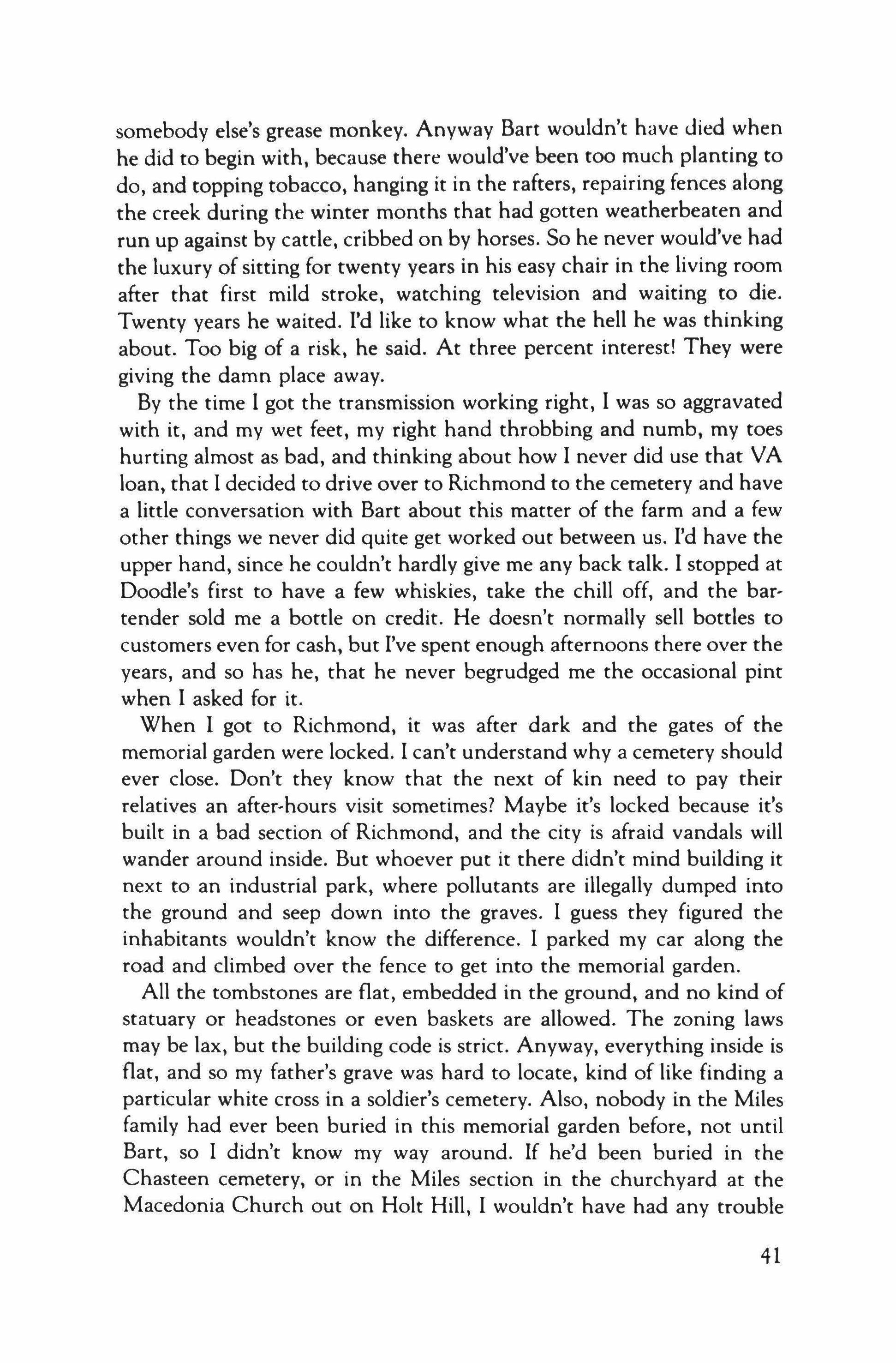
somebody else's grease monkey. Anyway Bart wouldn't have died when he did to begin with, because there would've been too much planting to do, and topping tobacco, hanging it in the rafters, repairing fences along the creek during the winter months that had gotten weatherbeaten and run up against by cattle, cribbed on by horses. So he never would've had the luxury of sitting for twenty years in his easy chair in the living room after that first mild stroke, watching television and waiting to die. Twenty years he waited. I'd like to know what the hell he was thinking about. Too big of a risk, he said. At three percent interest! They were giving the damn place away.
By the time I got the transmission working right, I was so aggravated with it, and my wet feet, my right hand throbbing and numb, my toes hurting almost as bad, and thinking about how I never did use that VA loan, that I decided to drive over to Richmond to the cemetery and have a little conversation with Bart about this matter of the farm and a few other things we never did quite get worked out between us. I'd have the upper hand, since he couldn't hardly give me any back talk. I stopped at Doodle's first to have a few whiskies, take the chill off, and the bar, tender sold me a bottle on credit. He doesn't normally sell bottles to customers even for cash, but I've spent enough afternoons there over the years, and so has he, that he never begrudged me the occasional pint when I asked for it.
When I got to Richmond, it was after dark and the gates of the memorial garden were locked. I can't understand why a cemetery should ever close. Don't they know that the next of kin need to pay their relatives an after-hours visit sometimes? Maybe it's locked because it's built in a bad section of Richmond, and the city is afraid vandals will wander around inside. But whoever put it there didn't mind building it next to an industrial park, where pollutants are illegally dumped into the ground and seep down into the graves. I guess they figured the inhabitants wouldn't know the difference. I parked my car along the road and climbed over the fence to get into the memorial garden.
All the tombstones are flat, embedded in the ground, and no kind of statuary or headstones or even baskets are allowed. The zoning laws may be lax, but the building code is strict. Anyway, everything inside is flat, and so my father's grave was hard to locate, kind of like finding a particular white cross in a soldier's cemetery. Also, nobody in the Miles family had ever been buried in this memorial garden before, not until Bart, so I didn't know my way around. If he'd been buried in the Chasteen cemetery, or in the Miles section in the churchyard at the Macedonia Church out on Holt Hill, I wouldn't have had any trouble
41

tracking it down, even on a night as black and drizzly as this one, even though I was tanked up with a warm pint.
The place goes on for acres and acres, and I staggered from one marker to the next, squinting down at each one in the weak flame of my butane lighter, the rain from my bangs dripping into my eyes. I'd forgotten to bring a flashlight or an umbrella either one. I wasn't having much luck, but finally I came across a grave site with a canvas tent canopy set up over top of it. I wondered if maybe the funeral home hadn't left the one from Bart's service up over the weekend on account of the rain, so I headed over there to check it out. Just as I was getting close enough to see that it was a freshly dug grave, I stumbled over a section of taut rope bolstering the aluminum poles of the canopy, and slid belly-first straight into the open grave. When I bellvflopped on the bottom, it knocked the wind right out of me. I lay there for a while, trying to get my breath back, spattered with mud and muddy water.
Once I could sit up and breathe, the first thing I did was start to sob. I hadn't cried in probably ten or fifteen years, not even when I tried to force myself. It felt pretty odd. I hardly could remember how I was supposed to hold my face. Next thing I knew I was shouting. I figured since I was down there where nobody could hear me, I might as well use the opportunity to get some other things off my chest. I shouted Dad, why did you have to die? Why did you never once tell me you loved me, not even in a roundabout way? Why did it take me all afternoon to fix the goddamned transmission? I'm a good mechanic. My knuckles are raw and now I've bitten the inside of my cheek from falling down in here. Why did you buy a plot in this cheap, polluted memorial garden next to an industrial park? I can smell the faint reek of chemical by, products in the raw, cropped earth. It doesn't smell like the kind of mud to find nightcrawlers in. Why did you talk to Mom so much about financial hardship, about social security and the inadequate pension plan? I don't even have a pension plan myself, but we'll take care of her one way or another. What happens after death? Are there mandolins in heaven, or just harps? Are you still on the booze?
I got no answer to any of these questions and comments, but I felt slightly better just for having the chance to jaw. I sat back down in the corner of the grave and tried to make myself comfortable. True, I was soaking wet, but at least the canopy would keep any more rain from falling on me during the night. I'd slept in worse circumstances than this. I'd once slept in the bed of a woman so sleazy that when I woke up in the morning the only clean place on her was the nipple I'd been sucking on the night before. I'd slept in sawdust shavings on top of a
42

Skee-ball machine in a bar in Winchester. But Constance would be wondering where I'd got to by now. I remembered that I'd promised to take Lvnnetre to a theater rehearsal. Besides, it was colder than a gravedigger's ass down here. I tried clawing my way up the sides, but they were too slick and muddy and me too drunk to get a very good grip. I cried out for help like a pig in a roasting pit, even though the chances were a thousand to one of anyone coming within earshot before the next morning.
Within a few minutes, about the time my voice started to hoarsen up, I noticed somebody looking down at me over the side, holding a butane lighter of his own, or possibly the one I'd lost when I tripped. Hey there, feller, he said. By his thick speech and the way he teetered on the edge, I could tell that he was a drunk, like me. Maybe he was out searching for his father's grave in the rain too. I asked him if he was searching for his father's grave. Naw, he said. I'm just taking a shortcut home. My pap's buried in the Chasteen cemetery. It don't cost nothing, and the accommodations are a lot nicer. You can set the headstones up a-right, too, the way they're supposed to be, and put your flowers in a basket. Fix it up real nice. But what you been hollering about, anyhow? What's the matter?
Shoot, friend, I said, I'd be much obliged if you'd give me a hand. I'm well-nigh about to freeze down here.
Why, no wonder, he said, looking down into the pit with eyes as big and round as full moons. I ain't surprised a-tall. You done throwed all the dirt off you!
When I was in the service in Texas, I limited my drinking to weekends. I'm the first to say that I drank steady and heavy for more than thirty years, but anybody who says I was an alcoholic back then, even beginning to be one, is telling you a tale. Sure, we'd go across the border on Saturdays to a little pueblito in Mexico, tie one on in the strip joints. I was a staff sergeant at that time. There was a place we loved to go to called the Kentucky Club. The shingle hung out front was a perfectly outlined map of the state of Tennessee, with the words Kentucky Club written across it, and we figured that was close enough. The strippers were pudgy and wore high heels they couldn't hardly walk in, ones that made the cheeks of their butts quiver. They had names like Conchita Calientita. The M.C. would stand off to one side with a hand-held microphone and announce them. Conchita Calientita and her hairy taco! On the way back, we liked to have jeep races in the dark along the dry riverbed.
43
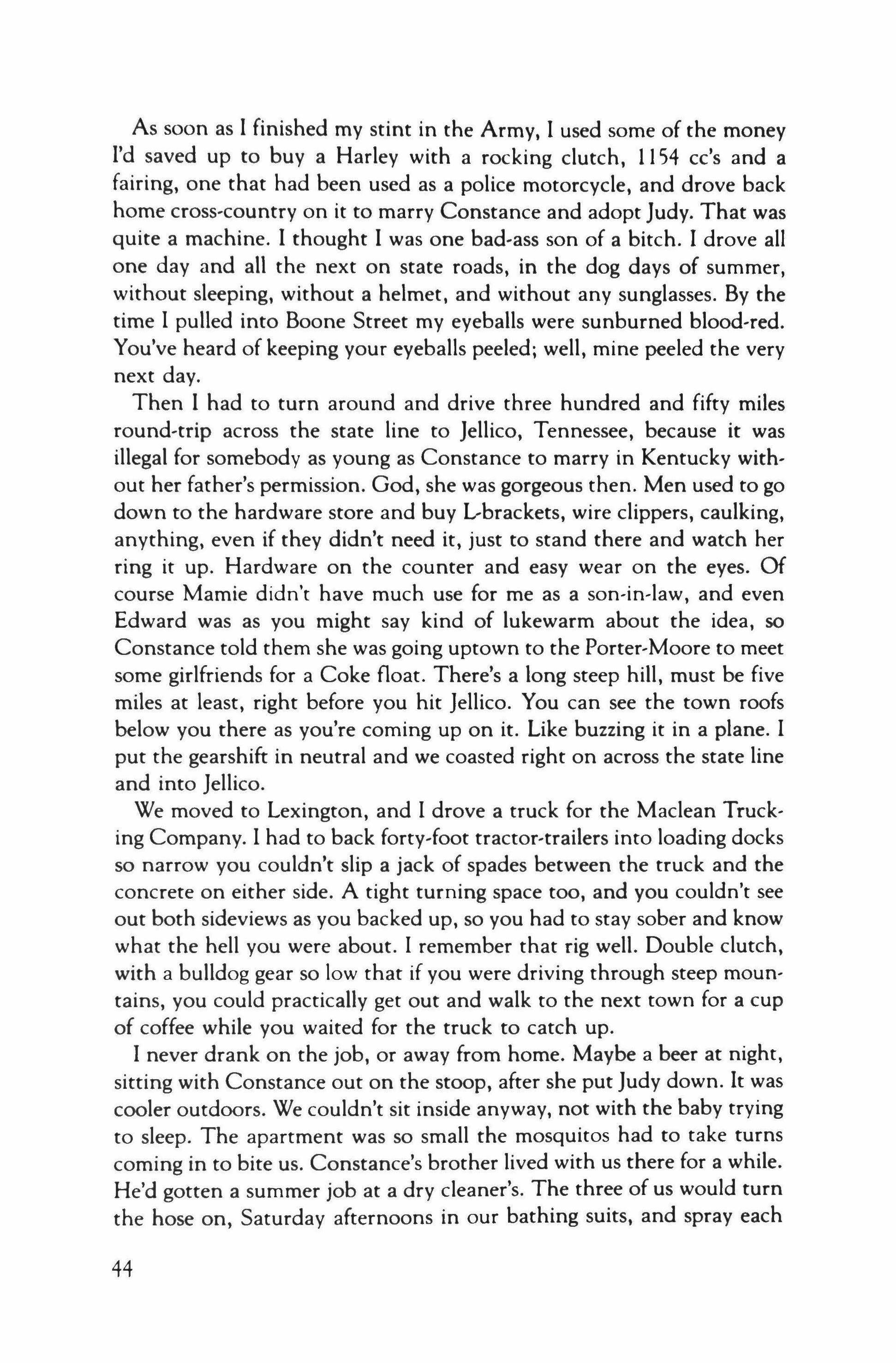
As soon as I finished my stint in the Army, I used some of the money I'd saved up to buy a Harley with a rocking clutch, 1154 cc's and a fairing, one that had been used as a police motorcycle, and drove back home cross-country on it to marry Constance and adopt Judy. That was quite a machine. I thought I was one bad-ass son of a bitch. I drove all one day and all the next on state roads, in the dog days of summer, without sleeping, without a helmet, and without any sunglasses. By the time I pulled into Boone Street my eyeballs were sunburned blood-red. You've heard of keeping your eyeballs peeled; well, mine peeled the very next day.
Then I had to turn around and drive three hundred and fifty miles round-trip across the state line to Jellico, Tennessee, because it was illegal for somebody as young as Constance to marry in Kentucky without her father's permission. God, she was gorgeous then. Men used to go down to the hardware store and buy Lbrackets, wire clippers, caulking, anything, even if they didn't need it, just to stand there and watch her ring it up. Hardware on the counter and easy wear on the eyes. Of course Mamie didn't have much use for me as a son-in-law, and even Edward was as you might say kind of lukewarm about the idea, so Constance told them she was going uptown to the Porter-Moore to meet some girlfriends for a Coke float. There's a long steep hill, must be five miles at least, right before you hit Jellico. You can see the town roofs below you there as you're coming up on it. Like buzzing it in a plane. I put the gearshift in neutral and we coasted right on across the state line and into Jellico.
We moved to Lexington, and I drove a truck for the Maclean Trucking Company. I had to back forty-foot tractor-trailers into loading docks so narrow you couldn't slip a jack of spades between the truck and the concrete on either side. A tight turning space too, and you couldn't see out both sideviews as you backed up, so you had to stay sober and know what the hell you were about. I remember that rig well. Double clutch, with a bulldog gear so low that if you were driving through steep mountains, you could practically get out and walk to the next town for a cup of coffee while you waited for the truck to catch up.
I never drank on the job, or away from home. Maybe a beer at night, sitting with Constance out on the stoop, after she put Judy down. It was cooler outdoors. We couldn't sit inside anyway, not with the baby trying to sleep. The apartment was so small the mosquitos had to take turns coming in to bite us. Constance's brother lived with us there for a while. He'd gotten a summer job at a dry cleaner's. The three of us would turn the hose on, Saturday afternoons in our bathing suits, and spray each
44

other to stay cool, chase each other around the yard with the hose, sliding in the wet grass. We called it the Riviera. The summer on the Riviera. We ate a lot of macaroni and cheese and a lot of salmon croquettes. A lot of pancakes. I was going to a special night school, learning how to work on adding machines a night or two a week when I wasn't away on the road.
I've always had a lot of ambition. I don't mind saying that. People who know me say Jean, you take off like a rocket. Then something happens. It's like I fizzle out, or get sabotaged, or shoot myself in the foot somehow. I'll be sales leader for the first few months, absolutely setting records, winning plaques, then all of a sudden I'm in a slump and can't even make my minimum quota. It's happened to me a hundred times. My first big mistake was letting myselfbe talked into giving up Judy for a spell. Constance's brother went back to Berea College and moved out, so we didn't have his share of the rent anymore. Constance was pregnant with Elaine, and she suggested that we leave Judy at her parents for a while, just until I started making a little more money. She thought it would be good for her mother psychological-wise, too.
The thing is, I can see clearly now that we would've done all right. I wasn't making great money, the situation was tight, but I was doing O.K. I suppose I must have felt we'd kind of tricked her parents by going across to Jellico. I wanted to set things to rights with them, so they'd see that I wasn't the redneck peckerwood they'd made me out to be, that I didn't come to the table hitching up my blue jeans and saying Ah shore rekkin ah'll have me summer them mustard grains. I was kind of countrvfied, and maybe I still am, but that didn't mean I was a clodhopper, didn't have smarts. But I hadn't been around for Constance when Judy was born, and her parents had, and I guess a lot of things like that were going through my mind, so I said O.K. It was my own fault, really, for ever consenting to that arrangement in the first place.
Biggest mistake we ever made. After Judy was gone, we fought about her all the time. That and money. It wouldn't always start out that way. My folks would be wanting to have us over for dinner, and Constance would say I don't like to go over there because I feel like your father is always undressing me with his eyes, he hugs me longer than a father-inlaw should, and I'd say the real reason you don't want to go over there is because your mother's been feeding you a lot of crap about my family not being good enough, just because Bart doesn't wear a necktie to dinner every night like Edward, and Mom doesn't spend all her time sewing new outfits for herself, and I suppose that's why your folks never go pay my folks a visit when they're invited, or invite my folks over
45

when they practically live in the same town, and she'd say if my family had something against you and your family, do you think they would have agreed to care for our baby daughter until we can get on our feet, and I'd say Yes, because they want to steal Judy away from us, when I'm making a decent enough living for us to have her right here if we could stick to our budget. And off we'd go. It was crazy. We really didn't have that much to fight about, especially when I think we only had one baby at the time instead of five.
And of course we couldn't just go over and get Judy. It was more complicated than that. Kind of as if we'd signed a contract and couldn't redeem it until at least three months were up. We'd go over there to visit once a week when I had a day off, like we were on a weekend pass, but that would be it. I must have thought I was back in bootcamp. I remember there was a guy who'd enlisted, and then decided he didn't like the climate and the hours so well, all the crawling around on the prickly baked earth, so he got his mother to call the CO to try to get him discharged. Every time she called, the drill sergeant would march every single one of us grunts over to the phone to take the call together as a unit, and then make us run laps in the blistering Texas sun for a couple of hours. Boy, we made that enlisted guy's life a living hell. We gave him some shit over that. Anyway, sometimes when Constance and me would talk about bringing Judy back, she'd say It's not fair to Mom, and I'd get a sort of hangdog look and think Well, maybe she's right, we're still kind of inexperienced. I still must have been pretty naive in a lot of ways. I'd try to go back to studying the manuals for adding machines, but I couldn't seem to concentrate.
Judy was only gone for a little over three months, but I swear to God it seemed more like three years. Legally, of course, I could have taken Judy back anytime I wanted. We'd gone through the adoption process and everything, since my name hadn't been on the original birth certificate. I even drove over to Mamie's a couple of times and sat at the end of the street like a criminal, a kidnapper, trying to work up the conviction to walk in there and scoop Judy up. I started hitting the booze more regular, when I was out driving the rig, moping about pore me. I can't shoulder that off on anybody else. Nobody was forcing me to drink.
During the summer on the Riviera, I had always tried to make it back home of a night if I was any way half close enough to drive it. I'd drive half the night just to be able to spend two or three hours with Constance and the baby. I loved seeing that cleft in Judy's chin, just like mine. It sounds crazy to say it, but if I saw that cleft fifty times a day it wasn't enough. And Constance and me probably had fewer interests in
46

common than any two people on this green earth, but she had the loveliest little butt you ever saw, she really did, and I was all full of muscles from running the 220 and the 440 hurdles for years, plus bootcamp and the service and then loading and unloading my truck all the time. Constance says even today that when she first met me, my thighs were like tree trunks. She liked to put her arms around them. I guess that's what people call a shallow attraction and not much of a basis for a marriage, but I can tell anybody who cares to know that when I slipped into bed at four A.M. and we put our bodies together, it felt pretty damn sweet. The baby crying in the corner was just part of the atmosphere. And we certainly never gave a thought to whether or not her brother heard us.
But with Judy out of the house and me and Constance bickering so much, it seemed real easy to make excuses for not driving back, for deciding I was too far away from Lexington to make the long haul worthwhile. And it was only one step from there to feeling sorry for myself on account of there not being any chance of getting back, and then feeling lonely, and buying a couple of six-packs to make the loneliness more bearable. If you're tanked enough, being sad even has a kind of sweetness to it. Not the same kind as going home, more of a sickly sweetness. The dangerous thing about something like a cleft chin on a baby is that it's so cute, it provides the perfect occasion for getting mawkish-rnealvmouth-drunk, and if you're not real careful, somewhere down the road you start getting into that crazy logic of telling yourself that the real reason you became a heavy drinker, lost one job after another, lost your house, had your wife divorce you and your whole life go to hell, is because your baby had a cleft chin. I was an expert in that kind of logic for a quarter of a century. I could give seminars in it.
My cousin finally made up her mind to sell Uncle Jay's place. Her brother and sister had been wanting to sell for years, and every time they'd get the deed drawn up and settle on a price with a buyer, she'd tell them she needed to mull it over in her mind some more, and back out at the last minute. She called me from Texas to say this time she was decided to go through with it for real, and would I mind going down to Clear Creek to make sure none of the pipes had burst over the winter. So I went down. The pipes had held. After I'd replaced a spigot and a couple of washers, I drove on down the gravel road to the Hainted Holler to look at the little log-and-tarpaper house Bart had built and that we'd lived in for a year or so, back before he got on as timekeeper for the WPA. Everybody used to say somebody had killed the tannery
47
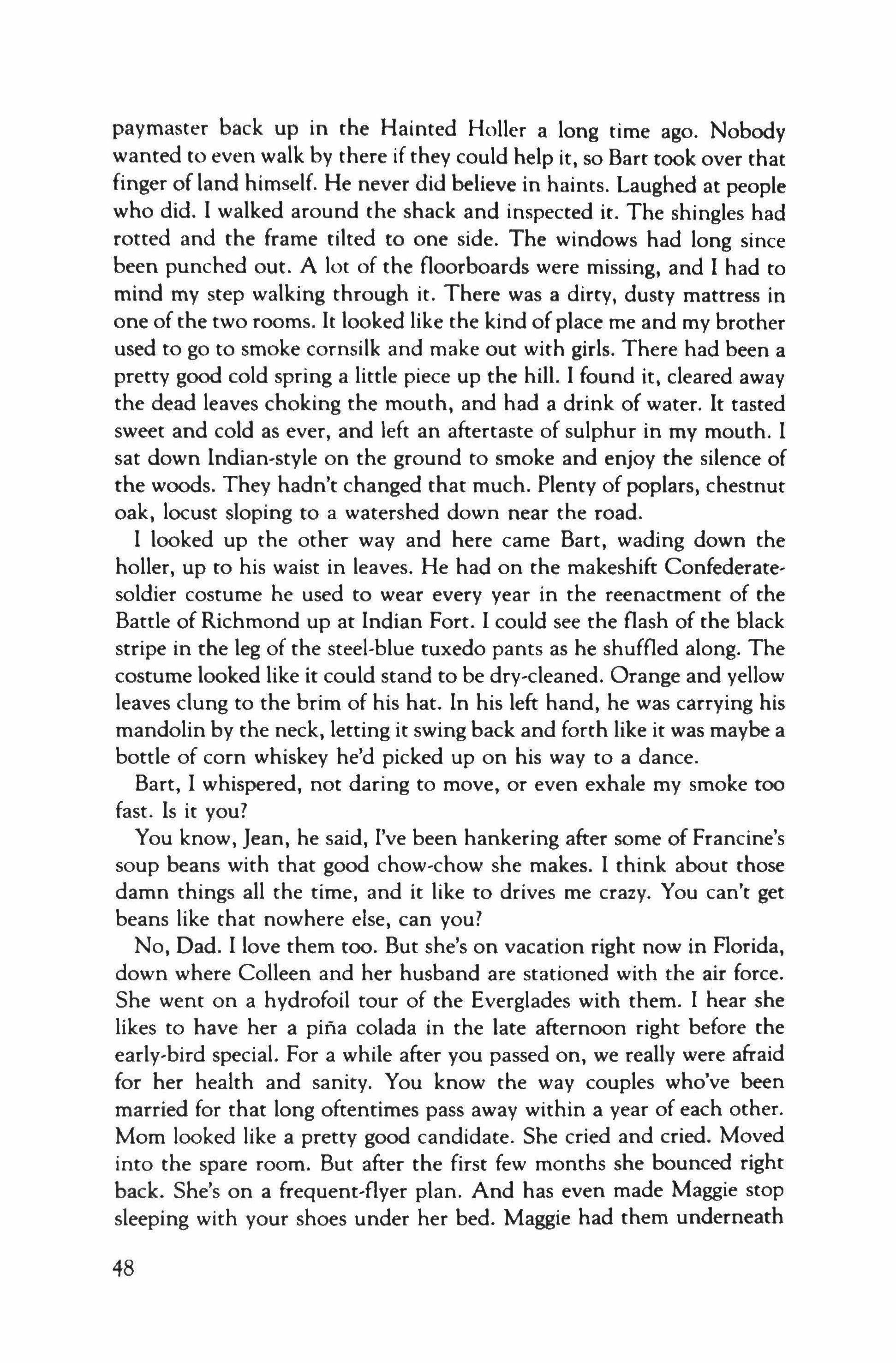
paymaster back up in the Hainted Holler a long time ago. Nobody wanted to even walk by there if they could help it, so Bart took over that finger of land himself. He never did believe in haints. Laughed at people who did. I walked around the shack and inspected it. The shingles had rotted and the frame tilted to one side. The windows had long since been punched out. A lot of the floorboards were missing, and I had to mind my step walking through it. There was a dirty, dusty mattress in one of the two rooms. It looked like the kind of place me and my brother used to go to smoke cornsilk and make out with girls. There had been a pretty good cold spring a little piece up the hill. I found it, cleared away the dead leaves choking the mouth, and had a drink of water. It tasted sweet and cold as ever, and left an aftertaste of sulphur in my mouth. I sat down Indian-style on the ground to smoke and enjoy the silence of the woods. They hadn't changed that much. Plenty of poplars, chestnut oak, locust sloping to a watershed down near the road.
I looked up the other way and here came Bart, wading down the holler, up to his waist in leaves. He had on the makeshift Confederatesoldier costume he used to wear every year in the reenactment of the Battle of Richmond up at Indian Fort. I could see the flash of the black stripe in the leg of the steel-blue tuxedo pants as he shuffled along. The costume looked like it could stand to be dry-cleaned. Orange and yellow leaves clung to the brim of his hat. In his left hand, he was carrying his mandolin by the neck, letting it swing back and forth like it was maybe a bottle of corn whiskey he'd picked up on his way to a dance.
Bart, I whispered, not daring to move, or even exhale my smoke too fast. Is it you?
You know, jean, he said, I've been hankering after some of Francine's soup beans with that good chow-chow she makes. I think about those damn things all the time, and it like to drives me crazy. You can't get beans like that nowhere else, can you?
No, Dad. I love them too. But she's on vacation right now in Florida, down where Colleen and her husband are stationed with the air force. She went on a hydrofoil tour of the Everglades with them. I hear she likes to have her a pina colada in the late afternoon right before the early-bird special. For a while after you passed on, we really were afraid for her health and sanity. You know the way couples who've been married for that long oftentimes pass away within a year of each other. Mom looked like a pretty good candidate. She cried and cried. Moved into the spare room. But after the first few months she bounced right back. She's on a frequent-flyer plan. And has even made Maggie stop sleeping with your shoes under her bed. Maggie had them underneath
48

there in a shoebox, and would get them out and kiss them. Was always wanting to go next-door to Mom's and sleep on your bed. Mom wouldn't hear of it. According to her, grief for your daddy or your husband is one thing, but Maggie's downright deranged. She said if anvbodv's going to be carrying on, it's going to be me. I was the wife. Bart fiddled with the sword in his scabbard and didn't look me in the eye. He seemed to have his ear cocked to a dog barking off down towards the creek, or to some high-pitched sound from the other world that I couldn't hear. Listen, Dad, I said. We could drive up and get some soup beans for you at the Cracker Barrel. Berea finally has one of its own. They've built a new one right off the interstate. No, he answered, his voice full of longing. It doesn't work that way. I can't take trips like that anymore. Besides, they put too much salt in theirs.
That's not true. You always said the Cracker Barrel's soup beans were better than Mom's. Whenever you had a hankering for them, you made her drive you all the way to Richmond. In fact, after your stroke, it's about the only way she could get you to go out of the house.
Well, maybe that's so. I guess Francine didn't put enough salt in hers, come to think of it. Said the doctor wouldn't allow it. But her chowchow was better. He set to tuning his mandolin, and playing a few chords from Shady Grove, humming and mumbling along with it. Hmm hm hm hm love hmmm darlin mhm my true love mh mh Harlan. I'd forgotten how good his picking was. Still, something about the song sounded off. I thought maybe the finger stiffness from his stroke had stayed with him. Then I noticed that the B-string was missing from the mandolin. He read my thoughts. Yeah, he said, I'd give my life for a replacement string. I can't make Soldier's Joy come out sounding right neither, and I've even got the outfit for it. I'd like to know who in the hell buried me in full regalia and with my mandolin, and forgot to replace the damn B-string.
I suppose it was me, I said. I really only stuck the mandolin in the coffin as an afterthought. It had been shoved back in the closet for years. We never could persuade you to take it out of its case. I shined it up, but I didn't think you'd be playing it that much.
Well, it looks like I ain't. He fished around in his coat pocket with his left hand and pulled out a flask.
Where'd you get that? I asked. I know we didn't bury you with it, unless the undertaker's assistant stuck it in your pocket to keep his boss from finding out he was taking a nip on the job.
49

Bart chuckled and looked down at the flask. That's for me to know and you to find out. He held it out towards me. You want a snort! No thanks, I said. I don't drink anymore. I haven't for nigh-on three years now.
Bart screwed the cap back on and cocked his eye at me. Now son, I know me and you never did communicate too well, but that's one piece of business you don't have to fib about. I never asked you about them things. But you always was the slipping-off kind. More like your Uncle Jay. One time he went out to a dance on a Friday night and rolled in home dead-stone drunk of a Monday morning when he ought to been up to the newspaper office. Ashen as a corpse. He didn't say a word just climbed in under the covers and commenced to moan. His wife followed him into the room, took one look and dropped down on her knees to pray. She prayed Lord, please help this poor drunken sot. Jay peeked out from under the quilt and whispered Don't tell him I'm drunk. Just tell him I'm sick.
Sounds like Jay. But Dad, I really don't drink. A lot of things are different. I'm more of a family man than I used to be.
Jean, did I ever tell you that coat of arms I had hanging up by the front door isn't real? We don't really come from a noble family. I ordered that out of a magazine.
I know that, Dad. I remember when it came in the mail. But you always swore it was genuine, and wouldn't let any of us tell you otherwise. You seem so much more relaxed about everything than you used to be. I mean, maybe you were always this easy alone with your friends, but not around me. Not at home. I really do like being around you. I think Mom would enjoy your company a lot more, too. Of course she adored you, lived for you, but I think the two of you could really be pals, maybe take a hydrofoil tour together, or one of those glass-bottomed boats at Cypress Gardens where the fish swim right underneath your feet. I feel like I can talk to you now like I never could before. Tell me, Dad. Do you think I've been a good father to my kids, a good husband to Constance? You've been lukewarm about Constance ever since that time right after we married, when she sat down to eat at the supper table before the men were done eating, saying she was hungry as you were and didn't believe in that custom. And when I finally had a son of my own, the only comment you made, about a year after he was born, was that you were glad to see he'd finally come out of the kinks. That made Constance hopping mad she said he never was in the kinks! But I want you to tell me what you think, Dad, now that you have the long view. You must have a different perspective on everything. Do I seem like I've
50
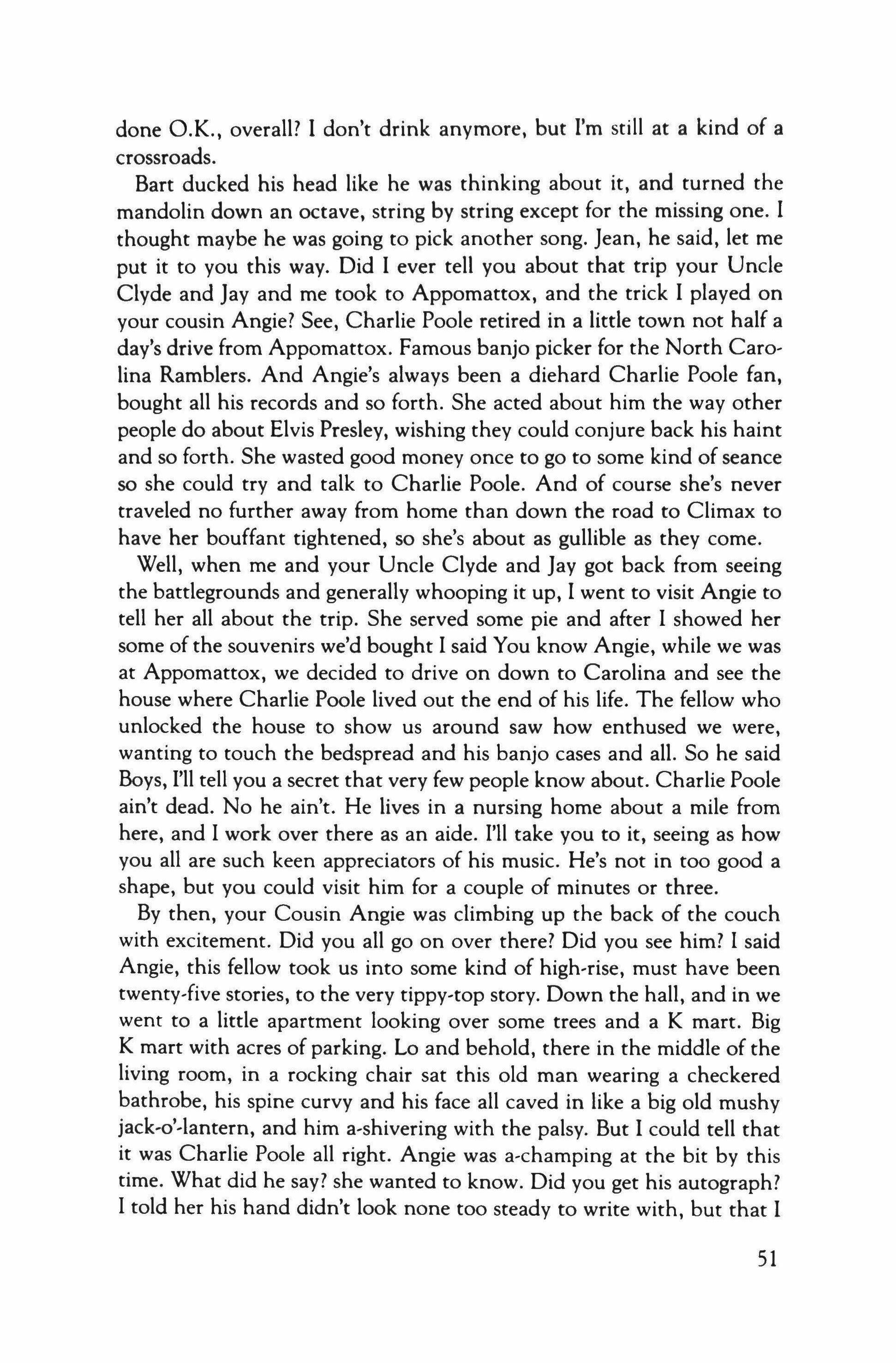
done O.K., overall? I don't drink anymore, but I'm still at a kind of a crossroads.
Bart ducked his head like he was thinking about it, and turned the mandolin down an octave, string by string except for the missing one. I thought maybe he was going to pick another song. Jean, he said, let me put it to you this way. Did I ever tell you about that trip your Uncle Clyde and Jay and me took to Appomattox, and the trick I played on your cousin Angie? See, Charlie Poole retired in a little town not half a day's drive from Appomattox. Famous banjo picker for the North Carolina Ramblers. And Angie's always been a diehard Charlie Poole fan, bought all his records and so forth. She acted about him the way other people do about Elvis Presley, wishing they could conjure back his haint and so forth. She wasted good money once to go to some kind of seance so she could try and talk to Charlie Poole. And of course she's never traveled no further away from home than down the road to Climax to have her bouffant tightened, so she's about as gullible as they come.
Well, when me and your Uncle Clyde and Jay got back from seeing the battlegrounds and generally whooping it up, I went to visit Angie to tell her all about the trip. She served some pie and after I showed her some of the souvenirs we'd bought I said You know Angie, while we was at Appomattox, we decided to drive on down to Carolina and see the house where Charlie Poole lived out the end of his life. The fellow who unlocked the house to show us around saw how enthused we were, wanting to touch the bedspread and his banjo cases and all. So he said Boys, I'll tell you a secret that very few people know about. Charlie Poole ain't dead. No he ain't. He lives in a nursing home about a mile from here, and I work over there as an aide. I'll take you to it, seeing as how you all are such keen appreciators of his music. He's not in too good a shape, but you could visit him for a couple of minutes or three.
By then, your Cousin Angie was climbing up the back of the couch with excitement. Did you all go on over there? Did you see him? I said Angie, this fellow took us into some kind of high-rise, must have been twenty-five stories, to the very tippy-top story. Down the hall, and in we went to a little apartment looking over some trees and a K mart. Big K mart with acres of parking. Lo and behold, there in the middle of the living room, in a rocking chair sat this old man wearing a checkered bathrobe, his spine curvy and his face all caved in like a big old mushy jack-o-lantern, and him a-shivering with the palsy. But I could tell that it was Charlie Poole all right. Angie was a-champing at the bit by this time. What did he say? she wanted to know. Did you get his autograph? I told her his hand didn't look none too steady to write with, but that I
51
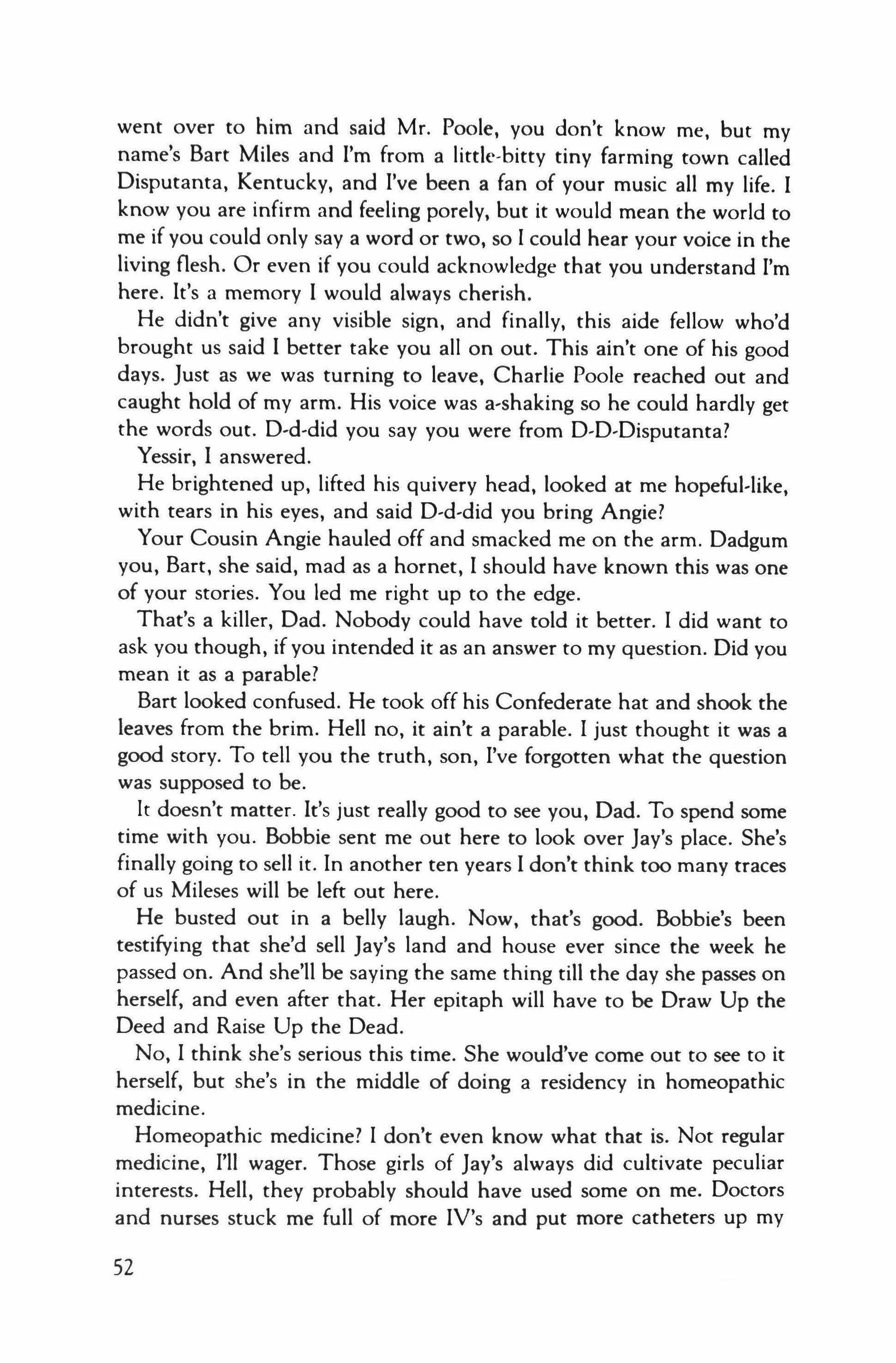
went over to him and said Mr. Poole, you don't know me, but my name's Bart Miles and I'm from a lirtle-bitrv tiny farming town called Disputanta, Kentucky, and I've been a fan of your music all my life. I know you are infirm and feeling porelv, but it would mean the world to me if you could only say a word or two, so I could hear your voice in the living flesh. Or even if you could acknowledge that you understand I'm here. It's a memory I would always cherish.
He didn't give any visible sign, and finally, this aide fellow who'd brought us said I better take you all on out. This ain't one of his good days. Just as we was turning to leave, Charlie Poole reached out and caught hold of my arm. His voice was a-shaking so he could hardly get the words out. Ded-did you say you were from D-D-Disputanta?
Yessir, I answered.
He brightened up, lifted his quivery head, looked at me hopeful-like, with tears in his eyes, and said Dvd-did you bring Angie?
Your Cousin Angie hauled off and smacked me on the arm. Dadgum you, Bart, she said, mad as a hornet, I should have known this was one of your stories. You led me right up to the edge.
That's a killer, Dad. Nobody could have told it better. I did want to ask you though, if you intended it as an answer to my question. Did you mean it as a parable?
Bart looked confused. He took off his Confederate hat and shook the leaves from the brim. Hell no, it ain't a parable. I just thought it was a good story. To tell you the truth, son, I've forgotten what the question was supposed to be.
It doesn't matter. It's just really good to see you, Dad. To spend some time with you. Bobbie sent me out here to look over Jay's place. She's finally going to sell it. In another ten years I don't think too many traces of us Mileses will be left out here.
He busted out in a belly laugh. Now, that's good. Bobbie's been testifying that she'd sell Jay's land and house ever since the week he passed on. And she'll be saying the same thing till the day she passes on herself, and even after that. Her epitaph will have to be Draw Up the Deed and Raise Up the Dead.
No, I think she's serious this time. She would've come out to see to it herself, but she's in the middle of doing a residency in homeopathic medicine.
Homeopathic medicine? I don't even know what that is. Not regular medicine, I'll wager. Those girls of Jay's always did cultivate peculiar interests. Hell, they probably should have used some on me. Doctors and nurses stuck me full of more IV's and put more catheters up my
52

peter. Bart had begun retreating up the holler, plunging his boots into the leaves with each backward step, raising his legs high the way a horse does. His movements were unhurried, yet he seemed to be moving away quickly.
Dad, I said, what's it like being dead?
He raised his mandolin to me. Oh son, he said, smiling and shaking his head from side to side, I'm having a big time. Having a big time. He turned away and stared to run, charging up the hill with his mandolin aloft like a Confederate soldier about to take the hill.
But what's it like exactly? I shouted. Do you wish you were still here?
Yeah, he hollered back. Yes I am. Having a big time. I bet your brother never had this much leisure when he was stationed at Okinawa. A whirl of leaves covered him, and I didn't see him anymore after that.
Constance has always brought home from the bookmobile stacks of plastic-coated books about ESP, past-life regressions, interpreting your dreams. As I've told her many a time, if she worked on building the pyramids of Cheops, she has some vacation time coming to her, but I don't think she ought to encourage that foolishness in our children. We had many a set-to when Constance took it in her head that Judy was a psychic in the making, all because there was a prank bomb scare at the junior high one day, and while the students all stood out in the schoolyard shivering without their jackets, Judy got a premonition and ran home. Constance had left the iron plugged in, which had melted a hole in the countertop and probably would have burned the house down if Judy hadn't found it.
I said fine, she has her womanly intuition and let it go at that, but then Judy had a dream about a half-wit son of some friends of ours, whose appendix had busted a month or so before. Seems he came to her in the night saying he couldn't rest easy, and it turns out some kids for plain meanness had knocked over his headstone and broken it. Couldn't stop teasing that poor boy even after he died. I said O.K., let's not begrudge Judy her hunches, but don't egg her on with all this Edgar Cayce stuff like she's the new child genius when she's bringing home straight D's on her report card and killing off the rest of her brain cells with marijuana. Me and Constance never have seen eye to eye about this child-rearing business or much else either, and a few years later, when we decided to have a trial separation, I guess we finally agreed to disagree.
Now, take me. Even after stumbling onto Bart in the woods, I don't try to give a name to it. If it happened, it happened, and that's all I need
53
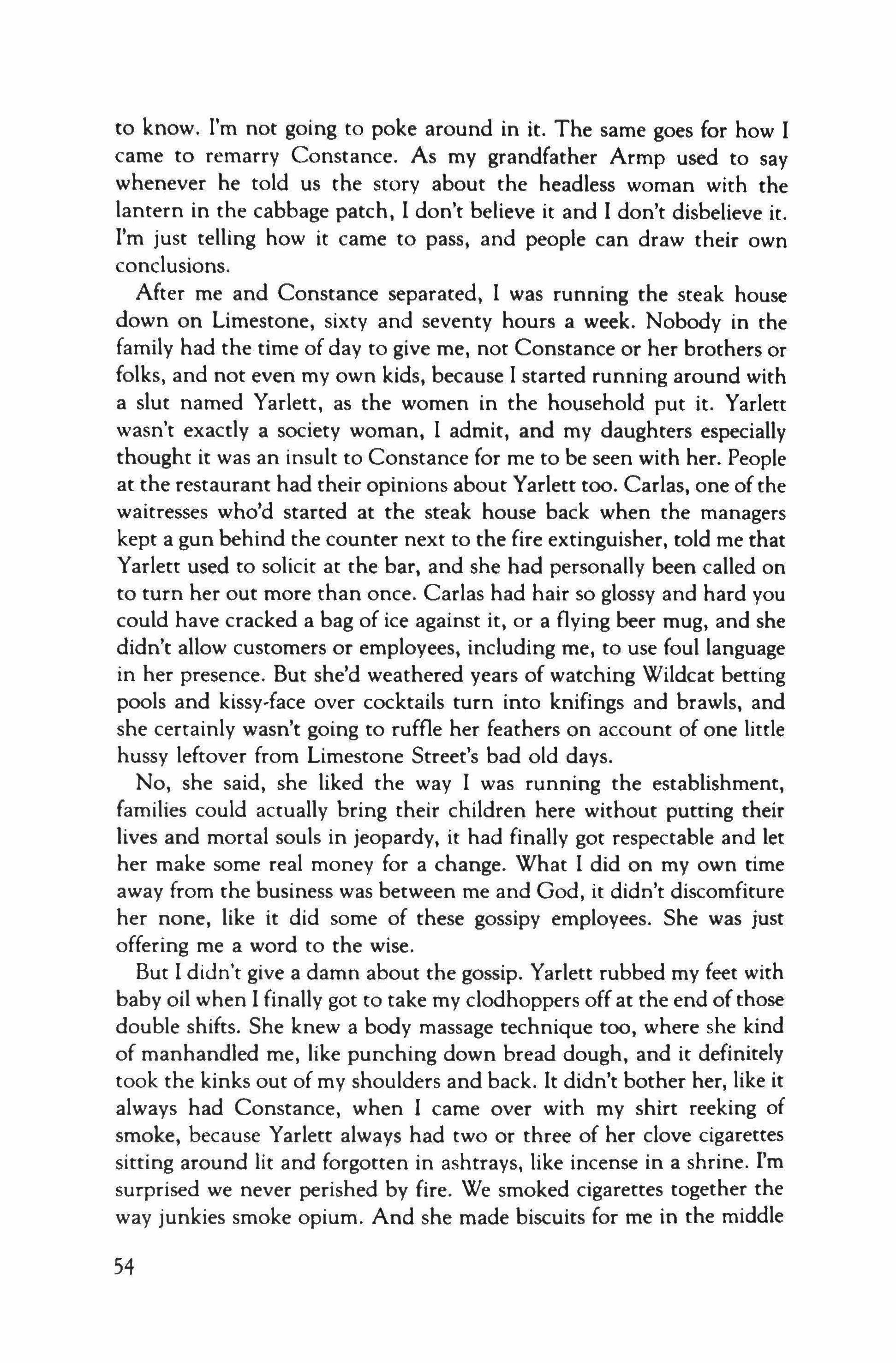
to know. I'm not going to poke around in it. The same goes for how I came to remarry Constance. As my grandfather Armp used to say whenever he told us the story about the headless woman with the lantern in the cabbage patch, I don't believe it and I don't disbelieve it. I'm just telling how it came to pass, and people can draw their own coneIusions.
After me and Constance separated, I was running the steak house down on Limestone, sixty and seventy hours a week. Nobody in the family had the time of day to give me, not Constance or her brothers or folks, and not even my own kids, because I started running around with a slut named Yarlett, as the women in the household put it. Yarlett wasn't exactly a society woman, I admit, and my daughters especially thought it was an insult to Constance for me to be seen with her. People at the restaurant had their opinions about Yarlett too. Carlas, one of the waitresses who'd started at the steak house back when the managers kept a gun behind the counter next to the fire extinguisher, told me that Yarlett used to solicit at the bar, and she had personally been called on to turn her out more than once. Carlas had hair so glossy and hard you could have cracked a bag of ice against it, or a flying beer mug, and she didn't allow customers or employees, including me, to use foul language in her presence. But she'd weathered years of watching Wildcat betting pools and kissv-face over cocktails turn into knifings and brawls, and she certainly wasn't going to ruffle her feathers on account of one little hussy leftover from Limestone Street's bad old days.
No, she said, she liked the way I was running the establishment, families could actually bring their children here without putting their lives and mortal souls in jeopardy, it had finally got respectable and let her make some real money for a change. What I did on my own time away from the business was between me and God, it didn't discomfiture her none, like it did some of these gossipy employees. She was just offering me a word to the wise.
But I didn't give a damn about the gossip. Yarlett rubbed my feet with baby oil when I finally got to take my clodhoppers off at the end of those double shifts. She knew a body massage technique too, where she kind of manhandled me, like punching down bread dough, and it definitely took the kinks out of my shoulders and back. It didn't bother her, like it always had Constance, when I came over with my shirt reeking of smoke, because Yarlett always had two or three of her clove cigarettes sitting around lit and forgotten in ashtrays, like incense in a shrine. I'm surprised we never perished by fire. We smoked cigarettes together the way junkies smoke opium. And she made biscuits for me in the middle
54
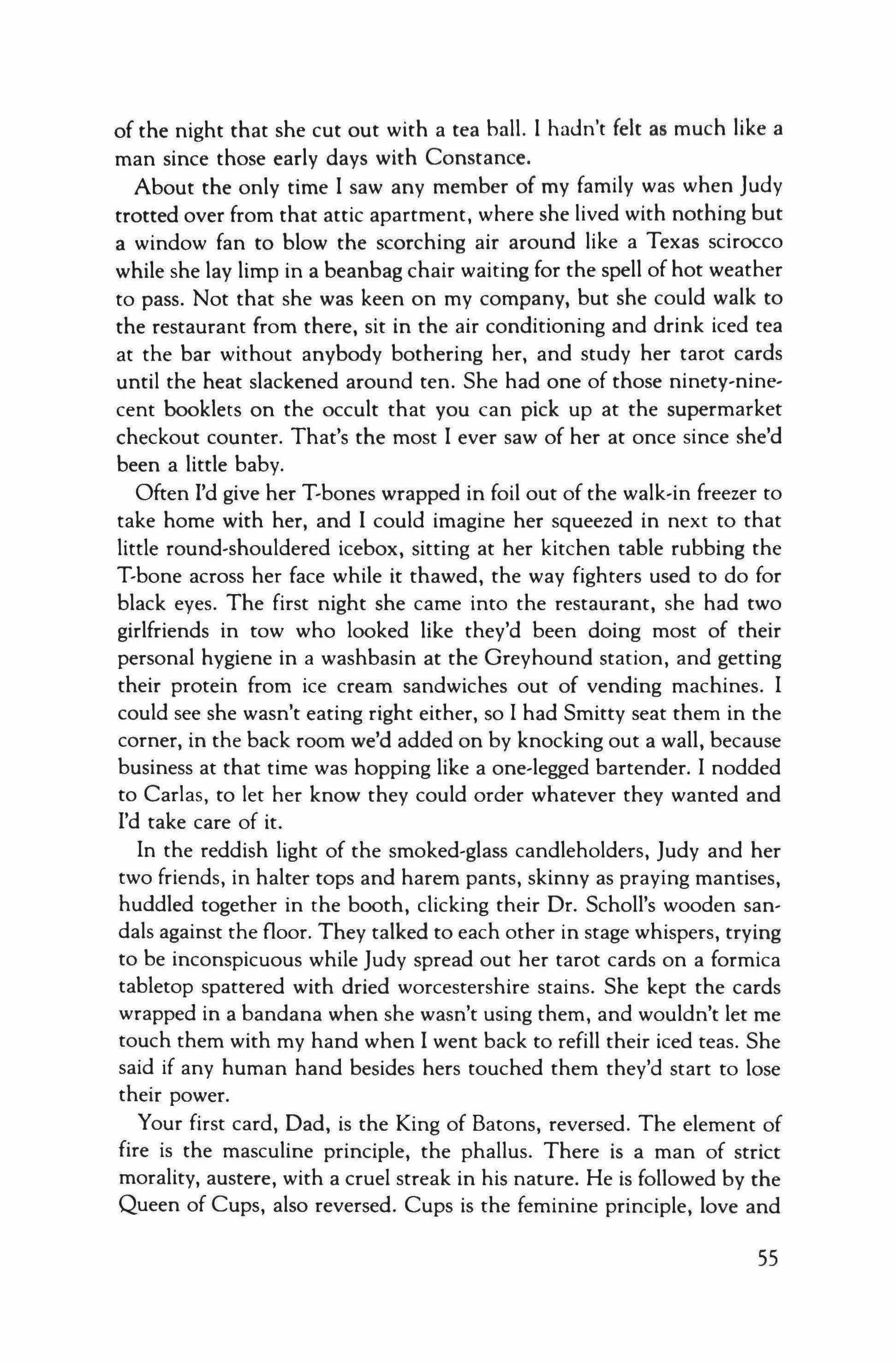
of the night that she cut out with a tea hall. I hadn't felt as much like a man since those early days with Constance.
About the only time I saw any member of my family was when Judy trotted over from that attic apartment, where she lived with nothing but a window fan to blow the scorching air around like a Texas scirocco while she lay limp in a beanbag chair waiting for the spell of hot weather to pass. Not that she was keen on my company, but she could walk to the restaurant from there, sit in the air conditioning and drink iced tea at the bar without anybody bothering her, and study her tarot cards until the heat slackened around ten. She had one of those ninety-ninecent booklets on the occult that you can pick up at the supermarket checkout counter. That's the most I ever saw of her at once since she'd been a little baby.
Often I'd give her Tbones wrapped in foil out of the walk-in freezer to take home with her, and I could imagine her squeezed in next to that little round-shouldered icebox, sitting at her kitchen table rubbing the Tbone across her face while it thawed, the way fighters used to do for black eyes. The first night she came into the restaurant, she had two girlfriends in tow who looked like they'd been doing most of their personal hygiene in a washbasin at the Greyhound station, and getting their protein from ice cream sandwiches out of vending machines. I could see she wasn't eating right either, so I had Smitty seat them in the corner, in the back room we'd added on by knocking out a wall, because business at that time was hopping like a one-legged bartender. I nodded to Carlas, to let her know they could order whatever they wanted and I'd take care of it.
In the reddish light of the smoked-glass candleholders, Judy and her two friends, in halter tops and harem pants, skinny as praying mantises, huddled together in the booth, clicking their Dr. Scholl's wooden san, dais against the floor. They talked to each other in stage whispers, trying to be inconspicuous while Judy spread out her tarot cards on a formica tabletop spattered with dried worcestershire stains. She kept the cards wrapped in a bandana when she wasn't using them, and wouldn't let me touch them with my hand when I went back to refill their iced teas. She said if any human hand besides hers touched them they'd start to lose their power.
Your first card, Dad, is the King of Batons, reversed. The element of fire is the masculine principle, the phallus. There is a man of strict morality, austere, with a cruel streak in his nature. He is followed by the Queen of Cups, also reversed. Cups is the feminine principle, love and
55
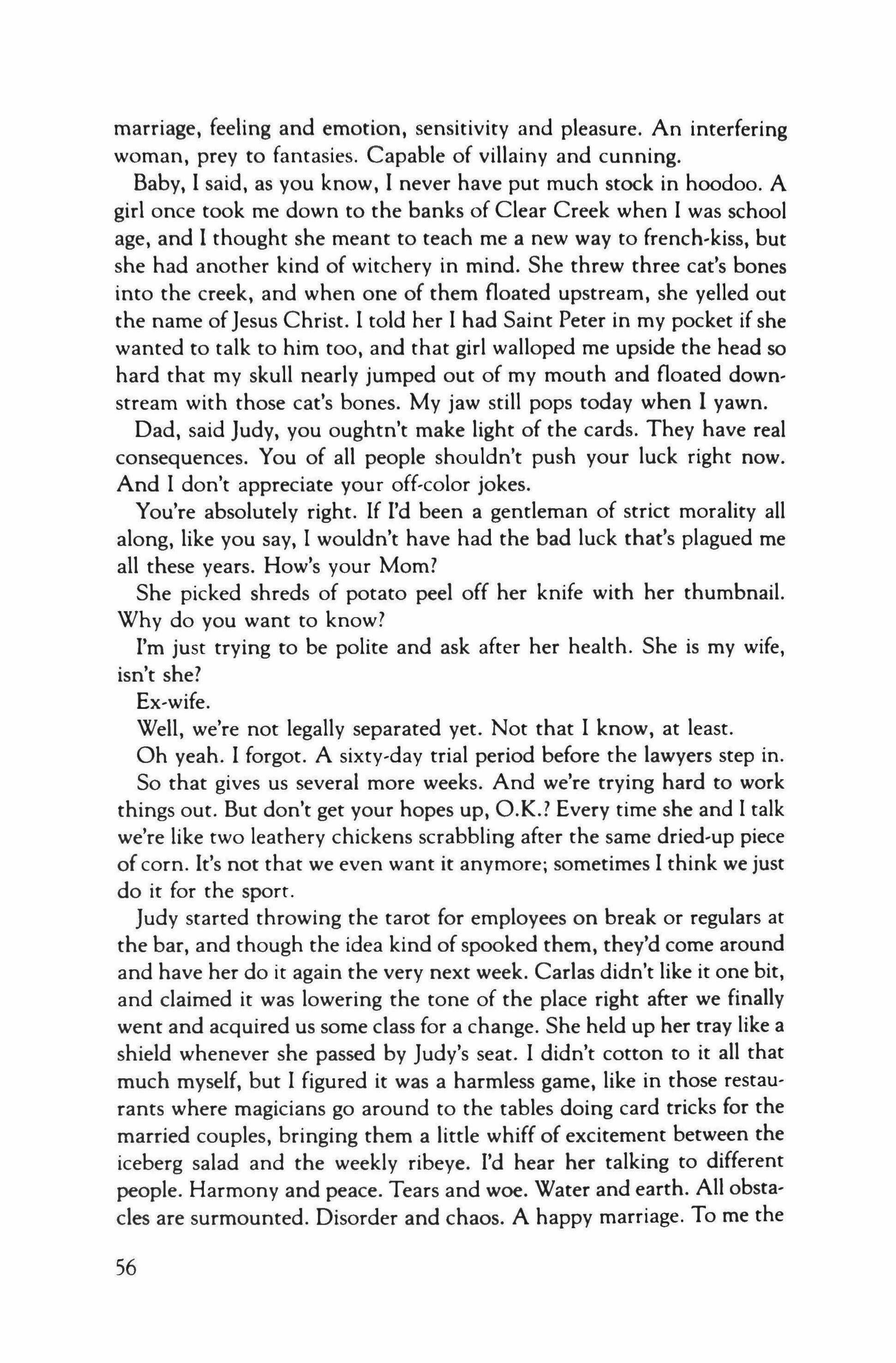
marriage, feeling and emotion, sensitivity and pleasure. An interfering woman, prey to fantasies. Capable of villainy and cunning.
Baby, I said, as you know, I never have put much stock in hoodoo. A girl once took me down to the banks of Clear Creek when I was school age, and I thought she meant to teach me a new way to french-kiss, but she had another kind of witchery in mind. She threw three eat's bones into the creek, and when one of them floated upstream, she yelled out the name ofJesus Christ. I told her I had Saint Peter in my pocket if she wanted to talk to him too, and that girl walloped me upside the head so hard that my skull nearly jumped out of my mouth and floated downstream with those eat's bones. My jaw still pops today when I yawn.
Dad, said Judy, you oughtn't make light of the cards. They have real consequences. You of all people shouldn't push your luck right now. And I don't appreciate your off-color jokes.
You're absolutely right. If I'd been a gentleman of strict morality all along, like you say, I wouldn't have had the bad luck that's plagued me all these years. How's your Mom?
She picked shreds of potato peel off her knife with her thumbnail. Why do you want to know?
I'm just trying to be polite and ask after her health. She is my wife, isn't she?
Ex-wife.
Well, we're not legally separated yet. Not that I know, at least.
Oh yeah. I forgot. A sixty-day trial period before the lawyers step in.
So that gives us several more weeks. And we're trying hard to work things out. But don't get your hopes up, O.K.? Every time she and I talk we're like two leathery chickens scrabbling after the same dried-up piece of corn. It's not that we even want it anymore; sometimes I think we just do it for the sport.
Judy started throwing the tarot for employees on break or regulars at the bar, and though the idea kind of spooked them, they'd come around and have her do it again the very next week. Carlas didn't like it one bit, and claimed it was lowering the tone of the place right after we finally went and acquired us some class for a change. She held up her tray like a shield whenever she passed by Judy's seat. I didn't cotton to it all that much myself, but I figured it was a harmless game, like in those restaurants where magicians go around to the tables doing card tricks for the married couples, bringing them a little whiff of excitement between the iceberg salad and the weekly ribeye. I'd hear her talking to different people. Harmony and peace. Tears and woe. Water and earth. All obstacles are surmounted. Disorder and chaos. A happy marriage. To me the
56
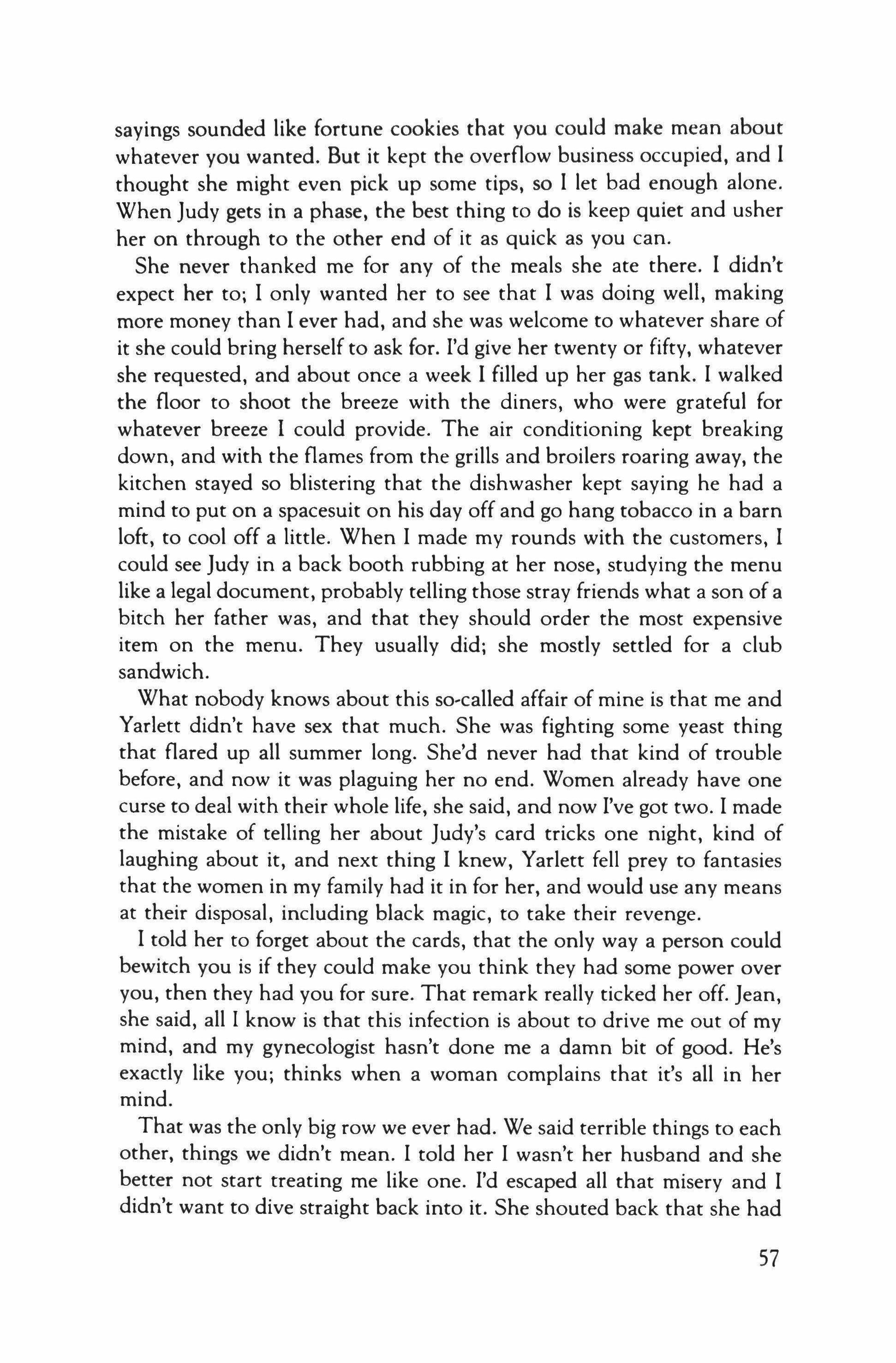
sayings sounded like fortune cookies that you could make mean about whatever you wanted. But it kept the overflow business occupied, and I thought she might even pick up some tips, so I let bad enough alone. When Judy gets in a phase, the best thing to do is keep quiet and usher her on through to the other end of it as quick as you can.
She never thanked me for any of the meals she ate there. I didn't expect her to; I only wanted her to see that I was doing well, making more money than I ever had, and she was welcome to whatever share of it she could bring herself to ask for. I'd give her twenty or fifty, whatever she requested, and about once a week I filled up her gas tank. I walked the floor to shoot the breeze with the diners, who were grateful for whatever breeze I could provide. The air conditioning kept breaking down, and with the flames from the grills and broilers roaring away, the kitchen stayed so blistering that the dishwasher kept saying he had a mind to put on a spacesuit on his day off and go hang tobacco in a barn loft, to cool off a little. When I made my rounds with the customers, I could see Judy in a back booth rubbing at her nose, studying the menu like a legal document, probably telling those stray friends what a son of a bitch her father was, and that they should order the most expensive item on the menu. They usually did; she mostly settled for a club sandwich.
What nobody knows about this so-called affair of mine is that me and Yarlett didn't have sex that much. She was fighting some yeast thing that flared up all summer long. She'd never had that kind of trouble before, and now it was plaguing her no end. Women already have one curse to deal with their whole life, she said, and now I've got two. I made the mistake of telling her about Judy's card tricks one night, kind of laughing about it, and next thing I knew, Yarlett fell prey to fantasies that the women in my family had it in for her, and would use any means at their disposal, including black magic, to take their revenge.
I told her to forget about the cards, that the only way a person could bewitch you is if they could make you think they had some power over you, then they had you for sure. That remark really ticked her off. Jean, she said, all I know is that this infection is about to drive me out of my mind, and my gynecologist hasn't done me a damn bit of good. He's exactly like you; thinks when a woman complains that it's all in her mind.
That was the only big row we ever had. We said terrible things to each other, things we didn't mean. I told her I wasn't her husband and she better not start treating me like one. I'd escaped all that misery and I didn't want to dive straight back into it. She shouted back that she had
57

never suggested anything of the kind, she knew where I stood on that question, but that her home wasn't a flophouse either, where you came to drink a beer and relieved yourself and left a nickel on the table. She'd put those days behind her, and no man was going to treat her like a stupid whore ever again. Yarlett had been working part-time as a go-go girl at the Red Lion, during the businessman's luncheon, but she fretted all the time, because staying on her feet so much she'd started to develop tiny varicose veins in her legs, which she considered her only really good feature. Her idea was eventually to be hired as a beautician in a department store, where you could wear slacks and still gather a crowd around you while you gave make-overs, since she didn't want to get out of the entertainment line altogether.
It made her downright anxious that we couldn't go to bed very often, so she was always wanting to give me satisfaction some other way, saying there were ninety-nine ways to skin a cat. I guess she'd skinned enough of them to know. We'd get to talking dirty, and necking on the hide-abed like a couple of horny teenagers, but more often than not we wouldn't go any further than that, and wound up instead watching baseball on TV and eating beer cheese and crackers. She knew more about baseball than any woman I ever came across. One of the first things that caught my attention was when I overheard her at the bar getting worked up about a Reds player she wanted sent in to pinch hit against the Expos. Take Tony out of there! she was yelling. He's a jinx. He's never gone good against a southpaw with men on base, and he never will. It's that crick in his neck! Cincinnati never did use their pinch hitters enough to suit her that summer, or break out of their slump.
I coasted along, week after week, waiting for Constance to file the divorce papers and send them to me in the mail. I knew we had to decide one way or another about being man and wife, that we couldn't keep on with one foot over the threshold, the way we had for so many years. Still, I might have let the arrangement stay that way for another week, or a month, or six months. A languid, tingly feeling settles over you when you work too many hours and don't get enough sleep, and the heat won't quit, and you're drinking more than you ought to, and indoors most of the day and night, and a woman talks dirty to you and keeps you aroused all the time without hardly ever finishing the job. Yarlett wasn't pushing me to marry her, and mostly seemed willing to settle for whatever I could give her right then, so there's no telling how long we could have kept on.
But I gathered a little too much wool. I drank more than my share of
58
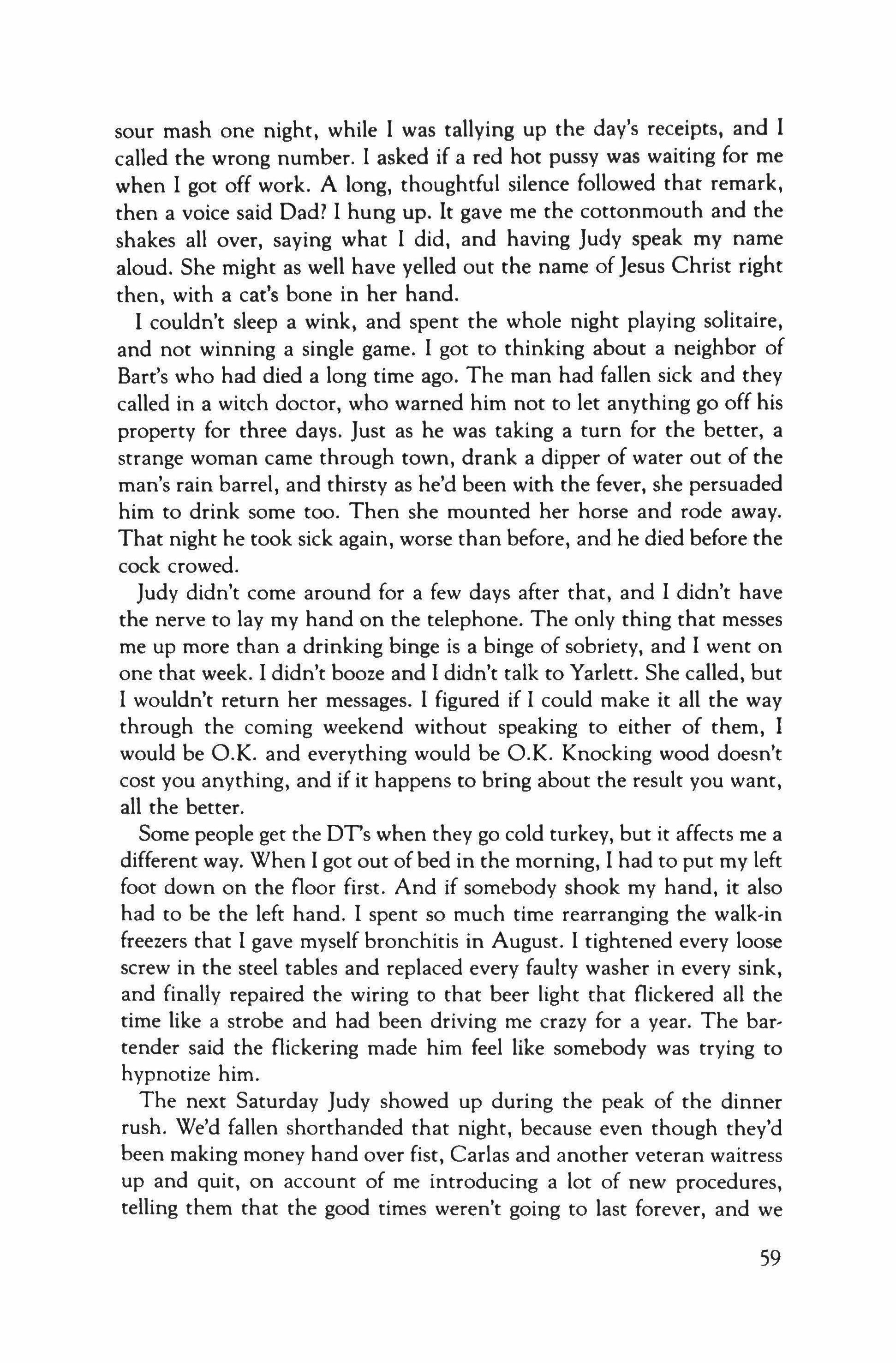
sour mash one night, while I was tallying up the day's receipts, and I called the wrong number. I asked if a red hot pussy was waiting for me when I got off work. A long, thoughtful silence followed that remark, then a voice said Dad? I hung up. It gave me the cottonmouth and the shakes all over, saying what I did, and having Judy speak my name aloud. She might as well have yelled out the name of Jesus Christ right then, with a eat's bone in her hand.
I couldn't sleep a wink, and spent the whole night playing solitaire, and not winning a single game. I got to thinking about a neighbor of Bart's who had died a long time ago. The man had fallen sick and they called in a witch doctor, who warned him not to let anything go off his property for three days. Just as he was taking a turn for the better, a strange woman came through town, drank a dipper of water out of the man's rain barrel, and thirsty as he'd been with the fever, she persuaded him to drink some too. Then she mounted her horse and rode away. That night he took sick again, worse than before, and he died before the cock crowed.
Judy didn't come around for a few days after that, and I didn't have the nerve to lay my hand on the telephone. The only thing that messes me up more than a drinking binge is a binge of sobriety, and I went on one that week. I didn't booze and I didn't talk to Yarlett. She called, but I wouldn't return her messages. I figured if I could make it all the way through the coming weekend without speaking to either of them, I would be O.K. and everything would be O.K. Knocking wood doesn't cost you anything, and if it happens to bring about the result you want, all the better.
Some people get the Dr's when they go cold turkey, but it affects me a different way. When I got out of bed in the morning, I had to put my left foot down on the floor first. And if somebody shook my hand, it also had to be the left hand. I spent so much time rearranging the walk-in freezers that I gave myself bronchitis in August. I tightened every loose screw in the steel tables and replaced every faulty washer in every sink, and finally repaired the wiring to that beer light that flickered all the time like a strobe and had been driving me crazy for a year. The bartender said the flickering made him feel like somebody was trying to hypnotize him.
The next Saturday Judy showed up during the peak of the dinner rush. We'd fallen shorthanded that night, because even though they'd been making money hand over fist, Carlas and another veteran waitress up and quit, on account of me introducing a lot of new procedures, telling them that the good times weren't going to last forever, and we
59

had to start paying attention to costs and rendering stricter accounts. The cash register had come up short twice in a row. No free drinks from the bar to employees during work hours or after. Meals to friends or relatives at a fifty-percent discount, but no more comps. I wanted to see a ticket for every food item coming out of that service window. No eating the dinners that got sent back to the kitchen, and waitresses would share a full ten percent of their tips with the busboys, instead of just handing them a dollar or two, or whatever the spirit moved them to, at the end of the shift. That was the topper. Carlas shot back that the only time she tithed was when she went to church, and furthermore if she wanted a pimp she'd become a prostitute. She put special emphasis on that last part, and stared me down with that cold yellow eye a seasoned waitress can cast when you've been taking too long to make up your mind about what to order.
Next thing I knew, I was helping the other waitresses hustle entrees out to the tables, burning the hell out of my fingers where the plates had sat under the warming hood too long. The medium-rare filets had turned well-done by the time we got them to the customers, and when you serve overcooked meat to a dedicated carnivore, they usually look at you as if you'd turned up with John the Baptist's head on a platter. The cook put the orders out almost as fast as the tickets came up, and she wouldn't slow down no matter how much the waitresses carped; she just kept shoving the plates under the hood like somebody working on a factory speed-up decreed by the boss man. I didn't want to get her riled too, so I waited tables and kept my mouth shut.
In the midst of all this, a commotion started up by the cash register, where all the customers on the wait list had to crowd with the front door propped half open, letting the mosquitos and potato bugs in, because we didn't have anyplace for the overflow business to sit and there was always at least a half-hour wait. Late at night, while I counted up the receipts, I could hear potato bugs banging around inside the hanging metallampshades. Judy was hollering that if she couldn't get seated at a table in her own daddy's restaurant, she hoped the whole place burned to the ground in a grease fire.
I broke into a cold sweat and a dead run. When I made my way to the register, Smitty was trying to hand her a glass of iced tea, and she kept smacking it with the flat of her palm and showering bystanders. She had righteous aim. I grabbed her wrists and said how about if we took a walk together, and she could come back later after the dinner rush. All tendons and bracelets and a hank of hair, she tried to wrestle out of my grasp, and when she couldn't, she looked me dead in the eye, the way
60
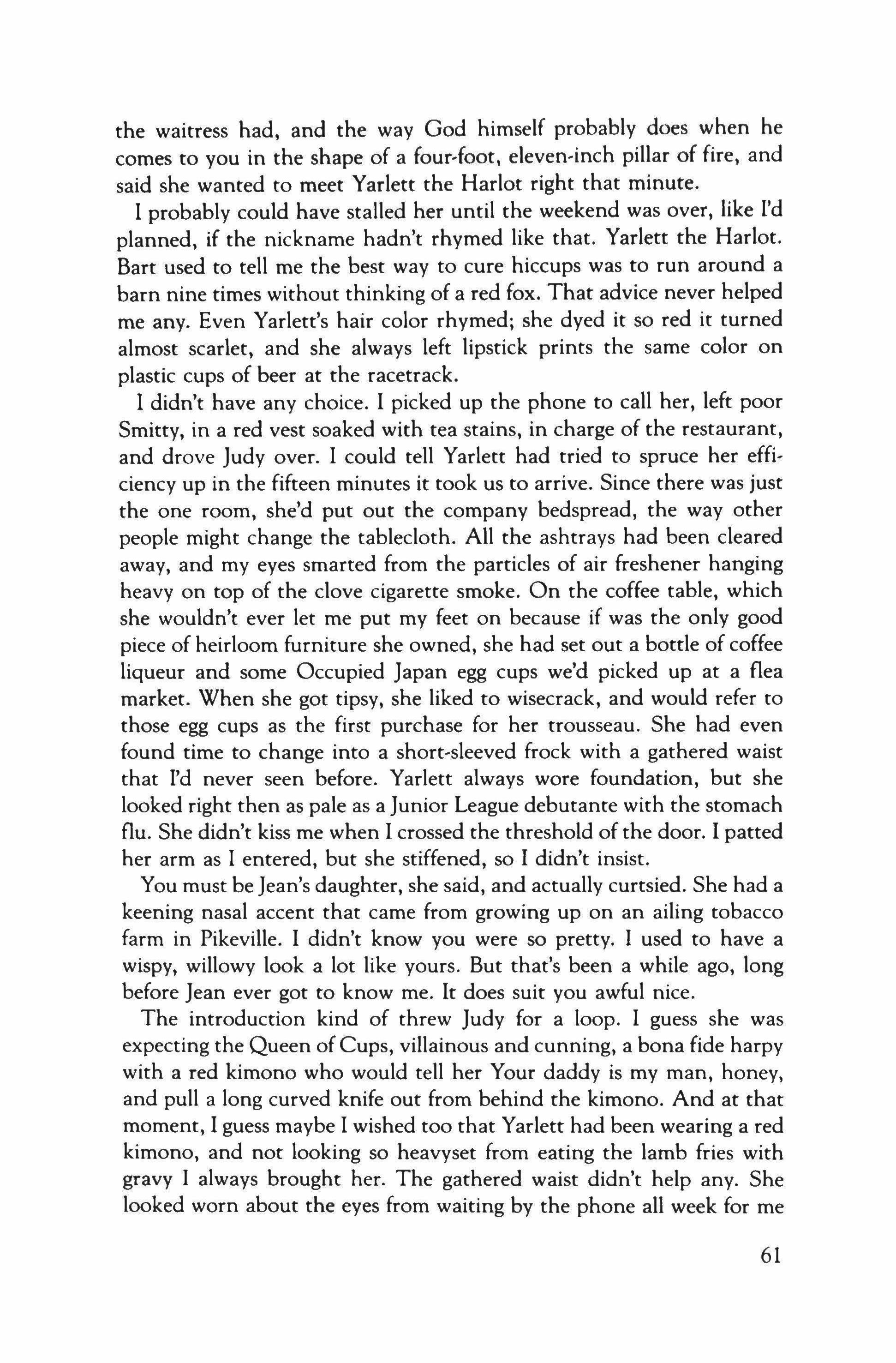
the waitress had, and the way God himself probably does when he comes to you in the shape of a four-foot, eleven-inch pillar of fire, and said she wanted to meet Yarlett the Harlot right that minute.
I probably could have stalled her until the weekend was over, like I'd planned, if the nickname hadn't rhymed like that. Yarlett the Harlot. Bart used to tell me the best way to cure hiccups was to run around a barn nine times without thinking of a red fox. That advice never helped me any. Even Yarlett's hair color rhymed; she dyed it so red it turned almost scarlet, and she always left lipstick prints the same color on plastic cups of beer at the racetrack.
I didn't have any choice. I picked up the phone to call her, left poor Smitty, in a red vest soaked with tea stains, in charge of the restaurant, and drove Judy over. I could tell Yarlett had tried to spruce her efficiency up in the fifteen minutes it took us to arrive. Since there was just the one room, she'd put out the company bedspread, the way other people might change the tablecloth. All the ashtrays had been cleared away, and my eyes smarted from the particles of air freshener hanging heavy on top of the clove cigarette smoke. On the coffee table, which she wouldn't ever let me put my feet on because if was the only good piece of heirloom furniture she owned, she had set out a bottle of coffee liqueur and some Occupied Japan egg cups we'd picked up at a flea market. When she got tipsy, she liked to wisecrack, and would refer to those egg cups as the first purchase for her trousseau. She had even found time to change into a short-sleeved frock with a gathered waist that I'd never seen before. Yarlett always wore foundation, but she looked right then as pale as a Junior League debutante with the stomach flu. She didn't kiss me when I crossed the threshold of the door. I patted her arm as I entered, but she stiffened, so I didn't insist.
You must be Jean's daughter, she said, and actually curtsied. She had a keening nasal accent that came from growing up on an ailing tobacco farm in Pikeville. I didn't know you were so pretty. I used to have a wispy, willowy look a lot like yours. But that's been a while ago, long before Jean ever got to know me. It does suit you awful nice.
The introduction kind of threw Judy for a loop. I guess she was expecting the Queen of Cups, villainous and cunning, a bona fide harpy with a red kimono who would tell her Your daddy is my man, honey, and pull a long curved knife out from behind the kimono. And at that moment, I guess maybe I wished too that Yarlett had been wearing a red kimono, and not looking so heavyset from eating the lamb fries with gravy I always brought her. The gathered waist didn't help any. She looked worn about the eyes from waiting by the phone all week for me
61
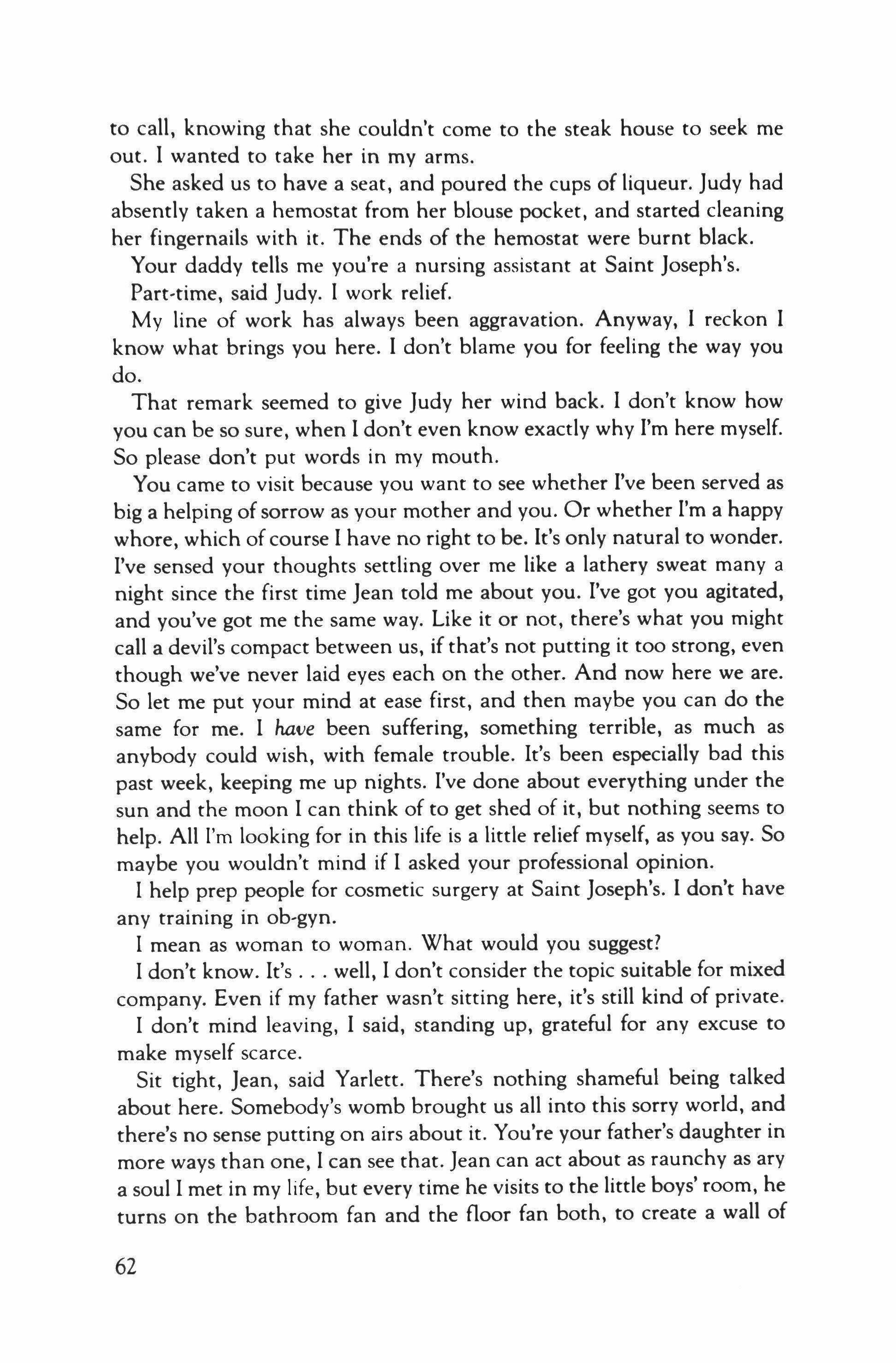
to call, knowing that she couldn't corne to the steak house to seek me out. I wanted to take her in my arms.
She asked us to have a seat, and poured the cups of liqueur. Judy had absently taken a hemostat from her blouse pocket, and started cleaning her fingernails with it. The ends of the hemostat were burnt black.
Your daddy tells me you're a nursing assistant at Saint Joseph's.
Part-time, said Judy. I work relief.
My line of work has always been aggravation. Anyway, I reckon I know what brings you here. I don't blame you for feeling the way you do.
That remark seemed to give Judy her wind back. I don't know how you can be so sure, when I don't even know exactly why I'm here myself. So please don't put words in my mouth.
You carne to visit because you want to see whether I've been served as big a helping of sorrow as your mother and you. Or whether I'm a happy whore, which of course I have no right to be. It's only natural to wonder. I've sensed your thoughts settling over me like a lathery sweat many a night since the first time Jean told me about you. I've got you agitated, and you've got me the same way. Like it or not, there's what you might call a devil's compact between us, if that's not putting it too strong, even though we've never laid eyes each on the other. And now here we are. So let me put your mind at ease first, and then maybe you can do the same for me. I have been suffering, something terrible, as much as anybody could wish, with female trouble. It's been especially bad this past week, keeping me up nights. I've done about everything under the sun and the moon I can think of to get shed of it, but nothing seems to help. All I'm looking for in this life is a little relief myself, as you say. So maybe you wouldn't mind if I asked your professional opinion.
I help prep people for cosmetic surgery at Saint Joseph's. I don't have any training in ob-gvn.
I mean as woman to woman. What would you suggest?
I don't know. It's well, I don't consider the topic suitable for mixed company. Even if my father wasn't sitting here, it's still kind of private.
I don't mind leaving, I said, standing up, grateful for any excuse to make myself scarce.
Sit tight, Jean, said Yarlett. There's nothing shameful being talked about here. Somebody's womb brought us all into this sorry world, and there's no sense putting on airs about it. You're your father's daughter in more ways than one, I can see that. Jean can act about as raunchy as ary a soul I met in my life, but every time he visits to the little boys' room, he turns on the bathroom fan and the floor fan both, to create a wall of
62

noise. I don't believe he'd feel completely at his ease in there unless a cyclone happened to pass overhead at just the right moment. I'm asking a question about hygiene. Even junior high schools have hygiene classes these days, so I hear. This ain't the dark ages.
Judy was squirming in her seat, no doubt ruing as much as I was the fact that she her own self had asked for this meeting of the minds. I suppose I suppose when I have that problem, I find that, you know, vinegar and water gets rid of it pretty quick. As long as the solution isn't too concentrated.
Oh honey, I've tried douches, believe me. I've tried it all, from antibiotics on down. My ailment is more complicated than you give me credit for. It started out in the place we're talking about, but lately I feel like my whole body is starting to give out. You devote your life to pleasing different men, and before you realize it, you've got sciatica, and varicose veins, and all other kinds of complaints, and you just can't put yourself into it body and soul like you used to. So you learn to make perfect little biscuits, flaky around the edges. These past few days, the weariness has spread all through me. My muscles ache, and my heart aches, and my eyes are so dry I can't hardly put my contact lenses in of a morning. I wonder if those cards of yours, that I've been hearing so much about, might give me some relief.
I don't think so. I'm really a novice still, kind of practicing.
Come on, darling. Don't shrink from your intuition now, after you been honing it all summer long. That's your womanly power. Don't squander it while you still got it in full force. I've seen too many girls, myself included, make that mistake.
Judy mulled that piece of advice over in her mind for a minute or two. Then she said, The tarot doesn't really cure anything. It mostly divines the future. And even then, not in specific terms, like people always think. The cards just give broad indications of where possibilities lie.
That's a whole lot more than I have right now. I believe it would probably cure what ails me to get a general idea of what my broad prospects are. For oh, let's say matrimony. In the cards' opinion.
That question doesn't concern anybody except those who it concerns, I said. Don't egg her on, Yarlett. But Judy had already unwrapped the bandana she had in her pocket, and she lay the pack of tarot cards on the heirloom coffee table. You understand, though, that I have no influence over which cards come up. All I can do is give you an interpretation. Also, the cards are not something to be toyed with. You have to take them seriously. She gave me a pointed look. The window unit was
63

going full blast, making a terrible racket, and strands of her bangs stuck to her forehead.
I understand, honey, said Yarlett. I've been toyed with plenty but I'm not the toying kind myself.
Look here, I said. We're all on edge. Every morning when I wake up, I feel like somebody's been beating me all night in my sleep with a two-byfour. And considering how quick I've been making enemies lately, somebody probably has. Now that the three of us are finally together, what we need to do is have a serious talk. I admit I haven't done right by either of you, or Constance either. I'm batting about .200. Maybe .150. And I'm willing to make amends. But only if we first discuss the situation like rational, grown-up people.
Hush, jean, said Yarlett. Deal those cards, honey.
The first card to come up had three crossed swords with a banner twined around them. A sow sat in the lower left-hand corner, and four crafty-looking pups were scrabbling to get at her teats. Three of Swords, said judy. The element of air. Usually unlucky, especially for women. Tears and woe. Disruption of relationships, a broken love affair, separation, parting, divorce.
I see. Does that mean my divorce and parting, or somebody else's? judy shrugged. There's no way to tell. It could be either. It could also simply indicate something lost or temporarily mislaid.
You mean like my mind, or my false eyelashes?
Judy allowed herself a brief smile, then returned her gaze to the Three of Swords. I'm not sure. But if the card is pointing to loss, it's probably a token very meaningful to you. A ring maybe, or a love letter.
I've had rings, and I've had letters, at one time and another. But I do have a way of mislaying things. jean is always getting after me about leaving burning cigarettes in ashtrays. It's a bad habit of mine, but I've been trying hard to break it. I don't want to end up cremating myself like one of those women long ago on the husband's funeral pyre; I never did think much of that custom, did you?
No, said judy. A boyfriend of mine almost set me on fire once, with a highway flare, when his car broke down, which he would never take to get fixed, and we had a shouting match over it, standing on the roadside in the dark with trucks whooshing past and shaking the car with wind. He kept waving the flare in my face to punctuate his yelling, and a spark fell on the sleeve of a gauzy blouse I was wearing. Can you believe that? He said it was an accident.
Yeah, said Yarlett. I do believe it. Truth is stranger than fiction, that's
64

a fact. I know all about them kind of accidents. I've had a few happen to me.
Next Judy turned up the Nine of Cups. She said it indicated physical health and well-being. An assured future, with the cup of satisfaction full and brimming over. She let her eyes come to rest on Yarlett. There's no way of telling when that part will come to pass. But the energy is especially intense when it comes after swords. So I have a strong premonition about it in your case.
So do I, said Yarlett. I feel a little more peaceable already. Judy turned up lots more cards: a juggler, a fellow sitting up in bed with his face in his hands, more cups and swords and coins and people on horses with walking sticks. Some cards said happiness and some said disaster, and some said in between. I couldn't make head or tail of most of them. But Yarlett kept nodding her head, and seeming to get matters more and more fixed in her mind. When Judy finished, Yarlett leaned over the table and squeezed her hand. She said she was glad she finally had the chance to meet a member ofJean's family face-to-face, especially a pretty young girl like her with so many interests and talents and a whole life of adventures ahead of her. It had done her a world of good. She was going to try that vinegar again, and dilute it a little more like Judy said. When the heat wave passed, she and everybody else might finally get some relief.
The hot spell did break, within a week, and Yarlett's female troubles vanished with it. For the first time in our brief life together, we didn't have any obstacles, or any discomfort to speak of. The Indian summer snapped into a comfortable, frosty autumn. We could skin the cat just the one way if we wanted to, but there didn't seem to be that much of a spark left. Yarlett had more interest in knitting sweaters, a new hobby she'd picked up, and she landed a job as a cosmetician at McAlpin's department store. I can't really put my finger on what happened between us. She didn't give me any ultimatums, didn't tell me I had to leave or anything. Not a cross word passed between us. We just gradually stopped being together. When I tried to talk to her about it, she only replied, in that keening Pikeville twang, that it wasn't in the cards for us, as if she'd discovered a valuable piece of wisdom that she didn't aim to let go of no matter how hard I pulled.
Constance went ahead and signed the papers, so did I, and that made the divorce legal. Things were going better between us by then, but for some reason neither of us tried to stop the divorce going through. It was a ritual we had to observe, as if squandering several hundred hardearned dollars on a lawyer was supposed to bring us luck. Only after the
65

divorce became final did I invite her to lunch at a place called the Saratoga, where we used to eat often. Even with new management, the ribs tasted as tangy as I remembered, and me and Constance talked for the first time in a long time like two rational grown-up people. Then we had to go through all the aggravation of turning around and getting legally married again. That's how the two of us are and always have been. If there's an easy way and a hard way, we'll take the hard way every time. It's our star, and we have to follow it.
66
The Clown
Enid Harlow

At the end of her hour she went into the bathroom. The session had been a particularly hard one, stressful, to use the analyst's more clinical term, and she wasn't ready to face the outside world yet. The toilet seat was raised. There was a pool of urine in the bowl. No paper, only the piss. The absence of paper and the raised position of the seat would indicate it was a man's urine left there in the bowl. Was it his? Gordon Pritchard's, psychoanalyst. Had he come in here to relieve himself and then heard the phone ringing inside his office and rushed out to answer it, neglecting to flush the toilet behind him? Or had he perhaps been distracted, had his mind on some difficult case, not hers, she didn't think. Hers wasn't all that difficult. A case of love, of passion. A serious case, as measles or pneumonia might prove to be serious, even incurable, but not difficult to diagnose. But had he been struggling with some especially difficult problem he might simply have turned from the bowl, adjusted his clothing, washed his hands, she was certain he would not neglect to wash his hands, not Gordon, and walked out of the room without remembering to flush the toilet.
Or it might not be his piss at all. It might belong to some male patient. That was unlikely, however, for she knew the hour immediately preceding hers was free. She had often arrived a few minutes early and was made to wait in the small, inoffensively furnished waiting room and when the door to the inner office opened, only Gordon stepped out, the inevitable smile of welcome on his face. No patient stepped out in front of him, stomping out in fury or slinking off, tail figuratively between his legs, both of which exit postures along with a good many others she had adopted as needed over the five years she'd been with Gordon. Only
67

Gordon emerged. Alone. The inevitable smile on his face. The Psychoanalytic Smile. It was one of the traps.
Of course she didn't know how early he started in the mornings and it was possible that his first male patient of the day had urinated in the toilet and that no one had come in after him to flush it away. But she preferred to think of what lay there in that bowl looking up at her as Gordon's.
It was of a darker color than her own, more amber or ochre in tone. As she stared down into the pool the thought occurred to her that perhaps it was no accident Gordon had left it there. After all, he didn't believe in accidents. The thought pleased her. Perhaps he hadn't heard the phone ringing or been distracted at all. Perhaps he'd left it there deliberately. He knew, having seen her either go in or come out, that she regularly used the bathroom before or after their sessions. He'd come in here before her, emptied his bladder, and purposefully left its contents there for her to see. It was a message, a gift. His urine floating in the bowl like a bouquet of flowers for her. She was touched. Tears sprang to her eyes. She turned quickly, lifted her skirt and added her own kidney secretions to his. She stood up and looked down into the toilet again. Her urine, paler than his in color and lighter, apparently, in weight, rested on top of his a moment, warm and golden, then sank and blended completely with his. She watched them mix. Despite all the years and all they'd been through together, these were the only bodily fluids of theirs, hers and Gordon's, that would ever mix. She grew sad at the thought and pulled down on the flush and felt a tug of deep affection go through her as she watched her urine swirling together with Gordon's in the bowl, the two commingling, conjoining, and being drawn down away into the drain, forever inseparable.
The drops burned when he put them in her eyes. Thick, yellow, viscous drops. For a moment she wondered if he meant to blind her. It wouldn't be hard, a man in his position, a doctor with access to all sorts of tools, instruments, medications, poisons. But she would not scream or cry out, and it wasn't so bad after the first second or two. A warming sensation, spreading out, filling each eye. Soothing, almost. Then he told her to sit in the waiting room until her name was called, and while she sat there she thought this was too much for one day. First Gordon, then Dr. Rose. The one man peering into her eyes, the other into her soul. She imagined the people in Dr. Rose's waiting room were staring at her. Sitting in their straight-backed chairs, staring at her. But of course they were not. They were only staring at the pages of magazines or
68
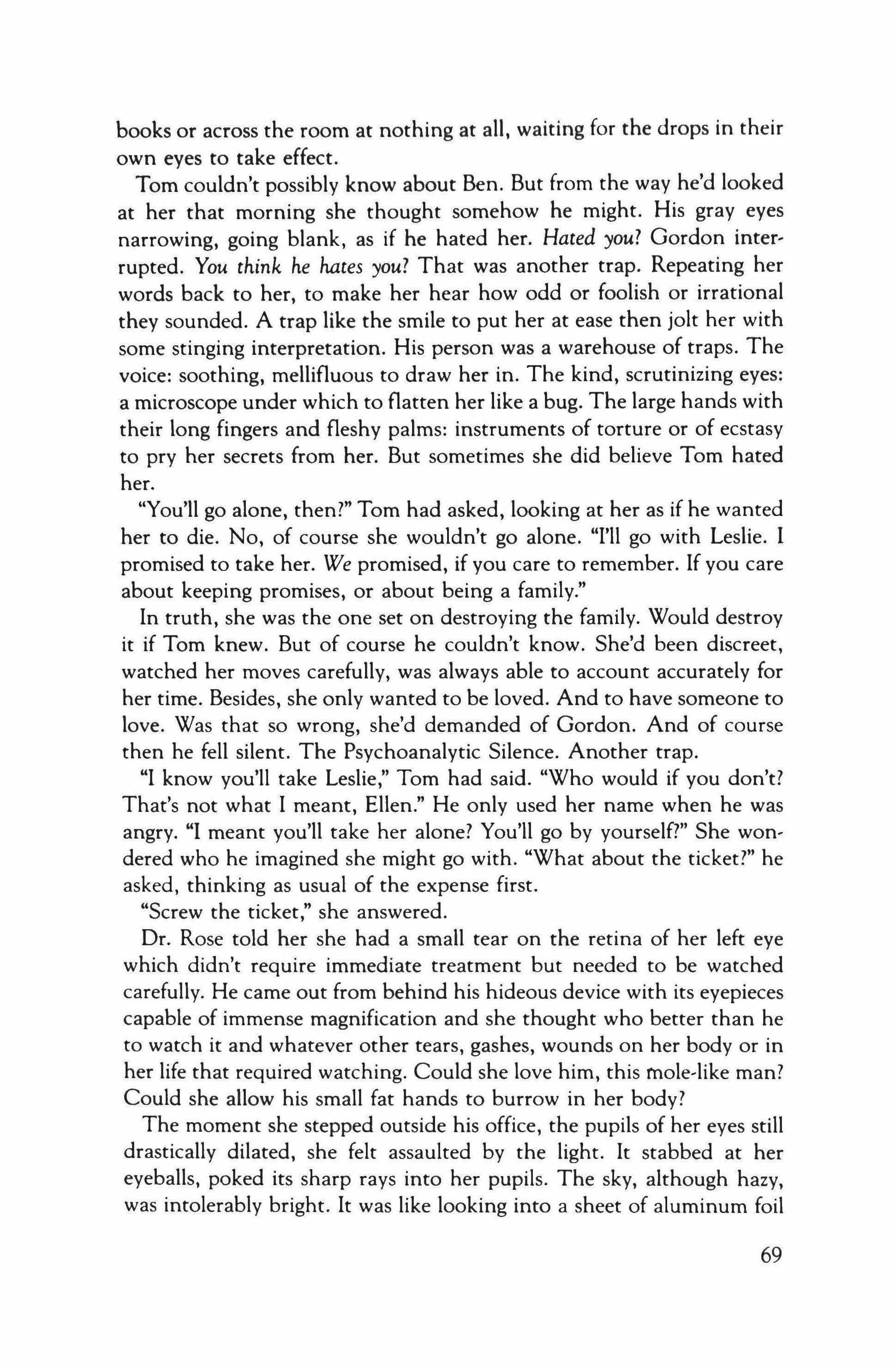
books or across the room at nothing at all, waiting for the drops in their own eyes to take effect.
Tom couldn't possibly know about Ben. But from the way he'd looked at her that morning she thought somehow he might. His gray eyes narrowing, going blank, as if he hated her. Hated you? Gordon inter' rupted. You think he hates you? That was another trap. Repeating her words back to her, to make her hear how odd or foolish or irrational they sounded. A trap like the smile to put her at ease then jolt her with some stinging interpretation. His person was a warehouse of traps. The voice: soothing, mellifluous to draw her in. The kind, scrutinizing eyes: a microscope under which to flatten her like a bug. The large hands with their long fingers and fleshy palms: instruments of torture or of ecstasy to pry her secrets from her. But sometimes she did believe Tom hated her.
"You'll go alone, then?" Tom had asked, looking at her as if he wanted her to die. No, of course she wouldn't go alone. "I'll go with Leslie. I promised to take her. We promised, if you care to remember. If you care about keeping promises, or about being a family."
In truth, she was the one set on destroying the family. Would destroy it if Tom knew. But of course he couldn't know. She'd been discreet, watched her moves carefully, was always able to account accurately for her time. Besides, she only wanted to be loved. And to have someone to love. Was that so wrong, she'd demanded of Gordon. And of course then he fell silent. The Psychoanalytic Silence. Another trap.
"I know you'll take Leslie," Tom had said. "Who would if you don't? That's not what I meant, Ellen." He only used her name when he was angry. "I meant you'll take her alone? You'll go by yourself?" She won, dered who he imagined she might go with. "What about the ticket?" he asked, thinking as usual of the expense first.
"Screw the ticket," she answered.
Dr. Rose told her she had a small tear on the retina of her left eye which didn't require immediate treatment but needed to be watched carefully. He came out from behind his hideous device with its eyepieces capable of immense magnification and she thought who better than he to watch it and whatever other tears, gashes, wounds on her body or in her life that required watching. Could she love him, this mole-like man? Could she allow his small fat hands to burrow in her body?
The moment she stepped outside his office, the pupils of her eyes still drastically dilated, she felt assaulted by the light. It stabbed at her eyeballs, poked its sharp rays into her pupils. The sky, although hazy, was intolerably bright. It was like looking into a sheet of aluminum foil
69

raised to the sun. Intermittent rain showers had been falling all morning. The streets were still wet. The cars and storefronts appeared unnaturally clean. From their shining chrome and glass surfaces the light of the sun bounced straight into her eyes. She had forgotten her sunglasses. Raising a hand to shield her eyes, the accusation in Tom's voice returned to her. She walked down the street, his voice ringing in her ears.
"You'll go by yourself? You'll take her alone?" Could he possibly be asking if she'd take Ben along? Certainly not. He didn't know about Ben. He couldn't know. He was simply seething with fury over the thought of that expensive ticket going to waste. She could have asked one of Leslie's friends to go with them, she supposed. Petra or Brenda or Jenny would have jumped at the chance to go to the circus, but she didn't want some other little girl chattering and squealing and hanging on her all day. Alone, each of Leslie's friends was polite enough. They were well-behaved and, thankfully, even quiet little girls. But two together each fed on the other's personality, ingesting the silliest, wildest traits. They got loud and sweaty and awkward, seeming to grow larger and more unwieldy in pairs, as if parts of them had merged and out of two were created one fat unruly child, doubled in defiance and five-yearold willfulness. She simply could not take that today.
Vulnerable to every stray shaft of light around her, she walked with the back of her hand raised to her eyes. Her head ducked now one way, now another, as she dodged the light like bullets. Street signs blurred before her. She couldn't tell where the edge of the curb was. Thus exposed and blinded in the light, she was a walking target. Any disaster might befall her, any crushing misfortune, and she would be helpless against it. In the middle of the street she froze. A car was coming toward her fast. Too fast. Its headlights were turned on against the haze. Around their rims ran radiating rings of hard white light. The rings ran in pairs, in triples, obscuring the car's grille, its hood and windshield and even the driver within. It was impossible to judge its intention. Would it stop before reaching her, veer to one side, mow her down? She stared into the blinding lights and they seemed to stare back as if in recognition, as if they had come a long way to seek her out and crush her bones against those thick circles of glass around which they ran.
Tom had sent that car: the thought raced wildly in her mind as she dashed across the street. Tom had found out about Ben and had hired someone to kill her. Suddenly, she was certain of it. She'd been careless, made some fatal mistake, carried Ben's smell into Tom's bed, uttered his name in her sleep. Oh God, had her very dreams betrayed her? And
70
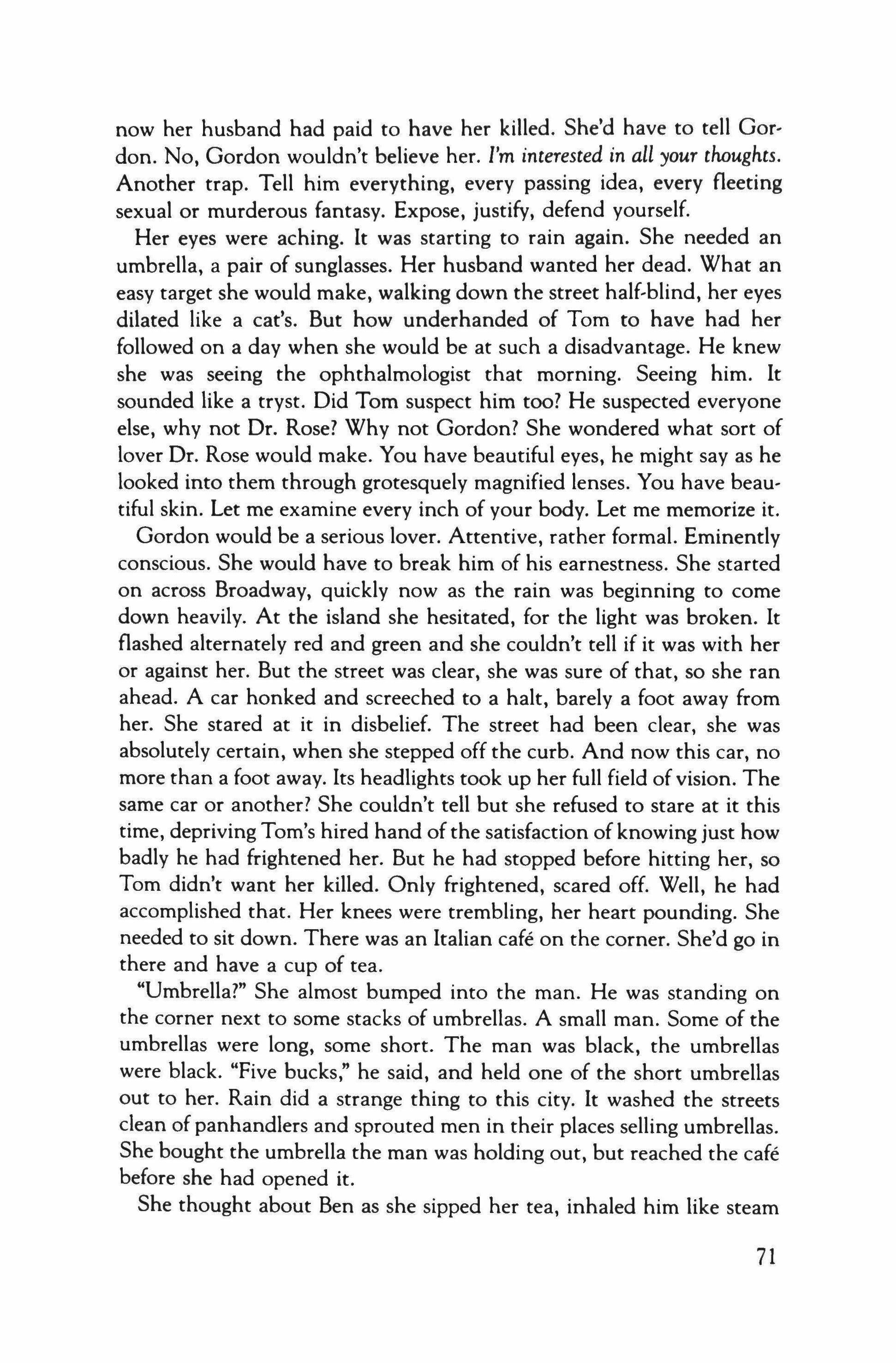
now her husband had paid to have her killed. She'd have to tell Gordon. No, Gordon wouldn't believe her. I'm interested in all your thoughts. Another trap. Tell him everything, every passing idea, every fleeting sexual or murderous fantasy. Expose, justify, defend yourself. Her eyes were aching. It was starting to rain again. She needed an umbrella, a pair of sunglasses. Her husband wanted her dead. What an easy target she would make, walking down the street half-blind, her eyes dilated like a eat's. But how underhanded of Tom to have had her followed on a day when she would be at such a disadvantage. He knew she was seeing the ophthalmologist that morning. Seeing him. It sounded like a tryst. Did Tom suspect him too? He suspected everyone else, why not Dr. Rose? Why not Gordon? She wondered what sort of lover Dr. Rose would make. You have beautiful eyes, he might say as he looked into them through grotesquely magnified lenses. You have beautiful skin. Let me examine every inch of your body. Let me memorize it. Gordon would be a serious lover. Attentive, rather formal. Eminently conscious. She would have to break him of his earnestness. She started on across Broadway, quickly now as the rain was beginning to come down heavily. At the island she hesitated, for the light was broken. It flashed alternately red and green and she couldn't tell if it was with her or against her. But the street was clear, she was sure of that, so she ran ahead. A car honked and screeched to a halt, barely a foot away from her. She stared at it in disbelief. The street had been clear, she was absolutely certain, when she stepped off the curb. And now this car, no more than a foot away. Its headlights took up her full field of vision. The same car or another? She couldn't tell but she refused to stare at it this time, depriving Tom's hired hand ofthe satisfaction of knowing just how badly he had frightened her. But he had stopped before hitting her, so Tom didn't want her killed. Only frightened, scared off. Well, he had accomplished that. Her knees were trembling, her heart pounding. She needed to sit down. There was an Italian cafe on the corner. She'd go in there and have a cup of tea.
"Umbrella?" She almost bumped into the man. He was standing on the corner next to some stacks of umbrellas. A small man. Some of the umbrellas were long, some short. The man was black, the umbrellas were black. "Five bucks," he said, and held one of the short umbrellas out to her. Rain did a strange thing to this city. It washed the streets clean of panhandlers and sprouted men in their places selling umbrellas. She bought the umbrella the man was holding out, but reached the cafe before she had opened it.
She thought about Ben as she sipped her tea, inhaled him like steam
71
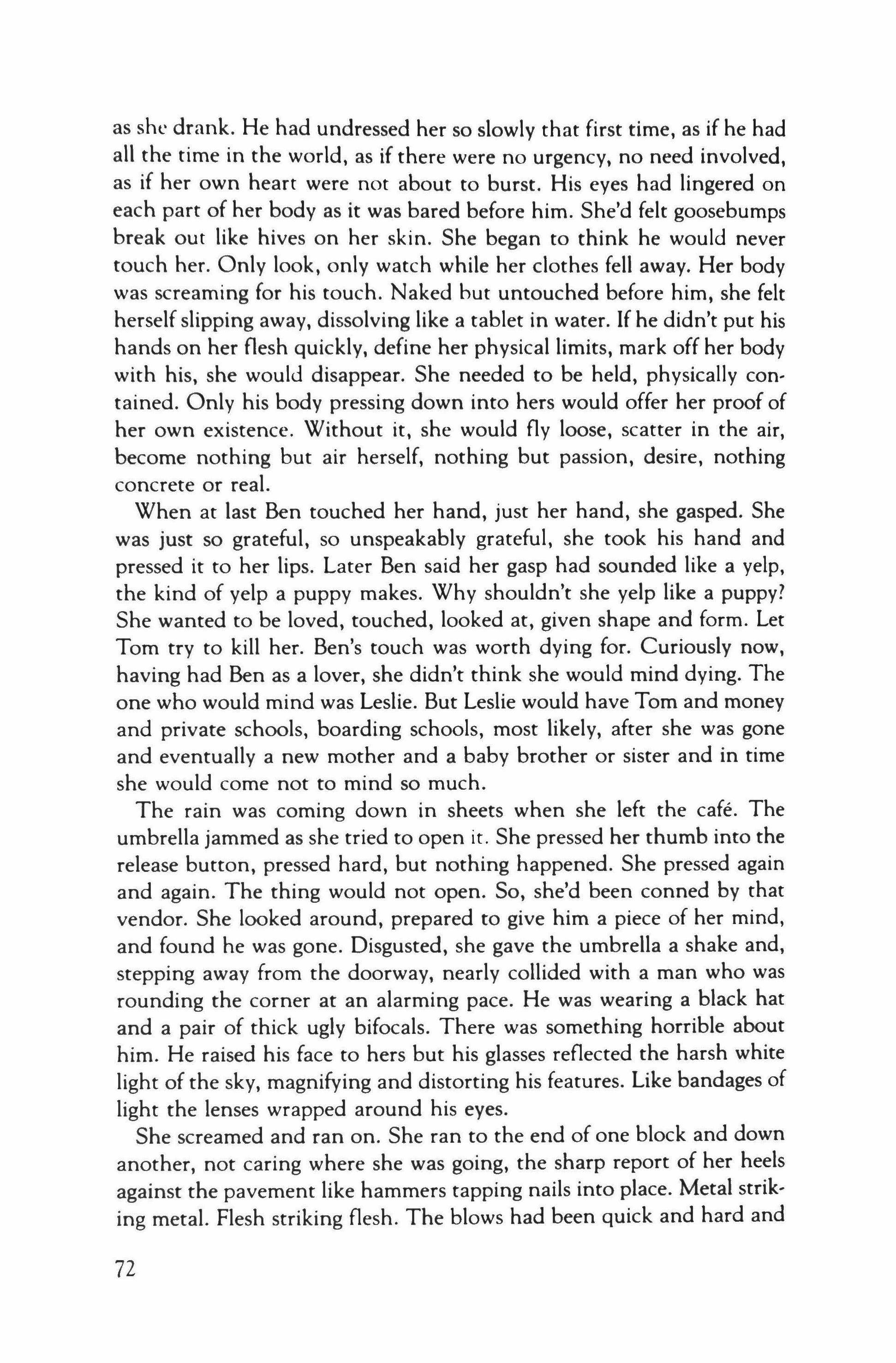
as she drank. He had undressed her so slowly that first time, as if he had all the time in the world, as if there were no urgency, no need involved, as if her own heart were not about to burst. His eyes had lingered on each part of her body as it was bared before him. She'd felt goosebumps break out like hives on her skin. She began to think he would never touch her. Only look, only watch while her clothes fell away. Her body was screaming for his touch. Naked hut untouched before him, she felt herself slipping away, dissolving like a tablet in water. If he didn't put his hands on her flesh quickly, define her physical limits, mark off her body with his, she would disappear. She needed to be held, physically contained. Only his body pressing down into hers would offer her proof of her own existence. Without it, she would fly loose, scatter in the air, become nothing but air herself, nothing but passion, desire, nothing concrete or real.
When at last Ben touched her hand, just her hand, she gasped. She was just so grateful, so unspeakably grateful, she took his hand and pressed it to her lips. Later Ben said her gasp had sounded like a yelp, the kind of yelp a puppy makes. Why shouldn't she yelp like a puppy? She wanted to be loved, touched, looked at, given shape and form. Let Tom try to kill her. Ben's touch was worth dying for. Curiously now, having had Ben as a lover, she didn't think she would mind dying. The one who would mind was Leslie. But Leslie would have Tom and money and private schools, boarding schools, most likely, after she was gone and eventually a new mother and a baby brother or sister and in time she would come not to mind so much.
The rain was coming down in sheets when she left the cafe. The umbrella jammed as she tried to open it. She pressed her thumb into the release button, pressed hard, but nothing happened. She pressed again and again. The thing would not open. So, she'd been conned by that vendor. She looked around, prepared to give him a piece of her mind, and found he was gone. Disgusted, she gave the umbrella a shake and, stepping away from the doorway, nearly collided with a man who was rounding the corner at an alarming pace. He was wearing a black hat and a pair of thick ugly bifocals. There was something horrible about him. He raised his face to hers but his glasses reflected the harsh white light of the sky, magnifying and distorting his features. Like bandages of light the lenses wrapped around his eyes.
She screamed and ran on. She ran to the end of one block and down another, not caring where she was going, the sharp report of her heels against the pavement like hammers tapping nails into place. Metal striking metal. Flesh striking flesh. The blows had been quick and hard and
72
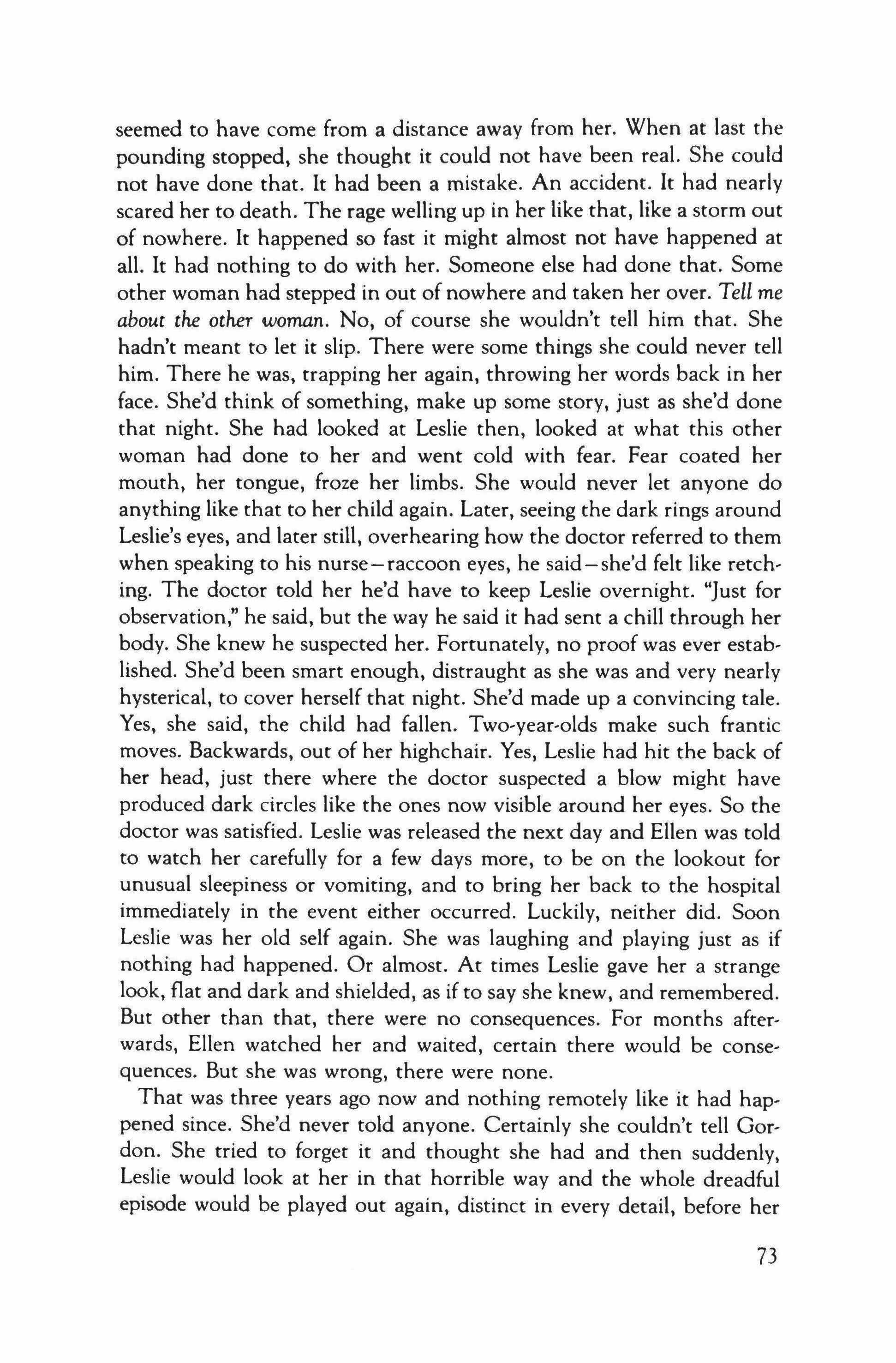
seemed to have come from a distance away from her. When at last the pounding stopped, she thought it could not have been real. She could not have done that. It had been a mistake. An accident. It had nearly scared her to death. The rage welling up in her like that, like a storm out of nowhere. It happened so fast it might almost not have happened at all. It had nothing to do with her. Someone else had done that. Some other woman had stepped in out of nowhere and taken her over. Tell me about the other woman. No, of course she wouldn't tell him that. She hadn't meant to let it slip. There were some things she could never tell him. There he was, trapping her again, throwing her words back in her face. She'd think of something, make up some story, just as she'd done that night. She had looked at Leslie then, looked at what this other woman had done to her and went cold with fear. Fear coated her mouth, her tongue, froze her limbs. She would never let anyone do anything like that to her child again. Later, seeing the dark rings around Leslie's eyes, and later still, overhearing how the doctor referred to them when speaking to his nurse-raccoon eyes, he said-she'd felt like retching. The doctor told her he'd have to keep Leslie overnight. "Just for observation," he said, but the way he said it had sent a chill through her body. She knew he suspected her. Fortunately, no proof was ever established. She'd been smart enough, distraught as she was and very nearly hysterical, to cover herself that night. She'd made up a convincing tale. Yes, she said, the child had fallen. Two-vear-olds make such frantic moves. Backwards, out of her highchair. Yes, Leslie had hit the back of her head, just there where the doctor suspected a blow might have produced dark circles like the ones now visible around her eyes. So the doctor was satisfied. Leslie was released the next day and Ellen was told to watch her carefully for a few days more, to be on the lookout for unusual sleepiness or vomiting, and to bring her back to the hospital immediately in the event either occurred. Luckily, neither did. Soon Leslie was her old self again. She was laughing and playing just as if nothing had happened. Or almost. At times Leslie gave her a strange look, flat and dark and shielded, as if to say she knew, and remembered. But other than that, there were no consequences. For months afterwards, Ellen watched her and waited, certain there would be consequences. But she was wrong, there were none.
That was three years ago now and nothing remotely like it had happened since. She'd never told anyone. Certainly she couldn't tell Gordon. She tried to forget it and thought she had and then suddenly, Leslie would look at her in that horrible way and the whole dreadful episode would be played out again, distinct in every detail, before her
73
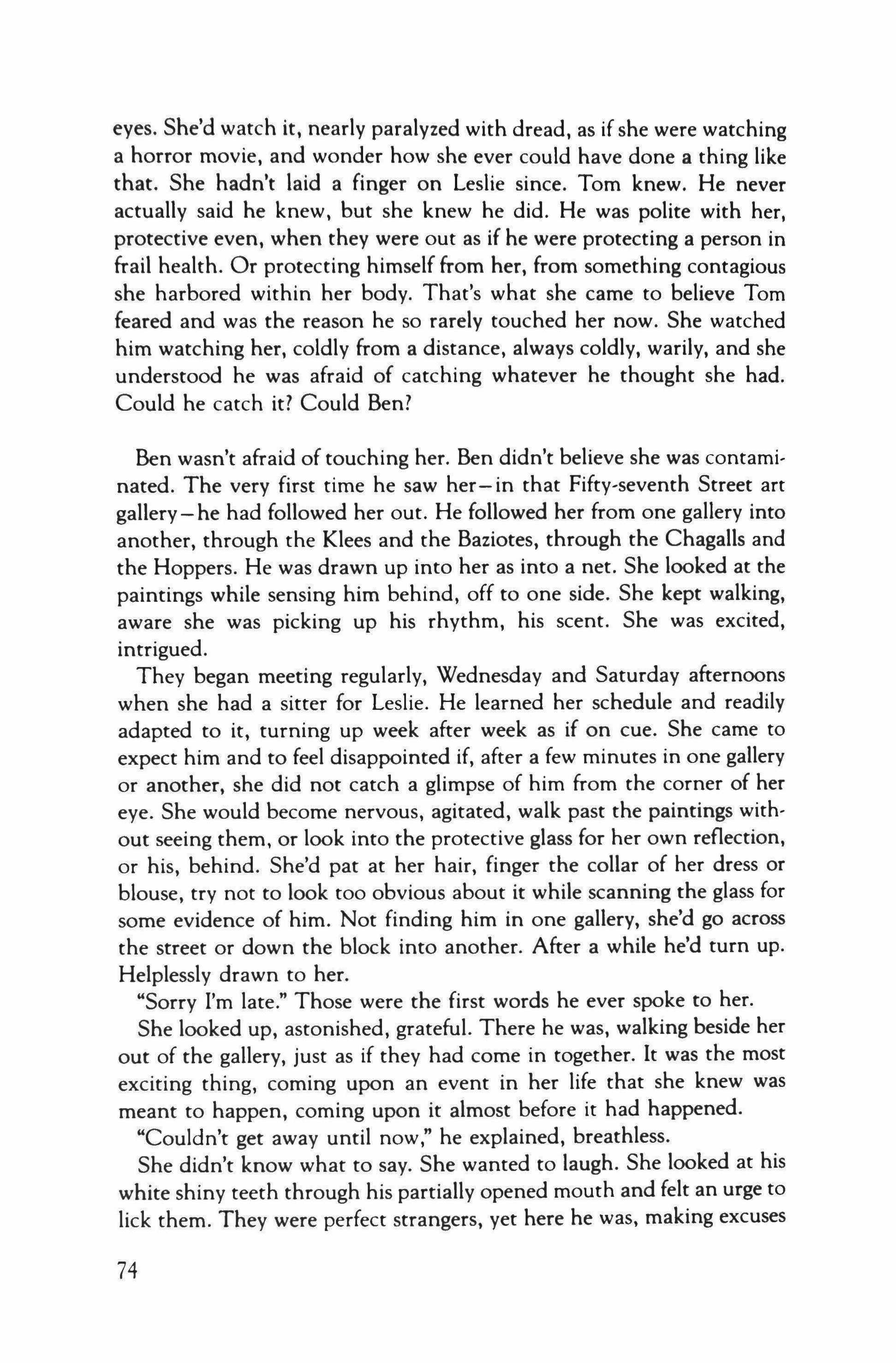
eyes. She'd watch it, nearly paralyzed with dread, as if she were watching a horror movie, and wonder how she ever could have done a thing like that. She hadn't laid a finger on Leslie since. Tom knew. He never actually said he knew, but she knew he did. He was polite with her, protective even, when they were out as if he were protecting a person in frail health. Or protecting himself from her, from something contagious she harbored within her body. That's what she came to believe Tom feared and was the reason he so rarely touched her now. She watched him watching her, coldly from a distance, always coldly, warily, and she understood he was afraid of catching whatever he thought she had. Could he catch it? Could Ben?
Ben wasn't afraid of touching her. Ben didn't believe she was contaminated. The very first time he saw her- in that Fifty-seventh Street art gallery-he had followed her out. He followed her from one gallery into another, through the Klees and the Baziotes, through the Chagalls and the Hoppers. He was drawn up into her as into a net. She looked at the paintings while sensing him behind, off to one side. She kept walking, aware she was picking up his rhythm, his scent. She was excited, intrigued.
They began meeting regularly, Wednesday and Saturday afternoons when she had a sitter for Leslie. He learned her schedule and readily adapted to it, turning up week after week as if on cue. She came to expect him and to feel disappointed if, after a few minutes in one gallery or another, she did not catch a glimpse of him from the corner of her eye. She would become nervous, agitated, walk past the paintings without seeing them, or look into the protective glass for her own reflection, or his, behind. She'd pat at her hair, finger the collar of her dress or blouse, try not to look too obvious about it while scanning the glass for some evidence of him. Not finding him in one gallery, she'd go across the street or down the block into another. After a while he'd turn up. Helplessly drawn to her.
"Sorry I'm late." Those were the first words he ever spoke to her. She looked up, astonished, grateful. There he was, walking beside her out of the gallery, just as if they had come in together. It was the most exciting thing, coming upon an event in her life that she knew was meant to happen, coming upon it almost before it had happened.
"Couldn't get away until now," he explained, breathless.
She didn't know what to say. She wanted to laugh. She looked at his white shiny teeth through his partially opened mouth and felt an urge to lick them. They were perfect strangers, yet here he was, making excuses
74
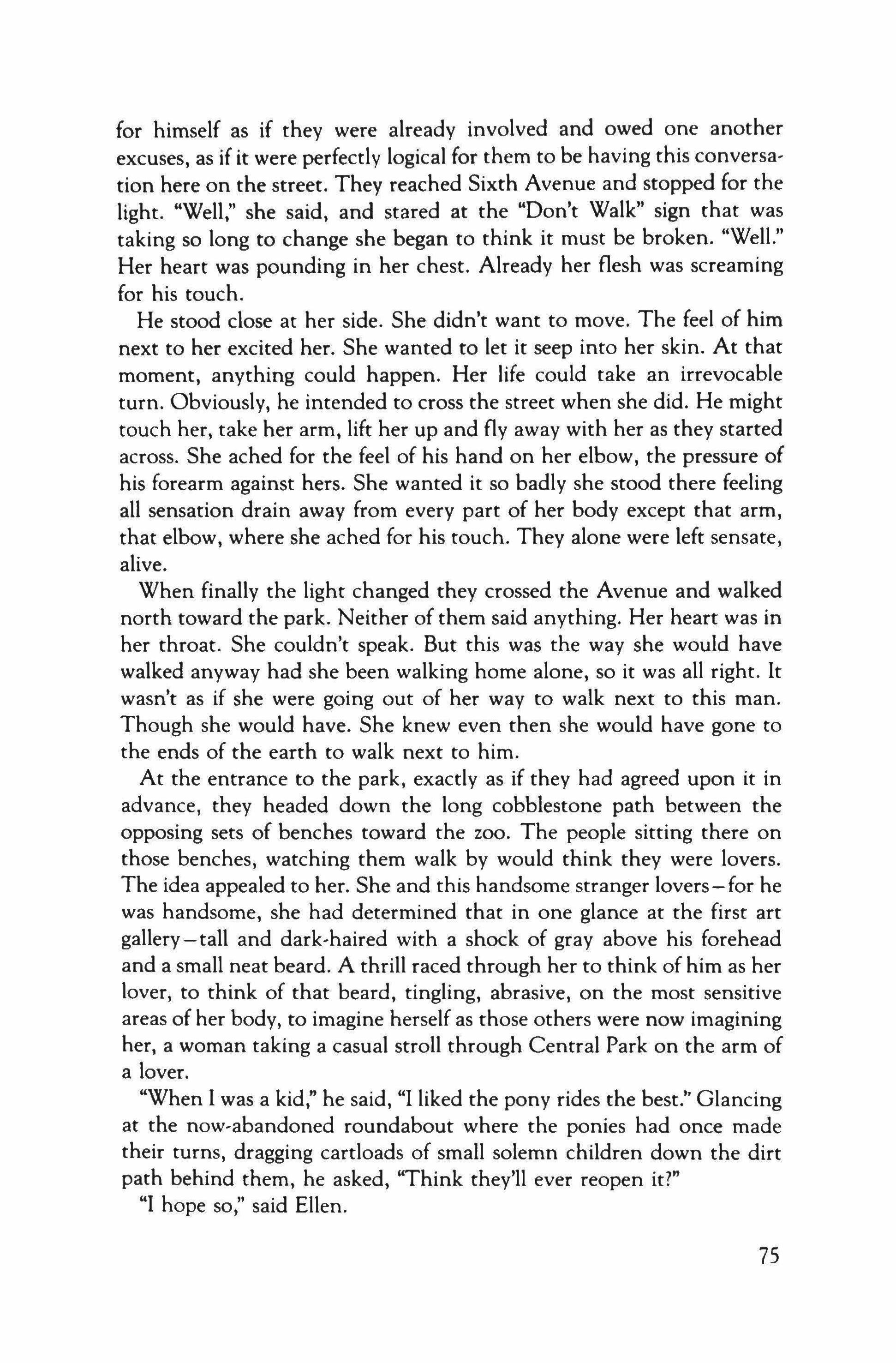
for himself as if they were already involved and owed one another excuses, as if it were perfectly logical for them to be having this conversation here on the street. They reached Sixth Avenue and stopped for the light. "Well," she said, and stared at the "Don't Walk" sign that was taking so long to change she began to think it must be broken. "Well." Her heart was pounding in her chest. Already her flesh was screaming for his touch.
He stood close at her side. She didn't want to move. The feel of him next to her excited her. She wanted to let it seep into her skin. At that moment, anything could happen. Her life could take an irrevocable turn. Obviously, he intended to cross the street when she did. He might touch her, take her arm, lift her up and flyaway with her as they started across. She ached for the feel of his hand on her elbow, the pressure of his forearm against hers. She wanted it so badly she stood there feeling all sensation drain away from every part of her body except that arm, that elbow, where she ached for his touch. They alone were left sensate, alive.
When finally the light changed they crossed the Avenue and walked north toward the park. Neither of them said anything. Her heart was in her throat. She couldn't speak. But this was the way she would have walked anyway had she been walking home alone, so it was all right. It wasn't as if she were going out of her way to walk next to this man. Though she would have. She knew even then she would have gone to the ends of the earth to walk next to him.
At the entrance to the park, exactly as if they had agreed upon it in advance, they headed down the long cobblestone path between the opposing sets of benches toward the zoo. The people sitting there on those benches, watching them walk by would think they were lovers. The idea appealed to her. She and this handsome stranger lovers-for he was handsome, she had determined that in one glance at the first art gallery-tall and dark-haired with a shock of gray above his forehead and a small neat beard. A thrill raced through her to think of him as her lover, to think of that beard, tingling, abrasive, on the most sensitive areas of her body, to imagine herself as those others were now imagining her, a woman taking a casual stroll through Central Park on the arm of a lover.
"When I was a kid," he said, "I liked the pony rides the best." Glancing at the now-abandoned roundabout where the ponies had once made their turns, dragging cartloads of small solemn children down the dirt path behind them, he asked, "Think they'll ever reopen it?"
"I hope so," said Ellen.
75
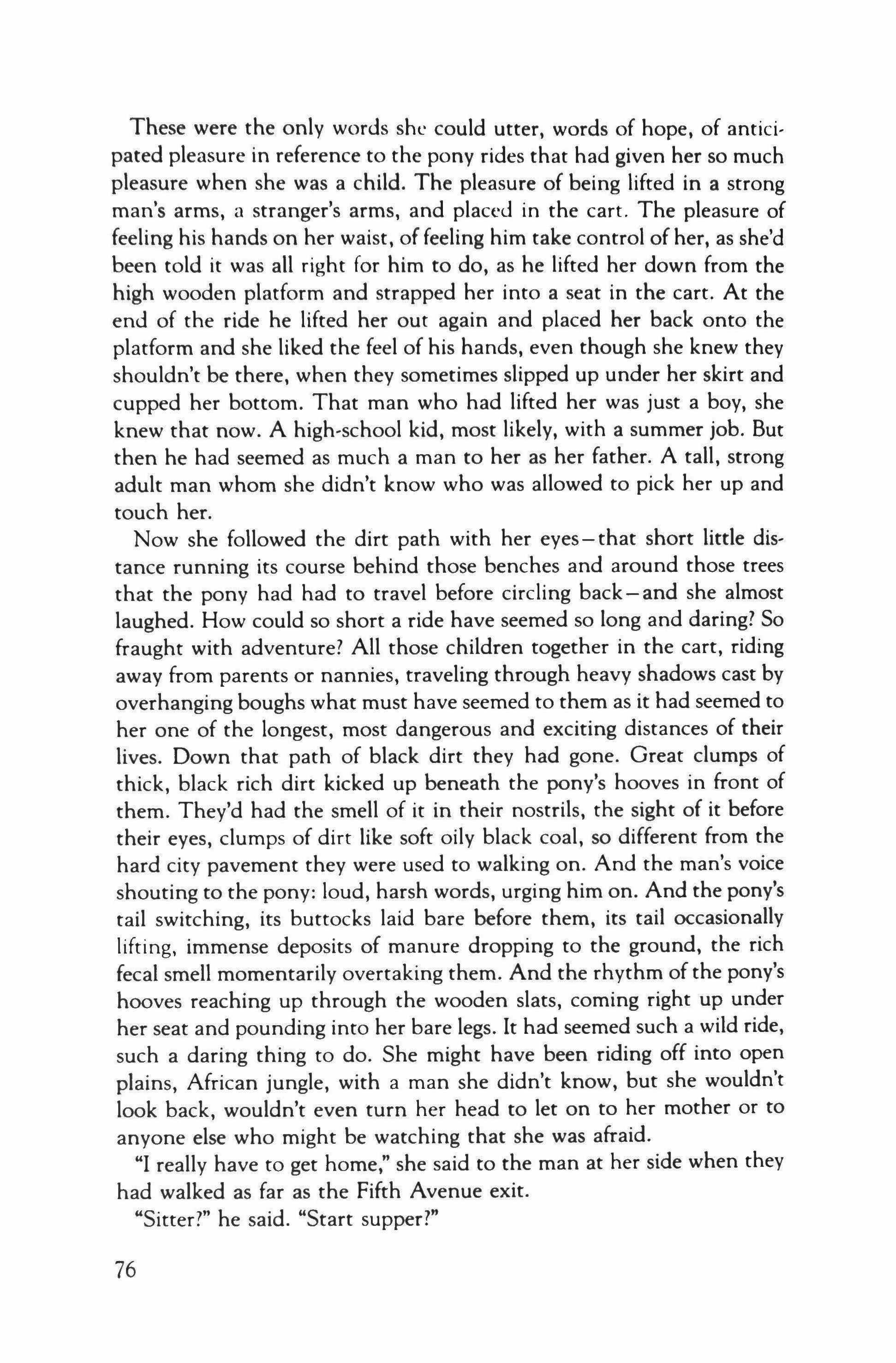
These were the only words she could utter, words of hope, of anticipated pleasure in reference to the pony rides that had given her so much pleasure when she was a child. The pleasure of being lifted in a strong man's arms, a stranger's arms, and placed in the cart. The pleasure of feeling his hands on her waist, of feeling him take control of her, as she'd been told it was all right for him to do, as he lifted her down from the high wooden platform and strapped her into a seat in the cart. At the end of the ride he lifted her out again and placed her back onto the platform and she liked the feel of his hands, even though she knew they shouldn't be there, when they sometimes slipped up under her skirt and cupped her bottom. That man who had lifted her was just a boy, she knew that now. A high-school kid, most likely, with a summer job. But then he had seemed as much a man to her as her father. A tall, strong adult man whom she didn't know who was allowed to pick her up and touch her.
Now she followed the dirt path with her eyes-that short little distance running its course behind those benches and around those trees that the pony had had to travel before circling back-and she almost laughed. How could so short a ride have seemed so long and daring? So fraught with adventure? All those children together in the cart, riding away from parents or nannies, traveling through heavy shadows cast by overhanging boughs what must have seemed to them as it had seemed to her one of the longest, most dangerous and exciting distances of their lives. Down that path of black dirt they had gone. Great clumps of thick, black rich dirt kicked up beneath the pony's hooves in front of them. They'd had the smell of it in their nostrils, the sight of it before their eyes, clumps of dirt like soft oily black coal, so different from the hard city pavement they were used to walking on. And the man's voice shouting to the pony: loud, harsh words, urging him on. And the pony's tail switching, its buttocks laid bare before them, its tail occasionally lifting, immense deposits of manure dropping to the ground, the rich fecal smell momentarily overtaking them. And the rhythm of the pony's hooves reaching up through the wooden slats, coming right up under her seat and pounding into her bare legs. It had seemed such a wild ride, such a daring thing to do. She might have been riding off into open plains, African jungle, with a man she didn't know, but she wouldn't look back, wouldn't even turn her head to let on to her mother or to anyone else who might be watching that she was afraid.
"I really have to get home," she said to the man at her side when they had walked as far as the Fifth Avenue exit. "Sitter?" he said. "Start supped"
76

"Something like that." Her arm was on fire. She was burning for his touch. She didn't have to get home, relieve the sitter, start supper. If he took her arm she could with a single phone call arrange for the sitter to stay late, feed Leslie, put her to bed. Tom, most likely, wouldn't be coming home for dinner. Business, he'd say. But she had her doubts. One touch and she could go with this man for a glass of wine then on to his apartment and into his bed. For surely that's what it was all about, the accidental meetings and surreptitious glances, the walk through the park. It was about going home with this man to his bed. It was about tenderness and affection and sex. That's all she had ever wanted and she could have it now. It was so simple it nearly made her cry.
Her hair, her face, were soaking wet. She pointed the umbrella straight ahead and gave it a quick shake while simultaneously pressing down on the release button. It flew open at once. So, that vendor hadn't cheated her after all. She owed him an apology. It was these damned drops, dilating her eyes, distorting everything in her field of vision. She probably hadn't been looking at the right button before. Her eyes were aching. Deep around behind them, arcs of pain like rubber bands were pulling tight. Light splintered her eyeballs. Ricocheting off storefronts, windshields, lampposts and steel construction girders, it shot like shards of glass into her eyes. The least shaft of light rebounding from the smallest puddle at her feet was enough to make her wince. The glass and chrome of the city assaulted her. The city's cars and trucks, its buildings and signposts, the most innocuous of its reflecting surfaces assaulted her.
At the corner she tried to hail a taxi but couldn't distinguish vacancy lights from off-duty signals. Waves of bright yellow cabs rolled toward her. Despite her frantic gestures, one by one they passed her by. Eventually she gave up, telling herself it was impossible to find a cab in the rain in this town anyway. She walked to the nearest bus stop, waited what seemed an eternity and when the bus finally came it was packed so full she looked in through the rain-streaked windows at the people jamming the aisle, imagined herself squeezed in among them, jostled and shoved, wet clothes touching her, wet umbrellas pressed against her stockings, water dripping into her shoes, and ended by walking home.
"You like art?" Ben once asked. It was before she'd gone home with him that first time.
"What?" With him so near she couldn't get control of her thoughts.
77
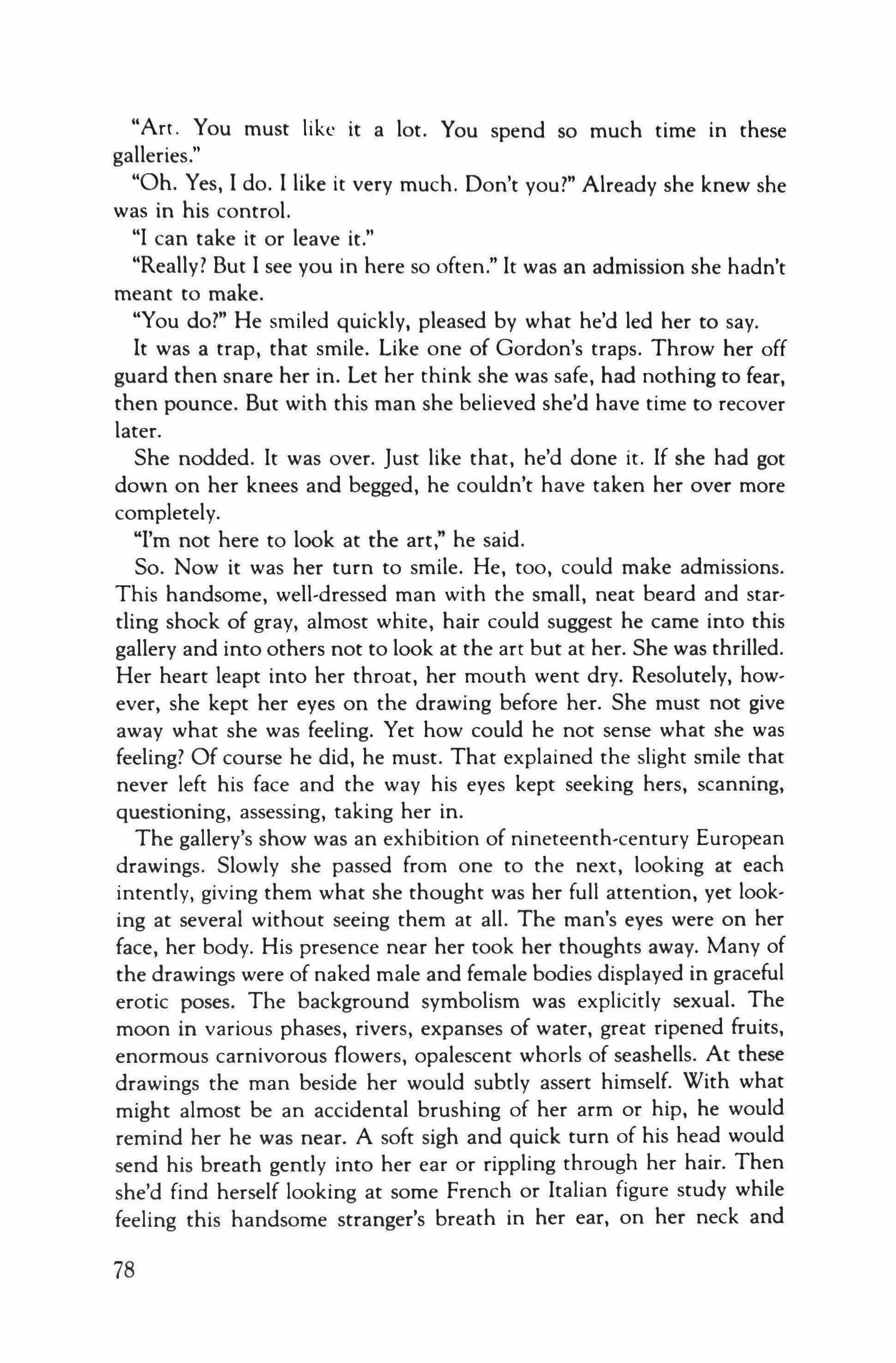
"Art. You must like it a lot. You spend so much time in these galleries."
"Oh. Yes, I do. I like it very much. Don't you?" Already she knew she was in his control.
"I can take it or leave it."
"Really? But I see you in here so often." It was an admission she hadn't meant to make.
"You do?" He smiled quickly, pleased by what he'd led her to say. It was a trap, that smile. Like one of Gordon's traps. Throw her off guard then snare her in. Let her think she was safe, had nothing to fear, then pounce. But with this man she believed she'd have time to recover later.
She nodded. It was over. Just like that, he'd done it. If she had got down on her knees and begged, he couldn't have taken her over more completely.
"I'm not here to look at the art," he said.
So. Now it was her turn to smile. He, too, could make admissions. This handsome, well-dressed man with the small, neat beard and startling shock of gray, almost white, hair could suggest he came into this gallery and into others not to look at the art but at her. She was thrilled. Her heart leapt into her throat, her mouth went dry. Resolutely, however, she kept her eyes on the drawing before her. She must not give away what she was feeling. Yet how could he not sense what she was feeling? Of course he did, he must. That explained the slight smile that never left his face and the way his eyes kept seeking hers, scanning, questioning, assessing, taking her in.
The gallery's show was an exhibition of nineteenth-century European drawings. Slowly she passed from one to the next, looking at each intently, giving them what she thought was her full attention, yet looking at several without seeing them at all. The man's eyes were on her face, her body. His presence near her took her thoughts away. Many of the drawings were of naked male and female bodies displayed in graceful erotic poses. The background symbolism was explicitly sexual. The moon in various phases, rivers, expanses of water, great ripened fruits, enormous carnivorous flowers, opalescent whorls of seashells. At these drawings the man beside her would subtly assert himself. With what might almost be an accidental brushing of her arm or hip, he would remind her he was near. A soft sigh and quick turn of his head would send his breath gently into her ear or rippling through her hair. Then she'd find herself looking at some French or Italian figure study while feeling this handsome stranger's breath in her ear, on her neck and
78

suddenly the nipples of the woman in the drawing or the man's genitalia would assume gigantic proportions and she'd feel her own nipples stiffen and her face begin to burn. She'd be unable to take her eyes off the nude. All she wanted to do was turn and look at the man. But her head was held as in a vise, her eyes locked on the drawing in front of her. If she looked at Ben it would begin, right there in the gallery. She'd be in his arms in a second, in his apartment, his bed, a second later. She would know the rough strokes of his beard against the softest parts of her skin, the tightening of his hands on her breasts, the grinding of his hips against hers. One look and she would feel herself safe in his arms, touched, held, loved, defined.
"I must go," she said, and walked quickly toward the exit.
"Your choice," he replied, following her.
It wasn't her choice. She had no choice. Already she was in his grip. Outside, he hailed a cab without a word and she got in. She fell against him on the seat, her mouth opened to his, sucking in his breath, his passion, sucking solace and life from him. She was afraid of the power of her own passion, the violence with which it would now be released. When they reached his apartment he undressed her slowly. After that, she was lost. Every time they met she fell deeper within his power. She went weak at the knees when he touched her. Her arms and legs turned to feathers. She would collapse on the floor of his living room. He would have to stoop down, lift her in his arms and carry her to the bed. She lay on his sheets, waiting for him, feeling a weakness in her chest, a shortness of breath, and a burning that began between her legs and radiated like a small sun upward into her sex, setting its lips like leaves on fire. Week after week, Ben touched her breast, her arm, and flames licked her skin. Her throat was scorched. She would not give it up. Passion was all that was worth remembering of life.
She was in love. It was that simple, that desperate. It wasn't something she could do anything about. Passion had hold of her. She was helpless in its power.
"I'm yours," she said. "I belong to you. I'd strip myself of everything for you. I'd turn myself inside out and have you look. I have no shame before you. I burn for your touch. I won't give it up. This burning makes my life worthwhile. I'd give everything up Torn, Leslie, my horne, my security but not that. Never that."
"You'd give up your own child?"
How comfortably Gordon sits in his brown leather chair, his long arms stretched loosely on its arms, his tall back pressed to its back. How
79

well he seems molded to that chair. Just so would he mold himself to her, chest to chest, groin to groin, his body pressing into hers and hers, like hot wax, receiving his impression. She would be branded by his flesh, identifiable by his contours. Howat ease he is with his physicality. He who handles his build and great height so well, would have no trouble taking hold of her, guiding the fires that rage within her. This man who has heard every form of human confession would hear her love cry. After so many hours of talk, hundreds of hours, countless hours of talk, she was eager for the violence with which her passion would explode once allowed to express itself with him, blindly, wordlessly.
Sometimes she goes blank in his presence. Her self drains away. Where are you? Another trap. Nowhere. There is no location at which she might be found. Only his voice, his tongue, his hands, his sex, guiding, probing, prodding, might bring her back to herself. She likes the thought of making love to him here in his office. His place of business, his professional citadel. That special room cut off from the rest of the world in which he behaves according to such a strict code of ethics. The greeting at the door, the ending to the session. Our time is up for today. Never prolonging the hour, never cutting it short. The Psychoanalytic Stance. No handshake, no physical contact, nothing more than that smile at the door. Was Gordon, like Tom, afraid of catching something from her? She would bring his standards down around his ears. She would make love to him in the midst of them. On the carpet by his chair, on his brown leather couch, near the table, artfully arranged, plants in the center, clock facing him, tissue box, her. After all these years in which he succeeded in getting so much out of her-truths, fictions, dreams, memories, fantasies, evasions, half-truths, outright lies-she would get something out of him now. She would force it out, rocking his professional demeanor, and, stripped of his calm, he would be unable to hold anything back. Sweating and trembling in her arms, he would pour everything into her and what he released would make her real.
He sits forward, presses a lever at the base of his chair. With the sound of blades sharpening a footrest shoots out, rises into place, joins the body of the chair. The footrest is another trap. His floor is a mined field. From beneath the chair, the couch, knives shoot out, bullets, sticks, clubs. Behind his kind blue eyes tripwires lie, automatic pistols fire. What are you thinking? Nothing.
Tom wasn't home, of course. He had left the house that morning before she was even awake. He would have to leave early, he'd told her
80

the night before when he finally remembered, or finally admitted to remembering, his precious golf game.
"It's business, Ellen," he told her. "They're important men. They know everybody. They represent hundreds of thousands of dollars in potential clients. I have to play."
Important men, she had almost laughed at that. "But tomorrow of all days? You have to play tomorrow?"
Yes, he said. He was sorry. He had completely forgotten the circus. He was always sorry after the fact. And the golf game was all set up now. It had taken a good deal of doing to arrange that particular foursome. Peter Oakley and Jimmy Gray and Louis Unger were the three biggest real-estate men in town. The pride he had displayed upon saying that was nothing if not ludicrous. Getting them together was quite a coup, he said. A coup? she repeated. Had he really said that? He couldn't possibly cancel out now.
"Not even for Leslie?" she asked. "You promised her. Or doesn't a promise to a five-year-old mean anything to you?"
"I wouldn't talk about promises if I were you," he replied.
His power was that she couldn't be absolutely certain he knew. She could only suspect and worry, which was precisely what he wanted. Keep her on edge, constantly guessing. Did he know? Would he leave her and take Leslie? He had the money, the means, to do anything he liked and he would do that. He would leave her and take Leslie with him, take the only thing she truly cherished in this world. But of course he had no cause now. She kept forgetting that. None. As he couldn't remember the circus, she couldn't remember that. It was over. Ben had left her. What are you feeling? She had no feelings. Ben had gone out of her life and taken her feelings with him. Ben had gone. She would never see him again. Ben gone. Her mind couldn't take it in. In this her mind was a friend. It kept reaching up like a hand inside her brain to push away that unacceptable fact.
She wanted a bath to wash off the grime. It was splattered and caked like mud against her legs. But there wasn't time for a bath or even for a shower. Time only to towel-dry her hair, remove her shoes and stockings and put one foot and then the other into the sink and stand there like a stork on one leg running the warm soapy washcloth over her foot and ankle, up her calf to the knee.
Her feet were long and narrow, dancer's feet. She had studied dance as a child, studied it seriously up through the years until she met Tom. She might have had a career in dance if she hadn't met Tom. Nineteen years old and dazzled by the success he had already achieved at twenty-five,
81

she was swept away by his style, his command of the world. No man before Tom had taken her into a smart shop and bought her a piece of jewelry or into a fine restaurant and told her she could have anything she liked. No man before him had told her he was a connoisseur of beautiful objects. He had a passion for them, he said, and took her back to his apartment to show her his collection. He pointed out the paintings on the walls and the fine china on the shelves and told her he needed her in his life to make it complete. Eventually he proposed marriage and, flattered, she accepted. Four years later Leslie was born and Ellen came to understand how easily a man who had a passion for beautiful objects might tire of one and seek to replace it with another. Her foot standing in the basin reminded her of Ben's feet. His, too, were long and narrow. With high arches and tapering toes. After making love with Ben she'd turn toward him and run her foot over his. She'd trace the large bone at the base of his great toe, the curve of his instep, the protuberance of his ankle. She'd hook her toes around the narrow place above his heel and hold him there a moment, his foot captive in hers. The pulse in his ankle beat like a heart between her toes. Then she'd release him and stretch her leg out along his. Their two legs made a striking contrast: his, hairy, dark and muscular; hers, long and smooth and pale. She worked at being perfect for Ben. If she were perfect he would never leave her. Always before meeting him, she bathed carefully, shaved her legs, her underarms, applied deodorant and rubbed moisturizer into her skin. She paid special attention to her elbows and the backs of her heels. It would not do to allow any rough spots on her body to stop Ben's hands and give him cause to reflect on her tiny imperfections. Days when she had her period were a torment to her. The flow of blood was so heavy. Thick, odorous, undisguisable. She would fabricate excuses for not being able to meet him. "Do you think that matters to me?" he said, when he finally caught on. "Do you think anything about your body could offend me?" And still he had left her.
Ellen looked at Leslie in her new lilac pinafore, at the long golden ringlets she had taken such pains to make hang just right, brushing them around her finger, securing them with warm water and a twist until they fell tight and smooth about her shoulders, and she knew by the simple virtue of her beauty this child would have everything she wanted in life. Any man she desired, any goal she set her heart on would be hers. The child was perfect and Ellen was content to have such a perfect child. She desired nothing in life but her happiness, craved
82
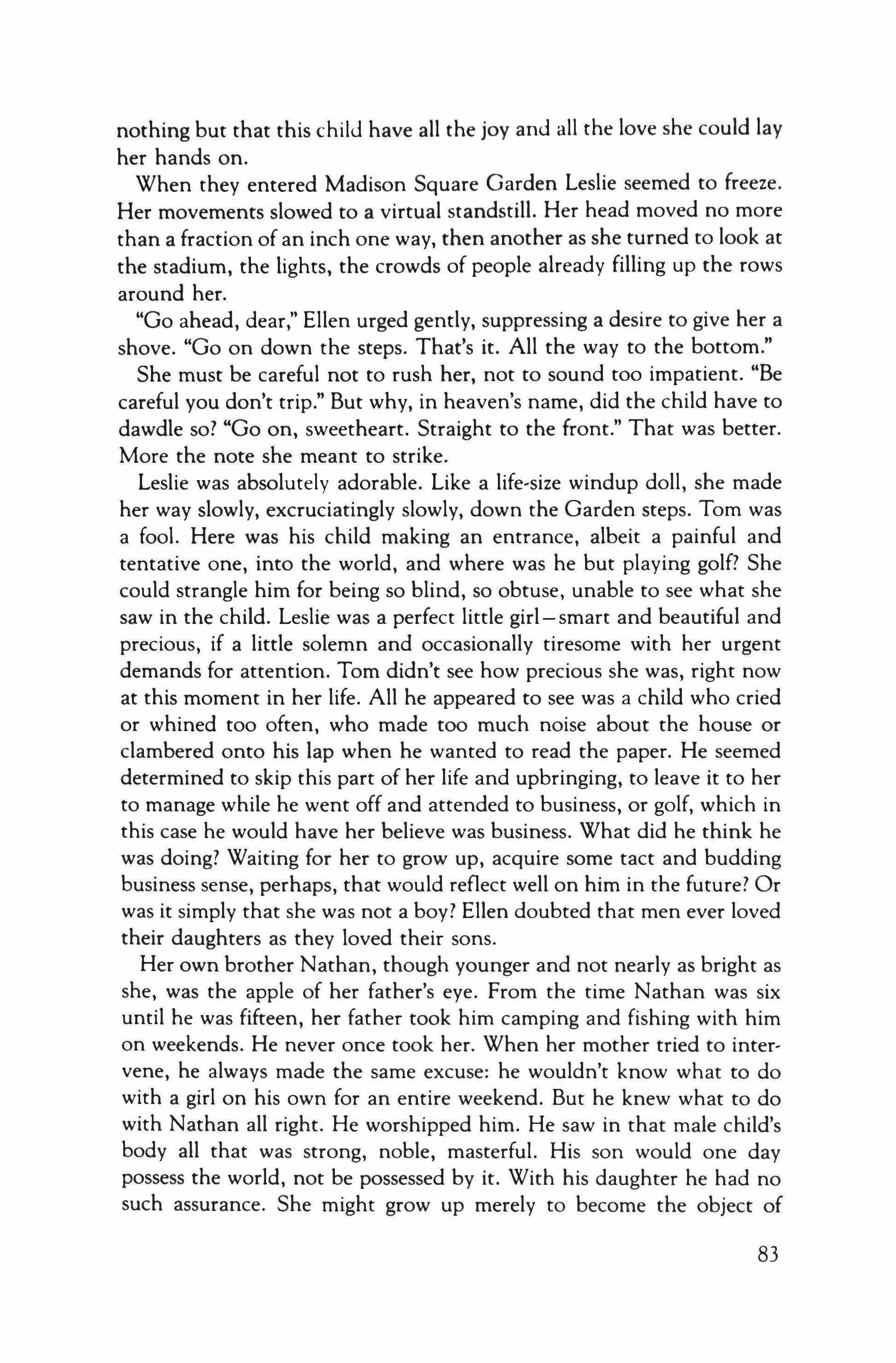
nothing but that this child have all the joy and all the love she could lay her hands on.
When they entered Madison Square Garden Leslie seemed to freeze. Her movements slowed to a virtual standstill. Her head moved no more than a fraction of an inch one way, then another as she turned to look at the stadium, the lights, the crowds of people already filling up the rows around her.
"Go ahead, dear," Ellen urged gently, suppressing a desire to give her a shove. "Go on down the steps. That's it. All the way to the bottom."
She must be careful not to rush her, not to sound too impatient. "Be careful you don't trip." But why, in heaven's name, did the child have to dawdle so? "Go on, sweetheart. Straight to the front." That was better. More the note she meant to strike.
Leslie was absolutely adorable. Like a life-size windup doll, she made her way slowly, excruciatingly slowly, down the Garden steps. Tom was a fool. Here was his child making an entrance, albeit a painful and tentative one, into the world, and where was he but playing golf? She could strangle him for being so blind, so obtuse, unable to see what she saw in the child. Leslie was a perfect little girl- smart and beautiful and precious, if a little solemn and occasionally tiresome with her urgent demands for attention. Tom didn't see how precious she was, right now at this moment in her life. All he appeared to see was a child who cried or whined too often, who made too much noise about the house or clambered onto his lap when he wanted to read the paper. He seemed determined to skip this part of her life and upbringing, to leave it to her to manage while he went off and attended to business, or golf, which in this case he would have her believe was business. What did he think he was doing? Waiting for her to grow up, acquire some tact and budding business sense, perhaps, that would reflect well on him in the future? Or was it simply that she was not a boy? Ellen doubted that men ever loved their daughters as they loved their sons.
Her own brother Nathan, though younger and not nearly as bright as she, was the apple of her father's eye. From the time Nathan was six until he was fifteen, her father took him camping and fishing with him on weekends. He never once took her. When her mother tried to intervene, he always made the same excuse: he wouldn't know what to do with a girl on his own for an entire weekend. But he knew what to do with Nathan all right. He worshipped him. He saw in that male child's body all that was strong, noble, masterful. His son would one day possess the world, not be possessed by it. With his daughter he had no such assurance. She might grow up merely to become the object of
83

another man's desire, a man by whom he would inevitably feel betrayed. And so he kept his distance. Ellen grew up believing there was something wrong with her, something intimately connected to her gender that prevented her father from loving her the way he loved Nathan.
"Cotton candy!" the young men shouted. "Hot dogs!"
How young they were, how beautiful in their striped jackets and white peaked hats. The band was tuning up, the crowd noisily settling into place. Ellen found the circus as exciting today as she had when she was a child. Yet her child had now come to a dead stop on the bottom step and was reaching back for her hand. She could take her own hand out of reach, refuse to let it be caught. But of course she would not. It was some other woman inside her making that suggestion. With a sudden wild, backward wave Leslie found her hand and gripped it hard and Ellen felt hot wires shoot into her fingers and run up her arm. It was all she could do to keep from raising her other hand and swatting the child across the face.
"Move along," she said, quietly, calmly, ignoring the woman inside her already screaming: It isn't fair! It always happens! Wherever they went, just when she began to enjoy herself, Leslie would clutch at her hand or yank on her arm and start to whine and nag. It drove her mad. She wanted to slap her face, pick her up and hurl her across the room. But she knew she mustn't, she must control herself. They were in a public place. People were looking at them. Thousands of people, and Leslie was only a child after all.
"One more row," Ellen said, in a steady, low tone that masked the other woman's scream. "Front row center, just as I promised."
There it was before them, almost close enough to touch. The whole vital, throbbing life of the circus waiting to begin. "Isn't this thrilling, darling? Say excuse me, please. Those two seats right there." All that separated them now from that magical life was one low little wall not ten feet from their seats.
Ben's eyes were alive, dancing. They could widen in delight or narrow to dark sensuous pinpricks but always with life, with energy. He was fueled by desire. For food, laughter, sex, experience, life. He roamed about her body in a series of infinitely subtle moves and countermoves. Teases and feints came easily to him, his hands now on her hips, now on the mound of her belly, his eyes and tongue exploring, memorizing, drawing her out. By turns patient and demanding, but always vigorous, always exuberant, he anticipated each of her yearnings and brought her
84
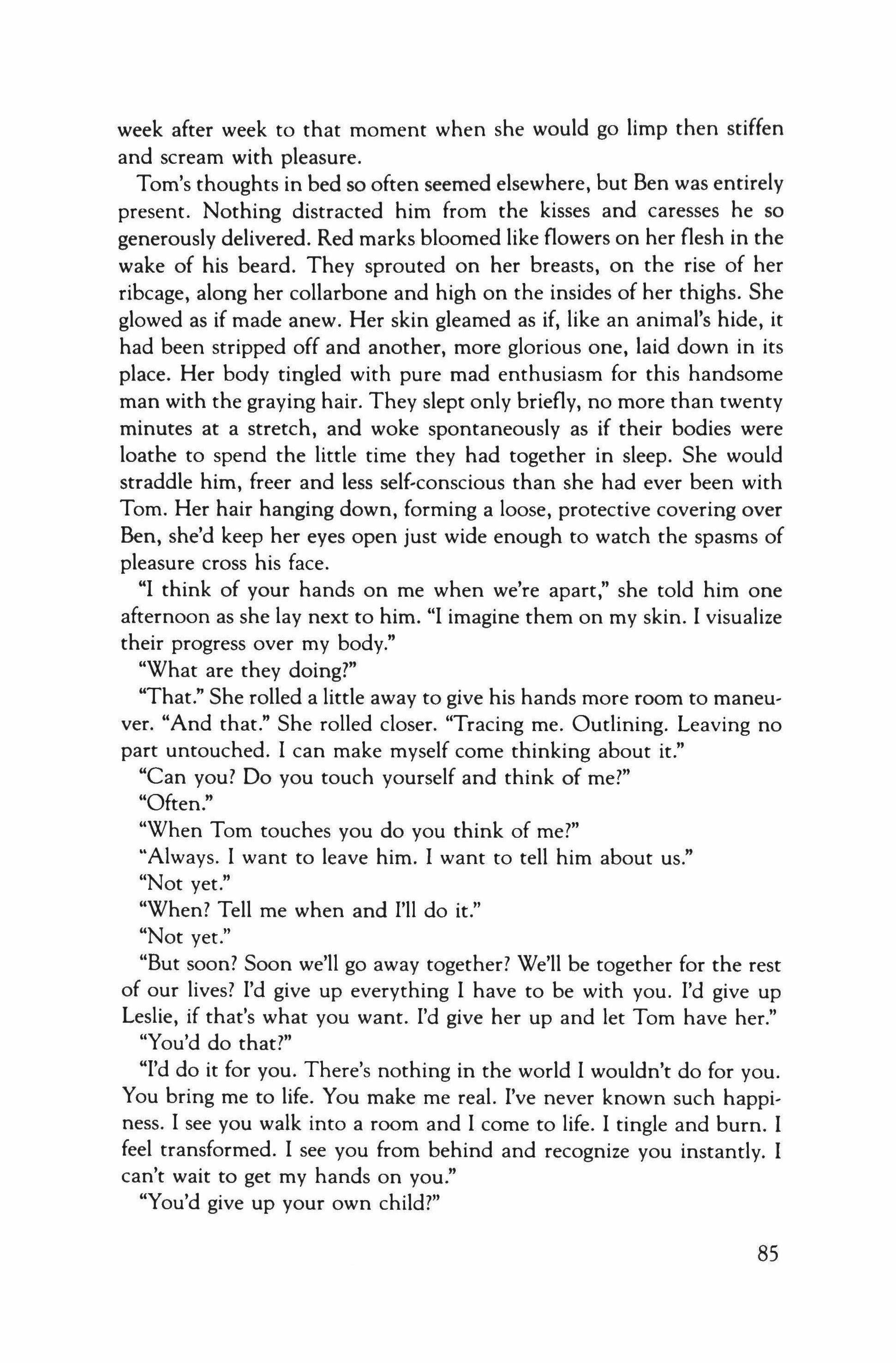
week after week to that moment when she would go limp then stiffen and scream with pleasure.
Tom's thoughts in bed so often seemed elsewhere, but Ben was entirely present. Nothing distracted him from the kisses and caresses he so generously delivered. Red marks bloomed like flowers on her flesh in the wake of his beard. They sprouted on her breasts, on the rise of her ribcage, along her collarbone and high on the insides of her thighs. She glowed as if made anew. Her skin gleamed as if, like an animal's hide, it had been stripped off and another, more glorious one, laid down in its place. Her body tingled with pure mad enthusiasm for this handsome man with the graying hair. They slept only briefly, no more than twenty minutes at a stretch, and woke spontaneously as if their bodies were loathe to spend the little time they had together in sleep. She would straddle him, freer and less self-conscious than she had ever been with Tom. Her hair hanging down, forming a loose, protective covering over Ben, she'd keep her eyes open just wide enough to watch the spasms of pleasure cross his face.
"I think of your hands on me when we're apart," she told him one afternoon as she lay next to him. "I imagine them on my skin. I visualize their progress over my body."
"What are they doing?"
"That." She rolled a little away to give his hands more room to maneuver. "And that." She rolled closer. "Tracing me. Outlining. Leaving no part untouched. I can make myself come thinking about it."
"Can you? Do you touch yourself and think of me?"
"Often."
"When Tom touches you do you think of me?"
"Always. I want to leave him. I want to tell him about us."
"Not yet."
"When? Tell me when and I'll do it."
"Not yet."
"But soon? Soon we'll go away together? We'll be together for the rest of our lives? I'd give up everything I have to be with you. I'd give up Leslie, if that's what you want. I'd give her up and let Tom have her."
"You'd do that?"
"I'd do it for you. There's nothing in the world I wouldn't do for you. You bring me to life. You make me real. I've never known such happiness. I see you walk into a room and I come to life. I tingle and burn. I feel transformed. I see you from behind and recognize you instantly. I can't wait to get my hands on you."
"You'd give up your own child?"
85
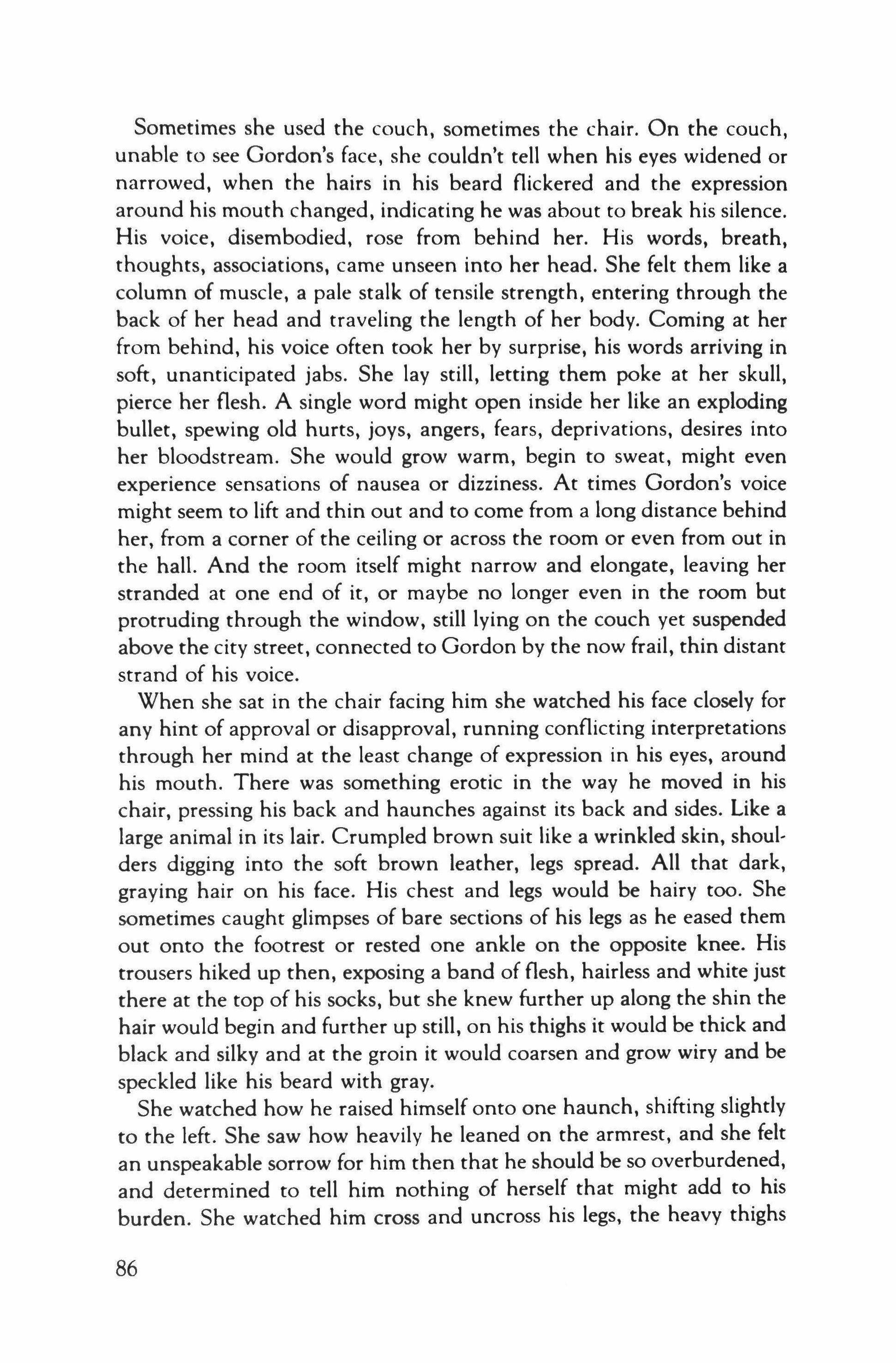
Sometimes she used the couch, sometimes the chair. On the couch, unable to see Gordon's face, she couldn't tell when his eyes widened or narrowed, when the hairs in his beard flickered and the expression around his mouth changed, indicating he was about to break his silence. His voice, disembodied, rose from behind her. His words, breath, thoughts, associations, came unseen into her head. She felt them like a column of muscle, a pale stalk of tensile strength, entering through the back of her head and traveling the length of her body. Coming at her from behind, his voice often took her by surprise, his words arriving in soft, unanticipated jabs. She lay still, letting them poke at her skull, pierce her flesh. A single word might open inside her like an exploding bullet, spewing old hurts, joys, angers, fears, deprivations, desires into her bloodstream. She would grow warm, begin to sweat, might even experience sensations of nausea or dizziness. At times Gordon's voice might seem to lift and thin out and to come from a long distance behind her, from a corner of the ceiling or across the room or even from out in the hall. And the room itself might narrow and elongate, leaving her stranded at one end of it, or maybe no longer even in the room but protruding through the window, still lying on the couch yet suspended above the city street, connected to Gordon by the now frail, thin distant strand of his voice.
When she sat in the chair facing him she watched his face closely for any hint of approval or disapproval, running conflicting interpretations through her mind at the least change of expression in his eyes, around his mouth. There was something erotic in the way he moved in his chair, pressing his back and haunches against its back and sides. Like a large animal in its lair. Crumpled brown suit like a wrinkled skin, shoulders digging into the soft brown leather, legs spread. All that dark, graying hair on his face. His chest and legs would be hairy too. She sometimes caught glimpses of bare sections of his legs as he eased them out onto the footrest or rested one ankle on the opposite knee. His trousers hiked up then, exposing a band of flesh, hairless and white just there at the top of his socks, but she knew further up along the shin the hair would begin and further up still, on his thighs it would be thick and black and silky and at the groin it would coarsen and grow wiry and be speckled like his beard with gray.
She watched how he raised himself onto one haunch, shifting slightly to the left. She saw how heavily he leaned on the armrest, and she felt an unspeakable sorrow for him then that he should be so overburdened, and determined to tell him nothing of herself that might add to his burden. She watched him cross and uncross his legs, the heavy thighs
86
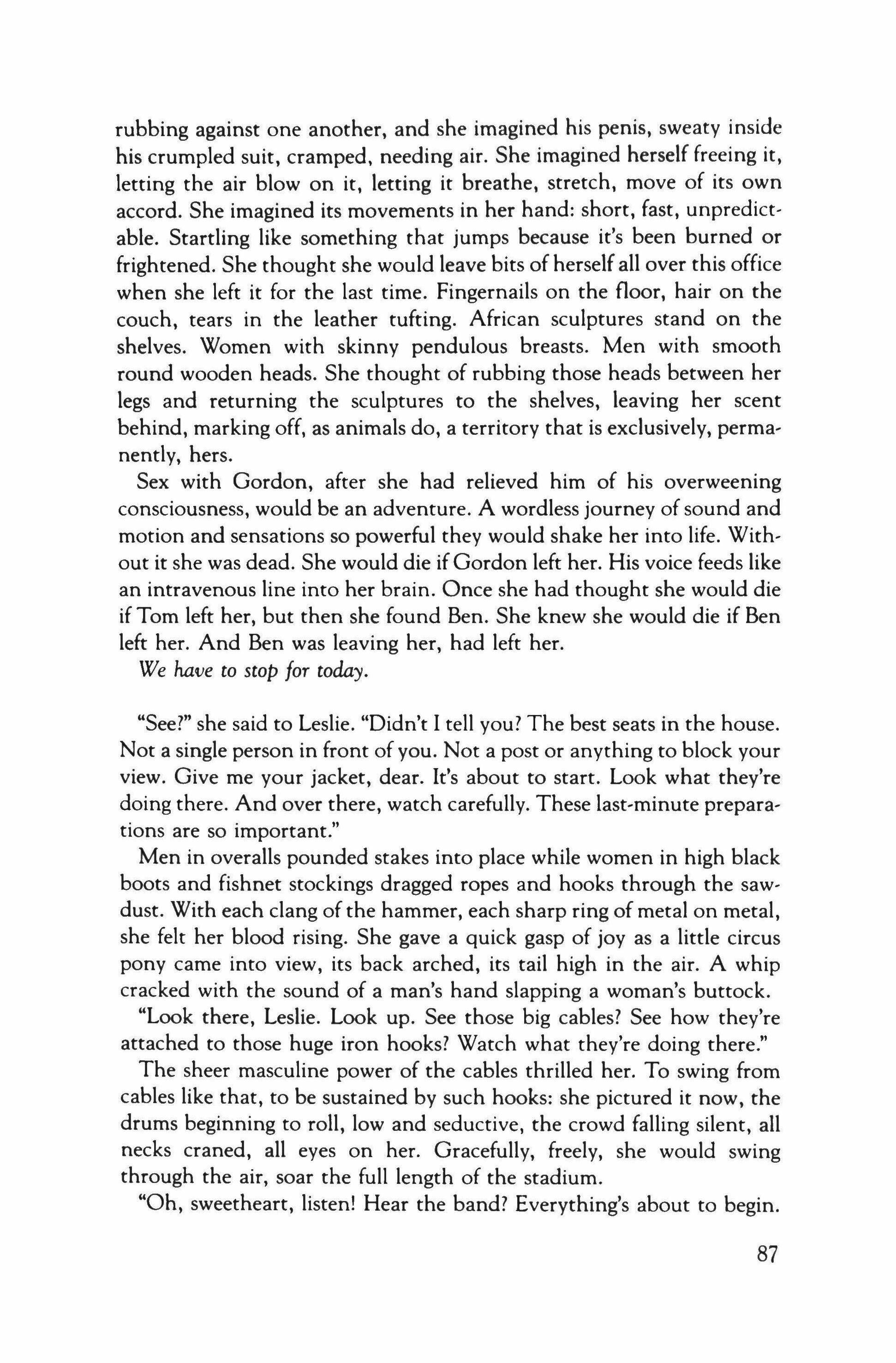
rubbing against one another, and she imagined his penis, sweaty inside his crumpled suit, cramped. needing air. She imagined herself freeing it, letting the air blow on it, letting it breathe, stretch, move of its own accord. She imagined its movements in her hand: short, fast, unpredictable. Startling like something that jumps because it's been burned or frightened. She thought she would leave bits of herselfall over this office when she left it for the last time. Fingernails on the floor, hair on the couch, tears in the leather tufting. African sculptures stand on the shelves. Women with skinny pendulous breasts. Men with smooth round wooden heads. She thought of rubbing those heads between her legs and returning the sculptures to the shelves, leaving her scent behind, marking off, as animals do, a territory that is exclusively, permanently, hers.
Sex with Gordon, after she had relieved him of his overweening consciousness, would be an adventure. A wordless journey of sound and motion and sensations so powerful they would shake her into life. Without it she was dead. She would die ifGordon left her. His voice feeds like an intravenous line into her brain. Once she had thought she would die if Tom left her, but then she found Ben. She knew she would die if Ben left her. And Ben was leaving her, had left her.
We have to stop for today.
"See?" she said to Leslie. "Didn't I tell you? The best seats in the house. Not a single person in front of you. Not a post or anything to block your view. Give me your jacket, dear. It's about to start. Look what they're doing there. And over there, watch carefully. These last-minute preparations are so important."
Men in overalls pounded stakes into place while women in high black boots and fishnet stockings dragged ropes and hooks through the sawdust. With each clang of the hammer, each sharp ring of metal on metal, she felt her blood rising. She gave a quick gasp of joy as a little circus pony came into view, its back arched, its tail high in the air. A whip cracked with the sound of a man's hand slapping a woman's buttock.
"Look there, Leslie. Look up. See those big cables? See how they're attached to those huge iron hooks? Watch what they're doing there."
The sheer masculine power of the cables thrilled her. To swing from cables like that, to be sustained by such hooks: she pictured it now, the drums beginning to roll, low and seductive, the crowd falling silent, all necks craned, all eyes on her. Gracefully, freely, she would swing through the air, soar the full length of the stadium.
"Oh, sweetheart, listen! Hear the band? Everything's about to begin.
87

Now where's that man with those little red circus lights? It's no fun without those. Oh, there he is. Here! Over here! We'll take two of those, please. Here you are, Leslie, put this around your neck. That's right. Now wind the plastic string around your finger and give it a swing. No, dear, this finger. Like this, watch Mommy. See? Round and round in little circles. Pretty soon all the lights will go out and all those people over there, and there, and straight across from you, and up there and everywhere you look, hundreds of people, tens of hundreds, will turn on their little red lights and swing them in circles. All of them, Leslie, every single person in Madison Square Garden, and all at the same time. They'll swing their lights in circles and the glow through the red plastic will be so warm and soft you'll feel safer than you've ever felt in your life. It will be like a whole city of strangers waving tiny lanterns in the dark."
Reaching down, she cupped Leslie's chin in her hand and tilted her face upwards. She was so beautiful it hurt to look at her. She would keep her safe, she swore she would. She would never let anything or anyone in the world harm this child. Never. Never again.
Suddenly, perversely, Leslie let the circus light drop off her finger and fall down around her neck. Then she wound her arm tightly, demandingly through her own. That thin, greedy, clinging little arm. Why did she have to do that? Always threading it through hers, tugging and yanking and pulling, not to mention the whining-Mommy, mommy, mommy - all day long.
"Don't cling like that!" she cried, and snatched her arm away. What was the matter with the child, clutching at her here in this wonderful place? Why was she so set on ruining her fun? It wasn't fair. She was entitled to a little fun of her own. Only a mean-spirited child would deny her that. A child born with something petty and malicious in her soul. Something that was coming out now in all its five-year-old spite, making her look around this magnificent stadium and hate everything she saw. Flashes of rage went off within her as Ellen looked down at the girl. Explosions like flashbulb reports illuminating that dangerous other woman within she tried so hard to keep out of sight.
But it wasn't true. None of it was true. There was no other woman inside her. And Leslie hadn't been born with something malicious in her soul. There was nothing hereditary, nothing in her genes or blood to be afraid of. Leslie had been a normal baby. A happy baby. An exceptionally happy baby. Ellen recalled her joyous, piercing shrieks and the way she had held up her little hands as she approached, her tiny fingers eagerly opening and closing, clutching at the air, clutching at her, as if greedy for the love she was bringing her way. It was only after the
88
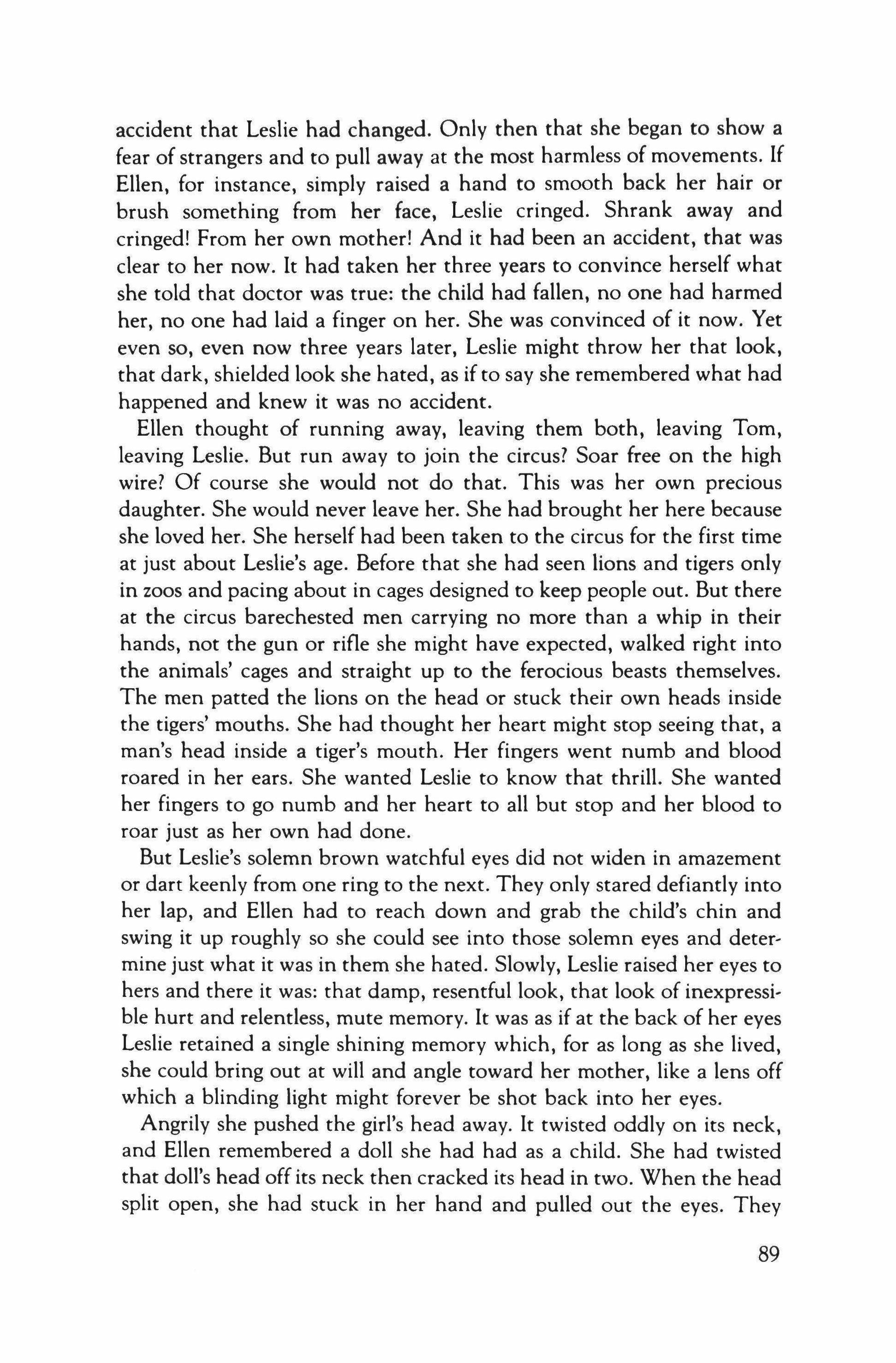
accident that Leslie had changed. Only then that she began to show a fear of strangers and to pull away at the most harmless of movements. If Ellen, for instance, simply raised a hand to smooth back her hair or brush something from her face, Leslie cringed. Shrank away and cringed! From her own mother! And it had been an accident, that was clear to her now. It had taken her three years to convince herself what she told that doctor was true: the child had fallen, no one had harmed her, no one had laid a finger on her. She was convinced of it now. Yet even so, even now three years later, Leslie might throw her that look, that dark, shielded look she hated, as if to say she remembered what had happened and knew it was no accident.
Ellen thought of running away, leaving them both, leaving Tom, leaving Leslie. But run away to join the circus? Soar free on the high wire? Of course she would not do that. This was her own precious daughter. She would never leave her. She had brought her here because she loved her. She herself had been taken to the circus for the first time at just about Leslie's age. Before that she had seen lions and tigers only in zoos and pacing about in cages designed to keep people out. But there at the circus barechested men carrying no more than a whip in their hands, not the gun or rifle she might have expected, walked right into the animals' cages and straight up to the ferocious beasts themselves. The men patted the lions on the head or stuck their own heads inside the tigers' mouths. She had thought her heart might stop seeing that, a man's head inside a tiger's mouth. Her fingers went numb and blood roared in her ears. She wanted Leslie to know that thrill. She wanted her fingers to go numb and her heart to all but stop and her blood to roar just as her own had done.
But Leslie's solemn brown watchful eyes did not widen in amazement or dart keenly from one ring to the next. They only stared defiantly into her lap, and Ellen had to reach down and grab the child's chin and swing it up roughly so she could see into those solemn eyes and determine just what it was in them she hated. Slowly, Leslie raised her eyes to hers and there it was: that damp, resentful look, that look of inexpressible hurt and relentless, mute memory. It was as if at the back of her eyes Leslie retained a single shining memory which, for as long as she lived, she could bring out at will and angle toward her mother, like a lens off which a blinding light might forever be shot back into her eyes.
Angrily she pushed the girl's head away. It twisted oddly on its neck, and Ellen remembered a doll she had had as a child. She had twisted that doll's head off its neck then cracked its head in two. When the head split open, she had stuck in her hand and pulled out the eyes. They
89

came out attached to a kind of two-pronged metal fork. She could make them open and close by raising and lowering the fork. The eyeballs were white as milk and even at the back they were rounded and smooth and appeared slightly moist, like real eyes. The large pupils, staring up at her from the ends of that metal fork, were a piercing sky-blue. They looked as if they hated her for what she had done. When she lowered the fork the eyes closed but when she raised it again, they snapped open and threw her that same long, reproachful look. The piercing blue hatred in those eyes told her they would wait there, attached to that piece of metal, for as long as it took, forever, if necessary, to get even. Leslie's eyes had the same look. As if at the backs of them burned the memory of a single reckless, regrettable act for which she would wait the rest of her life to get even.
Ellen clenched her hands into fists and thought there was nothing she wouldn't do to be rid of that look. She would smash her daughter's head, gouge out her eyes, pluck them right out of their sockets, to be rid of it. But of course she didn't mean that. She unclenched her fists, uncrossed her legs, smoothed down her skirt. She would never do anything like that. Her nerves were raw, that was all. She had argued with Tom and slept badly, that was all there was to it. The feeling would pass and Leslie would see how nice she could be, how gentle and kind. For of course she loved her. There were moments she thought she would die from loving her, moments her love for her was stifling, unbearable. Even now as she looked down at the child she had trouble catching her breath. My God, she thought, how beautiful she is. She pressed her hand to her chest to ease her breathing. How tender and young. Her heart flooded with love and she became as helpless as a drowning person before the love she felt for her daughter. She would never take her eyes off her. She would watch her day and night, watch what she ate, watch her in the playground, screen her friends, watch her on her way to and from school and stand guard over her bed to protect her sleep at night. She would take her to the finest department stores and buy her the most beautiful clothes. She would take her to movies and to the theater and make her eyes light up with joy. And here today at the circus, she would make her see. She would take her child's head between her hands if she had to and physically turn it in whatever direction was necessary to make her wounded eyes light up and the hurt in them vanish and the secret, dangerous inner life of the circus take hold of her and Leslie began to love what she herself loved.
90
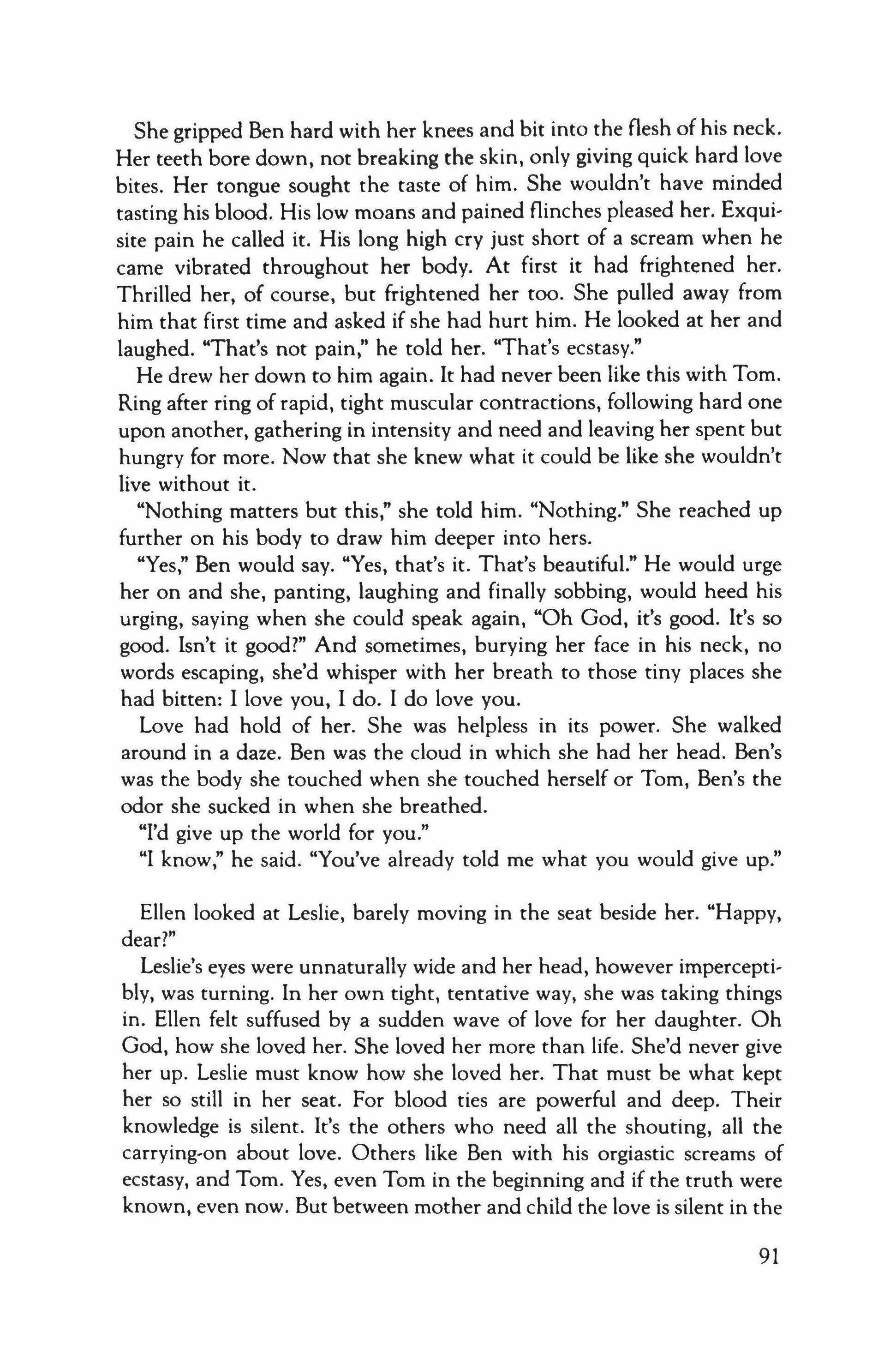
She gripped Ben hard with her knees and bit into the flesh of his neck. Her teeth bore down, not breaking the skin, only giving quick hard love bites. Her tongue sought the taste of him. She wouldn't have minded tasting his blood. His low moans and pained flinches pleased her. Exquisite pain he called it. His long high cry just short of a scream when he came vibrated throughout her body. At first it had frightened her. Thrilled her, of course, but frightened her too. She pulled away from him that first time and asked if she had hurt him. He looked at her and laughed. "That's not pain," he told her. "That's ecstasy."
He drew her down to him again. It had never been like this with Tom. Ring after ring of rapid, tight muscular contractions, following hard one upon another, gathering in intensity and need and leaving her spent but hungry for more. Now that she knew what it could be like she wouldn't live without it.
"Nothing matters but this," she told him. "Nothing." She reached up further on his body to draw him deeper into hers.
"Yes," Ben would say. "Yes, that's it. That's beautiful." He would urge her on and she, panting, laughing and finally sobbing, would heed his urging, saying when she could speak again, "Oh God, it's good. It's so good. Isn't it good?" And sometimes, burying her face in his neck, no words escaping, she'd whisper with her breath to those tiny places she had bitten: I love you, I do. I do love you.
Love had hold of her. She was helpless in its power. She walked around in a daze. Ben was the cloud in which she had her head. Ben's was the body she touched when she touched herself or Tom, Ben's the odor she sucked in when she breathed.
"I'd give up the world for you."
"I know," he said. "You've already told me what you would give up."
Ellen looked at Leslie, barely moving in the seat beside her. "Happy, dear?"
Leslie's eyes were unnaturally wide and her head, however imperceptibly, was turning. In her own tight, tentative way, she was taking things in. Ellen felt suffused by a sudden wave of love for her daughter. Oh God, how she loved her. She loved her more than life. She'd never give her up. Leslie must know how she loved her. That must be what kept her so still in her seat. For blood ties are powerful and deep. Their knowledge is silent. It's the others who need all the shouting, all the carrying-on about love. Others like Ben with his orgiastic screams of ecstasy, and Tom. Yes, even Tom in the beginning and if the truth were known, even now. But between mother and child the love is silent in the
91
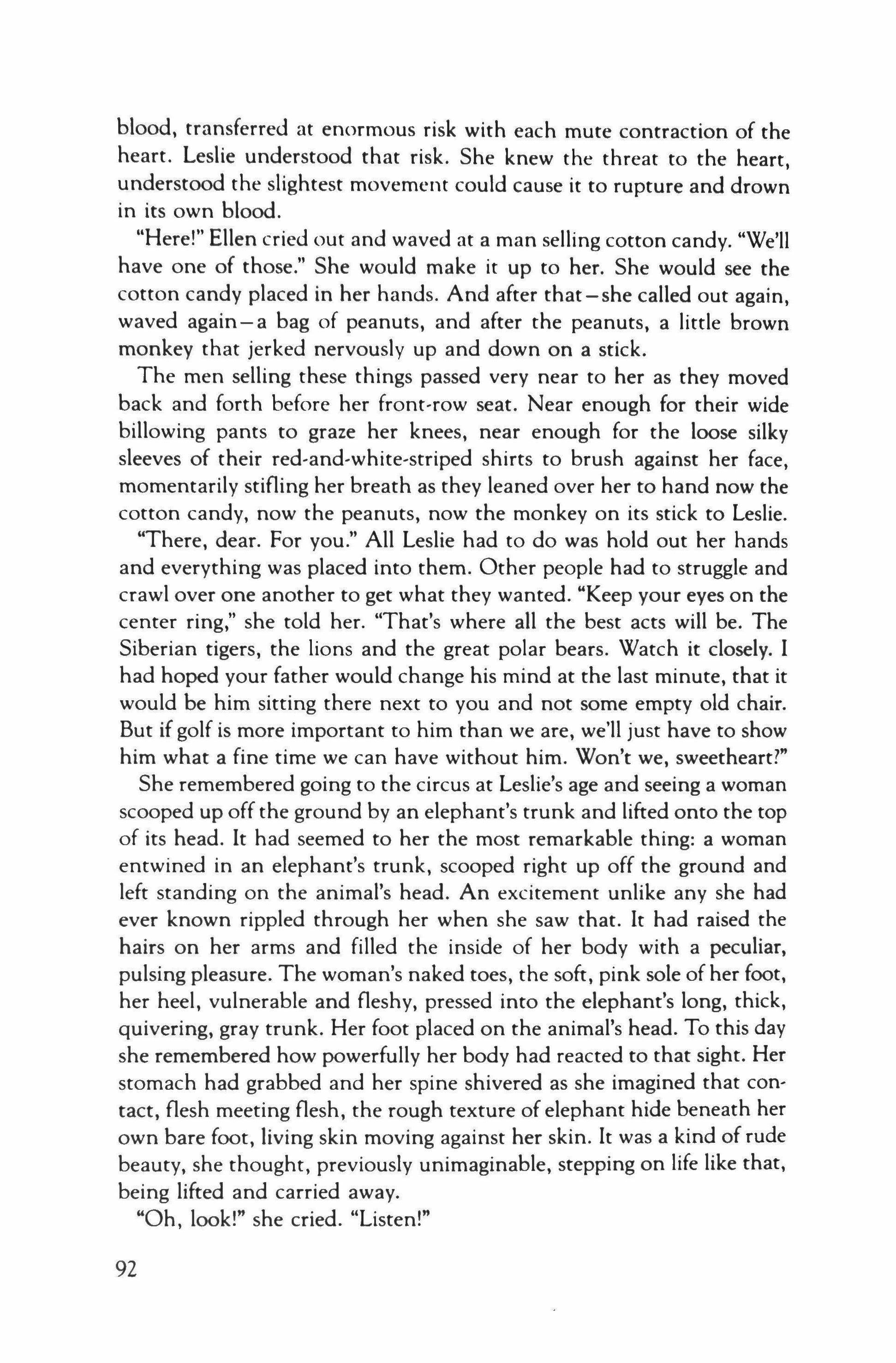
blood, transferred at enormous risk with each mute contraction of the heart. Leslie understood that risk. She knew the threat to the heart, understood the slightest movement could cause it to rupture and drown in its own blood.
"Here!" Ellen cried out and waved at a man selling cotton candy. "We'll have one of those." She would make it up to her. She would see the cotton candy placed in her hands. And after that-she called out again, waved again - a bag of peanuts, and after the peanuts, a little brown monkey that jerked nervously up and down on a stick.
The men selling these things passed very near to her as they moved back and forth before her front-row seat. Near enough for their wide billowing pants to graze her knees, near enough for the loose silky sleeves of their red-and-white-striped shirts to brush against her face, momentarily stifling her breath as they leaned over her to hand now the cotton candy, now the peanuts, now the monkey on its stick to Leslie.
"There, dear. For you." All Leslie had to do was hold out her hands and everything was placed into them. Other people had to struggle and crawl over one another to get what they wanted. "Keep your eyes on the center ring," she told her. "That's where all the best acts will be. The Siberian tigers, the lions and the great polar bears. Watch it closely. I had hoped your father would change his mind at the last minute, that it would be him sitting there next to you and not some empty old chair. But if golf is more important to him than we are, we'll just have to show him what a fine time we can have without him. Won't we, sweetheart?"
She remembered going to the circus at Leslie's age and seeing a woman scooped up off the ground by an elephant's trunk and lifted onto the top of its head. It had seemed to her the most remarkable thing: a woman entwined in an elephant's trunk, scooped right up off the ground and left standing on the animal's head. An excitement unlike any she had ever known rippled through her when she saw that. It had raised the hairs on her arms and filled the inside of her body with a peculiar, pulsing pleasure. The woman's naked toes, the soft, pink sole of her foot, her heel, vulnerable and fleshy, pressed into the elephant's long, thick, quivering, gray trunk. Her foot placed on the animal's head. To this day she remembered how powerfully her body had reacted to that sight. Her stomach had grabbed and her spine shivered as she imagined that contact, flesh meeting flesh, the rough texture of elephant hide beneath her own bare foot, living skin moving against her skin. It was a kind of rude beauty, she thought, previously unimaginable, stepping on life like that, being lifted and carried away.
"Oh, look!" she cried. "Listen!"
92

A long low drumroll elicited a thunderous roar from the crowd and Ellen edged forward in her seat. Clasping one hand to her throat, she reached out with the other for Leslie. Three great beams of light had rushed as one down from the ceiling. Upon hitting the ground, they made enormous agitated sweeps through the sawdust. Round and round they went in wide, blind circles, testing the ground, searching it out. Then as if by accident the edge of one beam met another, overlapped and merged with it. The third made contact with the first two and the three beams became one, converging and swelling in size, growing brighter and fuller until the circle of light looked like a moon ripened nearly to bursting. It made huge, lazy figure eights across the sawdust then stretched and grew still, narrowed to a single path of bright light. Out upon this path drove a caravan of cars. Ten or twelve in all, passenger cars, trucks and wagons, each brightly, whimsically painted. Slowly the caravan circled the stadium while from the windows of the cars and the backs of the wagons and the flatbeds of the trucks scores of gaily costumed clowns cheered and waved to the crowd.
"Watch now," Ellen said breathlessly as the smallest of the cars, a bright, shiny red and so tiny it seemed almost a toy, pulled out of line and stopped. She squeezed the hand in which she held Leslie's. "Watch." The drums gave another magnificent roll and a spotlight swooped down upon the small red car.
"You're going to love this." But Leslie had withdrawn her hand and Ellen's nails were digging into the soft flesh of her own palm.
In the early years of their marriage Tom had delighted almost as much as she in sex. But after the accident Tom changed. He approached her only rarely in bed and when he did he came at her quickly, roughly, as if to satisfy some urgent but transient need. For comfort, for warmth, for the release of tension and even, she suspected, for revenge. There was a kind of hostility and disdain in the way he handled her. As if he were saying if she could allow a thing like that to happen, she deserved any rough treatment she might get from him. That's what led her to believe he had paid to have her killed. Do you really believe he would do that? Yes, she believed it. She believed Tom was capable of murder. Wasn't any, one? Wasn't she?
Strangely enough, the idea that Tom might actually hire an assassin to kill her disturbed her less than the distance he'd put between them since the night she took Leslie to the hospital. From that evening on, she never again had his full attention. Though he might be looking right at her, speaking directly to her, his mind was elsewhere. She took up some
93

peripheral spot on his field of vision. Even when he held her in his arms, his body remained at a distance. He seemed to be maintaining a space, a protective layer of air between himself and her. Shielding himself from whatever it was he thought she harbored within her body and feared to catch. Who was he to fear her? To shield himself from her? She would rather he kill her than treat her like a vessel of danger and potential contamination.
But of course she wouldn't tell Gordon about that. She had to protect him, to tell him only about the good times, the happy times before the accident when Tom had taken his time in bed and fun had been allowed. They had raced nude through the house, laughing and shouting like children. They had showered together and she had delighted in the feel of his warm, soapy eager hands running loose on her body. Yet when it came to his own body, Tom turned unexpectedly a little shy. She'd had to plead with him to let her wash it. "Oh, let me, please," she said. "You're so beautiful. You have no idea how beautiful you are."
She told Gordon about the time she had walked into their bathroom while Tom was taking a shower. Very quietly, she'd pulled the curtain aside. The water rushing in Tom's ears had obscured the sound of the plastic rings sliding along the metal rod so he didn't hear the curtain move. She stood against the sink, resting one hand behind her on the cool porcelain, and studied him. She was perfectly happy watching him move through the water, his long slender limbs now emerging, now vanishing ghostlike in the steam. He had just washed his hair and was rinsing out the shampoo. His chest rose and fell as he worked the water through his hair. His eyes were tightly closed. His head was thrown back, throat exposed, arms raised. From his hips and groin his flesh pulled up taut over the window of his diaphragm where the skin was smooth and nearly translucent. The tufts of black hair that normally coiled tight as springs in the pits of his arms were flattened out, hammered smooth by the pressure of the streaming water. The strands of his pubic hair, so coarse and wiry when dry, were stretched long and silken. They seemed to form a nest of smooth, dark wet hairs and from its center hung that long arc of spongy tissue, gentle and marsupial-like, like some creature falling from the nest, head downwards, a thin stream of water washing through the cleft of its shining bald cap.
Silently, Ellen gathered up all the towels in the room, the bath towels and hand towels and even the blue bath mat she had bought just that week. She stepped outside the door and threw them as far as she could down the hall. Tom turned off the shower, pulled the curtain aside and with his eyes half closed, stepped out onto the cold tiles. Blindly, he
94

groped for a towel. Finding none, he groped for another. He swore and opened his eyes and only then did he see her standing there by the sink.
"Where are the towels, Ellen?" he demanded. And when she didn't answer, he bellowed: "The towels! I need a towel!"
She was gazing at his body and couldn't speak. Not even his anger could force her to speak. Tom grew a little desperate. He shouted and threw wide-eyed glances into every corner of the room, up at the curtain rod and behind the sink, the toilet, wherever he thought a towel might conceivably be hiding.
When the phone rang out in the other room and Ellen made no move to answer it, Tom flew into a frenzy. His body was so beautiful it held her as in a trance. "Get the phone!" he yelled. His buttocks were as smooth and white as alabaster. He didn't have an ounce of fat on him anywhere. "I'm expecting a call." He worked out three or four times a week and had the same graceful, athletic lines he'd had when she'd met him eleven years earlier. "Answer it!" he shouted. "It's business!" She could not move. The muscles in his damp thighs quivered and then he ran, shoving past her out into the hall. She stood aside and watched his long calves shooting out, his narrow sure feet coming down on the black and white tiles as he raced for the phone. She watched the gentle curve of his penis lifting and falling, rising up on the air with each of his strides, falling back against his left thigh then rising up on the air again. She watched the hard bounce of his testicles as he leapt over the pile of towels at the far end of the hall. She watched how they swung loose and free as he ran, and she was for the moment perfectly, sublimely happy.
The tiny red car's passenger door opened and a clown in a yellow polka-dotted jumpsuit stepped out. Cadaverously thin and walking on stilts, he removed his hat which bore a brilliant yellow feather and bowed to the audience. He turned in a slow, deliberate full circle, trailing his yellow feather through the sawdust. He was politely received. Then two other clowns stepped out of the car and stood beside the first. Then a fourth, a fifth, a sixth clown emerged, and the crowd began to titter. Then one after another dozens of clowns, in different sizes and shapes, all wearing bright stripes and polka dots and with exaggerated expressions of pain or joy painted on their faces, began tumbling out of that car that was clearly too small to contain them all, and the crowd began to howl.
"Can you believe that, Leslie? Can you? Look, there's another one coming out, and another. How do they do it?"
It simply wasn't possible, yet on and on they went, tall clowns, short
95
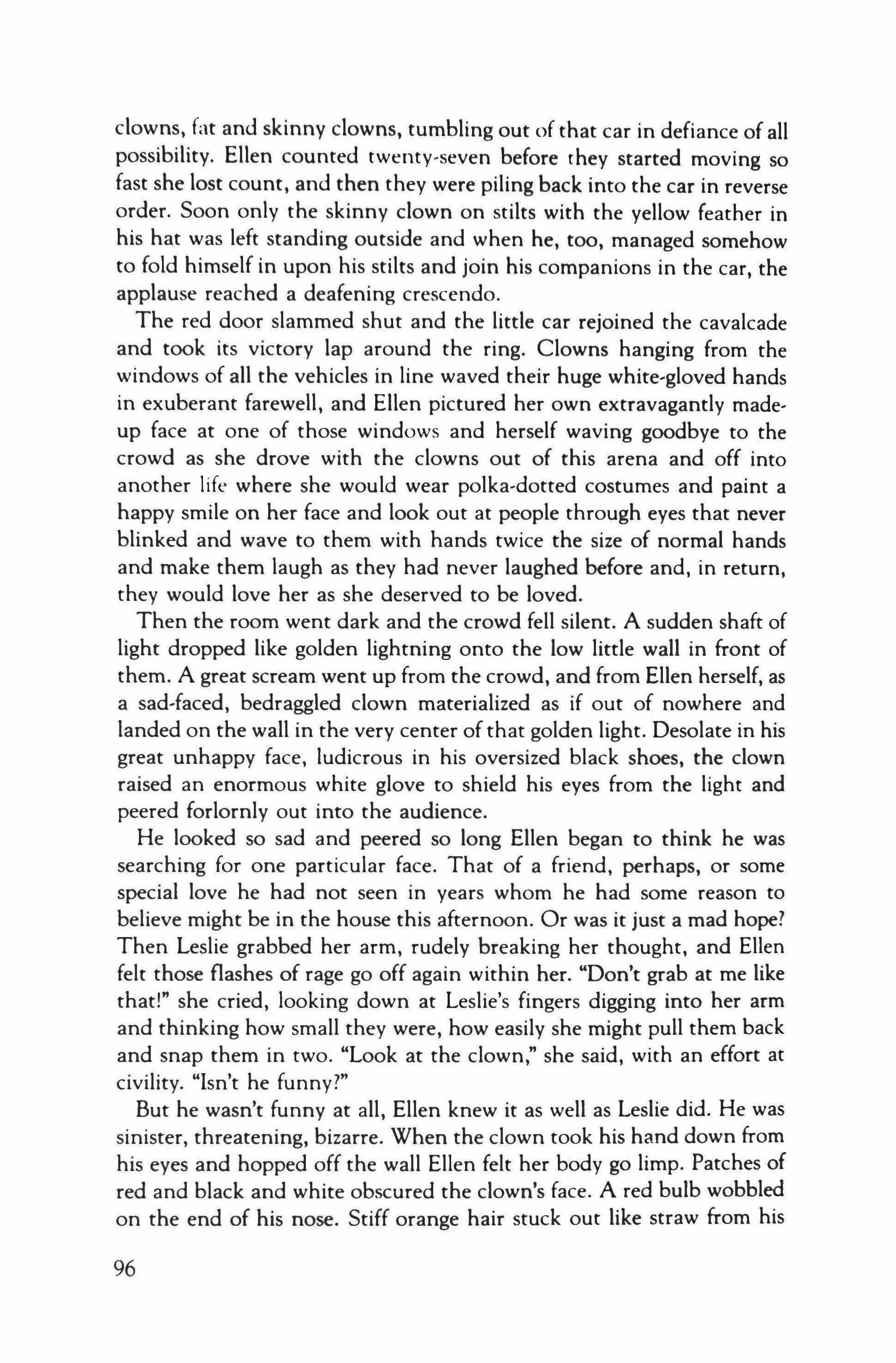
clowns, fat and skinny clowns, tumbling out of that car in defiance of all possibility. Ellen counted twenty-seven before they started moving so fast she lost count, and then they were piling back into the car in reverse order. Soon only the skinny clown on stilts with the yellow feather in his hat was left standing outside and when he, too, managed somehow to fold himself in upon his stilts and join his companions in the car, the applause reached a deafening crescendo.
The red door slammed shut and the little car rejoined the cavalcade and took its victory lap around the ring. Clowns hanging from the windows of all the vehicles in line waved their huge white-gloved hands in exuberant farewell, and Ellen pictured her own extravagantly madeup face at one of those windows and herself waving goodbye to the crowd as she drove with the clowns out of this arena and off into another life where she would wear polka-dotted costumes and paint a happy smile on her face and look out at people through eyes that never blinked and wave to them with hands twice the size of normal hands and make them laugh as they had never laughed before and, in return, they would love her as she deserved to be loved.
Then the room went dark and the crowd fell silent. A sudden shaft of light dropped like golden lightning onto the low little wall in front of them. A great scream went up from the crowd, and from Ellen herself, as a sad-faced, bedraggled clown materialized as if out of nowhere and landed on the wall in the very center of that golden light. Desolate in his great unhappy face, ludicrous in his oversized black shoes, the clown raised an enormous white glove to shield his eyes from the light and peered forlornly out into the audience.
He looked so sad and peered so long Ellen began to think he was searching for one particular face. That of a friend, perhaps, or some special love he had not seen in years whom he had some reason to believe might be in the house this afternoon. Or was it just a mad hope? Then Leslie grabbed her arm, rudely breaking her thought, and Ellen felt those flashes of rage go off again within her. "Don't grab at me like that!" she cried, looking down at Leslie's fingers digging into her arm and thinking how small they were, how easily she might pull them back and snap them in two. "Look at the clown," she said, with an effort at civility. "Isn't he funny?"
But he wasn't funny at all, Ellen knew it as well as Leslie did. He was sinister, threatening, bizarre. When the clown took his hand down from his eyes and hopped off the wall Ellen felt her body go limp. Patches of red and black and white obscured the clown's face. A red bulb wobbled on the end of his nose. Stiff orange hair stuck out like straw from his
96

head. Pasty white, hugely overdrawn lips turned down in a gash to form his mouth. But it was his eyes that haunted her. The thick lines of white paint encircling them. Flat white, dead white. Eyes that seemed to be looking out at her from another time and place, and suddenly she recalled the horrible little man in the black hat, the near collision in the rain, the light reflected off his thick bifocals. She had not been able to see his eyes. All she had seen were the shining rings of light bouncing off his glasses, and she remembered the term, "raccoon eyes," and a doctor from yet another time and place saying rings like that around the eyes indicated a sharp blow had been forcefully delivered to the back of the head.
The clown ran straight into the audience. Still peering, searching, for whom, that long-lost special friend? He ran up an aisle only two away from theirs and Leslie lurched in her seat. Her grip tightened on Ellen's arm. Crouching low, the clown knelt by one aisle seat and then by another, each time pushing his big unhappy face into the faces of the people sitting there, extending his enormous white-gloved hand to shake their hands, or boldly bringing it down on top of their heads, mussing their hair-strangers who might prefer to be let alone, not bothered or touched, touching them anyway, shaking their hands and messing up their hair. Ellen watched how he moved, always looking, peering, searching, and how the spotlight followed him, lighting up the faces of all those he came near.
With a sudden leap the clown abandoned the aisle and plunged straight into the crowd itself, squeezing right into a row, running along it, making everyone in his path sit back in their chairs and pull in their feet to let him by. He came to a halt before a boy wearing a sailor suit. A chubby little boy, Ellen observed. He looked ridiculous in that outfit. What could his parents be thinking of, to turn their child into such a fat, pretentious, helpless spectacle? Then without the slightest warning, the clown plopped himself down on the boy's lap.
"Oh, look! Look at that!" cried Ellen. To be singled out. To be chosen.
Shrieking and blubbering with joy, the boy bounced up and down beneath the clown who sat on his lap, making a great display of bouncing up and down as the boy bounced. All around them the audience clapped and cheered and then, as abruptly as he had descended onto it, the clown rose from the boy's lap and moved out into the aisle again. He ran down the stairs and hopped back onto the wall and stood for a moment drenched in the terrible glare of the spotlight, shading his eyes and resuming his intense, prolonged search of the crowd. Immobile but for his slowly turning head, he searched. Stealthily then, like a hunter
97
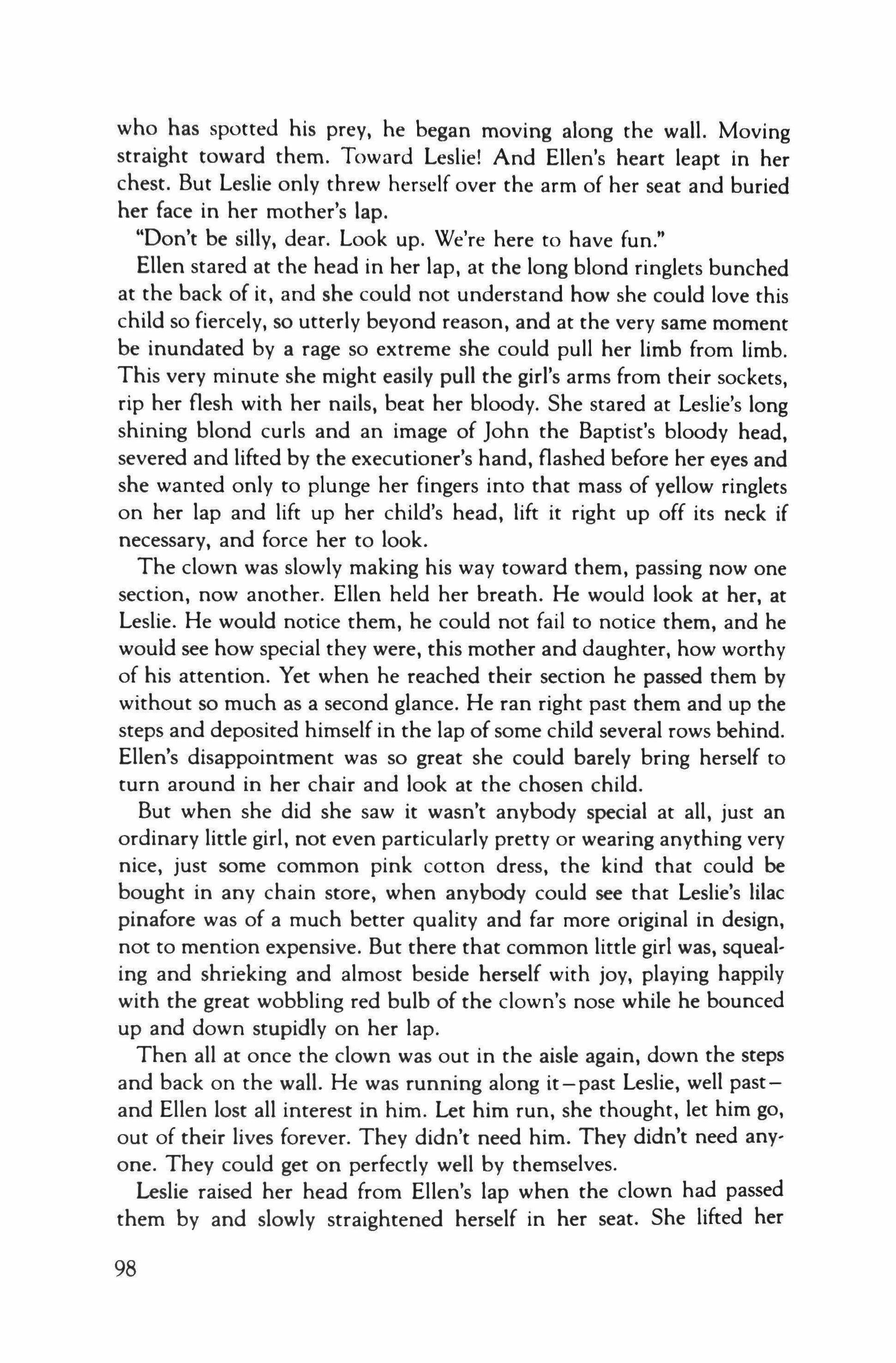
who has spotted his prey, he began moving along the wall. Moving straight toward them. Toward Leslie! And Ellen's heart leapt in her chest. But Leslie only threw herself over the arm of her seat and buried her face in her mother's lap.
"Don't be silly, dear. Look up. We're here to have fun."
Ellen stared at the head in her lap, at the long blond ringlets bunched at the back of it, and she could not understand how she could love this child so fiercely, so utterly beyond reason, and at the very same moment be inundated by a rage so extreme she could pull her limb from limb. This very minute she might easily pull the girl's arms from their sockets, rip her flesh with her nails, beat her bloody. She stared at Leslie's long shining blond curls and an image of John the Baptist's bloody head, severed and lifted by the executioner's hand, flashed before her eyes and she wanted only to plunge her fingers into that mass of yellow ringlets on her lap and lift up her child's head, lift it right up off its neck if necessary, and force her to look.
The clown was slowly making his way toward them, passing now one section, now another. Ellen held her breath. He would look at her, at Leslie. He would notice them, he could not fail to notice them, and he would see how special they were, this mother and daughter, how worthy of his attention. Yet when he reached their section he passed them by without so much as a second glance. He ran right past them and up the steps and deposited himself in the lap of some child several rows behind. Ellen's disappointment was so great she could barely bring herself to turn around in her chair and look at the chosen child.
But when she did she saw it wasn't anybody special at all, just an ordinary little girl, not even particularly pretty or wearing anything very nice, just some common pink cotton dress, the kind that could be bought in any chain store, when anybody could see that Leslie's lilac pinafore was of a much better quality and far more original in design, not to mention expensive. But there that common little girl was, squealing and shrieking and almost beside herself with joy, playing happily with the great wobbling red bulb of the clown's nose while he bounced up and down stupidly on her lap.
Then all at once the clown was out in the aisle again, down the steps and back on the wall. He was running along it - past Leslie, well pastand Ellen lost all interest in him. Let him run, she thought, let him go, out of their lives forever. They didn't need him. They didn't need anyone. They could get on perfectly well by themselves.
Leslie raised her head from Ellen's lap when the clown had passed them by and slowly straightened herself in her seat. She lifted her
98

shoulders and shook out her hair and just as she did, the clown turned. Leslie had caught his eye, Ellen saw that she had. Through the rings of dead white paint circling his eyes, she saw him looking at her daughter. He moved so quickly then the spotlight lost him for a moment, found him again and followed him back along the wall. He was coming back! Ellen moved to the very edge of her seat. Yes, it was true. The clown was coming back. "He's coming this way!" she cried out. "Oh, darling, you've been given a second chance!"
That was all she had asked from Ben, Gordon would understand how important it was. To be given another chance. She didn't think it too much to ask after all they'd been to each other.
"Please Ben," she pleaded. Naked, she fell to her knees. He stood fully clothed before her. She humiliated herself for him. "Please, Ben. Give me another chance. Tell me what I did. Tell me what it was and I'll make it up to you. I'll do anything you want, I promise I will. Only please don't leave me. Please don't!" It could not be over. It was not possible that it was over. Passion had transformed her life. She would die if it was taken from her.
"It's not you, Ellen," he said. "My firm's relocating, I told you that might happen. I warned you."
His words meant nothing to her. Warned! What could that possibly mean to her? He was leaving her. He was moving out of his apartment, out of the city, moving across the country, leaving her behind. What did she care that she had been warned?
"You said you loved me!" She stood up and grabbed him by the shoulders to make him remember having said that. "You love me, you said so!" Those were the words that meant something to her. Words of love, ofpassion, not warnings, not business excuses. "You said you loved my body, my breasts. You said you loved the way my legs opened to you, the way they took you in. You said it hundreds of times, you did, you did!" She degraded herself before him and he was not moved. "You said you loved my odors, my juices." She shook his shoulders to make him remember his words. "You said you loved me even when I had my period, that you didn't mind the smelly thick pad between my legs." She grabbed his shirt, the lapels of his jacket, to remind him of what he had said. "You said you loved the sounds I made. You said my cry was like the yelp of a pup surprised in its sleep. You said that, a pup, you did! You said you loved me!" Those words belonged to her now. They were hers by right. He could not take them from her.
"I'm sorry, Ellen."
99

"Sorry!"
She reduced herself to nothing before him, and he was sorry! But she had hold of him now, of his clothes, his neck. She would not let him go. She would shake him until he remembered, until he gave her back those words of love. "Say it! Say you love mel"
But Ben didn't speak. He did not say the words she wanted to hear. His body was rigid in her hands. It was her own body that went back and forth, her own arms that shook helplessly as she held onto his shoulders, his neck, her own head that whipped forward and back. What are you feeling? Rhythms of rage transfused her. Blind rage, unfathomable rage. She bit through the hairs of his beard as her head snapped forward. She shoved her breasts into his chest, slapped her pelvis against his groin. Over and over, she threw herself against him, shoving up into him, slapping and biting, shaking his shoulders and raking her nails over his neck to make him repeat what he had said.
The clown was running toward them now along the edge of the wall. Twice, to the great amusement of the crowd, he tottered and pretended to fall. He came opposite them and stopped. Ellen gasped and then, just as if the clown had discerned her heart's most secret wish, he jumped off the wall. He raised one big floppy black shoe and took a single giant step in her direction. Now he stood so close she could smell the mixture of rancid odors on his body. Greasepaint and sweat, stale breath and unclean clothes. She stared into the terrible white rings around his eyes, and the clown withstood her stare. For a moment he seemed to dare her to keep on staring, to stare at him forever, if she liked. Then he raised his hands into the air and quickly threw back his head. Upon the sudden movement his orange hair appeared to crackle in the blinding light, and Leslie pressed herself flat in her chair, opened her mouth and screamed.
"Oh, hush," said Ellen. "Oh, please. Not now."
In a move so swift it banished time, the clown hopped onto her daughter's lap.
Leslie reared back in her seat and tried to throw him off. She kicked and squirmed and twisted, all the while screaming at the top of her lungs. As if the clown were some loathsome bug whose touch she could not bear, she heaved and bucked, trying desperately to pull herself out from under him. But the clown held firm. He seemed determined to ride out the child's tortured movements. The whole time Leslie screamed and writhed in her seat the spotlight remained on her face, illuminating the black hollow of her scream, while all around her, like jackals happily
100

feeding off the spectacle of her torment, the crowd howled with laughter. Leslie kicked and fought and the more she fought, the deeper the clown pretended to dig himself into her lap and the deeper he pretended to dig, the louder the crowd laughed.
"Stop that, Leslie," said Ellen. "Quiet. Please. You can't be afraid of a clown."
Leslie's face went scarlet. Spittle ran from the corner of her mouth. Damp, random strands of yellow hair lay plastered against her forehead. My God, she's ugly, Ellen thought. She's grotesque. It hurt her eyes to look at her. "For heaven's sake, Leslie," she implored. "He's only playing with you!" She cringed as the crowd, thrilled now to have the mother's torment as well as the child's to enjoy, redoubled its laughter.
Leslie clenched her hands into fists and pounded on the clown's chest. As she pounded she released long, piercing screams and between the screams made hideous, desperate gasps for air. "Oh, really, Leslie, no!" cried Ellen as the laughter of the crowd reached a new pitch. "The other little children didn't act like thad"
But Leslie continued screaming and heaving herself back and forth in her seat, kicking and pounding at the clown, and Ellen looked through the flat white rings encircling his mournful eyes and thought if only she could leave with him, if only she could stand up now and leave this howling, battling child where she sat and run off with the clown. Gallantly, he would offer her his hand. Like her own true prince, he would lead her out into the aisle and up the steps and away from this place where through no fault of her own she had become the object of a vengeful crowd's ridicule and contempt. She would follow him into his perfect, magical world where her true worth would at last be recognized; her beauty and grace would win the acclaim of multitudes and she would stand by herself in the heart of a crowd pouring out its vast and unqualified approval. For her. For her alone. Not for that ugly, redfaced, screaming and hysterically struggling creature now the unrightful center of its attention.
So swiftly then, so lightly the action lifted her heart, the clown reached out and grasped both of Leslie's swatting fists in one of his great white gloves. Holding her hands aside, he gently planted a kiss on the child's cheek. The tenderness of the gesture brought tears to Ellen's eyes but did nothing to abate Leslie's screams. Her howls rose in a line of ever-ascending terror and, seeing her chance for glory escape her, Ellen was finally forced to apologize. "I'm so sorry," she said to the clown. "I can't imagine what's got into her."
Against the background of the crowd's swelling laughter and Leslie's
101

escalating screams, a blurred and hallucinatory montage passed before Ellen's eyes: elephants filed into the ring; hairless dogs in party hats leaped through hoops of fire; men in ballooning striped pants performed cartwheels on the ground; women in fishnet stockings turned handstands in the sawdust while above it all, above the cables and nets and shining high wires being hauled into place, two masked figures stood on the elevated platforms, tossing a severed golden head back and forth.
Out of nowhere, a pale blue paper flower bloomed in the clown's hand. It sprang from his white glove like a geyser from the winter earth. Slowly as in a dream, Ellen saw the flower lovingly offered to her screaming daughter, saw it cruelly, unbelievably, swatted away, saw the pale blue paper fly out of the clown's hand, saw it fall to the ground, saw it lying there in the littered aisle to be crushed underfoot by the very next person who came along.
And so she was forced to grab Leslie's arm, to snatch her jacket off the chair, to let the cotton candy and the peanuts and the little brown monkey jerking up and down on its stick fall to the ground at her feet. She was forced to take her hysterical child by the arm and drag her up the aisle, to drag her, screaming, from the front row all the way to the last, past the eyes of a ruthless crowd that laughed without mercy as they approached and even after they had passed, went on laughing, viciously, mercilessly at their backs.
From the top of the steps Ellen threw a glance back down at the ring that had promised so much, at that low little wall atop which the clown was now standing, waving them a sorrowful farewell. She tried to meet his eyes but his, fixed and dead in a faked and frozen grief, hiding other eyes that she would never see, looked up at her from a face that hid another face that she would never know.
The laughter of the crowd reverberated in her head as she stood Leslie on the pavement outside in the sun and shook her. "What's the matter with you?" she cried. "What do you think you were doing? I've never been so humiliated in my life!"
Ellen looked past the body of the child swinging limply in her hands and suddenly the hard laughter of the crowd resounding in her head broke apart and scattered like bright colored stones in the sun and her head cleared and her vision was restored. Everything around her became clear. The air and the light were clear. The people on the sidewalks, the cars in the street, the trash baskets and blue mailboxes, the street lamps and traffic signs all became stunningly clear. Horns honking, dogs barking, people talking, a cab door opening and slamming shut: all the myriad sounds and sights around her fell into focus.
102
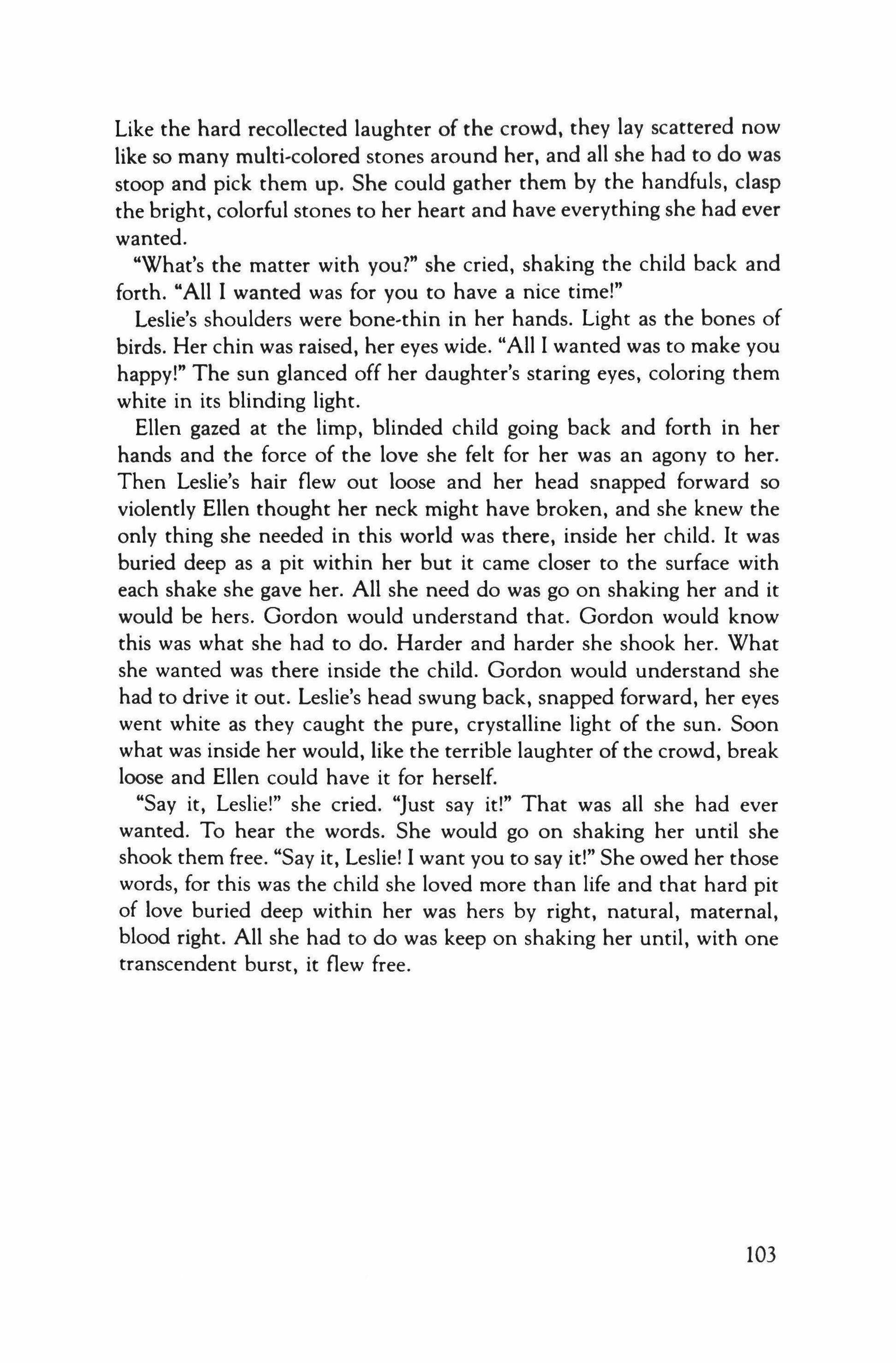
Like the hard recollected laughter of the crowd, they lay scattered now like so many multi-colored stones around her, and all she had to do was stoop and pick them up. She could gather them by the handfuls, clasp the bright, colorful stones to her heart and have everything she had ever wanted.
"What's the matter with you?" she cried, shaking the child back and forth. "All I wanted was for you to have a nice time!"
Leslie's shoulders were bone-thin in her hands. Light as the bones of birds. Her chin was raised, her eyes wide. "All I wanted was to make you happy!" The sun glanced off her daughter's staring eyes, coloring them white in its blinding light.
Ellen gazed at the limp, blinded child going back and forth in her hands and the force of the love she felt for her was an agony to her. Then Leslie's hair flew out loose and her head snapped forward so violently Ellen thought her neck might have broken, and she knew the only thing she needed in this world was there, inside her child. It was buried deep as a pit within her but it came closer to the surface with each shake she gave her. All she need do was go on shaking her and it would be hers. Gordon would understand that. Gordon would know this was what she had to do. Harder and harder she shook her. What she wanted was there inside the child. Gordon would understand she had to drive it out. Leslie's head swung back, snapped forward, her eyes went white as they caught the pure, crystalline light of the sun. Soon what was inside her would, like the terrible laughter of the crowd, break loose and Ellen could have it for herself.
"Say it, Leslie!" she cried. "Just say it!" That was all she had ever wanted. To hear the words. She would go on shaking her until she shook them free. "Say it, Leslie! I want you to say it!" She owed her those words, for this was the child she loved more than life and that hard pit of love buried deep within her was hers by right, natural, maternal, blood right. All she had to do was keep on shaking her until, with one transcendent burst, it flew free.
103
In the Valley of the Kings
Terrence Holt

That there were tombs, great tombs, left undiscovered in the Valley of the Kings, I could not doubt. Long study in the chronicles of Egypt, where history lapses, time and again, into silence, had convinced me: some gaps in the record were not accident. The singular lack of artifacts from a particular period - I need not tell you which - the hush of the chroniclers-the break in the lineage of the Kings: even from a time five thousand years ago, when one might think the silences of history outweighed the words, this silence: it spoke to me, insistently, of something withheld. It haunted me, as if out of that silence there came a voice I could not hear, and it spoke only to me. But each attempt I made to trace the lineage, each name, each face, each line of evidence I pursued, all, when I traced them back to a certain decade in the Upper Nile, all vanished-cut off, as if the earth itself had swallowed them down.
There was a King: my conviction on this point is unshakable. But nothing I culled from the collections in London and Berlin, the great libraries of papyri in Cairo and Paris-nothing I have found has given me a clue to the identity-the history, the image, even the name-of him I seek. An obscuration comes between us. I feel it: it is a lure and a taunt, beckoning me to throw over the wretched edifice of my career, to risk everything I have and am upon my faith that somewhere in the Valley of the Kings there lies a treasure beyond price.
Do not mistake me. I have no lust for gold, for lapis-inlaid chests, trumpets of silver, daggers of bronze, for amethyst, jasper, chalcedony; alabaster urns, where liver and heart, bowels and lungs have congealed to gum - these tempt me less. And still less the voyeur's satisfaction in undressing the pathetic corpse. Child's play, peering through the probehole plunged into the sealed door, blinking into the breeze that always
104
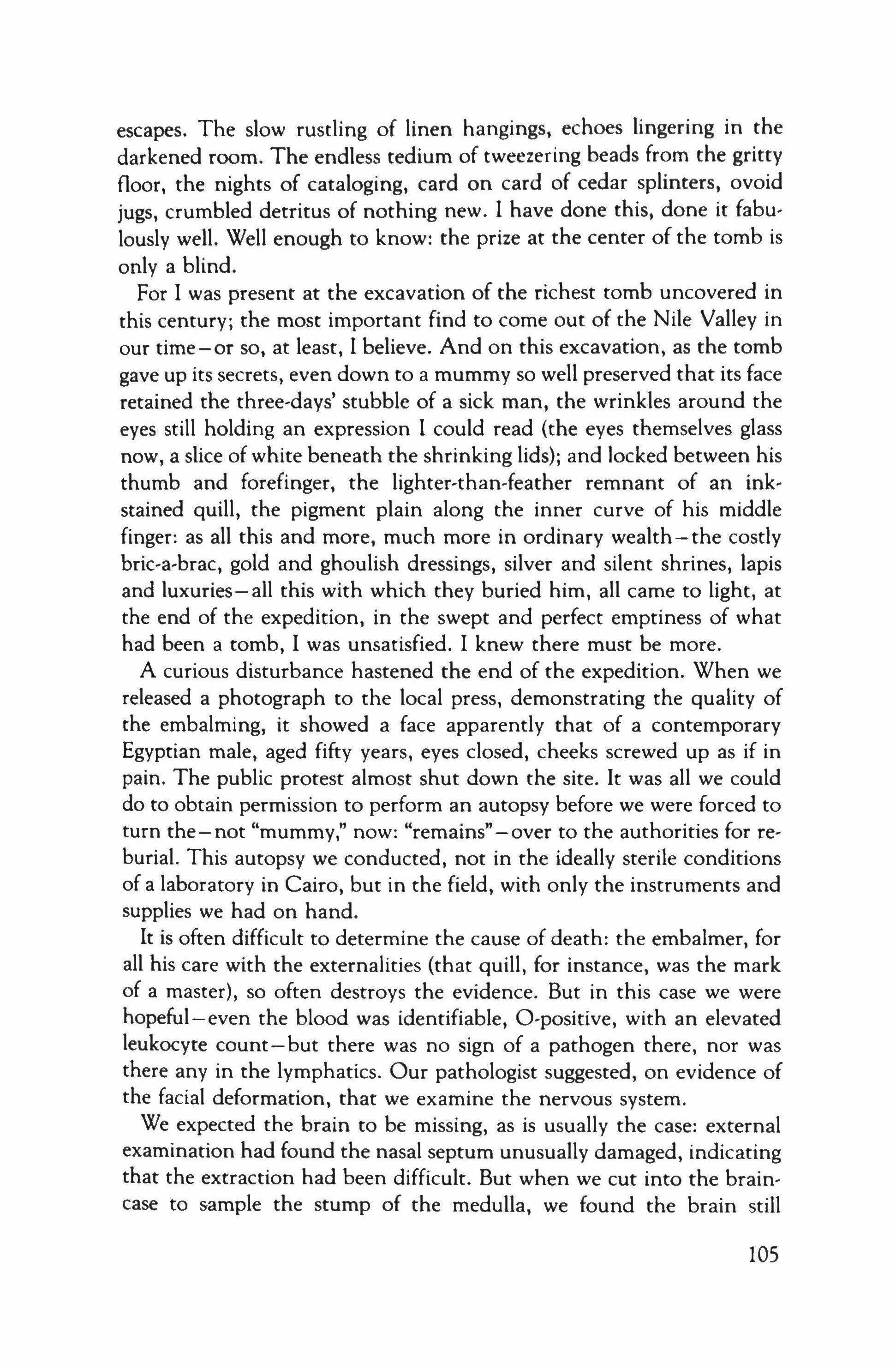
escapes. The slow rustling of linen hangings, echoes lingering in the darkened room. The endless tedium of tweezering beads from the gritty floor, the nights of cataloging, card on card of cedar splinters, ovoid jugs, crumbled detritus of nothing new. I have done this, done it fabulously well. Well enough to know: the prize at the center of the tomb is only a blind.
For I was present at the excavation of the richest tomb uncovered in this century; the most important find to come out of the Nile Valley in our time-or so, at least, I believe. And on this excavation, as the tomb gave up its secrets, even down to a mummy so well preserved that its face retained the three-days' stubble of a sick man, the wrinkles around the eyes still holding an expression I could read (the eyes themselves glass now, a slice of white beneath the shrinking lids); and locked between his thumb and forefinger, the lighter-than-feather remnant of an inkstained quill, the pigment plain along the inner curve of his middle finger: as all this and more, much more in ordinary wealth - the costly bric-a-brac, gold and ghoulish dressings, silver and silent shrines, lapis and luxuries-all this with which they buried him, all came to light, at the end of the expedition, in the swept and perfect emptiness of what had been a tomb, I was unsatisfied. I knew there must be more.
A curious disturbance hastened the end of the expedition. When we released a photograph to the local press, demonstrating the quality of the embalming, it showed a face apparently that of a contemporary Egyptian male, aged fifty years, eyes closed, cheeks screwed up as if in pain. The public protest almost shut down the site. It was all we could do to obtain permission to perform an autopsy before we were forced to turn the-not "mummy," now: "remains"-over to the authorities for reburial. This autopsy we conducted, not in the ideally sterile conditions of a laboratory in Cairo, but in the field, with only the instruments and supplies we had on hand.
It is often difficult to determine the cause of death: the embalmer, for all his care with the externalities (that quill, for instance, was the mark of a master), so often destroys the evidence. But in this case we were hopeful-even the blood was identifiable, a-positive, with an elevated leukocyte count-but there was no sign of a pathogen there, nor was there any in the lymphaties. Our pathologist suggested, on evidence of the facial deformation, that we examine the nervous system.
We expected the brain to be missing, as is usually the case: external examination had found the nasal septum unusually damaged, indicating that the extraction had been difficult. But when we cut into the braincase to sample the stump of the medulla, we found the brain still
105

attached, and intact. No one breathed. It had shriveled into a hard, wrinkled sponge, a walnut's size. When the pathologist touched it with his probe it crumbled; a puff of pollen-yellow dust drifted up, lazy in the spotlight, swirling as we all exhaled, and I imagined I could smell something, imagined I felt something touch the back of my palate, and a hand brush briefly the base of my skull.
There was never any pathogen found. But even had there been, none of us could have known that the condition was still contagious.
Forgive the digression. It is not, of course, a digression. The disease that killed the steward Nur-Mar has in the past twelve months become the central fact of my existence. There appeared, last May, an obscuration - no larger than the full moon - at the center of my vision. At first, I ignored it. At night, as I tried to sleep, it would pulse faintly, tinged with red at its borders. At times it disappeared entirely. Now it is always before me, always there at the center of my vision, a pool of ink, a hole opened in the world, a tunnel toward which I constantly move. I knew already where it led.
Then this winter, around the turn of the year, I began to hear the faintest sound, an echo, a whisper, a word murmured softly just behind my head. I began to notice a persistent smell, which I characterized as burnt wiring. This was only a metaphor.
I consulted a neurologist. He ordered tests: dye injections into my carotid artery, CAT scans, NMR sweeps that made my fillings shudder. The tests revealed nothing. The specialist was tactful, suggesting I seek alternative care. I ignored him. Nor did I seek a second opinion.
This was a difficult decision. I did not, finally, arrive at it out of despair: I like to think I am realist. I am confident that whatever afflicts me is unknown to contemporary medicine, and that no cure exists. I do not know if it will kill me, but I suspect it will. All a doctor could offer me is morphine, and I will not have that. They could, I suppose, also offer guesses as to the date of my demise, but I will not have that, either. And most of all I will not have myself immured in a hospital, or otherwise encrypted, before my time. As long as I can work, I will continue to do so.
Do not mistake me. There is nothing of nobility about this. My dedication to my work, to knowledge, science, truth, or any of that large body of humbug at which we gesture when we lecture trusting undergraduates, apply for grants, or otherwise seek to present ourselves as something that we're not - none of that matters now. I have lived among the Egyptians too long to deny my reasons. If I am to die, I will at least erect a fitting monument before I go. My monument? The King: of
106
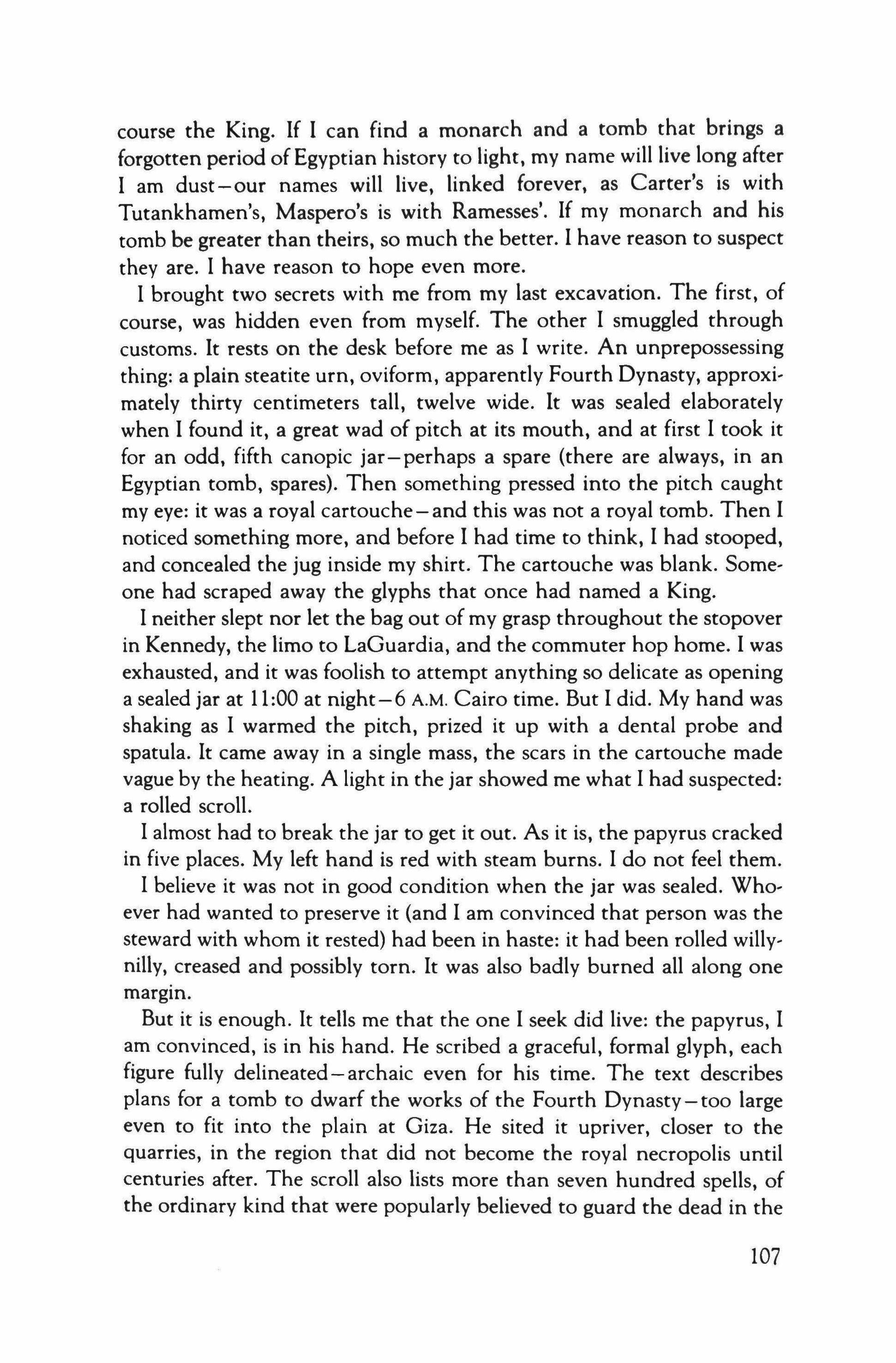
course the King. If I can find a monarch and a tomb that brings a forgotten period of Egyptian history to light, my name will live long after I am dust-our names will live, linked forever, as Carter's is with Tutankhamen's, Maspero's is with Ramesses'. If my monarch and his tomb be greater than theirs, so much the better. I have reason to suspect they are. I have reason to hope even more.
I brought two secrets with me from my last excavation. The first, of course, was hidden even from myself. The other I smuggled through customs. It rests on the desk before me as I write. An unprepossessing thing: a plain steatite urn, oviform, apparently Fourth Dynasty, approximately thirty centimeters tall, twelve wide. It was sealed elaborately when I found it, a great wad of pitch at its mouth, and at first I took it for an odd, fifth canopic jar-perhaps a spare (there are always, in an Egyptian tomb, spares). Then something pressed into the pitch caught my eye: it was a royal cartouche - and this was not a royal tomb. Then I noticed something more, and before I had time to think, I had stooped, and concealed the jug inside my shirt. The cartouche was blank. Someone had scraped away the glyphs that once had named a King.
I neither slept nor let the bag out of my grasp throughout the stopover in Kennedy, the limo to LaGuardia, and the commuter hop home. I was exhausted, and it was foolish to attempt anything so delicate as opening a sealed jar at 11:00 at night-6 A.M. Cairo time. But I did. My hand was shaking as I warmed the pitch, prized it up with a dental probe and spatula. It came away in a single mass, the scars in the cartouche made vague by the heating. A light in the jar showed me what I had suspected: a rolled scroll.
I almost had to break the jar to get it out. As it is, the papyrus cracked in five places. My left hand is red with steam burns. I do not feel them.
I believe it was not in good condition when the jar was sealed. Whoever had wanted to preserve it (and I am convinced that person was the steward with whom it rested) had been in haste: it had been rolled willvnilly, creased and possibly torn. It was also badly burned all along one margin.
But it is enough. It tells me that the one I seek did live: the papyrus, I am convinced, is in his hand. He scribed a graceful, formal glyph, each figure fully delineated - archaic even for his time. The text describes plans for a tomb to dwarf the works of the Fourth Dynasty - too large even to fit into the plain at Giza. He sited it upriver, closer to the quarries, in the region that did not become the royal necropolis until centuries after. The scroll also lists more than seven hundred spells, of the ordinary kind that were popularly believed to guard the dead in the
107
Duat, the underworld. And then, before the scroll breaks off (torn, not burned), the syntax, the diction-even the scribing hand-decay. There are many terms I do not recognize. This is not uncommon in hieroglyphs: many signs were invented as needed. But in this scroll the normal alphabet is gone - the abstract determinative is entirely absent, and I am not certain if what I read is code or gibberish. Only one word comes through persistently en clair. The word is rare-I think were I not already interested in the subject, I would have failed to recognize it: it is the word for "word of hidden meaning." It is the word for what I seek.
It is odd. Even now, when I am beyond the reach of ridicule-when not only my professional reputation, but shame and dignity are identically vain-when I am determined nothing will prevent my telling this story - I must pause.
The Egyptians invented written language for one purpose only. Not what you think: not to count oxen, order slaves, predict the Nile floods-none of that. A notched stick, properly applied, will serve those functions better than half a thousand glyphs. The Egyptian language had a higher aspiration. Graven in the living rock of a tomb, words would endure when the last breath of the speaker had vanished: words in rock took on a solidity that their makers hoped that they themselves would attain in the Duat. For the Egyptian death was not like ours. Their afterlife was physical, and the physical required names. And names gave power in the afterlife: knowing the proper names, and the spells in which to speak them, these were the keys to life everlasting. They persisted in this belief three thousand years at least. Who are we, with our 300-year tradition of empiricism, to say them nay? Not I: what has empiricism done for me of late?
I have resolved to try the Egyptian way. Especially now, when what was once a nameless urge has become an urgent need, and I find - as if I had known a spell for finding-the King I seek, his dwelling place, and over five millennia begin to feel his agony. And find he has a word.
I seek a word of power.
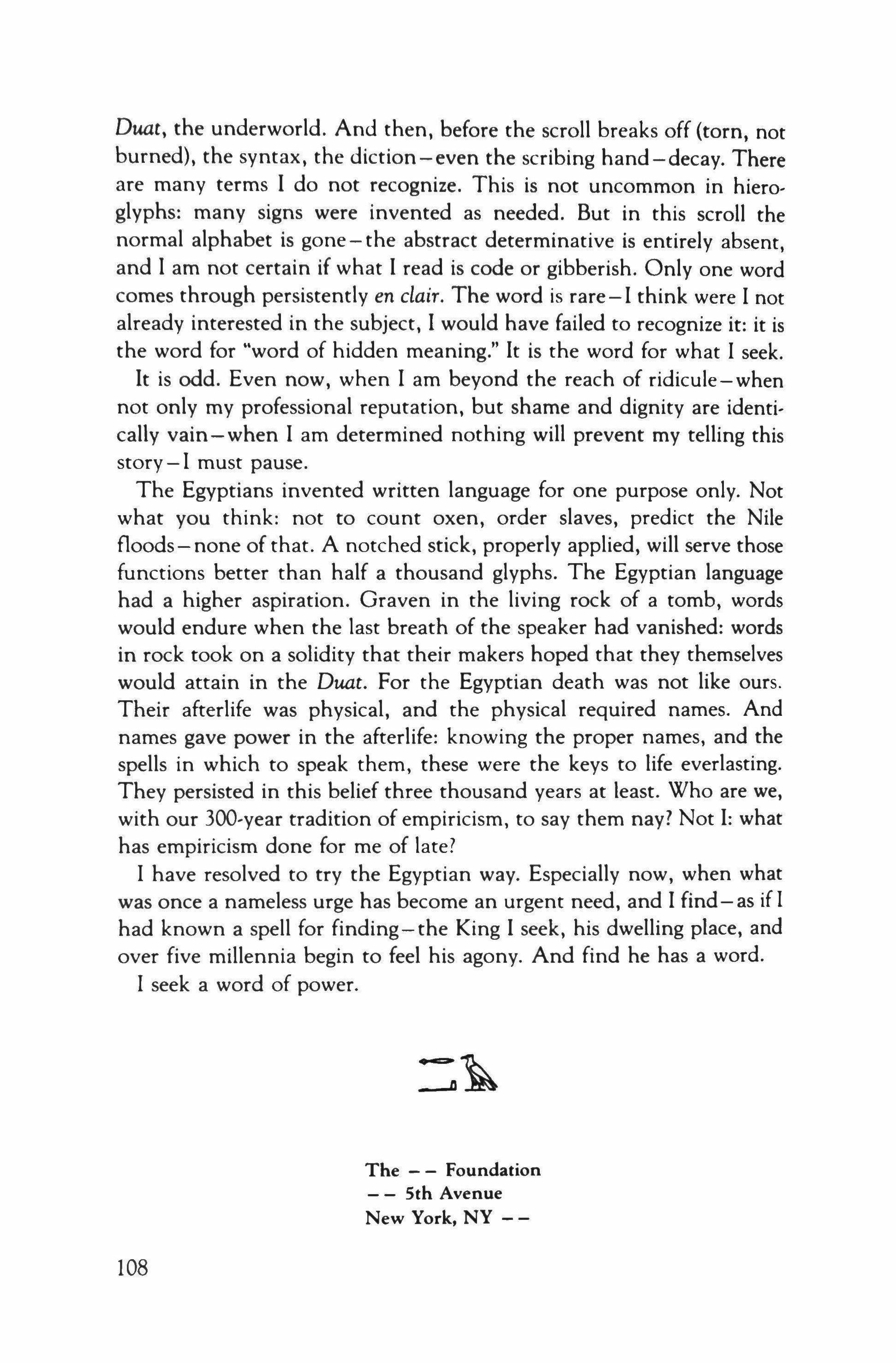
The- Foundation - - 5th Avenue New York, NY
108
Department of
University
Dear Dr. -- -:
We regret

From the king lists of the chroniclers a name was stricken - as names had been struck before, and would be after. Khufu, who bled the kingdom for his pyramid, finds his name written in only four instances-and none of those upon the tomb itself. This was the revenge of those who followed him: He descended nameless into his horizon; nameless, into a realm where the possession of a name was the last defense against annihilation. Without a name, not even a mountain of stone could ensure his immortality. Today the sarcophagus of Khufu is an empty tub of granite within an empty chamber.
Worse befell Radedef, who ruled the Black Land between Khufu and Khafre, and whose pyramid rose on an eminence above the plain of Giza, from the top of which he hoped to look down upon the pyramid we call the Great, in the days when it stood gleaming, white and perfect. Radedef's monument they toppled, and left not even rubble. Akhenaten's great city lay in ruin within a century of his death, razed by the Ramesside kings in their campaign to eradicate the memory of "That Criminal." The blocks of his temples, the stelae celebrating the founding of his holy city, have been found shoring up the foundations of Horemheb's pylons at Karnak, of Seti's hvposrvle hall: the name of the heretic king has been gouged from his cartouche. The bodies of the royal family were removed from the tomb at Amarna, brought to Thebes and there desecrated in an official rite, the monuments, the name, the flesh, the soul scattered on the Libyan wind.
But something else-no mere censorship after the fact-transpired in the twenty-fifth century B.C.E., somewhere between Thebes and Mernphis. For it is not, I know, merely the effacement of a despot's name I have discovered. Not a word has survived. Surely such a perfect silence speaks more loudly of a secret than any muttering of fragments ever did. I am convinced that something silenced the Egyptian people themselves, and held them so enthralled over a generation. What else could account for the perfect blankness of the record? Something-someone-must
Or.
Archaeology-- -
109
have silenced the entire people - a people for whom speech was literally life and death - a people whose funerary rites they consummated in the Opening of the Mouth, that the dead could speak the spells empowering his going out by day and going out by night, preventing his heart from being taken from him in the underworld, or preventing his dying a second time; so the soul could utter these, and half a thousand other spells that ensured survival. What could have silenced such a people? Even now, with the pieces of the answer all at hand, I am unable to say.
And that inability, I fear, has been my undoing. "Insufficient evidence," the Foundation says. What more evidence must I produce? What evidence can l? I could have revealed my theft of the urn from Nut-Mar's tomb. It would have been enough. Perhaps I would have escaped censure.
But were I to have revealed, even in so obscure a document as a grant proposal, the existence of the papyrus of Nut-Mar, I do not doubt disaster would have followed. The map would have dispersed itself into the public domain, and all associated with it - the tomb, the spells, and-all else, all else-become the idle stuff of television, magazines, tabloids. A million people chanting the name of the nameless one and all would have been lost-for him, and for me. If I know nothing else I know this: the silence was essential.
But now, because of that same silence, all has been lost. For without that grant, I cannot go into Egypt. And go to Egypt now I must, and find the tomb, and learn the Word, while I still have voice to utter it.
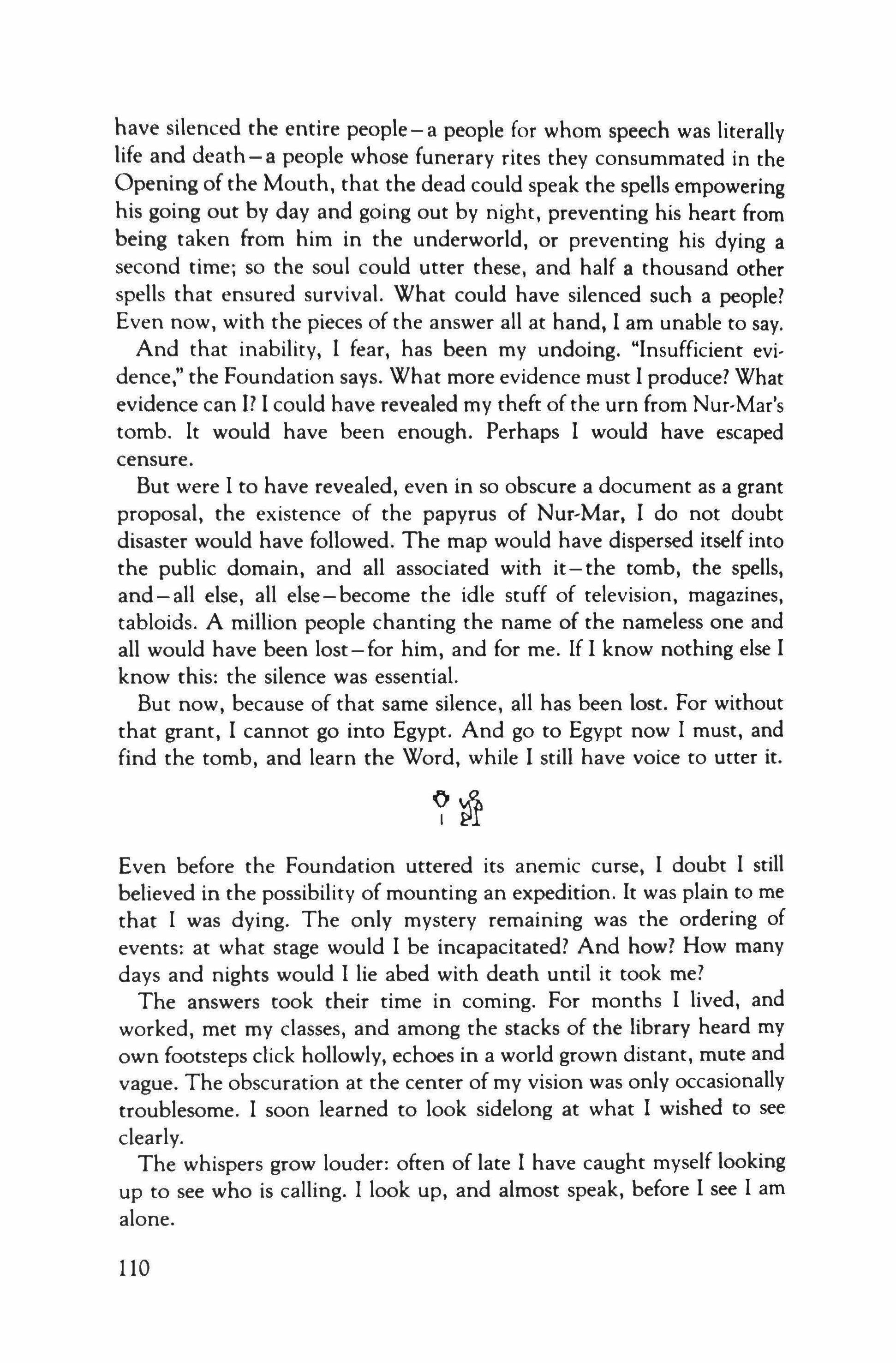
Even before the Foundation uttered its anemic curse, I doubt I still believed in the possibility of mounting an expedition. It was plain to me that I was dying. The only mystery remaining was the ordering of events: at what stage would I be incapacitated? And how? How many days and nights would I lie abed with death until it took me?
The answers took their time in coming. For months I lived, and worked, met my classes, and among the stacks of the library heard my own footsteps click hollowly, echoes in a world grown distant, mute and vague. The obscuration at the center of my vision was only occasionally troublesome. I soon learned to look sidelong at what I wished to see clearly.
The whispers grow louder: often of late I have caught myself looking up to see who is calling. I look up, and almost speak, before I see I am alone.
110
company of gods said, "What hath happened?" and his gods exclaimed "What is it?" But Ra could not answer, for his jaws trembled; the poison spread swiftly through his flesh. When the great god had found his heart, he cried unto those who were in his train, saying"A calamity hath fallen upon me. My heart perceiveth it, but my eyes see it not; my hand hath not caused it, nor do I know who hath done this unto me. Never have I felt such pain, neither can sickness cause more woe than this."
Then Isis came unto him, her mouth full of the breath of life, saying, "What hath come to pass, 0 holy father?"
"That which 1 saw not. Is it fire? Is it water? 1 cannot see the sky."
"0 tell me thy name, holy father, and I will cure thee."
"I have multitudes of names and multitudes of forms, but my true name my father uttered. It hath been hidden within me before he begat me, who would not that the words of power of another should have dominion over me. I am Khepera in the morning, I am Ra at noon, and I am Tmu at eventide. Let those to call the poison from me."
The poison pierced deeper, and the great god could no longer walk.
"What thou hast said is not thy holy name. 0 tell it unto me, and the poison shall depart."
Now the poison burned like fire, and it was fiercer than the flame and the furnace, and the majesty of the god said, "I consent that Isis shall search unto me, and even unto my navel, and that my name shall pass from me into her."
Thus was the name of the great god taken from him, and Isis said, "Depart, poison. It is I who work, for it was I who made to fan down the poison. And what I made I claim."
Then the god hid himself from the gods, and his place in the boat of millions of years was empty.
These are the words of her whose own name we know not, who knew Ra by his holy name. In later days her son took the name, and the two eyes of the holy god, and the name of the queen his mother, but the story of this is not told.

The story cannot be told. I have tried to imagine, have tried to writebut I cannot imagine the story of the King. I know there was a King, and that he lived, day to day, under the same sun as I, on the same Earth as I, in a world not so different from the one I inhabit, the faces I see, the voices I hear on any day, speaking a language not so strange that I, four millennia later, cannot form its syllables upon my tongue. He had a tongue like mine to speak, a hand like mine to scribe. But I cannot imagine the story of the King. I have tried. But all of it is insubstantial. There it is: I tell myself that
III
human nature does not change, and this may be so. I tell myself that the world does not change, and this also may be so: the conditions of existence remain. But for all the comfort such endurance offers, when I face the lapse of time that divides me from him, the heart goes out of me. Before the appalling fact of those four millennia and more-one million, five hundred and sixty-nine thousand, five hundred and so many days from the moment he went into his tomb-so many countable minutes, each following each in unbroken succession until the day I came squalling and slippery into life-Words desert me.
I know now why they required spells to remember their names in the underworld, why they treasured up spells to allow them to speak. Already before the same void I find myself falling silent. The summer trimester is upon USj the halls are emptied of students, and the campus has gone lush and quiet. The echo of my footsteps flies down the hallway, fading, and I know that when the fall term comes, I will follow them.

I have been examining the evidence. I have the lab results before me: copies; the originals the doctor retains, as if jealous of them, within a vault. They show the chemistry of my blood, the skipping of my heart, the slow, dreaming drift of the EEG. All, the doctor said, were negative: normal. I am a healthy man.
The X rays, the CT traces, the NMR plots all show the same object: my skull. The flaring void of nose, wide-staring sockets, the brain behind them only indifferently visible, merely suggested by the net of veins, a fine haze upholding the invisible structure that is me.
Nothing reveals itself: no tumor sprouting at the center, no erosion mining the stem. I hold the gray films to my desk lamp, and the bright ghost of the bulb hovers a thumb's width away from the obscuration in my eyes.
Nothing is there. But I wonder if, to other eyes, trained in mysteries I do not know, that net of nothing might reveal-What? I do not know; only that the thought of it sends horror through me: fear in my groin, a hand brushing cold up through my viscera, I feel the whispers almost audible against the racing of my heart.
112
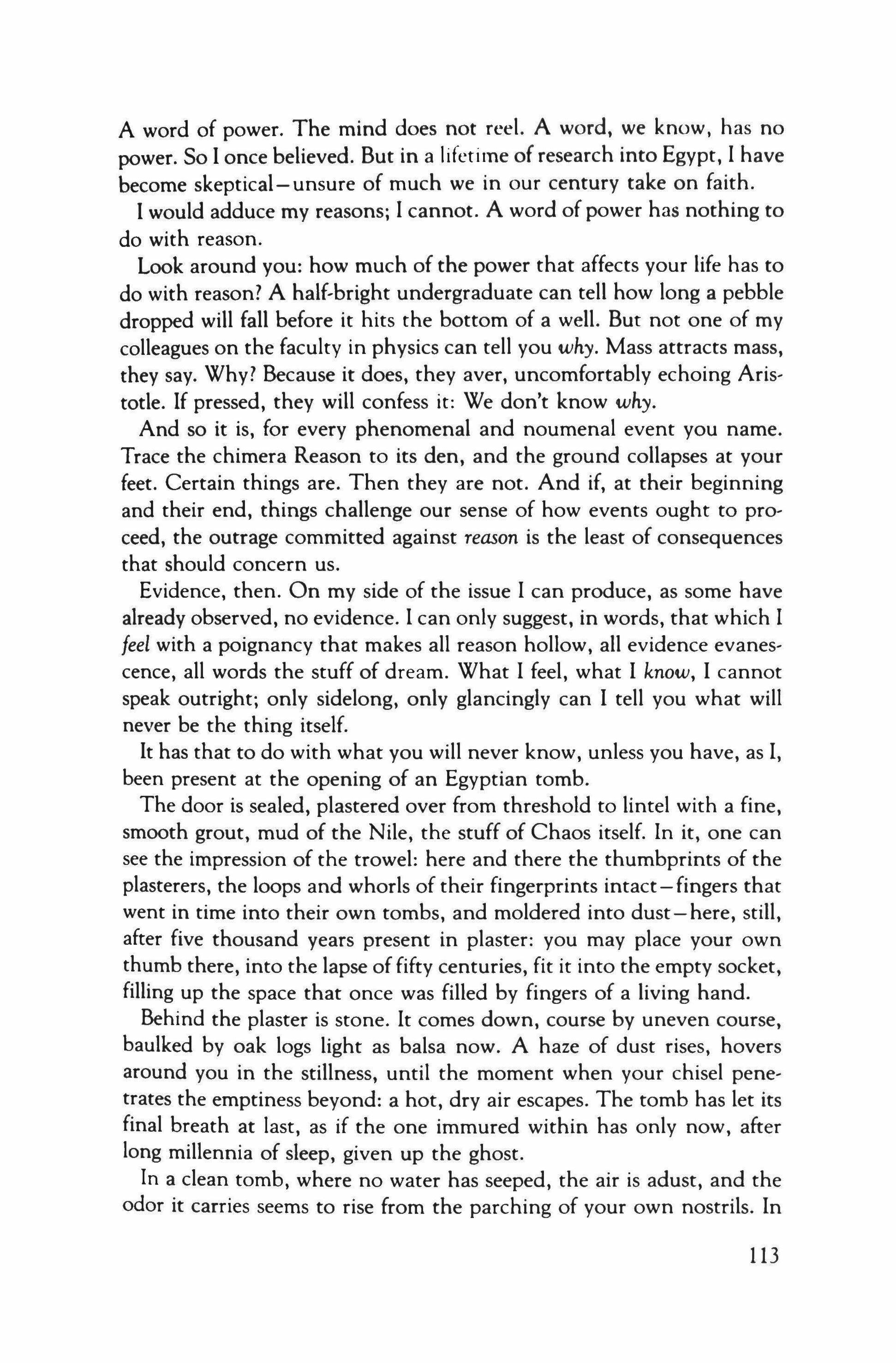
A word of power. The mind does not reel. A word, we know, has no power. So I once believed. But in a lifetime of research into Egypt, I have become skeptical-unsure of much we in our century take on faith.
I would adduce my reasons; I cannot. A word of power has nothing to do with reason.
Look around you: how much of the power that affects your life has to do with reason? A half-bright undergraduate can tell how long a pebble dropped will fall before it hits the bottom of a well. But not one of my colleagues on the faculty in physics can tell you why. Mass attracts mass, they say. Why? Because it does, they aver, uncomfortably echoing Aristotle. If pressed, they will confess it: We don't know why.
And so it is, for every phenomenal and noumenal event you name. Trace the chimera Reason to its den, and the ground collapses at your feet. Certain things are. Then they are not. And if, at their beginning and their end, things challenge our sense of how events ought to pro' ceed, the outrage committed against reason is the least of consequences that should concern us.
Evidence, then. On my side of the issue I can produce, as some have already observed, no evidence. I can only suggest, in words, that which I feel with a poignancy that makes all reason hollow, all evidence evanescence, all words the stuff of dream. What I feel, what I know, I cannot speak outright; only sidelong, only glancingly can I tell you what will never be the thing itself.
It has that to do with what you will never know, unless you have, as I, been present at the opening of an Egyptian tomb.
The door is sealed, plastered over from threshold to lintel with a fine, smooth grout, mud of the Nile, the stuff of Chaos itself. In it, one can see the impression of the trowel: here and there the thumbprints of the plasterers, the loops and whorls of their fingerprints intact - fingers that went in time into their own tombs, and moldered into dust - here, still, after five thousand years present in plaster: you may place your own thumb there, into the lapse of fifty centuries, fit it into the empty socket, filling up the space that once was filled by fingers of a living hand.
Behind the plaster is stone. It comes down, course by uneven course, baulked by oak logs light as balsa now. A haze of dust rises, hovers around you in the stillness, until the moment when your chisel penetrates the emptiness beyond: a hot, dry air escapes. The tomb has let its final breath at last, as if the one immured within has only now, after long millennia of sleep, given up the ghost.
In a clean tomb, where no water has seeped, the air is adust, and the odor it carries seems to rise from the parching of your own nostrils. In
113

the tombs where rot has entered, that most ravenous of tomb-robbers gusts great squalls of laughter, leaps eagerly to greet you, draw you in to share the sport of its long feast. So it was in Nut-Mar's tomb: at the opening of the probe-hole, the candle we held into the escaping wind died, and the tunnel filled with a horrible presence - not decay, not a smell at all: the presence in the tunnel was sensible only in the hairs it stirred upon our necks.
The clearing of the door told why. Nur-Mar had been buried with an Answerer.
The ushabti were, in later dynasties, an artistic convention: small, painted figurines in the image of the deceased and his servants, who were to do for him the onerous labor required in the Duas. They have long fascinated me, in the way all things Egyptian do; the attempt to make literal and concrete what we now conceive as only symbolic: this is essentially Egyptian. Before the opening of Nut-Mar's tomb, it had never occurred to me to wonder what the origins of this abstracting process might have been in the case of the ushabti: if we looked back long enough, would we find the place where art lapses back into the flesh?
The Answerer in Nur-Mar's tomb lay just inside the door. I do not know if there were theoretical or practical reasons for the location. Theoretically, I suppose, stationed near the door an Answerer would be placed so as to intercept anyone who entered with a task for the deceased. Practically, the issue is clearer: whoever stapled his fetters had made certain the chain would stop him short of the offerings offood and wine that filled the chamber just beyond.
There is this quality in any Egyptian tomb: they annihilate time. Whether it is in the clear preservation of the marks left by Nur-Mar's Answerer in his last hours, or in the simple bouquet of dried flowers that we found atop the steward's sarcophagus, in each case, with every trivial find, there is an overwhelming sense that these events stopped only moments before you entered. If the object of Egyptian funerary practice was to preserve the identity (the Ka, or &, or Kau, or Ku, call it what they would, and did) of the deceased, who is to say they did not succeed? Are there any other faces from the third millennium B.C.E. familiar to us now - not through stone or pigment, but the flesh itself, identifiable and individual, as Ramesses' is in Cairo, or Nur-Mar's is this moment in my living memory?
When I was still a boy, I won, as a prize in a national science competition, a two-week tour of Europe, in company with four dozen other prodigies. My memories of the trip are all decayed now into a series of hotel rooms with exotic fixtures and a damp smell, and a series of
114
interminable bus-rides. All lost now, except for one gray, drizzling morning in the valley of the Dordogne, when we descended into the caves of Lascaux. The image of a hand, silhouetted in a haze of charcoal, hangs above me to this day - too high for me to reach. Still I could tell the hand - the left - had been larger than my own. I felt almost a stroke from that hand, a touch on my skin that lingered, and in the fading sensation I felt estranged from the other boys that roamed the cavern at my side. I emerged into the gray damp daylight of France, and found the surface of the earth a hollow dream.
Never in my life have I felt so utterly alone, a boy of twelve, in a tour bus in Europe, a continent away from a land where I had no home.
As the works of the Egyptians bettered the hunting magic of the Magdalenian - the one hazy image of a hand ramifying, resolving out of chaos to become a face, a body swathed in linen, a room with furniture, almost a life-I am tantalized by the sense that, somewhere in the three millennia of their active seeking, someone in ancient Egypt may have done it. Someone may have reached a hand clear through the rock, pulled himself, alive, through death's abiding wall.
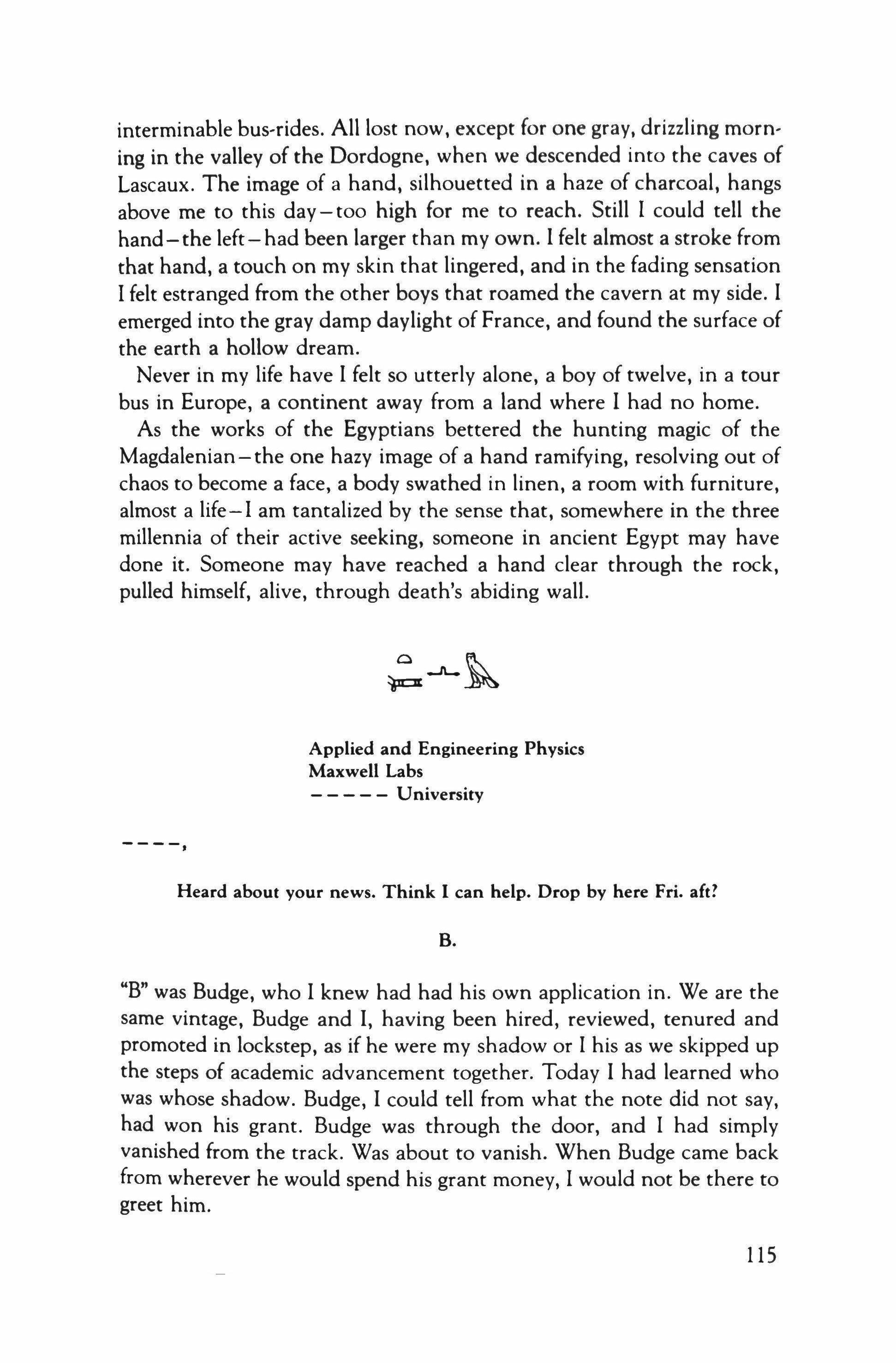
Applied and Engineering Physics Maxwell Labs
University Heard about your news. Think I can help. Drop by here Fri. aft?
"B" was Budge, who I knew had had his own application in. We are the same vintage, Budge and I, having been hired, reviewed, tenured and promoted in lockstep, as if he were my shadow or I his as we skipped up the steps of academic advancement together. Today I had learned who was whose shadow. Budge, I could tell from what the note did not say, had won his grant. Budge was through the door, and I had simply vanished from the track. Was about to vanish. When Budge came back from wherever he would spend his grant money, I would not be there to greet him.
- - - -
-
B.
115
This saddened me, more than I would have expected. I have no family, few friends. In my line of work - I cannot blame it on my line of work. But Budge and I, although our shared interests are few, and he has his family, and his work besides, Budge and I have shared something like friendship this past decade. If friendship is the expectation that a certain face and voice will be there, unsought, unexpected, met by chance and passed as easily, that was what we had. At the thought that one of our faces would be missing, I found myself growing something like affection for Budge.
But that note! The cheery briskness of it-so like him, and so unlike my mood. Thought he could help. With what, friend B.? For a moment the exception I had made for Budge broke down, and I included him in my resentment against the well-funded world of the (as they like to say) hard sciences. I tossed the wad of paper in a corner of my office, and strode angrily out of doors.

Let none who is outside know this spell, for it is a great mystery, and those who dwell in the swamps know it not. Thou shalt not perform this in the presence of any person except thyself alone, for it is indeed an exceedingly great mystery which no man whatever knoweth.
These are the words of power to be spoken alone, for entering into the underworld like a god. Thou shalt not speak these words, nor cause them to be spoken, in the presence of any person, for they are a great mystery, and the eye of no man soever must see them, for it is a thing of abomination for every man to know it. Hide it, therefore; the Book of the Lady of the Hidden Temple is its name.
- They're in what? Astronomy? Agronomy you say, oh dear. Were their shoes clean? They won't start tilling up the backyard, will they? What? Nematodes? They're little worms, I think. Well I don't think worms are preferable to animals, no. Infest the carpets.
I could hear a long sigh, and then a longer silence, cut through by a tiny, insect's voice.
- Fly out? I don't think - Yes, you're right, I will be the one to complain if it's a sty. The schools? Oh, I'd forgotten, they're coming too, aren't they. We could board- You spoke with them about it? And they? Oh. Like that. My idea? Well I suppose you're right it was.
Another sigh. At my ear I heard impatient whispering, but I lingered
116
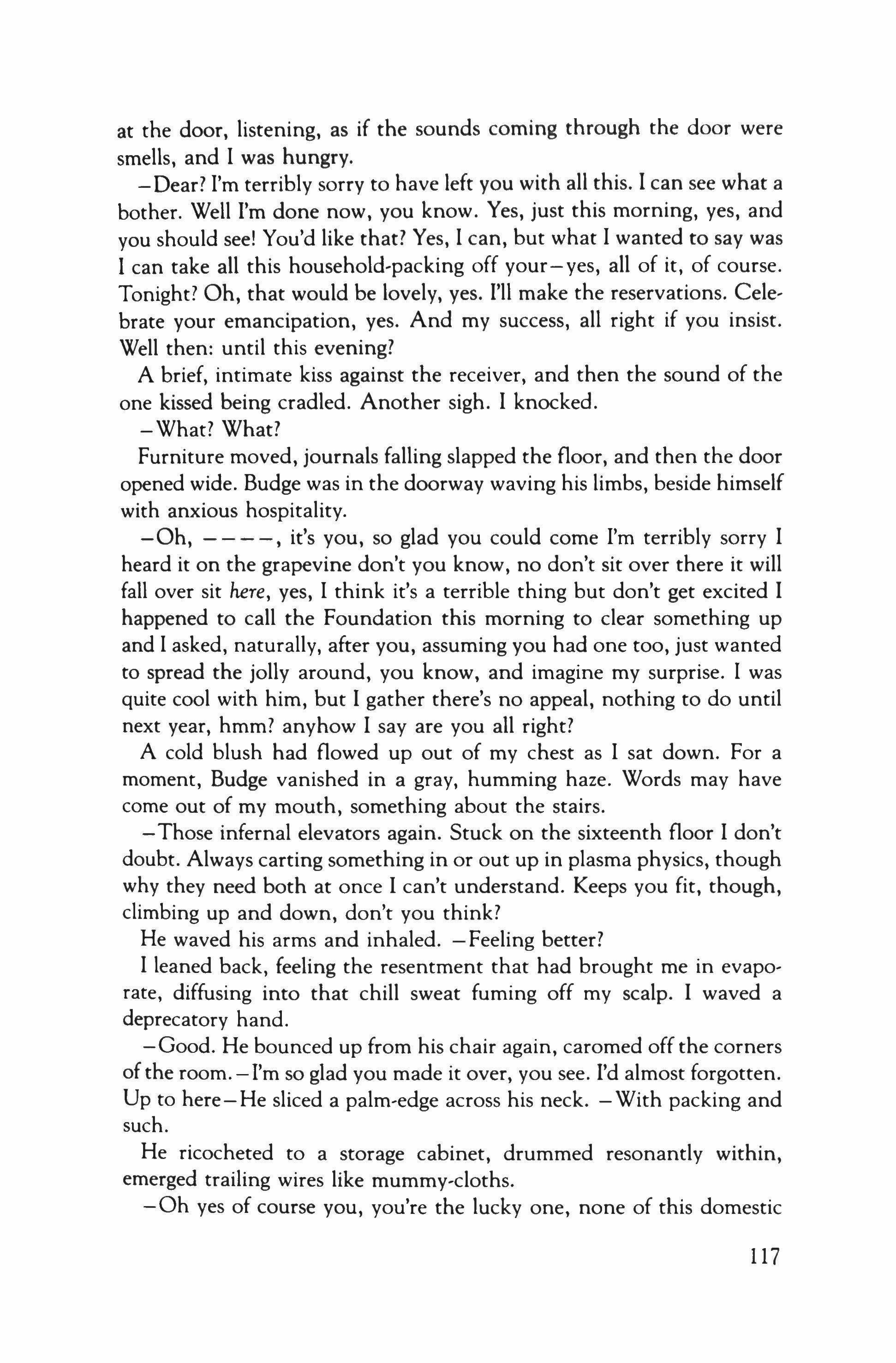
at the door, listening, as if the sounds coming through the door were smells, and I was hungry.
-Dear? I'm terribly sorry to have left you with all this. I can see what a bother. Well I'm done now, you know. Yes, just this morning, yes, and you should see! You'd like that? Yes, I can, but what I wanted to say was I can take all this household-packing off your-yes, all of it, of course. Tonight? Oh, that would be lovely, yes. I'll make the reservations. Celebrate your emancipation, yes. And my success, all right if you insist. Well then: until this evening?
A brief, intimate kiss against the receiver, and then the sound of the one kissed being cradled. Another sigh. I knocked.
- What? What?
Furniture moved, journals falling slapped the floor, and then the door opened wide. Budge was in the doorway waving his limbs, beside himself with anxious hospitality.
-Oh, ----, it's you, so glad you could come I'm terribly sorry I heard it on the grapevine don't you know, no don't sit over there it will fall over sit here, yes, I think it's a terrible thing but don't get excited I happened to call the Foundation this morning to clear something up and I asked, naturally, after you, assuming you had one too, just wanted to spread the jolly around, you know, and imagine my surprise. I was quite cool with him, but I gather there's no appeal, nothing to do until next year, hmm? anyhow I say are you all right?
A cold blush had flowed up out of my chest as I sat down. For a moment, Budge vanished in a gray, humming haze. Words may have come out of my mouth, something about the stairs.
- Those infernal elevators again. Stuck on the sixteenth floor I don't doubt. Always carting something in or out up in plasma physics, though why they need both at once I can't understand. Keeps you fit, though, climbing up and down, don't you think?
He waved his arms and inhaled. -Feeling better?
I leaned back, feeling the resentment that had brought me in evaporate, diffusing into that chill sweat fuming off my scalp. I waved a deprecatory hand.
-Good. He bounced up from his chair again, caromed off the corners of the room. -I'm so glad you made it over, you see. I'd almost forgotten. Up to here-He sliced a palm-edge across his neck. - With packing and such.
He ricocheted to a storage cabinet, drummed resonantly within, emerged trailing wires like mummy-cloths.
-Oh yes of course you, you're the lucky one, none of this domestic
117
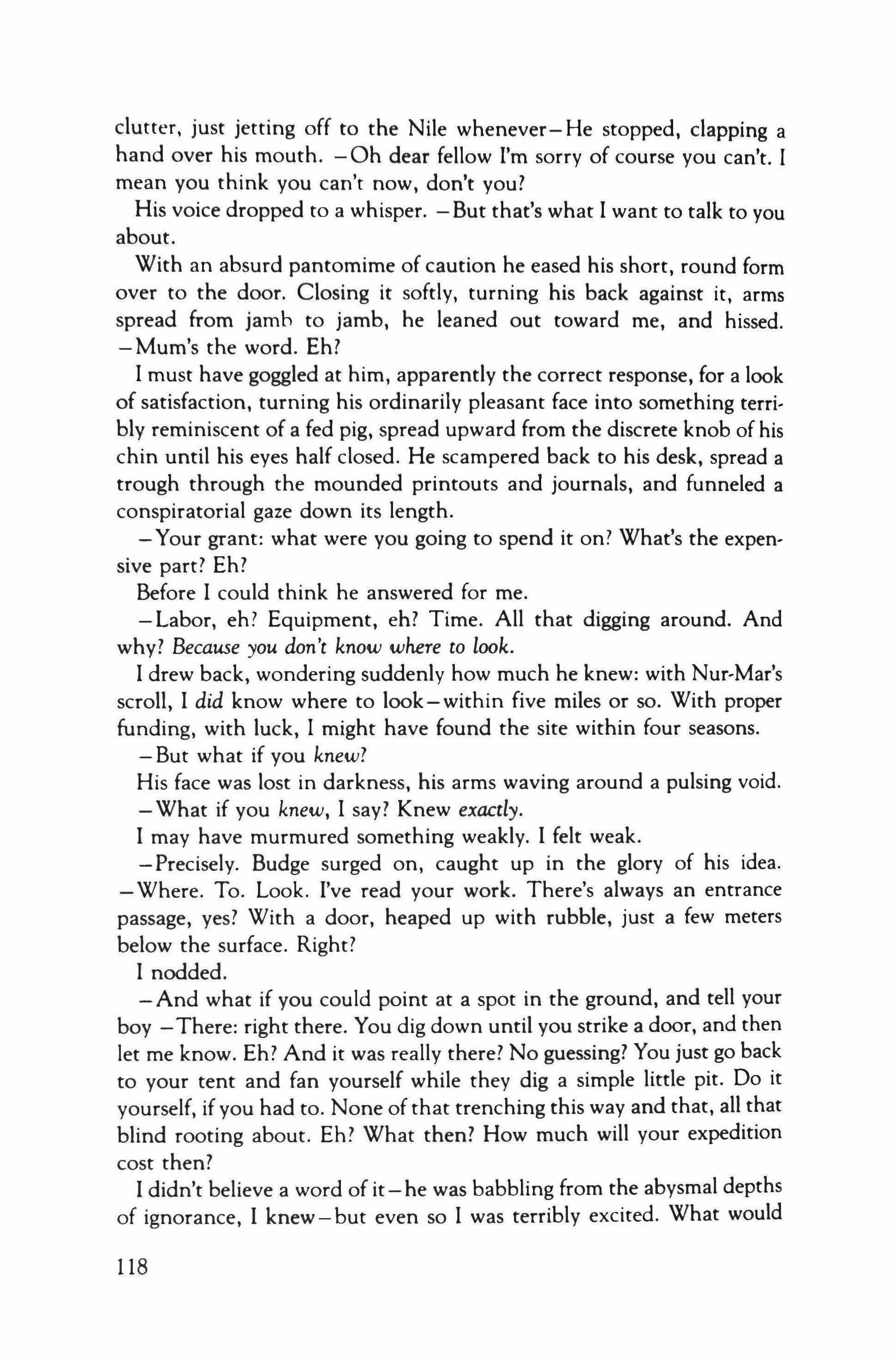
clutter, just jetting off to the Nile whenever- He stopped, clapping a hand over his mouth. -Oh dear fellow I'm sorry of course you can't. I mean you think you can't now, don't you?
His voice dropped to a whisper. -But that's what I want to talk to you about.
With an absurd pantomime of caution he eased his short, round form over to the door. Closing it softly, turning his back against it, arms spread from jamh to jamb, he leaned out toward me, and hissed.
- Mum's the word. Eh?
I must have goggled at him, apparently the correct response, for a look of satisfaction, turning his ordinarily pleasant face into something terribly reminiscent of a fed pig, spread upward from the discrete knob of his chin until his eyes half closed. He scampered back to his desk, spread a trough through the mounded printouts and journals, and funneled a conspiratorial gaze down its length.
- Your grant: what were you going to spend it on? What's the expensive part? Eh?
Before I could think he answered for me.
-Labor, eh? Equipment, eh? Time. All that digging around. And why? Because you don't know where to look.
I drew back, wondering suddenly how much he knew: with Nut-Mar's scroll, I did know where to look-within five miles or so. With proper funding, with luck, I might have found the site within four seasons.
- But what if you knew?
His face was lost in darkness, his arms waving around a pulsing void.
- What if you knew, I say? Knew exactly.
I may have murmured something weakly. I felt weak.
- Precisely. Budge surged on, caught up in the glory of his idea.
- Where. To. Look. I've read your work. There's always an entrance passage, yes? With a door, heaped up with rubble, just a few meters below the surface. Right?
I nodded.
- And what if you could point at a spot in the ground, and tell your boy -There: right there. You dig down until you strike a door, and then let me know. Eh? And it was really there? No guessing? You just go back to your tent and fan yourself while they dig a simple little pit. Do it yourself, if you had to. None of that trenching this way and that, all that blind rooting about. Eh? What then? How much will your expedition cost then?
I didn't believe a word of it - he was babbling from the abysmal depths of ignorance, I knew-but even so I was terribly excited. What would
118
such an expedition cost? If I could find the entrance right away? I could hire a single fellah for a month for less then the cost of a night in Cairo.
And once I was in?
-Oh, I know, once you're in you'll need equipment-I know you you fox, you're on to something big I can tell-once you're in you'll need your native bearers, trucks, all that preservation gear.
He waved a hand airily toward the door. - But that's the beauty of it, don't you see? Once you need all that, the bloody foundations will be falling all over each other with their money. Hah! Let 'em! You know what we can tell them: Put it where the sun don't shine! Eh?
The vision of it opened up before me then, exactly as if the door had rolled away: not prized down stone by stone, but hinged, noiselessly opening for me-for me alone. Budge was right: if I only knew where to start, I wouldn't need the elaborate support an exploratory dig requires. But he was wrong as well. Once I was in that door, I would need no help from anyone, ever again. Let the trash and glitter go to ruin. I would be-
I would be a damned fool, I realized, to go on thinking this way. I could no more tell the exact location of the entrance than I could speak the name of the King.
-Ah, I know. You're thinking old Budge has dropped a bearing somewhere, am I right? Fused my logic circuits, yes? Ho ho, my friend, just you wait and see.
He straightened, and glanced around the cramped and cluttered office.
-But remember. He hissed. -Mum's the word.
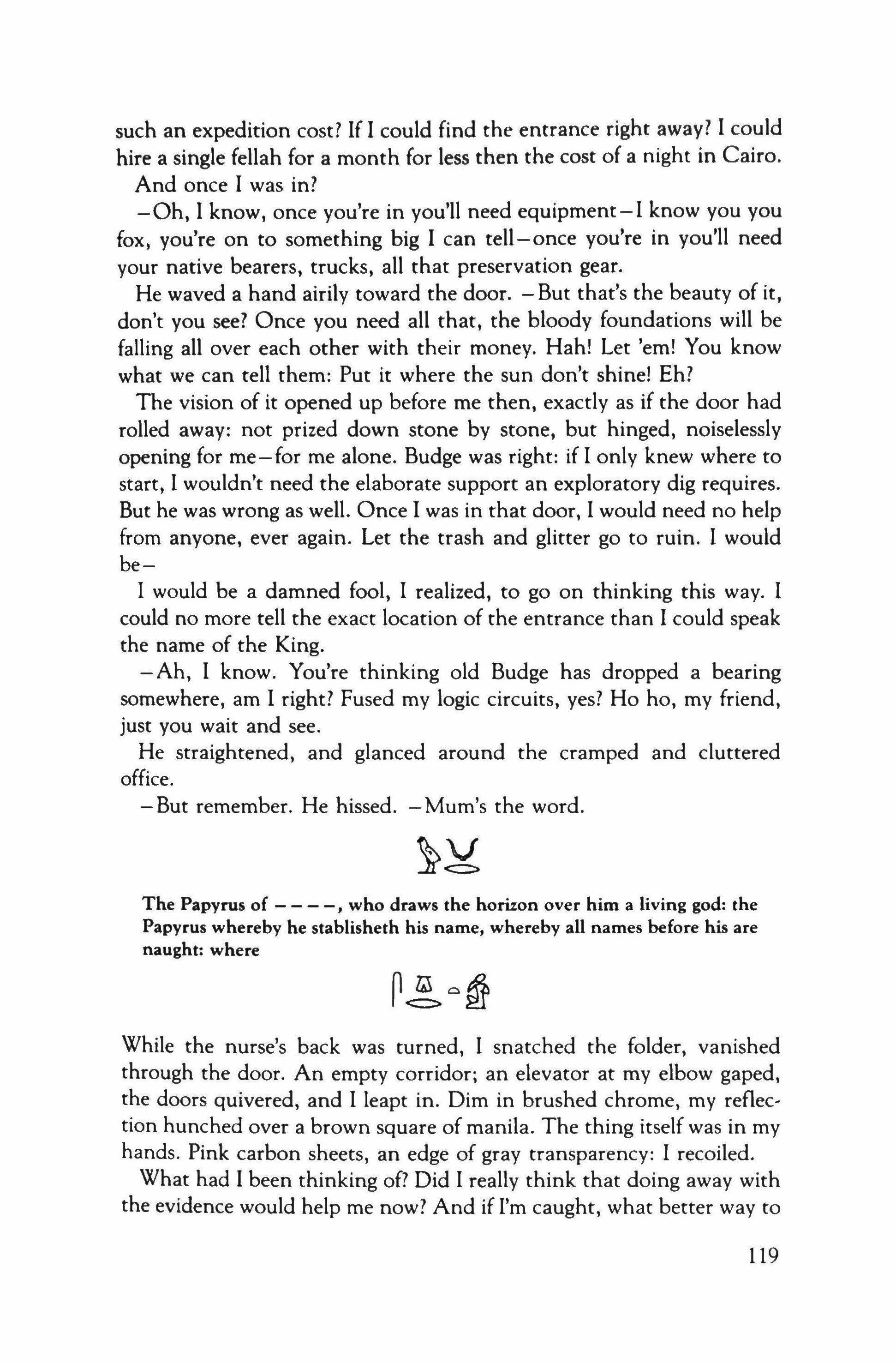
The Papyrus of - --, who draws the horizon over him a living god: the Papyrus whereby he stablisheth his name, whereby all names before his are naught: where
While the nurse's back was turned, I snatched the folder, vanished through the door. An empty corridor; an elevator at my elbow gaped, the doors quivered, and I leapt in. Dim in brushed chrome, my reflection hunched over a brown square of manila. The thing itself was in my hands. Pink carbon sheets, an edge of gray transparency: I recoiled. What had I been thinking of? Did I really think that doing away with the evidence would help me now? And if I'm caught, what better way to
119
make it public - to spread it far beyond my doctor's office (had he returned yet, and found me missing?)? Had he summoned the police?
The elevator stopped; I stepped out, alone in a long hallway. Doors opened on blank corridors, down one hall they all stood open, and in each a small child lay inside a bird-cage, suspended above the floor. At the end I faced a wall of glass, and beyond it cribs and incubators, the dreaming reach of small arms, of feet thrust out falling slowly down.
My anxiety returned. The nurse had discovered the theft; police were seeking me at this moment. I turned, walking quickly, blindly down inconclusive corridors, the envelope clutched at my chest. At a door labeled Necropsy I shied away, clattered down a flight of stairs (the elevators were a trap), and out into bedlam.
Three ambulances crowding the entrance, hatches open and disgorging three clusters of pale green attendants, flash of chrome and white of stretchers, a shocking blot of red. As I watched, my back against the door through which I had emerged, more figures in green converged on each prone blot, until the red was blotted out entirely, and each cluster started moving, like a swarm of bees deciding, of a moment, to fly in my direction.
And in the center of the nearest swarm, pale and deathly still, I saw the face of Budge.
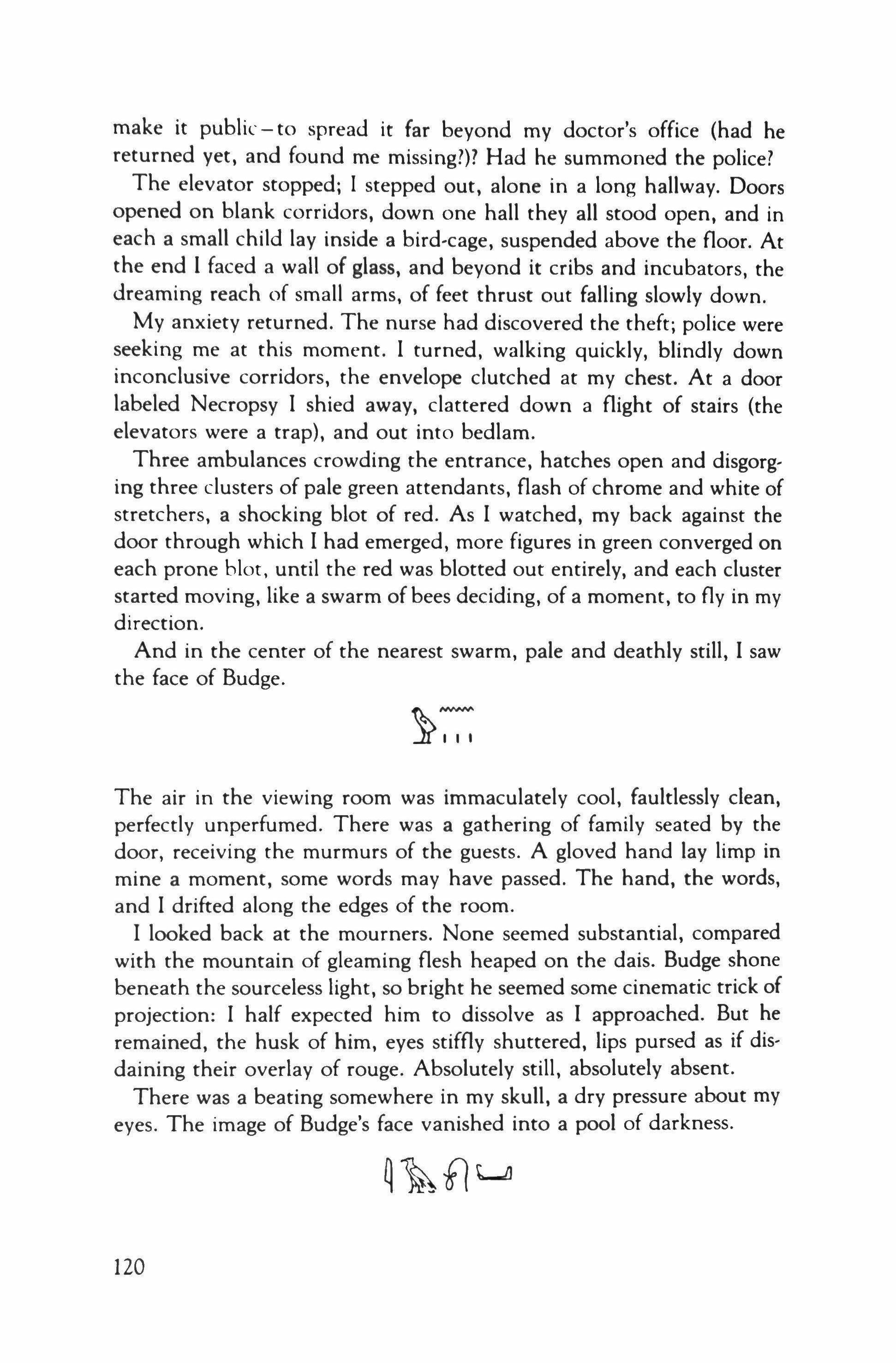
The air in the viewing room was immaculately cool, faultlessly clean, perfectly unperfumed. There was a gathering of family seated by the door, receiving the murmurs of the guests. A gloved hand lay limp in mine a moment, some words may have passed. The hand, the words, and I drifted along the edges of the room.
I looked back at the mourners. None seemed substantial, compared with the mountain of gleaming flesh heaped on the dais. Budge shone beneath the sourceless light, so bright he seemed some cinematic trick of projection: I half expected him to dissolve as I approached. But he remained, the husk of him, eyes stiffly shuttered, lips pursed as if disdaining their overlay of rouge. Absolutely still, absolutely absent.
There was a beating somewhere in my skull, a dry pressure about my eyes. The image of Budge's face vanished into a pool of darkness.
120
I am --, the great one, son of no one, to whom was given his head after it had been cut off. I have knit together my bones; I have made myself whole and sound; I have become young once more; I am - --, Lord of Eternity.
I will do away the evil by the word of my mouth: Obey me, demon of sickness, demon of blood, abomination of the unclean. I possess my own name, mightier than thine. Yea, the secret of my birth I hold in my mouth.
Obey me!
I uttered mine own name and I was born, Khepera-Thoth, the mighty one of words, who rolls his own name before him, lord of divine words, lord of books and master of the speech, possessor of all knowledge human and divine, beyond the setting of the sun and before its rising.
Begone, foul thing of the swamps, unclean thing of spittle and pus! Begone, for my ba is stablished by the word of my mouth, yea, before my mouth it stablished my mouth. Unclean thing of blood and foulness, thy name is nothing.
I awoke in the dark, the bare room around me awash in whispers. I could not see.
I heard the curtains sigh, felt them brushing my face where I lay. I could smell; there had been rain in the night. With a rush of fear I thought it might be morning, light lying all around me blind, and I sat up in the bed, flung my arms out before me. The curtain passed again across my face, and this time I could see its pale folds. Against the dim angles of the walls, beside the darkness of the open closet, I could make out the faint, flurried pulsation of that deeper darkness, still constricted to a moon-sized disc.
What had awakened me?
There had been a voice, speaking close in my ear a single word that took forever to announce.
I imagined it was the voice of Budge, but I knew it was not: no ghosts trouble my sleep. But there is something other than ghosts. Something older, perhaps, of which ghosts are but an echo. I am certain of this, although I know not what it is. I know only that a voice was speaking, close in my ear, a word whose syllables I might almost recall. But what the word, and whence the voice, still I cannot say.
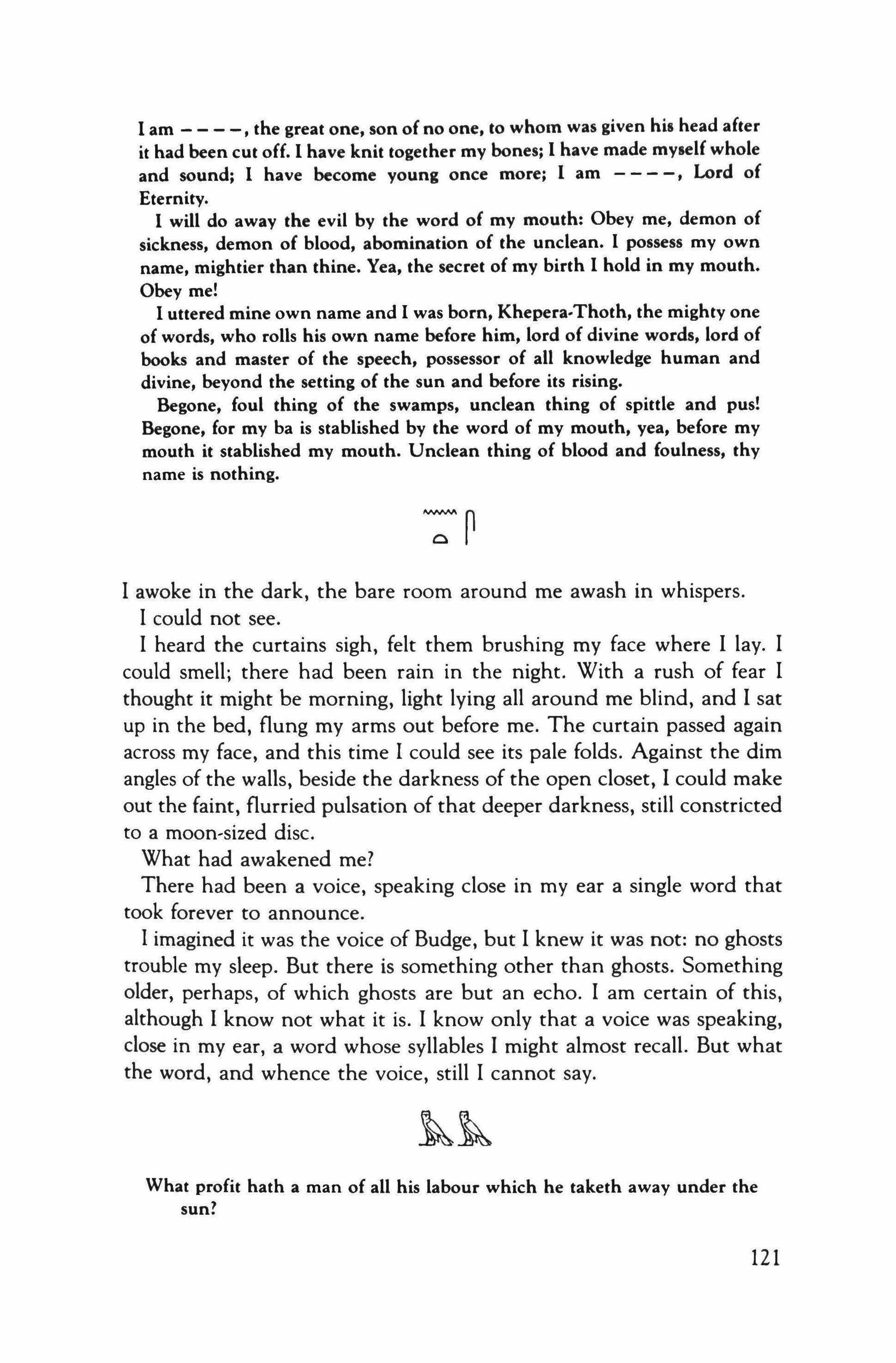
What profit hath a man of all his labour which he taketh away under the sun?
121
One aeneration passeth away, and another cometh: but the earth abideth forever.
All the rivers run into the sea; yet the sea is not full; unto the place from whence the rivers come, thither they return again.
All things are full of labour; man cannot utter it: the eye ill not satisfied with seeing, or the ear filled with hearing.

The voice of the preacher rustled at graveside, withering in the sun that glared down on the thin, dark figures gathered around. In the heat they wavered, shifted as if about to fall. Iris Budge stood nearby; her eldest son, a thinner, taller, pale caricature of Budge, held an umbrella over her head; he had neglected to shelter himself, and in the premature June heat his red hair clung limp to his forehead; a drop of moisture gleamed at the pinched nose: his eyes were slitted in the intense, inward brooding of adolescence. Not Mrs. B.: throughout the service (saving only the moment when she raised her eyes to stare at me) she gazed, a bit vaguely, on the gleaming shell before her. I blocked her behind a disc of black, the better to compose my face.
The small gathering dispersed, threading outward through the maze of stones and obelisks, leaving behind them the unbearably sleek casket. I stopped, and let the few mourners behind me pass. Back at the grave, the casket had vanished into its socket; the vivid yellow of a backhoe shimmered, its single arm gesturing toward the grave. A half-dozen figures remained, looking from the distance like a group of clay figures. The urge to walk back almost got the better of me, but I stood, held by the shreds of civility that linger, even at the graveside. I knew I could not wait, but I could not imagine how to phrase my request. It would sound selfish. But 1 was dying: surely they would-
How long I might have wavered there, shimmering in indecision, I do not know: two figures, a short and a tall, detached themselves and walked toward me.
00 x .ow Vaults quiver, Earth's bones tremble, At seeing - - - - rise as power, Whose mother knows not his name; Who eats her entrails where he had his name, Who eats the elder gods when they come, their bodies full of magic, From the Isle of Flames.
122

I have another memory of Professor -- dead these ten years. He was old when we first met, five years away from retirement, but still hale enough to climb with me on Khufu's pyramid when he took me with him on his annual expedition to the EI Amarna site. My first trip to Egypt was his last; a stroke the month after our return left one side of his body useless, and made his last ten years a shrinking cage of dark and silence, in which he struggled to organize the notes of his last dig.
It was May; graduation was a week away; my thesis was back from the bindery, and I was to be a doctor of philosophy. I had emerged from the library startled to find the sun warm on my head, the air perfumed, and my feet reluctant at the turning of his gate. To spend an hour or two of a day like this indoors in the company of an invalid seemed suddenly odious.
His attendant, an old woman (so I thought-she may have been fifty) who silently dusted his notes without dislodging them, who pushed his wheelchair, and, I suspected, shared his bed, led me to his study. He was shriveled on the sagging vinyl slings of the chair, slumped over to his dead side, examining, under an illuminated magnifier, an ordinary page of print. He had gone almost entirely deaf as well, so I do not know by what means the old woman caused him to turn as we entered. Then she was gone and he was fussing with the switch to turn off the magnifier.
He was embarrassed as I found it for him, and to get past the moment I shouted-I brought you something. I produced a copy of my dissertation. The smile that had tugged painfully at half his face softened, and his good eye wandered.
- Thank you. He whispered, slurring. -I can't read it now, you know.
- You read most of it.
- Yes. But it's done now. It's-He groped for a word, the hand on his lap twitching. -finished.
He sank farther into the chair, air escaping from somewhere. His hand passed vaguely over the chaos on his desk, the typewriter, dust-covered, beside him.
Embarrassed at the implied self-pity, I shouted at him. - But you didn't read all of it.
The eyebrow on the good side rose. I wondered if that had always been a gesture of his, or ifbehind the nerveless face he was trying to raise them both.
9 I
123

-
Before I bound it I added one more chapter. The committee never saw it.
I placed the book on his desk; it slid an inch or two down a slope of index cards, then lay still. -I'll tell you what it says. With his good hand he reached across his potbelly, retrieved his left from where it had fallen. He folded them together and closed his eyes. - Tell me. The voice seemed to come from a distance.
-It's only a theory, really. An appendix to my thesis, with a research program to prove it out: sites to dig, classes of artifact, periods, all that. But the theory's the thing-
I stopped myself from adding - And it will make me famous. I told my suspicions instead, and my voice was shaking as I spoke, quivering with the relief that at last I had called up the courage to tell. I told him of the conviction that had grown in me, over the two years of my dissertation research, through the waste hours when the labor was painful. I told him of my vision of a king, my first, naive conception of the King: a builder perhaps, who rescued his people from a period of chaos, brought the Black Land out of darkness. His people worshiped him, but then something happened. Some tragedy struck: madness, perhaps, the particular curse of kings. Madness, and his benign rule turned to tyranny, his people's awe now underwritten by fear. Perhaps he had closed the temples, as Amenhotep IV would, a millennium later.
He nodded slowly once, without looking up, just before a spasm passed silently over half his face. I stopped, wondering what it meant, unable to guess what emotion might be stirring in a man about to die, alone and in obscurity, listening to a young man outline a program for professional immortality.
-Obviously, I went on, my voice already taking on the tone of the incipient lecturer-there must be more to the story. Apostasy, even in a king, is not enough to drive his survivors to efface all record of his rule: our picture of the Nineteenth Dynasty, after all, is clear enough. He did something, this king, that so outraged or frightened them that they felt even his name to be a menace, not to be suffered to survive. And finally all memory of him, everything he had done, or touched, seen or heardeverything was destroyed. Not an echo of his reign comes down to our time. Only this complete break in the record. But what was it? What dangerous madness could so seduce a king?
I stopped, my mouth dry. His face was carefully neutral. I took a breath, and then I launched out upon the silence.
- What if this king had set out to learn the Word of Power, the word Thoth whispered in the ear of Ptah when between the two of them they
124
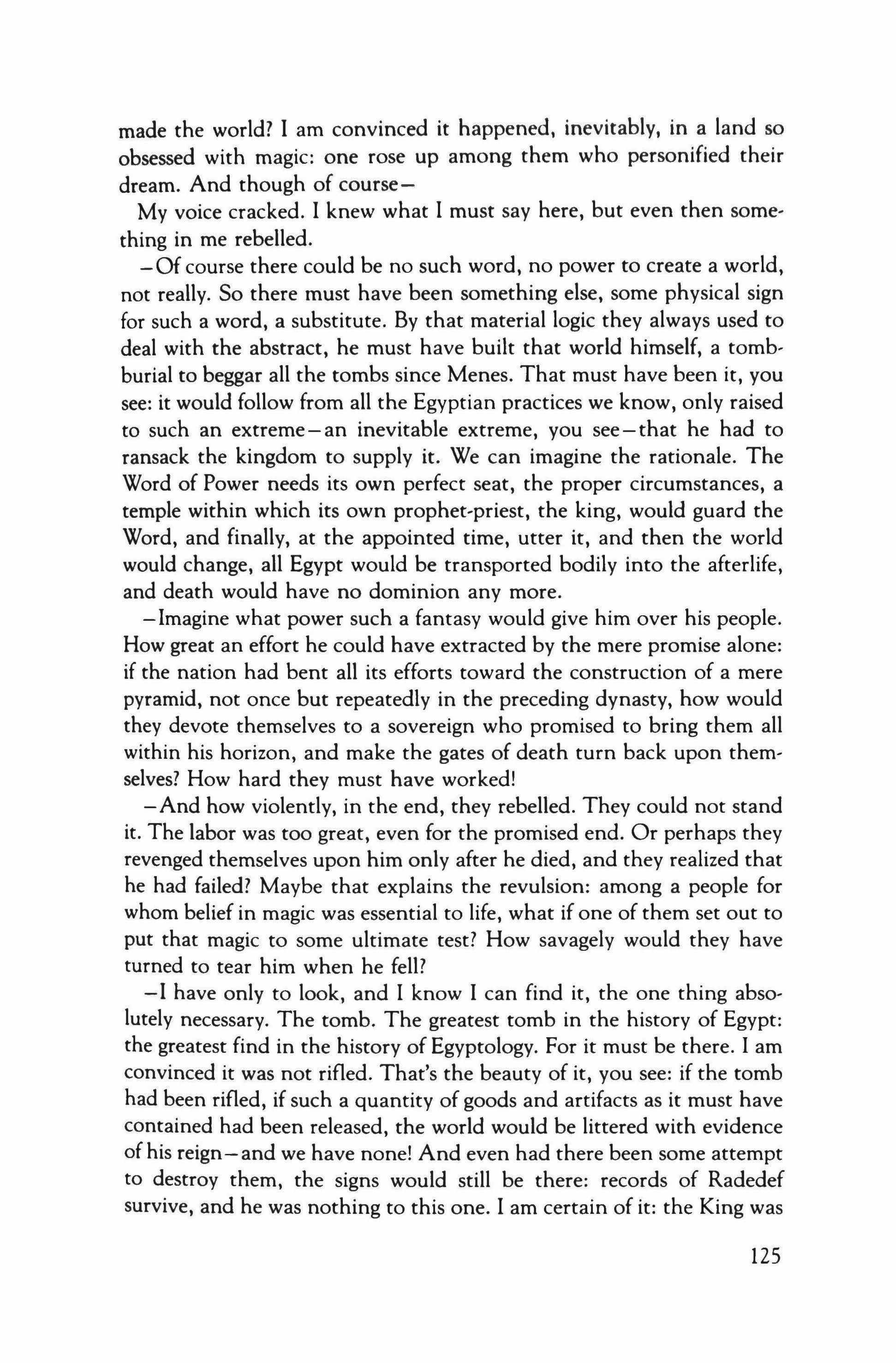
made the world? I am convinced it happened, inevitably, in a land so obsessed with magic: one rose up among them who personified their dream. And though of course-
My voice cracked. I knew what I must say here, but even then something in me rebelled.
-Of course there could be no such word, no power to create a world, not really. So there must have been something else, some physical sign for such a word, a substitute. By that material logic they always used to deal with the abstract, he must have built that world himself, a tombburial to beggar all the tombs since Menes. That must have been it, you see: it would follow from all the Egyptian practices we know, only raised to such an extreme - an inevitable extreme, you see - that he had to ransack the kingdom to supply it. We can imagine the rationale. The Word of Power needs its own perfect seat, the proper circumstances, a temple within which its own prophet-priest, the king, would guard the Word, and finally, at the appointed time, utter it, and then the world would change, all Egypt would be transported bodily into the afterlife, and death would have no dominion any more.
- Imagine what power such a fantasy would give him over his people. How great an effort he could have extracted by the mere promise alone: if the nation had bent all its efforts toward the construction of a mere pyramid, not once but repeatedly in the preceding dynasty, how would they devote themselves to a sovereign who promised to bring them all within his horizon, and make the gates of death turn back upon themselves? How hard they must have worked!
-And how violently, in the end, they rebelled. They could not stand it. The labor was too great, even for the promised end. Or perhaps they revenged themselves upon him only after he died, and they realized that he had failed? Maybe that explains the revulsion: among a people for whom belief in magic was essential to life, what if one of them set out to put that magic to some ultimate test? How savagely would they have turned to tear him when he fell?
-I have only to look, and I know I can find it, the one thing absolutely necessary. The tomb. The greatest tomb in the history of Egypt: the greatest find in the history of Egyptology. For it must be there. I am convinced it was not rifled. That's the beauty of it, you see: if the tomb had been rifled, if such a quantity of goods and artifacts as it must have contained had been released, the world would be littered with evidence of his reign-and we have none! And even had there been some attempt to destroy them, the signs would still be there: records of Radedef survive, and he was nothing to this one. I am certain of it: the King was
125
sealed in his horizon, and they threw away the key. Perhaps they even imprisoned him in it still living. Who knows-
I stopped, finding myself teetering again on the verge of something disastrous, recognizing something in myself trying to make itself heard. I had wanted to go on, to explain where I thought this tomb might be, how best to start the search. But in the midst of that explanation I sensed a desire I had theretofore not known: a desire, almost a conviction, that in that tomb I should find the King himself, still living, and from his lips would hear-everything. The truth about everything Egyptian, about a world lost long before I was born, the truth aboutEven then I did not know just what I hoped to hear.
I held my tongue. Silence, like a thickening of dust. Professor-was still; his hands carefully motionless, his expression inscrutable: I felt myself teetering, a scale waiting to tip with the next weight placed upon the pan. -Imagine evidence, I cried. -Texts, artifacts, everything perfectly preserved, from a crisis early on, at the very heart of the Egyptian social, political, and religious complex. At the origins of our own-
I was shouting, I realized, a foot from the old man's face, as if volume could give substance to my words; shouting into a face that seemed, more and more as I peered into it, too uniformly relaxed.
- He's dead. I whispered, and my voice fell hoarse in a silent room where I had just been shouting. I reached out and laid a hand upon his shoulder. His head lolled, his jaw opened, and a rattling snore escaped.
He recovered, one half of his face blinking and re-wrinkling as he tried to lift both hands to rub his eyes.
-xcuse me. He muttered at last. -m sorry. Sleep again. No reflection, please blieve me.
He settled his glasses on his nose and settled his living hand upon his paunch. - Would you mind terribly much repeating?
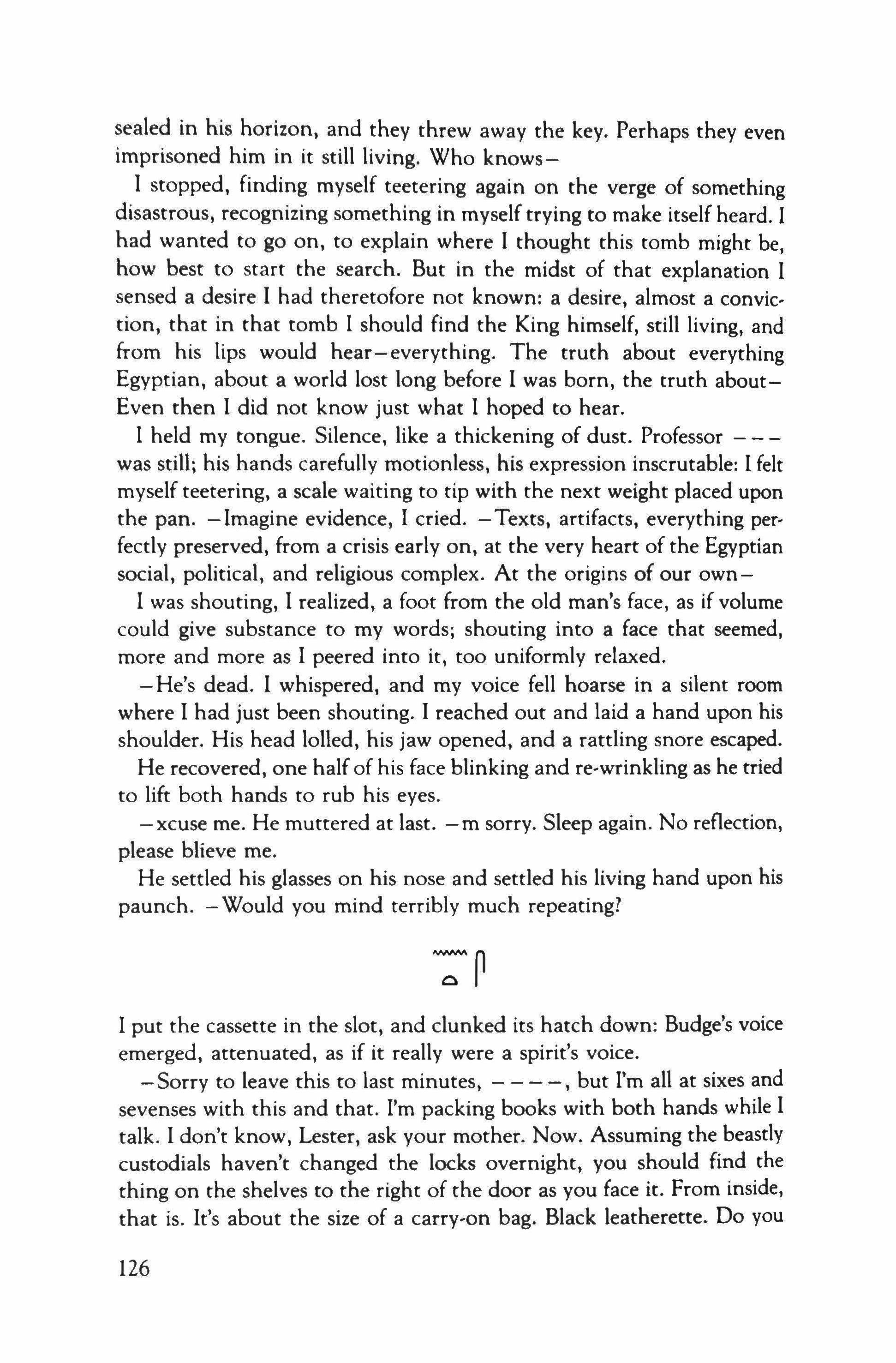
I put the cassette in the slot, and clunked its hatch down: Budge's voice emerged, attenuated, as if it really were a spirit's voice.
- Sorry to leave this to last minutes, - --, but I'm all at sixes and sevenses with this and that. I'm packing books with both hands while I talk. I don't know, Lester, ask your mother. Now. Assuming the beastly custodials haven't changed the locks overnight, you should find the thing on the shelves to the right of the door as you face it. From inside, that is. It's about the size of a carry-on bag. Black leatherette. Do you
126
have it? Careful when you lift it down: it's not terribly fragile but it is heavy, and I don't want you to break your foot. Now.
Now. Budge's voice went on, brightly and (I could tell) well pleased with himself-with his packing, his ingenuity, and more than anything else with his bon voyage gift to me. In his empty office, the familiar clutter had been reduced to bare shelves, a few mounds of equipment catalogs and boxes of bright electronic shards. His voice was almost unbearably real to me, bouncing sharply from the bare walls as I acted out his instructions, levered down the heavy case and thumbed up its hasps, muttered to myself the instructions from the tape. My hands were trembling too much to attach the power-lines to the big dry-cell, and I had to stop, shutting off the tape player with more effort than necessary.
Sitting at the bare table, beside the open case, for a long time I could not catch my breath. I was near to crying. Not for Budge: do not mistake me, it was none of that. A wordless despair had seized me, and was long minutes vanishing back into whatever pit it had crept out of. I had started to believe in Budge's absurd promise.
When I could take a breath without its catching, I eased down the button on the recorder, and turned again to my inheritance. At his direction I flipped three switches, waited for the screen to light and settle, a flickering void, then set two dials at his instructions.
The screen shuddered.
I was looking at a luminous floor plan of the lobby, six stories down: there was the ugly aluminum sculpture, there the three broad granite steps up from the entrance, the inscribed marble benches, the men's and ladies' with their pipes and porcelain off on either side. At my ear, Budge was explaining how it worked, but I couldn't hear: my eyes were full, and my heart was beating loudly. At the center of the screen, a darkness beat as well.

There were small rites to perform. I carried my files-on the King, on myself-out into the backyard. There was a barbecue pit there, relic of an earlier tenant.
I had thought so much tinder would flare in an instant, flash and vanish, but the burning was slow: one page at a time caught at the corners, the blue flame flickering as it read over, consumed, and curled each up to reveal the next: I saw a story roll up like the sky, blacken to ashes before my eyes. This was on Wednesday.
On Thursday I drove to the school where I took my doctor's degree.
127
My thesis was shelved among a thousand like it in the doctoral papyrus dump. As I pulled it from the shelf and felt again its ungainly mass, like no other book in the world, in the solitude of the library I felt as if my adult life had been a dream: here I was carrying my new dissertation into the library, about to walk to Professor - - - 's.
The circulation clerk took my name and address, and accepted my alien faculty l.D. I hoped urgently she would not notice that the names on the card and the book were the same. As she opened my thesis to stamp the date due, she spoke.
- You're the first one to check this out in twenty years.
-Someone else checked it out?
-Sure. See? She showed me the dim, purple date, 6/15/ -, two weeks after I had received my degree.
-Who?
A laugh. - Twenty years ago? I wasn't even born.
I stood facing the house that had been Professor - - - 's. The housekeeper-nurse had inherited, I remembered. Was she still there? I had never learned her name. In the bowels of the house, a bell rang; footsteps approached; the door swung back. An ordinary woman, far too young, holding a wide-eyed infant.
And one other thing: as I drove out of town, over the bridge where the breath of the sea blew in through the window, over the rail I heaved the black flapping shape of my thesis. It dropped from sight, and I could only imagine the splash.
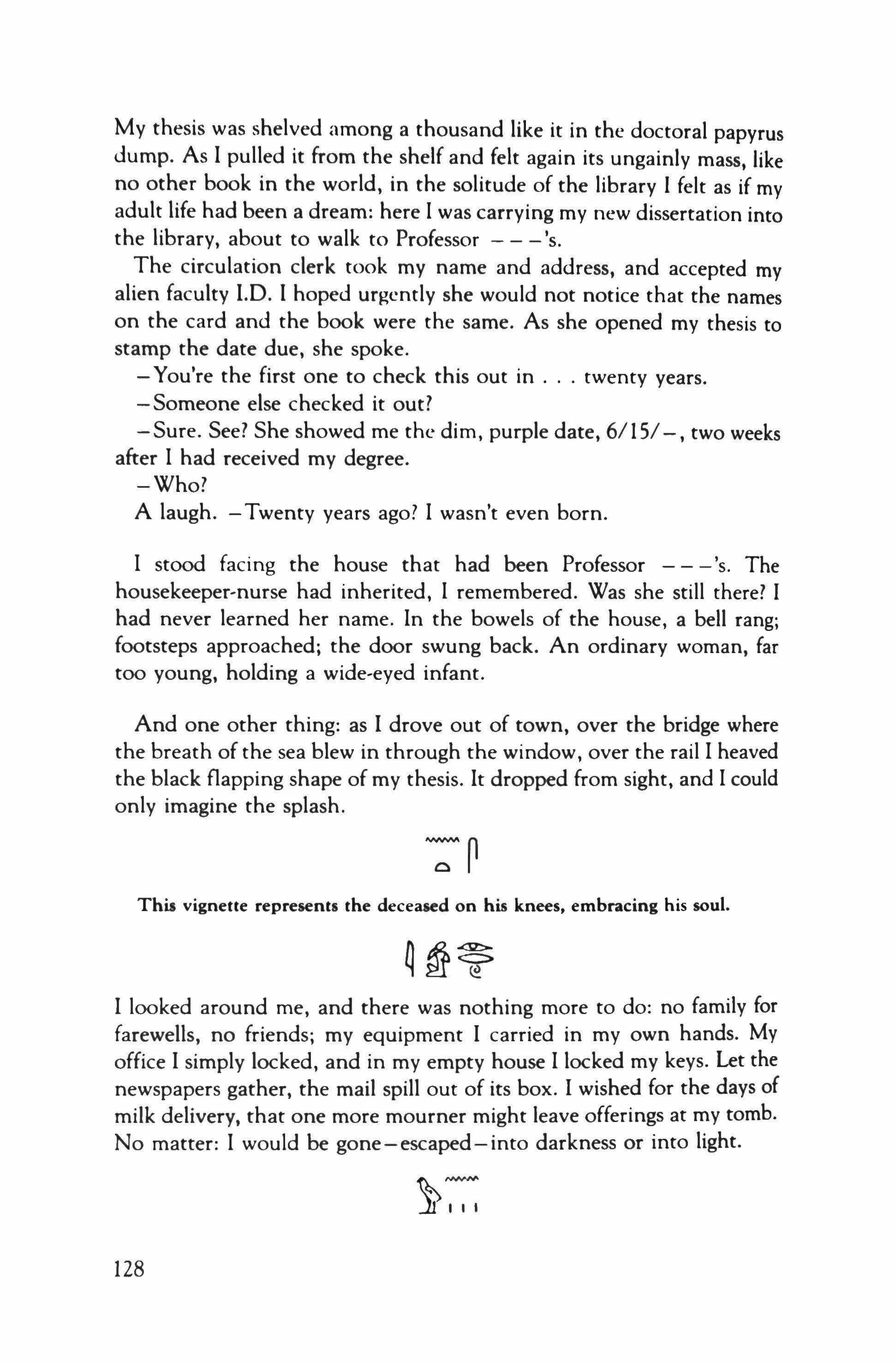
This vignette represents the deceased on his knees, embracing his soul.
I looked around me, and there was nothing more to do: no family for farewells, no friends; my equipment I carried in my own hands. My office I simply locked, and in my empty house I locked my keys. Let the newspapers gather, the mail spill out of its box. I wished for the days of milk delivery, that one more mourner might leave offerings at my tomb. No matter: I would be gone-escaped-into darkness or into light.
128
Out of the ashes is the soul reborn in the twelfth hour of the Duat. He enters the tail of the mighty serpent, which is named Divine Life, and inues from its mouth in the form of the scarab Khepera, who rolls his own egg of spittle and mud. But the last door of all is guarded bv Isis, wife of Osiris, and Nepthvs, wife of Set, and they also are in the form of serpents; their mouths are open, their tails twine together, their fangs drip venom as the soul of the deceased approaches.
Now Urnes, the river of Duat, flows into the primeval
I awoke once, en route, in the never-never-time of the Atlantic: over the wing the sun was rising, throwing purple shadows miles across the clouds. The cabin was quiet but for the vibration of the engines, the rushing of wind, the intermittent snore of my two-hundred-some companions. I thought I saw a small beetle, gold and iridescent blue, emerge from the carpeting at my feet. It raised its wing-covers, and flew a yard or two down the aisle before disappearing into the center of my vision.
A voice rose and subsided, murmured, surged and submerged again, out of and into the eastward urging of the engines: unun neb-t shet-t unun maa-t; unun neb-t shet-t; unun neb-t upsh; neh-ti neheh; unun neb-t upsh, upsh, upsh, upshhhhhhh.

At Cairo airport, I had nothing to declare.
The long duration of an afternoon that should have been night I kept to my room, the curtains drawn against the glare. My window faced west, and as the afternoon wore thin and finally unraveled, the curtains caught cold fire; the window was a blaze of gauzy orange, reddening. In the midst of the glow, a black circle pulsing. Outside, in the heat and light, cars gathered, bleating. I lay and watched the pulsating void, listened to the thread of beeps and baas, and in the distance, on a wire stretched somewhere in the recesses of my skull, a thin voice was chanting.
The room was red and dim around me, and the voice had somehow escaped into the evening, where it ululated across the roof of Cairo: evening prayer. I stumbled from the bed and threw the curtains open. Beyond the new city the Nile shimmered around Rawdah. Beyond lay AI [izah, where I told myself I could see the buildings of the University,
129
where Professor - - - and I had stayed the first evening of my first trip into Egypt. And beyond Al jizah, black against the blue-green-gold of the horizon, the Pyramids.
I could not see the Sphinx, but I knew where it lay, could conjure up the blind face of Khafre staring back at me. Blind, and crumbling, and slumping back into the sand.
I drew the curtain across the glass: for a moment my face, pale, gleamed back at me, one arm reaching out from the darkness. I could not read the expression I saw there.
The riddle of the Sphinx-the real riddle, the real Sphinx-is that we do not know the question.
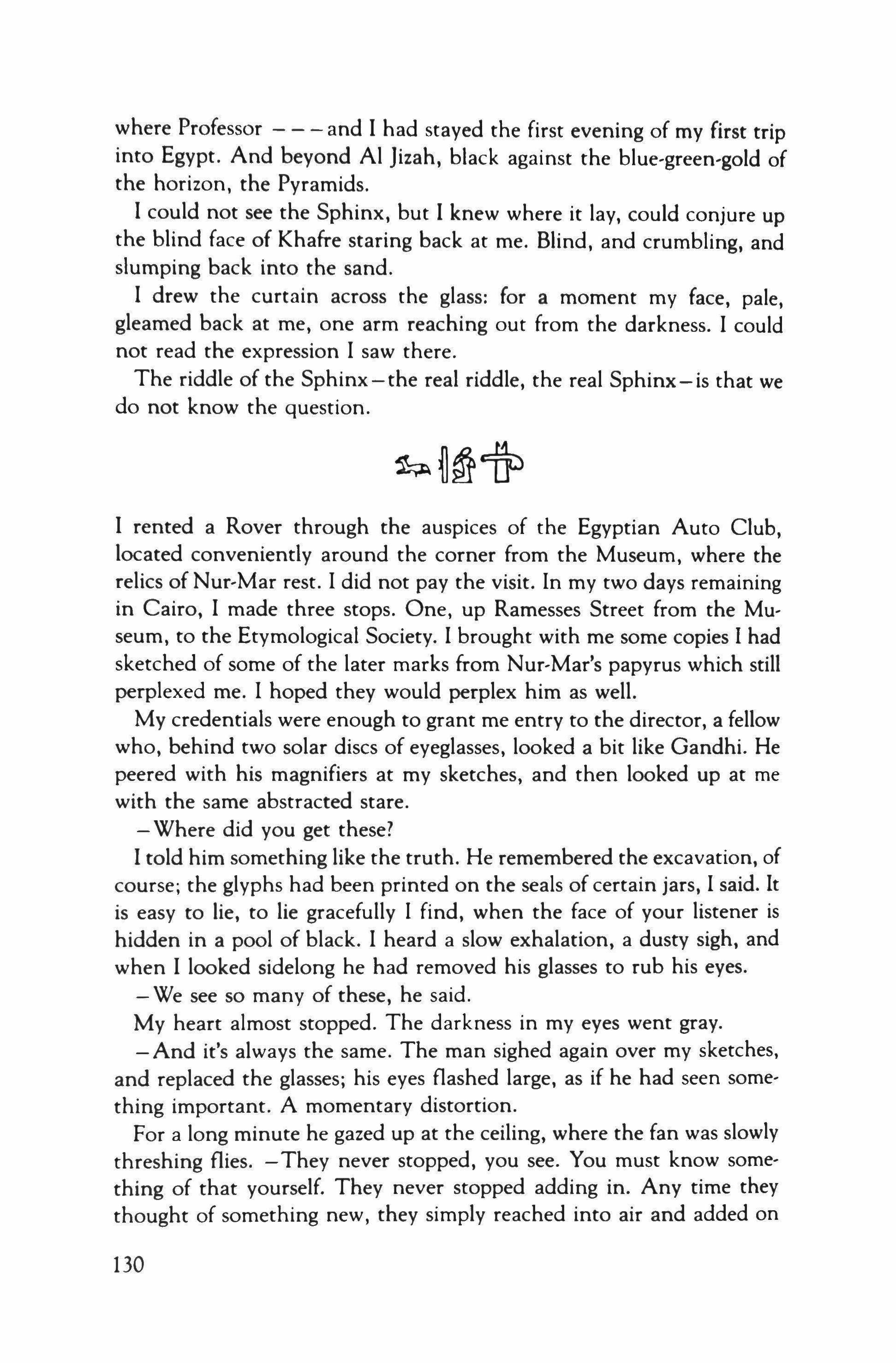
I rented a Rover through the auspices of the Egyptian Auto Club, located conveniently around the corner from the Museum, where the relics of Nur-Mar rest. I did not pay the visit. In my two days remaining in Cairo, I made three stops. One, up Ramesses Street from the Museum, to the Etymological Society. I brought with me some copies I had sketched of some of the later marks from Nut-Mar's papyrus which still perplexed me. I hoped they would perplex him as well.
My credentials were enough to grant me entry to the director, a fellow who, behind two solar discs of eyeglasses, looked a bit like Gandhi. He peered with his magnifiers at my sketches, and then looked up at me with the same abstracted stare.
- Where did you get these?
I told him something like the truth. He remembered the excavation, of course; the glyphs had been printed on the seals of certain jars, I said. It is easy to lie, to lie gracefully I find, when the face of your listener is hidden in a pool of black. I heard a slow exhalation, a dusty sigh, and when I looked sidelong he had removed his glasses to rub his eyes.
- We see so many of these, he said.
My heart almost stopped. The darkness in my eyes went gray.
-And it's always the same. The man sighed again over my sketches, and replaced the glasses; his eyes flashed large, as if he had seen something important. A momentary distortion.
For a long minute he gazed up at the ceiling, where the fan was slowly threshing flies. -They never stopped, you see. You must know something of that yourself. They never stopped adding in. Any time they thought of something new, they simply reached into air and added on
130
another glyph. It's worse than chaos, he sighed. - It's infinity. It comes to the same thing in the end, doesn't it?
He slumped, if possible, further in the dim brown heat, the rumples on his suit creasing through his face. - Did you know? I was trained as a chemist. For one year at university, before Nasser. Then the revolution came, and my family left, and I could study anything I wanted. We were all nationalists then, you knowvery much so. And I decided that our heritage, our glorious gift to the human race, would be the more fitting study. But today - He pushed the scrap of paper back toward me. - Today I feel nostalgic for the benzene ring. You know the ring? A snake that bites its tail. That is perfection - none of this ringing in of signs from here and there and tomorrow: just carbon and hydrogen making geometry together.
-No. I am sorry, Doctor - - - -: I cannot help you. I hope it was not important.
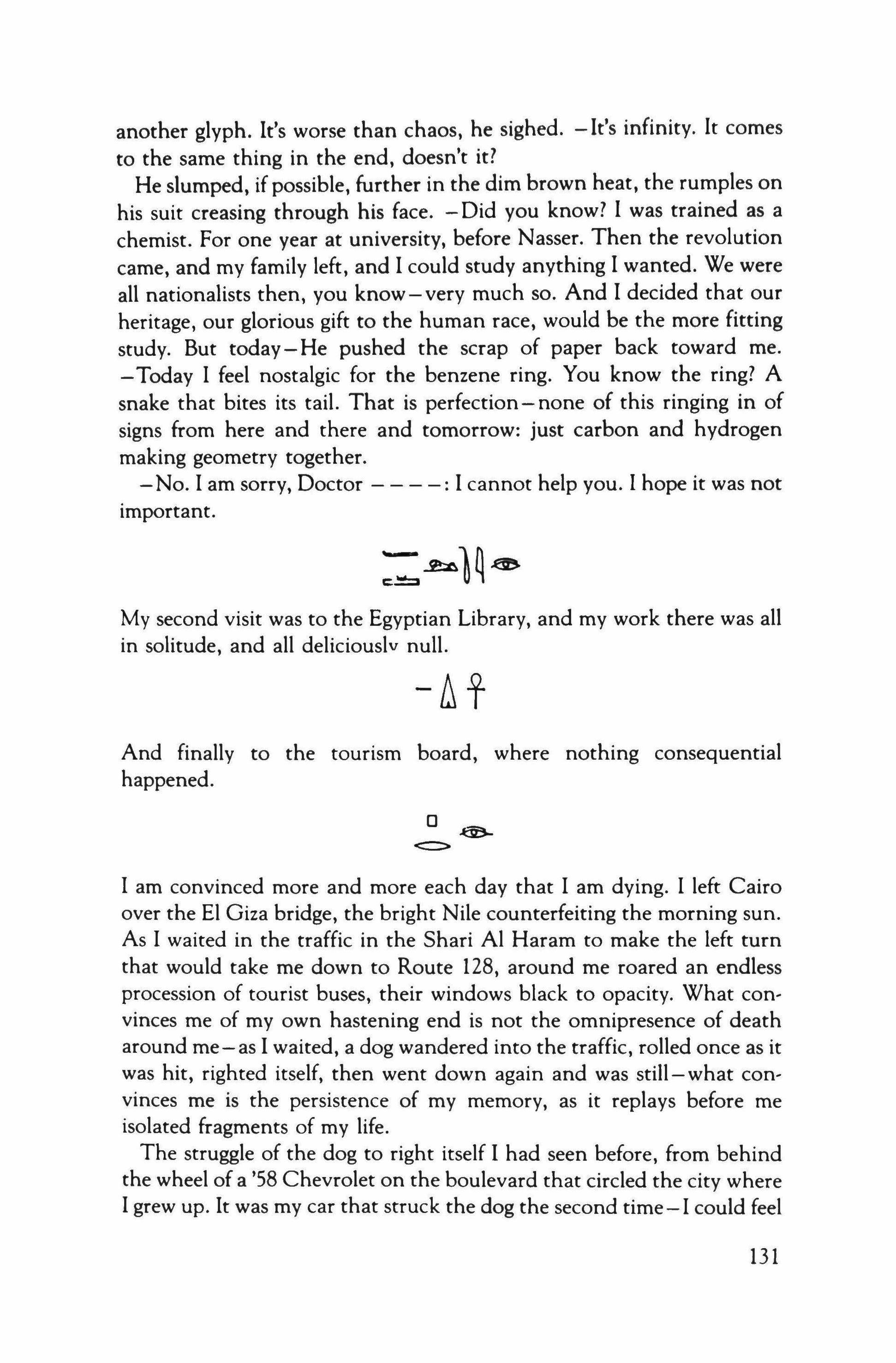
My second visit was to the Egyptian Library, and my work there was all in solitude, and all deliciouslv null. And finally to the tourism board, where nothing consequential happened.
I am convinced more and more each day that I am dying. I left Cairo over the EI Giza bridge, the bright Nile counterfeiting the morning sun. As I waited in the traffic in the Shari Al Haram to make the left turn that would take me down to Route 128, around me roared an endless procession of tourist buses, their windows black to opacity. What convinces me of my own hastening end is not the omnipresence of death around me-as I waited, a dog wandered into the traffic, rolled once as it was hit, righted itself, then went down again and was still-what convinces me is the persistence of my memory, as it replays before me isolated fragments of my life.
The struggle of the dog to right itself I had seen before, from behind the wheel of a '58 Chevrolet on the boulevard that circled the city where I grew up. It was my car that struck the dog the second time-I could feel
131
the thump of something solid beneath my feet, a brief rumbling roll, and then the motionless shape receding in the rearview mirror. I had refused to drive for a week after that, and my foster parents, angry-self-doubt they could never tolerate, I think because it confirmed their own uncertainty about me- threatened to revoke my driving privileges. And that dog-those dogs, the one warm beneath the Egyptian sun, the other still receding in the mirror- those dogs coalesce into a third, the one another set of parents had given me the week of my arrival in their home. I was twelve, I think, and alone in the house when a strange car stopped at the door, a woman handed me the collar with an aggrieved- She ran out so fast.
The problem of digging a hole: twice I laid her in it, and twice I had to lift her out again and dig it deeper.
Within a year I was watching the since-familiar backhoe perform its obsequies over an equally parching soil, the thin blue of its exhaust seeming the smoke of some small incineration as it backed the dust over that set of foster-parents. Their car had been pinned beneath a bus. And in every case-I am omitting others-what struck me most was an emptiness in the visible world, a quality of light like the echo in an empty house, in every scene once inhabited by theWhat convinces me that I am dying is the way I maunder on, about dead pets, and foster parents, and myself. It is as if I have grown oldand I am not yet fifty. But these memories will not abate-they quicken, as if some part of myself hastens to become empty.

Come then, Thoth, provided with charm, untie the bandages, twice, which fetter my mouth. I am Khepera who produced himself upon the let of his mother. Behold I collect the charm from the one with whom it is, quicker than greyhounds, fleeter than light. Behold, thou collectest the charm from the one with whom it abides, quicker than greyhounds, swifter than light, making forms of existence from the thigh of thy mother, creating the gods from silence, giving the mother-heat to the gods. Behold, this charm is given me from where it is, quicker than greyhounds, fleeter than light; or fleeter than a shadow.
I have called it a tomb. More and more I doubt that is the proper term for the structure I seek. But I am yet baffled by what to call it: his retreat? his sanctuary? his redoubt? My horizon, the Nur-Mar Papyrus calls it, as it tallies the expense, the laborers and their rations, the sleds
132

of stone removed, the blocks brought in. My horizon: so all the kings, from the Third Dynasty on, referred to the tombs they prepared; here was the gate through which they would pass, like the sun at evening, into the land of the night. And like the sun, the term implied, the king would rise again.
Aahku-t--, the papyrus calls it: the horizon of the nameless one; Aakhu-t heh, the eternal horizon, the tomb; Aakhu-t sheta-t. shet-t metcha: the secret horizon where the writing is read, as near as I can translate it: a word has been struck from the end of the phrase, and the last word could also be the word for a cutting tool, the verb "to destroy," the name of a god, or an edict, decree, liturgy, book, writing, letter. And late in the papyrus, a new sign inserts itself into the sequence: "navel-of-theworld," might be one reading; "bottomless pit," another; but an alternative reading, not entirely to be dismissed, is "noisome and trackless swamp." In the last occurrence, the phrase seems to have become nonsense: I cannot interpret the glyphs, read them frontward or backward as I might.
Whatever he called it, for whatever purpose, it is clear that he intended to enter it, and I find no indication that he was going to wait to die before he did. His redoubt. I have come to call it, for it seemed that, in the final period of his reign, he felt pressed: the size of the work crew doubles, then doubles again. In the last year of its construction, perhaps forty thousand laborers were working on the site; all, it seems, slaves from the south, from a country I have never heard of, and perhaps never existed: the name given in the papyrus is the word for "mute," a class of servant employed in sensitive tasks, for which they qualified by having undergone linguectomy. In these passages, the handwriting hastens, slurs to hieratic, and the tale of construction stresses the speed urged on the crews. The work goes on - indeed its pace increases, and the quantities of stone shifted, the provisions and furnishings crafted and stored, assume such quantities that one cannot but doubt that the hyperbole typical of such accounts is at work: if the blocks involved are even a tenth the size of those from which the Pyramids were built, the manuscript describes a quarry here large enough to produce a mountain range of Pyramids.
Then-curiously-the work of the construction, the physical details of it, disappear from the text, as if the decree of silence has caused the laborers to vanish. Perhaps the work was finished. There is no telling. The narrative breaks off with the phrase, "And then I caused -" I caused: ta un; or the phrase may be ta hep, to hide, or ta hems, to dwell, to make inhabited. I caused, I had, I made habitable my horizon, my
133
secret horizon of the cutting tool; I sank into the noisome and trackless swamp. A rebus that re-forms itself upon each reading; it is a translator's nightmare.

I don't know to what use Budge intended to put his device, but for me it was an answer out of a dream, removing every obstacle between me and my goal. With it mounted beside me in the Rover I drove out into the desert, the screen flickering, distracting me from my road with glimpses of shapes moving beneath the ground-large, vague masses of rock sliding beneath rock. And as I left populated roads, then roads entirely behind me, I knew that I had entered into a new epoch in Egyptology.
Three days I drove the upper reaches of the Valley and beyond, three days of wild shocks that I still feel echoing in my bones, of sun that blinded me, and sand that filled my mouth with the unremembered taste of my youth, the taste of Egypt, and I drove on. The whisper in my ear was urgent behind me; I drove on into the darkness that formed always ahead and always out of reach. On the second day, I bit my tongue clear through, spit the tip of it into the wind and drove on, mouth filling with salt and the sharp taste of pain.
A dozen, two dozen, half a hundred undiscovered tombs flickered on the screen as I rode over them with my wheels: small tombs, large tombs, tombs plain and elaborate of form, but nothing answered the size, the majesty, the ineffable difference that I would know in the one I sought.
On the evening of the third day, after the shadow of the Horn had climbed the eastern sky, half-maddened by three days' search, I found it.
The image was vague, as if lying at a great depth, or in a stratum of rock less lucid than the rest. But it could be nothing other than the tomb of him I sought: vast, it seemed a map of a world unrolled beneath me, bafflingly intricate, tantalizingly obscure.
So much I saw on first glance, and came near to flipping the Rover as I applied the brakes: I turned a full circle in the sand before stopping, one wheel slightly bent by a boulder. But the Rover still drove, and I restarted, moving slowly by headlight up and down the slope, from the base of the jagged cliff behind me, to the rim where the plain fell steeply toward the Nile, trying to assemble a clearer map of the subsurface.
No clearer, except at
134
I have made my way. I know thee and I know thy name.
Thy name is - --, the unsounded, Who setteth in order the words of my heart, Yea, who spake my own name, Who seeth into my heart.
No things are unseen to the one who is unseen; No names are unknown to the one whose name is nought. I know thee and I know thy name.
Thy name is ----,
Thy name is Ami-seshet; Thanassa-Thanassa is thy name.
Thy name is Arethikasathaka; Nepthysysiseremhesihrahaputchetef is thy

- I am a shepherd, sah.
- But you have no sheep. My tongue, thick and bleeding, would barely form the words.
- This is true, sah. They are in the hills.
He waved a robed arm off to the darkened west, where I had thought only the Libyan desert lay. - With my son. I have come into the Valley for work.
I nodded and said nothing. At the word "work," he had tried to catch my eyes: his were black pits, unfathomable beneath a ragged burnoose. In the white glare of the lantern, his face was half extinguished. The silence between us stretched, until I made an unnecessary adjustment to the lantern, which gave a popping noise and went out.
- That is better, sah.
The bedouin leaned back, and sighed as if he had made himself more comfortable against the rock. Again the silence returned, and with it my fear. Watching him settle, I realized I had held the same half-crouch since his arrival; my pen still poised over my journal notebook where I had been jotting-creature of habit-notes about the site. I folded the notebook, and snapped it in my shirt-pocket. I don't know what became of the pen.
The man's eyes followed my every move, two gleams shifting in two black pits. I wanted to keep him talking. Why, I didn't know, only that it calmed me to hear him speak, and everything I learned about him helped me to believe he meant no harm. Under the sun, with the tourist buses winding through the gullies below, he would have seemed nothing
135

more than an Arab shepherd. Now, the boundaries of the known had shrunk to the sphere of a Coleman lantern's light - and now even that had collapsed upon itself, leaving me outside. In the dark he became by turns a thief, a terrorist, a ghost, a djinn, and then things for which I had no name.
- How long have you been a shepherd then?
The question sounded foolish to me-incongruous with the time and place. Of course he had been a shepherd as long as he could remember, and his father before him, and so on. But to my surprise he answered eagerly.
- Ah. You see very well. I was not always a shepherd. I was son of ahow is it? - holy man, yes? A mullah, you understand? Not one of these ignorant dervishes that come from the east, no, or a bedouin madman with visions of the Prophet, none of these. He was an educated man. Was his mistake.
The robed arm swept off to the north, the sleeve breathing a dry odor of sheep. - We lived in a modern house in the city. Electric lights. Water in pipes. There was a clock to tell the time for prayers, it knew the phases of the moon. The muezzin had a microphone. All of these things, and my family as well. My brothers and sisters. Only one mother.
He picked up a handful of sand, and let it run between his fingers. The night-breeze drew it out in a curtain, gauzy under the light of the stars. -My brothers, I do not know what became of them. My sisters and myselfthey put into the street. My mother-A long sigh escaped him, as if his robes were leaking. -She was a whore, you see. My father himself he cut off her head in the street. They took him away: it was not the modern thing to do. It did not matter. She was a whore, and we were children of the whore, and so our father did not own us. No man of our congregation would help us. And the women
The face was a black shape behind the burnoose, a veiled motion, sweeping back and forth, back and forth. The day had been long: the voice and the swaying motion drew me down to sleep. I roused myself.
- What did you do?
- Do? The face turned up, and in the light from the sky I could see the eyes again: black pits, filmed with light. - Do? I did nothing. When a shepherd came into the city he took me back with him.
A loud spitting, a rasp of foot on shale.
-I became a shepherd. I learned a new life. I learned many things in the hills. Where the springs are. How to find the oases. And the quicksands. The season of the ewe, and the time of her bearing. I took a wife. She is no whore. But now-
136

The figure leaned over, the eyes plain now in the dark face, a yard from my own. In my ear a voice was wailing.
- Now the lambs have come, and there is nothing to do. I come down to the Valley to find work. And I find you.
- What work do you do?
-I dig.
-Dig?
- Yes, dig, dig! Shovel and pick, or little things. Trenches this way and that. I have been a digger before. I have found many things. Valuable things. And nothing have I stolen. I have helped many digs to find.
- To find?
- What they find.
The figure drew back again, withdrew into his robes and a silence that enveloped him, seemed to draw us both into a circle cut off from the world. 1 looked up to reassure myself that the sky was still there: the roof of the world was hung with lamps; they shivered in the cooling night.
- What makes you think I'm here to find anything?
He spat again, but did not move.
- What do you think I'm here to find?
The figure leaned forward.
-I know you. I know your name.
1 drew back as if from a snake.
- Your name is - --, you come from - - -in United States. You are a professor-doctor. 1 worked for you, two years ago, down there.
The arm pointed now, a short straight thrust into the Valley of the Kings. - You found a tomb. There was a man in it. 1 was there when you-
- When 1 what?
The face was inches from mine. - When you took the bottle. You put it there.
The finger jabbed at my breastbone.
- You put it there, and went away, exactly like a thief. And now you are here.
-Here? My voice was weak.
- Was it a map? His voice was low, murmuring, a thick haze.
-Yes.
-Of this place?
-Yes.
He mumbled something 1 could not catch.
- What? What about this place?
Teeth flashed, a finger held over them. -Shh. Shh. Shhhhhh.
137

-Sah. Breakfast is ready.
He had taken my powdered eggs, my Primus stove, and fixed for us a yellow mess that steamed, smelling of curry, from the plate he held under my nose.
-Sah. Come eat. We must work now before the sun.
I sat up tangled in my sleeping bag, trying to break free from it. Something else clung to me-a dream, a voice that murmured from the earth. Soft touches lingered about my skin.
There was light low in the east, hardening the Nile out of night. Beyond the river a suggestion of low, rugged hills.
Before the sun, he had said. Surely he could not think we would knock off work at noon? I had before me, with or without his help, weeks of bitter labor, and I would have put it off if I could. But having started I would finish it as quickly as strength would allow. I could not imagine an afternoon idling beside a pit half-dug and pointing so suggestively down.
The rumbling of his voice rose behind me, a low drone like the one that had zoomed through my sleep in the night. What had I dreamed? I turned and saw him prostrate and cowled, his sandals beside him where he knelt face-down on a rug, the soles of his feet pink in the dawn, his arms stretched out to the east.
Orange light flooded the sand and rocks, brightening to white, and when I turned the eastern hills were lost in glare. Halfway down the slope, in a pool of shadow in a natural hollow in the scree, I saw a pit. Beside it rubble was strewn down the slope, hurled as if a monstrous dog had dug there, dug all night in the frenzy of a scent, a scent that I too smelled now, on the hot breaths of dawn: dust, spice, bitumen and natron, the mummy of a god.
I shook my head. Foolishness, put there by this man's chanting.
But this hole: what was I to make of this hole? For it was a hole, not a pit or trench or any of the ordinary excavations. It was a passageway, leading down. Too big, too wide, too deep for anyone man's one night's work. The shepherd's voice droned through my thoughts, distracting. Had he hypnotized me then? Had I slept weeks away? Surely I must be suggestible to anything by now.
I looked to the shepherd, who had risen from his rug, rolled it, and was now absorbed in picking pieces of egg from his beard. Haunted by the feeling of a void hovering somewhere in my memory-days taken out of my life-I walked with him to inspect his work.
Its interior was dark, a meter high perhaps-high enough to crouch in if one bent almost double; it slanted down some fifteen meters or more,
138

seeming to end in a flat, featureless mass. How had he done it? I ached to ask, but caution kept me still: if I asked, he might disappear, this fabulous passage might close, and I would awake on a barren hillside, weeks of heartbreaking labor still before me. The man crouched at my shoulder, his breath audible in my ear.
- Have you a torch, sah?
I had indeed: a six-cell indestructible pharos, bought expressly to illuminate the endless corridors of the King. By its light, the shepherd let me lead him down.
Scree tumbled beneath my feet, a cascade of stones preceding me down the tunnel. I heard them strike and lie still. In the passage, sound was magnified, my breath coming fast, panting thickly. Behind me, the shepherd padded noiselessly down, dislodging not a pebble. The light bounced from a hoard of stones, the rubble piled in by the workmen to hide their work. The light showed us the tunnel's end, a smooth, seamless face of stone.
In any other tomb, the lack of carving on the door would have sunk my spirits, made me think of turning away from one too obscure to repay the cost of opening. Here, the blankness set off a pounding in my ears, a lightness in my chest, a voice hinting: here is a secret announcing itself.
-Sah. There is no door.
He was right. Blankness was very well, but this stone seemed a solid mass. I searched the edges of the tunnel, and found no crack: we might be at bedrock.
-Could we widen the excavation?
My voice was a hoarse whisper, too loud against the rock.
-Sah. There is no door. You should turn back.
He clutched my hand, pulling me up. -Go home, sah. There is no passage for you here.
His hands were plucking at my fingers, at my clothes. I pushed him back.
-I have no home, you filthy Arab.
Silence seeped like bad air down the hole, filling the space between us.
-Sah.
He was breathing heavily. His eyes were pits again. - There is something.
He brushed past me in the narrow way without touching, and I heard rock scrape rock. He passed behind me again.
139
- There, sah. His eyes did not turn up. -Perhaps that is what you wish.
The beam of my flashlight lit on a hemisphere of polished rock projecting from the blank surface. I fell on it, my hands curved around its cool, smooth surface. In a backward glance I saw the Arab's eyes grow wide, and then he was gone, the world was black and I was falling, a wind whispering fear in my groin.
I fell long enough to consider these: the hemisphere's swift motion at my touch; the answering motion of the rock beneath me; a momentary glimpse of the opening chute; that the Arab's mouth had opened too; that this was absurd.
Then the darkness imploded.

Let the abomination speak not my name in Neter-kert:
Let the abomination touch not my loins, nor hold my heart.
Let the abomination know not the breath of my lungs, nor the tears of my eyes.
Let the abomination touch not the nails of my hands, nor the nails of my feet, nor my hair.
Let the abomination take not my excrement.
Let the abomination take not the spittle of my tongue in the Duat, nor the spittle of my member.
For my place is my own, my name and my body are my own, and all things pertaining to it are my own in the Duat,
For I am Khepera, the self-created, the speaker of my name.
The abomination can have no power over me in the Duat, for mine are the words of power.
The abomination perishes at the speaking of my name:
The abomination perishes not, nor ever was, in the Duat or on earth, or in the heaven of the gods, or in my shadow.
I clutched something to my chest, unsure what it was, knowing only that, with nothing else to hold, this must be worth holding. My head ached, and the darkness around me whirled and whistled until I thought the floor had given way again. I lay amid sandy rubble; the object I held was the flashlight, broken or switched off in the first convulsion of my fall. I sat up, and the darkness whirled.
I pressed the switch.
140
There comes a point in any excavation, if it is a successful one, when most of us no longer care for the significance of our finds. The articles you uncover, the articles you will write about them, the reception by the profession of your work-all of these cease to matter. What you wantall you want-is to get to the center: to unlock the sarcophagus, remove the outer coffin, and the next, and the next - but even when you have the mummy exposed before you, its amulets and ornaments, its most personal possessions shrinking where they protrude from the yellow linen-even this is not enough. You will not rest until you have stripped the cerecloths away and stared upon the face of him for whom all this has been done, of whose life these dumb objects struggle to speak.
It is the face, finally, that you desire. And although the nose withers, and the fine leather everywhere draws back, the absent eyes turned inward as if regarding the hollow left by the embalmers, still you search it for some answer.
Something haunts the lips. After centuries of silence, as the process of dessication stretches the slackness of death, do these lips purse, do they part again, to deliver the secret they have lingered so long on life's afterthreshold to tell? This is what we come for: not knowledge, not gold: only this: the promise of a voice that knows.

Light fled over inconceivable heaps of footstools, hassocks, chairs, couches, a throne with the gold head of a lion: off dimly in the distance a ship, full-rigged, oars feathered, its sail dark gossamer, motionless. Fabulous things. A pandemonium of things. A chaos of things, and everywhere the gleam of gold, the glint of silver, sparks of ruby, amethyst, emerald receding infinitely into darkness.
All of this reflected in a single slow sweep of light. So much I had expected. So much I had seen before, and I relaxed, slightly. Only slowly did the significance bear in on me of what the light did not show.
There were no walls.
I struggled to my feet, slashing the beam about, but saw no sign of an end: only an endless expanse of gold beneath a canopy of utter black. At an unguessable height above the floor the darkness seemed to roll, as if black clouds gathered there, but not a breath of wind stirred my hair, although the hairs themselves were stirring.
Had my eyes been damaged by the fall? Was this the time I had been
141

dreading, when the disease would eat into something essential, and all appearance of reality would be torn finally away? I felt my occiput for signs of damage, but no damage could I find: for all I knew I was not hurt, and so this must, for alii knew, be real.
I felt for something solid at my back. The blank, polished wall down which I had fallen sloped steeply up into darkness. For a distance of seven feet above the floor, and as many to the right and left, no sign of a join or crack could I find. The face of the wall was itself peculiar: of a stone polished like obsidian and as dark, it presented to my eyes and fingertips an absolutely smooth and seamless surface, of a temperature indistinguishable from my skin. Touching it, I could barely convince myself that I felt substance. And something more: though polished to a glassy smoothness, and of the most flawless ebony, it gave back no reflection of my light, seeming to swallow up the beam within itself. The light appeared to penetrate the thickness of an inch or so (though a lunatic portion of my mind, that intermittently set the blood to pounding in my ears, insisted that the distance was far greater) before fading, as in dense smoke. Slight security to have it at my back, as the heaps of treasure grimaced and edged closer to me, unless I held them back with the light (and in the light they receded endlessly, which soon unnerved me more than their approach).
It was after this inspection of the wall, when I turned back to face again the vast cavity of dead air, that the helplessness of my situation came near to defeating me, and for a moment I was convinced that the fall had killed me, and that I must start out now on the journey of the dead, seeking the gateway to an afterlife that must, perforce, be the Egyptian one.
But my feet beneath me were unnerved; warmth had deserted me, and my breath seemed sticking in my throat. I could no more move a step into that darkness than I could - I could not think of an alternative. In the shaking of my light, the mountains of carved faces, eyes and open mouths, edged closer.
I picked up a rock and hurled it at them; in a shower of glittering sand the darkness swallowed it down.
The soundlessness was terrifying, a vertigo, like the horror one feels at one's own soullessness while looking over the rim of a high cliff. If I stood much longer at this wall, I knew, the soundlessness would wash me over in a black flood, press me against-into-the black rock, where behind me dim shapes moved. I turned and saw my face, fading, and turned my light again to freeze a grinning serpent, carnelian-eyed: a
142

ceremonial staff. I knew that if I remained here, in moments terror would strip me of whatever power of conscious action I yet possessed. I stepped out among the burial offerings to the King.
So I thought them: burial offerings. As I walked among them, a familiar voice revived within me, commenced cataloging, dating, guessing dynasties, proveniences, and there seemed at first no qualitative difference from the tombs of ordinary mortals I had rifled. But as I walked among mounds of treasure heaped in places to five times my height, strewn so thickly that at times I must abandon the floor to clamber on shifting cracking crumbling stacks of gilded chairs, panniers ofbread, unguent-cups, burnished braziers, sphinxes, anubises, amulets, maces, trumpets, candlesticks, fans, every uncountable object of unguessable intent, I began to doubt. These were no offerings: no nation, not even Egypt, could give up its wealth so recklessly, not to bury it forever with a dead king. The entire land had been stripped.
I knew now why no trace of him remained above the ground. There had been no silence. There had been no stilling of Egypt's voice, its hands, in the years of the King. It was all here. He had collected it all.
And then I knew also, with a certainty that made me gasp again in the still air of-not a tomb - I knew how wrong I had been, how utterly wrong from the start. The work of effacement, the revenge I thought his followers had wreaked on him: the silence that had swallowed him had been his own. He had set himself beneath his own horizon, then sealed shut the door, leaving no memory of himself behind. The word of power-if such there was-was a word to enforce oblivion.
So I told myself, but as I wandered through a wilderness of wealth, I knew it must have been far more than that. But what, and how, or why, still I did not know. What certainty I had once possessed was gone now, shattered by the force of my fall into-into something I could not even name: no single name seemed adequate any more. I could only walk, and, in the brief flashes I allowed myself of light, wonder.
I wandered at first through a warehouse of furniture, all made in the form of fabulous beasts.
When I turned on the light again I was neck-deep in pottery, blue glass jugs and bronzed ewers, faience flasks, bowls, vases, oviform urns.
I switched on the light again: towers of awls, adzes, augurs; saws, plumblines, spatulas, trowels and glowing copper knives.
Out of darkness softness brushed my face, dropped down a clinging web about my head: linens, dyed in the geometries of Phoenicia, dim blue and rust.
143

I walked in a dry harbor of barges, feluccas lateen- and square-rigged, galleys of fifty oars.
Baskets of grain, fields of wicker heaped high, receding to a dark horizon.
And in the distance, a dim reflection of my light: a wall.
I ran, scattering grain about me. I ran past endurance; stopped, small cries fluttering around me. I fed myself on handfuls of grain gone soft as dust with age, and slaked my thirst from sealed jugs, smashing off their lids with unechoing blows, the liquid splashing across the floor, running under earthenware into darkness.
I ran, and drew no nearer to the light, no longer seeing what blocked my steps, familiar now with the unspeakable variety of the unfamiliar: I smashed it and ran over the remains.
I no longer ran. I stumbled, and as the time-minutes or monthspassed, the wall grew higher, and hung above me. And still it was beyond my outstretched hand.
I slept, atop pads of linen, a roll of bandage-cloth beneath my head, the smell of age in my nostrils, and in my sleep a voice ran on, chanting names I did not know.
The wall of the world I would have thought it, so high it reached into what should have been the sky. To left and right my flashlight showed it vanish into darkness, as if it turned a corner into night. The wall was white, alabaster I thought from the warm, almost fleshly glow in my light. At the base of the wall, an empty cartouche, inlaid with gold, defined the outlines of a doorway. Beyond that door, the empty cartouche promised, I would find the King's own name, and take it for my own.
A glyph, in gold, was centered above the door. It was a word of command: Ubaj Open. Was I supposed to speak the word? I tried to form it, but my mouth was afraid. I approached closer, hoping I would see somewhere about it a polished hemisphere of stone. Behind me the darkness grew deeper. The old, familiar chill blew through me, and I was afraid.
There was no polished stone. I shone the beam upward in a spreading cone of light. There, fifty or five hundred feet above my head, a dim suggestion of white on white, I thought I saw a protrusion, perhaps a dome of smooth stone. Perhaps the height was an illusion, I told myself, and reached. My hand stretched out, my arm pitifully short: it reached not even to the top of the door. I let it fall upon the door then, thinking
144

that I would pound an answer from beyond, although I knew no one within would answer.
My hand fell, but the door was not there: my arm swung an arc through empty air.
I was dizzy with the illusion, and almost fell into what I now saw plainly as an open archway. The space beyond was a tunnel, leading sharply down, its interior formed of the same blank white stone. The milky substance held no shadow, annihilating perspective: it was uba, open: what I had read as a command had been a description.
Steep stairs descended to a lower level, a low passageway through which I was forced to move on all fours. I hesitated, uneasy at the thought of all that darkness at my back.
I crouched low and crawled, the torch in my mouth.
A strange smell permeated the corridor: familiar, but alarmingly unplaceable. It raised gooseflesh on me before I had gone a dozen yards into the corridor.
The tunnel gave out high in the wall of the room that breathed the smell, and as my head emerged in open air I knew it, and was afraid again. The smell was damp: never in my life had I smelt water in an Egyptian tomb, where it could only mean something terribly amiss, indistinguishable from the fetor of death. But smelling it here, so strongly that my face seemed drenched in it, unnerved me for another reason as well, and more than anything I had seen in the great hall. The artifacts gathered there, the size of the construction - those had been mere feats of engineering. But maintaining water in a tomb for over four thousand years: this was magic. This was something terrible, beyond my compass, a mystery of life-in-death.
From my perch high in the wall I shone the light around the cavern. At one time I might have thought it large: twenty meters, perhaps, in its longest dimension. Now it seemed uncomfortably cramped. Featureless, but for the water that filled it to a height perhaps a dozen feet below my downturned face. Only reluctantly did I shine the light down on the still surface (a mirror ofobsidian, I might have thought it, were the smell of it not sending damp fingers over my flesh), and with an unreasoning horror of what I might see in its depths.
I saw only a bright disc of light. A disc ofdeeper darkness floated at its side. Between the reflection of the flashlight and the darkness in my eyes I saw only my own face, a dim-lit ovoid pale upon the water.
There was no ledge around the chamber; the floor was given over entirely to the pool, nor were there steps or rungs or cleats of any sort leading from my perch down to the surface. A dozen feet or so: not
145
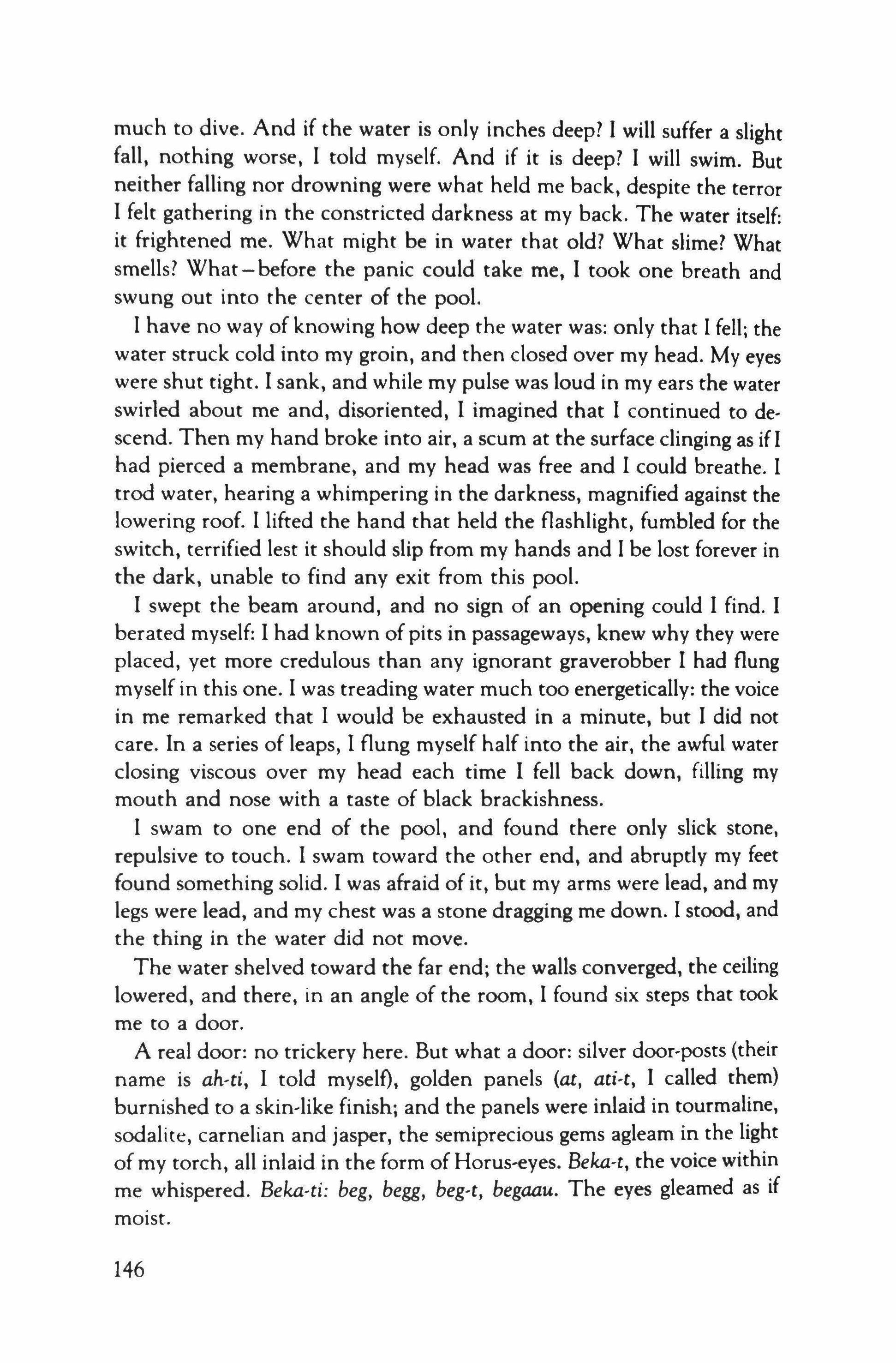
much to dive. And if the water is only inches deep? I will suffer a slight fall, nothing worse, I told myself. And if it is deep? I will swim. But neither falling nor drowning were what held me back, despite the terror I felt gathering in the constricted darkness at my back. The water itself: it frightened me. What might be in water that old? What slime? What smells? What - before the panic could take me, I took one breath and swung out into the center of the pool.
I have no way of knowing how deep the water was: only that I fell; the water struck cold into my groin, and then closed over my head. My eyes were shut tight. I sank, and while my pulse was loud in my ears the water swirled about me and, disoriented, I imagined that I continued to descend. Then my hand broke into air, a scum at the surface clinging as ifI had pierced a membrane, and my head was free and I could breathe. I trocl water, hearing a whimpering in the darkness, magnified against the lowering roof. I lifted the hand that held the flashlight, fumbled for the switch, terrified lest it should slip from my hands and I be lost forever in the dark, unable to find any exit from this pool.
I swept the beam around, and no sign of an opening could I find. I berated myself: I had known of pits in passageways, knew why they were placed, yet more credulous than any ignorant graverobber I had flung myself in this one. I was treading water much too energetically: the voice in me remarked that I would be exhausted in a minute, but I did not care. In a series of leaps, I flung myself half into the air, the awful water closing viscous over my head each time I fell back down, filling my mouth and nose with a taste of black brackishness.
I swam to one end of the pool, and found there only slick stone, repulsive to touch. I swam toward the other end, and abruptly my feet found something solid. I was afraid of it, but my arms were lead, and my legs were lead, and my chest was a stone dragging me down. I stood, and the thing in the water did not move.
The water shelved toward the far end; the walls converged, the ceiling lowered, and there, in an angle of the room, I found six steps that took me to a door.
A real door: no trickery here. But what a door: silver door-posts (their name is ah-ti, I told myself), golden panels (at, ati-t, I called them) burnished to a skin-like finish; and the panels were inlaid in tourmaline, socialite, carnelian and jasper, the semiprecious gems agleam in the light of my torch, all inlaid in the form of Horus-eyes. Beka-t, the voice within me whispered. Beka-ti: beg, begg, begot, begaau. The eyes gleamed as if moist.
146

Before I could touch it the door fell, one hinge breaking away from the doorpost: the sound of its fall boomed loudly around me.
I started back, wavering over the water. A ripple ran through the pool, out, then back, then out again.
The door hung askew now. Cockeyed, it stared back at me. Wary without knowing why, I kicked at it: the lower hinge twisted, tore free, and the door crashed inward, sending out a cloud ofdust. I coughed, the smell of it filling my nostrils, thick on my tongue. I spat it out at once.
No one who has worked with them can forget the smell of mummy. The door seemed to have fallen onto one, possibly several of them, breaking them to bits. I shone the flashlight through the opening. The door lay across half-a-dozen shrouded forms, stuffed within the chamber apparently without ceremony. The wrappings were plain, the workmanship of the lowest quality. I wondered what I had stumbled into, and turned the beam about the room.
Mummies. Mummies everywhere. Piles of them, arms clenched tightly at their breasts, linen wrappings dissolving, falling away into cobwebs: leather and sticks protruding, and here and there the bright gleam of tooth.
The proportions of the chamber were odd. Shining the flashlight over the banks of dead, the perspective seemed strangely askew. I could only tell, from the numbers of the dead I saw, and the vague masses extending beyond the limit of the beam, that it was large. But the dimensions of the chamber were not so great as the hall above. The beam of the torch fell finally on a wall, far distant beyond stacks of brown. Once I had found the limits of the vault, I could guess the number of dead piled here, and another of the mysteries of the King was plain to me. I had wondered about the workers, the tens of thousands of mutes employed in the construction of the tomb. They had disappeared from the accounts. I had found them.
Ushabti? Or the kind of men who tell no tales? Or was there something else about this display of-I could only call it wealth. The corpses were stacked, scattered about in utter disregard for funeral rites, but they were here, they had been embalmed at who could guess what expense. There was something more intended than mass murder, more than the convenient disposal of inconvenient labor.
The far wall looked very far away. Behind me the water still sloshed, and I realized now what the taste in it had been.
I soon found why the proportions of the chamber had seemed so odd: the roof fell, or the floor rose, and before I had gone a dozen meters I was forced to proceed upon my hands and knees.
147
There was another chamber, a small room that held only a smell, a small smell, but it made me vomit until I thought my viscera would corne up.
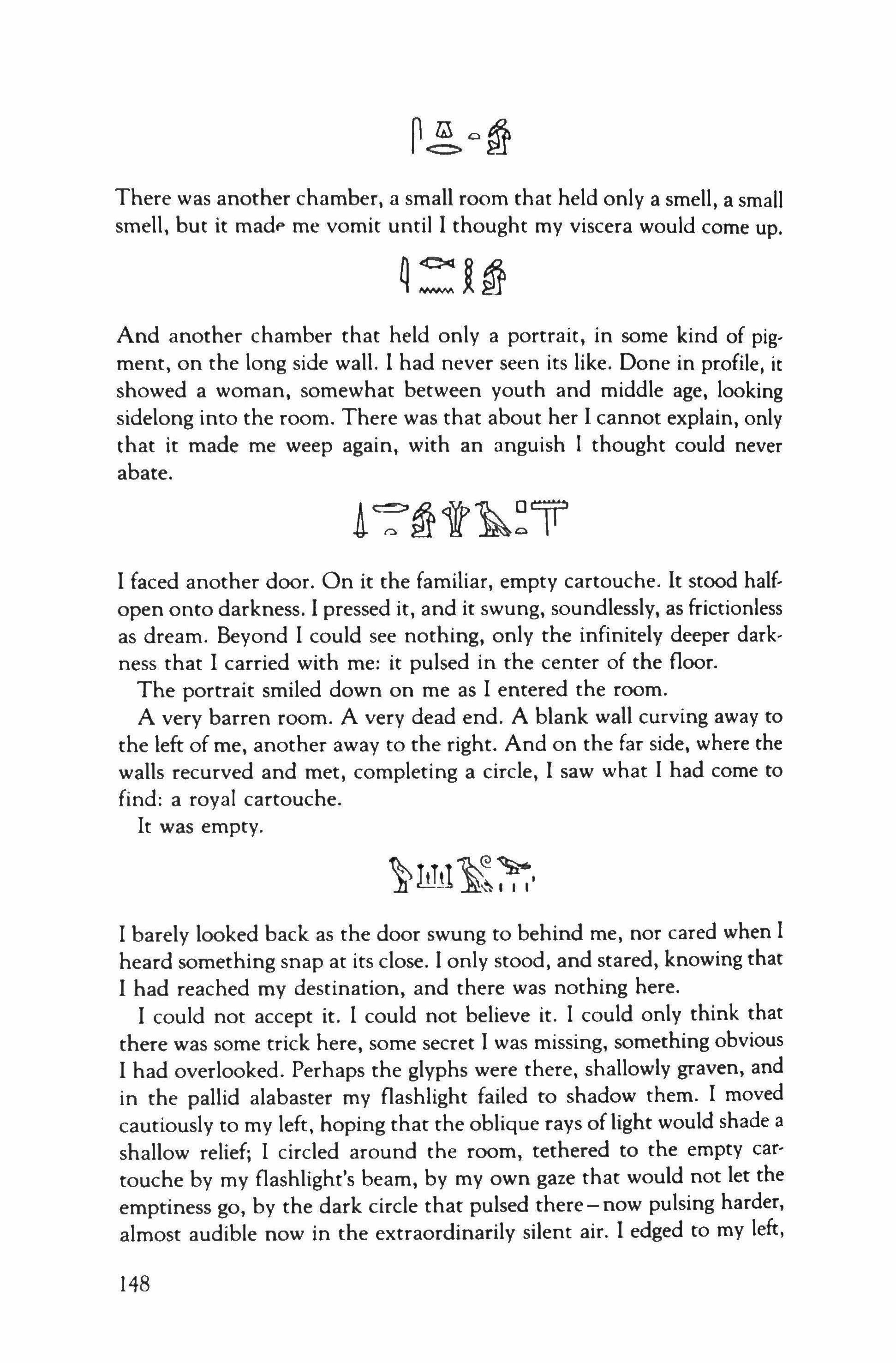
And another chamber that held only a portrait. in some kind of pigment, on the long side wall. I had never seen its like. Done in profile, it showed a woman, somewhat between youth and middle age, looking sidelong into the room. There was that about her I cannot explain, only that it made me weep again, with an anguish I thought could never abate.
I faced another door. On it the familiar, empty cartouche. It stood halfopen onto darkness. I pressed it, and it swung, soundlessly, as frictionless as dream. Beyond I could see nothing, only the infinitely deeper darkness that I carried with me: it pulsed in the center of the floor.
The portrait smiled down on me as I entered the room.
A very barren room. A very dead end. A blank wall curving away to the left of me, another away to the right. And on the far side, where the walls recurved and met, completing a circle, I saw what I had corne to find: a royal cartouche.
It was empty.
I barely looked back as the door swung to behind me, nor cared when I heard something snap at its close. I only stood, and stared, knowing that I had reached my destination, and there was nothing here.
I could not accept it. I could not believe it. I could only think that there was some trick here, some secret I was missing, something obvious I had overlooked. Perhaps the glyphs were there, shallowly graven, and in the pallid alabaster my flashlight failed to shadow them. I moved cautiously to my left, hoping that the oblique rays of light would shade a shallow relief; I circled around the room, tethered to the empty cartouche by my flashlight's beam, by my own gaze that would not let the emptiness go, by the dark circle that pulsed there-now pulsing harder, almost audible now in the extraordinarily silent air. I edged to my left,
148

circling, but the wall remained a blank. When I stood before the cartouche and ran my fingers over its cool, indifferent surface, I felt nothing.
Only then did the enormity of the thing bear in on me at last. It was a trap. As though laid down long ago for me and me alone, over five millennia it had led me, across the continents and decades of my own life, to this empty ending. And I, driven by a need I had not stopped to question, a credulity that even now makes me grimace in the darkness with embarrassment, though there is no one here to see-freighted with all this burden of desire and dread, I had come. I had answered the call. I am here.
Unconsciously, I had started to back away from the blank cartouche, as though I suspected in it some power to ensnare me still, to wind me further in extremities of self-love and self-deceit. I was backing away; my feet scraped sound from the floor; the sound cut through the silence that had swathed my thoughts numb, letting in flashes of fact and fear: the certainty that the door behind me had locked; the conviction that I would find in it no mechanism of release; the faint but definite indications that the power in my flashlight was failing, all the long distance at my back of corridor and chamber, unscalable wall and empty sky; and beyond that sky, over the ocean my life in ruins behind me, and before me the darkness pulsed deeper and blacker, until the real darkness that closed in around seemed only the ashen echo of despair. My heart perched on my right shoulder, shouting. Against the darkness I saw, repeated in flashes that came to me with the vivid immediacy of lightning, the leathery stare of horror in the face of Nur-Mar's answerer; I remembered how we had found him crouched, head furled close to his drawn-up knees: I felt the same urge tightening in my chest, struggling to curl itself around the space panic vacated in my belly as if my personality had drained away-as if the floor itself had given way.
I do not know-and even now some fugitive spirit of curiosity will not let the question alone-just what it was that made me stop there. Perhaps it was the panic seizing me at last. Perhaps it was despair. But I suspect, rather, it was the perverse spirit that had led me so infallibly to this place. It had not finished with me yet; I was to be its toy some hours more. Whatever it was, it prevented me from taking the final step backward, which would (I think of it now with regret) have been my last. It would have been much easier to tumble in blindly backwards, not knowing until too late just what my feet had done.
Air breathed up the back of my neck. The hairs there stirred. A smell-not damp, not dry, but infinitely corrupt-penetrated finally
149
through my terror. Some sense for which I have no name registered emptiness behind me. As if in a dream. or acting out in waking life a dream I had long ago forgotten. I turned. knowing already just what I would find: a pit some ten feet across and unguessably deep occupied the center of the room. In the same uncanny doubleness I teetered. halfwilling myself in. half-unable to succumb to the centripetal pull of the pit.
I fell back in darkness. Ghostly chuckling echoed upward from the mortar my foot had dislodged. loosening more echoes from the depths of the well. I heard no impact.
I lay for a long time before lighting the torch again. The ceiling was low. and marked. above the center of the well. with a small gathering of glyphs: Akha. it read: enter. go. But when I looked more closely, I saw that the word was incomplete: the last sign of the glyph was broken. Either the engraving was shaved plane, or the stone had fallen into the well, but I knew. as plainly as if it had been spoken aloud. as if I had always expected to find it here. what the entire glyph would be. Akha-t. the glyph had said, still echoing over the empty centuries the pride and despair of a King, as it gestured to the well at my feet, embracing as well the immense edifice around me, the King's death. my own life, and all the world of light that I had lost long. long ago: Akha-t: a disease of the womb.
I had found what Khafre's sphinx was still asking the sky over Giza: the answer opened at my feet.

There was little else to do. I knew better than to try the door, although I did. I knew better than to search the walls and ceiling, to pry at the joints between the stones, but I did. I did these things, and several others, until my own bloody fingerprints marked the room. Time passed. The air in the room grew foul, and not all of the foulness came from the well. The flashlight, no matter now I saved it, grew dim. I was hungry, light-headed. and the voice in my ears was loud.
Only one discovery did I make in these hours in my tomb, one last contribution I have to make to human knowledge. Forgive me: the dreadful cynicism of the King's last word is infecting me at last-or my own despair has finally unleashed itself, now that there is no shred of human society left to hold it back. But if I am bitter, it is not without reason. He did not leave me even so much of my pride as this: even this my last discovery was determined long ago, this neat stack of papyrus
150

placed here at the margins of the floor where, sooner or later, I must stumble over it.
And obey. As though they held some potent spell, once I found the sheets of paper I had no choice: Ser, SeTT, Ser metut: arrange words in order, compose a work: write. Of course the papyrus crumbled through my fingers: dust, swirling in the last rays of my flashlight. I thought at first that this too was another piece in the puzzle, another refinement of a torture I could hardly understand: to be commanded to write, and given only crumbling dust. Almost I rebelled again: I shovelled the ashes down the chute. But when I found the pens, purest ivory, still supple and sharp, bound with a linen cord beside their alabaster inkpot, the powdered ink waiting in its stoppered flask, I gave myself up at last to the command. I sat; I crossed my legs in the old, familiar posture of the scribe, and ari metchut: I made a book.
The fluid for the ink I supplied in the only way I could. My pockets I emptied for what small evidences of my past they could provide: my journal notebook, scraps of letters, old note cards. Words came to me out of the darkness. And although I cannot see what I write, I know they will suffice. They will survive me, I know, just as the King's monument survived him: as long as time requires, and the darkness in the pit endures.
Out of that darkness, reader, I reach my hand to you.
151
Bread
Yolanda Barnes

After my husband decided it would be best if we lived apart for a while I moved home to stay with my mother. At the time it was only she and my younger brother still living in the house. I had a sister too, older than me, but she was married and had her own home, and although she lived in the same city we hardly got to see her. She was mad with us, with Mama especially, and spent too much of her time scraping up old grudges, blaming us for certain harms she felt we had committed against her, for shows of comfort and love she claimed we never gave. No one in the family got to talk to her much. I had had a father too, but he died a long time ago when James my brother was very small.
Within a week of moving home I found a job. A nothing job as a typist/clerk with one of those temporary agencies. If I had done what I wanted I would have waited a bit longer, but Mama didn't believe in me staying around the house with nothing to do, even for a short while. That, she believed, was the worst possible thing. "Don't give yourself time," she said, "to get too sad." I believed she thought that's what happened to my sister. "Come on, Sweetie," she told me. "You've got to do something." Mama herself was always doing something. After Daddy died she began her own business although she had never held any sort of real job, not even before she married Daddy; that's how young she was. It was after he was gone that she started making and selling desserts to neighborhood restaurants. At first only one, the only dessert she could make good enough in her opinion, a sweet-potato pie. But it was the best sweet-potato pie, everyone we knew said so, so rich you almost couldn't stand it, with a sprinkling of spices-nutmeg and allspice and cinnamon-that tasted sharp on the tongue. She taught herself how to make others: pies and cakes and custards, called herself "Sweet Things"
152

and managed well enough to raise three children who everyone praised as turning out so well.
My mother questioned me at first when 1 called to say I wanted to move home. She was terrified that somehow she'd be blamed. She feared that she had raised spoiled children. Look at my sister Sharon, she said, acting the way she's been. Now me, running home. "What did you think it'd be like?" she asked me. "Just how much did you expect?" And then James, she said, her voice over the telephone tinged with humor and exasperation and hurt. "Lord." When 1 told her it was Compton's doing, not mine, she seemed relieved. Her voice took on an authority as she tried to comfort me, a certain joyfulness as she issued instructions. "Sometimes, Baby," she said. "Things happen. You have to get along as best you can. You go on your own way. It's a struggle, but you have to do it."
The day I moved home she made me fudge, without nuts, the way I like, and left it on a plate set on the pillow of myoid bed. Hardly ever did my mother cook for us. "Why should I cook?" she said. "1 think I do enough in the kitchen." We couldn't argue with that, so we had been left, all through growing up, to fend for ourselves. Eating our separate meals. But that next morning, the first one waking up again at home, she fixed me breakfast. Waffles with strawberry syrup that I couldn't finish, so sweet and heavy they felt in my stomach. Hours later, though, I was starving. A hole in my belly eating away, spreading. I made myself some grits, and then a peanut-butter sandwich.
"You don't think we'll get back together, do you?" I accused.
"Oh, Sweetie."
She didn't seem to hold this failure against me. People did ask about me, in a sweet, mean way. Through the kitchen window screen I could hear their questions, honey-coated, prying, chasing Mama as she walked down the driveway, her arms full with boxed desserts. And I'd listen to her answer: "Yes. Lenora's back. Oh, we're glad to have her. Uh huh." No apology coming from her. She never missed a step, her heels clicking along the concrete. As if it was not anything but expected to have her middle child home with her again.
My husband and I had an apartment. A pretty apartment in what had once been a huge stucco house shaped like a castle. The apartment was big, for a one-bedroom, with walls painted white and lots of cupboards. Our particular place had been a doctor's office, long ago. There was a window space, smack in the middle of an inner wall, the one that
153
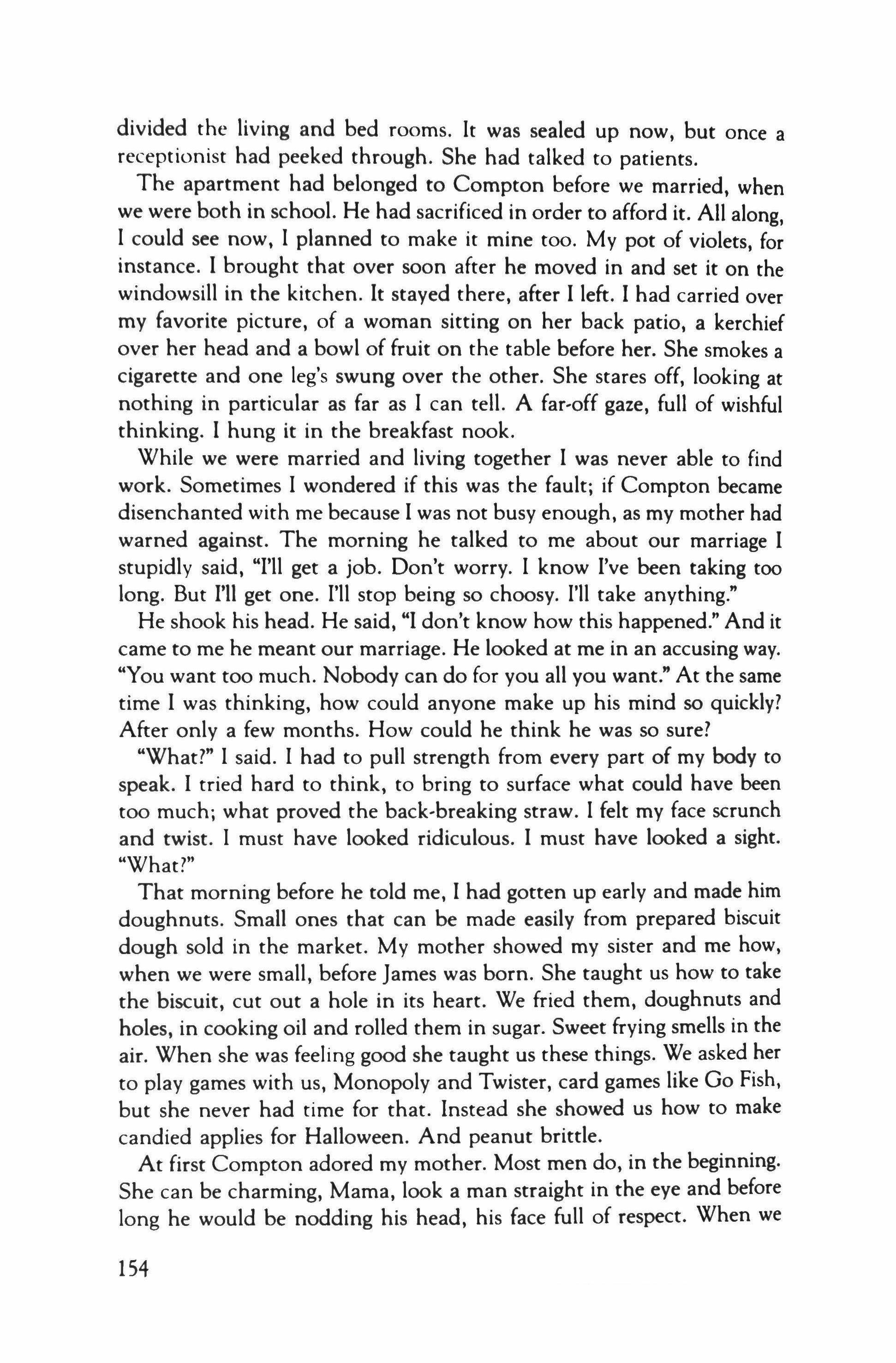
divided the living and bed rooms. It was sealed up now, but once a receptionist had peeked through. She had talked to patients.
The apartment had belonged to Compton before we married, when we were both in school. He had sacrificed in order to afford it. All along, I could see now, I planned to make it mine too. My pot of violets, for instance. I brought that over soon after he moved in and set it on the windowsill in the kitchen. It stayed there, after I left. I had carried over my favorite picture, of a woman sitting on her back patio, a kerchief over her head and a bowl of fruit on the table before her. She smokes a cigarette and one leg's swung over the other. She stares off, looking at nothing in particular as far as I can tell. A far-off gaze, full of wishful thinking. I hung it in the breakfast nook.
While we were married and living together I was never able to find work. Sometimes I wondered if this was the fault; if Compton became disenchanted with me because I was not busy enough, as my mother had warned against. The morning he talked to me about our marriage I stupidly said, "I'll get a job. Don't worry. I know I've been taking too long. But I'll get one. I'll stop being so choosy. I'll take anything."
He shook his head. He said, "I don't know how this happened." And it came to me he meant our marriage. He looked at me in an accusing way. "You want too much. Nobody can do for you all you want." At the same time I was thinking, how could anyone make up his mind so quickly? After only a few months. How could he think he was so sure?
"What?" I said. I had to pull strength from every part of my body to speak. I tried hard to think, to bring to surface what could have been too much; what proved the back-breaking straw. I felt my face scrunch and twist. I must have looked ridiculous. I must have looked a sight. "What?"
That morning before he told me, I had gotten up early and made him doughnuts. Small ones that can be made easily from prepared biscuit dough sold in the market. My mother showed my sister and me how, when we were small, before James was born. She taught us how to take the biscuit, cut out a hole in its heart. We fried them, doughnuts and holes, in cooking oil and rolled them in sugar. Sweet frying smells in the air. When she was feeling good she taught us these things. We asked her to play games with us, Monopoly and Twister, card games like Go Fish, but she never had time for that. Instead she showed us how to make candied applies for Halloween. And peanut brittle.
At first Compton adored my mother. Most men do, in the beginning. She can be charming, Mama, look a man straight in the eye and before long he would be nodding his head, his face full of respect. When we
154
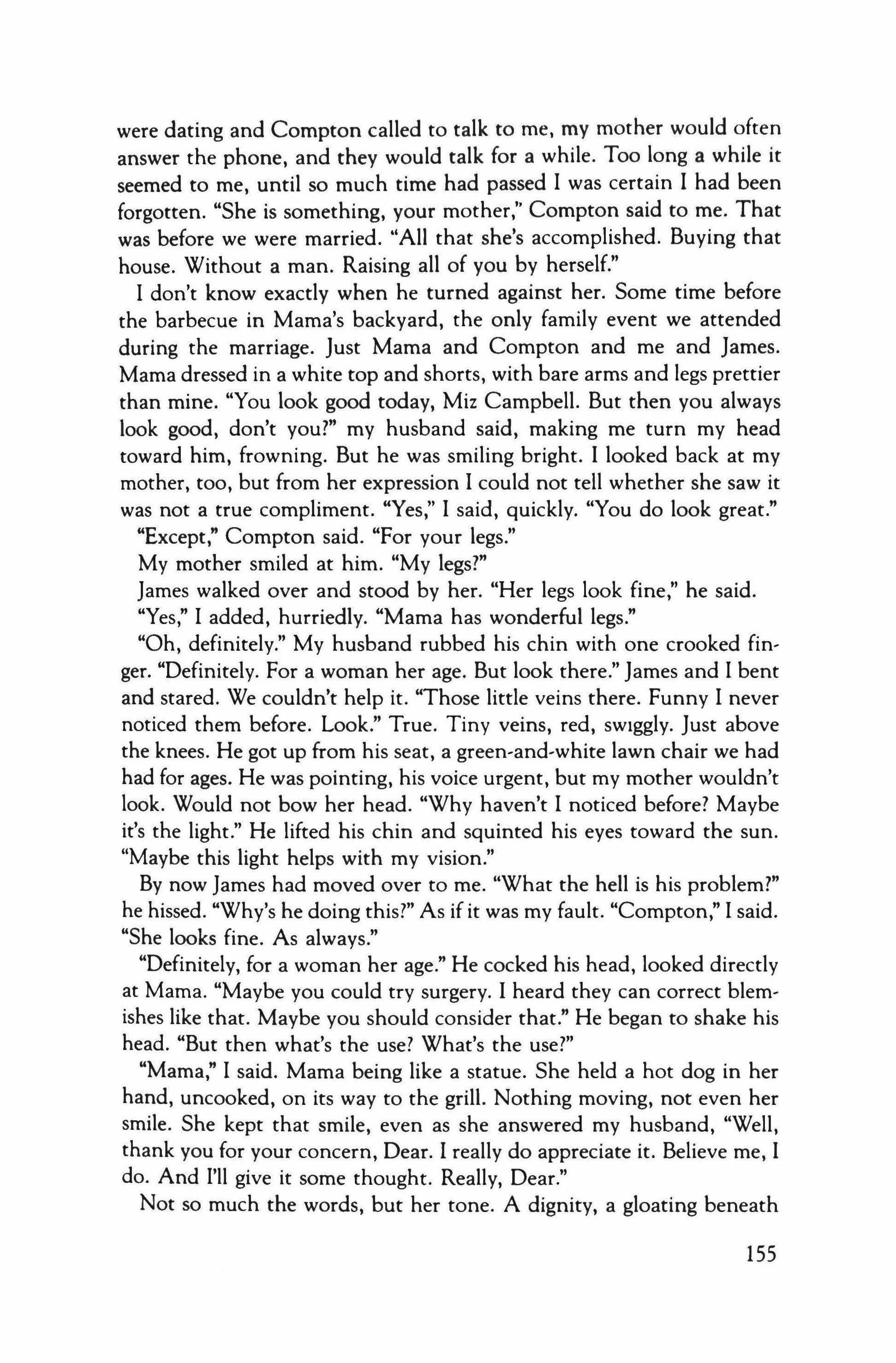
were dating and Compton called to talk to me, my mother would often answer the phone, and they would talk for a while. Too long a while it seemed to me, until so much time had passed I was certain I had been forgotten. "She is something, your mother," Compton said to me. That was before we were married. "All that she's accomplished. Buying that house. Without a man. Raising all of you by herself."
I don't know exactly when he turned against her. Some time before the barbecue in Mama's backyard, the only family event we attended during the marriage. Just Mama and Compton and me and James. Mama dressed in a white top and shorts, with bare arms and legs prettier than mine. "You look good today, Miz Campbell. But then you always look good, don't you?" my husband said, making me turn my head toward him, frowning. But he was smiling bright. I looked back at my mother, too, but from her expression I could not tell whether she saw it was not a true compliment. "Yes," I said, quickly. "You do look great." "Except," Compton said. "For your legs."
My mother smiled at him. "My legs?"
James walked over and stood by her. "Her legs look fine," he said. "Yes," I added, hurriedly. "Mama has wonderful legs."
"Oh, definitely." My husband rubbed his chin with one crooked finger. "Definitely. For a woman her age. But look there." James and I bent and stared. We couldn't help it. "Those little veins there. Funny I never noticed them before. Look." True. Tiny veins, red, swigglv, Just above the knees. He got up from his seat, a green-and-white lawn chair we had had for ages. He was pointing, his voice urgent, but my mother wouldn't look. Would not bow her head. "Why haven't I noticed before? Maybe it's the light." He lifted his chin and squinted his eyes toward the sun. "Maybe this light helps with my vision."
By now James had moved over to me. "What the hell is his problem?" he hissed. "Why's he doing this?" As if it was my fault. "Compton," I said. "She looks fine. As always."
"Definitely, for a woman her age." He cocked his head, looked directly at Mama. "Maybe you could try surgery. I heard they can correct blemishes like that. Maybe you should consider that." He began to shake his head. "But then what's the use? What's the use?"
"Mama," I said. Mama being like a statue. She held a hot dog in her hand, uncooked, on its way to the grill. Nothing moving, not even her smile. She kept that smile, even as she answered my husband, "Well, thank you for your concern, Dear. I really do appreciate it. Believe me, I do. And I'll give it some thought. Really, Dear."
Not so much the words, but her tone. A dignity, a gloating beneath
155

the surface. She could not be touched, now Compton learned that. He looked at her. He looked at me. Finally he looked away, at his feet. A small boy disgraced. Both of us, disgraced.
What she thought of my husband I'm still not certain. She never had much to say about him, directly. Except for one time when she told me that he was a weak man. "Compton has weak ways about him, doesn't he?" is what she said. After that I avoided speaking about him around her, and she, too, kept quiet. Even when he sent me home she said nothing. Beyond the fudge and the waffles, and the advice to find a job she made no statement at all.
When I moved home James was in his final year ofjunior high school. He was eight years younger than me and only four when Daddy died. He took to asking me about Daddy. He had been too young and didn't remember, and I would tell what I could, my own snatches and glimpses of our father rolling in my mind like reels of those old home movies with the faulty, shaking pictures and no sound at all. I would tell James about the time I fell at the beach, cutting my face on a piece of tin hidden in the sand, how Daddy bought me tiny toy circus animals that could be swallowed within my small cupped hands; I would tell James how at dinner Daddy would pile my plate high with spaghetti or fried chicken or whatever, then laugh at me and say I ate as much as a grown man; I would tell James about how Daddy and I would play father of the bride, our long hallway serving as the church aisle-see, even then I was readying myself-my arm stretched up to grab his cocked elbow, a lace tablecloth wrapped around my head, and Daddy humming "Here Comes the Bride" so silly, making me giggle; I would tell James about the times Daddy was sick and laid his head on my lap, how I stroked his hair, his temples, his forehead, trying to soothe the sickness inside.
It seemed none of my memories satisfied James. But these little bits were all I had left; I told James what I could.
I hadn't been back home that long when Mama told us about the lawsuit. James and I were in the living room at the time, watching TV: James lying on the floor, his hands behind his head, bent elbows sticking up and out like bony wings, and me sitting up on the couch. We both looked over and saw her, Mama's whole body tilted, her shoulder leaning against the archway that separated the living and dining rooms.
My mother took great care with her looks. She had a figure that men and women admired, trim but not too skinny-she still had curves and often wore slacks that weren't tight-fitting exactly but showed her shape.
156
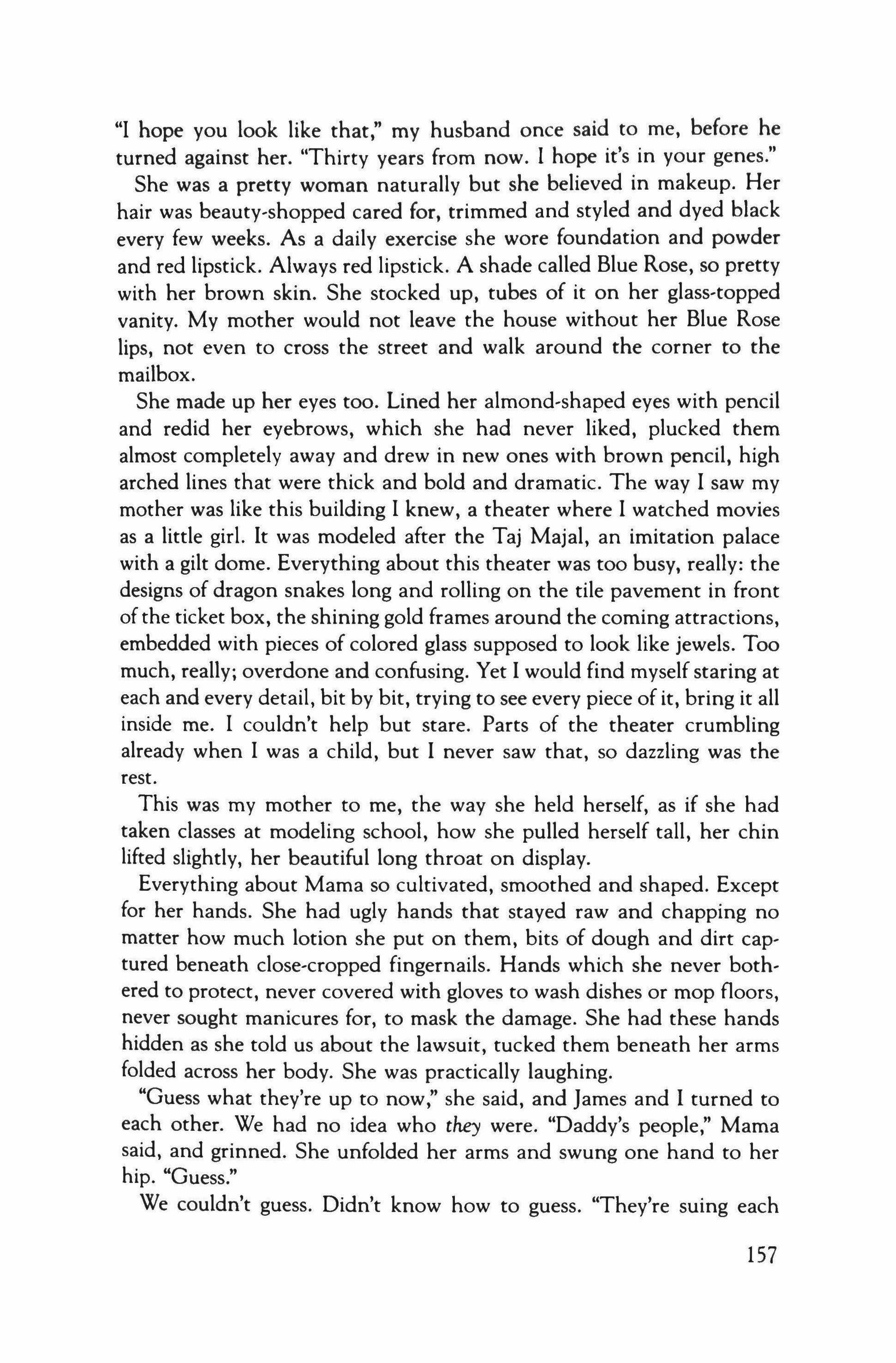
"I hope you look like that," my husband once said to me, before he turned against her. "Thirty years from now. I hope it's in your genes."
She was a pretty woman naturally but she believed in makeup. Her hair was beauty-shopped cared for, trimmed and styled and dyed black every few weeks. As a daily exercise she wore foundation and powder and red lipstick. Always red lipstick. A shade called Blue Rose, so pretty with her brown skin. She stocked up, tubes of it on her glass-topped vanity. My mother would not leave the house without her Blue Rose lips, not even to cross the street and walk around the corner to the mailbox.
She made up her eyes too. Lined her almond-shaped eyes with pencil and redid her eyebrows, which she had never liked, plucked them almost completely away and drew in new ones with brown pencil, high arched lines that were thick and bold and dramatic. The way I saw my mother was like this building I knew, a theater where I watched movies as a little girl. It was modeled after the Taj Majal, an imitation palace with a gilt dome. Everything about this theater was too busy, really: the designs of dragon snakes long and rolling on the tile pavement in front ofthe ticket box, the shining gold frames around the coming attractions, embedded with pieces of colored glass supposed to look like jewels. Too much, really; overdone and confusing. Yet I would find myself staring at each and every detail, bit by bit, trying to see every piece of it, bring it all inside me. I couldn't help but stare. Parts of the theater crumbling already when I was a child, but I never saw that, so dazzling was the rest.
This was my mother to me, the way she held herself, as if she had taken classes at modeling school, how she pulled herself tall, her chin lifted slightly, her beautiful long throat on display.
Everything about Mama so cultivated, smoothed and shaped. Except for her hands. She had ugly hands that stayed raw and chapping no matter how much lotion she put on them, bits of dough and dirt captured beneath close-cropped fingernails. Hands which she never bothered to protect, never covered with gloves to wash dishes or mop floors, never sought manicures for, to mask the damage. She had these hands hidden as she told us about the lawsuit, tucked them beneath her arms folded across her body. She was practically laughing.
"Guess what they're up to now," she said, and James and I turned to each other. We had no idea who they were. "Daddy's people," Mama said, and grinned. She unfolded her arms and swung one hand to her hip. "Guess."
We couldn't guess. Didn't know how to guess. "They're suing each
157

other. Grace called me today. They're taking each other to court. Lord." She laughed and pulled a hand through rolls of curls. "Lord."
Two members of my father's family were suing one another-a brother and a sister. They were suing over some property, a small stucco house on Broadway which Auntie Grace owned and allowed her brother and his family to stay in almost rent-free. Auntie Grace was by herself, had seemingly always been that way (although we knew in truth she had been married once, briefly) and had appeared to make it her life's purpose to take care of Uncle Jake and his family. He was my father's youngest brother and he never did well for himself. Auntie Grace paid his bills and gave him money. She brought his daughters presents, arranged their birthday parties, took them shopping for Easter dresses and on day trips to Tijuana. She didn't believe the rest of his family should suffer for Uncle Jake's failures. This was the seed of my mother's glee over the lawsuit. Auntie Grace never came to our rescue, never did for us the way she did for them, not even right after Daddy died and Mama could have used some help.
As my mother stood there, beneath the archway painted a calm, muted beige, she told us about it all. There had been an argument between Auntie Grace and Justine, my uncle's wife, and that argument had spread to include my cousins, their grown and almost grown daughters, and finally Uncle Jake himself.
The actual argument took place at Uncle Jake's house. It had been a physical and ugly fight, this was how Auntie Grace described it to Mama. "A terrible thing. She was crying when she told me." My mother shaking her head, but the corners of her mouth lifting slightly. The fight had started over a gift from Auntie Grace, a down payment for a new car. Auntie Grace assumed that hers would be the main voice in choosing the car. It was her money, wasn't it? And she didn't want them wasting it on something pretty and popular and not suited for the business of carrying a family. She didn't want them throwing her money away on something likely to break down in a month's time; something good for nothing but collecting speeding tickets. Besides she had good sense. She knew how to pick a car.
I can just imagine what Justine had to say to that. Oh, I can just picture it all: Justine moving her head like one of those belly dancers: the attitude stiffening her words, making her tone hard and mean. "Well, let me tell you something," she would have said. "I've got good sense too. Grace. I can pick a car for my family good as you." Justine taking a step toward Auntie Grace at this point. She would have carried a dish towel. Always, as far as I can remember, she seemed to have one in her grasp,
158
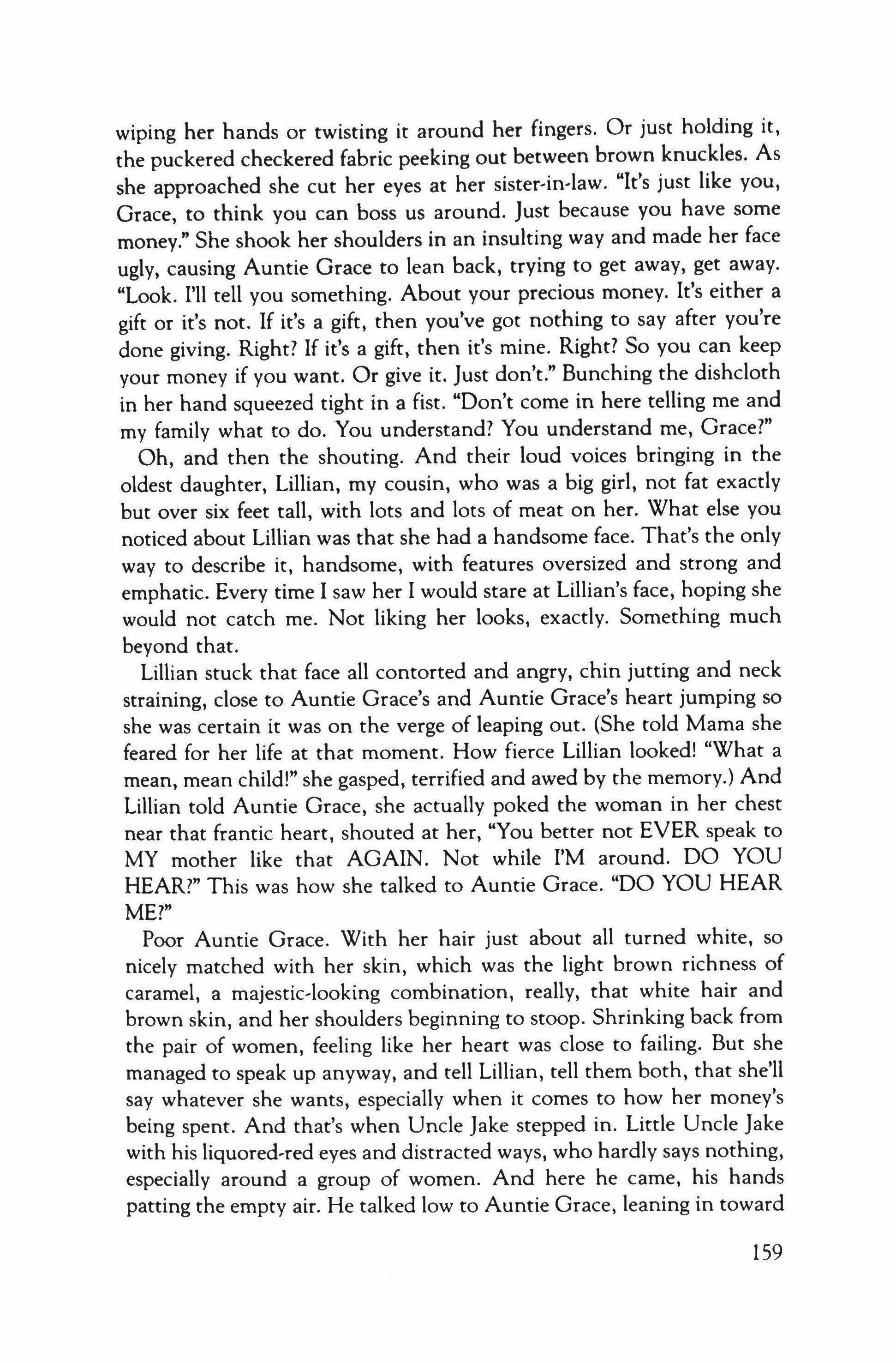
wiping her hands or twisting it around her fingers. Or just holding it, the puckered checkered fabric peeking out between brown knuckles. As she approached she cut her eyes at her sister-in-law. "It's just like you, Grace, to think you can boss us around. Just because you have some money." She shook her shoulders in an insulting way and made her face ugly, causing Auntie Grace to lean back, trying to get away, get away. "Look. I'll tell you something. About your precious money. It's either a gift or it's not. If it's a gift, then you've got nothing to say after you're done giving. Right? If it's a gift, then it's mine. Right? So you can keep your money if you want. Or give it. Just don't." Bunching the dishcloth in her hand squeezed tight in a fist. "Don't come in here telling me and my family what to do. You understand? You understand me, Grace?"
Oh, and then the shouting. And their loud voices bringing in the oldest daughter, Lillian, my cousin, who was a big girl, not fat exactly but over six feet tall, with lots and lots of meat on her. What else you noticed about Lillian was that she had a handsome face. That's the only way to describe it, handsome, with features oversized and strong and emphatic. Every time I saw her I would stare at Lillian's face, hoping she would not catch me. Not liking her looks, exactly. Something much beyond that.
Lillian stuck that face all contorted and angry, chin jutting and neck straining, close to Auntie Grace's and Auntie Grace's heart jumping so she was certain it was on the verge of leaping out. (She told Mama she feared for her life at that moment. How fierce Lillian looked! "What a mean, mean child!" she gasped, terrified and awed by the memory.) And Lillian told Auntie Grace, she actually poked the woman in her chest near that frantic heart, shouted at her, "You better not EVER speak to MY mother like that AGAIN. Not while I'M around. DO YOU HEAR?" This was how she talked to Auntie Grace. "DO YOU HEAR ME?"
Poor Auntie Grace. With her hair just about all turned white, so nicely matched with her skin, which was the light brown richness of caramel, a majestic-looking combination, really, that white hair and brown skin, and her shoulders beginning to stoop. Shrinking back from the pair of women, feeling like her heart was close to failing. But she managed to speak up anyway, and tell Lillian, tell them both, that she'll say whatever she wants, especially when it comes to how her money's being spent. And that's when Uncle Jake stepped in. Little Uncle Jake with his liquored-red eyes and distracted ways, who hardly says nothing, especially around a group of women. And here he came, his hands patting the empty air. He talked low to Auntie Grace, leaning in toward
159

her, saying, "Mavbe you better go now. Everybody's too upset to talk right. It can wait for later. Let it stay a bit." He looked back at his wife and daughter, standing shoulder to shoulder. He whispered to Auntie Grace. "Go on. It's best."
"Hell," Auntie Grace answered. She never swore much, so when she did it sounded odd and unconvincing. We'd snicker at Auntie Grace's swears. "Hell. I'm not going nowhere." And then Uncle Jake (this was harder to imagine, but then maybe not) said, "Get out of my goddamn house." ("His house," my mother interrupted. "Think of that. His house. He doesn't even pay for his own pair of shoes.") That's when Lillian grabbed Auntie Grace, pressed her thick, strong fingers hard around Auntie Grace's arm so that she could feel them pushing against the marrow of her bone, and dragged Auntie Grace through the kitchen, through the dining and living rooms and out the door. She whipped her out onto the streets. Like a children's game of snake.
Now they were all going to court; complaints and cross complaints filed about back rent owed and promises broken.
"Lord," Mama repeated. "But I guess we shouldn't be too surprised, huh? Huh?"
In a way she was right. My Daddy's people were a litigious bunch. Auntie Grace especially. She always was suing somebody over something. We used to joke about it, say that it was the settlements of these suits that bought her groceries and paid her house note. Actually she had other ventures: real estate and investments and various little enterprises, but there was no denying that given a chance Auntie Grace would sue in a shot. And even Uncle Jake had slipped on a rain-slicked walkway while visiting a friend and made a little money out of it. But this was something else. Mama was right; this was family. Family.
"It was bound to come to this." James screwed his face and spoke in an irritated way. He shrugged a shoulder against the beige, shagged rug, tried to look as if this tale of family battle didn't interest him. "It was a matter of time before they turned on each other."
"Lord," Mama said again and again. In truth she always considered Daddy's people common and now she snatched at this bit of news and hugged it to her; evidence. She held it in front of our eyes, a flying banner; proof. Daddy was the only one of them who ever made good. He did what he had to do to pay for his schooling; he stood on street corners and sold flowers, he peddled popcorn at the movies. Nobody else did that; not one of them even finished college. He started his own business as an accountant, set up an office on Hazel Avenue. Who else
160

accomplished that? Not Uncle Jake. Mama told us stories as we grew up, about how when Daddy was alive one of his family or another was always coming around looking for favors-money, work, influence, whatever they could get. All that asking, all that pestering, all that demanding is what made him sick, Mama was certain, at least sicker than he started. All those favors. Always coming around. Everyone of them.
Once he died, we hardly saw them. At Christmas parties or summer barbecues, where they would play music loud and dance and drink too much and eat until they moaned about how their stomachs were about to burst and sometimes they got loud and ugly with one another. Uncle Jake would be the drunkest. He would start off that way, before we got there, and at some point would pull off his shoe and show the children his foot with the missing toes. He had been born that way, with two toes missing. And Mama would talk about them-all of them: Justine and Auntie Grace and Uncle Jake with his disgusting missing toes-in the car all the way home and for some hours after. On her side people didn't act that way. On her side at parties people sat down, on the couch or in chairs, they faced each other and had a conversation and no music was played. No need for all that noise. She let it be known that her side of the family didn't believe in acting so common, crazy. No.
Sometimes, when Daddy was still living, my sister and I would be sent over to Uncle Jake's to spend the night. One of my cousins was about our age, but she favored Sharon. She thought I acted too young and quiet. She called me plain. She was going to be big, like her oldest sister Lillian, and already she was busy trying to catch a boyfriend. She would take Sharon off somewhere with her to practice kissing and to talk about boys and leave me on the sofa by myself to watch the Flintstones. Once I must have been sitting all wrong because Justine caught me and screamed: "Do you sit that way in your own home? Put your feet up all over any way you please? Do you show such disrespect in your mother's house? Tell me that. Would Claire allow this mess?" And I answered, in a small voice, "No." Although I had no idea what I had done and probably was acting no different than any other place, including my mother's home.
"Then why do you think you can get away with that here?" Justine still screaming. "Why think you can do just anything in my house?" So much shouting in that house, even when no one was angry. I was thankful to go home after those trips. Waiting on the front stoop for my mother. Waiting to see our tan-colored Ford glide up to the curb.
"Grace called and told me all about it. Mercy."
161
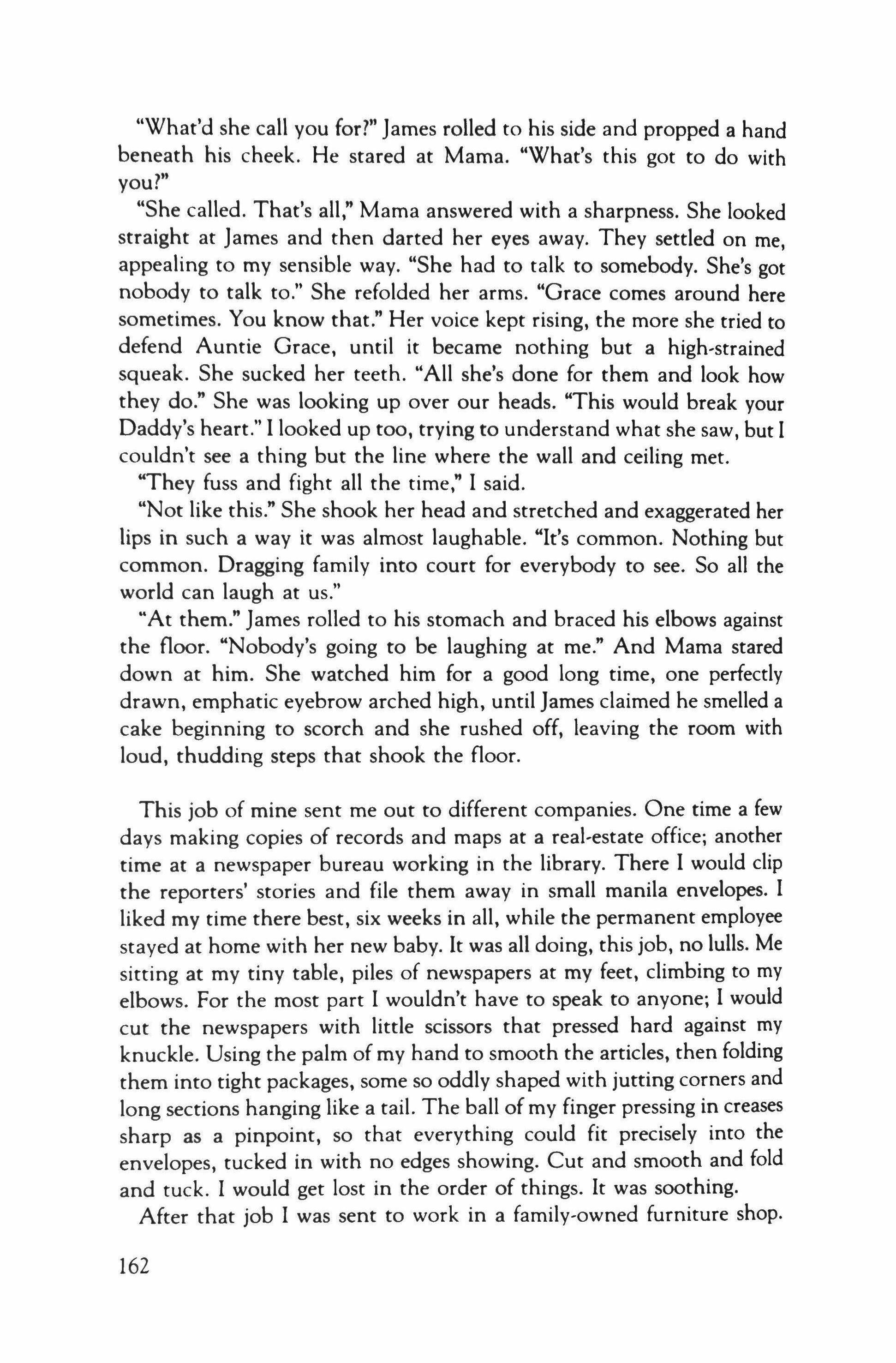
"What'd she call you for?" James rolled to his side and propped a hand beneath his cheek. He stared at Mama. "What's this got to do with you?"
"She called. That's ali," Mama answered with a sharpness. She looked straight at James and then darted her eyes away. They settled on me, appealing to my sensible way. "She had to talk to somebody. She's got nobody to talk to." She refolded her arms. "Grace comes around here sometimes. You know that." Her voice kept rising, the more she tried to defend Auntie Grace, until it became nothing but a high-strained squeak. She sucked her teeth. "All she's done for them and look how they do." She was looking up over our heads. "This would break your Daddy's heart." I looked up too, trying to understand what she saw, but I couldn't see a thing but the line where the wall and ceiling met.
"They fuss and fight all the time," I said.
"Not like this." She shook her head and stretched and exaggerated her lips in such a way it was almost laughable. "It's common. Nothing but common. Dragging family into court for everybody to see. So all the world can laugh at us."
"At them." James rolled to his stomach and braced his elbows against the floor. "Nobodv's going to be laughing at me." And Mama stared down at him. She watched him for a good long time, one perfectly drawn, emphatic eyebrow arched high, until James claimed he smelled a cake beginning to scorch and she rushed off, leaving the room with loud, thudding steps that shook the floor.
This job of mine sent me out to different companies. One time a few days making copies of records and maps at a real-estate office; another time at a newspaper bureau working in the library. There I would clip the reporters' stories and file them away in small manila envelopes. I liked my time there best, six weeks in all, while the permanent employee stayed at home with her new baby. It was all doing, this job, no lulls. Me sitting at my tiny table, piles of newspapers at my feet, climbing to my elbows. For the most part I wouldn't have to speak to anyone; I would cut the newspapers with little scissors that pressed hard against my knuckle. Using the palm of my hand to smooth the articles, then folding them into tight packages, some so oddly shaped with jutting corners and long sections hanging like a tail. The ball of my finger pressing in creases sharp as a pinpoint, so that everything could fit precisely into the envelopes, tucked in with no edges showing. Cut and smooth and fold and tuck. I would get lost in the order of things. It was soothing. After that job I was sent to work in a family-owned furniture shop.
162
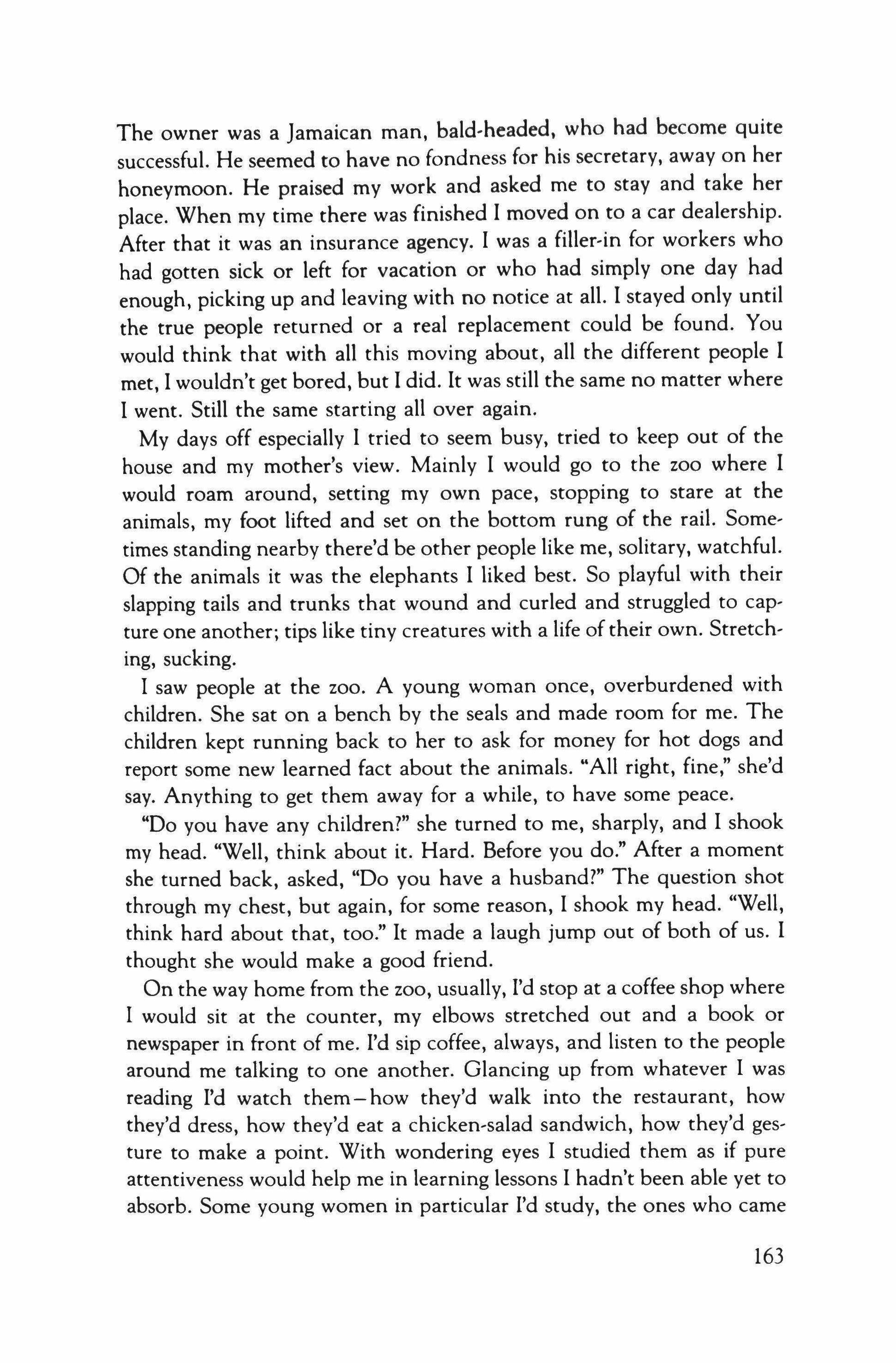
The owner was a Jamaican man, bald-headed, who had become quite successful. He seemed to have no fondness for his secretary, away on her honeymoon. He praised my work and asked me to stay and take her place. When my time there was finished I moved on to a car dealership. After that it was an insurance agency. I was a filler-in for workers who had gotten sick or left for vacation or who had simply one day had enough, picking up and leaving with no notice at all. I stayed only until the true people returned or a real replacement could be found. You would think that with all this moving about, all the different people I met, I wouldn't get bored, but I did. It was still the same no matter where I went. Still the same starting all over again.
My days off especially I tried to seem busy, tried to keep out of the house and my mother's view. Mainly I would go to the zoo where I would roam around, setting my own pace, stopping to stare at the animals, my foot lifted and set on the bottom rung of the rail. Sometimes standing nearby there'd be other people like me, solitary, watchful. Of the animals it was the elephants I liked best. So playful with their slapping tails and trunks that wound and curled and struggled to capture one another; tips like tiny creatures with a life of their own. Stretch, ing, sucking.
I saw people at the zoo. A young woman once, overburdened with children. She sat on a bench by the seals and made room for me. The children kept running back to her to ask for money for hot dogs and report some new learned fact about the animals. «All right, fine," she'd say. Anything to get them away for a while, to have some peace.
"Do you have any children?" she turned to me, sharply, and I shook my head. "Well, think about it. Hard. Before you do." After a moment she turned back, asked, "Do you have a husband?" The question shot through my chest, but again, for some reason, I shook my head. "Well, think hard about that, too." It made a laugh jump out of both of us. I thought she would make a good friend.
On the way home from the zoo, usually, I'd stop at a coffee shop where I would sit at the counter, my elbows stretched out and a book or newspaper in front of me. I'd sip coffee, always, and listen to the people around me talking to one another. Glancing up from whatever I was reading I'd watch them - how they'd walk into the restaurant, how they'd dress, how they'd eat a chicken-salad sandwich, how they'd gesture to make a point. With wondering eyes I studied them as if pure attentiveness would help me in learning lessons I hadn't been able yet to absorb. Some young women in particular I'd study, the ones who came
163
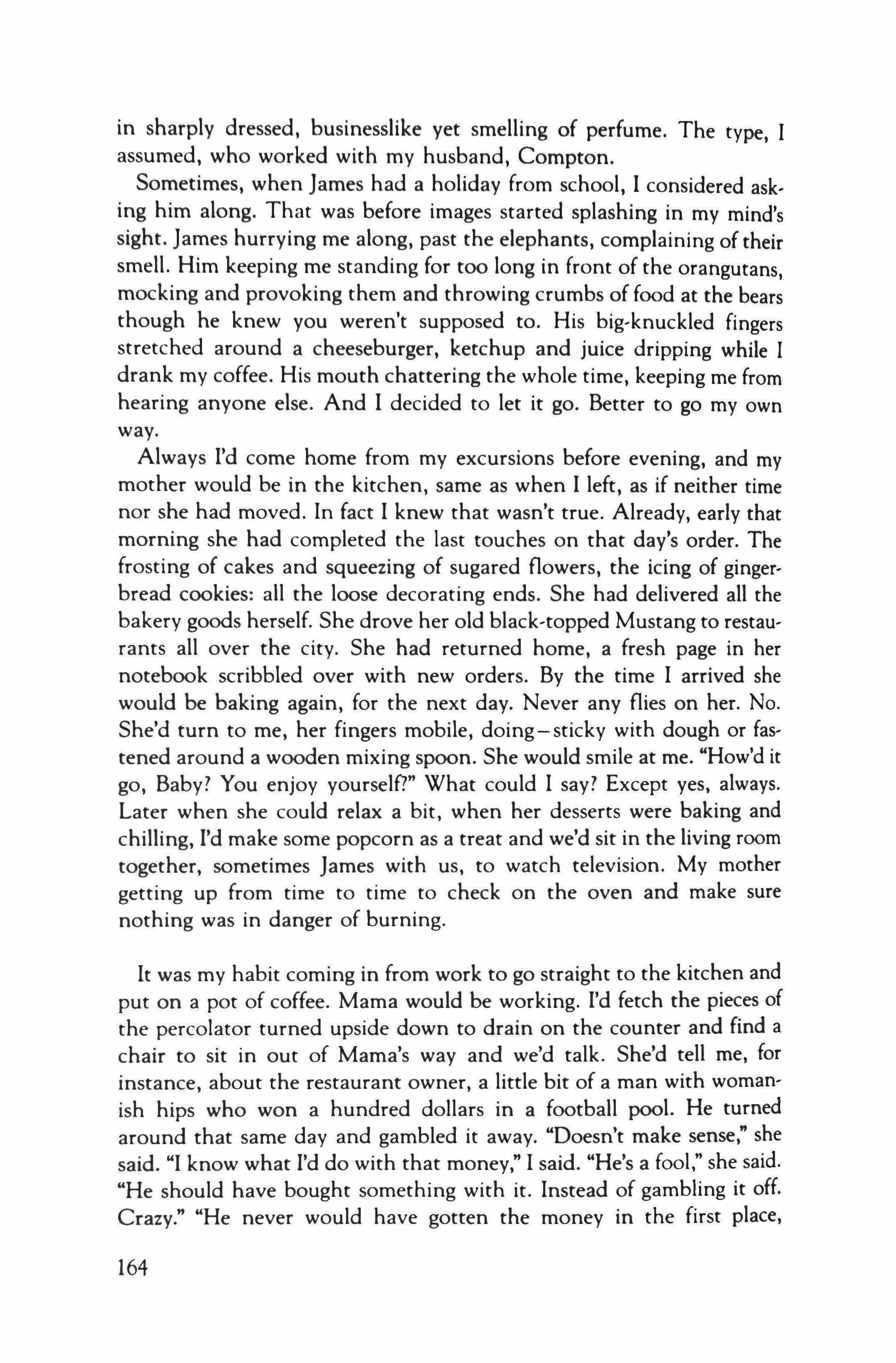
in sharply dressed, businesslike yet smelling of perfume. The type, I assumed, who worked with my husband, Compton.
Sometimes, when James had a holiday from school, I considered asking him along. That was before images started splashing in my mind's sight. James hurrying me along, past the elephants, complaining of their smell. Him keeping me standing for too long in front of the orangutans, mocking and provoking them and throwing crumbs of food at the bears though he knew you weren't supposed to. His big-knuckled fingers stretched around a cheeseburger, ketchup and juice dripping while I drank my coffee. His mouth chattering the whole time, keeping me from hearing anyone else. And I decided to let it go. Better to go my own way.
Always I'd come home from my excursions before evening, and my mother would be in the kitchen, same as when I left, as if neither time nor she had moved. In fact I knew that wasn't true. Already, early that morning she had completed the last touches on that day's order. The frosting of cakes and squeezing of sugared flowers, the icing of gingerbread cookies: all the loose decorating ends. She had delivered all the bakery goods herself. She drove her old black-topped Mustang to restaurants all over the city. She had returned home, a fresh page in her notebook scribbled over with new orders. By the time I arrived she would be baking again, for the next day. Never any flies on her. No. She'd turn to me, her fingers mobile, doing-sticky with dough or fastened around a wooden mixing spoon. She would smile at me. "How'd it go, Baby? You enjoy yourself?" What could I say? Except yes, always. Later when she could relax a bit, when her desserts were baking and chilling, I'd make some popcorn as a treat and we'd sit in the living room together, sometimes James with us, to watch television. My mother getting up from time to time to check on the oven and make sure nothing was in danger of burning.
It was my habit coming in from work to go straight to the kitchen and put on a pot of coffee. Mama would be working. I'd fetch the pieces of the percolator turned upside down to drain on the counter and find a chair to sit in out of Mama's way and we'd talk. She'd tell me, for instance, about the restaurant owner, a little bit of a man with womanish hips who won a hundred dollars in a football pool. He turned around that same day and gambled it away. "Doesn't make sense," she said. "I know what I'd do with that money," I said. "He's a fool," she said. "He should have bought something with it. Instead of gambling it off. Crazy." "He never would have gotten the money in the first place,
164

Mama, if he hadn't gambled. You have to admit that." "And what does he have now?" She looked at me as if I'd gone crazy too. "It's just like that money was air for all he's got to show for it. He might as well as never had that money." One day I walked into the kitchen and Mama was busy talking on the phone, some brownies cooling on the stove and dishes in the sink half-filled with sudsy water.
"Uh huh," she was saying. Every once in a while: "Uh huh."
"That goes to show," she said, hanging up the phone. She stood in the middle of the kitchen, the phone in her hand, the cord looping around her feet. "Everyone puts in their own version."
"What's Justine got to say?"
In answer she shrugged a shoulder. She turned her face away to search the clock. "Look how late!" she exclaimed, softly. Her free hand rubbed her chin. "I haven't even started those cakes yet. Justine talks and talks. So fast and furious. Like a storm coming. She is hot." Mama turned her back to me. "She is mad."
"They're going through with it?"
"It's pitiful, Sharon."
"Lenora," I said.
She waved a hand and kept on speaking. "So shameful for a family to behave like this. The world is hard enough. You don't know that yet, not really. Too hard. We don't need to turn on each other. All this fighting and suing. It's not right."
"Let them do what they want," I said. She was staring off, away from me. "Let them act common if they want. We know we don't act like that. We have no part in this."
"It's just a shame, that's all I'm saying. A shame."
I stayed on for a while and sipped my coffee while she went on about her baking business. Watched her sweep up spilt flour and wipe down the stove. She finished washing the cake pans and baking sheets soaking in the sink and mixed the batter for her cakes.
Much later when I was trying to sleep I felt the harshness of the hall light sliding through the space around my shut bedroom door. Sounds streamed through too. I could hear Mama as she dialed and then her voice, loud, high-pitched, speaking to Auntie Grace.
Mama began to tryout new recipes. She bought new cookbooks and gourmet magazines, piled them on the kitchen table and counter. She came to me almost every day asking me to taste something new. The first was a Grand Marnier mousse pie, decorated with pinpoint-thin slices of candied oranges. Much too pretty to ruin by eating. Another
165

time it was a single-layer lemon cake coated with a lattice-patterned dusting of confectioner's sugar.
These experiments of hers were failures as far as I could tell. Wastes. The restaurants that were her regular customers had no use for these fancy sweets. They kept on ordering her double-chocolate fudge cake, her bourbon pecan pies. "Stupid," she complained, spittingly. "Knownothings." No matter what, they wouldn't. They felt no need to go looking for something better.
Other changes, too. Most evenings now, instead of watching TV with me, she would be on the phone talking with Auntie Grace and Justine. She would call one right after hanging up with the other. She no longer poked fun at the lawsuit. We didn't understand, James and I, what she was doing.
She began to talk about Auntie Grace and Justine in a curious way. "What I've always admired about Justine," she said now, "is how she stands up for herself. It's no wonder she filed that lawsuit. She never took abuse from anyone." What lies! What she said went against all she said before. Loud, that's what she always said about Justine. Common, a scenemaker, a leech. James and I stared at each other, our mouths gaping. We knew better. We remembered all she had said. We had taken it to heart. She could fool herself but not us.
This bothered James more than me. "You heard how she talks about Auntie Grace?" he asked. "You hear what she's saying?"
"Remember when she called Auntie Grace a thief? She said she cheated those people out of their property? Didn't she? And Justine. The nasty things she had to say about Justine." I blinked my eyes, strained to remember what I thought to be true.
"I hope Uncle Jake wins," James said.
"Why?"
"I just do." He paused for so long I thought he was finished. Then he said, "Some people give you a lot. They do a lot for you to make you feel bad. That's Auntie Grace. She gives and gives and gives and then when Uncle Jake tries to be a man and stand up for something she uses it all to keep him down."
"They didn't have to take all those presents, now did they? If they didn't want to be beholding they shouldn't have accepted all that help. They did this to themselves."
"So you favor her, too. You're for Miss Martyr."
"No," I answered with a loud voice. "No. I'm in nobodv's favor."
"She comes here now. Some afternoons before you get home. She and Mama sit in the kitchen and talk and laugh and act like they've been
166

friends all along. She brought that macaroni and cheese in there. Did you see? She's bringing us things."
"What's wrong with that?" My voice sounding false. "Why shouldn't she and Mama get together. Auntie Grace is family. We're part of this family."
"She never did for us before. What makes her such good family now? What does it matter now?"
There was nothing I could say. It came to me how much like our older sister Sharon he was becoming, unwilling to forgive. He would, I was thinking, have a hard, hard life.
"She can't even cook. I don't trust anything she cooks. It smells funny. You don't know how long it's been laying around her house. It tastes bad." He rubbed at his chin, just like Mama. "I hope Uncle Jake wins. If it comes to that."
"It probably won't. And even then I don't care. It doesn't matter to me which of them wins. They're both the same."
"Me either," James said quickly. He shrugged. "It doesn't matter to me either."
One evening I came home late. I was placed with a toy factory that week, fifty miles from home. I went to the kitchen but nothing was happening. No baking smells. I turned around and there stood James in the doorway. He braced a hand against the frame.
"She has a date." "What?"
"She's in her room. She's getting ready."
The door to her room was shut. Behind it we heard her preparations. James and I looked at each other. She had never dated before, not in the almost ten years since Daddy died. "Well, how could I?" she would ask. "With you children home. Well, how could I? Having to bake all those cakes and pies and custards? The lone support of this family. You tell me when I had time to date."
"Why's she doing this?" James whined. A little boy. "Why now? What's she trying to do?"
She was not ready when her date arrived. James and I let him in. "Christ," whispered James. He turned in a circle. "Oh Christ."
Her date was nothing we ever could have expected. He was nothing like our mother's manicured style. Nothing like Daddy. He was a cook at one of the restaurants and his name was Aaron. "Look at his pants," James whispered. "He's wearing green pants."
His hair was bushy. It sprung out from beneath a red beret he wore
167
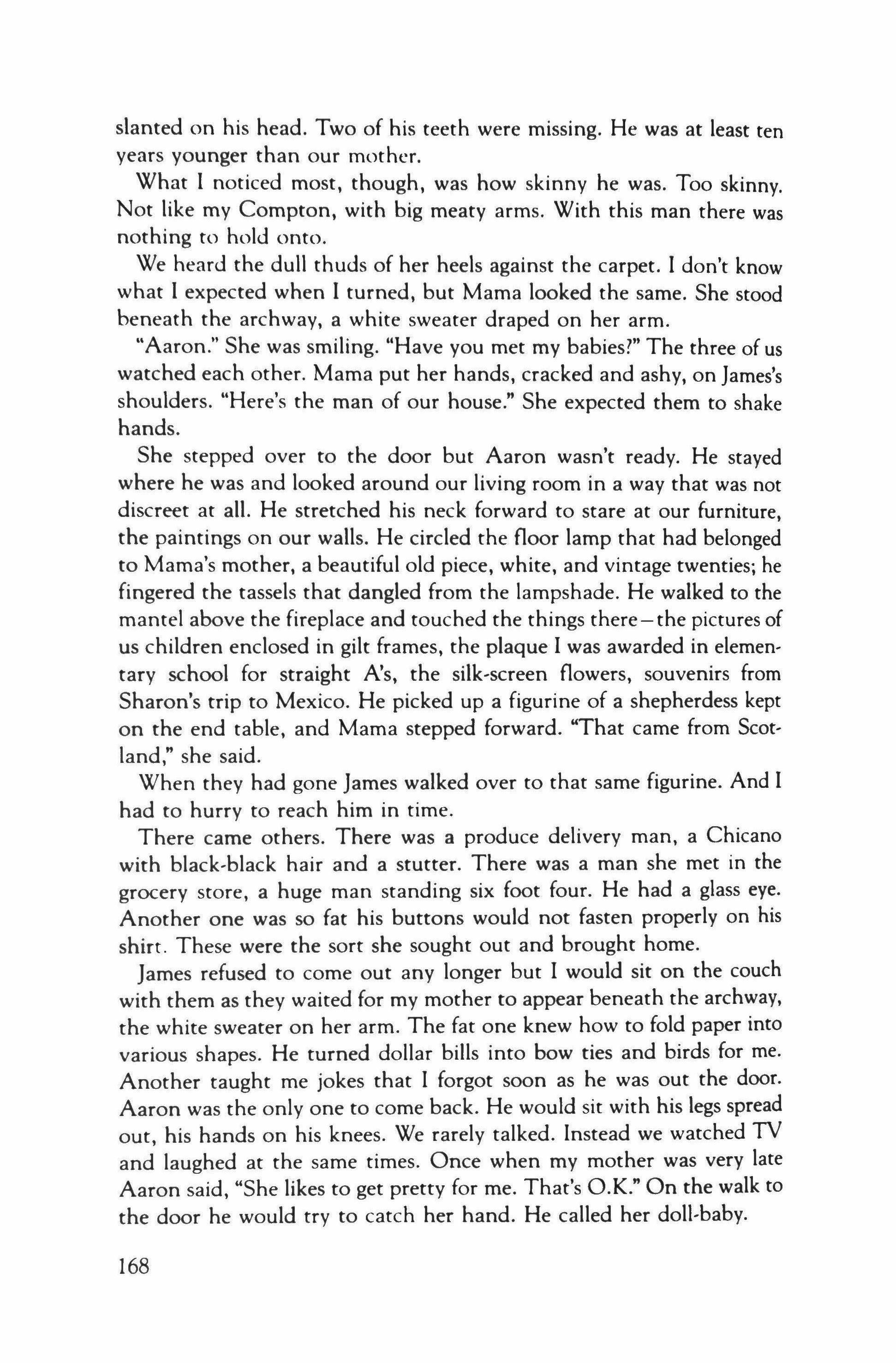
slanted on his head. Two of his teeth were missing. He was at least ten years younger than our mother.
What I noticed most, though, was how skinny he was. Too skinny. Not like my Compton, with big meaty arms. With this man there was nothing to hold onto.
We heard the dull thuds of her heels against the carpet. I don't know what I expected when I turned, but Mama looked the same. She stood beneath the archway, a white sweater draped on her arm.
"Aaron." She was smiling. "Have you met my babies?" The three of us watched each other. Mama put her hands, cracked and ashy, on James's shoulders. "Here's the man of our house." She expected them to shake hands.
She stepped over to the door but Aaron wasn't ready. He stayed where he was and looked around our living room in a way that was not discreet at all. He stretched his neck forward to stare at our furniture, the paintings on our walls. He circled the floor lamp that had belonged to Mama's mother, a beautiful old piece, white, and vintage twenties; he fingered the tassels that dangled from the lampshade. He walked to the mantel above the fireplace and touched the things there-the pictures of us children enclosed in gilt frames, the plaque I was awarded in elementary school for straight A's, the silk-screen flowers, souvenirs from Sharon's trip to Mexico. He picked up a figurine of a shepherdess kept on the end table, and Mama stepped forward. "That came from Scotland," she said.
When they had gone James walked over to that same figurine. And I had to hurry to reach him in time.
There came others. There was a produce delivery man, a Chicano with black-black hair and a stutter. There was a man she met in the grocery store, a huge man standing six foot four. He had a glass eye. Another one was so fat his buttons would not fasten properly on his shirt. These were the sort she sought out and brought home.
James refused to come out any longer but I would sit on the couch with them as they waited for my mother to appear beneath the archway, the white sweater on her arm. The fat one knew how to fold paper into various shapes. He turned dollar bills into bow ties and birds for me.
Another taught me jokes that I forgot soon as he was out the door. Aaron was the only one to come back. He would sit with his legs spread out, his hands on his knees. We rarely talked. Instead we watched TV and laughed at the same times. Once when my mother was very late Aaron said, "She likes to get pretty for me. That's O.K." On the walk to the door he would try to catch her hand. He called her doll-baby.
168

I asked her about her dates. "Are you having fun, Mama? Are you having a good time?"
"They're all right, Sweetie." She stayed silent a moment and then, "The first one was the best. Yes. I liked that first time very much." Aaron had taken her out to a place on Cherrywood Avenue, a restaurant she had passed many times but never particularly noticed. They walked in and she saw it was nothing but a diner, small and simple. She began to head for one of the booths, but Aaron stopped her. "No, Baby," he said and pressed his hand against her back to guide her through a side door into another room that was a new world.
There was a long copper bar decorated with Christmas lights and the room was jammed with people dressed up as best they could. Some musicians were playing jazz and blues; the capped one with the stomach so big he could rest his arms upon it was the leader, and he was very funny. He sang a song about fat men getting no loving. As the room got more crowded they saw the cocktail waitress, a little wisp of a girl with long fake hair, less and less and finally Aaron caught her arm and said something smart. She set him back in his place but fast. "Got told," somebody at the next table said, but nobody laughed. So Aaron started going to the bar to get their drinks because that girl really was taking forever.
There was no dance floor but Aaron pulled Mama to her feet and they danced anyhow, swayed with tiny steps between the close-set round tables. "That was nice," she said. "It had been so long since I danced."
"So then. You're having a good time?"
I doubt she heard. She said, "I've missed dancing."
What took you so long, Mama? How could you stand to wait so long? is what I meant to ask. Instead I thought of Aaron and his missing teeth. "Do you like him?"
"Who?"
"Aaron."
"Oh." She was laughing. "Don't worry about that."
"Where do you go?" James asked.
I shrugged. "Out. Different places." Our mother had gone, we didn't know where. Not delivering cakes, we suspected. "By yourself?"
"Yes."
I took him to the zoo. We walked, arms grazing, although I let him lead. His long legs stepped right past my elephants, headed directly for
169
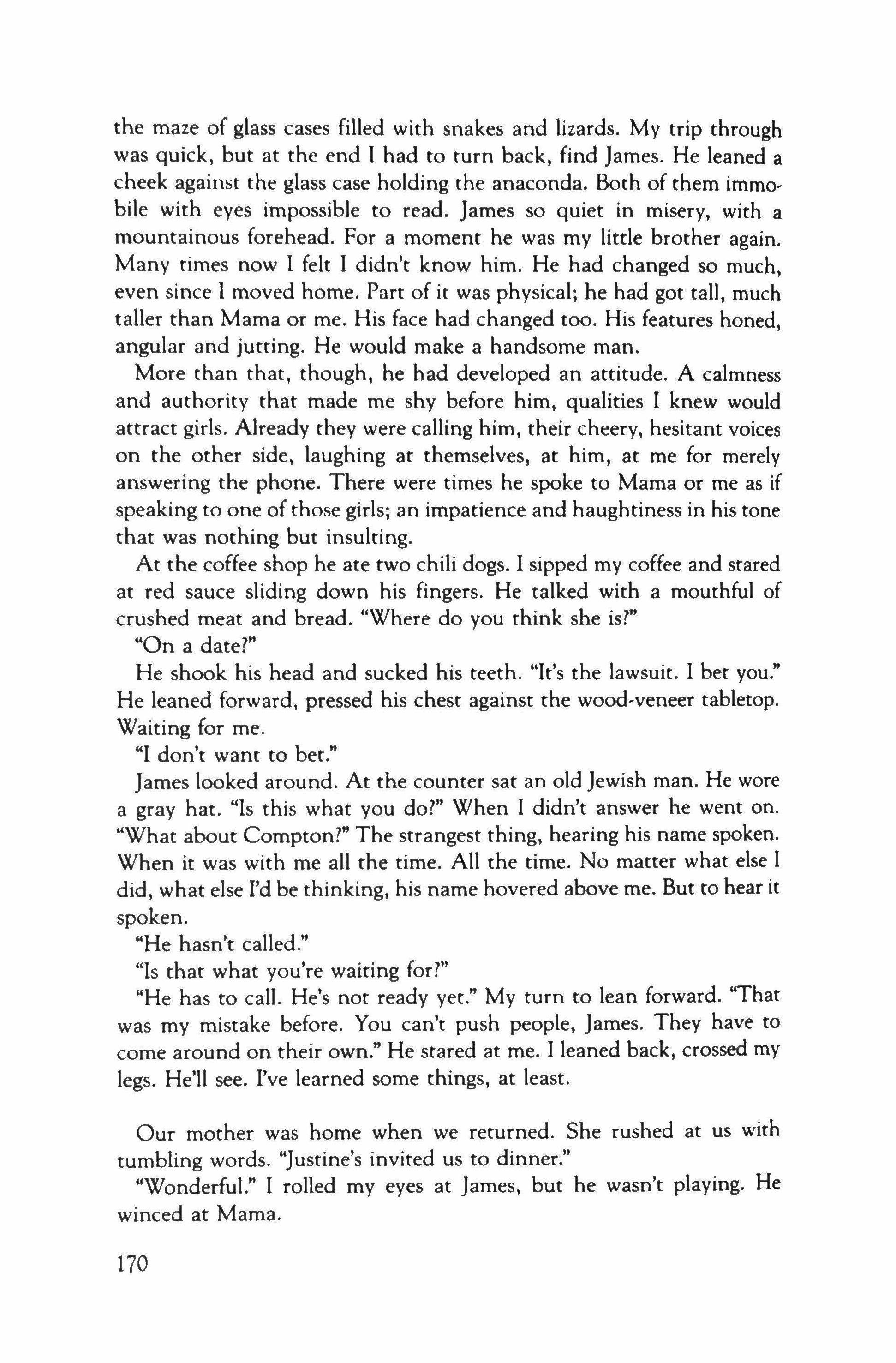
the maze of glass cases filled with snakes and lizards. My trip through was quick, but at the end I had to turn back, find James. He leaned a cheek against the glass case holding the anaconda. Both of them immobile with eyes impossible to read. James so quiet in misery, with a mountainous forehead. For a moment he was my little brother again. Many times now I felt I didn't know him. He had changed so much, even since I moved home. Part of it was physical; he had got tall, much taller than Mama or me. His face had changed too. His features honed, angular and jutting. He would make a handsome man.
More than that, though, he had developed an attitude. A calmness and authority that made me shy before him, qualities I knew would attract girls. Already they were calling him, their cheery, hesitant voices on the other side, laughing at themselves, at him, at me for merely answering the phone. There were times he spoke to Mama or me as if speaking to one of those girls; an impatience and haughtiness in his tone that was nothing but insulting.
At the coffee shop he ate two chili dogs. I sipped my coffee and stared at red sauce sliding down his fingers. He talked with a mouthful of crushed meat and bread. "Where do you think she is?"
"On a date?"
He shook his head and sucked his teeth. "It's the lawsuit. I bet you." He leaned forward, pressed his chest against the wood-veneer tabletop. Waiting for me.
"I don't want to bet."
James looked around. At the counter sat an old Jewish man. He wore a gray hat. "Is this what you do?" When I didn't answer he went on. "What about Compton?" The strangest thing, hearing his name spoken. When it was with me all the time. All the time. No matter what else I did, what else I'd be thinking, his name hovered above me. But to hear it spoken.
"He hasn't called."
"Is that what you're waiting for?"
"He has to call. He's not ready yet." My turn to lean forward. "That was my mistake before. You can't push people, James. They have to come around on their own." He stared at me. I leaned back, crossed my legs. He'll see. I've learned some things, at least.
Our mother was home when we returned. She rushed at us with tumbling words. "Justine's invited us to dinner."
"Wonderful." I rolled my eyes at James, but he wasn't playing. He winced at Mama.
170
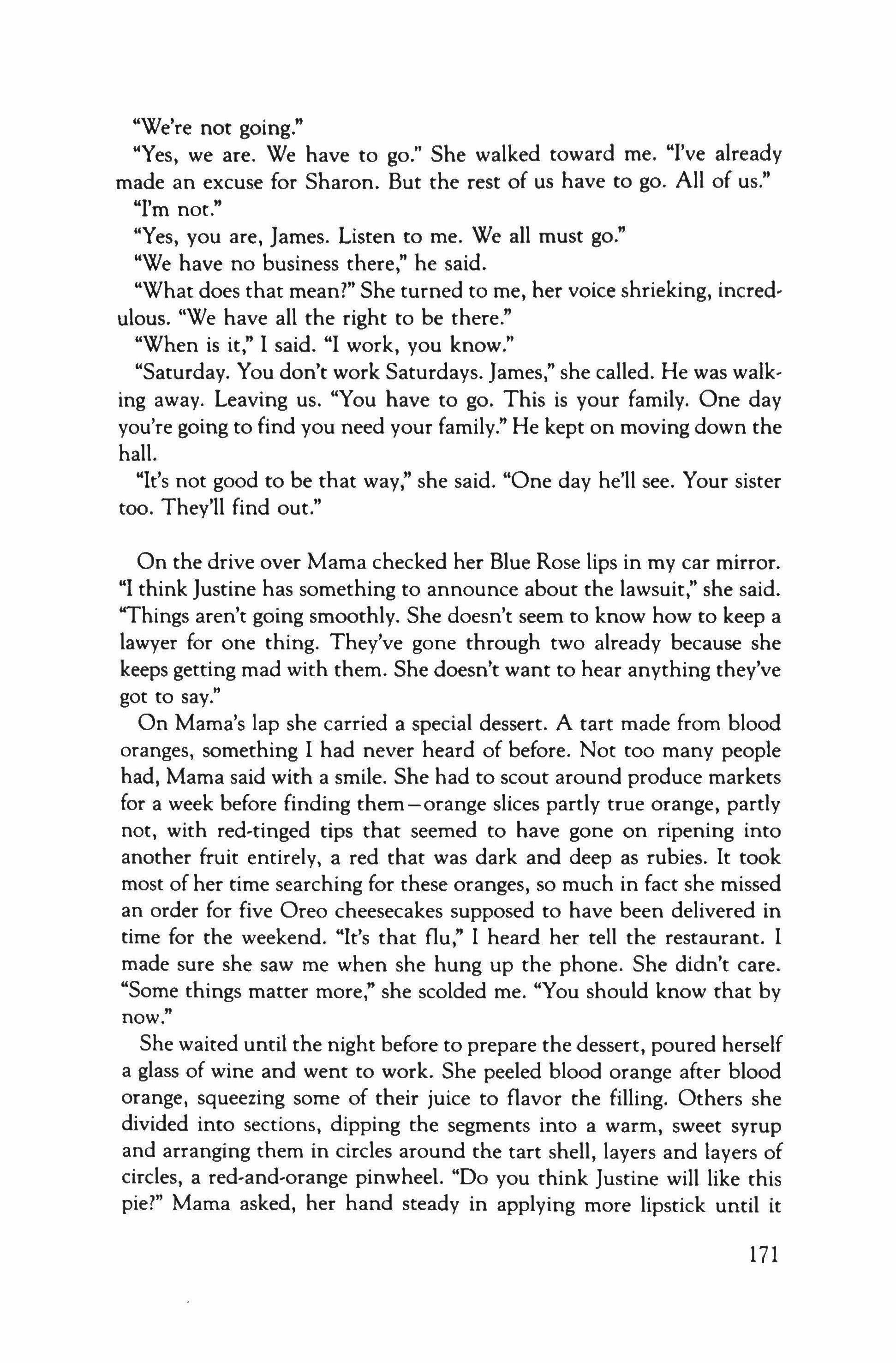
"We're not going."
"Yes, we are. We have to go." She walked toward me. "I've already made an excuse for Sharon. But the rest of us have to go. All of us."
"I'm not."
"Yes, you are, James. Listen to me. We all must go."
"We have no business there," he said.
"What does that mean?" She turned to me, her voice shrieking, incredulous. "We have all the right to be there."
"When is it," I said. "I work, you know."
"Saturday. You don't work Saturdays. James," she called. He was walking away. Leaving us. "You have to go. This is your family. One day you're going to find you need your family." He kept on moving down the hall.
"It's not good to be that way," she said. "One day he'll see. Your sister too. They'll find out."
On the drive over Mama checked her Blue Rose lips in my car mirror. "I think Justine has something to announce about the lawsuit," she said. "Things aren't going smoothly. She doesn't seem to know how to keep a lawyer for one thing. They've gone through two already because she keeps getting mad with them. She doesn't want to hear anything they've got to say."
On Mama's lap she carried a special dessert. A tart made from blood oranges, something I had never heard of before. Not too many people had, Mama said with a smile. She had to scout around produce markets for a week before finding them-orange slices partly true orange, partly not, with red-tinged tips that seemed to have gone on ripening into another fruit entirely, a red that was dark and deep as rubies. It took most of her time searching for these oranges, so much in fact she missed an order for five Oreo cheesecakes supposed to have been delivered in time for the weekend. "It's that flu," I heard her tell the restaurant. I made sure she saw me when she hung up the phone. She didn't care. "Some things matter more," she scolded me. "You should know that by now."
She waited until the night before to prepare the dessert, poured herself a glass of wine and went to work. She peeled blood orange after blood orange, squeezing some of their juice to flavor the filling. Others she divided into sections, dipping the segments into a warm, sweet syrup and arranging them in circles around the tart shell, layers and layers of circles, a red-and-orange pinwheel. "Do you think Justine will like this pie?" Mama asked, her hand steady in applying more lipstick until it
171
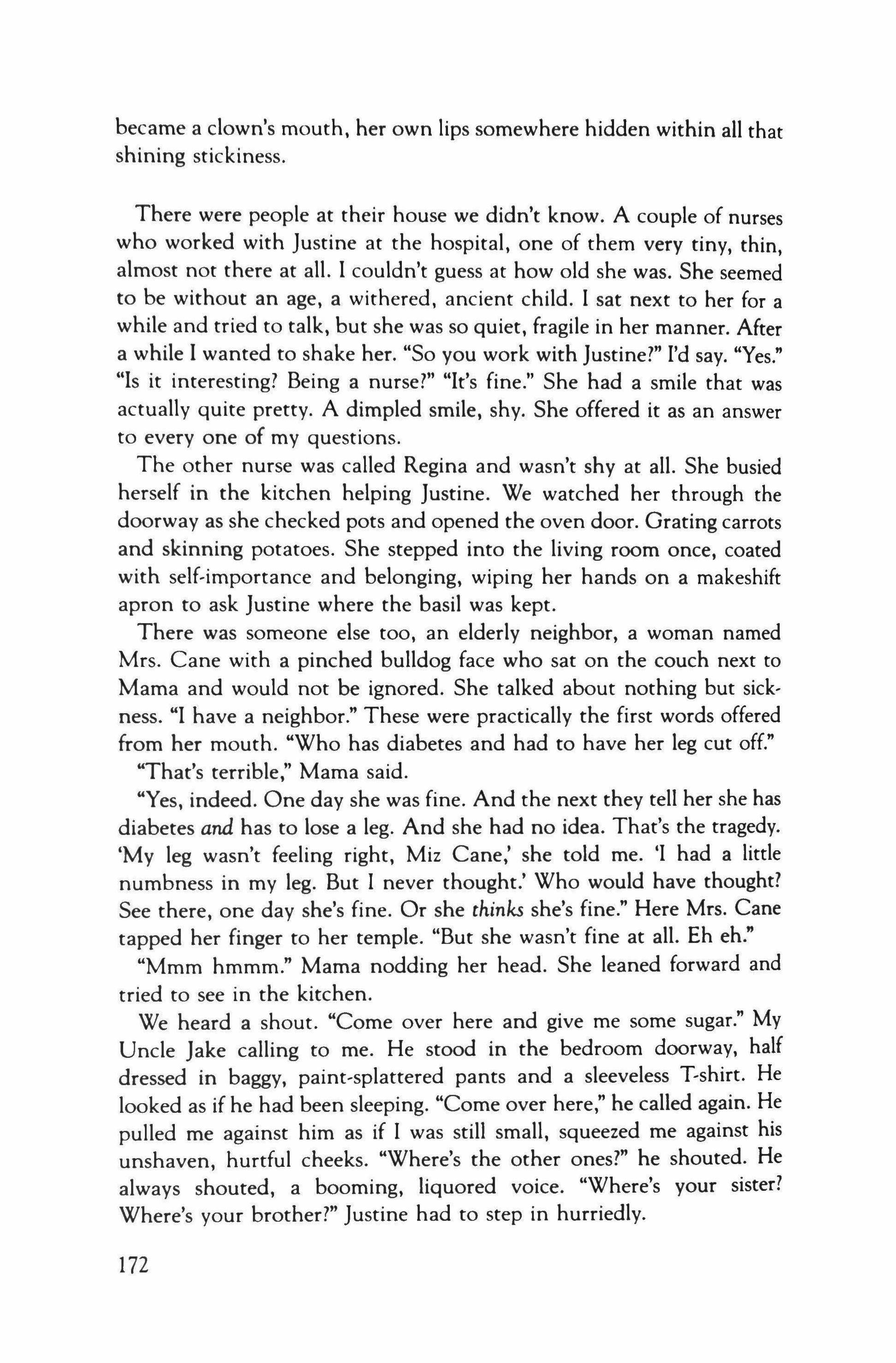
became a clown's mouth. her own lips somewhere hidden within all that shining stickiness.
There were people at their house we didn't know. A couple of nurses who worked with Justine at the hospital. one of them very tiny, thin, almost not there at all. I couldn't guess at how old she was. She seemed to be without an age, a withered. ancient child. I sat next to her for a while and tried to talk, but she was so quiet, fragile in her manner. After a while I wanted to shake her. "So you work with Justine?" I'd say. "Yes." "Is it interesting? Being a nurse?" "It's fine." She had a smile that was actually quite pretty. A dimpled smile, shy. She offered it as an answer to everyone of my questions.
The other nurse was called Regina and wasn't shy at all. She busied herself in the kitchen helping Justine. We watched her through the doorway as she checked pots and opened the oven door. Grating carrots and skinning potatoes. She stepped into the living room once, coated with self-importance and belonging, wiping her hands on a makeshift apron to ask Justine where the basil was kept.
There was someone else too, an elderly neighbor, a woman named Mrs. Cane with a pinched bulldog face who sat on the couch next to Mama and would not be ignored. She talked about nothing but sickness. "I have a neighbor." These were practically the first words offered from her mouth. "Who has diabetes and had to have her leg cut off."
"That's terrible," Mama said.
"Yes, indeed. One day she was fine. And the next they tell her she has diabetes and has to lose a leg. And she had no idea. That's the tragedy. 'My leg wasn't feeling right, Miz Cane,' she told me. 'I had a little numbness in my leg. But I never thought.' Who would have thought? See there, one day she's fine. Or she thinks she's fine." Here Mrs. Cane tapped her finger to her temple. "But she wasn't fine at all. Eh eh," "Mmm hmmrn," Mama nodding her head. She leaned forward and tried to see in the kitchen.
We heard a shout. "Come over here and give me some sugar." My Uncle Jake calling to me. He stood in the bedroom doorway, half dressed in baggy, paint-splattered pants and a sleeveless T-shirt. He looked as if he had been sleeping. "Come over here," he called again. He pulled me against him as if I was still small, squeezed me against his unshaven, hurtful cheeks. "Where's the other ones?" he shouted. He always shouted, a booming, liquored voice. "Where's your sister? Where's your brother?" Justine had to step in hurriedly.
172
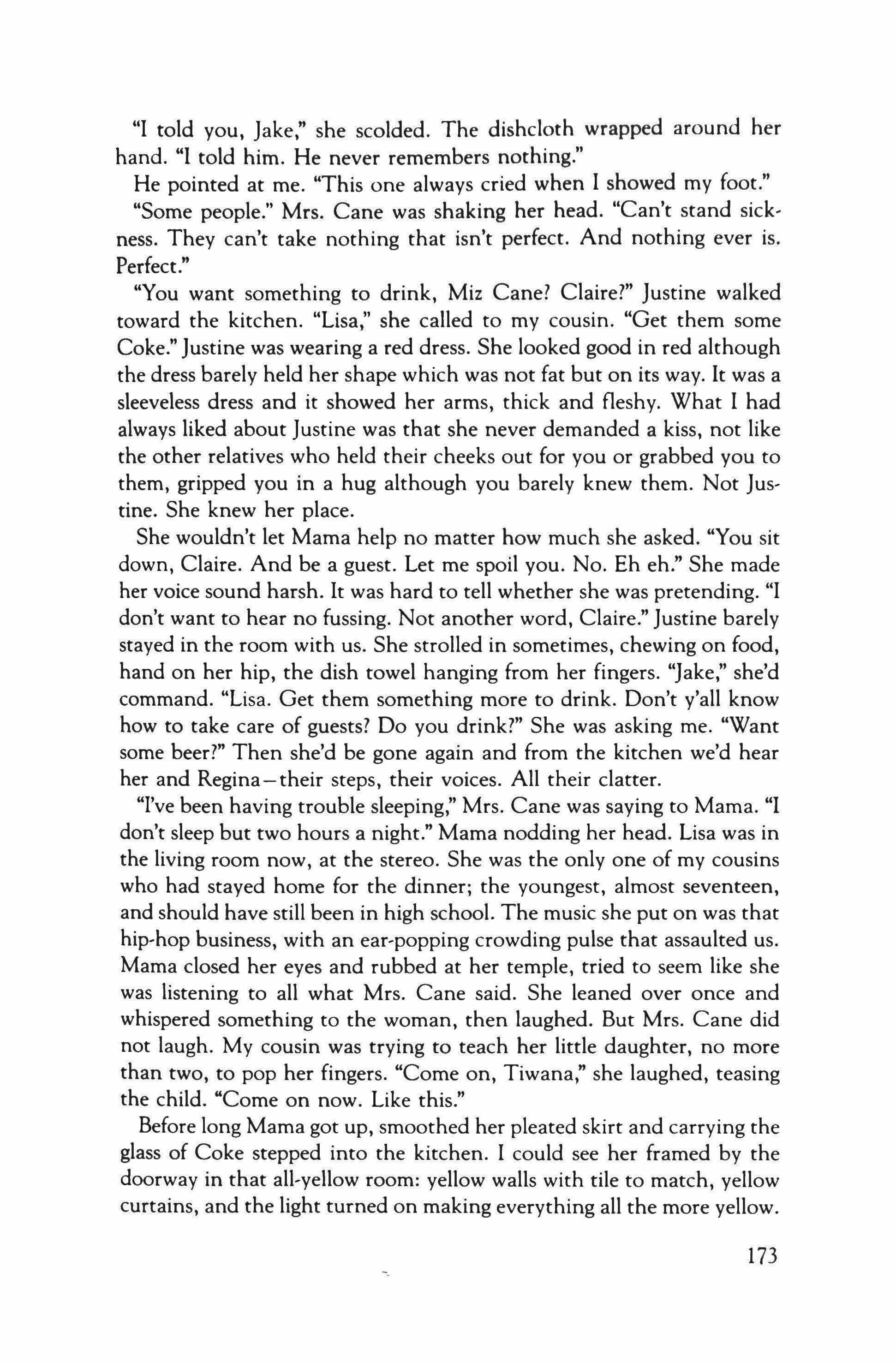
"I told you, Jake," she scolded. The dishcloth wrapped around her hand. "I told him. He never remembers nothing." He pointed at me. "This one always cried when I showed my foot."
"Some people." Mrs. Cane was shaking her head. "Can't stand sickness. They can't take nothing that isn't perfect. And nothing ever is. Perfect."
"You want something to drink, Miz Cane? Claire?" Justine walked toward the kitchen. "Lisa," she called to my cousin. "Get them some Coke." Justine was wearing a red dress. She looked good in red although the dress barely held her shape which was not fat but on its way. It was a sleeveless dress and it showed her arms, thick and fleshy. What I had always liked about Justine was that she never demanded a kiss, not like the other relatives who held their cheeks out for you or grabbed you to them, gripped you in a hug although you barely knew them. Not Justine. She knew her place.
She wouldn't let Mama help no matter how much she asked. "You sit down, Claire. And be a guest. Let me spoil you. No. Eh eh." She made her voice sound harsh. It was hard to tell whether she was pretending. "I don't want to hear no fussing. Not another word, Claire." Justine barely stayed in the room with us. She strolled in sometimes, chewing on food, hand on her hip, the dish towel hanging from her fingers. "Jake," she'd command. "Lisa. Get them something more to drink. Don't y'all know how to take care of guests? Do you drink?" She was asking me. "Want some beer?" Then she'd be gone again and from the kitchen we'd hear her and Regina-their steps, their voices. All their clatter.
"I've been having trouble sleeping," Mrs. Cane was saying to Mama. "I don't sleep but two hours a night." Mama nodding her head. Lisa was in the living room now, at the stereo. She was the only one of my cousins who had stayed home for the dinner; the youngest, almost seventeen, and should have still been in high school. The music she put on was that hip-hop business, with an ear-popping crowding pulse that assaulted us. Mama closed her eyes and rubbed at her temple, tried to seem like she was listening to all what Mrs. Cane said. She leaned over once and whispered something to the woman, then laughed. But Mrs. Cane did not laugh. My cousin was trying to teach her little daughter, no more than two, to pop her fingers. "Come on, Tiwana," she laughed, teasing the child. "Come on now. Like this."
Before long Mama got up, smoothed her pleated skirt and carrying the glass of Coke stepped into the kitchen. I could see her framed by the doorway in that all-yellow room: yellow walls with tile to match, yellow curtains, and the light turned on making everything all the more yellow.
173
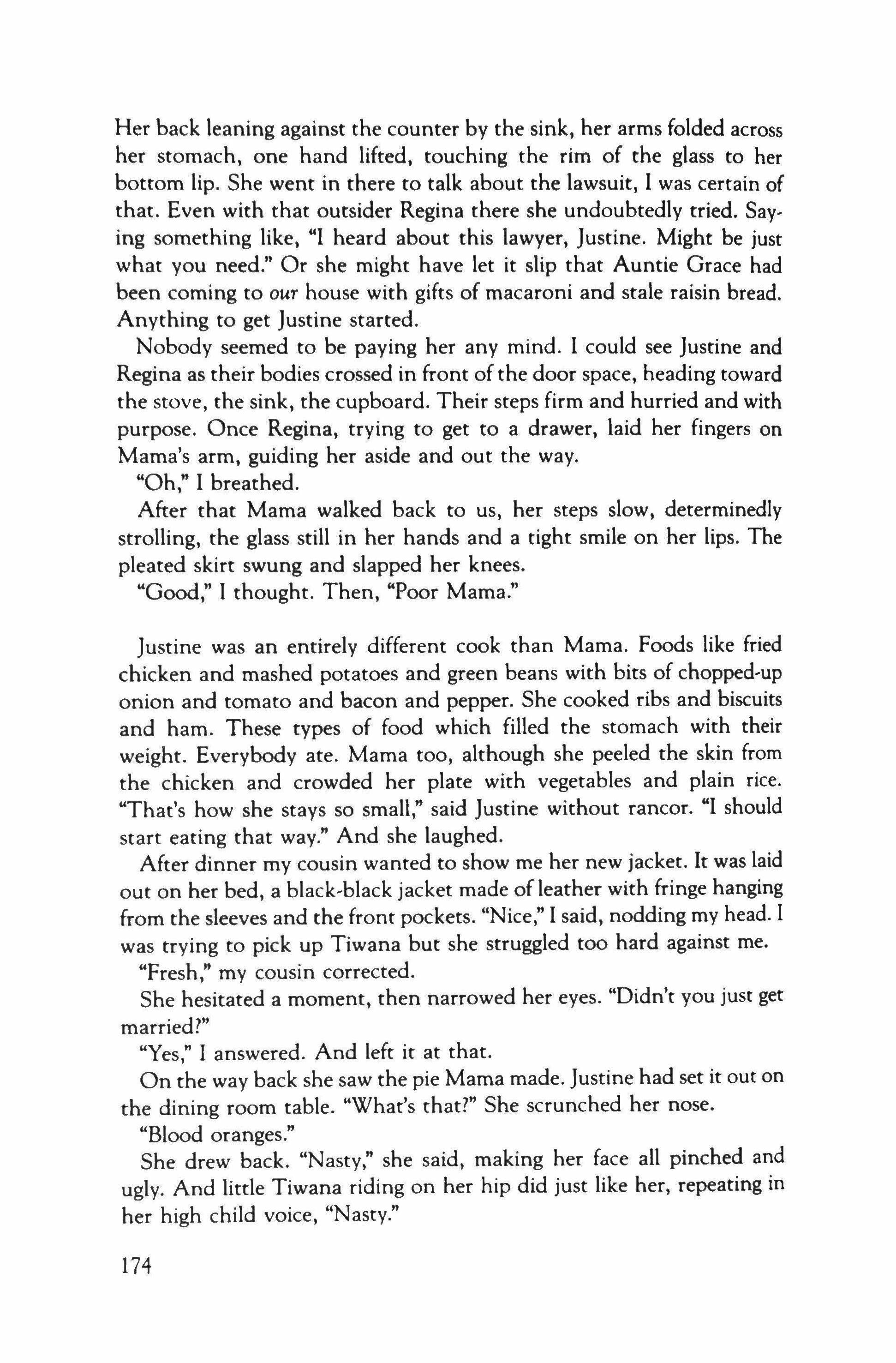
Her back leaning against the counter by the sink, her arms folded across her stomach, one hand lifted, touching the rim of the glass to her bottom lip. She went in there to talk about the lawsuit, I was certain of that. Even with that outsider Regina there she undoubtedly tried. Say. ing something like, "I heard about this lawyer, Justine. Might be just what you need." Or she might have let it slip that Auntie Grace had been coming to our house with gifts of macaroni and stale raisin bread. Anything to get Justine started.
Nobody seemed to be paying her any mind. I could see Justine and Regina as their bodies crossed in front of the door space, heading toward the stove, the sink, the cupboard. Their steps firm and hurried and with purpose. Once Regina, trying to get to a drawer, laid her fingers on Mama's arm, guiding her aside and out the way.
"Oh," I breathed.
After that Mama walked back to us, her steps slow, determinedly strolling, the glass still in her hands and a tight smile on her lips. The pleated skirt swung and slapped her knees.
"Good," I thought. Then, "Poor Mama."
Justine was an entirely different cook than Mama. Foods like fried chicken and mashed potatoes and green beans with bits of chopped-up onion and tomato and bacon and pepper. She cooked ribs and biscuits and ham. These types of food which filled the stomach with their weight. Everybody ate. Mama too, although she peeled the skin from the chicken and crowded her plate with vegetables and plain rice. "That's how she stays so small," said Justine without rancor. "I should start eating that way." And she laughed.
After dinner my cousin wanted to show me her new jacket. It was laid out on her bed, a black-black jacket made of leather with fringe hanging from the sleeves and the front pockets. "Nice," 1 said, nodding my head. I was trying to pick up Tiwana but she struggled too hard against me.
"Fresh," my cousin corrected.
She hesitated a moment, then narrowed her eyes. "Didn't you just get married?"
"Yes," I answered. And left it at that.
On the way back she saw the pie Mama made. Justine had set it out on the dining room table. "What's that?" She scrunched her nose.
"Blood oranges."
She drew back. "Nasty," she said, making her face all pinched and ugly. And little Tiwana riding on her hip did just like her, repeating in her high child voice, "Nasty."
174

No one ate the pie. They all said their stomachs were too full to take a bite of anything else, even something that looked so delicious. Mama couldn't let it go. She talked of nothing else on the ride home. "Well, Mama. It was a big meal," 1 tried to calm her. "I'm still stuffed."
"Justine didn't even cut the tart."
"Everybody said they were full. There wasn't any use in cutting it."
Mama had her arms folded and for the most part kept her face turned from me, looking out the window. Every so often she would swing around, jerk her head toward me. At these times, when she faced me, her words became harder, louder, sharper. Like punches. "I don't know WHY 1 even tried. Grace was right. YES. YOU SEE? They don't appreciate NarHING."
Finally she fell quiet. We were almost home when she turned to me once again. This time her voice different. Mournful.
"We should have brought the tart home," she said. "She'll just throw it in the trash."
"No, Mama." Although 1 knew what she said was the truth. "She wouldn't."
She shut her eyes and leaned her head back. "I should have made something else," she said. "A peach cobbler. Or a chocolate cake. That's what I should have done." Her eyes closed like that I would have thought she was asleep. A restful sleep, without any dreams.
Justine called Mama with the news. They were being evicted. Auntie Grace evicting Uncle Jake and his family. It had come to this.
The call came two weeks after the dinner. For that long James and I heard barely a word about the lawsuit. We assumed it was finished. For Mama. We were sure everything had been set right again.
I answered the phone. I heard Justine's voice, angry and hysterical and commanding, "Where's your Mama? Let me talk to Claire." A sheriff delivered the notice. He came to the front door for all the neighborhood to see.
"No," Mama was saying. "I can't believe."
("She'll call Auntie Grace right after she hangs up," James bent and whispered. He walked across the kitchen to tell me that. "She'll call Auntie Grace and say, 'I don't blame you. Not a bit.' He made his tone sing-song. Brutal. I moved my head away.)
For a long while she didn't speak. And then, "Well, we'll have to see, Justine. We'll see." Her last words, "Don't worry."
She didn't make a move to dial Auntie Grace. She narrowed her eyes and took some steps toward James and me. She spoke in a serious
175

manner. "We were the first ones Justine called. Your Uncle Jake and them need our help." She crossed the floor. All of us now gathered at the kitchen table. Everyone of her movements was coated with importance. Every pause spoke of family disaster, family unity. Every somber look said, "We Must Pull Together."
"They don't have no lawyer. Justine never did get no lawyer." This was how she spoke. Justine's influence. "They have to get one now. And she don't know how. She's not prepared for something like this. They need help." She leaned toward us and raised a brown penciled eyebrow. "They need us. She asked for our help."
I watched her for a long time. And then I knew. "Did Justine ask you for money?" I yelped. "She wants you to give her money?"
"See?!" James raised his hands up and turned his back. He took thudding steps across the kitchen. "She's gone crazy."
"Don't you talk about me that way. I'm standing right here."
"Mama?" I said. I tried to keep my voice calm. I tried very hard. "You're not giving Justine money?"
"I didn't say I was. I said I'd have to see."
"Mama." I said. "How much money?"
The way she looked at me. What did she expect of me? I shook my head and stared right back. "How much, Mama?"
"Lawyers are expensive. You know that."
"This has gone too far. Too far." James looked at me in an accusing way.
"They need help. It would be good for this family to help somebody." Then Mama changed tactics. "It's my money. This is my money you're trying to boss around. Who baked all those cakes and cookies and pastries? Huh? Who do you think you are to tell me what to do with my money?"
"We have no say at all?" James asked.
"Of course not, babies. I want us to talk about this. A family should be able to sit down and discuss without shouting."
"Mama." I stared at her hard, sought to pull her to me with my gaze. Her ugly fingers were on the table. I should have reached out and held them. Looking back now that is what I should have done. "You're not really thinking of giving Uncle Jake our money, are you? You're not going in that deep, are you? James is right. This has gone far enough."
"I'm thinking. I was just thinking about it, that's all."
She went on to her cakes. Started pulling pots out from cupboards. Milk and butter and eggs. All without seeing, I could tell. She moved without thought. She had done this for so long, nearly every day for ten
176

years since our father died. She busied herself with baking her sweets. No heart in it at all. Sitting at that kitchen table, watching her like this, was pulling me down with her.
James stayed on my heels. "Didn't I tell you? See? Didn't I try to tell you?" I kept walking. "Lenora?" I heard. I didn't want any more to do with it. Let her give her money if she wanted. Let her be the fool. It had nothing to do with me. I swung around to tell him. "Let me be," I would have said. "I want no part of it."
"Tell me again. What was Daddy like?" What could I do? But repeat my stories about spaghetti and little toy animals. About the wedding march. We heard her, I don't know how. Because she made no real sound. She didn't say a word. But she was there, we knew. She stood beneath the archway, arms folded. She was nodding her head.
"Tell me," James said. It startled her, and she reached a hand to her curls, leaving powdery marks of flour.
"Let me see," she said. "He worked hard. At school. he studied all the time. And then when he opened the office. He had to be there a lot. He always worked hard." I watched the traces of flour on her. On her hair, her hips, on her right shoulder where she rested her fingertips. "He was a clean man. Meticulous. I had to be so careful ironing his shirts. He was fussy about the way they looked. I spent a long time ironing so they would be perfect. Perfect."
"How -" She interrupted me.
"He liked pig's feet. Pickled pig's feet. He got you to eat them, Lenora. You wouldn't think of eating them now, but you did when you were little. You ate whatever he ate."
"How did you meet?" Things like this we should have been told long ago. Oh, I had more questions waiting. I had no idea so many questions. Did you love each other? The same as at first? And what if he had lived, where would you be now? Where would we all be?
"We met." She closed her eyes. "In a library. Downtown. He was reading. Studying. And I marched over and sat at his table, right across from him. Well, he didn't notice me. Or acted like he didn't. And finally I said something. It must have been something bold because his eyes went big. I remember him laughing." She opened her eyes. Her eyes were happy. "I used to be friendlier. I used to be able to do things like that, walk up to somebody I didn't know. One time when I was small new neighbors moved in across the street from our house. They hadn't been there half an hour. I mean they were moving their furniture and things in and I tell you, babies, that I crossed that street. I walked right through their back door into their kitchen among all the boxes and chaos and
177
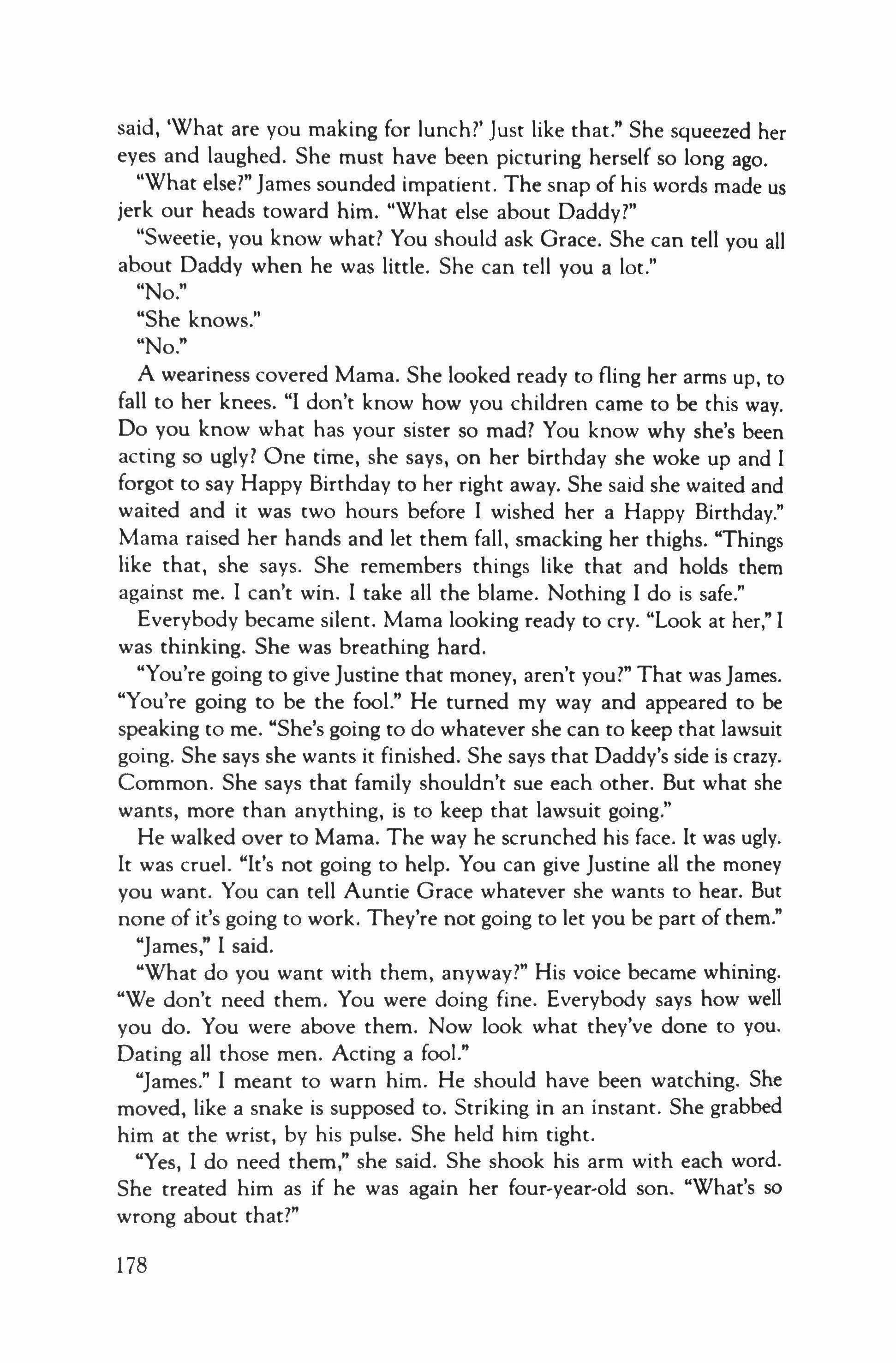
said, 'What are you making for lunch?' Just like that." She squeezed her eyes and laughed. She must have been picturing herself so long ago. "What else?" James sounded impatient. The snap of his words made us jerk our heads toward him. "What else about Daddy?"
"Sweetie, you know what? You should ask Grace. She can tell you all about Daddy when he was little. She can tell you a lot." "No."
"She knows." "No."
A weariness covered Mama. She looked ready to fling her arms up, to fall to her knees. "I don't know how you children came to be this way. Do you know what has your sister so mad? You know why she's been acting so ugly? One time, she says, on her birthday she woke up and I forgot to say Happy Birthday to her right away. She said she waited and waited and it was two hours before I wished her a Happy Birthday." Mama raised her hands and let them fall, smacking her thighs. "Things like that, she says. She remembers things like that and holds them against me. 1 can't win. I take all the blame. Nothing I do is safe."
Everybody became silent. Mama looking ready to cry. "Look at her," 1 was thinking. She was breathing hard.
"You're going to give Justine that money, aren't you?" That was James. "You're going to be the fooL" He turned my way and appeared to be speaking to me. "She's going to do whatever she can to keep that lawsuit going. She says she wants it finished. She says that Daddy's side is crazy. Common. She says that family shouldn't sue each other. But what she wants, more than anything, is to keep that lawsuit going."
He walked over to Mama. The way he scrunched his face. It was ugly. It was cruel. "It's not going to help. You can give Justine all the money you want. You can tell Auntie Grace whatever she wants to hear. But none of it's going to work. They're not going to let you be part of them."
"James," 1 said.
"What do you want with them, anyway?" His voice became whining. "We don't need them. You were doing fine. Everybody says how well you do. You were above them. Now look what they've done to you.
Dating all those men. Acting a fool."
"James." 1 meant to warn him. He should have been watching. She moved, like a snake is supposed to. Striking in an instant. She grabbed him at the wrist, by his pulse. She held him tight.
"Yes, 1 do need them," she said. She shook his arm with each word. She treated him as if he was again her four-year-old son. "What's so wrong about that?"
178
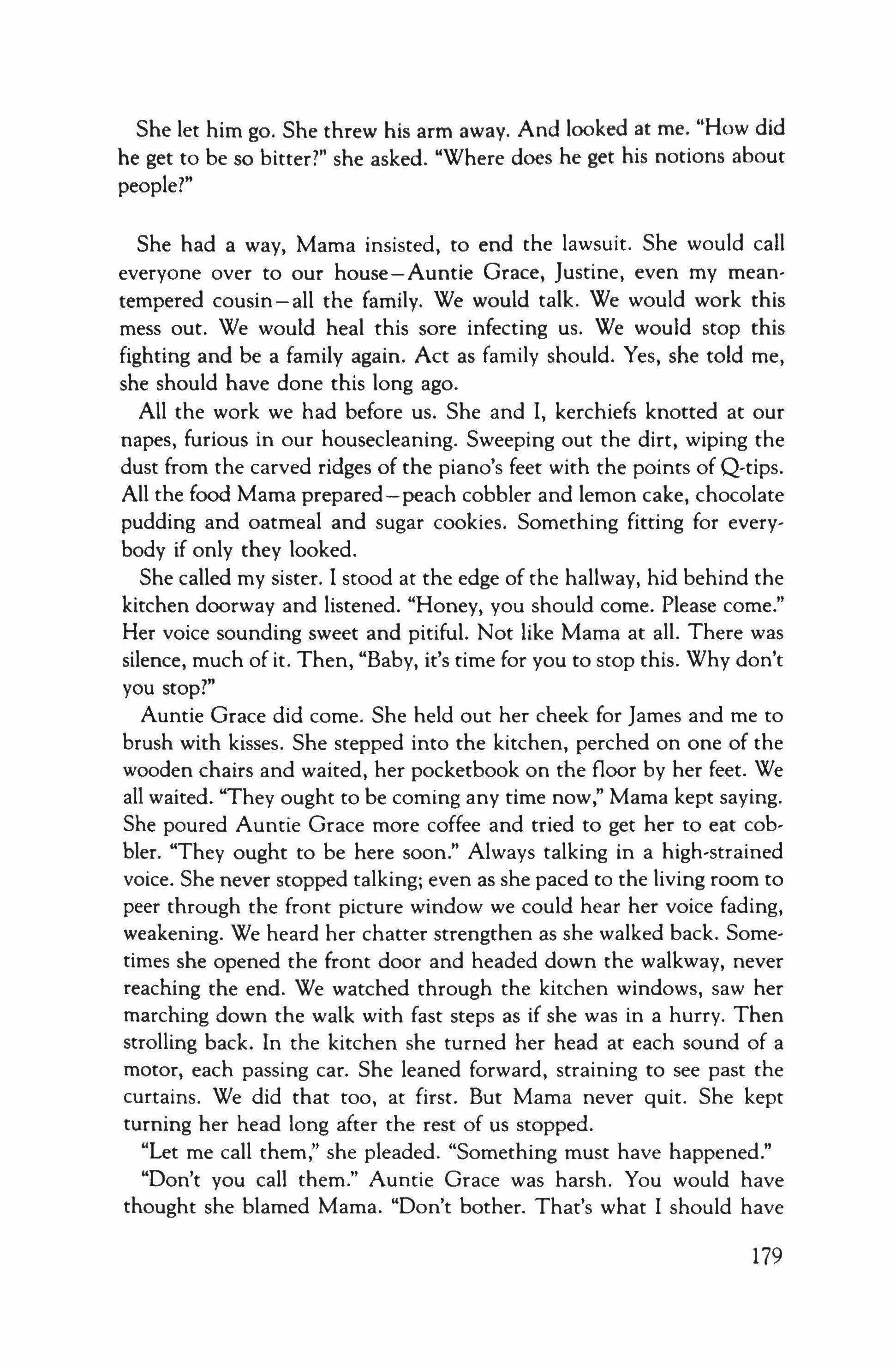
She let him go. She threw his arm away. And looked at me. "How did he get to be so bitter?" she asked. "Where does he get his notions about people?"
She had a way, Mama insisted, to end the lawsuit. She would call everyone over to our house-Auntie Grace, Justine, even my meantempered cousin-all the family. We would talk. We would work this mess out. We would heal this sore infecting us. We would stop this fighting and be a family again. Act as family should. Yes, she told me, she should have done this long ago.
All the work we had before us. She and I, kerchiefs knotted at our napes, furious in our housecleaning. Sweeping out the dirt, wiping the dust from the carved ridges of the piano's feet with the points of Q-tips. All the food Mama prepared-peach cobbler and lemon cake, chocolate pudding and oatmeal and sugar cookies. Something fitting for everybody if only they looked.
She called my sister. I stood at the edge of the hallway, hid behind the kitchen doorway and listened. "Honey, you should come. Please come." Her voice sounding sweet and pitiful. Not like Mama at all. There was silence, much of it. Then, "Baby, it's time for you to stop this. Why don't you stop?"
Auntie Grace did come. She held out her cheek for James and me to brush with kisses. She stepped into the kitchen, perched on one of the wooden chairs and waited, her pocketbook on the floor by her feet. We all waited. "They ought to be coming any time now," Mama kept saying. She poured Auntie Grace more coffee and tried to get her to eat cobbler. "They ought to be here soon." Always talking in a high-strained voice. She never stopped talking; even as she paced to the living room to peer through the front picture window we could hear her voice fading, weakening. We heard her chatter strengthen as she walked back. Sometimes she opened the front door and headed down the walkway, never reaching the end. We watched through the kitchen windows, saw her marching down the walk with fast steps as if she was in a hurry. Then strolling back. In the kitchen she turned her head at each sound of a motor, each passing car. She leaned forward, straining to see past the curtains. We did that too, at first. But Mama never quit. She kept turning her head long after the rest of us stopped.
"Let me call them," she pleaded. "Something must have happened."
"Don't you call them." Auntie Grace was harsh. You would have thought she blamed Mama. "Don't bother. That's what I should have
179

learned by now. Ha. That should have been my lesson by now. Not to bother."
"I should call." Mama walked to the window again. "Something has happened. Maybe Jake got sick. If you wait. Please wait."
Auntie Grace held her purse in her hands. "They did this to humiliate me. They don't have a home of their own. They don't have nothing. Nothing." She spit that word at us. "And look how they humiliate me. Disgusting. Nothing but disgusting. You can't do for people. They hate you for it."
Mama ran to the other end of the hallway. We heard the rotary of the phone turning.
"No!" screamed Auntie Grace. She stepped toward Mama. "Don't you call them. I mean it."
Then she noticed Mama's face. She spoke on, puzzled, her tone softening a bit. "They did this against me, Claire. Not you." I walked over to Mama. I put my fingers on her elbow. "Are you all right?" I whispered. "This is nothing against you," Auntie Grace repeated, irritated. She reached out as if to put a hand on Mama, then took it back. "It has nothing to do with you."
"Why do you say that?" Mama cried. "It does too. It has everything to do with me."
"Mama?" I asked again.
At the door James wouldn't let Auntie Grace go. He held his hand on the doorknob and looked down at her, he was taller than all of us now, and asked, "Why didn't you ever help us? Why didn't you ever do for us like you did for Uncle Jake?"
Auntie Grace squinted at him. I walked over and stood close behind her, my hands on my hips. Oh, she wanted so badly to leave. That showed on her face, the way she held her purse squeezed against her breasts. She sighed. "You had your mother." Her words nearly drained of all energy. "Your mother was capable. You all didn't need anything from me."
"That's not true." Mama stood behind me. We hadn't noticed her. She spoke so softly we could barely decipher her words. "Where did you get an idea like that?"
Even James tried to comfort Mama. "You tried," he said. He rubbed her hands, stroked her dry, wrinkled fingers. It seemed now everything would go back to how it was. "Nobody could have tried harder."
She eased her hands away from his hold and put a falseness in her
180
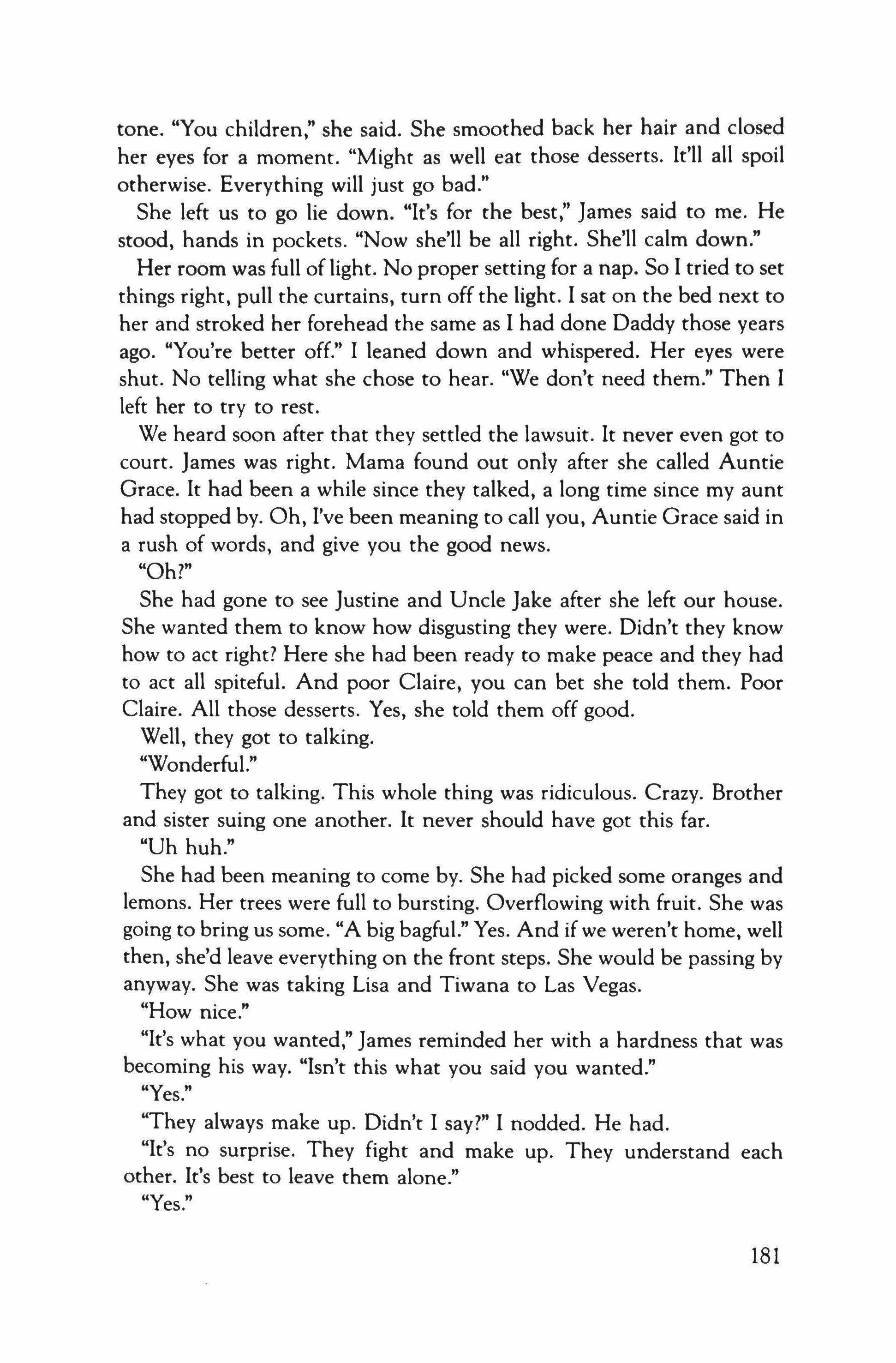
tone. "You children," she said. She smoothed back her hair and closed her eyes for a moment. "Might as well eat those desserts. It'll all spoil otherwise. Everything will just go bad."
She left us to go lie down. "It's for the best," James said to me. He stood, hands in pockets. "Now she'll be all right. She'll calm down."
Her room was full of light. No proper setting for a nap. So I tried to set things right, pull the curtains, turn off the light. I sat on the bed next to her and stroked her forehead the same as I had done Daddy those years ago. "You're better off." I leaned down and whispered. Her eyes were shut. No telling what she chose to hear. "We don't need them." Then I left her to try to rest.
We heard soon after that they settled the lawsuit. It never even got to court. James was right. Mama found out only after she called Auntie Grace. It had been a while since they talked, a long time since my aunt had stopped by. Oh, I've been meaning to call you, Auntie Grace said in a rush of words, and give you the good news.
"Oh?"
She had gone to see Justine and Uncle Jake after she left our house. She wanted them to know how disgusting they were. Didn't they know how to act right? Here she had been ready to make peace and they had to act all spiteful. And poor Claire, you can bet she told them. Poor Claire. All those desserts. Yes, she told them off good.
Well, they got to talking.
"Wonderful."
They got to talking. This whole thing was ridiculous. Crazy. Brother and sister suing one another. It never should have got this far.
"Uh huh."
She had been meaning to come by. She had picked some oranges and lemons. Her trees were full to bursting. Overflowing with fruit. She was going to bring us some. "A big bagful." Yes. And if we weren't home, well then, she'd leave everything on the front steps. She would be passing by anyway. She was taking Lisa and Tiwana to Las Vegas.
"How nice."
"It's what you wanted," James reminded her with a hardness that was becoming his way. "Isn't this what you said you wanted." "Yes."
"They always make up. Didn't I say?" I nodded. He had.
"It's no surprise. They fight and make up. They understand each other. It's best to leave them alone."
"Yes."
181
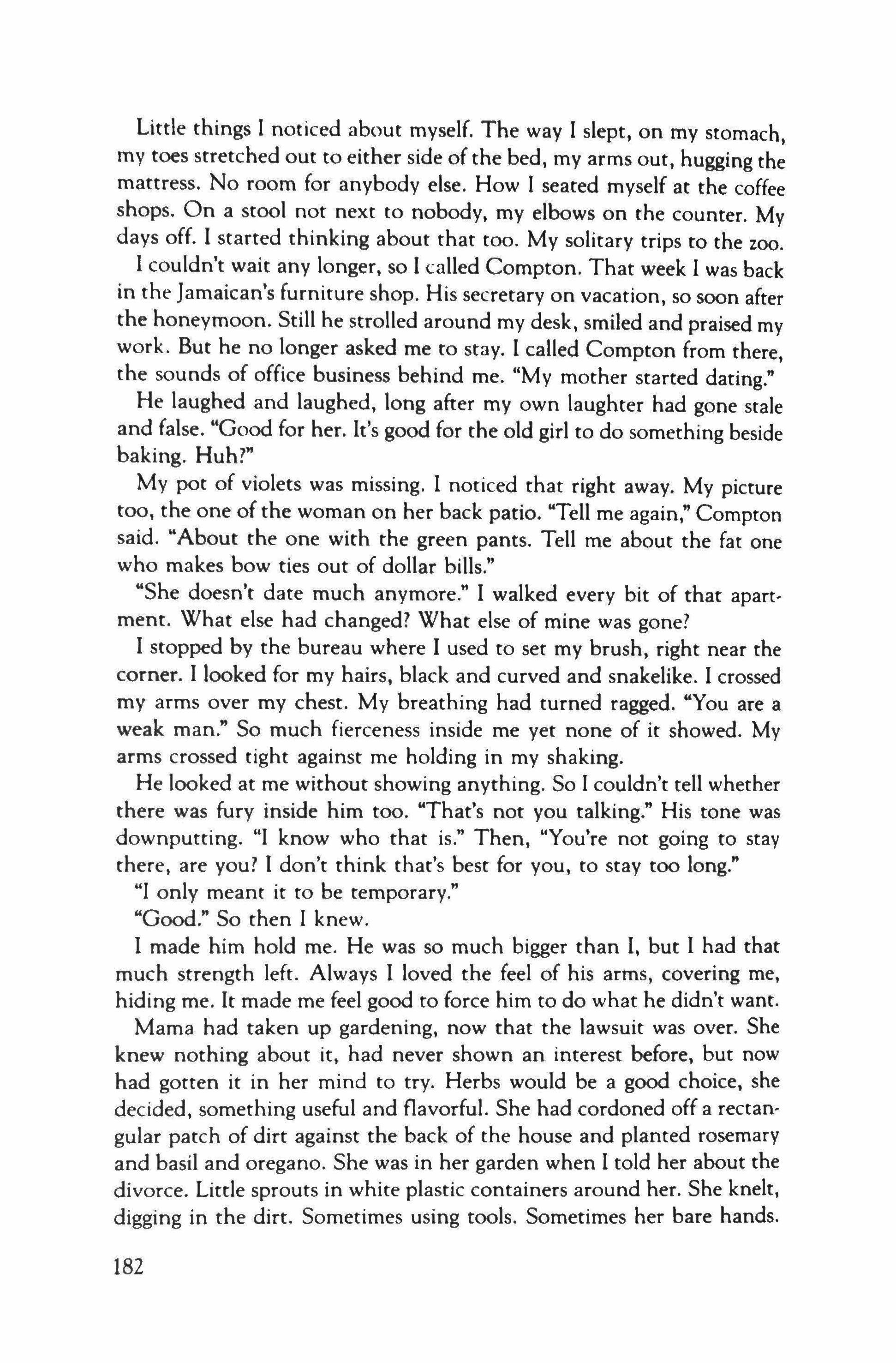
Little things I noticed about myself. The way I slept, on my stomach, my toes stretched out to either side of the bed, my arms out, hugging the mattress. No room for anybody else. How I seated myself at the coffee shops. On a stool not next to nobody, my elbows on the counter. My days off. I started thinking about that too. My solitary trips to the zoo.
I couldn't wait any longer, so I called Compton. That week I was back in the Jamaican's furniture shop. His secretary on vacation, so soon after the honeymoon. Still he strolled around my desk, smiled and praised my work. But he no longer asked me to stay. I called Compton from there, the sounds of office business behind me. "My mother started dating."
He laughed and laughed, long after my own laughter had gone stale and false. "Good for her. It's good for the old girl to do something beside baking. Huh?"
My pot of violets was missing. I noticed that right away. My picture too, the one of the woman on her back patio. "Tell me again," Compton said. "About the one with the green pants. Tell me about the fat one who makes bow ties out of dollar bills."
"She doesn't date much anymore." I walked every bit of that apartment. What else had changed? What else of mine was gone?
I stopped by the bureau where I used to set my brush, right near the corner. I looked for my hairs, black and curved and snakelike. I crossed my arms over my chest. My breathing had turned ragged. "You are a weak man." So much fierceness inside me yet none of it showed. My arms crossed tight against me holding in my shaking.
He looked at me without showing anything. So I couldn't tell whether there was fury inside him too. "That's not you talking." His tone was downputting. "I know who that is." Then, "You're not going to stay there, are you? I don't think that's best for you, to stay too long."
"I only meant it to be temporary."
"Good." So then I knew.
I made him hold me. He was so much bigger than I, but I had that much strength left. Always I loved the feel of his arms, covering me, hiding me. It made me feel good to force him to do what he didn't want.
Mama had taken up gardening, now that the lawsuit was over. She knew nothing about it, had never shown an interest before, but now had gotten it in her mind to try. Herbs would be a good choice, she decided, something useful and flavorful. She had cordoned off a rectangular patch of dirt against the back of the house and planted rosemary and basil and oregano. She was in her garden when I told her about the divorce. Little sprouts in white plastic containers around her. She knelt, digging in the dirt. Sometimes using tools. Sometimes her bare hands.
182
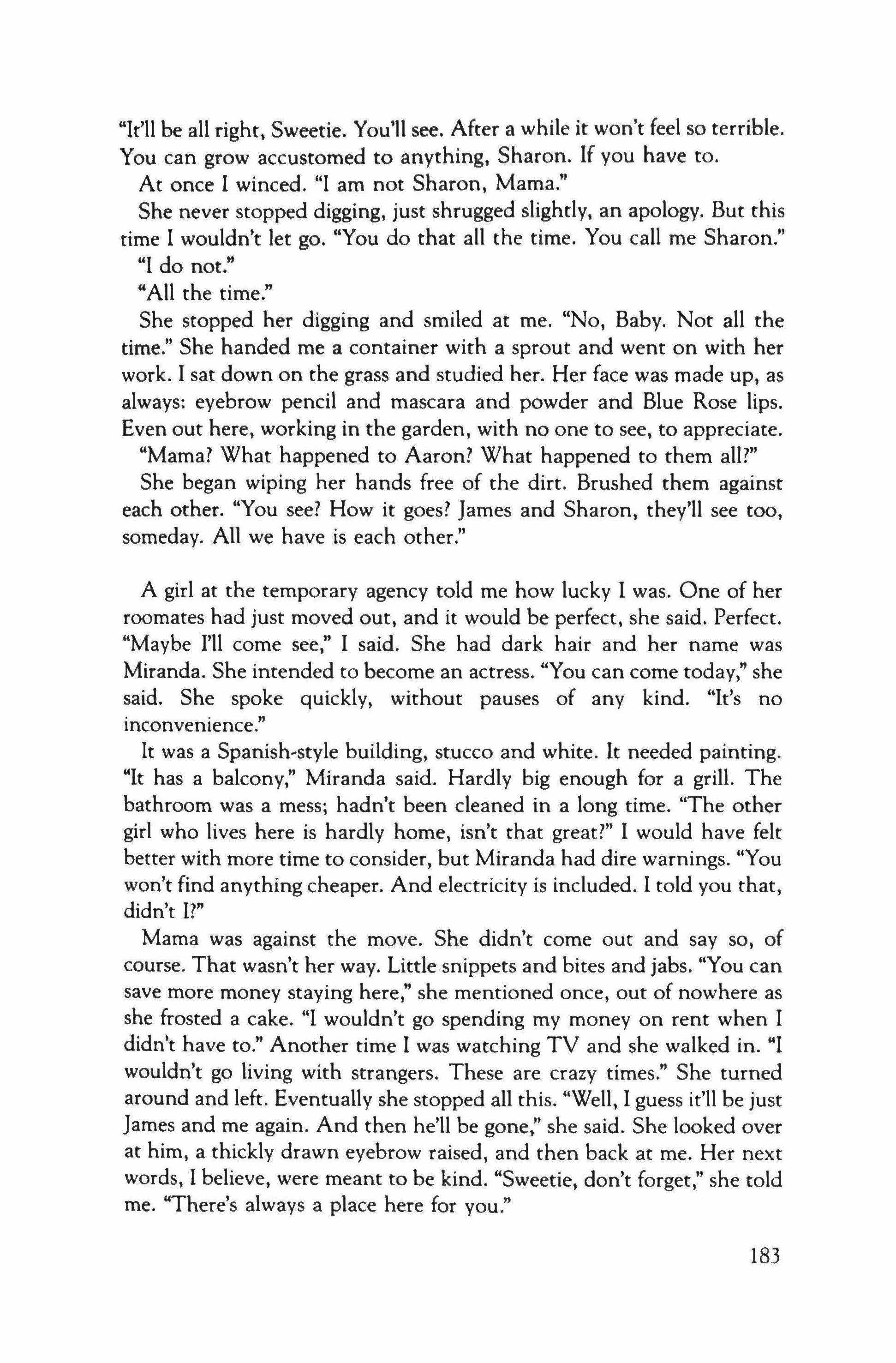
"It'll be all right, Sweetie. You'll see. After a while it won't feel so terrible. You can grow accustomed to anything, Sharon. If you have to.
At once I winced. "I am not Sharon, Mama."
She never stopped digging, just shrugged slightly, an apology. But this time I wouldn't let go. "You do that all the time. You call me Sharon." "I do not."
"All the time."
She stopped her digging and smiled at me. "No, Baby. Not all the time." She handed me a container with a sprout and went on with her work. I sat down on the grass and studied her. Her face was made up, as always: eyebrow pencil and mascara and powder and Blue Rose lips. Even out here, working in the garden, with no one to see, to appreciate. "Mama? What happened to Aaron? What happened to them all?"
She began wiping her hands free of the dirt. Brushed them against each other. "You see? How it goes? James and Sharon, they'll see too, someday. All we have is each other."
A girl at the temporary agency told me how lucky I was. One of her roomates had just moved out, and it would be perfect, she said. Perfect. "Maybe I'll come see," I said. She had dark hair and her name was Miranda. She intended to become an actress. "You can come today," she said. She spoke quickly, without pauses of any kind. "It's no inconvenience."
It was a Spanish-style building, stucco and white. It needed painting. "It has a balcony," Miranda said. Hardly big enough for a grill. The bathroom was a mess; hadn't been cleaned in a long time. "The other girl who lives here is hardly home, isn't that great?" 1 would have felt better with more time to consider, but Miranda had dire warnings. "You won't find anything cheaper. And electricity is included. 1 told you that, didn't l?"
Mama was against the move. She didn't come out and say so, of course. That wasn't her way. Little snippets and bites and jabs. "You can save more money staying here," she mentioned once, out of nowhere as she frosted a cake. "I wouldn't go spending my money on rent when 1 didn't have to." Another time 1 was watching TV and she walked in. "I wouldn't go living with strangers. These are crazy times." She turned around and left. Eventually she stopped all this. "Well, 1 guess it'll be just James and me again. And then he'll be gone," she said. She looked over at him, a thickly drawn eyebrow raised, and then back at me. Her next words, 1 believe, were meant to be kind. "Sweetie, don't forget," she told me. "There's always a place here for you."
183
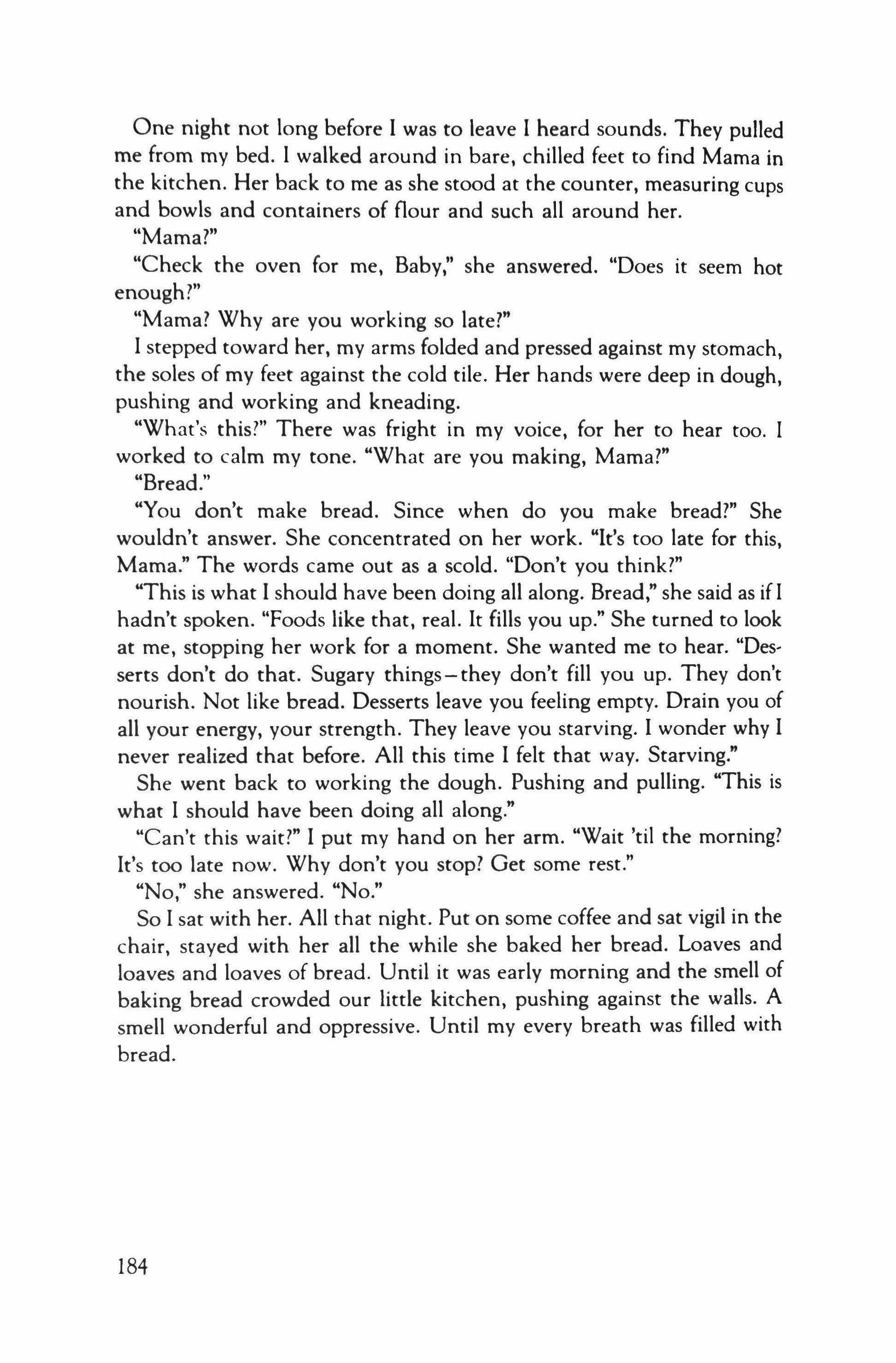
One night not long before I was to leave I heard sounds. They pulled me from my bed. I walked around in bare, chilled feet to find Mama in the kitchen. Her back to me as she stood at the counter, measuring cups and bowls and containers of flour and such all around her.
"Mama?"
"Check the oven for me, Baby," she answered. "Does it seem hot enough?"
"Mama? Why are you working so late?"
I stepped toward her, my arms folded and pressed against my stomach, the soles of my feet against the cold tile. Her hands were deep in dough, pushing and working and kneading.
"What's this?" There was fright in my voice, for her to hear too. worked to calm my tone. "What are you making, Mama?"
"Bread."
"You don't make bread. Since when do you make bread?" She wouldn't answer. She concentrated on her work. "It's too late for this, Mama." The words came out as a scold. "Don't you think?"
"This is what I should have been doing all along. Bread," she said as if I hadn't spoken. "Foods like that, real. It fills you up." She turned to look at me, stopping her work for a moment. She wanted me to hear. "Desserts don't do that. Sugary things - they don't fill you up. They don't nourish. Not like bread. Desserts leave you feeling empty. Drain you of all your energy, your strength. They leave you starving. I wonder why I never realized that before. All this time I felt that way. Starving."
She went back to working the dough. Pushing and pulling. "This is what I should have been doing all along."
"Can't this wait?" I put my hand on her arm. "Wait 'til the morning? It's too late now. Why don't you stop? Get some rest."
"No," she answered. "No."
So I sat with her. All that night. Put on some coffee and sat vigil in the chair, stayed with her all the while she baked her bread. Loaves and loaves and loaves of bread. Until it was early morning and the smell of baking bread crowded our little kitchen, pushing against the walls. A smell wonderful and oppressive. Until my every breath was filled with bread.
184
Sendero Luminoso
Peter Trachtenberg

Undernourishment ran in Terry's family like overbites and fine, wavy hair: he and his brother Phil seemed very frail as they staggered beneath the furniture. With each weaving transit from truck to doorway to the loft four flights above Jane waited for one of them to collapse. There was no one else to help. Everyone they knew was sure to have gone away for the Memorial Day weekend; she hadn't even bothered calling. In the open back of the truck she squatted among their possessions-liquor boxes of books and records, the TV and the stereo, the rosewood bedroom set she'd gotten from her great aunt, which even before the deco boom had been appraised at five thousand dollars. All Terry cared about were his half-dozen paintings, the only things he feared might be stolen. But from Jane's vantage point the whole block simmered with indiscriminate felony. The corner bodega was wrapped in sheets of corrugated steel, and the dark men lounging before it eyed the truck through a quartz-hard lens of polished disinterest. Lower that lens one crack, she imagined, and you'd see little registers ticking off the drug and dollar value of each bureau and nightstand. What was she supposed to do: go off and tell them to just please help themselves?
Still, she felt useless and terribly sorry for Terry, whose T-shirt was now translucent with sweat. He peeled it off, baring a torso as white and bony as a dried seahorse. "Why don't you sit down for a while and let me take over? I'll just pin my hair up."
"I'm O.K." His refusal to let her haul his loads for him was the only thing that reminded her at all of the kind of man she'd been raised to marry, someone you could always count on to carry the groceries. "Tell you what," he said. He gazed at the rubble-strewn lot next door, where two Puerto Rican boys were dribbling a basketball; there was no hoop.
185

IIWe'll get those kids to watch the truck and you can take some of the lighter stuff. Hoy, muchachos!" He took some bills from his wallet.
IIFor Christ's sake, sweetheart!" she hissed, IIWhat are you thinking? In five seconds they'll be auctioning off our clothes!"
"[ane, they're just kids."
"Ter, some of those kids run dope for their big brothers. That's what you told me. You want me to trust a little dope-dealer with everything we own?"
He was about to tell her that dealing drugs was just these people's equivalent of risk arbitrage, she just knew it, but the boys had already trotted over. They had narrow, wedge-shaped faces and eyes that glittered with avarice or drugs or too little to eat. "Hey, mister! You want help?" He looked at them wistfully, but he never argued with her in front of other people and had to be content with giving them three dollars to fetch him a quart of beer.
How Jane and Terry Agreed To Move
Jane wanted to use the money (her bonus, his inheritance from his grandfather) for a summer rental in the Hamptons.
Terry wanted the loft they'd seen on Eldridge Street.
The Hamptons, she thought, would be cool and salty and slow-paced. He could paint; she could finally get some rest for once, do some gardening, write some poems. She hadn't written in a long time.
The Harnprons, he said, would just be a break. Two days, maybe three, out of seven for three months if they were lucky, and afterwards and in between the same jobs, the same subways, the same minuscule Cornellbox of an apartment.
She didn't see anything wrong with a break.
Terry didn't want a break. He wanted space to make art in. He wanted to live somewhere that wasn't terminally lame, like the West Eighties, or the Harnptons, for that matter. Somewhere that wasn't swarming with lawyers and financial analysts with their executive running shoes and their goddamned kiwi fruit. Somewhere where you didn't have to change trains twice to get to the nearest gallery or the nearest dealer.
Jane said it was only one subway line to Soho. Why did he always have to exaggerate?
But if they spent their weekends in the Harnptons, when was he supposed to go to galleries? And how could he spend his weekends
186
among the same people he spent the whole week loathing? It was bad enough he had to work with ad people; he'd rather croak than watch them basting themselves with sun-block every time he looked out the window. He'd end up painting like Bacon.
Jane argued that the loft wasn't all that big or all that cheap. That for all their key money and nine hundred dollars a month they'd be getting a slice of a converted pickle factory, whose decaying brick walls still smelled of brine and which, on top of that, was practically raw. And however unhip the Eighties were, she'd rather be lame than get murdered the first time she went out to buy a quart of milk.
Terry said she sounded like she was still in Savannah; why did she have to be such a belle about everything? And anyway, the neighborhood was changing. It was going to be the new Soho: didn't she want to be part of it before it got as expensive as the old one?
What made him so sure it was turning into the new Soho?
Because artists were moving there! And here was the gravelly kernel of his argument: artists were moving to the Lower East Side, and he was an artist and he needed to live among other artists if his career was ever going to get off the ground. His career, which had been stuck in the mud for so long he was getting sick of it.
In which Jane heard the certainty that he would get sick of her if she kept his art buried in the muck of the West Eighties much longer, or even in a sandy garden in Amagansett. So she surrendered.
For the next few weeks Terry made love to her with an ardor heightened by gratitude and relief. If she'd held out much longer, he would have had to threaten to leave her, which would have started her crying, and then of course, he would have, too. He couldn't stand to see her cry.

Brendan came over while they were still clearing a pathway among the boxes, a chilled bottle of champagne sweating in his hand. "Well, finally! I was beginning to think you'd wimped out." He whisked three plastic flute glasses from a shopping bag and a sommelier's bottle opener from his jacket pocket. "To a life in art." Brendan loved artists and loved renting to the stabler ones. He himself was an artist, he'd told Terry at their first meeting. "All through the seventies the Lower East Side was an empty canvas. Nobody lived here, nobody came here. It was strictly the crime desk. Three years ago I began building on it. A co-op on Essex, another on Rivington, some galleries on Avenue B, a few dabs of color
* * *
187
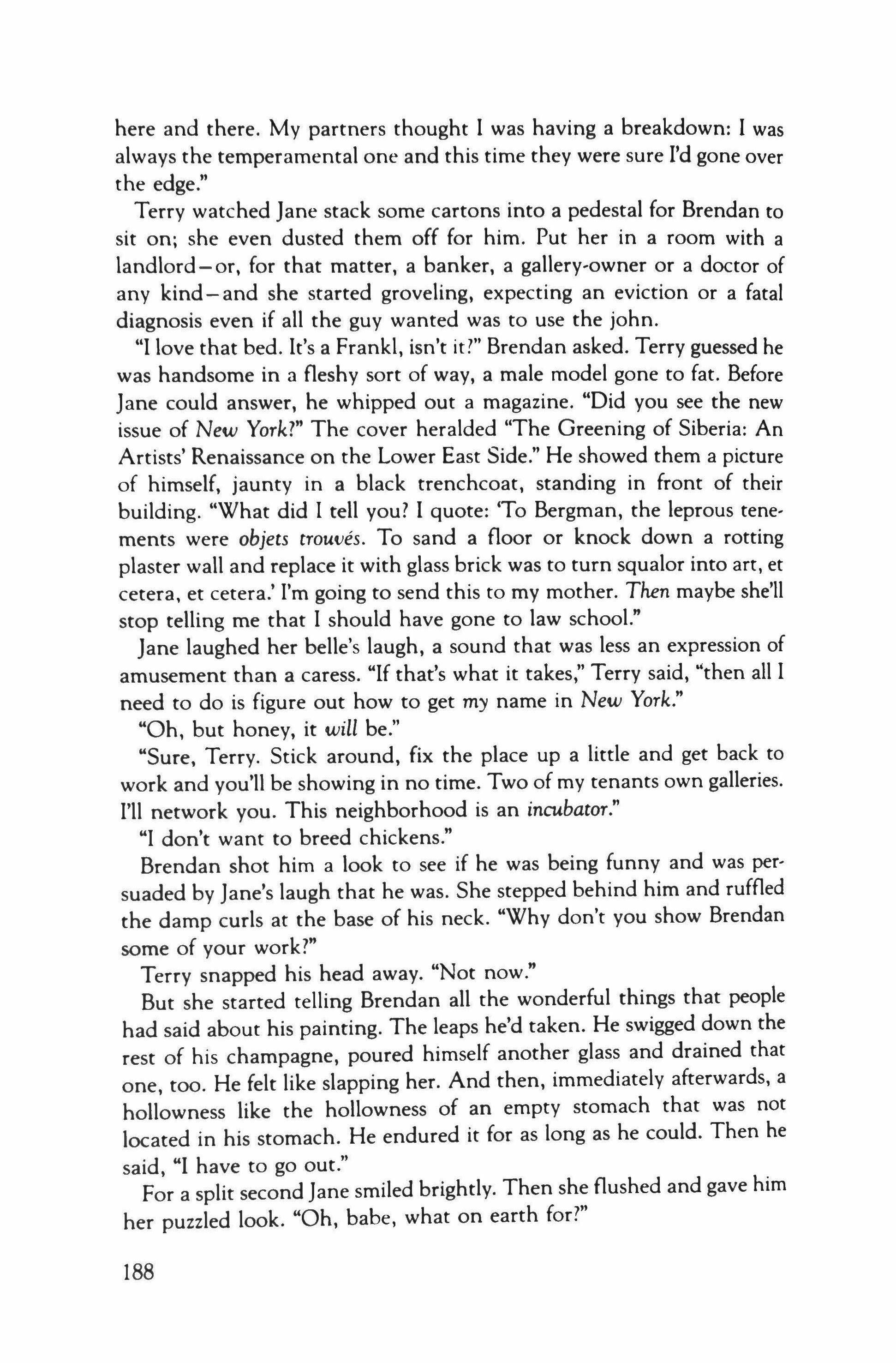
here and there. My partners thought I was having a breakdown: I was always the temperamental one and this time they were sure I'd gone over the edge."
Terry watched Jane stack some cartons into a pedestal for Brendan to sit on; she even dusted them off for him. Put her in a room with a landlord-or, for that matter, a banker, a gallery-owner or a doctor of any kind-and she started groveling, expecting an eviction or a fatal diagnosis even if all the guy wanted was to use the john.
"I love that bed. It's a Frankl, isn't it?" Brendan asked. Terry guessed he was handsome in a fleshy sort of way, a male model gone to fat. Before Jane could answer, he whipped out a magazine. "Did you see the new issue of New York?" The cover heralded "The Greening of Siberia: An Artists' Renaissance on the Lower East Side." He showed them a picture of himself, jaunty in a black trenchcoat, standing in front of their building. "What did I tell you? I quote: ITo Bergman, the leprous tenements were objets rrouves. To sand a floor or knock down a rotting plaster wall and replace it with glass brick was to turn squalor into art, et cetera, et cetera: I'm going to send this to my mother. Then maybe she'll stop telling me that I should have gone to law school."
Jane laughed her belle's laugh, a sound that was less an expression of amusement than a caress. "If that's what it takes," Terry said, "then alii need to do is figure out how to get my name in New York."
"Oh, but honey, it will be."
"Sure, Terry. Stick around, fix the place up a little and get back to work and you'll be showing in no time. Two of my tenants own galleries. I'll network you. This neighborhood is an incubator."
"I don't want to breed chickens."
Brendan shot him a look to see if he was being funny and was persuaded by Jane's laugh that he was. She stepped behind him and ruffled the damp curls at the base of his neck. "Why don't you show Brendan some of your work?"
Terry snapped his head away. "Not now."
But she started telling Brendan all the wonderful things that people had said about his painting. The leaps he'd taken. He swigged down the rest of his champagne, poured himself another glass and drained that one, too. He felt like slapping her. And then, immediately afterwards, a hollowness like the hollowness of an empty stomach that was not located in his stomach. He endured it for as long as he could. Then he said, "I have to go out."
For a split second Jane smiled brightly. Then she flushed and gave him her puzzled look. "Oh, babe, what on earth for?"
188
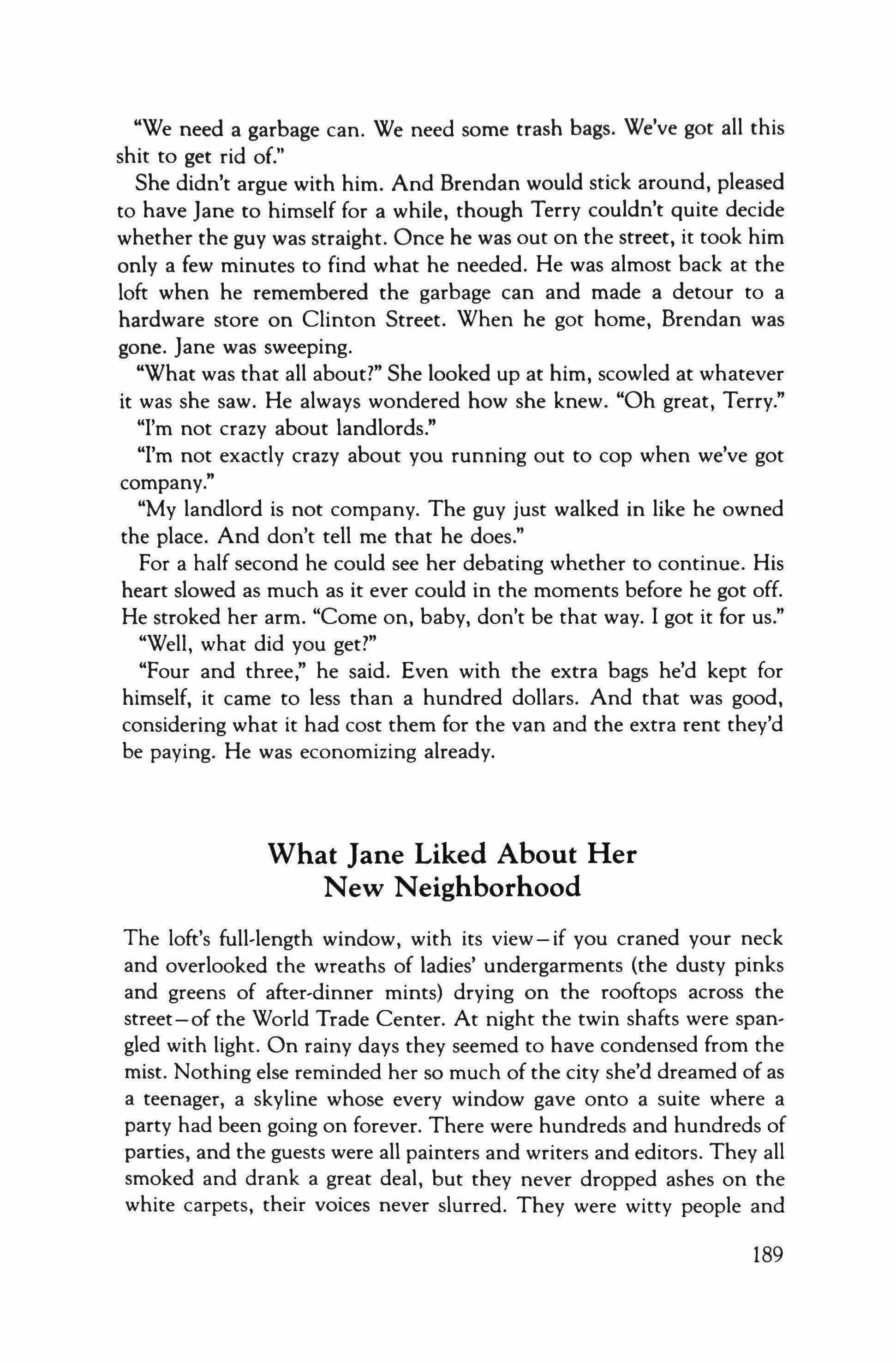
"We need a garbage can. We need some trash bags. We've got all this shit to get rid of."
She didn't argue with him. And Brendan would stick around, pleased to have Jane to himself for a while, though Terry couldn't quite decide whether the guy was straight. Once he was out on the street, it took him only a few minutes to find what he needed. He was almost back at the loft when he remembered the garbage can and made a detour to a hardware store on Clinton Street. When he got home, Brendan was gone. Jane was sweeping.
"What was that all about?" She looked up at him, scowled at whatever it was she saw. He always wondered how she knew. "Oh great, Terry."
"I'm not crazy about landlords."
"I'm not exactly crazy about you running out to cop when we've got company."
"My landlord is not company. The guy just walked in like he owned the place. And don't tell me that he does."
For a half second he could see her debating whether to continue. His heart slowed as much as it ever could in the moments before he got off. He stroked her arm. "Come on, baby, don't be that way. I got it for us."
"Well, what did you get?"
"Four and three," he said. Even with the extra bags he'd kept for himself, it came to less than a hundred dollars. And that was good, considering what it had cost them for the van and the extra rent they'd be paying. He was economizing already.
What Jane Liked About Her New Neighborhood
The loft's full-length window, with its view - if you craned your neck and overlooked the wreaths of ladies' undergarments (the dusty pinks and greens of after-dinner mints) drying on the rooftops across the street-of the World Trade Center. At night the twin shafts were spangled with light. On rainy days they seemed to have condensed from the mist. Nothing else reminded her so much of the city she'd dreamed of as a teenager, a skyline whose every window gave onto a suite where a party had been going on forever. There were hundreds and hundreds of parties, and the guests were all painters and writers and editors. They all smoked and drank a great deal, but they never dropped ashes on the white carpets, their voices never slurred. They were witty people and
189
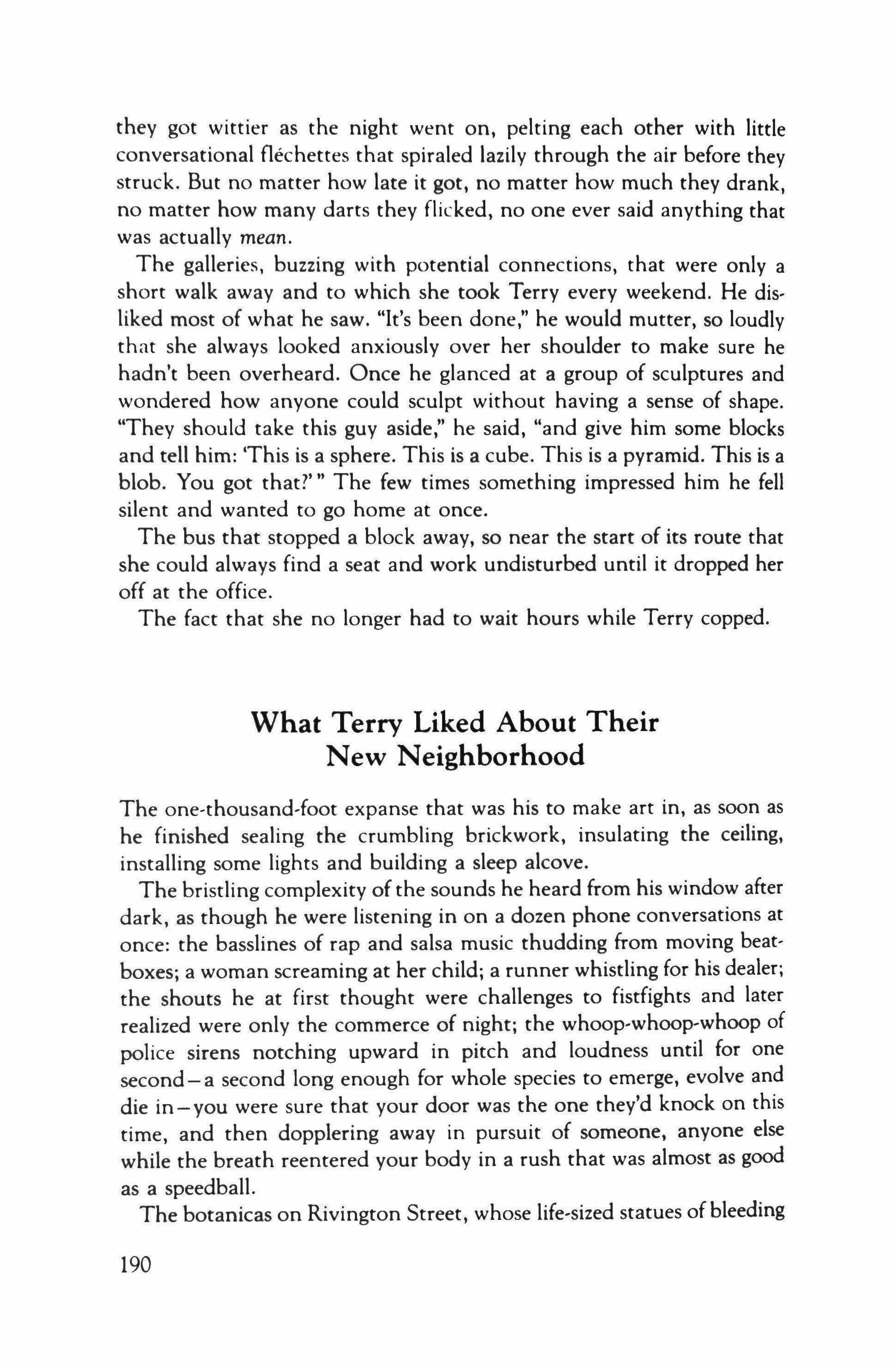
they got wittier as the night went on, pelting each other with little conversational flechettes that spiraled lazily through the air before they struck. But no matter how late it got, no matter how much they drank, no matter how many darts they flicked, no one ever said anything that was actually mean.
The galleries, buzzing with potential connections, that were only a short walk away and to which she took Terry every weekend. He disliked most of what he saw. "It's been done," he would mutter, so loudly that she always looked anxiously over her shoulder to make sure he hadn't been overheard. Once he glanced at a group of sculptures and wondered how anyone could sculpt without having a sense of shape. "They should take this guy aside," he said, "and give him some blocks and tell him: 'This is a sphere. This is a cube. This is a pyramid. This is a blob. You got that?'" The few times something impressed him he fell silent and wanted to go home at once.
The bus that stopped a block away, so near the start of its route that she could always find a seat and work undisturbed until it dropped her off at the office.
The fact that she no longer had to wait hours while Terry copped.
What Terry Liked About Their New Neighborhood
The one-thousand-foot expanse that was his to make art in, as soon as he finished sealing the crumbling brickwork, insulating the ceiling, installing some lights and building a sleep alcove.
The bristling complexity of the sounds he heard from his window after dark, as though he were listening in on a dozen phone conversations at once: the basslines of rap and salsa music thudding from moving beatboxes; a woman screaming at her child; a runner whistling for his dealer; the shouts he at first thought were challenges to fistfights and later realized were only the commerce of night; the whoop-whoop-whoop of police sirens notching upward in pitch and loudness until for one second - a second long enough for whole species to emerge, evolve and die in-you were sure that your door was the one they'd knock on this time, and then dopplering away in pursuit of someone, anyone else while the breath reentered your body in a rush that was almost as good as a speedball.
The botanicas on Rivingron Street, whose life-sized statues of bleeding
190
saints and bottles of Run-Devil-Run Oil suggested a hundred new pieces. He even knew what he'd call the show: "Other People's Rituals."
The way his coworkers looked at him when he told them he was living on the Lower East Side. Actually, they had two ways of looking at him. The creatives displayed all the timid envy ofOld World peasants interrogating a cousin who'd braved alligators and savages to strike it rich on the Other Side; the executives seemed perplexed and disgusted, which was just as satisfying.
The ease with which you could buy dope on weekends, in about as much time as it took to shop for groceries.

They spent Sunday quarreling. First, over the laundry, which he'd forgotten to pick up; then, over his unpaid share of the phone bill. Finally over the Sheetrock, which they never should have started taping in this heat. When at last he felt guilty enough to take her out for dinner, they ran into the Doll Man. Gaunt in his yellow shirt - the last Quiana shirt on the island of Manhattan - he dropped in front of them, holding a crackling bouquet of ballerinas wrapped in cellophane, gilded tutus blooming stiffly around their waists. Jane cringed when he brandished them at her. The Doll Man cackled, shrugged and lurched past them down the street.
"What was he doing with those horrible things?"
"I think he wanted to sell you one," Terry said.
"Jesus, I thought he wanted to hit me with them. Why would anyone buy anything that ghastly? Did you get a look at their slippers? They were painted on!"
"I thought they were kind of interesting myself."
"You think everything ugly is interesting."
"Look, I'm sorry. Where do you want to go? EI Castillo?"
"If I eat any more yellow rice I'm going to croak."
"We could go to a movie, then. It'll be air-conditioned." He blew coolly on her neck.
"I don't want to see anything in Spanish. And I don't feel like dressing to go uptown."
"Well, just what do you want?"
"Screw it, suppose we just get some Poison."
He peered closely at her, wondering if she were baiting him: he'd say O.K. and then she'd accuse him of having dope on the brain. "But it's Sunday."
* * *
191
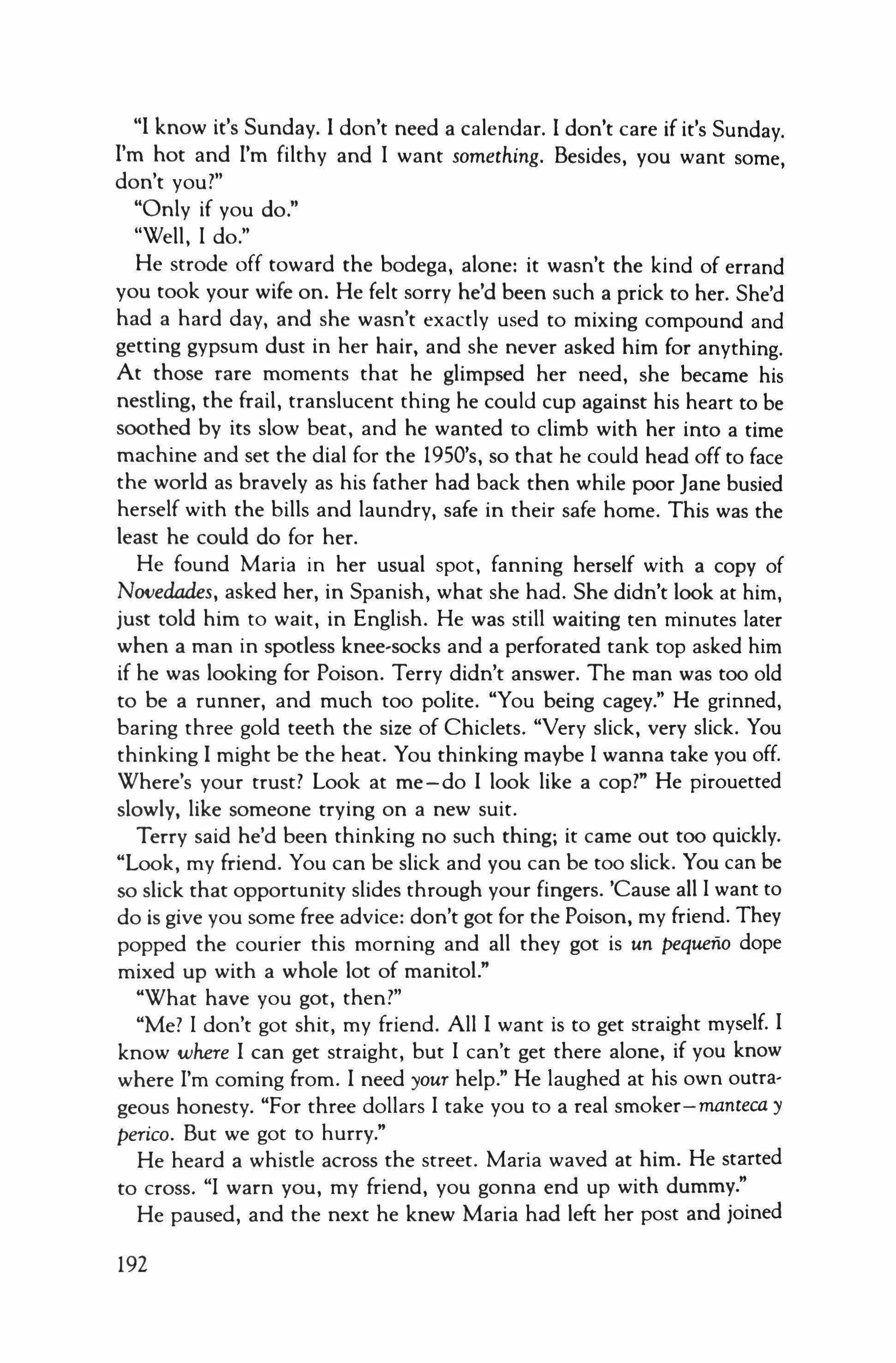
"I know it's Sunday. I don't need a calendar. I don't care if it's Sunday. I'm hot and I'm filthy and I want something. Besides, you want some, don't you?"
"Only if you do."
"Well, I do."
He strode off toward the bodega, alone: it wasn't the kind of errand you took your wife on. He felt sorry he'd been such a prick to her. She'd had a hard day, and she wasn't exactly used to mixing compound and getting gypsum dust in her hair, and she never asked him for anything. At those rare moments that he glimpsed her need, she became his nestling, the frail, translucent thing he could cup against his heart to be soothed by its slow beat, and he wanted to climb with her into a time machine and set the dial for the 1950's, so that he could head off to face the world as bravely as his father had back then while poor Jane busied herself with the bills and laundry, safe in their safe home. This was the least he could do for her.
He found Maria in her usual spot, fanning herself with a copy of Nooedades, asked her, in Spanish, what she had. She didn't look at him, just told him to wait, in English. He was still waiting ten minutes later when a man in spotless knee-socks and a perforated tank top asked him if he was looking for Poison. Terry didn't answer. The man was too old to be a runner, and much too polite. "You being cagey." He grinned, baring three gold teeth the size of Chiclets. "Very slick, very slick. You thinking I might be the heat. You thinking maybe I wanna take you off. Where's your trust? Look at me-do I look like a cop?" He pirouetted slowly, like someone trying on a new suit.
Terry said he'd been thinking no such thing; it came out too quickly. "Look, my friend. You can be slick and you can be too slick. You can be so slick that opportunity slides through your fingers. 'Cause all I want to do is give you some free advice: don't got for the Poison, my friend. They popped the courier this morning and all they got is un pequeno dope mixed up with a whole lot of manitol."
"What have you got, then?"
"Me? I don't got shit, my friend. All I want is to get straight myself. I know where I can get straight, but I can't get there alone, if you know where I'm corning from. I need your help." He laughed at his own outrageous honesty. "For three dollars I take you to a real smoker-manteca y perico. But we got to hurry."
He heard a whistle across the street. Maria waved at him. He started to cross. "I warn you, my friend, you gonna end up with dummy."
He paused, and the next he knew Maria had left her post and joined
192
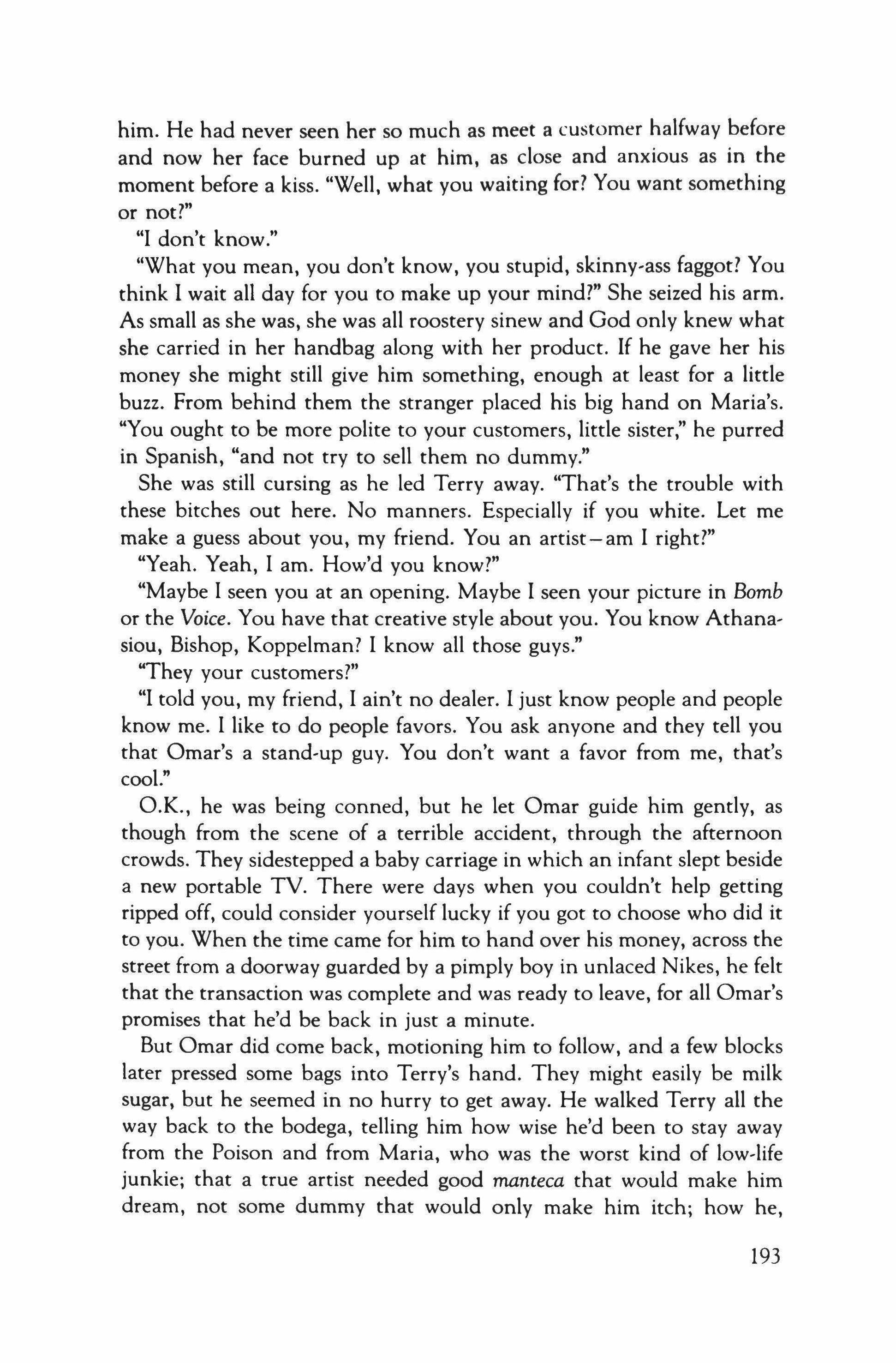
him. He had never seen her so much as meet a customer halfway before and now her face burned up at him, as close and anxious as in the moment before a kiss. "Well, what you waiting for? You want something or not?"
"I don't know."
"What you mean, you don't know, you stupid, skinny-ass faggot? You think I wait all day for you to make up your mind?" She seized his arm. As small as she was, she was all roostery sinew and God only knew what she carried in her handbag along with her product. If he gave her his money she might still give him something, enough at least for a little buzz. From behind them the stranger placed his big hand on Maria's. "You ought to be more polite to your customers, little sister," he purred in Spanish, "and not try to sell them no dummy."
She was still cursing as he led Terry away. "That's the trouble with these bitches out here. No manners. Especially if you white. Let me make a guess about you, my friend. You an artist-am I right?"
"Yeah. Yeah, I am. How'd you know?"
"Maybe I seen you at an opening. Maybe I seen your picture in Bomb or the Voice. You have that creative style about you. You know Athanasiou, Bishop, Koppelman? I know all those guys."
"They your customers?"
"I told you, my friend, I ain't no dealer. I just know people and people know me. I like to do people favors. You ask anyone and they tell you that Omar's a stand-up guy. You don't want a favor from me, that's cool."
O.K., he was being conned, but he let Omar guide him gently, as though from the scene of a terrible accident, through the afternoon crowds. They sidestepped a baby carriage in which an infant slept beside a new portable TV. There were days when you couldn't help getting ripped off, could consider yourself lucky if you got to choose who did it to you. When the time came for him to hand over his money, across the street from a doorway guarded by a pimply boy in unlaced Nikes, he felt that the transaction was complete and was ready to leave, for all Omar's promises that he'd be back in just a minute.
But Omar did come back, motioning him to follow, and a few blocks later pressed some bags into Terry's hand. They might easily be milk sugar, but he seemed in no hurry to get away. He walked Terry all the way back to the bodega, telling him how wise he'd been to stay away from the Poison and from Maria, who was the worst kind of low,life junkie; that a true artist needed good manteca that would make him dream, not some dummy that would only make him itch; how he,
193
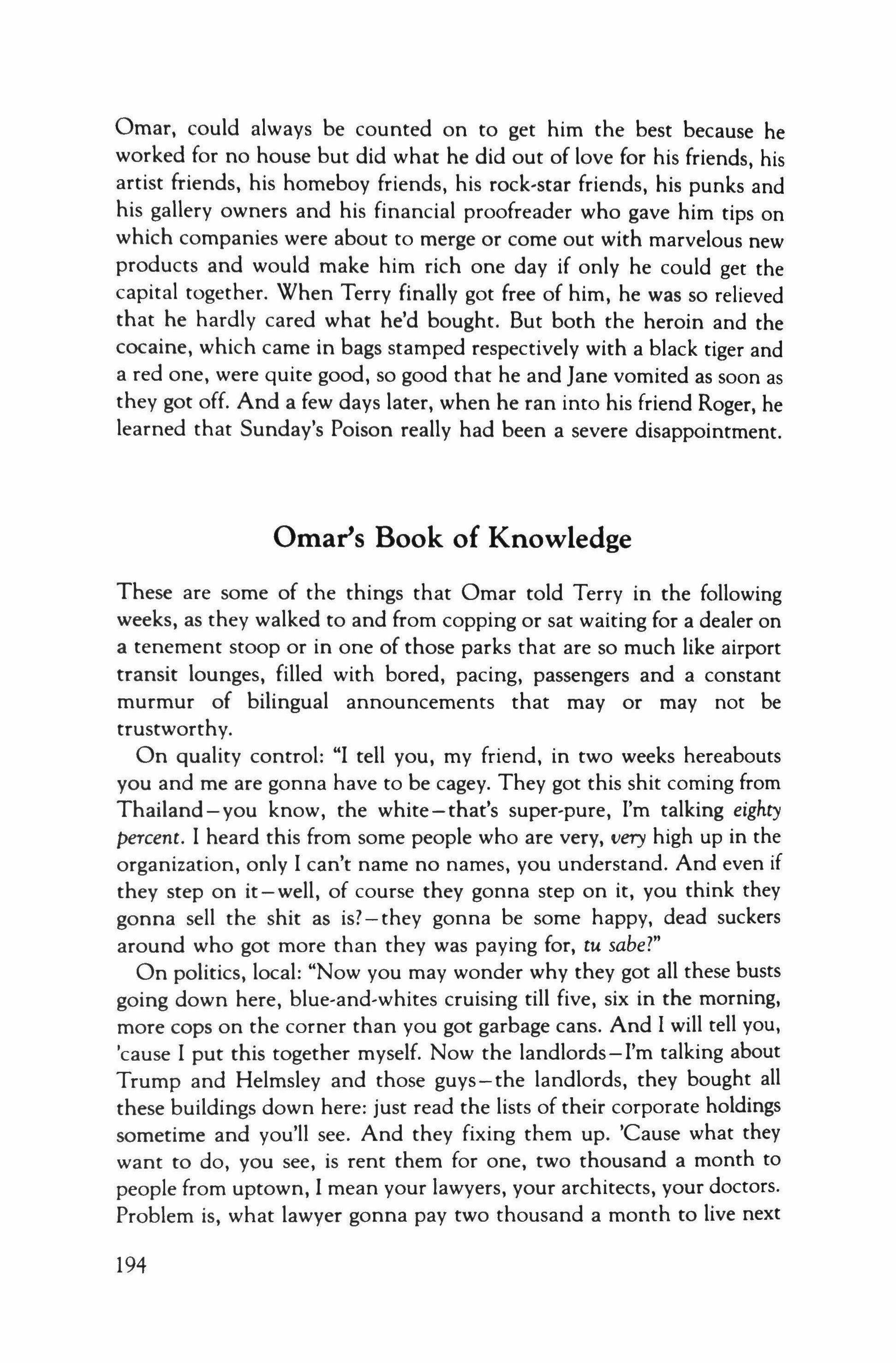
Omar, could always be counted on to get him the best because he worked for no house but did what he did out of love for his friends, his artist friends, his homeboy friends, his rock-star friends, his punks and his gallery owners and his financial proofreader who gave him tips on which companies were about to merge or come out with marvelous new products and would make him rich one day if only he could get the capital together. When Terry finally got free of him, he was so relieved that he hardly cared what he'd bought. But both the heroin and the cocaine, which came in bags stamped respectively with a black tiger and a red one, were quite good, so good that he and Jane vomited as soon as they got off. And a few days later, when he ran into his friend Roger, he learned that Sunday's Poison really had been a severe disappointment.
Omar's Book of Knowledge
These are some of the things that Omar told Terry in the following weeks, as they walked to and from copping or sat waiting for a dealer on a tenement stoop or in one of those parks that are so much like airport transit lounges, filled with bored, pacing, passengers and a constant murmur of bilingual announcements that mayor may not be trustworthy.
On quality control: "I tell you, my friend, in two weeks hereabouts you and me are gonna have to be cagey. They got this shit coming from Thailand-you know, the white-that's super-pure, I'm talking eighty percent. 1 heard this from some people who are very, very high up in the organization, only 1 can't name no names, you understand. And even if they step on it-well, of course they gonna step on it, you think they gonna sell the shit as is? - they gonna be some happy, dead suckers around who got more than they was paying for, tu sabel"
On politics, local: "Now you may wonder why they got all these busts going down here, blue-and-whites cruising till five, six in the morning, more cops on the corner than you got garbage cans. And I will tell you, 'cause 1 put this together myself. Now the landlords-I'm talking about Trump and Helmsley and those guys-the landlords, they bought all these buildings down here: just read the lists of their corporate holdings sometime and you'll see. And they fixing them up. 'Cause what they want to do, you see, is rent them for one, two thousand a month to people from uptown, 1 mean your lawyers, your architects, your doctors. Problem is, what lawyer gonna pay two thousand a month to live next
194
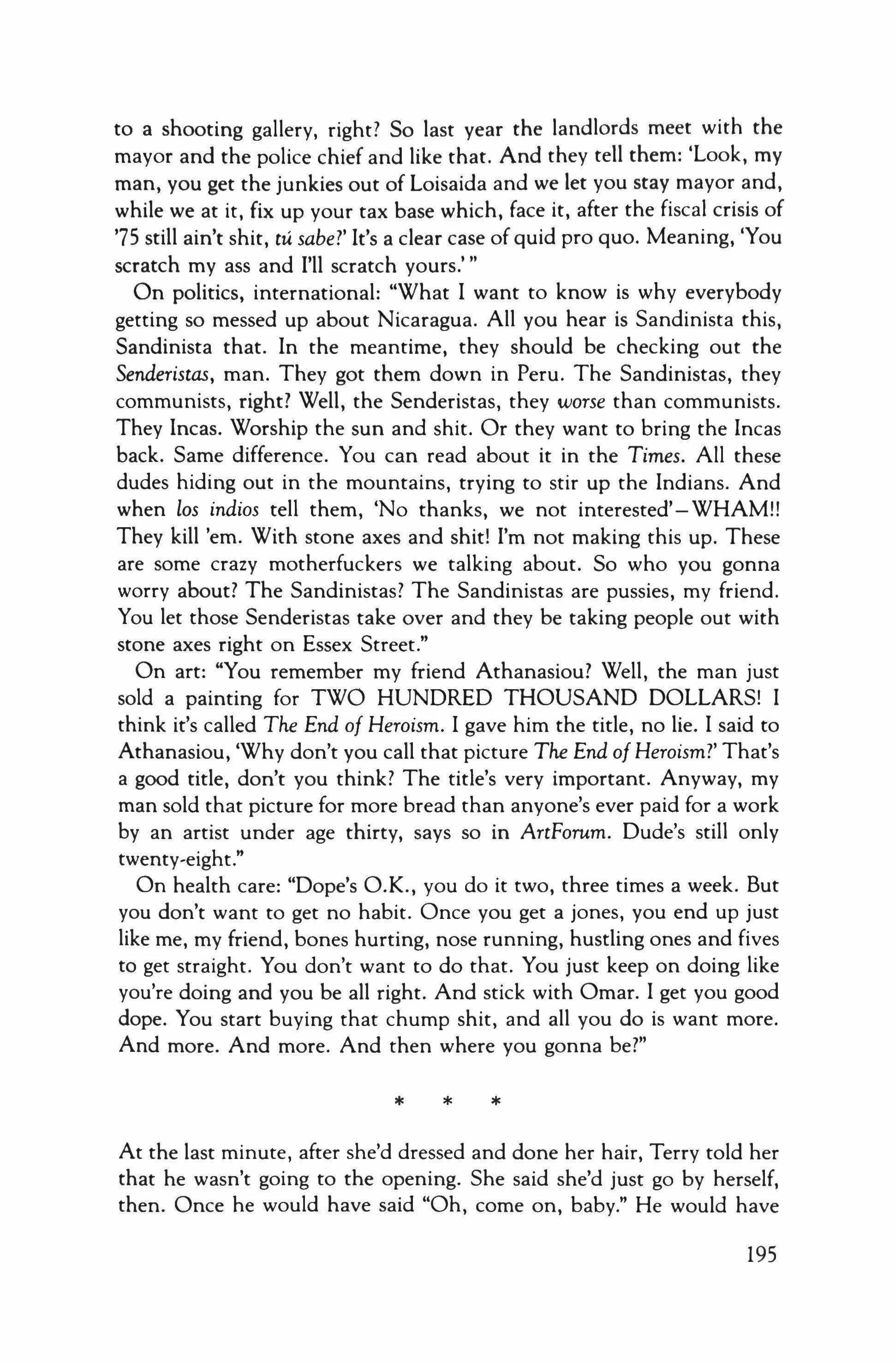
to a shooting gallery, right? So last year the landlords meet with the mayor and the police chief and like that. And they tell them: 'Look, my man, you get the junkies out of Loisaida and we let you stay mayor and, while we at it, fix up your tax base which, face it, after the fiscal crisis of '75 still ain't shit, tu sabel' It's a clear case of quid pro quo. Meaning, 'You scratch my ass and I'll scratch yours.'''
On politics, international: "What I want to know is why everybody getting so messed up about Nicaragua. All you hear is Sandinista this, Sandinista that. In the meantime, they should be checking out the Senderistas, man. They got them down in Peru. The Sandinistas, they communists, right? Well, the Senderistas, they worse than communists. They Incas. Worship the sun and shit. Or they want to bring the Incas back. Same difference. You can read about it in the Times. All these dudes hiding out in the mountains, trying to stir up the Indians. And when los indios tell them, 'No thanks, we not interested' - WHAM!! They kill 'em. With stone axes and shit! I'm not making this up. These are some crazy motherfuckers we talking about. So who you gonna worry about? The Sandinistas? The Sandinistas are pussies, my friend. You let those Senderistas take over and they be taking people out with stone axes right on Essex Street."
On art: "You remember my friend Athanasiou? Well, the man just sold a painting for TWO HUNDRED THOUSAND DOLLARS! I think it's called The End of Heroism. I gave him the title, no lie. I said to Athanasiou, 'Why don't you call that picture The End of Heroism?' That's a good title, don't you think? The title's very important. Anyway, my man sold that picture for more bread than anyone's ever paid for a work by an artist under age thirty, says so in ArtForum. Dude's still only twenty-eight."
On health care: "Dope's O.K., you do it two, three times a week. But you don't want to get no habit. Once you get a jones, you end up just like me, my friend, bones hurting, nose running, hustling ones and fives to get straight. You don't want to do that. You just keep on doing like you're doing and you be all right. And stick with Omar. I get you good dope. You start buying that chump shit, and all you do is want more. And more. And more. And then where you gonna be?" * * *
At the last minute, after she'd dressed and done her hair, Terry told her that he wasn't going to the opening. She said she'd just go by herself, then. Once he would have said "Oh, come on, baby." He would have
195
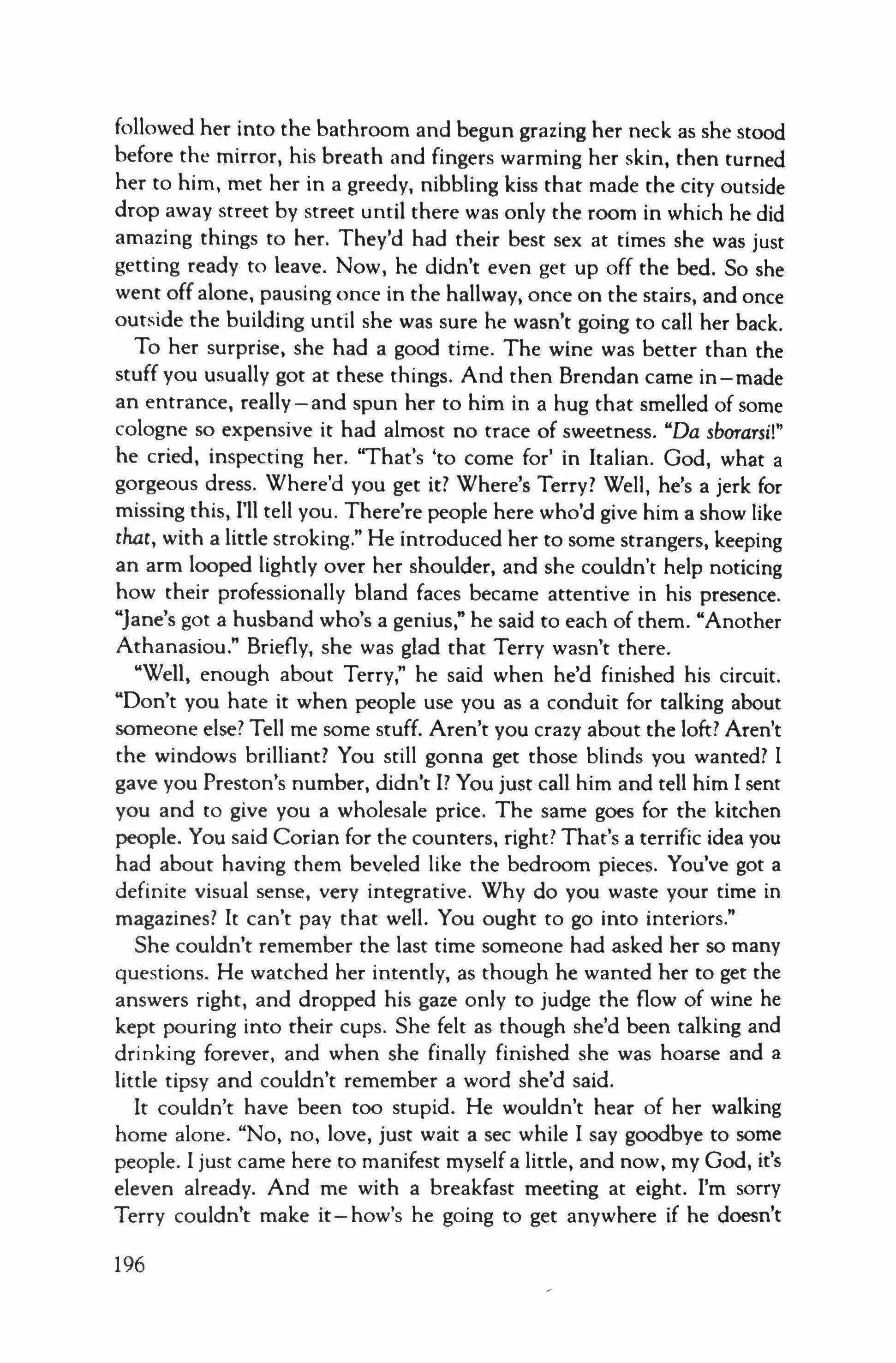
followed her into the bathroom and begun grazing her neck as she stood before the mirror, his breath and fingers warming her skin, then turned her to him, met her in a greedy, nibbling kiss that made the city outside drop away street by street until there was only the room in which he did amazing things to her. They'd had their best sex at times she was just getting ready to leave. Now, he didn't even get up off the bed. So she went off alone, pausing once in the hallway, once on the stairs, and once outside the building until she was sure he wasn't going to call her back.
To her surprise, she had a good time. The wine was better than the stuff you usually got at these things. And then Brendan came in-made an entrance, really - and spun her to him in a hug that smelled of some cologne so expensive it had almost no trace of sweetness. "Da sborarsi!" he cried, inspecting her. "That's 'to come for' in Italian. God, what a gorgeous dress. Where'd you get it? Where's Terry? Well, he's a jerk for missing this, I'll tell you. There're people here who'd give him a show like that, with a little stroking." He introduced her to some strangers, keeping an arm looped lightly over her shoulder, and she couldn't help noticing how their professionally bland faces became attentive in his presence. "Jane's got a husband who's a genius," he said to each of them. "Another Athanasiou." Briefly, she was glad that Terry wasn't there.
"Well, enough about Terry," he said when he'd finished his circuit. "Don't you hate it when people use you as a conduit for talking about someone else? Tell me some stuff. Aren't you crazy about the loft? Aren't the windows brilliant? You still gonna get those blinds you wanted? I gave you Preston's number, didn't I? You just call him and tell him I sent you and to give you a wholesale price. The same goes for the kitchen people. You said Corian for the counters, right? That's a terrific idea you had about having them beveled like the bedroom pieces. You've got a definite visual sense, very integrative. Why do you waste your time in magazines? It can't pay that well. You ought to go into interiors."
She couldn't remember the last time someone had asked her so many questions. He watched her intently, as though he wanted her to get the answers right, and dropped his gaze only to judge the flow of wine he kept pouring into their cups. She felt as though she'd been talking and drinking forever, and when she finally finished she was hoarse and a little tipsy and couldn't remember a word she'd said.
It couldn't have been too stupid. He wouldn't hear of her walking home alone. "No, no, love, just wait a sec while I say goodbye to some people. I just came here to manifest myself a little, and now, my God, it's eleven already. And me with a breakfast meeting at eight. I'm sorry Terry couldn't make it-how's he going to get anywhere if he doesn't
196
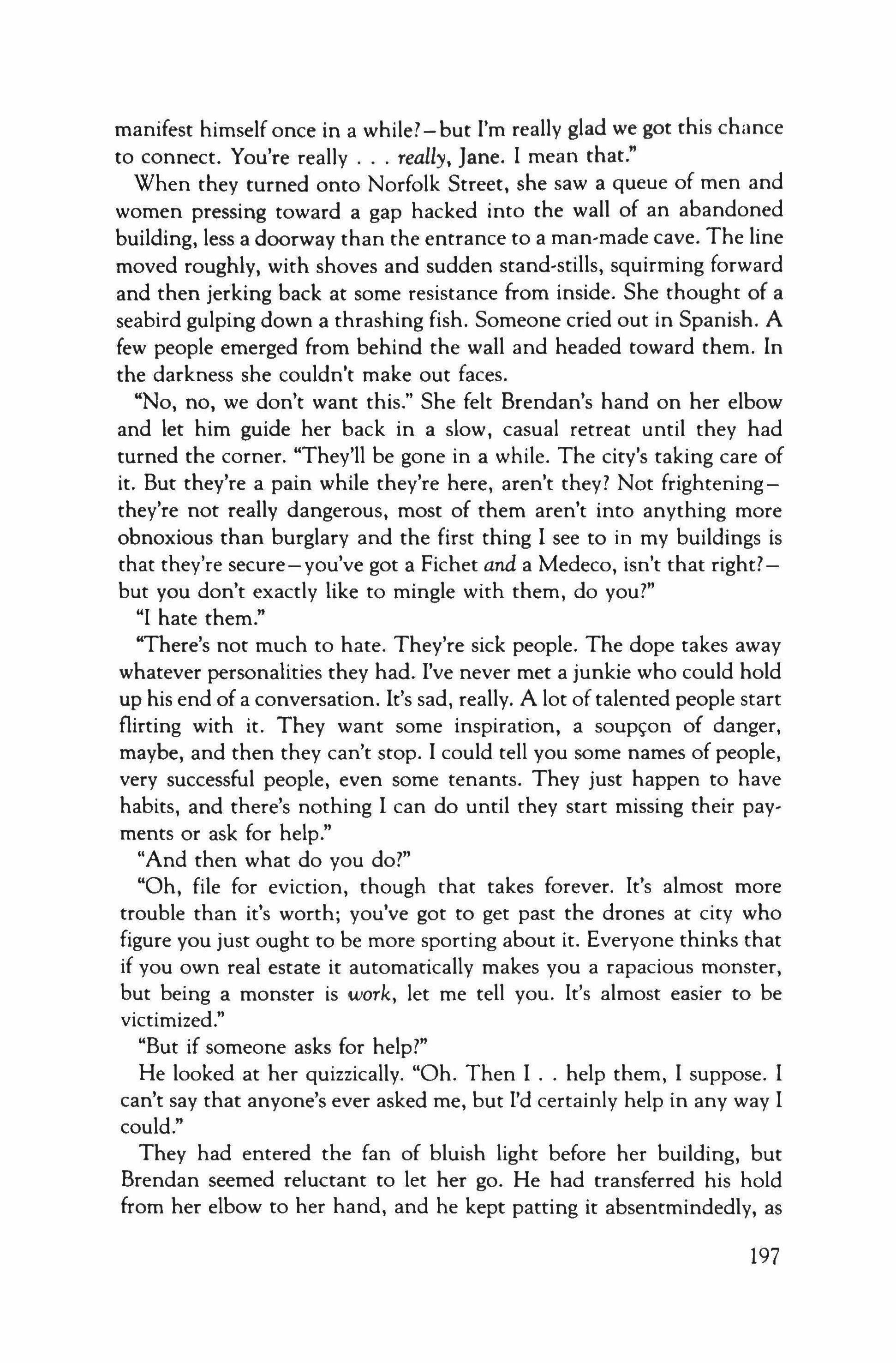
manifest himself once in a while? - but I'm really glad we got this chance to connect. You're really really, Jane. I mean that."
When they turned onto Norfolk Street, she saw a queue of men and women pressing toward a gap hacked into the wall of an abandoned building, less a doorway than the entrance to a man-made cave. The line moved roughly, with shoves and sudden stand-stills, squirming forward and then jerking back at some resistance from inside. She thought of a seabird gulping down a thrashing fish. Someone cried out in Spanish. A few people emerged from behind the wall and headed toward them. In the darkness she couldn't make out faces.
"No, no, we don't want this." She felt Brendan's hand on her elbow and let him guide her back in a slow, casual retreat until they had turned the corner. "They'll be gone in a while. The city's taking care of it. But they're a pain while they're here, aren't they? Not frighteningthey're not really dangerous, most of them aren't into anything more obnoxious than burglary and the first thing I see to in my buildings is that they're secure-you've got a Fichet and a Medeco, isn't that right?but you don't exactly like to mingle with them, do you?"
"I hate them."
"There's not much to hate. They're sick people. The dope takes away whatever personalities they had. I've never met a junkie who could hold up his end of a conversation. It's sad, really. A lot of talented people start flirting with it. They want some inspiration, a soupcon of danger, maybe, and then they can't stop. I could tell you some names of people, very successful people, even some tenants. They just happen to have habits, and there's nothing I can do until they start missing their payments or ask for help."
"And then what do you do?"
"Oh, file for eviction, though that takes forever. It's almost more trouble than it's worth; you've got to get past the drones at city who figure you just ought to be more sporting about it. Everyone thinks that if you own real estate it automatically makes you a rapacious monster, but being a monster is work, let me tell you. It's almost easier to be victimized."
"But if someone asks for help?"
He looked at her quizzically. "Oh. Then I help them, I suppose. I can't say that anyone's ever asked me, but I'd certainly help in any way I could."
They had entered the fan of bluish light before her building, but Brendan seemed reluctant to let her go. He had transferred his hold from her elbow to her hand, and he kept patting it absentmindedly, as
197

though it were something he'd found in his pocket and didn't quite know what to do with. "You shouldn't let it upset you, Jane. You're quite safe. It's really another world. I mean, you'll see it around you, for a while, at least, and you've got to watch where you walk late at night. But all you have to do is look away and it'll pass. There's a lot of money coming into this area, galleries, co-ops, boutiques. I'm talking with a major fashion name right now who wants to open a store on Essex. Can you see someone dealing dope in front of Jean-Paul Gaulthier? They won't stand for it."
He waited for her to answer, and when she didn't he leaned forward so that she could feel his breath on her face, warm and pleasantly acrid. "Look, Jane. Have you ever been to Arizona? I was out there a while ago, scouting out capital. Ninety years ago it was Apache country. Geronimo, scalpings, massacres-they made these people look like interior decorators. And now the Apaches are making necklaces for tourists, and the land outside their reservation is going for $100,000 an acre. So, don't worry about junkies, O.K.?"
Terry's Reasons
Monday, August 13: Because Sunday had been wasted at a wedding in New Jersey, friends ofJane's, a couple so cheerfully devoid of personality that in five years he had never been able to tell if he liked or disliked them; as well ask if he liked or disliked a roll of paper towels. No amount of vodka could filter that atmosphere of self-congratulatory pairedness, and all the next day he felt like one of the animals on Noah's ark, each stabled with its own fucking kind.
Friday, August 17: Because he had worked hard all week, the A.E. himself said so, favoring him with a smile that told him he was turning into precisely the kind of self-denying wage-slave they wanted, even working overtime, so why shouldn't he?
Saturday, August 18: Once to make art with and then later, because they were going to a club and he wanted to be able to dance.
Sunday, August 19: To work on the piece that Jane had kept him from finishing the day before. Why couldn't she screw in a light bulb without a two-hour consultation?
Thursday, August 23: Because there was a sale on canvas at Pearl Paint, and with all the bills and his sick joke of a paycheck he couldn't
198

afford to buy any. His whole life was vanishing in necessity; just once, he needed something that he didn't need.
Friday, August 24: Because after dinner he looked up at Jane and caught her in one of those rare moments when she wasn't watching him. He saw the plump cushion of her lower lip and the way the sweat beaded on her eyelids, an exhausted wisp of hair clinging to her forehead, and he wanted her with a suddenness that shocked and scared him all at once, and he had to run out and get something that would put her in the mood and keep him in his, because he knew that in another minute one of them would do or say something to blow it.
Jane's Reasons
Friday, August 17: Because Terry came home in one of his moods of irritable martyrdom. His boss was a patronizing moron, his coworkers sheep, his work was sapping him. Not one question about her day, which had been just as bad. And behind it, as always, the suggestion that it was all her fault. She felt the urge to slap him, not in anger, but the way you'd slap someone out of a hysterical crying fit; her hand trembled as though she were holding onto a jackhammer. And she didn't know, she just didn't know, if she could hold it in.
Saturday, August 18: It was Saturday, after all. They were going out to have fun, to dance and, maybe afterwards, to make love. And if they were going to have fun, they might as well have it big. Fun is fun because everybody likes to have fun: Aristotle.
Friday, August 24: Right after dinner Terry looked at her with a startled tenderness and said "You know, none of this, the fighting and that shit, means anything. You know that." They started to touch each other, but then he pulled back and told her to wait, and of course it was a half hour before he came back. By then she was no longer in the mood, he could have stayed out all night for all she cared. But he still wanted her; he only booted once. When he offered her some, she said "Oh, what the hell," knowing that the only other choices were to hear him accuse her of withdrawing from him or to feel like she were making love through a cocoon.
Sunday, August 26: Because Terry had kept her up all night, wanting company till two A.M. and then nodding into a twitching imitation of sleep that made it impossible for her to get any. At three she'd found herself watching Mary Tyler Moore, usually the next best thing to a
199
lullaby. But that night the show seemed to scoop something out of her and leave a hollow behind her breastbone. There'd been a time when she'd seen Mary as her alter ego, the keen and hopeful career woman who could always cope with the sweet-natured loonies around her. What struck her now was how little there really was for Mary to cope with, how wholesome and benign-how normal-those people were. And all Sunday she kept thinking about the show, remembering how she'd watched it from such a distance, as though it were really a shaky home movie of her childhood self, surrounded by aunts and uncles who'd all died a long time ago.

At the door to his apartment, Omar asked Terry for three quarters. Another of his odd sums: four dollars to cop, two-fifty for a clean set, change for phone calls or for the paper he liked to buy when they had a wait ahead of them. They walked into amber half-light; yellowed sheets were tacked over the windows. "Hi, honey, I'm home!" Omar called. A TV set muttered in the next room. Terry saw a bare mattress, fallen plaster swept into a tidy pile beside it. Taped to one wall, a poster of Roberto Clemente and a "Partypeople" page from Bomb, with photos of Athanasiou and Peter De Spare circled in red marker. Omar's family was parked on a corduroy marshmallow of a sofa in front of the TV. "Terry, I want you to meet my sister, Corazon. And this is Ursula, Nervao, and the baby is julita, This is my very, very good friend, Terry. Terry is a famous artist." Only Corazon bothered to look up at him. "Look, Uncle Omar has presents." He dropped Terry's quarters into the children's hands. "Say 'thank you,'" he cooed. "What you watching? Oh, an animal show. That's very educational, Corazon. I got to compliment you. We only let them watch educational pictures, not that Flintstone shit."
He disappeared into another room. Terry edged around the set to see what was playing, but no one made room for him on the couch. He dropped into a crouch, as though that were his favorite position for watching television. He was grateful when Omar came back, a pair of syringes silhouetted beneath one knee sock. "Hey, Corry," he said, "what's that plaster doing by my bed?"
She spoke for the first time since they'd come in. Terry was surprised to realize how much Spanish he understood: "It fell down off the fucking ceiling, just like it always does. And don't tell me you're gonna call the landlord. You been saying you gonna call the landlord for two months. I
* * *
200
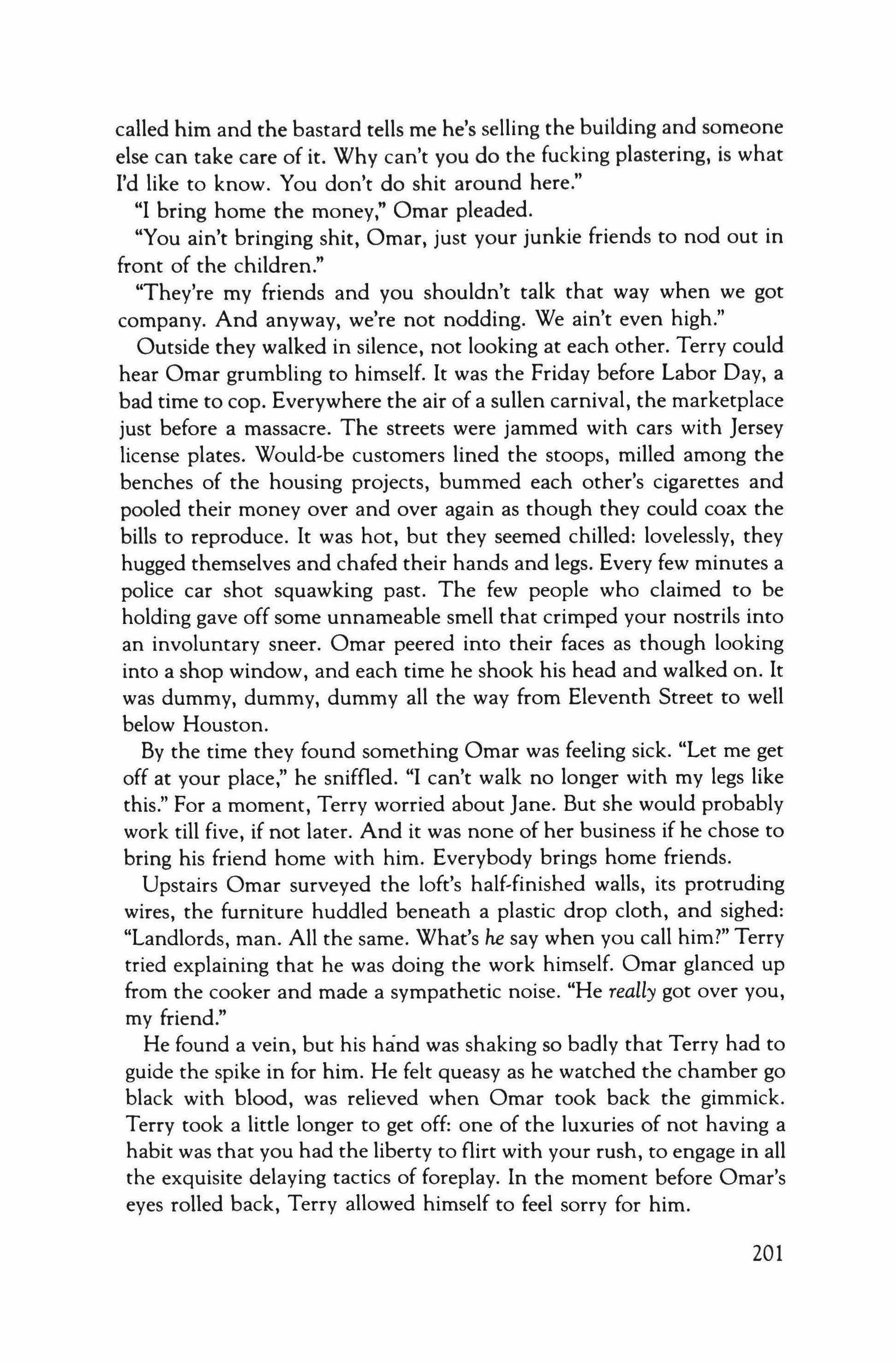
called him and the bastard tells me he's selling the building and someone else can take care of it. Why can't you do the fucking plastering, is what I'd like to know. You don't do shit around here."
"I bring home the money," Omar pleaded.
"You ain't bringing shit, Omar, just your junkie friends to nod out in front of the children."
"They're my friends and you shouldn't talk that way when we got company. And anyway, we're not nodding. We ain't even high."
Outside they walked in silence, not looking at each other. Terry could hear Omar grumbling to himself. It was the Friday before Labor Day, a bad time to cop. Everywhere the air of a sullen carnival, the marketplace just before a massacre. The streets were jammed with cars with Jersey license plates. Would-be customers lined the stoops, milled among the benches of the housing projects, bummed each other's cigarettes and pooled their money over and over again as though they could coax the bills to reproduce. It was hot, but they seemed chilled: lovelessly, they hugged themselves and chafed their hands and legs. Every few minutes a police car shot squawking past. The few people who claimed to be holding gave off some unnameable smell that crimped your nostrils into an involuntary sneer. Omar peered into their faces as though looking into a shop window, and each time he shook his head and walked on. It was dummy, dummy, dummy all the way from Eleventh Street to well below Houston.
By the time they found something Omar was feeling sick. "Let me get off at your place," he sniffled. "I can't walk no longer with my legs like this." For a moment, Terry worried about Jane. But she would probably work till five, if not later. And it was none of her business if he chose to bring his friend home with him. Everybody brings home friends.
Upstairs Omar surveyed the loft's half-finished walls, its protruding wires, the furniture huddled beneath a plastic drop cloth, and sighed: "Landlords, man. All the same. What's he say when you call him?" Terry tried explaining that he was doing the work himself. Omar glanced up from the cooker and made a sympathetic noise. "He really got over you, my friend."
He found a vein, but his hand was shaking so badly that Terry had to guide the spike in for him. He felt queasy as he watched the chamber go black with blood, was relieved when Omar took back the gimmick. Terry took a little longer to get off: one of the luxuries of not having a habit was that you had the liberty to flirt with your rush, to engage in all the exquisite delaying tactics of foreplay. In the moment before Omar's eyes rolled back, Terry allowed himself to feel sorry for him.
201

"Jesus, you don't know what I had to go through to get off early, I what is this?"
He hadn't heard the click of the lock. He looked up and tried to see her as a neutral object, a piece of furniture that had escaped his notice until that moment. But Jane wouldn't stay inanimate. Just standing there, rigid and white-faced, she sent out shock waves.
"It's not 'what: Jane. It's 'who.' 'Who is this?' This is my friend, Omar. Omar, this is my wife, Jane."
Omar tried rising, then sank back and contented himself with a wave. "Enchanted. Terry talks about you all the time."
"I'll just bet he does. Shit, Terry, what do you think you're doing? What the fuck do you mean by bringing him up here? Do you think I want to live in a fucking shooting gallery?"
"He's my friend, Jane. Since when can't I bring my friends over?"
"Get him out of here. Get that street trash out of my house. Get him out now."
Jane's voice came out in a quavering redneck screech, the voice of a woman a hundred years old and in bad health. As it rose, her whole body seemed to rise with it, tugged upward as though the guy rope of a rising hydrogen balloon had snaked itself around her skinny neck. At the same time, something within him seemed to sink. He felt himself recede inside his own body, into the cinderblock calm of a bunker where his blood ran slowly and he could squeeze off words with the deliberateness of a sniper. "What is this racist bullshit?" The skin around her eyes bleached, baring a broken web of wrinkles. "Should have known you'd bourge out on me, you always do." She twitched, and the rope above her seemed to jerk. "You think I need you? I don't fucking need you. I just barely, barely put up with you." The first tear striped her cheek, as satisfying as blood. And although she stayed upright, was still saying something as he and Omar left, Terry didn't hear her. He didn't hear a word she said.
Outside, he was startled to see that it was still light, and so hot that he was instantly drenched in sweat.
"You were hard, man. You were very hard."
He couldn't tell if Omar meant it as congratulation or reproach. He tried glaring at him, but he had no anger left. His high had gone with it, leaving only a weight at the base of his skull, the grit of quinine in his throat. "Screw her. I've got to get off again."
"You sure you not pushing it? You already done "I know what I did. I swear, Omar, the shit must have been dummy.
202
I'm not blaming you. You couldn't help it. Look, I need it now. I really do. Just help me scoop again."
"I don't think that's a good idea."
"How much do you want?"
Omar massaged his eyelids in what might have been pain. "Twenty dollars?"
He made him wait outside the cash center while he withdrew his money. He had only eighty dollars left. Well, Jane could make it up. Or she could put off Brendan somehow. He didn't care. Omar, still loaded or pretending to be, moved with invalid slowness; he practically had to push him up the street. He found a dealer he trusted on the corner of Rivington, gave him the money, and slapped the bags into Terry's hand. "You can get your own set, my friend," he said. "I ain't helping you kill yourself."
"Would you do it for thirty?" he answered, but only under his breath because even now he knew it wouldn't do him any good to burn out his source. Anyway, Omar had gone. He was just about to ask the dealer, when someone told him to freeze and shoved him down to the pavement, and his chin rasped against the concrete, and he felt what must have been a gun barrel jab him bluntly in the neck. When they took the bags from him, he almost cried.
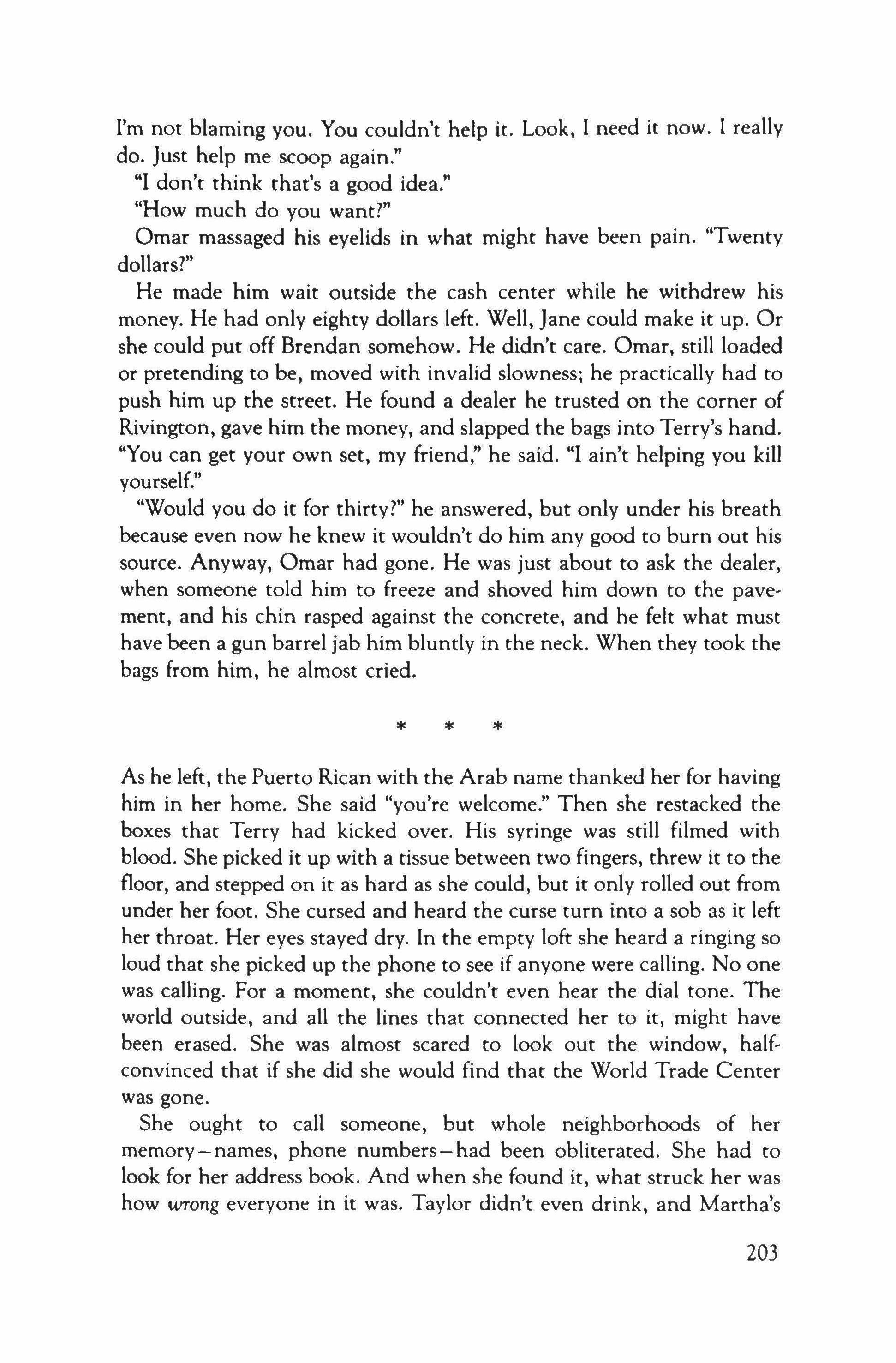
As he left, the Puerto Rican with the Arab name thanked her for having him in her home. She said "you're welcome." Then she restacked the boxes that Terry had kicked over. His syringe was still filmed with blood. She picked it up with a tissue between two fingers, threw it to the floor, and stepped on it as hard as she could, but it only rolled out from under her foot. She cursed and heard the curse turn into a sob as it left her throat. Her eyes stayed dry. In the empty loft she heard a ringing so loud that she picked up the phone to see if anyone were calling. No one was calling. For a moment, she couldn't even hear the dial tone. The world outside, and all the lines that connected her to it, might have been erased. She was almost scared to look out the window, halfconvinced that if she did she would find that the World Trade Center was gone.
She ought to call someone, but whole neighborhoods of her memory-names, phone numbers-had been obliterated. She had to look for her address book. And when she found it, what struck her was how wrong everyone in it was. Taylor didn't even drink, and Martha's
* * *
203

idea of marital trouble was an argument over brands of food processors. Terry's friends-she could imagine Roger saying, "Well, what did you have to go and hassle him for?" None of them could see how sick he was. None of them could understand the danger he was in, how much help he needed. "Help him." She said it out loud, and the empty room made her voice echo, turned it into the voice of brick and Sheetrock and wall
length Thermopane windows.
Brendan was still in his office. He started telling her about some deal he'd just made, his voice breathy with adrenaline. She broke in: "Please come over. I mean, can you come over right now?"
"What's the matter? What happened, did somebody break in? Do you want me to call the police?"
She couldn't tell him over the phone. Somehow she got him to agree to meet her in an hour. It gave her time to plunge her face into a sinkful of cold water, redo her makeup and get rid ofTerry's set. Even then, she went downstairs to wait for him, afraid that there was something she'd overlooked, a blackened spoon, some burnt matches, afraid that the ghost of heroin itself would greet him as she opened the door, grinning over her shoulder like a husband with a cocktail shaker.
It was only when she got into Brendan's champagne-colored Saab, smelled his cologne mingled now with the scents of leather and chilled air, that she once more believed in the existence of the world and began to cry. "What's wrong?" he kept asking even as he held her, as gingerly as a man cradling someone else's baby. "It's Terry," she said. But she couldn't bring herself to say anything about the dope, his sickness. She'd wait till later, when the tears stopped. "I think he's left me."
"Oh, Jesus. Really? You're not just spatting?"
For a moment she was furious. "I don't exaggerate stuff like this. He's left me. What am I going to do?"
"Well, if you need it, I can give you an extension on the rent. Really. It's no problem."
At last he found a comfortable way of holding her, letting her head rest against his chest while he draped an arm over her shoulder. He asked her if she wanted to talk about it, but when she said no he didn't press her.
"Let's just drive. Someplace."
He steered one-handed. They floated down narrow streets, around the sharpest corners, with an oiled, silent motion that made ruined buildings transparent and insubstantial. The figures propped against graffitied walls or darting through the traffic might have been Pac-Men. "The thing about Terry that nobody realizes is that he's sick," she said.
204
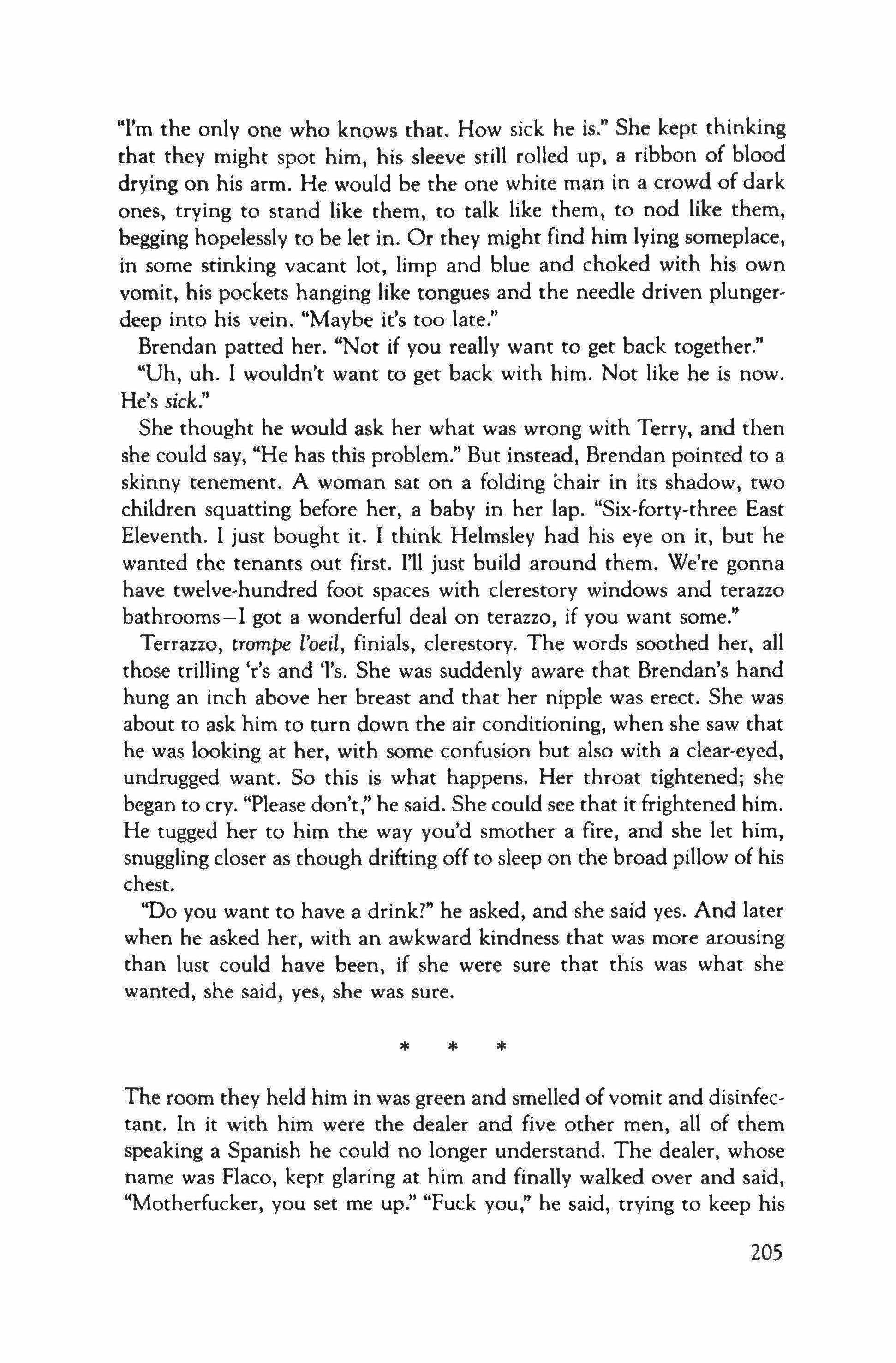
"I'm the only one who knows that. How sick he is." She kept thinking that they might spot him, his sleeve still rolled up, a ribbon of blood drying on his arm. He would be the one white man in a crowd of dark ones, trying to stand like them, to talk like them, to nod like them, begging hopelessly to be let in. Or they might find him lying someplace, in some stinking vacant lot, limp and blue and choked with his own vomit, his pockets hanging like tongues and the needle driven plungerdeep into his vein. "Maybe it's too late."
Brendan patted her. "Not if you really want to get back together."
"Uh, uh. I wouldn't want to get back with him. Not like he is now. He's sick."
She thought he would ask her what was wrong with Terry, and then she could say, "He has this problem." But instead, Brendan pointed to a skinny tenement. A woman sat on a folding chair in its shadow, two children squatting before her, a baby in her lap. "Six-forty-three East Eleventh. I just bought it. I think Helmsley had his eye on it, but he wanted the tenants out first. I'll just build around them. We're gonna have twelve-hundred foot spaces with clerestory windows and terazzo bathrooms-I got a wonderful deal on terazzo, if you want some."
Terrazzo, trompe l'oeil, finials, clerestory. The words soothed her, all those trilling 'r's and 'l's. She was suddenly aware that Brendan's hand hung an inch above her breast and that her nipple was erect. She was about to ask him to turn down the air conditioning, when she saw that he was looking at her, with some confusion but also with a clear-eyed, undrugged want. So this is what happens. Her throat tightened; she began to cry. "Please don't," he said. She could see that it frightened him. He tugged her to him the way you'd smother a fire, and she let him, snuggling closer as though drifting off to sleep on the broad pillow of his chest.
"Do you want to have a drink?" he asked, and she said yes. And later when he asked her, with an awkward kindness that was more arousing than lust could have been, if she were sure that this was what she wanted, she said, yes, she was sure. * * *
The room they held him in was green and smelled of vomit and disinfectant. In it with him were the dealer and five other men, all of them speaking a Spanish he could no longer understand. The dealer, whose name was Flaco, kept glaring at him and finally walked over and said, "Motherfucker, you set me up." "Fuck you," he said, trying to keep his
20S
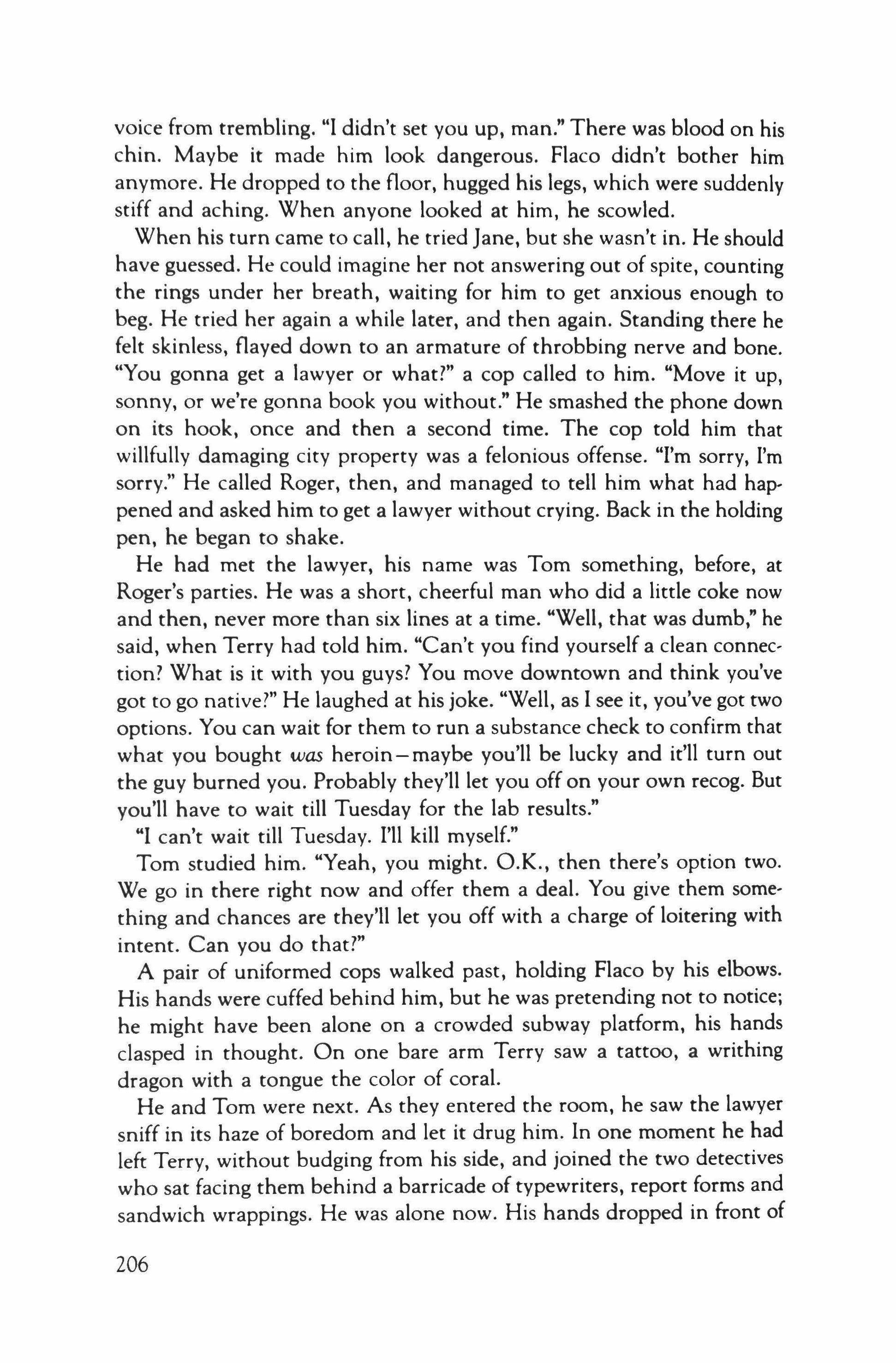
voice from trembling. "I didn't set you up. man." There was blood on his chin. Maybe it made him look dangerous. Flaco didn't bother him anymore. He dropped to the floor, hugged his legs. which were suddenly stiff and aching. When anyone looked at him, he scowled.
When his turn came to call, he tried Jane. but she wasn't in. He should have guessed. He could imagine her not answering out of spite, counting the rings under her breath. waiting for him to get anxious enough to beg. He tried her again a while later. and then again. Standing there he felt skinless. flayed down to an armature of throbbing nerve and bone. "You gonna get a lawyer or what?" a cop called to him. "Move it up, sonny, or we're gonna book you without." He smashed the phone down on its hook. once and then a second time. The cop told him that willfully damaging city property was a felonious offense. "I'm sorry, I'm sorry." He called Roger. then. and managed to tell him what had happened and asked him to get a lawyer without crying. Back in the holding pen, he began to shake.
He had met the lawyer. his name was Tom something, before, at Roger's parties. He was a short. cheerful man who did a little coke now and then. never more than six lines at a time. "Well. that was dumb." he said, when Terry had told him. "Can't you find yourself a clean connection? What is it with you guys? You move downtown and think you've got to go native?" He laughed at his joke. "Well, as I see it, you've got two options. You can wait for them to run a substance check to confirm that what you bought was heroin - maybe you'll be lucky and it'll turn out the guy burned you. Probably they'll let you off on your own recog. But you'll have to wait till Tuesday for the lab results."
"I can't wait till Tuesday. I'll kill myself."
Tom studied him. "Yeah, you might. O.K., then there's option two. We go in there right now and offer them a deal. You give them something and chances are they'll let you off with a charge of loitering with intent. Can you do that?"
A pair of uniformed cops walked past, holding Flaco by his elbows. His hands were cuffed behind him. but he was pretending not to notice; he might have been alone on a crowded subway platform, his hands clasped in thought. On one bare arm Terry saw a tattoo, a writhing dragon with a tongue the color of coral.
He and Tom were next. As they entered the room, he saw the lawyer sniff in its haze of boredom and let it drug him. In one moment he had left Terry, without budging from his side, and joined the two detectives who sat facing them behind a barricade of typewriters, report forms and sandwich wrappings. He was alone now. His hands dropped in front of
206
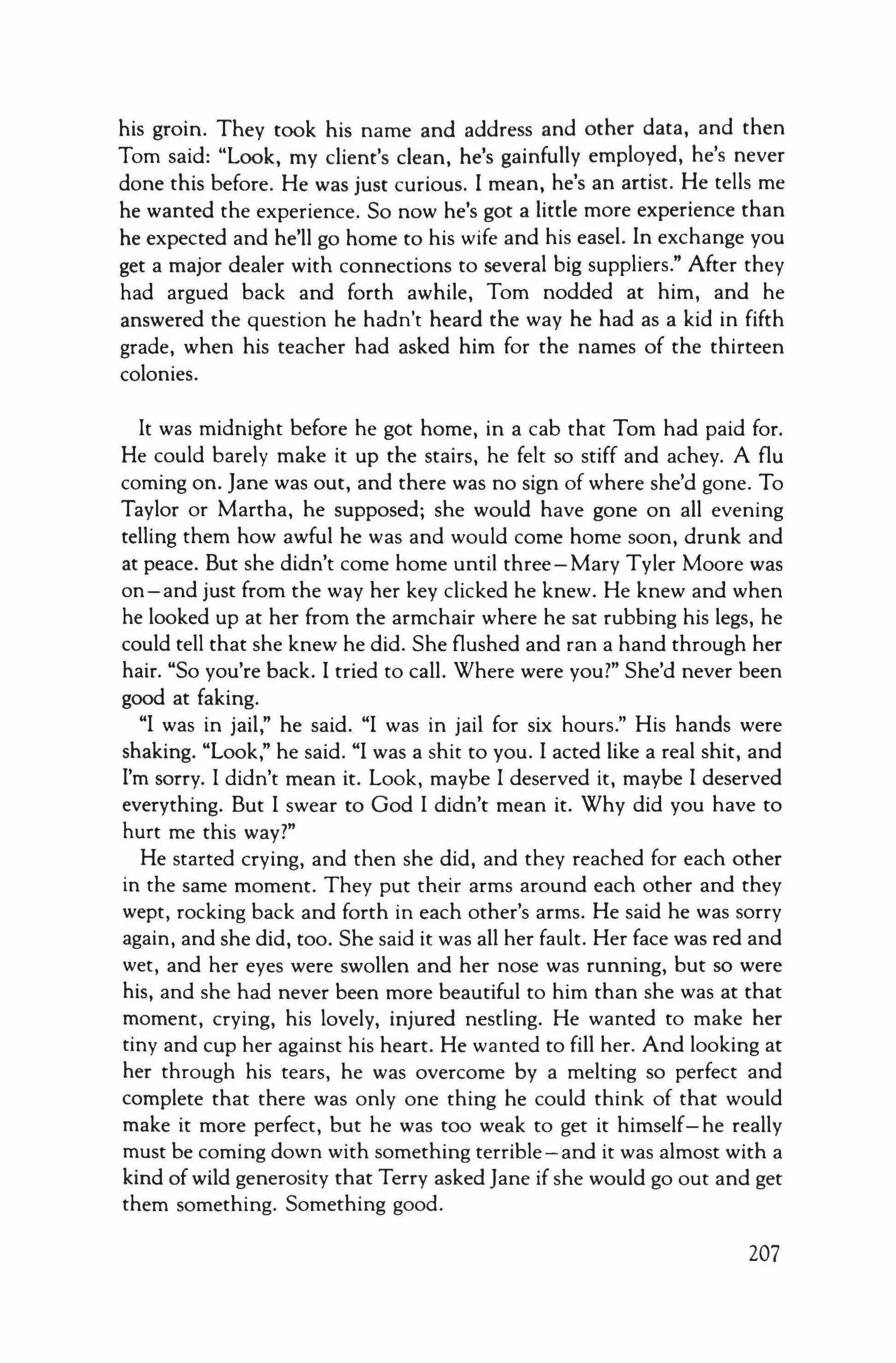
his groin. They took his name and address and other data, and then Tom said: "Look, my client's clean, he's gainfully employed, he's never done this before. He was just curious. I mean, he's an artist. He tells me he wanted the experience. So now he's got a little more experience than he expected and he'll go home to his wife and his easel. In exchange you get a major dealer with connections to several big suppliers." After they had argued back and forth awhile, Tom nodded at him, and he answered the question he hadn't heard the way he had as a kid in fifth grade, when his teacher had asked him for the names of the thirteen colonies.
It was midnight before he got home, in a cab that Tom had paid for. He could barely make it up the stairs, he felt so stiff and achey. A flu coming on. Jane was out, and there was no sign of where she'd gone. To Taylor or Martha, he supposed; she would have gone on all evening telling them how awful he was and would come home soon, drunk and at peace. But she didn't come home until three-Mary Tyler Moore was on-and just from the way her key clicked he knew. He knew and when he looked up at her from the armchair where he sat rubbing his legs, he could tell that she knew he did. She flushed and ran a hand through her hair. "So you're back. I tried to call. Where were you?" She'd never been good at faking.
"I was in jail," he said. "I was in jail for six hours." His hands were shaking. "Look," he said. "I was a shit to you. I acted like a real shit, and I'm sorry. I didn't mean it. Look, maybe I deserved it, maybe I deserved everything. But 1 swear to God 1 didn't mean it. Why did you have to hurt me this way?"
He started crying, and then she did, and they reached for each other in the same moment. They put their arms around each other and they wept, rocking back and forth in each other's arms. He said he was sorry again, and she did, too. She said it was all her fault. Her face was red and wet, and her eyes were swollen and her nose was running, but so were his, and she had never been more beautiful to him than she was at that moment, crying, his lovely, injured nestling. He wanted to make her tiny and cup her against his heart. He wanted to fill her. And looking at her through his tears, he was overcome by a melting so perfect and complete that there was only one thing he could think of that would make it more perfect, but he was too weak to get it himself-he really must be coming down with something terrible - and it was almost with a kind of wild generosity that Terry asked Jane if she would go out and get them something. Something good.
207
National Book Award Acceptance Speech
Charles Johnson
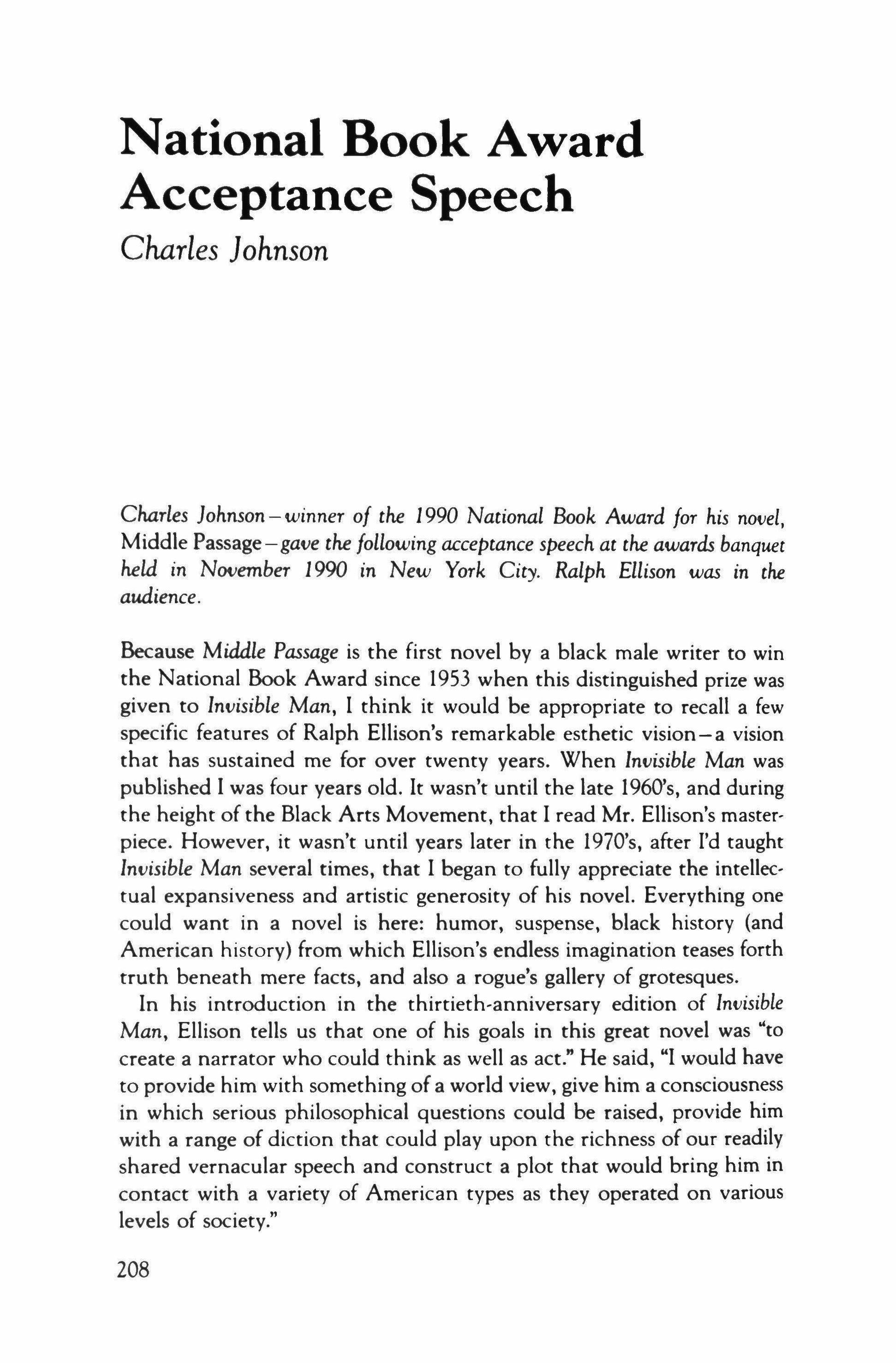
Charles lohnson - winner of the 1990 National Book Award for his novel, Middle Passagegave the following acceptance speech at the awards banquet held in November 1990 in New York City. Ralph Ellison was in the audience.
Because Middle Passage is the first novel by a black male writer to win the National Book Award since 1953 when this distinguished prize was given to Invisible Man, I think it would be appropriate to recall a few specific features of Ralph Ellison's remarkable esthetic vision-a vision that has sustained me for over twenty years. When Invisible Man was published I was four years old. It wasn't until the late 1960's, and during the height of the Black Arts Movement, that I read Mr. Ellison's masterpiece. However, it wasn't until years later in the 1970's, after I'd taught Invisible Man several times, that I began to fully appreciate the intellectual expansiveness and artistic generosity of his novel. Everything one could want in a novel is here: humor, suspense, black history (and American history) from which Ellison's endless imagination teases forth truth beneath mere facts, and also a rogue's gallery of grotesques.
In his introduction in the thirtieth-anniversary edition of Invisible Man, Ellison tells us that one of his goals in this great novel was "to create a narrator who could think as well as act." He said, "I would have to provide him with something of a world view, give him a consciousness in which serious philosophical questions could be raised, provide him with a range of diction that could play upon the richness of our readily shared vernacular speech and construct a plot that would bring him in contact with a variety of American types as they operated on various levels of society."
208
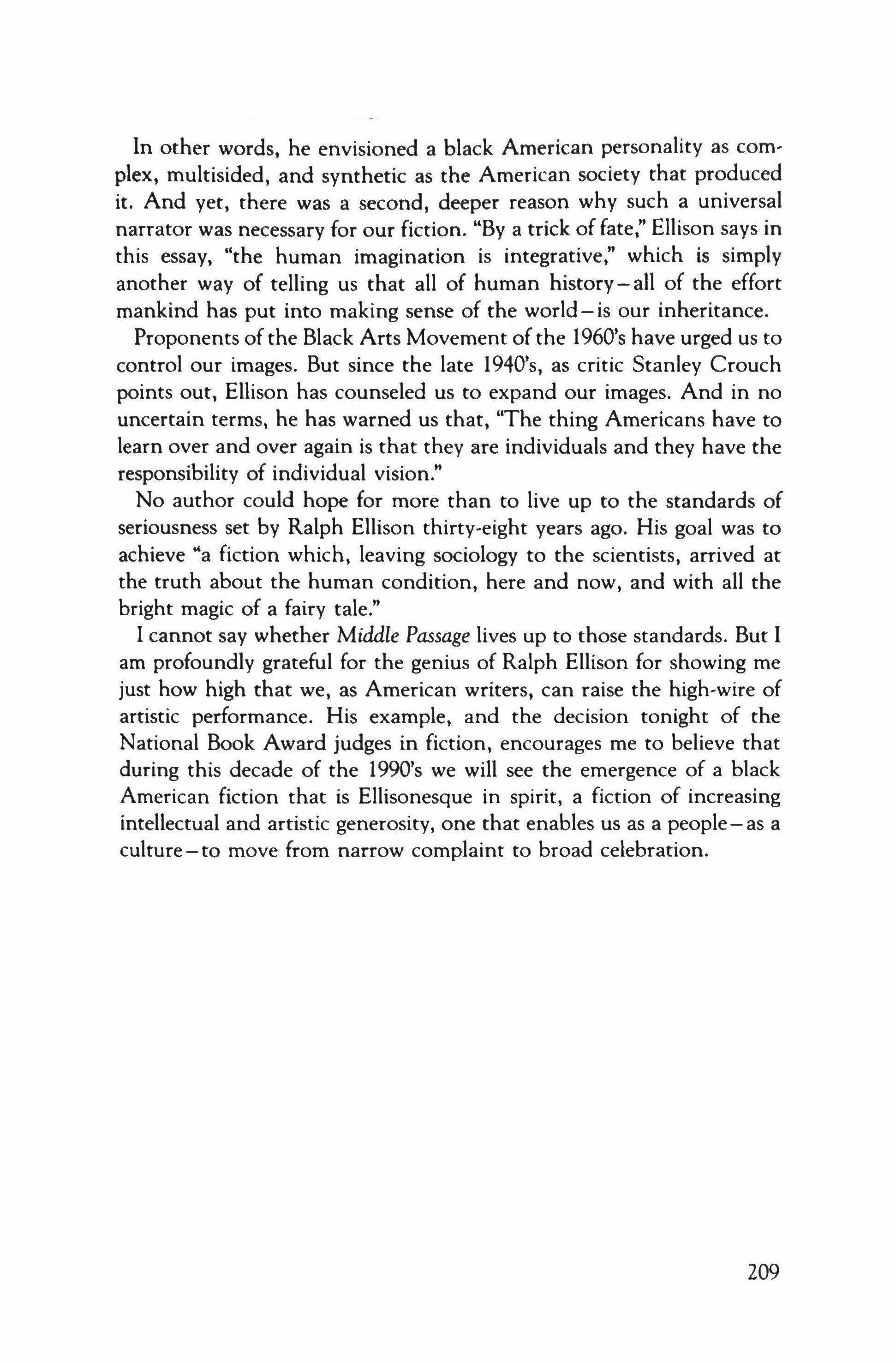
In other words, he envisioned a black American personality as complex, multisided, and synthetic as the American society that produced it. And yet, there was a second, deeper reason why such a universal narrator was necessary for our fiction. "By a trick of fate," Ellison says in this essay, "the human imagination is integrative," which is simply another way of telling us that all of human history - all of the effort mankind has put into making sense of the world-is our inheritance.
Proponents ofthe Black Arts Movement ofthe 1960's have urged us to control our images. But since the late 1940's, as critic Stanley Crouch points out, Ellison has counseled us to expand our images. And in no uncertain terms, he has warned us that, "The thing Americans have to learn over and over again is that they are individuals and they have the responsibility of individual vision."
No author could hope for more than to live up to the standards of seriousness set by Ralph Ellison thirty-eight years ago. His goal was to achieve "a fiction which, leaving sociology to the scientists, arrived at the truth about the human condition, here and now, and with all the bright magic of a fairy tale."
I cannot say whether Middle Passage lives up to those standards. But I am profoundly grateful for the genius of Ralph Ellison for showing me just how high that we, as American writers, can raise the high-wire of artistic performance. His example, and the decision tonight of the National Book Award judges in fiction, encourages me to believe that during this decade of the 1990's we will see the emergence of a black American fiction that is Ellisonesque in spirit, a fiction of increasing intellectual and artistic generosity, one that enables us as a people-as a culture-to move from narrow complaint to broad celebration.
209
Two Letters on Sylvia Plath and a Reply

7th March 1991
Dear Ms Thompson,
Houghton Mifflin sent along your piece in TRIQUARTERLY on Sylvia Plath and PMS l" 'Dawn Poems in Blood': Sylvia Plath and PMS," by Catherine Thompson, TriQuarterly, Winter 1990/91 (#80), pp. 221-49]- a valuable piece of Plath scholarship. I would like to send it to Frankfurter Verlag where Ida Schoffling, Plath's German publisher, is compiling gradually a collection of the best short pieces on Plath-your piece certainly qualifies for inclusion in my view.
I regret it was not available before publication of BITTER FAME-I should certainly have urged consideration of its findings in that book. Even so, I can't quite believe its the whole story for Plath (viz Styron's recent book on depression) though it may well be that she could have coped better with her difficulties without the exacerbation of PMS. It does explain a great deal- not least the fact that her cyclical shifts of mood were mysterious in having no discernable cause and their occasional outward manifestations so disproportionate. Ted Hughes has spoken of the accompanying changes in her eating patterns-she would eat ravenously in these phases. I wonder if that is a known characteristic of PMS? A specialist in diabetes here in London wrote me after reading BITTER FAME suspecting that around the birth of her son Sylvia could have been suffering from undiagnosed diabetes. The accounts of her hearty eating had most intrigued him and he wondered if this was accompanied by the huge thirst that accompanies diabetes (as far as its known, it was not). One of the reasons I was so bowled over by your
210
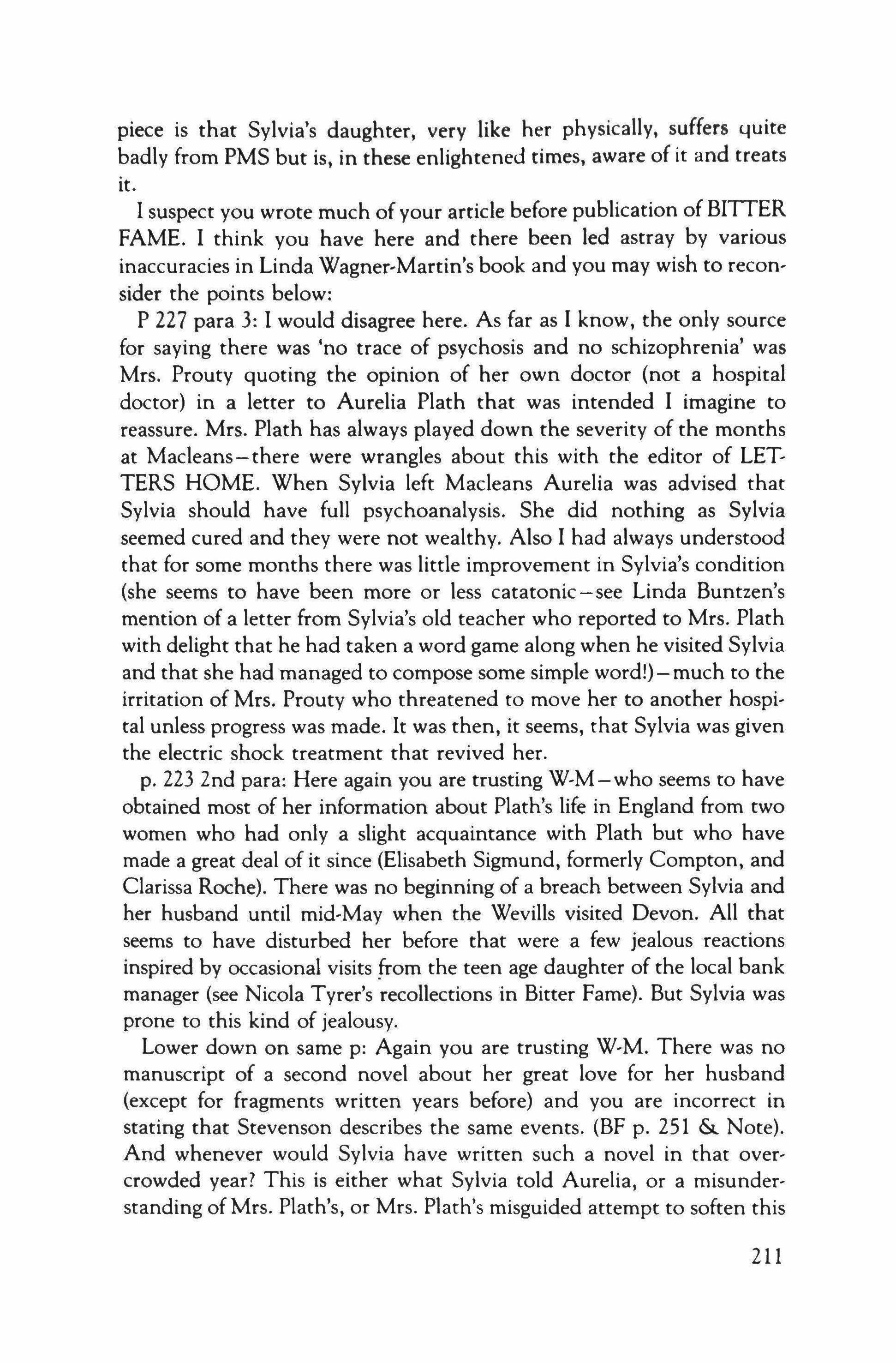
piece is that Sylvia's daughter, very like her physically, suffers quite badly from PMS but is, in these enlightened times, aware of it and treats it.
I suspect you wrote much of your article before publication of BIITER FAME. I think you have here and there been led astray by various inaccuracies in Linda Wagner-Martin's book and you may wish to reconsider the points below:
P 227 para 3: I would disagree here. As far as I know, the only source for saying there was 'no trace of psychosis and no schizophrenia' was Mrs. Prouty quoting the opinion of her own doctor (not a hospital doctor) in a letter to Aurelia Plath that was intended I imagine to reassure. Mrs. Plath has always played down the severity of the months at Macleans-there were wrangles about this with the editor of LETTERS HOME. When Sylvia left Macleans Aurelia was advised that Sylvia should have full psychoanalysis. She did nothing as Sylvia seemed cured and they were not wealthy. Also I had always understood that for some months there was little improvement in Sylvia's condition (she seems to have been more or less catatonic-see Linda Buntzen's mention of a letter from Sylvia's old teacher who reported to Mrs. Plath with delight that he had taken a word game along when he visited Sylvia and that she had managed to compose some simple word!)-much to the irritation of Mrs. Prouty who threatened to move her to another hospital unless progress was made. It was then, it seems, that Sylvia was given the electric shock treatment that revived her.
p. 223 2nd para: Here again you are trusting W-M-who seems to have obtained most of her information about Plath's life in England from two women who had only a slight acquaintance with Plath but who have made a great deal of it since (Elisabeth Sigmund, formerly Compton, and Clarissa Roche). There was no beginning of a breach between Sylvia and her husband until mid-May when the Wevills visited Devon. All that seems to have disturbed her before that were a few jealous reactions inspired by occasional visits from the teen age daughter of the local bank manager (see Nicola Tyrer's recollections in Bitter Fame). But Sylvia was prone to this kind of jealousy.
Lower down on same p: Again you are trusting W-M. There was no manuscript of a second novel about her great love for her husband (except for fragments written years before) and you are incorrect in stating that Stevenson describes the same events. (BF p. 251 & Note). And whenever would Sylvia have written such a novel in that overcrowded year? This is either what Sylvia told Aurelia, or a misunderstanding of Mrs. Plath's, or Mrs. Plath's misguided attempt to soften this
211
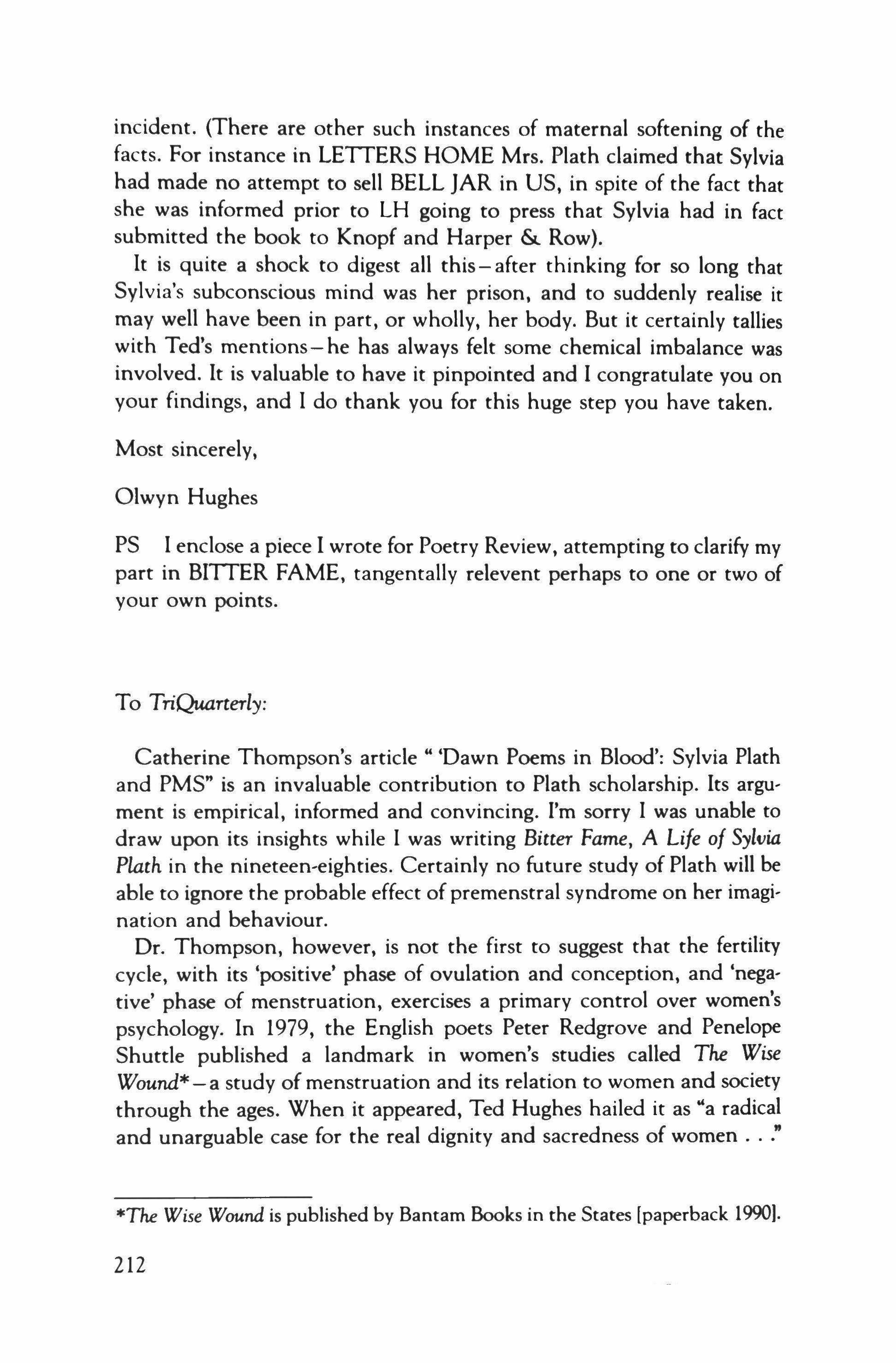
incident. (There are other such instances of maternal softening of the facts. For instance in LETTERS HOME Mrs. Plath claimed that Sylvia had made no attempt to sell BELL JAR in US, in spite of the fact that she was informed prior to LH going to press that Sylvia had in fact submitted the book to Knopf and Harper & Row).
It is quite a shock to digest all this - after thinking for so long that Sylvia's subconscious mind was her prison, and to suddenly realise it may well have been in part, or wholly, her body. But it certainly tallies with Ted's mentions- he has always felt some chemical imbalance was involved. It is valuable to have it pinpointed and I congratulate you on your findings, and I do thank you for this huge step you have taken.
Most sincerely,
Olwyn Hughes
PS I enclose a piece I wrote for Poetry Review, attempting to clarify my part in BITTER FAME, tangentallv relevent perhaps to one or two of your own points.
To TriQuarterly:
Catherine Thompson's article" 'Dawn Poems in Blood': Sylvia Plath and PMS" is an invaluable contribution to Plath scholarship. Its argument is empirical, informed and convincing. I'm sorry I was unable to draw upon its insights while I was writing Bitter Fame, A Life of Sylvia Plath in the nineteen-eighties. Certainly no future study of Plath will be able to ignore the probable effect of premenstral syndrome on her imagination and behaviour.
Dr. Thompson, however, is not the first to suggest that the fertility cycle, with its 'positive' phase of ovulation and conception, and 'negative' phase of menstruation, exercises a primary control over women's psychology. In 1979, the English poets Peter Redgrove and Penelope Shuttle published a landmark in women's studies called The Wise Wound* - a study of menstruation and its relation to women and society through the ages. When it appeared, Ted Hughes hailed it as "a radical and unarguable case for the real dignity and sacredness of women ,"
*The Wise Wound is published by Bantam Books in the States [paperback 1990).
212

The Wise Wound (republished with additional material in paperback in 1982) was the result of exhaustive research, not only into the physiology of menstruation, but equally into the psychological, sociological and, above all, imaginative (mythical) complex in which PMS is by now inextricably enmeshed. Redgrove and Shuttle rightly chose not to treat of PMS as an isolated, physiological phenomenon. They cite, particularly, the pioneering work of Dr. Katharina Dalton in London during the 1950s and 60s, emphasizing, like Dr. Thompson, that PMS has only recently become medically respectable in the diagnosis of psychological unbalance and distress. (Although, surely, the common word 'hysteria', from the Latin hystericus, Greek, husterikos, womb, acknowledges that those ancient patriarchal societies were aware and frightened of women's power through 'womb-sickness'.)
Redgrove and Shuttle also believe that physiological and psychological factors are inseparable; we are not creatures either of mind or spirit, but of both; there is a body-mind continuum which we ignore at our peril. Thus, a sick somatic condition can originate in biological or hormonal disequilibrium.
In the case of Sylvia Plath, it is all but impossible to disentangle the psychological and physiological symptoms. Her journals tell us, almost on every page, that she was all her life a victim of what The Wise Wound defines as "howlback" - an hysterical state that occurs when acute PMS induces periodic feelings of extreme guilt and self-loathing. These then escalate to build up what can become a semi-permanent state of fear, paranoia (when transferred to people outside) and in Plath's case, anger. Fear and anger naturally produce "bad" social behaviour, which produces real resentment from outside observers. Which produces more fear and anger in the sufferer, and increases the likelihood of PMS in the next cycle.
Moreover, such a monthly flux of moods leaves no time for the sufferer's imagination to objectify. No matter how powerful, it eventually becomes fixed defensively within the embattled self, stifling and helpless as a fly in a bell-jar: a condition Sylvia Plath described, valiantly fought against and analysed again and again in her journals. Given her ambition, her imaginative powers of exaggeration, her strong will to purify herself and build a 'perfect' art and life, and the limited knowledge medical science brought to bear on her illness, it seems that, at the time, she had almost no chance of surviving. As Catherine Thompson so cogently and sadly puts it, "When the premenstrual syndrom plunged her into a tortuous depression, her continued existence depended on the self-will not to commit suicide." It was when that self-will collapsed that she died.
213

The question remains: if, in February, 1963, Sylvia Plath had been given hormonal treatment for PMS in Dr. Katharina Dalton's clinic, would she be alive today? I'm certain that if she had lived to read The Wise Wound she would have responded to the full imaginative, psychological and mythic scope of that study. Peter Redgrove she knew already, and in Penelope Shuttle she would have found a sympathetic friend and fellow sufferer.
Whether she would have responded to hormonal treatment alone, I'm not so sure. Bitter Fame gives evidence ofthree occasions when Sylvia gave way to destructive overmastering rage while she was pregnant - and therefore presumably immune to PMS. The first was in March, 1960, weeks before the birth of her daughter, when she refused to speak to Ted's family and friends who had been invited for lunch. The second, February, 1961, was when, in a fit ofjealousy, she tore up her husband's work-in-progress; shortly afterwards, she miscarried. A third occurred when she was three month's pregnant, visiting the Merwins in France. Dido Merwin's report of her extremely rude, unsocial behaviour on this occasion is confirmed by W. S. Merwin. Owing to the loss of Plath's journal for this year, we don't have her version of this visit. Does it not seem, however, that by the time she began having children, her psyche was, as it were, set? Having suffered the "atrocities" of PMS, and overcome them by shear will-power and determination, she was by that time incapable ofthe kind ofempathy and adaptability "normal" people find natural and easy?
Nonetheless, I want to thank Catherine Thompson for convincing me-and I hope many others-that Sylvia Plath was indeed illphysically disabled by PMS. The Freudian diagnosis that Plath herself accepted has always seemed suspect to me. Likewise, I have found the imprecise terminology of (mainly amateur) psychiatry unhelpful: she does not appear to have suffered from schizophrenia, as David Holbrook suggested; nor does it seem that she was chronically psychotic. Her "madness", like her "weirdness" was self-limiting and unpleasant to live with, but it gave life to her poems. They were her immortal bid for health, and in failing to achieve it, she became what she wanted most to be, a deathless poet.
Anne Stevenson
Langley Park, Durham, England
March 12, 1991
214
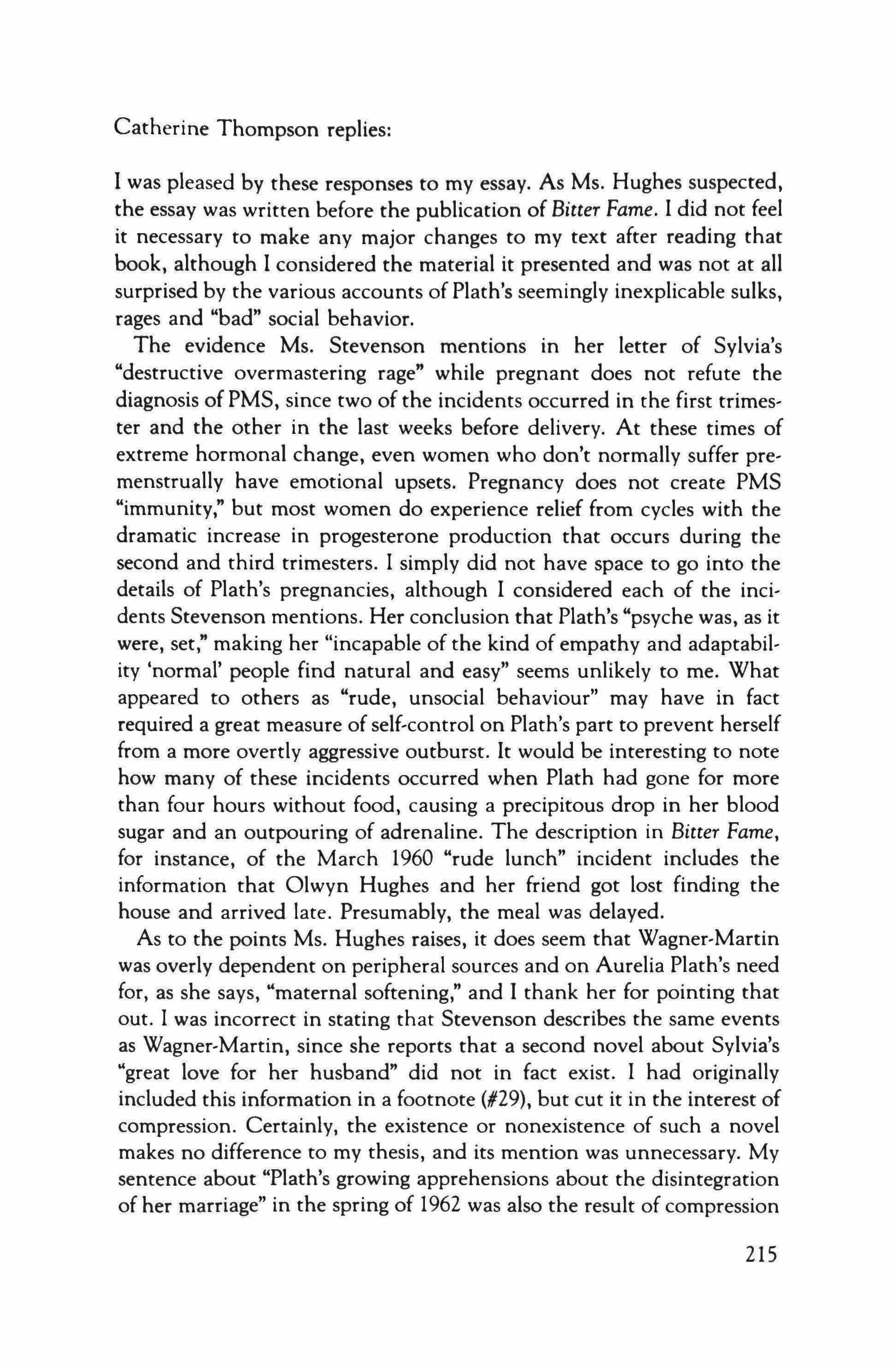 Catherine Thompson replies:
Catherine Thompson replies:
I was pleased by these responses to my essay. As Ms. Hughes suspected, the essay was written before the publication of Bitter Fame. I did not feel it necessary to make any major changes to my text after reading that book, although I considered the material it presented and was not at all surprised by the various accounts of Plath's seemingly inexplicable sulks, rages and "bad" social behavior.
The evidence Ms. Stevenson mentions in her letter of Sylvia's "destructive overmastering rage" while pregnant does not refute the diagnosis of PMS, since two of the incidents occurred in the first trirnester and the other in the last weeks before delivery. At these times of extreme hormonal change, even women who don't normally suffer premenstrually have emotional upsets. Pregnancy does not create PMS "immunity," but most women do experience relief from cycles with the dramatic increase in progesterone production that occurs during the second and third trimesters. I simply did not have space to go into the details of Plath's pregnancies, although I considered each of the incidents Stevenson mentions. Her conclusion that Plath's "psyche was, as it were, set," making her "incapable of the kind of empathy and adaptability 'normal' people find natural and easy" seems unlikely to me. What appeared to others as "rude, unsocial behaviour" may have in fact required a great measure of self-control on Plath's part to prevent herself from a more overtly aggressive outburst. It would be interesting to note how many of these incidents occurred when Plath had gone for more than four hours without food, causing a precipitous drop in her blood sugar and an outpouring of adrenaline. The description in Bitter Fame, for instance, of the March 1960 "rude lunch" incident includes the information that Olwyn Hughes and her friend got lost finding the house and arrived late. Presumably, the meal was delayed.
As to the points Ms. Hughes raises, it does seem that Wagner-Martin was overly dependent on peripheral sources and on Aurelia Plath's need for, as she says, "maternal softening," and I thank her for pointing that out. I was incorrect in stating that Stevenson describes the same events as WagnerlMartin, since she reports that a second novel about Sylvia's "great love for her husband" did not in fact exist. I had originally included this information in a footnote (#29), but cut it in the interest of compression. Certainly, the existence or nonexistence of such a novel makes no difference to my thesis, and its mention was unnecessary. My sentence about "Plath's growing apprehensions about the disintegration of her marriage" in the spring of 1962 was also the result of compression
215
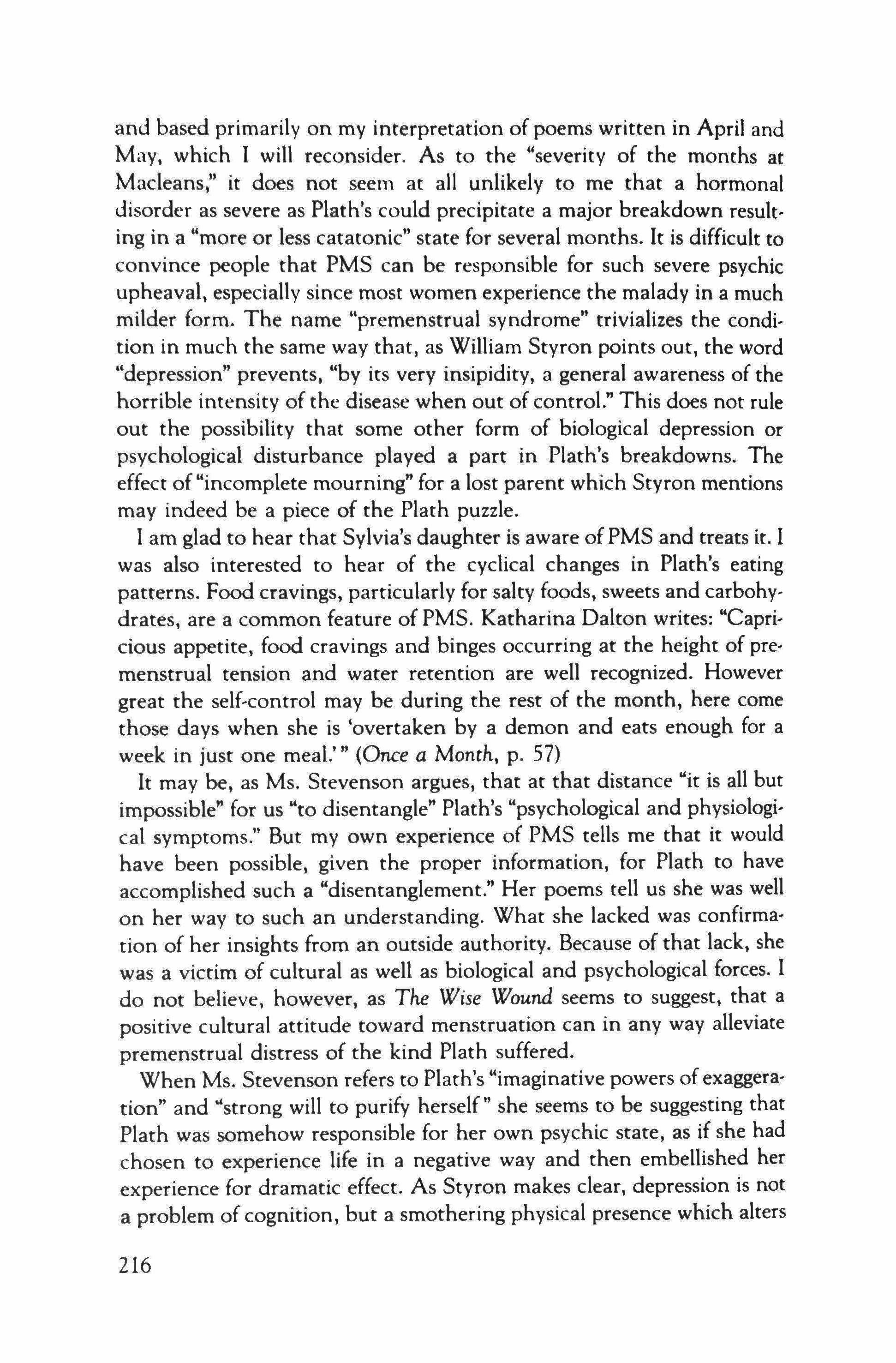
and based primarily on my interpretation of poems written in April and May, which I will reconsider. As to the "severity of the months at Macleans," it does not seem at all unlikely to me that a hormonal disorder as severe as Plath's could precipitate a major breakdown resulting in a "more or less catatonic" state for several months. It is difficult to convince people that PMS can be responsible for such severe psychic upheaval, especially since most women experience the malady in a much milder form. The name "premenstrual syndrome" trivializes the condition in much the same way that, as William Styron points out, the word "depression" prevents, "by its very insipidity, a general awareness of the horrible intensity of the disease when out of control." This does not rule out the possibility that some other form of biological depression or psychological disturbance played a part in Plath's breakdowns. The effect of "incomplete mourning" for a lost parent which Styron mentions may indeed be a piece of the Plath puzzle.
I am glad to hear that Sylvia's daughter is aware of PMS and treats it. I was also interested to hear of the cyclical changes in Plath's eating patterns. Food cravings, particularly for salty foods, sweets and carbohydrates, are a common feature of PMS. Katharina Dalton writes: "Capricious appetite, food cravings and binges occurring at the height of premenstrual tension and water retention are well recognized. However great the self-control may be during the rest of the month, here come those days when she is 'overtaken by a demon and eats enough for a week in just one meaL'" (Once a Month, p. 57)
It may be, as Ms. Stevenson argues, that at that distance "it is all but impossible" for us "to disentangle" Plath's "psychological and physiological symptoms." But my own experience of PMS tells me that it would have been possible, given the proper information, for Plath to have accomplished such a "disentanglement." Her poems tell us she was well on her way to such an understanding. What she lacked was confirmation of her insights from an outside authority. Because of that lack, she was a victim of cultural as well as biological and psychological forces. I do not believe, however, as The Wise Wound seems to suggest, that a positive cultural attitude toward menstruation can in any way alleviate premenstrual distress of the kind Plath suffered.
When Ms. Stevenson refers to Plath's "imaginative powers of exaggeration" and "strong will to purify herself" she seems to be suggesting that Plath was somehow responsible for her own psychic state, as if she had chosen to experience life in a negative way and then embellished her experience for dramatic effect. As Styron makes clear, depression is not a problem of cognition, but a smothering physical presence which alters
216

the way one experiences one's entire being and the world around it. My own feeling is that, far from being exaggerations, Plath's poems and journals are attempts to articulate what she called "psychic landscape"landscapes which are incomprehensible to those who have not experienced them and indescribable by most of those who have. As Plath realized, the "Words dry and riderless" must necessarily fall short. Even so, she came as close to capturing the particular sensory quality of these states as any writer I know.
Catherine Thompson Tucson, Arizona
June 28, 1991
217
Contributors
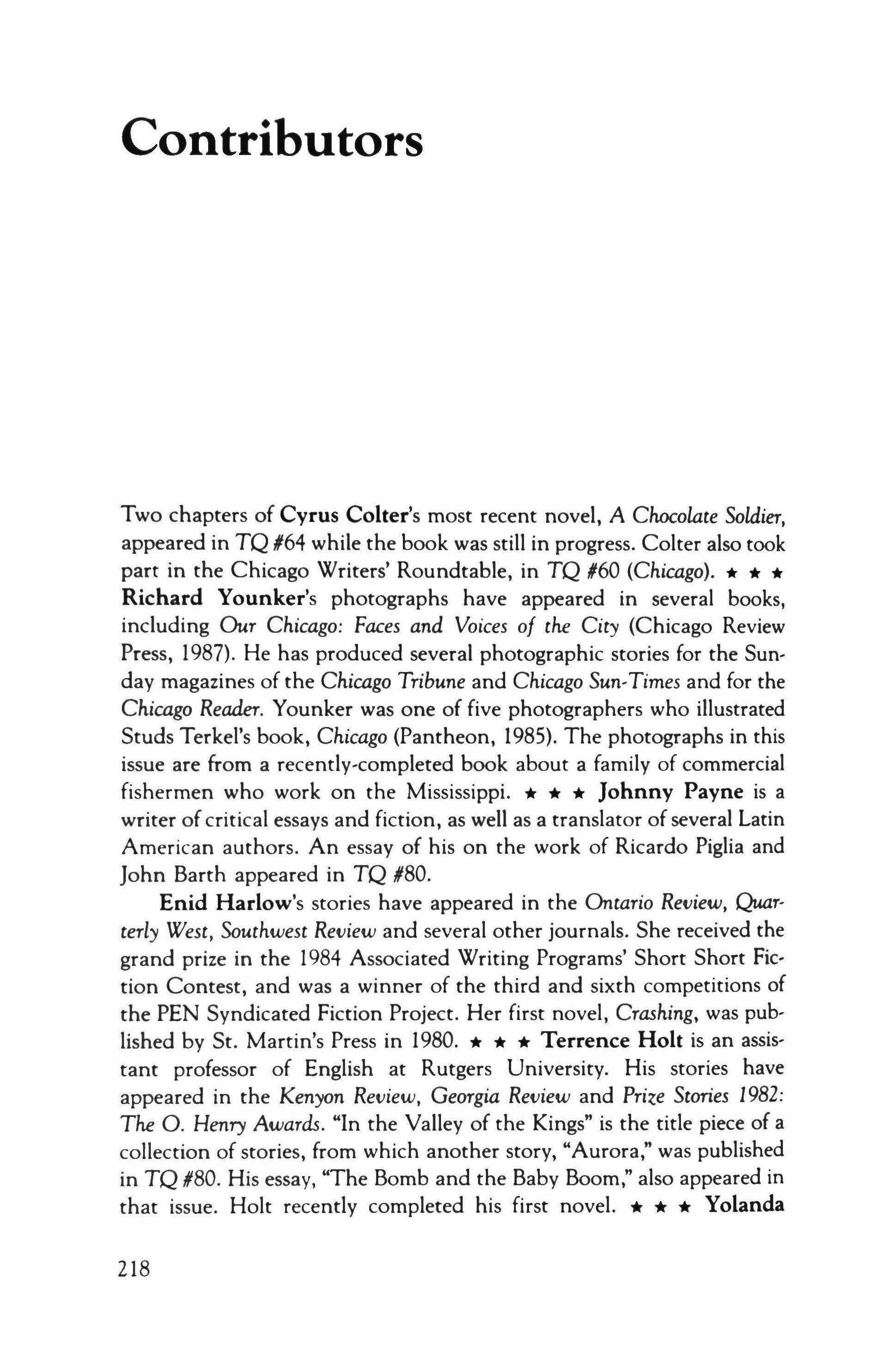
Two chapters of Cyrus Colter's most recent novel, A Chocolate Soldier, appeared in TQ #64 while the book was still in progress. Colter also took part in the Chicago Writers' Roundtable, in TQ #60 (Chicago). * * * Richard Younker's photographs have appeared in several books, including Our Chicago: Faces and Voices of the City (Chicago Review Press, 1987). He has produced several photographic stories for the Sunday magazines of the Chicago Tribune and Chicago Sun-Times and for the Chicago Reader. Younker was one of five photographers who illustrated Studs Terkel's book, Chicago (Pantheon, 1985). The photographs in this issue are from a recently-completed book about a family of commercial fishermen who work on the Mississippi. * * * Johnny Payne is a writer of critical essays and fiction, as well as a translator of several Latin American authors. An essay of his on the work of Ricardo Piglia and John Barth appeared in TQ #80.
Enid Harlow's stories have appeared in the Ontario Review, Quarterly West, Southwest Review and several other journals. She received the grand prize in the 1984 Associated Writing Programs' Short Short Fiction Contest, and was a winner of the third and sixth competitions of the PEN Syndicated Fiction Project. Her first novel, Crashing, was published by St. Martin's Press in 1980. * * * Terrence Holt is an assistant professor of English at Rutgers University. His stories have appeared in the Kenyon Review, Georgia Review and Prize Stories 1982: The O. Henry Awards. "In the Valley of the Kings" is the title piece of a collection of stories, from which another story, "Aurora," was published in TQ #80. His essay, "The Bomb and the Baby Boom," also appeared in that issue. Holt recently completed his first novel. * * * Yolanda
218
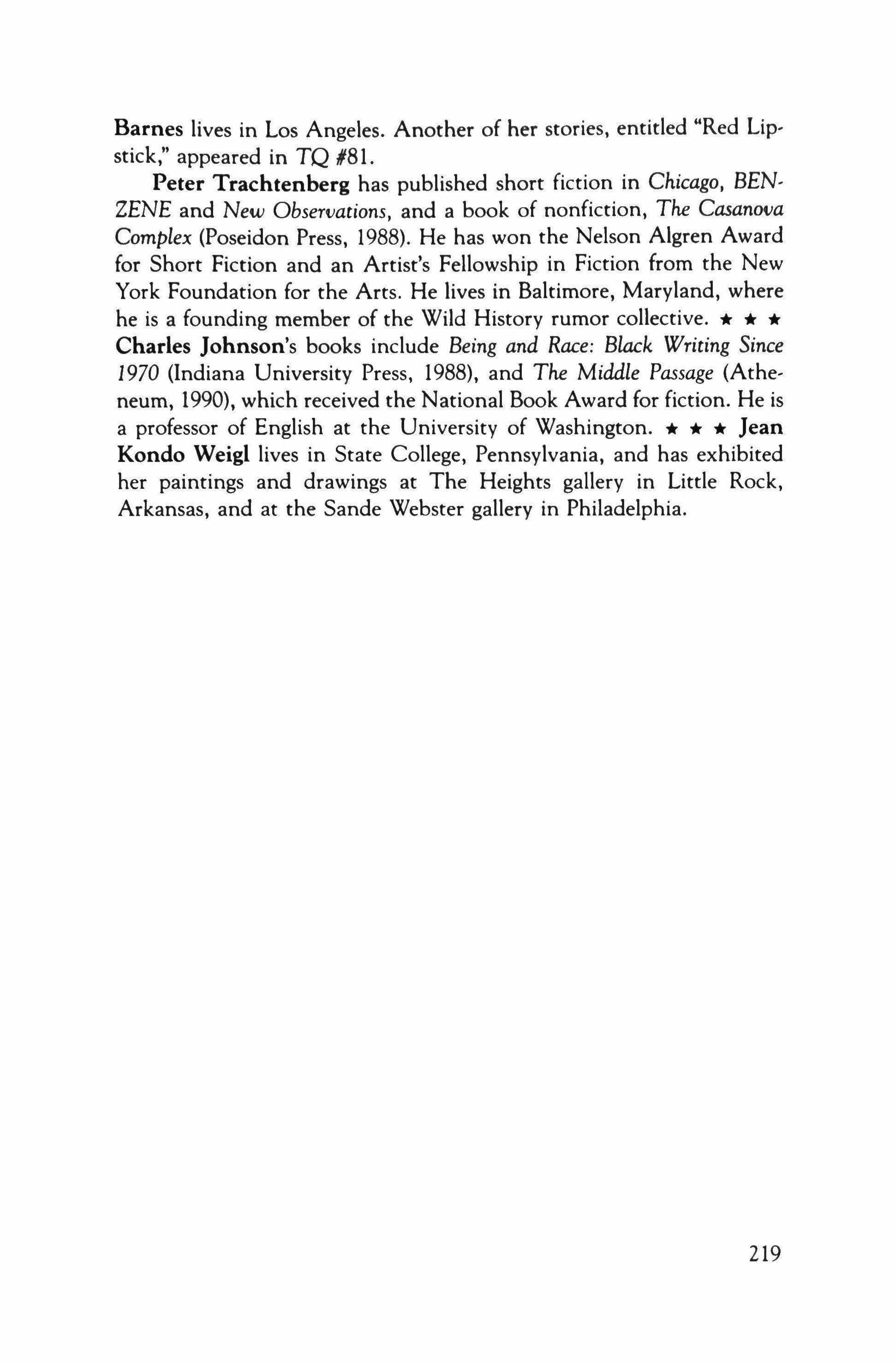
Barnes lives in Los Angeles. Another of her stories, entitled "Red Lipstick," appeared in TQ #81.
Peter Trachtenberg has published short fiction in Chicago, BENZENE and New Observations, and a book of nonfiction, The Casanova Complex (Poseidon Press, 1988). He has won the Nelson Algren Award for Short Fiction and an Artist's Fellowship in Fiction from the New York Foundation for the Arts. He lives in Baltimore, Maryland, where he is a founding member of the Wild History rumor collective. * * * Charles Johnson's books include Being and Race: Black Writing Since 1970 (Indiana University Press, 1988), and The Middle Passage (Atheneum, 1990), which received the National Book Award for fiction. He is a professor of English at the University of Washington. * * * Jean Kondo Weigl lives in State College, Pennsylvania, and has exhibited her paintings and drawings at The Heights gallery in Little Rock, Arkansas, and at the Sande Webster gallery in Philadelphia.
219
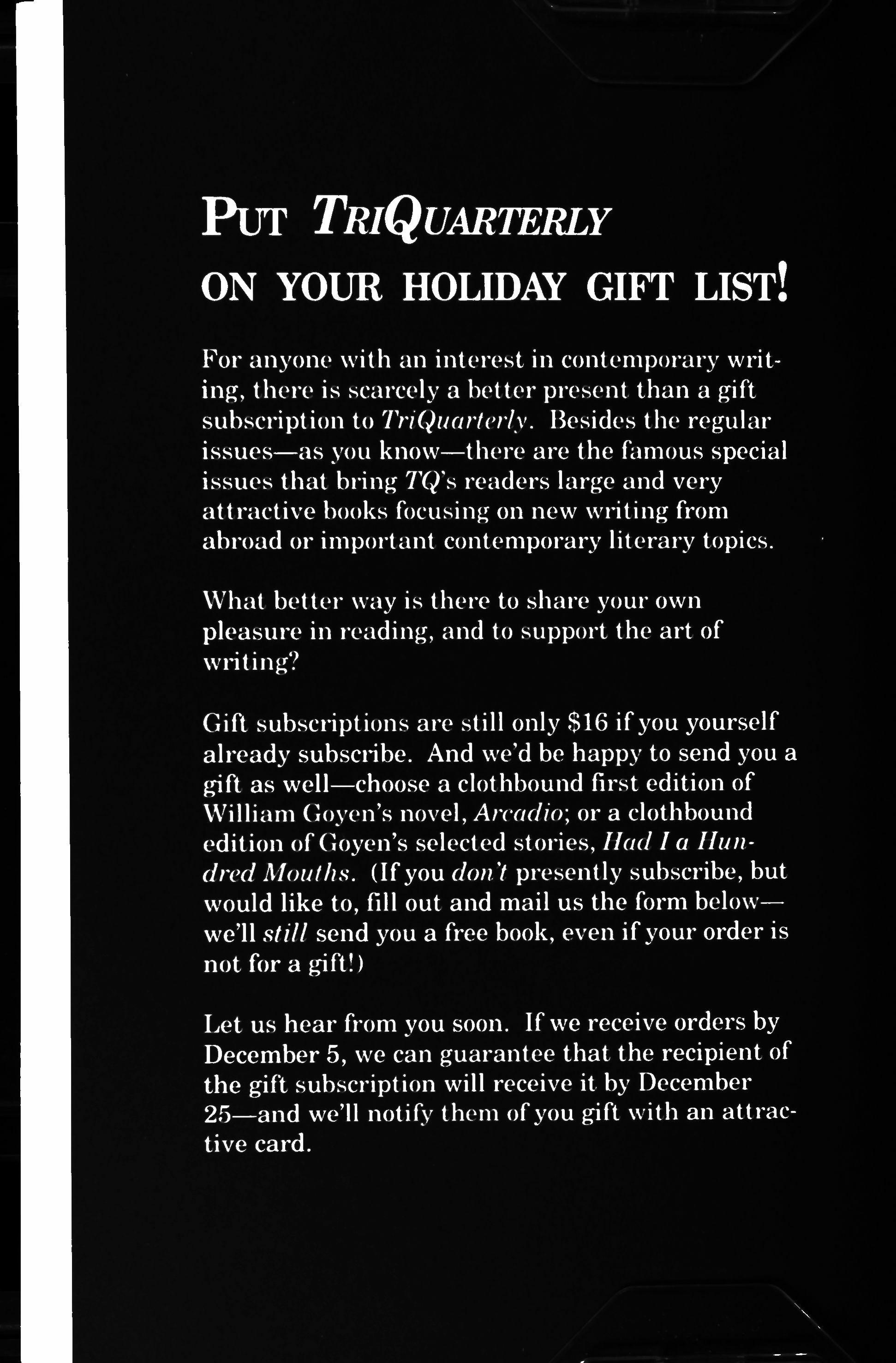
TriQuarterly, Northwestern University, 2020 Ridge Ave., Evanston, II... 60208-4302
Please enter my subscription(s):
o 1 year ($18) o 2 Years ($32) o *gift ($16) o life ($250)
o I enclose $
o Charge my VISNMasterCard #

o Please bill me.
Signature Exp. Date
Name
Admess
City State --Zip---
For my free gift, I choose:
o A free copy of William Goyen' s Arcadio
Gift subscription for:
Name
Admess
o A free copy of William Goyen' s Had I a Hundred Mouths
City State Zip
*Please note that the reduced ($16) price for gifts applies only if you are a current subscriber. For all foreign subscriptions, gift or otherwise, add $4/year.
"Magnificent last volume of Boyd's critical biography of Vladimir Nabokov."
-Kirkus Reviews

Here, at last, is the definitive life of one of the twentieth century's greatest writers. The first volume of Brian Boyd's critical biography of Vladimir Nabokov, The Russian Years, received praise from critics and won a large and enthusiastic popular audience. I n this second and concluding volume, Boyd continues the story of Nabokov's life from the novelist's arrival in the United States in 1940, nearly destitute and without a job.
" ••• conveys a keen sense of Nabokov as an artist wbo embraced life as an inexhaustible surprise trlumpbant and definitive blop'apby." -Publishers Weekly Cloth $29.95 ISBN �91.Q6797-X ($35.00 after 1/1192) p�u�p� ORDERS: 800-PRS-ISBN (n7-4726) OR FROM YOUR LOCAL BOOKSTORE
NEW PUBLICATIONS FROM GIBBS SMITH
when
we talk about
Conversations with Maryann carver, William Kittredge,)ayMcinerney, Leonard Michaels, Robert Stone, Douglas Unger, GeoffreyWolff, Tobias Wolff
Edited by Sam Halpert
"I doubt that any American writer has been examined, remembered, interpreted, or admired with such wisdom, thoroughness, or affection." -
C. Michael Curtis, Senior Editor, The Atlantic $17.95, cloth
THE FLORENTINE PAPERS
A debut novel by Thom Palmer "With a connoisseur's attention to the delights
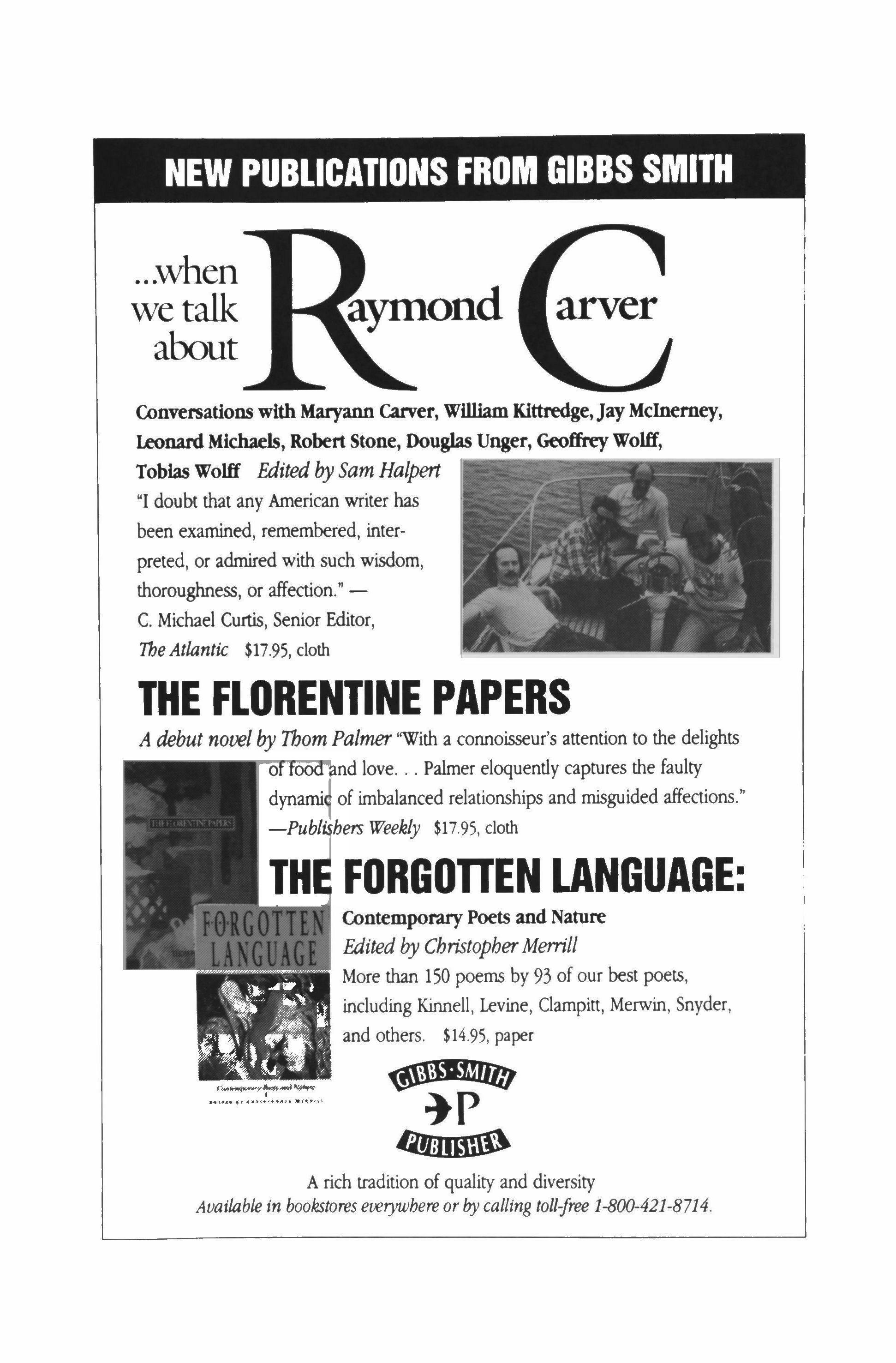
Contemporary Poets and Nature
Edited by ChristopherMerrill
More than 150 poems by 93 of our best poets, including Kinnell, Levine, Clampitt, Merwin, Snyder, and others. $14.95, paper
A rich tradition of quality and diversity
Available in bookstores everywhere or bycalling toll-free 1-800-421-8714.
� +p �
Maybe It Was So Reginald Gibbons
From impossioned lovers to apocalyptic 1000dscopes, Gibbons's poems articulate a vision of the individual life in the midst of larger forces.
"Gibbons's work has the highly disciplined artistry that scrupulous honesty requires. A supple syntax, a measured demotic, on intimate speech tone, on ear finely tuned to nuanced emotion, and a protective tenderness distinguish his poems." - Eleanor Wilner, Oxford Companion to Twentieth-Century Poetry
Paper $7.95 72 pages
L.ibrary cloth edition $20.00
Covenant
Alan Shapiro
"'The poems in Covenant sta rt from that secret point in the psyche where instinct and memory both swirl and flash together. The sweaty seams of adolescence; the rock pool of family life; the keyhole through which we wotch the comings and goings of others; the ghostly underworld of our own feelings-over all this material the poet arches a rainbow bridge of husky eloquence, tender intelligence, and brooking sympathy. Any new book by Alan Shapiro is couse far gratitude, and this one is his best." -J. D. McClatchy
Paper $'0.95 .04 pages
library cloth edition $22.00

The University of Chicago Press 5801 South Ellis Chicago, Il 60637
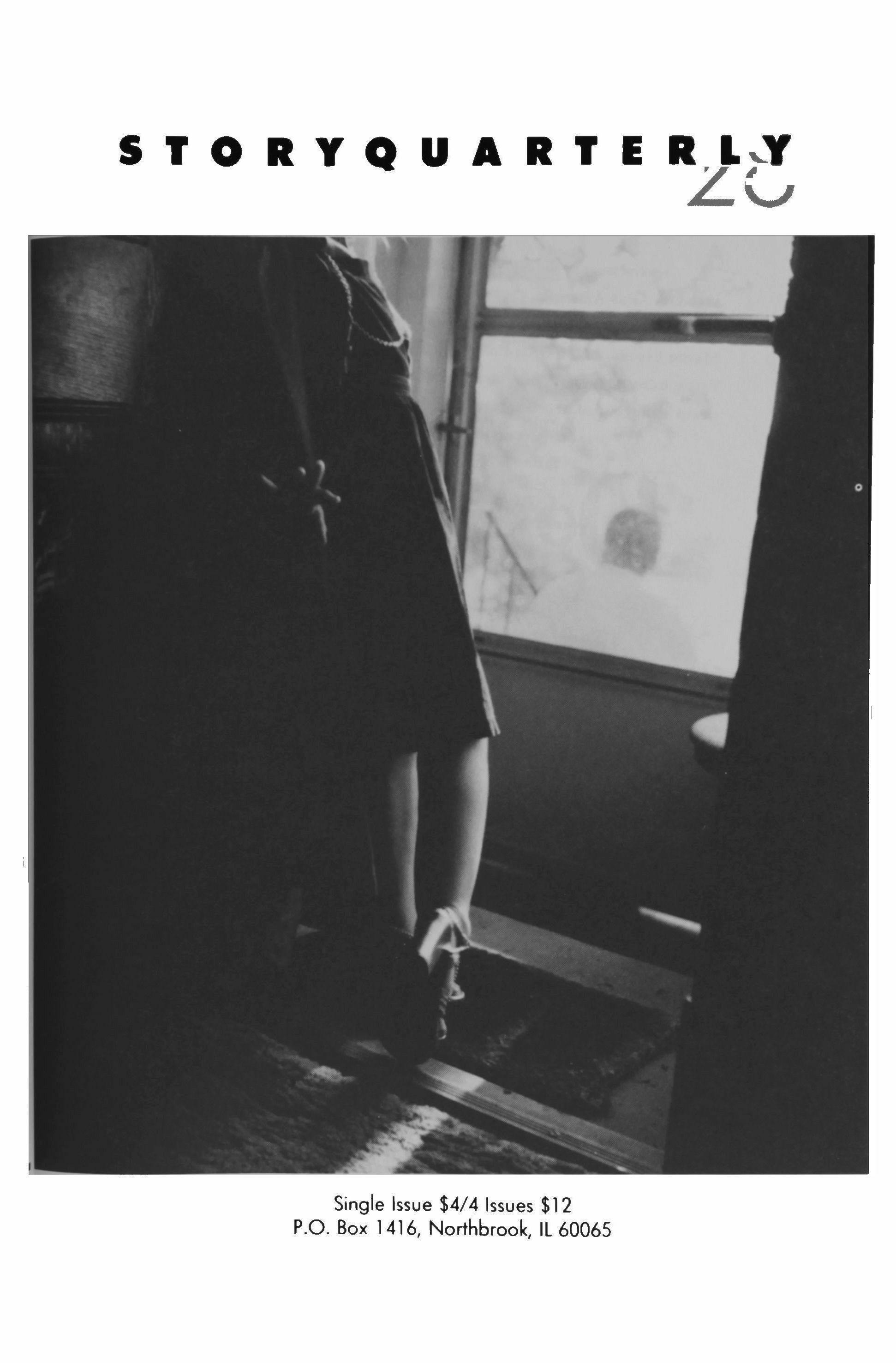
5 TOR Y QUA R T E R L...._Y Lv Single Issue $414 Issues $12 P.O. Box 1416, Northbrook, Il 60065
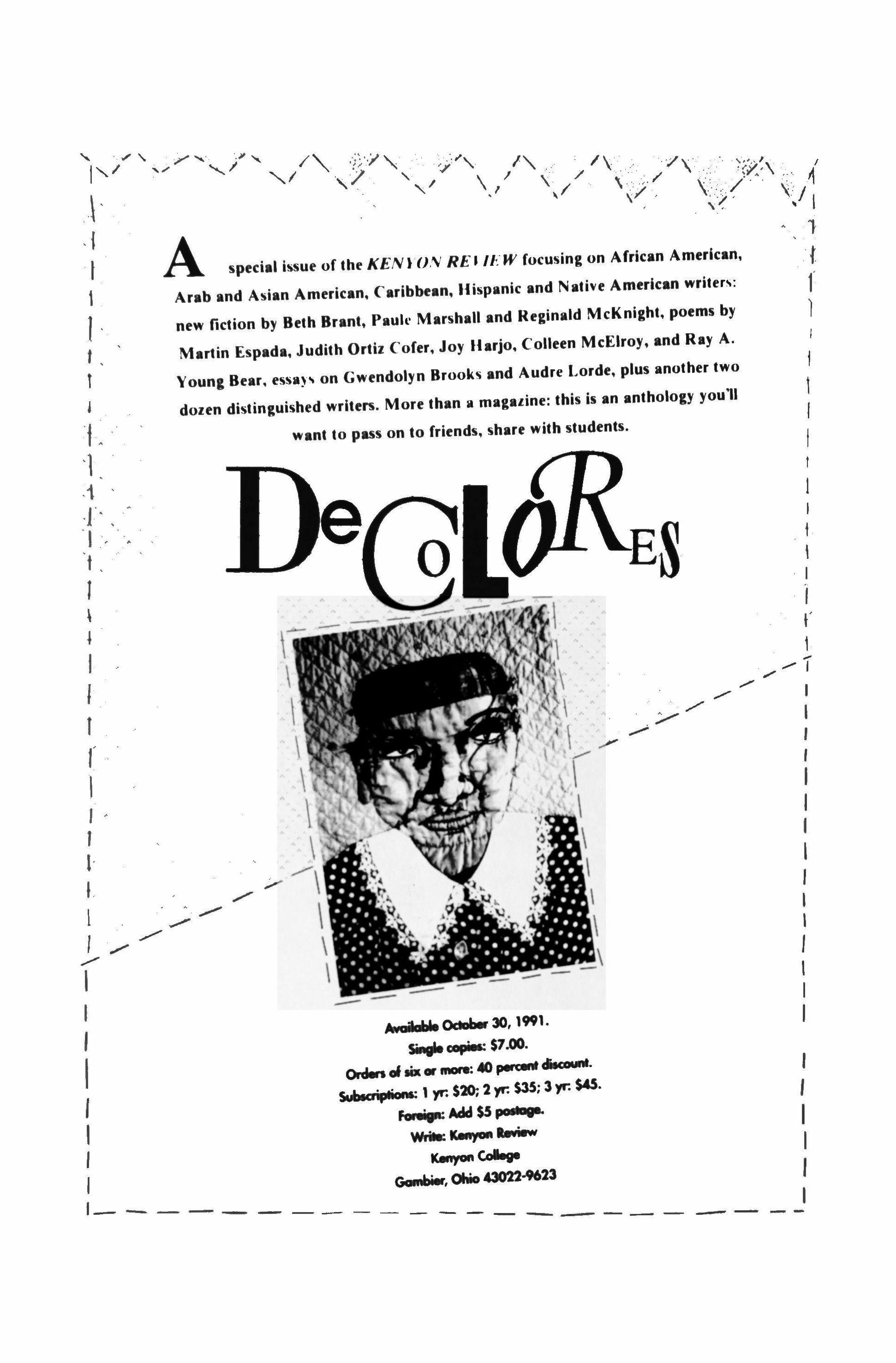
special issue of the KEN HJiV RE 1/1: W focusing on African American, 1
Arab and Asian American, Caribbean, Hispanic and Native American writers: new fiction by Beth Brant, Paull' Marshall and Reginald McKnight, poems by , Martin Espada, Judith Ortiz Cofer, Joy Uarjo, Colleen McElroy, and Ray A.
l Young Bear. essa), on Gwendolyn Brooks and Audre Lorde, plus another two
dozen distinguished writers. More than a maglline: this is an anthology youll
want to pass on to friends. share with students. 0dDber30.1991. SiIIgIecap.: $7.00. Orden cilia. _: .to
I j r 1 7 I I I , J J I I I I I I I I I I I I I I I J J I A
I
f '1. ,1 J', , .>, '1. 1 \ l I I J r I , , I· I / I ...1/"'I
yr.
3 yr.
1I I I I
per<*If'_'. 5.+ ;,..iOIlI: I yr. $20; 2
$35;
�. foNip: Add $5 WriIII:�"'" Kanpn CoII.ge c;.nbier. Ohio 43022-9623
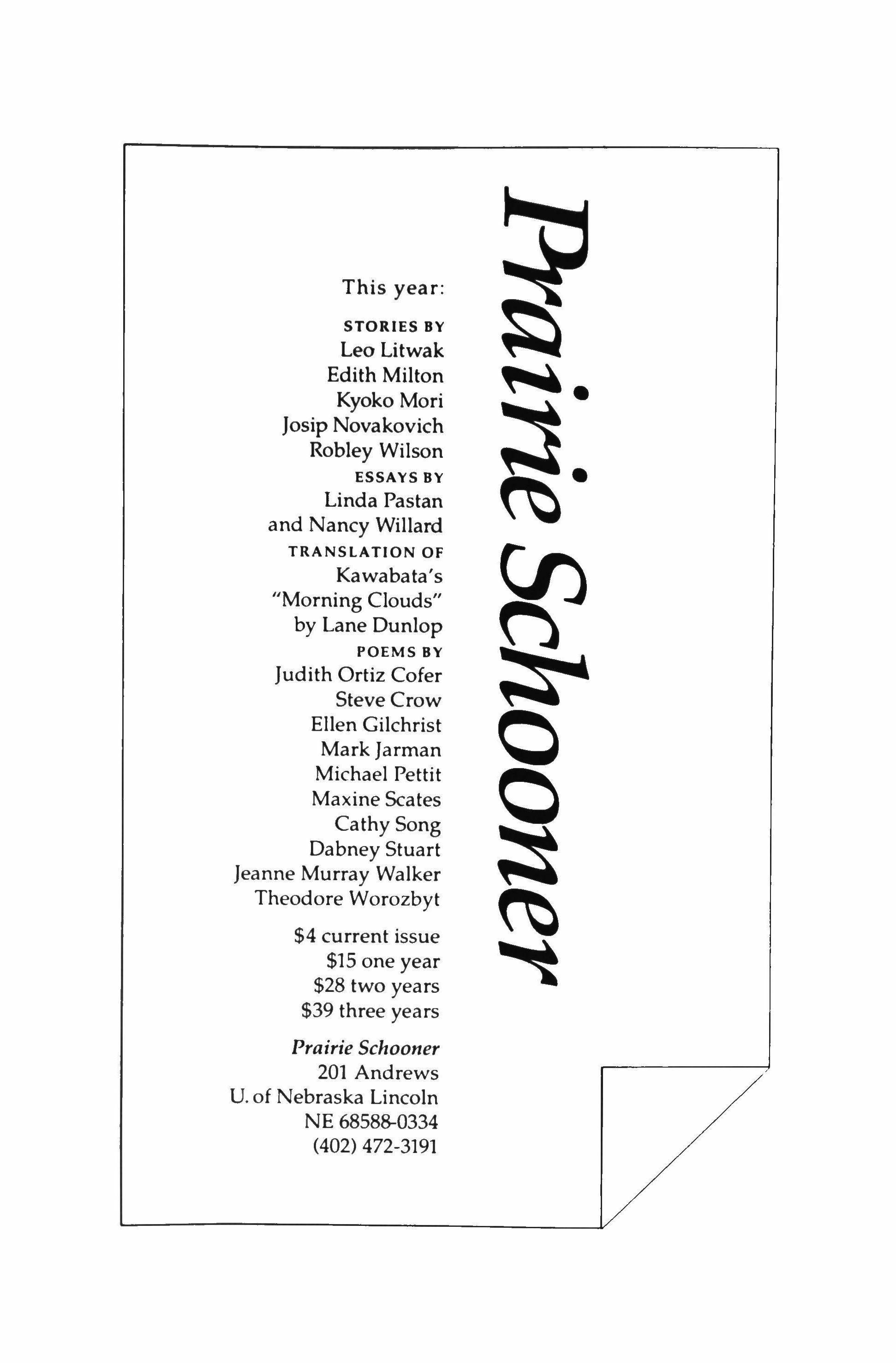
This year:
STORIES BY Leo Litwak
Edith Milton
Kyoko Mori
Josip Novakovich
Robley Wilson
ESSAYS BY
Linda Pastan and Nancy Willard
TRANSLATION OF Kawabata's "Morning Clouds" by Lane Dunlop
POEMS BY
Judith Ortiz Cofer
Steve Crow
Ellen Gilchrist
Mark Jarman
Michael Pettit
Maxine Scates
Cathy Song
Dabney Stuart
Jeanne Murray Walker
Theodore Worozbyt
$4 current issue
$15 one year
$28 two years
$39 three years
Prairie Schooner
201 Andrews
U. of Nebraska Lincoln NE 68588-0334
(402) 472-3191
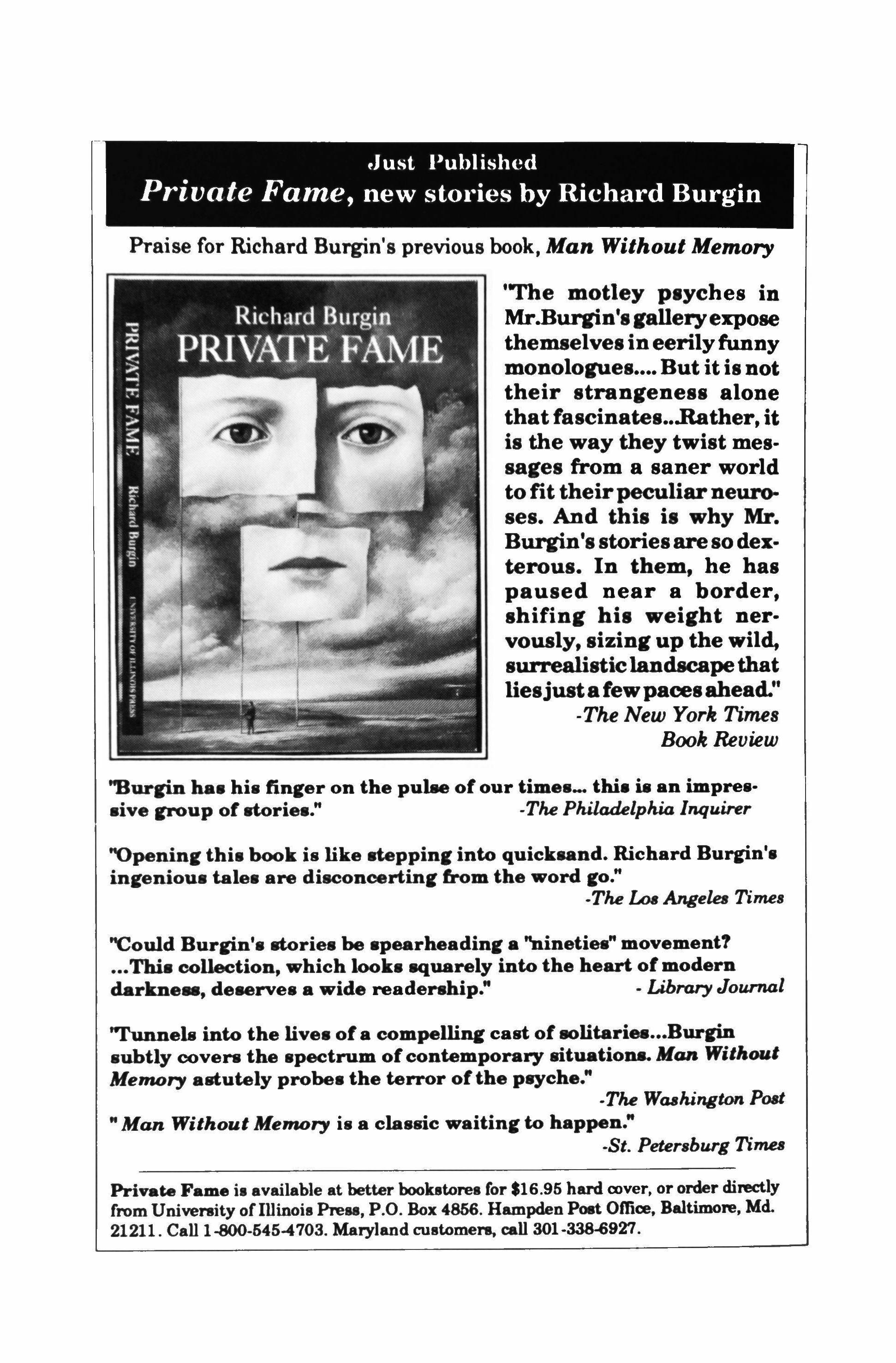
.Just Published Private Fame, new stories by
Richard Burgin
Praise for Richard Burgin's previous book, Mall Without Memory
'The motley psyches in Mr.BW'lPn'slalleryexpose themselves in eerilyfunny monologues••.• But it is not their strangeness alone that fascinates .Rather, it is the way they twist messales from a saner world to fit theirpeculiar neuroses. And this is why Mr. BUI1Pn's stories are so dexterous. In them, he has paused near a borde� shifinl his weilht nervously, sizing up the wild, surrealisticlandscapethat liesjustafewpacesahead."
-The New York Times Book Review
"Bur,m has his tinrer on the puJ.e of our times_ this u an impres.ive croup of 8torie•.
-The Ph.i.lo.cklphia Inquirer
"Openinr this book is like .tappin, into quicksand. Richard Bu.,p,n's inreniou. tale. are disconceriin, from the word ro."
- The La. Angela Ti11U!S
"Could Bur,m'. 8torie. be .pearheadin, a "nineties" movement?
Thi. collection, which looks squarely into the heart of modern c1arkneu, deserves a wide readership." - Library JOUT7IIJl
'Tunnels into the live. of a compellinc cast of aolitari_ Burcin subtly cove the spectrum of contemporary situationa. Man Without Menwry astutely probe. the terror ofthe psyche."
-Th« W08hi"llton POBt Man Without Menwry is a classic waitinr to happeD."
-St. Petersburg Ti11U!8
Private Fame i. available at better bookstore. for $16.95 hard rover, or order directly from University ofIllinois Pre P.O. Box 4856. Hampden Poat Office, Baltimore, Md. 21211. Call 1-800-545-4703. Maryland customers, call 301-�927.
Where

Personal Voices on Cultural Issues
you can still hear people thinking for themselves
Edward W. Said "The Politics of Knowledge"
David Bromwich "Higher Education and Group Thinking"
D. A. Miller "Bringing Out Roland Barthes"
Mark Edmundson "laschlng Out"
Margery Sabin "The Suttee Romance"
William Kerrigan on Camille Paglia
Susan Schultz "Gertrude Stein and Self-Advertisement" Arts. Literature. Philosophy. Politics
�ITAN
Edited by Richard Poirier
$16/one
year
Make check payable to RARITAN, 31 Mine St., New Brunswick NJ 08903 Sorry, we cannot bill.
$26ltwo years
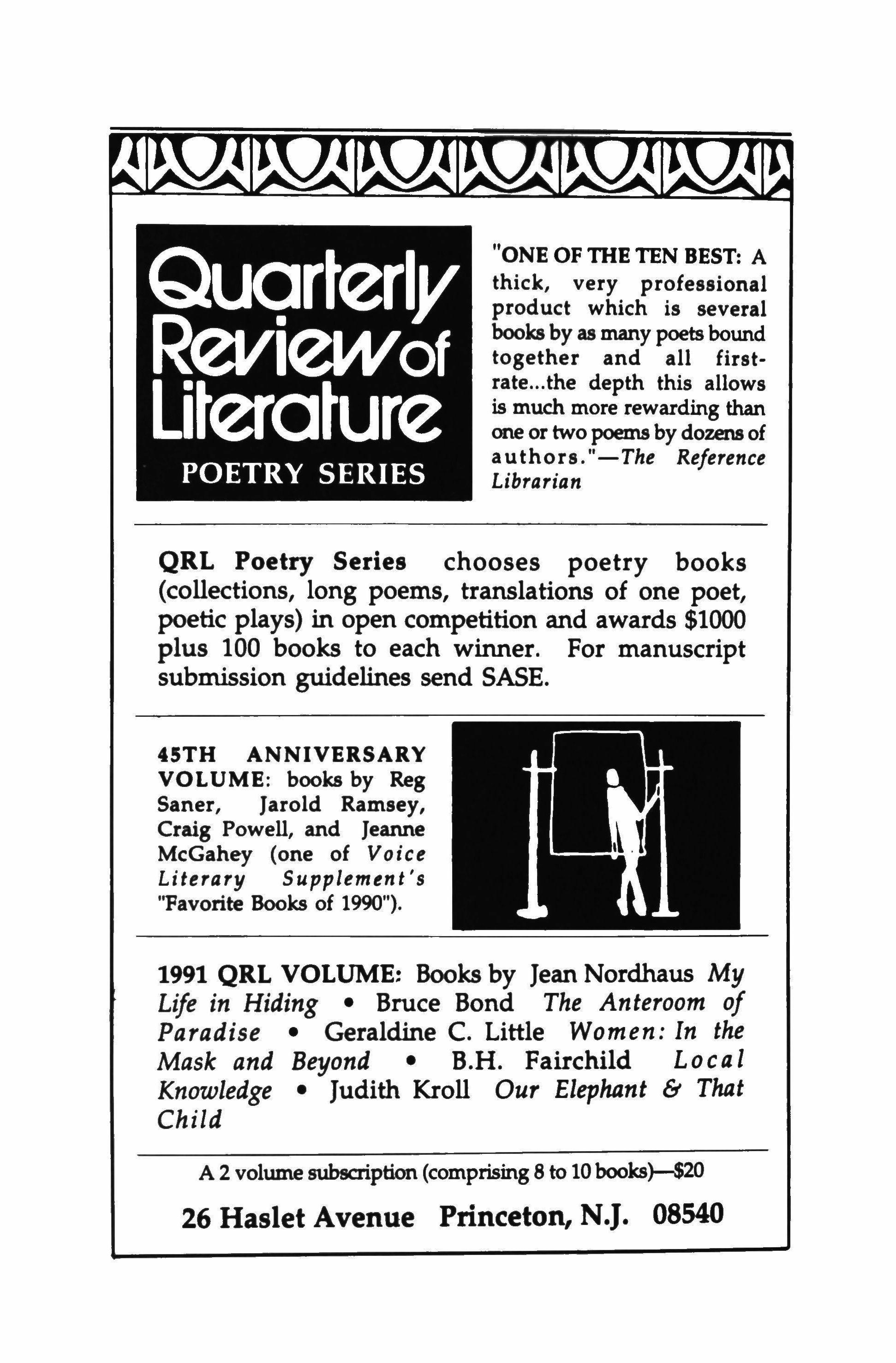
"ONE OF THE TEN BEST: A thick, very professional product which is several books by as many poets bound together and all firstrate the depth this allows is much more rewarding than one or two poems by dozens of authors. "-The Reference Librarian
QRL Poetry Series chooses poetry books (collections, long poems, translations of one poet, poetic plays) in open competition and awards $1000 plus 100 books to each winner. For manuscript submission guidelines send SASE.
45TH ANNIVERSARY
VOLUME: books by Reg Saner, Jarold Ramsey, Craig Powell, and Jeanne McGahey (one of Voice Literary Supplement's "Favorite Books of 1990").
1991 QRL VOLUME: Books by Jean Nordhaus My Life in Hiding Bruce Bond The Anteroom of Paradise • Geraldine C. Little Women: In the Mask and Beyond • B.H. Fairchild L 0 C a I Knowledge Judith Kroll Our Elephant & That Child
A 2 volume subscription (comprising 8 to 10 booksH20 26 Haslet Avenue Princeton, N.J. 08540
Harriet Rubin's Mother's Wooden Hand
Susan Hahn
Harriet Rubin s N1other's Wooden Hand is a superb book, passionate and moving, yet put together with considerable elegance and control. I found it gripping and consistently involving. A very remarkable first book.•-Frank Bidort
P�per $8.95 96 pages
Cloth $22.00

Between the Chains
Turner Cassity
At a time when most poems seem a commodity, quickly written, quickly read and easily thrown away, Turner Cassity's poems seem even more astonishing examples of good writing and reading, exceptions to be admired and kept."-Edgar Bowers
P�per $8.95 96 p�ges
Cloth $22.00
t,j l. lit (" T Y HfWH� Tr�u�s ..iI, <'•. .4 ...;;
The University of Chicago Press 580 I South Ellis Chicago, IL 60637
IN THE AIR
Robert Nichols
"Imagine Sherwood Anderson on drugs and into political causes. Add a good dose of playfulness and late-20th-century absurdity, and you get Nichols."-Kirkus Reviews
"These 13 stories break through the consumer comfort zone in surprising ways, making a powerful connection among materialism, poverty, dehumanization, environmental ruin, and war."-Library Journal
$10.95 paperback
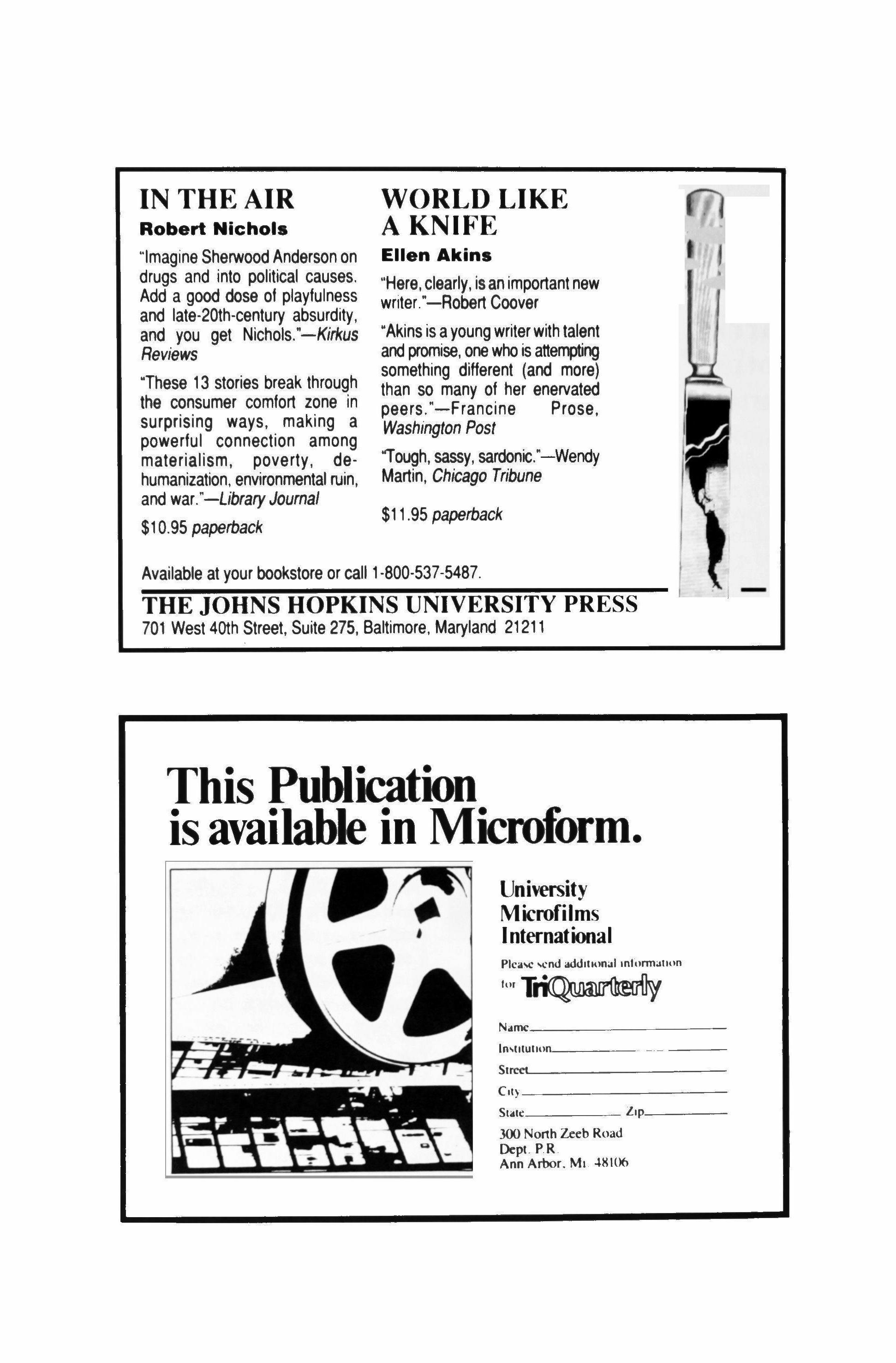
WORLD LIKE A KNIFE
Ellen Akins
"Here, clearly, is an important new writer."-Robert Coover
Akins is a young writer with talent and promise, one who is attempting something different (and more) than so many of her enervated peers."-Francine Prose, Washington Post
"Tough, sassy, sardonic:-Wendy Martin, Chicago Tribune
$11.95 paperback
at your bookstore or call 1-800-537-5487, THE JOHNS HOPKINS UNIVERSITY PRESS 701 West 40th Street, Suite 275, Baltimore, Maryland 21211 This Publication is available in Microform. University Microfilms International Please send addlHunal mtormanon 'orT� Na""" In'(uulIO,"Street, C,ly Slal< z,p, 300 North Zeeb Road Dept. PR Ann Arbor. MI. 4XI06
Available
�MERICAN�HORT £(FICTION
Editor: Laura Furman
University of Texas at Austin
American Short Fiction is a new quarterly that offers (0 the voracious lover of fiction the work of both the famous and the up-and-coming writer of today. This new quartcrlv tells the luxunant. old-fashioned talc in the tradition of Henry J.1I111'� .md Katherine Anne Porter, and till' quick, hardluning short short, a form well-loved from Anton Chckhov (0 Haymond Carver, Each American Short Fiction is an anthology of the current story, told in .ill its voiccs-e-cnough to keep a reader going until the next ISSUC.
Contents of Number 3, Fall 1991
Susan Fromberg Schaeffer
Jude Roy
Rebecca Morris
Rosellen Brown
Wrighr Morris
Frieda Arkin
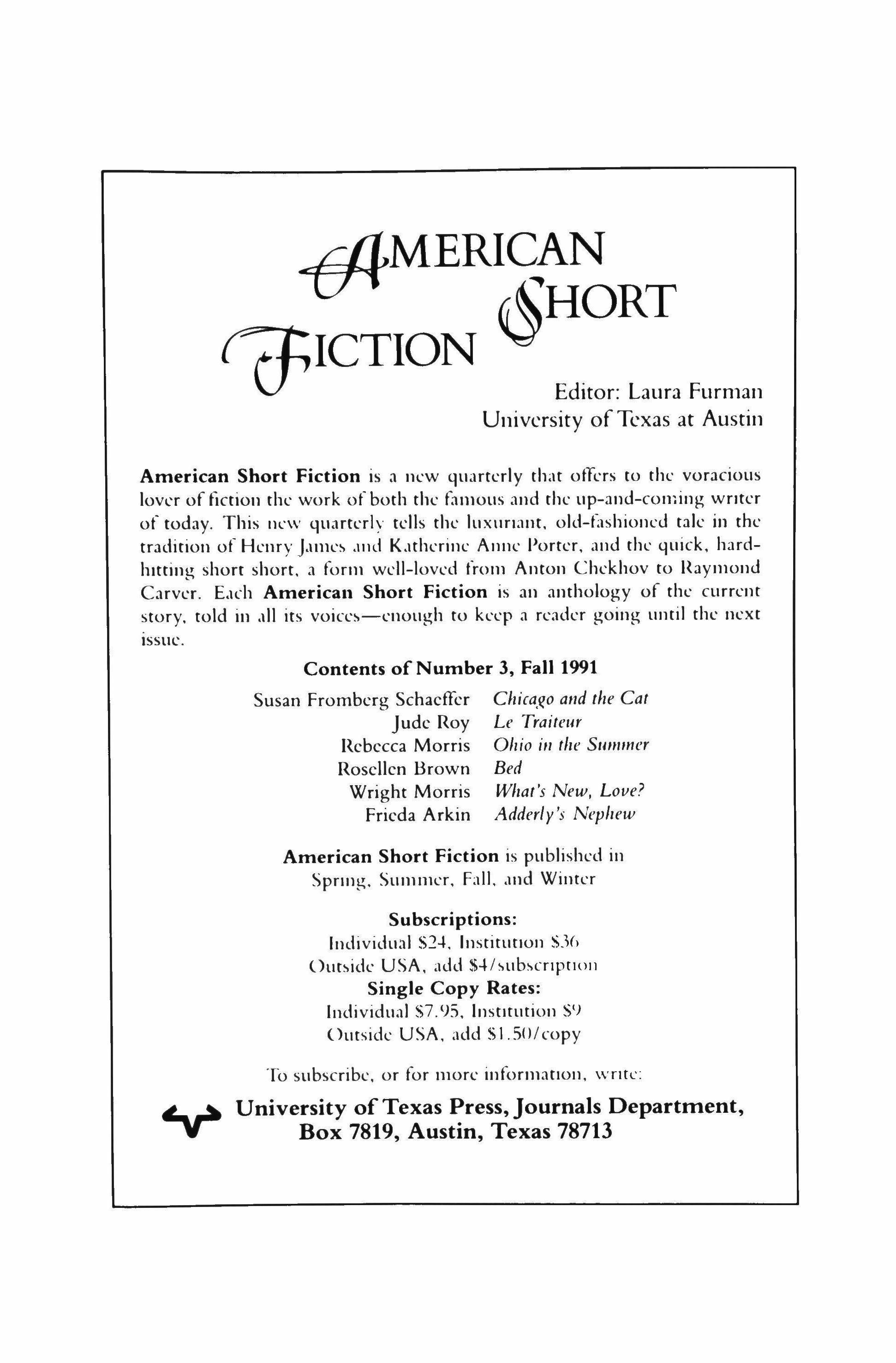
Chicaoo and the Cat Le Traiteur
Ohio ill the Summer Bed
What's New, Love') Adderly's Nephew
American Short Fiction is published in Spring, Summer. F;III. .1IId Winter
Subscriptions:
Individual S�-l, Institution S_)(, Outside USA, add $4/�ub�crlptloll
Single Copy Rates:
Individual 57.1)5, Institution 5') Outside USA, add S 1.5()/copy
To subscribe, or for more information, wrttc: University of Texas Press,Journals Department, Box 7819, Austin, Texas 78713
MICHIGAN QUARTERLY REVIEW
TRANSFIGURED WORLDS: A POETS' ISSUE
Essays: Meena Alexander on the condition of homelessness, personal and public * Margaret Atwood remembers Northrop Frye * Robert Hass in "Families and Prisons" defends poetry about the family from charges of being less important than political poetry * Lawrence Joseph on Donald Hall and the Modernist tradition * Reg Saner recalls the long night he believed to be his last, following a hiking accident * Richard Tillinghast explains what it's like growing older with The Grateful Dead
Fictjon: Stories by Stuart Dybek, Maria Flook and Joyce Carol Oates, and an excerpt from a novel-in-progress by Rita Dove
poetry: "Daylilies on the Hili," a seventeen-page poem by Donald Hall, plus poems by Amy Gerstler, Lorna Goodison, Robert Hass, Evelyn Lau, David Lehman, William Matthews, Ricardo Pau-Llosa, Laurie Sheck, Charles Simic, Cathy Song, Gary Soto
Reviews: Laurence Goldstein on the poetry of Los Angeles, Henry Taylor on William Jay Smith, Charles Wasserburg on James Schuyler
Aru1 a portfoliO of photographs of poets by Robert Turney
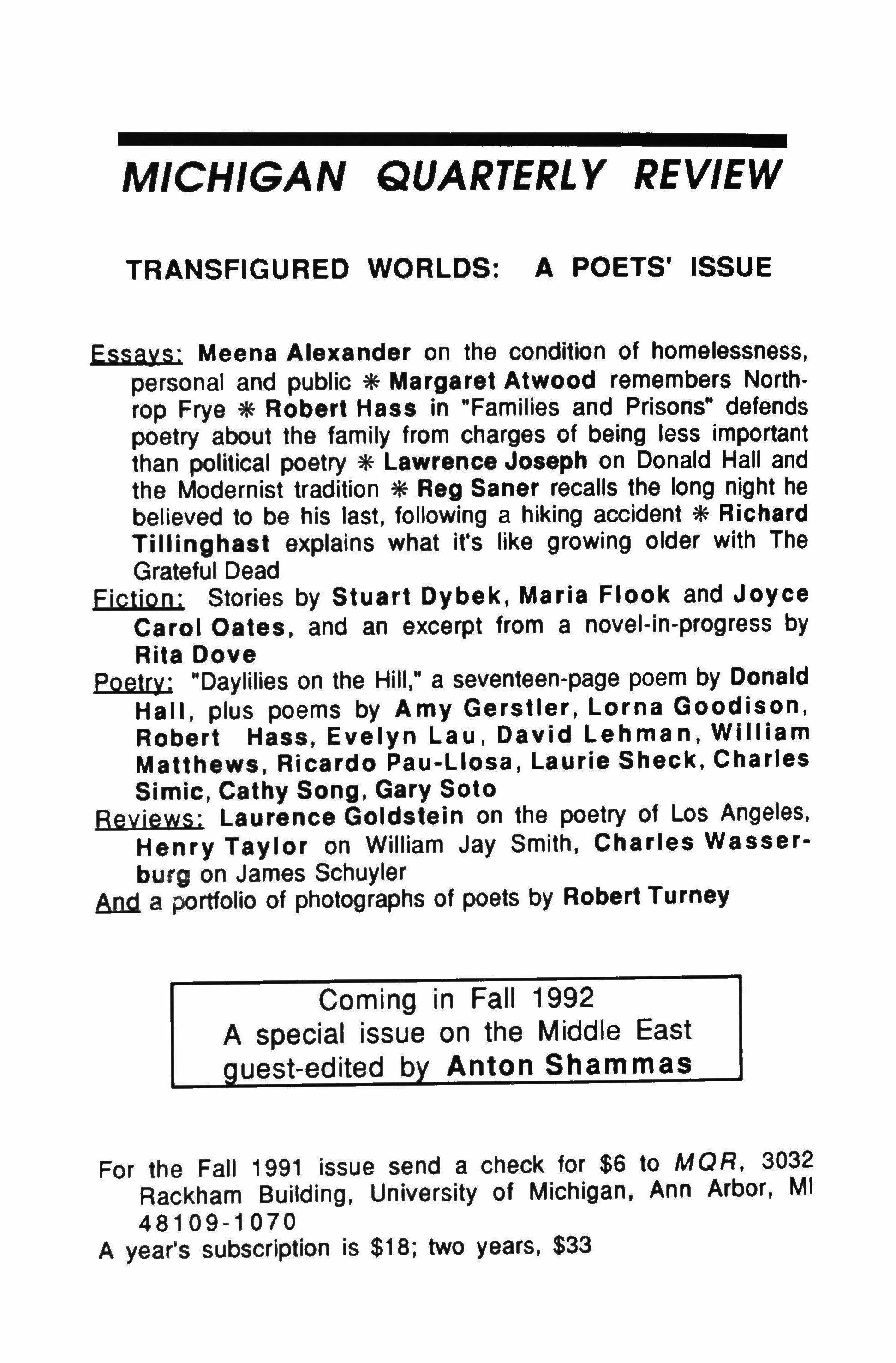
Coming in Fall 1992
A special issue on the Middle East guest-edited by Anton Sham mas
For the Fall 1991 issue send a check for $6 to MQR, 3032 Rackham Building, University of Michigan, Ann Arbor, MI 48109-1070
A year's subscription is $18; two years, $33

EVA-MARY by Linda McCarriston Winner of the 1991 Terrence Des Pres Prizefor Poetry "This Is an Immensely moving book, fearless In Its passion. Linda McCarrlston accompUshes a near miracle, transforming memories of trauma Into poems that are luminous and often sacramental, arriving at a hard-won peace." -Llsel Mueller $17.95, cloth; $10.95, paper. (Plus $2.00 ahlpplDg and hanclUDC·) Available through ILPA, P.O. BOl[ 816. Oak Park, IL 60303 I 1-800-242-4572

Available Now from TriQuarterly Books
Men Who Would Be Good
By Gordon Weaver
"Alcoholism, violence, and free enterprise-all the damage that men can do is visible in these fiercely comic and alarming stories "- Charles Baxter. In this "diverse collection of masterfully written stories" (Booklist), Gordon Weaver explores with insight, intensity and humor the situation of seven men pushed to the limits of their lives. Weaver's earnest and passionate men have learned the rules for being good, but in following them they arrive at desperate and sometimes ludicrous ends, told with "striking, forceful language and keen observation of telling details" (Library Joumal). $18.95, cloth; $9.95, paper. ISBN 0-929968-17-4 (cloth); ISBN 0-929968-16-6 (paper).
Earthly Justice
By E. S. Goldman
E. S. Goldman's book, Earthly Justice, is the first winner of the William Goyen Prize for Fiction, awarded by TriQuarterly Books. The brilliantly crafted stories in this collection are filled with surprise, delight, devastation and poignancy: the triumphs and defeats of his characters expose the complexities of their passions and secrets. Earthly Justice is the first collection of stories for the 77· year-old Goldman, whose credits include publication in the Atlantic, Story and Best American Short Stories, 1988. 208 pp. $17.95, cloth. $9.95, paper. ISBN 0·929968·13·1 (cloth); ISBN 0·929968·14·X (paper).
Fiction of the Eighties: A Decade of Stories from TriQuarterly
To commemorate the rwenrv-fifth anniversary of TriQuarterly magazine, editor Reginald Gibbons and associate editor Susan Hahn have selected fortv-seven of the best short stories to have appeared in its pages during the past decaderesulting in a rich harvest of some of the most moving and exciting examples of the form, by such writers as William Goyen, Grace Paley, Raymond Carver, Amy Hempel, Tobias Wolff, Robert Coover and Joyce Carol Oates. A generous volume of nearly 600 pages, it shows an amazing diversity of subject matter and writing styles, but a common high level of artistry and an unmistakable atmosphere of the 1980's. 592 pp. $26.95, cloth; $16.95, paper. ISBN 0·916384·05·5 (cloth); ISBN 0·916384·06·3 (paper).
• • •
Selected Poems: The Weight of the Body
By Stanislaw Baranct;ak
Translated from the Polish by several distinguished translators and the author, this is the first full-length poetry collection to be published in the U.S. by Stanislaw Baranczak, the brilliant poet, essayist and translator who has lived here in exile since 1981. Baranczak's is a distinctive voice of great range - from satire to elegy, from farce to lyric. First winner of the Terrence Des Pres Prize for Poetry. 96 pp. $16.95, cloth; $8.95, paper. ISBN 0-929968-02-6 (cloth); ISBN 0-929968-01-8 (paper).
Stephen Deutch, Photographer
This long overdue collection of more than a half-century of the work of photographer Stephen Deutch-the first full record of his multifaceted achievement to be published-is a companion volume to his recent retrospective exhibition at the Chicago Cultural Center. Like the show, the book covers the full range of Deutch's vast body of work, including photojournalism, portraiture, nudes and advertising. With a preface by Studs Terkel and a critical essay by Abigail Foerstner. 192 pp., with plates both in duotone and color. $45.00, cloth; $23.50, paper. ISBN 0-929968-05-0 (cloth); ISBN 0-929968-06-9 (paper).
The Collected Poems of Sterling A. Brown
Selected by Michael S. Harper
Arguably the greatest black poet of our time, Sterling A. Brown, who died in 1989, is a legend among writers, teachers and readers-an extraordinary poet, the founder of African-American literary criticism and a great teacher and scholar. His poems have brought neglected but essential and precious subjects, tones of voice, and poetic techniques into American poetry. His Collected Poems, winner of the Lenore Marshall Prize when first published in 1984, has now been returned to print by TriQuarterly Books/Another Chicago Press. 282 pp. $9.95, paper. ISBN 0-929968-07-7.
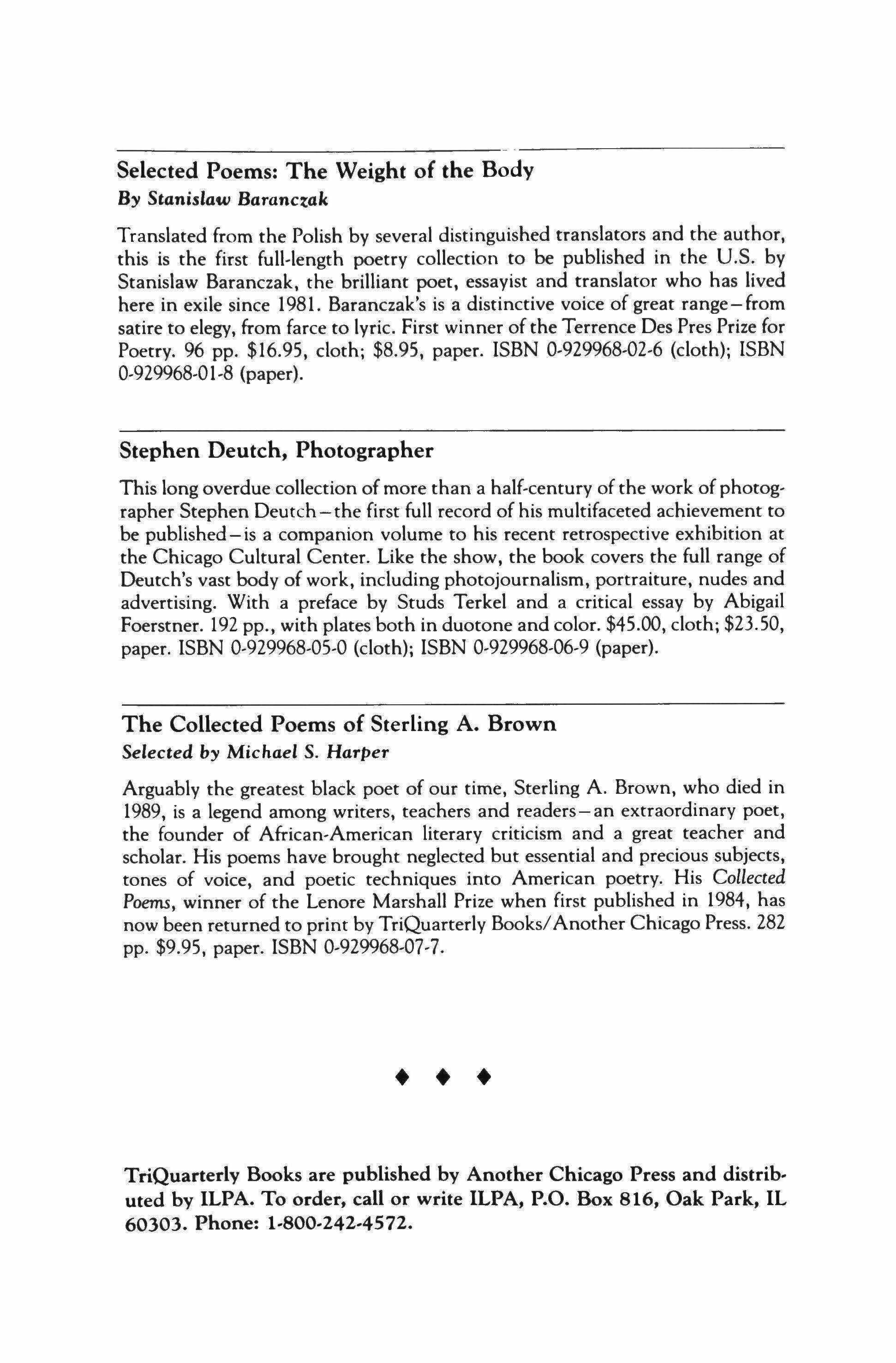
TriQuarterlv Books are published bv Another Chicago Press and distributed bv ILPA. To order, call or write ILPA, P.O. Box 816, Oak Park, IL 60303. Phone: 1·800·242·4572.
• • •
THE NEW GOTHIC
IDITID ay

.IADFORD
MOIROW AND 'ATIICI MclRATIl
A claulllll collectloll of cOlltelllporary Gothic flctloll Ity the preMier writers of our tlllle
Anne Rice, Robert Coover, Jamaica Kincaid, Joyce Carol Oates, Ruth Rendell, Martin Amis, Peter Straub, John Edgar Wideman, Scott Bradfield, John Hawkes, Jeanette Winterson, Angela Carter, Paul West, William T. Vollmann, Emma Tennant, Janice Galloway, lynne Tillman, Kathy Acker, Yannick Murphy, Bradford Morrow, and Patrick McGrath
21 works of
'r ' .... ' .yil, ••d••ss, ••d pen.rslonlIIosl n.y.r lI.for. ,.lIlisheci At bookstON. now RANDOM�HOUSE
TriQuarterlY
thanks
the following life subscribers:
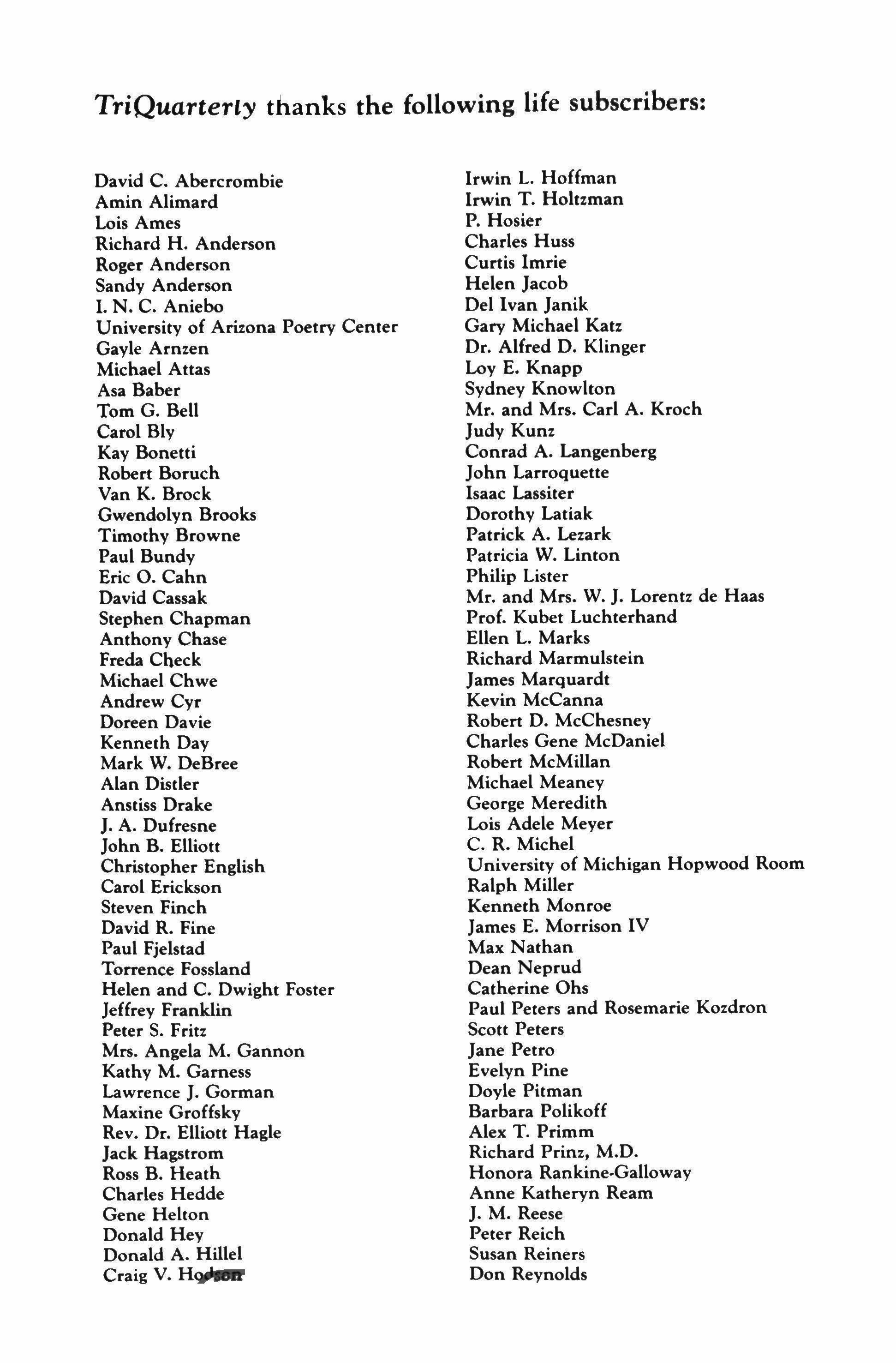
David C. Abercrombie
Amin Alimard
Lois Ames
Richard H. Anderson
Roger Anderson
Sandy Anderson
1. N. C. Aniebo
University of Arizona Poetry Center
Gayle Arnzen
Michael Attas
Asa Baber
Tom G. Bell
Carol Bly
Kay Bonetti
Robert Boruch
Van K. Brock
Gwendolyn Brooks
Timothy Browne
Paul Bundy
Eric O. Cahn
David Cassak
Stephen Chapman
Anthony Chase
Freda Check
Michael Chwe
Andrew Cyr
Doreen Davie
Kenneth Day
Mark W. DeBree
Alan Distler
Anstiss Drake
J. A. Dufresne
John B. Elliott
Christopher English
Carol Erickson
Steven Finch
David R. Fine
Paul Fjelstad
Torrence Fossland
Helen and C. Dwight Foster
Jeffrey Franklin
Peter S. Fritz
Mrs. Angela M. Gannon
Kathy M. Garness
Lawrence J. Gorman
Maxine Groffskv
Rev. Dr. Elliott Hagle
Jack Hagstrom
Ross B. Heath
Charles Hedde
Gene Helton
Donald Hey
Donald A. Hillel
CraigV.H�
Irwin L. Hoffman
Irwin T. Holtzman
P. Hosier
Charles Huss
Curtis Imrie
Helen Jacob
Del Ivan Janik
Gary Michael Katz
Dr. Alfred D. Klinger
Lov E. Knapp
Sydney Knowlton
Mr. and Mrs. Carl A. Kroch
Iudv Kunz
Conrad A. Langenberg
John Larroquette
Isaac Lassiter
Dorothy Latiak
Patrick A. Lezark
Patricia W. Linton
Philip Lister
Mr. and Mrs. W. J. Lorentz de Haas
Prof. Kubet Luchterhand
Ellen L. Marks
Richard Marmulstein
James Marquardt
Kevin McCanna
Robert D. McChesney
Charles Gene McDaniel
Robert McMillan
Michael Meaney
George Meredith
Lois Adele Mever
C. R. Michel
University of Michigan Hopwood Room
Ralph Miller
Kenneth Monroe
James E. Morrison IV
Max Nathan
Dean Neprud
Catherine Ohs
Paul Peters and Rosemarie Kozdron
Scott Peters
Jane Petro
Evelyn Pine
Dovle Pitman
Barbara Polikoff
Alex T. Primm
Richard Prinz, M.D.
Honora Rankine-Galloway
Anne Katheryn Ream
J. M. Reese
Peter Reich
Susan Reiners
Don Reynolds

THE NEW GOTHIC
IDITID .Y
IIAD'OID MOIIOW AND PATIICK Mc.IAT"
A cI•••111I1 coll.ctloll of cOllte porary Gothic flclloll lIy the p I.r writers of our II••
Anne Rice, Robert Coover, Jamaica Kincaid, Joyce Carol Oates, Ruth Rendell, Martin Amis, Peter Straub, John Edgar Wideman, Scott Bradfield, John Hawkes, Jeanette Winterson, Angela Carter, Paul West, William T. Vollmann, Emma Tennant, Janice Galloway, lynne Tillman, Kathy Acker, Yannick Murphy, Bradford Morrow, and Patrick McGrath 21 works of
pr ' .wll, n.ll, .... pen.rllonolln.wer It.for. ,.ltlilh At bookstore. now RANDOM�HOUSE

TriQuarterly thanks the following life subscribers:
David C. Abercrombie
Amin Alimard
Lois Ames
Richard H. Anderson
Roger Anderson
Sandy Anderson
l. N. C. Aniebo
University of Arizona Poetry Center
Gayle Arnzen
Michael Attas
Asa Baber
Tom G. Bell
Carol Bly
Kay Bonetti
Robert Boruch
Van K. Brock
Gwendolyn Brooks
Timothy Browne
Paul Bundy
Eric O. Cahn
David Cassak
Stephen Chapman
Anthony Chase
Freda Check
Michael Chwe
Andrew Cyr
Doreen Davie
Kenneth Day
Mark W. DeBree
Alan Distler
Anstiss Drake
J. A. Dufresne
John B. Elliott
Christopher English
Carol Erickson
Steven Finch
David R. Fine
Paul Fjelstad
Torrence Fossland
Helen and C. Dwight Foster
Jeffrey Franklin
Peter S. Frit:
Mrs. Angela M. Gannon
Kathy M. Garness
Lawrence J. Gorman
Maxine GroHsky
Rev. Dr. Elliott Hagle
Jack Hagstrom
Ross B. Heath
Charles Hedde
Gene Helton
Donald Hey
Donald A. Hillel
Craig V. Hodson
Irwin L. Hoffman
Irwin T. Holtzman
P. Hosier
Charles Huss
Curtis Imrie
Helen Jacob
Del Ivan Janik
Gary Michael Kat:
Dr. Alfred D. Klinger
Loy E. Knapp
Sydney Knowlton
Mr. and Mrs. Carl A. Kroch
Judy Kunz
Conrad A. Langenberg
John Larroquette
Isaac Lassiter
Dorothy Latiak
Patrick A. Lezark
Patricia W. Linton
Philip Lister
Mr. and Mrs. W. J. Lorentz de Haas
Prof. Kubet Luchterhand
Ellen L. Marks
Richard Marmulstein
James Marquardt
Kevin McCanna
Robert D. McChesney
Charles Gene McDaniel
Robert McMillan
Michael Meaney
George Meredith
Lois Adele Meyer
C. R. Michel
University of Michigan Hopwood Room
Ralph Miller
Kenneth Monroe
James E. Morrison IV
Max Nathan
Dean Neprud
Catherine Ohs
Paul Peters and Rosemarie Kozdron
Scott Peters
Jane Petro
Evelyn Pine
Doyle Pitman
Barbara Polikoff
Alex T. Primm
Richard Prim, M.D.
Honora Rankine-Galloway
Anne Katheryn Ream
J. M. Reese
Peter Reich
Susan Reiners
Don Reynolds
Christopher Richter
Diane Rider
Rivler College
Sam Rosenthal
David Roth, M.D.
Jim Rowe
Patricia Ruby
Joan Rybka
Joel Schilling, D.D.S.
Paul and June Schlueter, Ph.Da
Mrs. H. C. Schmidt
Robert 1. Schneideman
Hart Frank Schulz
Koji Seki
David A. Selby
Herbert Shore
John Silbersack
Martin Silverman
Gregory F. Smolarek

Dr. Wanda Sorgente
Laurel Speer
Jane M. Starkey
Michael O. Steams
Ken Stevens
Lawrence D. Stewart
Mr. and Mrs. W. H. Sullivan
Miriam Treger-Honig
Geoffrey Ward Turner
University Club of San Francisco
University Liggett School
William E. Waechter
Daniel Wegner
Anne R. Whipple
Scott R. White
Eric Wilson
Zeljko Zic
Anthony S. Zummer
Life subscriptions are available at the rate of $250 each for individuals and $300 each for institutions, from TTiQuaTteTly, 2020 Ridge Ave., Evanston, IL 60208.
We wish to express our thanks to the following donors to TriQuarterly;
TriQuarterly Council
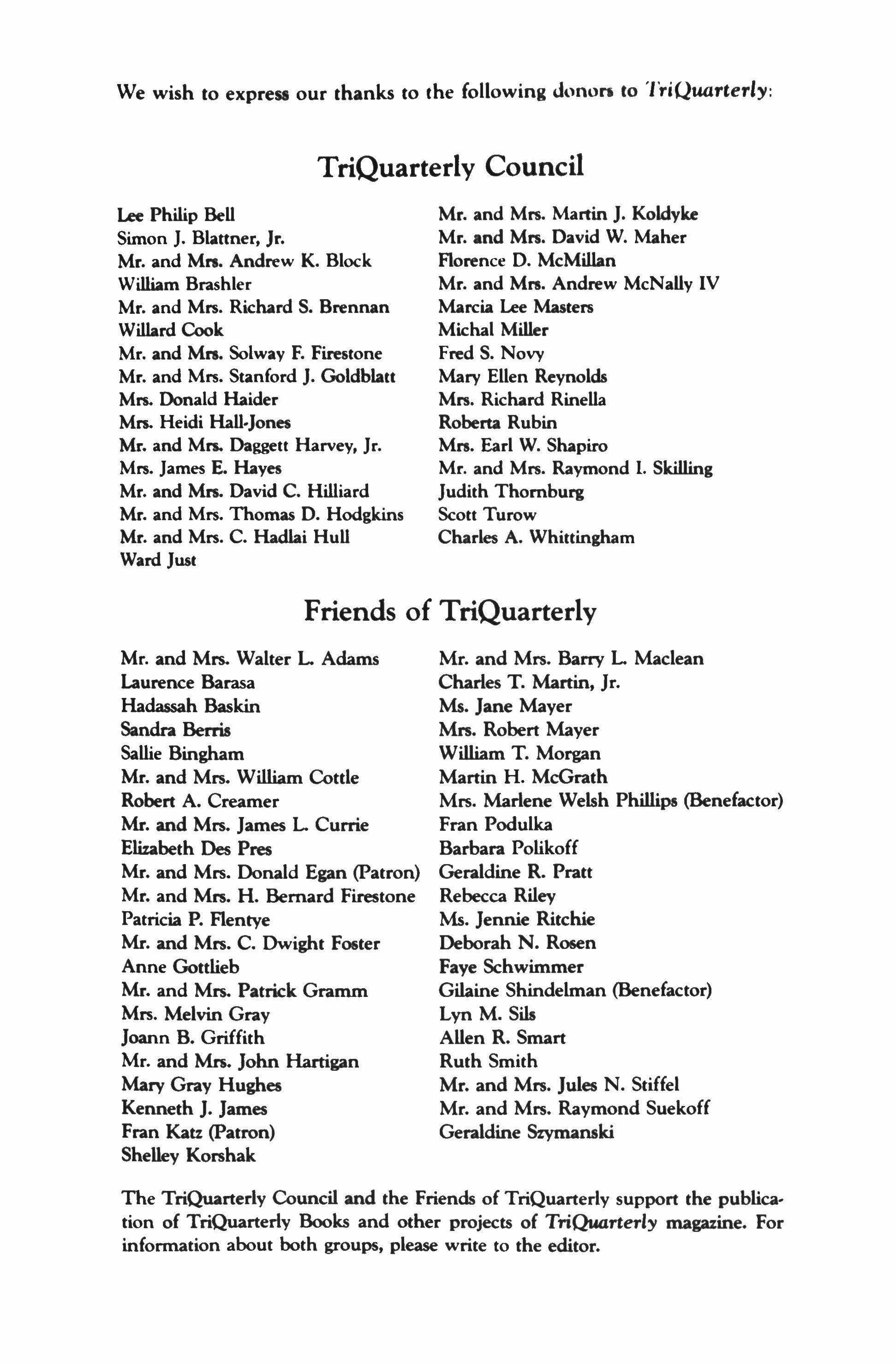
Lee Philip BeU
Simon J. Blattner. Jr.
Mr. and Mn. Andrew K. Block
William Brashier
Mr. and Mrs. Richard S. Brennan
Willard Cook
Mr. and Mn. Solwav F. Firestone
Mr. and Mrs. Stanford J. Goldblatt
Mrs. Donald Haider
Mrs. Heidi HaU.Jones
Mr. and Mrs. Daggett Harvey, Jr.
Mrs. James E. Haves
Mr. and Mrs. David C. Hilliard
Mr. and Mrs. Thomas D. Hodgkins
Mr. and Mrs. C. Hadlai HuU
Ward Just
Mr. and Mrs. Martin J. Koldvke
Mr. and Mrs. David W. Maher
Florence D. McMillan
Mr. and Mn. Andrew McNaUv IV
Marcia Lee Masters
Michal Miller
Fred S. Novy
Mary EUen Reynolds
Mrs. Richard RineUa
Roberta Rubin
Mrs. Earl W. Shapiro
Mr. and Mrs. Raymond I. Skilling
Judith Thornburg
Scott Turow
Charles A. Whittingham
Friends of TriQuarterly
Mr. and Mrs. Walter L Adams
Laurence Barasa
Hadassah Baskin
Sandra Berris
Sallie Bingham
Mr. and Mrs. William Cottle
Robert A. Creamer
Mr. and Mrs. James L Currie
Elizabeth Des Pres
Mr. and Mrs. Donald Egan (patron)
Mr. and Mrs. H. Bernard Firestone
Patricia P. Flentye
Mr. and Mrs. C. Dwight Foster
Anne Gottlieb
Mr. and Mrs. Patrick Gramm
Mrs. Melvin Gray
Joann B. Griffith
Mr. and Mrs. John Hartigan
Mary Gray Hughes
Kenneth J. James
Fran Katz (patron)
Shelley Korshak
Mr. and Mrs. Barry L Maclean
Charles T. Martin. Jr.
Ms. Jane Mayer
Mrs. Robert Mayer
William T. Morgan
Martin H. McGrath
Mrs. Marlene Welsh Phillips (Benefactor)
Fran Podulka
Barbara Polikoff
Geraldine R. Pratt
Rebecca Riley
Ms. Jennie Ritchie
Deborah N. R05en
Faye Schwimmer
Gilaine Shindelman (Benefactor)
Lyn M. Sits
Allen R. Smart
Ruth Smith
Mr. and Mrs. Jules N. Stiffel
Mr. and Mrs. Raymond Suekoff
Geraldine Szymanski
The TriQuarterly Council and the Friends of TriQuarterly support the publica. tion of TriQuarterly Books and other projects of TriQuarterly magazine. For information about both groups. please write to the editor.






































 Yankin' and Liftin' "Yankin' and liftin' their whole lives; that's all they done."
Yankin' and Liftin' "Yankin' and liftin' their whole lives; that's all they done."

 Turtle Trapper
Turtle Trapper















































































































































































 Catherine Thompson replies:
Catherine Thompson replies:




























